UMKC School of Medicine alumna Dr. Preeti Patheja spoke with a Florida news station about new approaches to help older adults access medical care.
Preeti Patheja, a graduate of the UMKC School of Medicine, told Fox 4 in Florida she is focused on dedicating her career to providing the best patient experience possible.
That includes a personalized approach to medical care and providing patients with the education and preventative tools needed to improve health and well-being, Patheja said.
The complete interview can be watched here.
Mar 10, 2022
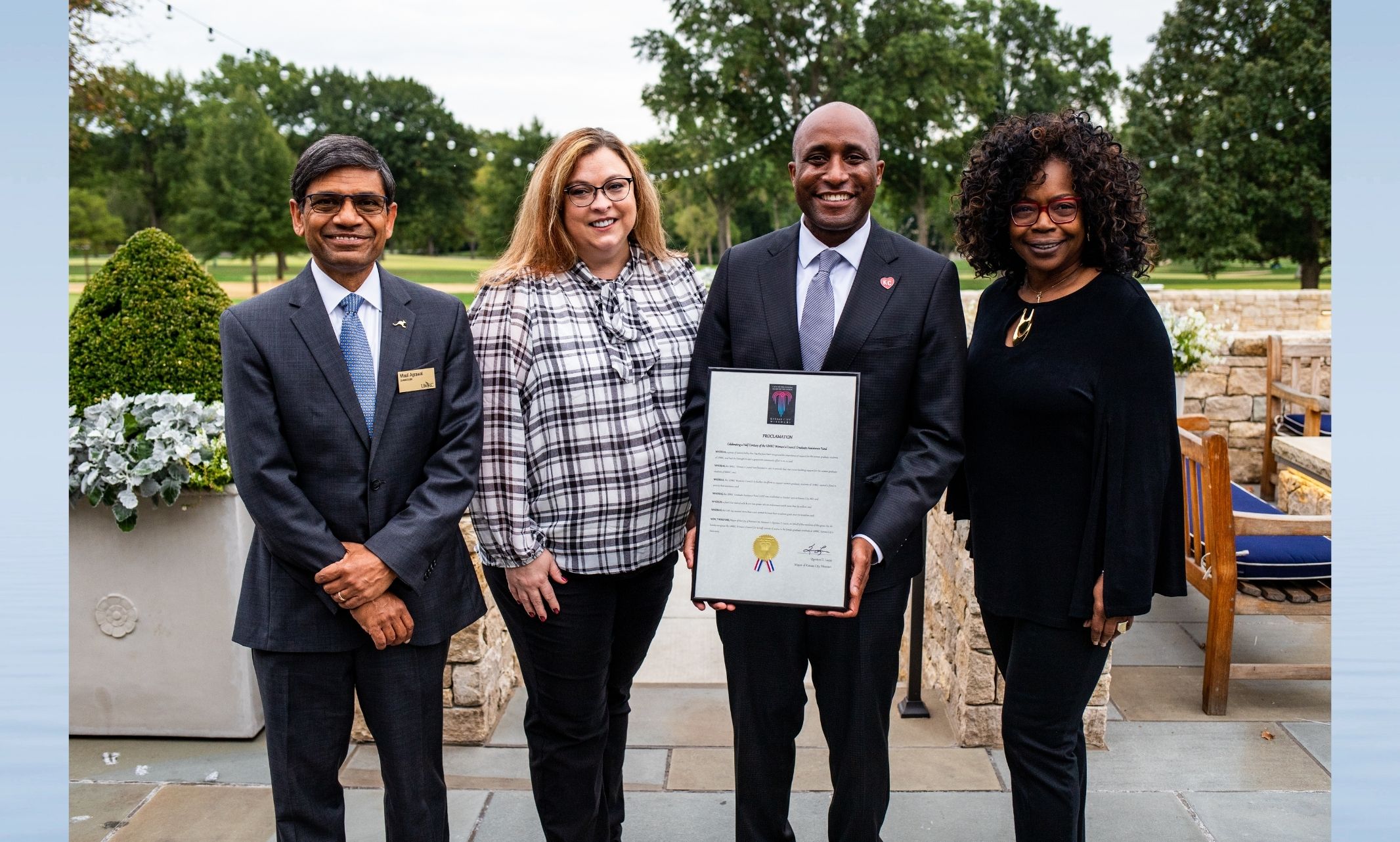
Group adds two new grants, thanks to generous donors, partners
For 50 years The University of Missouri – Kansas City Women’s Council has worked to change the lives of women through the Graduate Assistance Fund.
Established in 1970 with a gift of $750, the UMKC Women’s Council Graduate Assistance Fund has come a long way. As the group wraps up its 50th anniversary year, members have raised more than $50,000 and added several new named awards, or grants, to provide additional support to female graduate students.
As the year comes to a close, the Women’s Council is encouraging supporters to finish out the year strong by contributing to a final giving campaign. There is still time to celebrate the hard work of so many women over the past 50 years, and to support the future potential of many graduate students to come.
Every year the UMKC Women’s Council’s Graduate Assistance Fund awards grants to enable post-baccalaureate students to pursue educational opportunities. The group now has more than 125 named awards, which are named after those who have made a $10,000 investment in the Graduate Assistance Fund, or GAF, endowment. This generosity has helped provide financial support to women graduate students, who have used the money to fund study abroad trips, research endeavors and more, to significantly enhance and enable their educational experience and careers.
“We are proud to have supported thousands of women over the years on their paths to success. With this year’s expansion of the fund, we will be able to help even more women realize their true potential," said Debbie Brooks, former board president, UMKC Women's Council. "The GAF has become a labor of love for those involved and we’ve received incredible feedback from our recipients, the future leaders and innovators studying at UMKC."
On Oct. 5, 2021 Kansas City Mayor Quinton Lucas presented the Women’s Council with a proclamation to recognize 50 years of the Graduate Assistance Fund. He ended the presentation saying, “Here’s to another 50 years and all of your outstanding work!”
As the GAF 50th anniversary year comes to a close, the group hopes for a strong end to a memorable year. The group relies on donations to continue its mission as an organization of women supporting women in the Kansas City community. Contributions help the Women’s Council increase awareness, connect with new donors and further grow the Graduate Assistance Fund. For the 2021 year, donors who take the standard tax deduction, can write off up to $300 in cash charitable donations ($600 for married filing jointly).
“We are helping women graduate students achieve incredible things they might not have had the chance to experience otherwise. Any contribution tells UMKC that this is a very important resource to its women graduate students,” Leslie Boe, J.D., President and Programs Chair, Women’s Council.
Donate here
Learn More About GAF
Dec 22, 2021
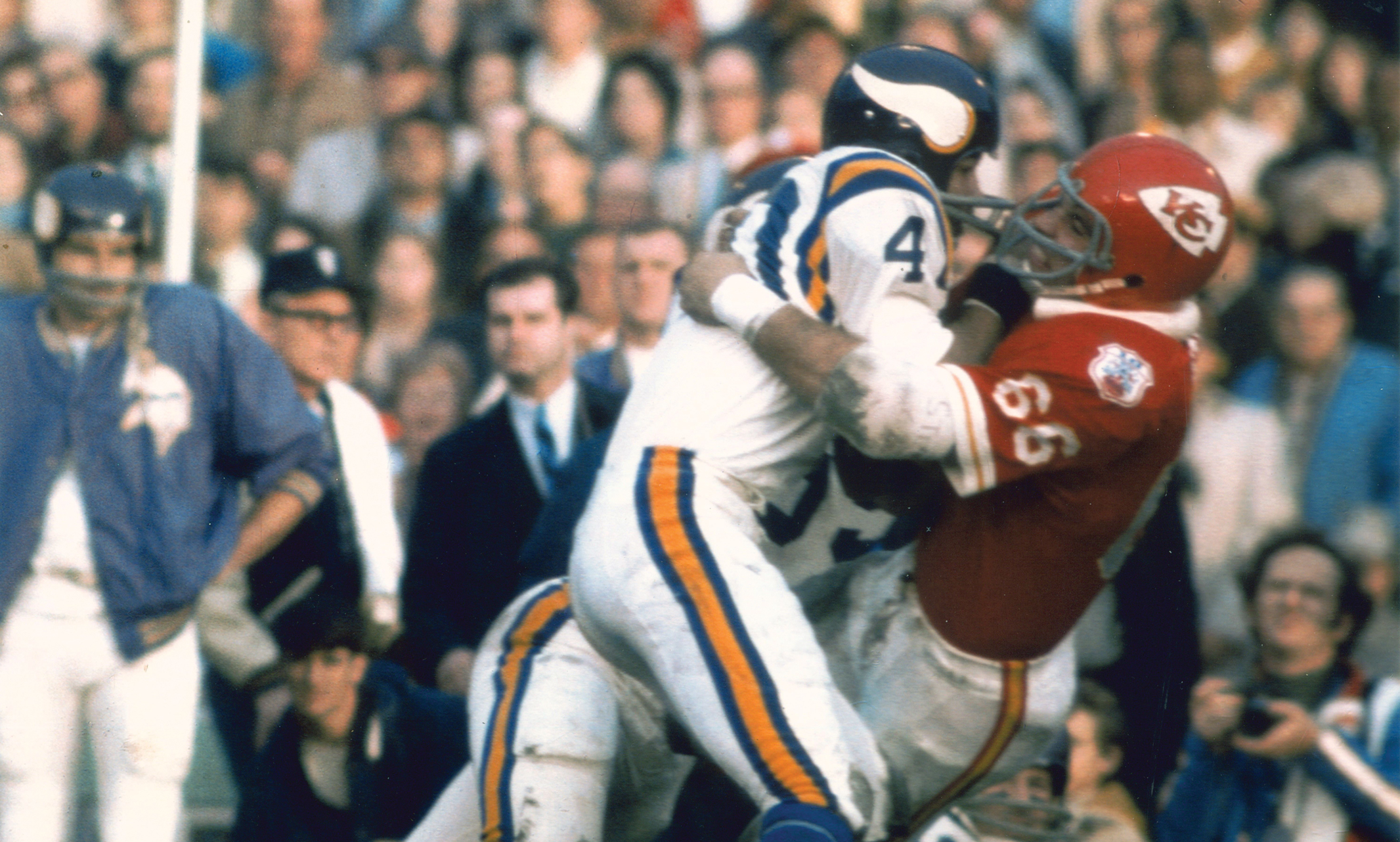
How Bob Stein (J.D. ’73) balanced full-time legal studies with playing for the Kansas City Chiefs — and became a hall of famer
While a full-time law student at UMKC, Bob Stein (J.D. ’73) had to split his time with another major endeavor: playing professional football with the Kansas City Chiefs.
In 1970, the 21-year-old Stein became the youngest ever player at the time to compete in a Super Bowl. Three years later he graduated in the top 10% of his class at UMKC Law. Following his NFL career, Stein became a successful sports attorney and served as the first president and CEO of the NBA’s Minnesota Timberwolves. In 2020, he was inducted into the National Football Foundation College Football Hall of Fame. We sat down with Stein to reflect on a truly unique career.
You’ve had a great career in sports. How did law school fit into all that?
I’d been raised in a home where education was a priority. When I went to college, I intended to be a doctor, but I happened to have a constitutional law class from Professor Harold Chase, who was a brilliant, fascinating guy. I asked him to be my advisor and that got me thinking of law. I thought that whatever I ended up doing, if I had a law degree, it would be helpful and could apply to anything.
It must have been a real challenge to play professional football and attend law school at the same time.
There were a lot of folks who had full-time jobs. It wasn’t like I was doing anything heroic – I had a full-time job playing football. I remember we had one student who was an FBI agent. Other people had families. To me, having kids and all their demands and any kind of a job was more of a demand than playing football. What was really nice about it was that it balanced something that was really intellectual with the really physical “every day’s a day out with the boys” part of football. I always liked living in both worlds.
Do you stay in touch with the people you went to law school with?
Absolutely! One who I’ve stayed in touch with for years is Don Fehr (J.D. ’73), who’s been so prominent in NHL and MLB labor organizations. He’s terrific. When my daughter was in seventh grade, he let her interview him for an hour for a class project. Who does that? At the time he was executive director of the Major League Baseball Players Association. My point is there were a lot of quality people in my class. Another of the classmates I stay in touch with is Jerry Bressel (J.D. ’72), a prominent family law attorney in Kansas City, as is Mark Reza (J.D. ’75).
How was the transition to full-time law practice?
When my football career ended, I really thought the transition to full-time law practice would be a breeze. Boy, was I wrong! The idea that, “I’m going to be able to fool around with the boys for a few months, and then I’ll come back and be a lawyer” was gone. It was a real shock.
One of the things (Chiefs head coach) Hank Stram said that I didn’t think of a lot at the time was, “You’re not a “football player; you’re a person who plays football. You have a family life. You have to develop a professional life apart from football.” For a coach whose livelihood depends on a team’s success and is under such high pressure as a professional coach, that was very unusual and admirable.
Tell us a little bit about your practice life.
I started out intending to do anything but become a sports lawyer. Then, my first year fully out of football, one of my former teammates Ed White called me. Ed was a Pro Bowl-level guard who ended up playing 17 years. I didn’t know anything about athlete representation, but before long, that’s what I was doing! The case was one of those that had a real high profile and turned out well. Soon I was representing other players.
What keeps you busy these days?
I still practice, mostly around the class actions of retired players. In 2009, I started the first class action on behalf of retired players regarding their name and likeness. The case ended up creating the first benefits for vision and dental care for NFL retired players. I really went through the wringer there — learning class actions. Also, for three years, I’ve worked with Lisa Marie Riggins, whose husband is John Riggins, a Super Bowl MVP and Hall of Fame player from Kansas. We started a group called FAIR – “Fairness to Athletes in Retirement” – to advocate on behalf on the players who played before free agency in 1993. We were able to triple the “legacy benefit” pension for those players.
Dec 21, 2021
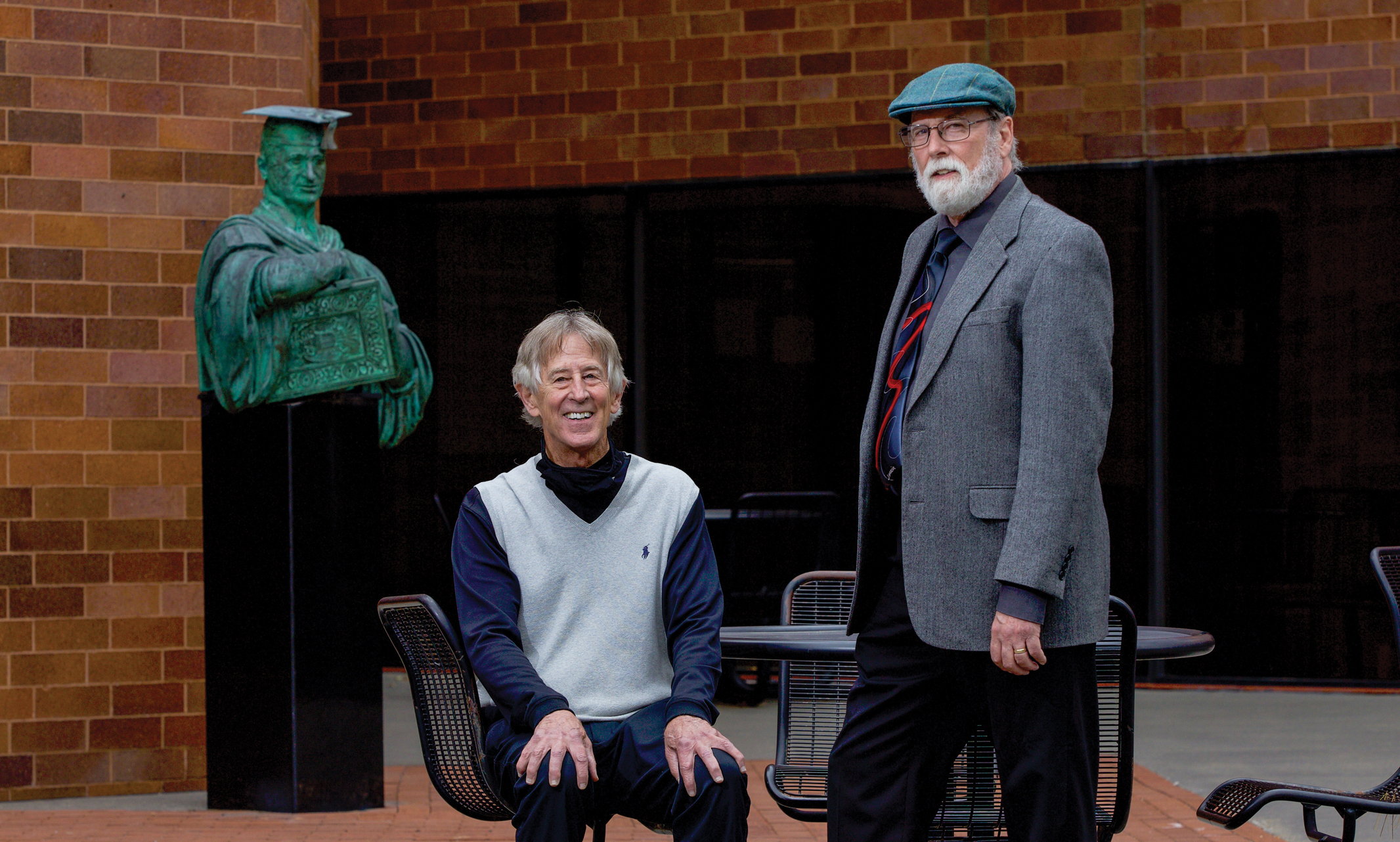
Two UMKC Law professors are reaching major milestones this year
John Ragsdale, William P. Borland Scholar and Professor of Law
John Ragsdale (LL.M. ’72) is celebrating his 50th year of teaching at UMKC. During the past half-century, he’s seen huge shifts in his specialty, environmental law.
“I spent all my formative years hiking and kayaking, climbing in the mountains,” Ragsdale says. “I got out of school in 1970, which is really when the environmental revolution began. Richard Nixon passed the Clean Air Act and Endangered Species Act (in 1973), so that was the heart of it. This sort of tide of environmentalism wasn’t something that had existed yet.”
In 1971, Ragsdale began teaching at UMKC. Over the years he taught a variety of subjects, but his interest in the environment always came back. He saw an opportunity to make an impact.
“I wrote things on environmental law that convinced me there were large-scale problems, and they weren’t yet being addressed,” Ragsdale says.
When asked what he loves about teaching, Ragsdale shies away from the image of a stern professor at the lectern. He says he enjoys when students challenge his views in class, because it shows they care deeply about the issue.
“This is why I really love to teach,” he says. “I teach to talk to people, but it’s less to educate them than to do my presentation of what I know, what I think is important, and elicit what they think is important, too. It has to be a conversation.”
As for what’s next for Ragsdale, he’s hoping it’s more of the same. Environmental law has changed so much over the years, but he’s still finding environmental problems that aren’t being addressed and hoping to fix those problems even 50 years later.
Professor John Ragsdale (LL.M. ’72) began teaching at UMKC in 1971, making this his 50th year in the classroom.
“I have an article that’s coming out this month. It’s on Aboriginal rights to land and water. It leads into a lot of current dilemmas, and the intersection of tribal rights and the ever-encroaching, ever inexorable growth society that’s nibbling away at them at all times. That’s still going on.”
And of course, he’s hoping he’ll continue to teach as long as he can, specifically here at UMKC. Professor Ragsdale is himself an alumnus of UMKC Law, earning his LL.M. in 1972. “God, I love this place. It’s been my home. It’s been my life. I love teaching, and I want to keep doing it. It has been exactly what I want to do. I would ask myself, ‘Would you rather be a judge? Would you rather teach at Yale?’ No. UMKC is my home, intellectually.”
“I love this place. It’s been my home. It’s been my life. I love teaching, and I want to keep doing it.” — John Ragsdale, William P. Borland Scholar and Professor of Law
Sean O’Brien, Professor of Law
Sean O’Brien (J.D. ’80) is not only a professor of the UMKC School of Law, but he’s also an alumnus. He graduated in 1980 with plans to be a tax and business lawyer. He quickly discovered that wasn’t his calling and joined the public defender’s office in 1981. Three years later, he was appointed the chief public defender in Jackson County.
"I did my first death penalty case in 1983,” he says. “And I’ve been doing mostly death penalty work since then. It’s a long time, and I’m still absorbing that. In a lot of cases and a lot of projects that we do in our daily lives, we say, ‘OK, that’s good enough.’ It’s hard to be good enough when life is at stake. It’s quite a burden, and I’m still not sure what it feels like not to have that burden.”
Professor Sean O’Brien (J.D. ’80) is entering a new season in his career following nearly four decades as a death penalty defense attorney.
For the first time in 38 years, O’Brien does not have a client on death row. The case he just finished took 12 years to reach a decision; another before that took 20. Given the average length of cases of this nature, O’Brien feels it’s time for another season in his career.
“I realize I don’t still want to be doing this when I’m 80. I shouldn’t still be doing this when I’m 80. I don’t want to be that lawyer who gets famous for falling asleep in court, you know? It’s time for me to let other people continue to do the work.”
For decades, O’Brien has been doing just that: helping other people to continue what he started.
Since 1983, he has served as director of various criminal defense clinics at the UMKC School of Law, including the Public Defender Appeals Clinic, the Public Defender Trial Clinic and the Death Penalty Representation Clinic. In 2005, O’Brien began teaching at UMKC as a doctrinal professor of criminal law and procedure. He’s taught multiple criminal procedure courses, as well as courses on fact investigation and another specialized course on mental health investigations.
“As far as I know, we’re the only law school in the region, if not the country, that offers a for-credit class in investigation,” he says. “It’s a delight to do.”
“I realize I don’t still want to be doing this when I’m 80. … It’s time for me to let other people continue to do the work.” — Sean O'Brien (J.D. '80), Professor of Law
As for what comes next for O’Brien, he has some plans. He’s determined to create even more opportunities for students to carry on the work to which he’s dedicated more than half his life.
“I’m thinking about creating a sentencing mitigation clinic that would focus on representing people who are in prison for lengthy terms that are applying for parole … because we’re not going to solve the problem of mass incarceration by cherry-picking innocence cases,” he says. “We won’t reject cases because you’re not worthy, you’re not innocent enough or we don’t think we can prove you’re innocent. I’m working across campus with other professors who are interested in that.”
Dec 21, 2021
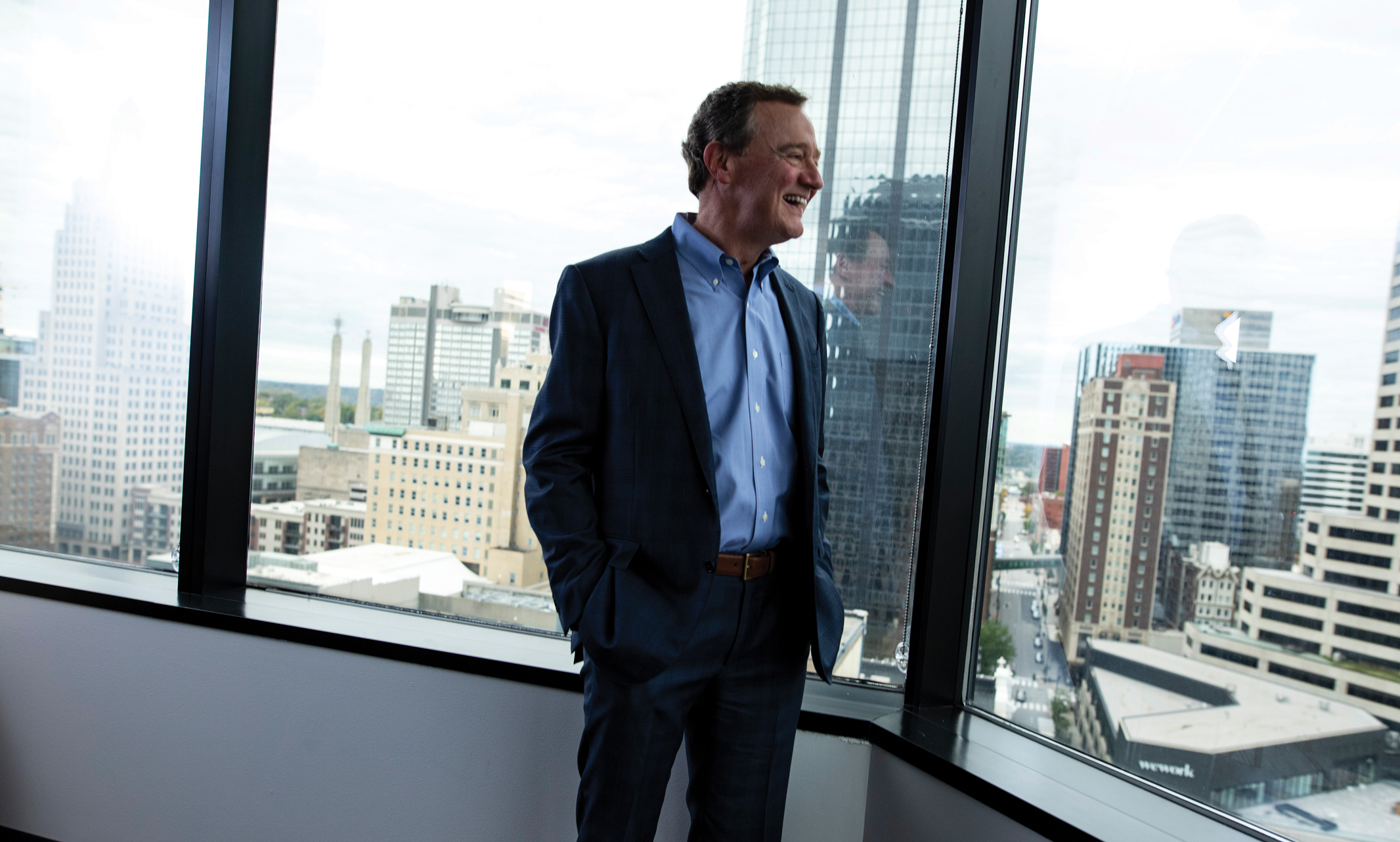
When opportunity calls, these alumni don’t shy away from a new challenge
Ask any seasoned professional if they’re still doing what they thought they would be doing in college, and you’ll likely hear stories of unexpected pivots, discoveries and transitions (sometimes several times over).
That adaptability is one of the lessons students learn while at the School of Law — how to continue learning and growing after graduation, even if it takes them outside their predicted career path. These are the stories of three UMKC alumni who stayed open to new opportunities, igniting new passions and interests along the way.
Tim McNamara (J.D. ’80), Chief Legal Officer, BKD, LLP
Tim McNamara (J.D. ’80) has always loved being in the midst of the action. After graduating from the UMKC School of Law, he went straight into business litigation at the firm now known as Lathrop GPM, handling trials, arbitrations and mediations for well-known clients like John Deere and The Kansas City Star. He even became the firm’s municipal court lawyer early in his career.
“Everything’s a lot more specialized these days, but I was lucky enough to have a diverse set of experiences,” he says.
Over the years, McNamara built relationships, took on high-stakes cases and made partner. One day in 2015, his long-time client, BKD, approached him asking for advice on hiring their first chief legal officer. By the time the conversation was over, he had a job offer.
“I hadn’t thought about it until they suggested it that day, but the idea appealed to me,” he says.
Though he knew them well as a client, McNamara says joining BKD was much more of a change than he imagined. Not only was he working more independently, but he also learned to be comfortable being more involved in the decision-making process, functioning as both lawyer and client.
“To me, it’s been one of the more challenging and rewarding parts of the job,” he says. “I had to learn so much about the business world. I’d always thought that getting an MBA would be interesting and fun. I kind of got a mini-MBA on the job.”
His 36 years of broad, diverse experience at Lathrop proved beneficial, as did his experience managing and working with a legal team. He doesn’t see the inside of a courtroom much these days, but McNamara says that’s okay with him.
“I’m enjoying the challenge of what I’m doing now so much that I haven’t missed it at all,” he says.
And now another transition is in store for McNamara, who recently announced he will retire May 31, 2022, almost exactly 42 years since he started practicing law. An avid cyclist, he’s now looking forward to taking more rides and spending more time with family, including his young grandchildren.
Lischen Reeves (J.D. ’18) says a case involving the Americans with Disabilities Act inspired her to get into health-care privacy and cybersecurity work.
Lischen Reeves (J.D. ’18), Corporate Counsel, Privacy and Cybersecurity, Cerner
After two years working at Shook, Hardy & Bacon, LLP, Lischen Reeves says she was not looking for another opportunity. But when she came across a job posting for the corporate counsel for privacy and cybersecurity position at Cerner, she knew she had to apply.
“I told my husband, ‘This job has my name on it,’” she says. “I don’t shy away from opportunities. If it comes my way, I’ll put myself forward.”
For Reeves, it was a natural transition. As part of the business litigation team at Shook, Hardy & Bacon, she had worked on employment and complex commercial matters, but a case involving the Americans with Disabilities Act shaped her next step.
When she expressed interest in the privacy portion of the case, the senior partner she was working with encouraged her to reach out to the chair of the firm’s privacy and cybersecurity practice at Shook. It turned out they needed an expert on the Health Insurance Portability and Accountability Act (HIPAA) and privacy, so Reeves focused her career on becoming one.
“That was a pivotal moment in my career because this is exactly the work I do for Cerner,” she says. At Cerner, Reeves has zeroed in on health-care privacy and cybersecurity. She recently completed her Certified Information Privacy Professional U.S. certification, a professional certification for privacy specialists.
As someone who knew she wanted to be a lawyer since she was in third grade, Reeves says she has always been intentional with her career, but she has also made a point to keep an open mind.
“I’m moving through this career that I didn't imagine before law school, and I am so glad about how it's turning out,” she says. “I truly thank God for my career. I also owe so much of the development of my mindset to my mother. She supported and encouraged me in every endeavor and challenged me to never stop learning and dreaming of all that could be.”
Sara Rittman (J.D. ’81) has spent 40 years building on the skills she learned at the School of Law in roles at the Missouri Attorney General’s Office, Missouri Supreme Court and even her own private defense firm.
Sara Rittman (J.D. ’81), Deputy Chief Counsel, Litigation Division, Missouri Attorney General’s Office
During her four decades in the legal profession, Sara Rittman (J.D. ’81) has taken a practical approach to moving up the career ladder. More than an abrupt about-face, hers is a story of a series of shifts leading to distinct, yet related, roles. Through the years, she has worked in both prosecution and defense, with roles in public service, then private practice, then back again.
“I’m one who tends to look for things to build on,” she says.
Rittman started her career at the Missouri Attorney General’s Office, representing professional licensing agencies in the state and helping various agencies — like the nursing, podiatry and funeral director boards — with disciplinary litigation against those who violated their professional standards. Compliance and ethics became her niches. Eventually, she moved to a similar role as a staff counsel and then the deputy chief disciplinary counsel, ensuring attorney compliance with the rules of professional conduct. Next she moved from compliance to advising, serving as legal ethics counsel, where she provided informal advisory opinions to attorneys and served as counsel to the Missouri Supreme Court’s Advisory Committee. But the most dramatic change of her career came in 2012, when she opened a private defense firm. In her private practice, Rittman helped lawyers facing complaints or ethics violations achieve compliance or answer complaints against them. She provided consultation to them on ethical questions regarding their practices. Having worked on the prosecution side for the state was helpful, Rittman says, but there was a learning curve.
“I did find that there were certainly some perspectives that I hadn’t really understood as fully as I thought I had before I actually made the change,” Rittman says. “I think it is always valuable for attorneys to be able to understand the perspectives of the people that they’re dealing with.” Rittman re-joined the Attorney General’s Office in 2019, and in July of 2021, became deputy chief counsel in the Litigation Division, essentially the defense firm for the state. Rittman says that even though her roles have been different, some things are universal.
“At every stage of a legal career, you’re going to have to learn new things,” she says. “A constant that I’ve learned is, as a lawyer, if you are prepared and you behave professionally, those are the two most important things.”
Dec 21, 2021
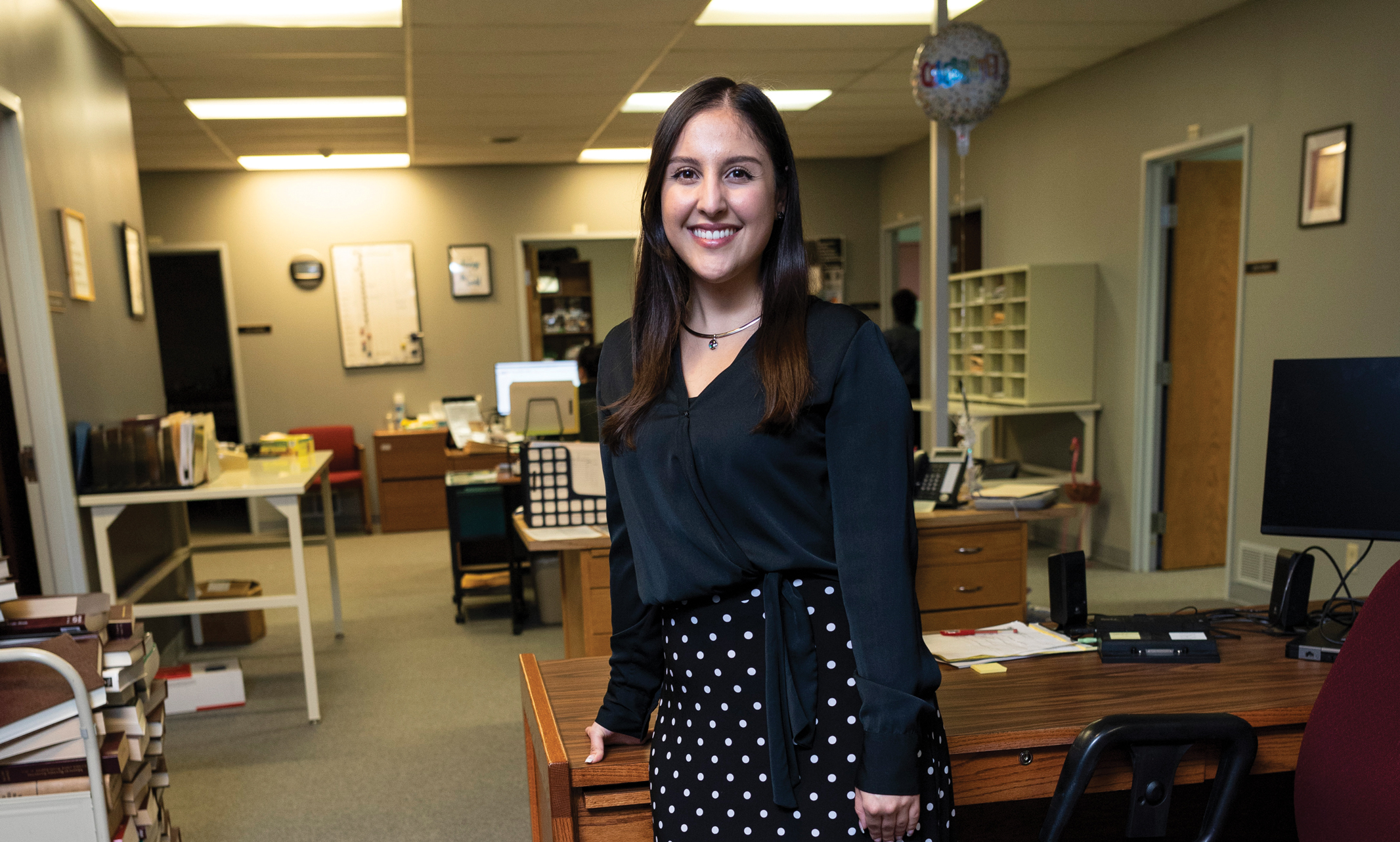
Recent Law graduates navigate the bar exam and first jobs — all during a global pandemic
The transition from law student to practicing attorney can be challenging. Add in the COVID-19 pandemic, quarantining and working and learning from home, and the transition becomes even more complex.
We spoke to three recent School of Law alumni about their transition from being a student, studying for and taking the bar exam and entering practice — all during a global pandemic.
Why did you become an attorney and what are your career goals?
Yasmin Herdoiza (J.D. ’21): I originally wanted to go into psychology or counseling. While working on my degree, I worked at a nonprofit where I did some in-home care for children with intellectual and physical disabilities. This experience showed me what it was like for disabled children living in poverty, and it sparked something in me to learn how to help them. I did some research on family law and talked to my father, who is an attorney, about guardian at litem work. He was super happy when I told him about my plans to go to law school, but there was no pressure to attend. I want to be a judge one day, because that is the way to make fundamental changes.
John Pipes (J.D. ’20): Before law school, I worked a couple of blue-collar jobs. I hadn’t found a career that suited me yet, but knew I wanted a job with a bigger purpose. I became a lawyer to help provide low-income Kansas Citians dignity in the legal process. Heartland Center for Jobs and Freedom is a great fit for the work I envisioned myself doing. I would like to stay here at Heartland and help build a movement alongside low-wage workers that uplifts them and improves their living and working conditions. My next career goal is to see Heartland Center and the Missouri Workers’ Center succeed in our campaign for Kansas City to pass a law that provides all tenants facing eviction an attorney to advocate for them. We know that universal representation is a game changer for tenants and all low-wage workers.
Claire Wyatt (J.D. ’21): I loved arguing and advocating from childhood onwards. My first love was film, but I quickly got burned out in the marketing and commercial world. I decided I wanted a career that gave me more purpose and the ability to serve others. I enjoy being in a courtroom. My passion is animal law. It’s a very small field with very few jobs. Animal law would be the dream. I also interned with Jackson County Prosecutors Office, which was great experience.
Herdoiza says she learned a great deal during her internship at the Missouri State Attorney’s Office, which allowed her to argue in court before she even graduated from law school.
What were your strategies for studying for the bar exam?
YH: Exercise kept me motivated. I went on a lot of walks. I got a Fitbit and logged hundreds of steps each time. I also had a rotation of flashcards and took them on my walks. My boyfriend walked with me and he would read the cards to me.
JP: I gained a lot of good skills studying for the bar. Due to the pandemic, I was home a lot and had time to study. I treated law school as a job and had a schedule each day. The closer I got to the exam, I added more and more work to my days. Normally, I would have studied at the library, but I had to study at home. That was the most difficult. But I learned to make it work, and now I’m more equipped to work from home.
CW: I spent several days compiling requested documentation about my ADD diagnosis and previous accommodations. I then had to appeal my denial of accommodations when the board denied my request. Eventually, they reversed the decision and granted me partial accommodations. I felt really proud of myself for advocating for myself using the sharp skills that UMKC Law taught me.
Preparing for the bar, there were many days I was not able to complete all the tasks that my bar prep program had assigned me, but I persevered. I am very grateful that it ended up being more than sufficient to pass the bar.
John Pipes (J.D. ’20) is an eviction defense attorney for the Heartland Center for Jobs and Freedom.
Where do you work now and what do you like about being an attorney?
YH: I work at the Missouri State Attorney’s Office. The experiences I got from my internship helped a lot. I have been doing discovery and working on low-level felonies. The pressure is high. When my clients are in custody, I worry about them.
I love being a public defender. I believe in the rehabilitative framework. Incarceration doesn’t prevent crime and affects more than just the accused. Many people can’t afford bond and that affects their families, jobs and housing. Sometimes people need to be provided a chance to succeed, even after they’ve previously failed. We must believe and support others.
JP: I graduated in May 2020, early in the pandemic. I went to work for a personal injury attorney for a few months, then decided to transition away from that work and applied for a Truman Fellowship. After three months as a Truman Fellow, I moved to the Heartland Center for Jobs and Freedom, where I took a long-term position doing similar tenant defense work. I work with low-wage workers who have found themselves defendants in eviction lawsuits and provide free legal representation and advice to those tenants.
While a Truman Fellow and now at Heartland Center, I enjoy providing great legal representation to individuals who so rarely have the money to hire a lawyer themselves. We at Heartland Center know how important it is for tenants to be represented by a lawyer. Without a lawyer, tenants lose their case 90% of the time since landlords are almost always represented by legal counsel. When tenants do have a lawyer advocating for them, the results are flipped, and an eviction is prevented in 99% of the cases. I enjoy helping to keep people housed in the long and short term.
CW: I am a Truman Fellow working with the UMKC Tenant Representative initiative. My daily job consists of performing client intakes, exchanging forms with the client, communicating with opposing counsel or pro se landlords (those who do not have legal counsel), reading leases and ledgers, drafting settlement agreements, updating clients on their case status and trying to help clients with related housing matters as best I am able. We have several evictions dockets each week in the Truman Fellowship, so court appearances are a big part of the job.
I love the work I’m doing. I love thinking critically and crafting arguments, and I love advocating for and helping people. I love solving problems, and I feel really fortunate that I’m in a position to help others solve theirs. Learning the law and finding a potential place for myself inside the institution of law has been one of the most empowering and transformative experiences in my life.
Claire Wyatt (J.D. ’21) is a current Truman Fellow working with the UMKC Tenant Representative Initiative. Wyatt says advocating for and helping people has been one of the best parts of being a new attorney.
Tell us about your transition from student to professional.
YH: Through my internship, I argued in court before I graduated, which was helpful. When my internship pivoted from in-person to virtual, the change was very difficult. I had to do things on my own. The most challenging part of transitioning from student to professional was the responsibility. My co-workers are helpful, but it is my name, my bar license and no one else’s. No one is responsible for me, but me.
JP: The Truman Fellowship really helped me with the transition and to hone my skills. I made appearances in front of judges, handled my own caseload, and pursued the best way to keep evictions off a person’s record. It was a real honor to be awarded a fellowship. The people I worked with were passionate, and I enjoyed having a transition period. I dipped my toes into the landlord-tenant space, which I now am involved with at Heartland. Since my fellowship, I have found a wonderful group of colleagues at Heartland Center who are enthusiastic about our work and treat one another with respect. For that I am grateful.
CW: The transition between student and professional was slower and more painstaking than I expected. The last nine months felt like nine years. I went straight from school into intensive bar prep. Pandemic fatigue was very prevalent over the summer, but we all had to soldier on and prepare for the bar exam. It was very rigorous, but I had to remember why I was doing all this – because I want to help people. Getting internships during my time in law school helped to ease the transition between student and professional because I was confident I’d be well prepared by the time I was finally licensed to practice. I am also really grateful for the UMKC Truman Fellowship, which allowed me to work for UMKC’s Tenant Representative Initiative after I took the bar but before I received my bar results. There is a dire need for tenant assistance, and it’s great that UMKC was willing to jump in and offer help. It has helped out so many people in our community by allowing them to stay in their homes while the pandemic rages on.
What advice do you have for someone considering law school?
YH: There is a steep learning curve. You’ll be drinking from a fire hydrant, but it’s fun. There’s nothing better than a client telling you, ‘thank you.’ It’s a really good feeling.
CW: I would encourage future law students to accept that in learning this new, vast discipline, they might at times feel stupid or incapable; they might fall short of their aspirations. I would encourage them to accept this fear instead of fighting it: join the mock trial team even if they’re afraid of how many hours it will add to their schedule, participate in student organizations as members or allies, and speak their truth when they’re afraid of how it will be received by their classmates. I would also tell new law students that their interests may change as they learn more about different areas of law and to be open to new opportunities and horizons as they appear.
Pipes says his Truman Fellowship from the School of Law helped him to hone his skills as a new attorney.
Dec 21, 2021
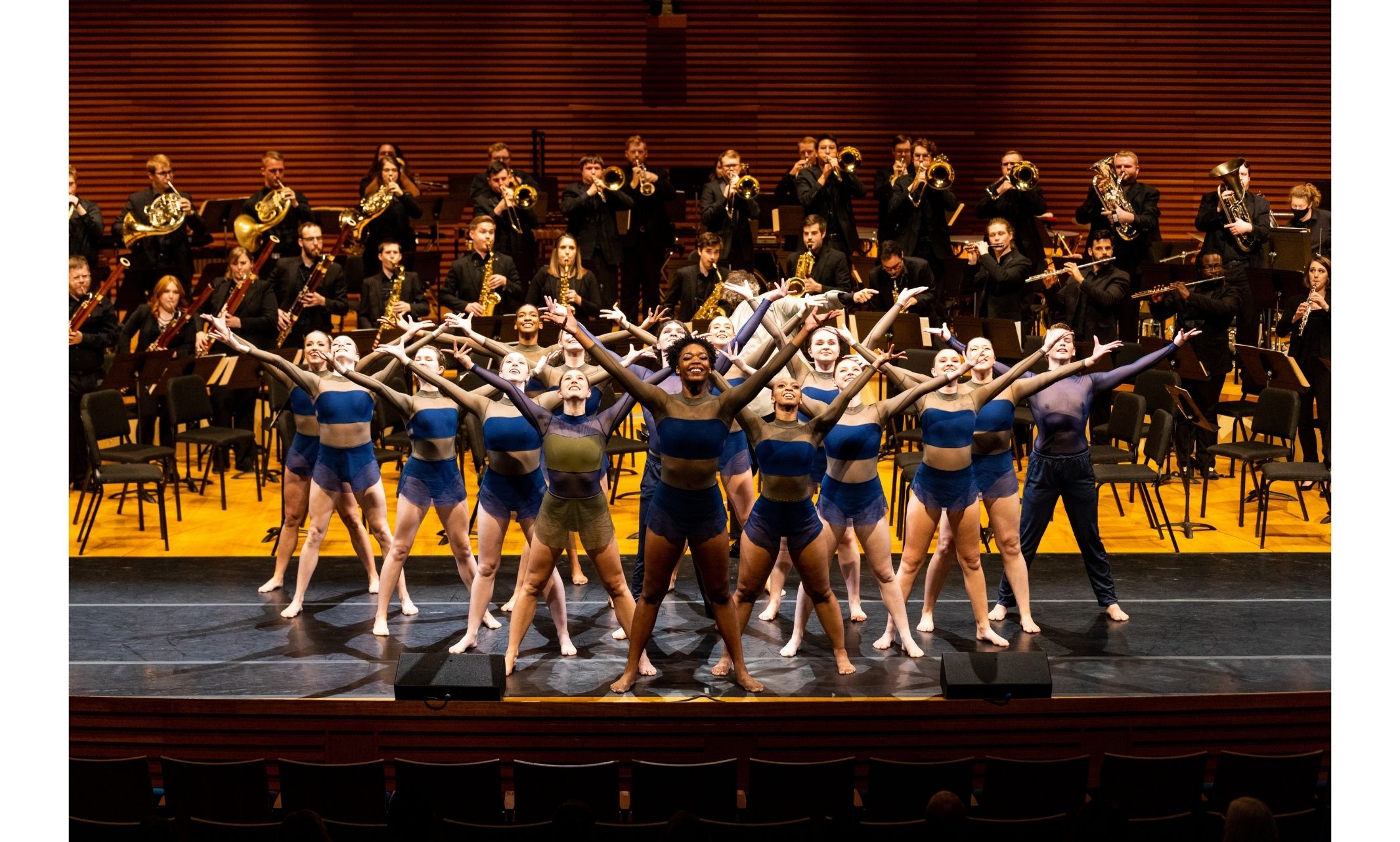
High flying dancers and vibrant musicians and actors took center stage at the 25th annual Crescendo Benefit Gala.
A group of talented student performers from the UMKC Conservatory left their hearts on stage at the Kauffman Performing Arts Center during a one-hour performance in celebration of the 25th anniversary of Crescendo.
UMKC and a host of community members, friends and alumni joined together to commemorate the 25th Anniversary of the Friends of the Conservatory's Crescendo Benefit Gala. Crescendo 2021 featured artistic performances led by the talented students and internationally acclaimed faculty of the UMKC Conservatory. From music to dance to theatre, the ensemble flowed together in uninterrupted succession throughout different locations around the concert hall creating a beautiful and visually stimulating atmosphere.
It was the Conservatory’s first in-person gala in two years, due to COVID.
“What we are celebrating, more than anything else, is commitment. The commitment to persevere through the time of dark theatres and empty seats,” said Mauli Agrawal, chancellor. “We arrived at this moment because of the commitment of the performers who continued to study and practice, the instructors who continued to teach and inspire, the donors who kept the faith that their ongoing generosity would pay off when the lights came up again.”
Held at the stunning Kauffman Center for the Performing Arts, one of the premier art venues in Kansas City, the one-hour performance followed a dinner and cocktail hour.
The event raised more than $815,000 to support student scholarships, which are essential to the Conservatory’s success and a critical part of recruiting and retaining top talent. Thanks to the generosity of donors who chose to add a “silver lining” and increase their sponsorship donation by 25 percent in recognition of the gala’s 25th year anniversary, a special Crescendo Silver Anniversary Scholarship endowment was established to assist performing arts students with the cost of tuition while studying at the UMKC Conservatory.
The UMKC Conservatory is home to the university’s Music, Dance and Theatre programs and has been recognized for its artistic excellence and innovation for more than 115 years.
Learn More About UMKC Conservatory
Dec 21, 2021
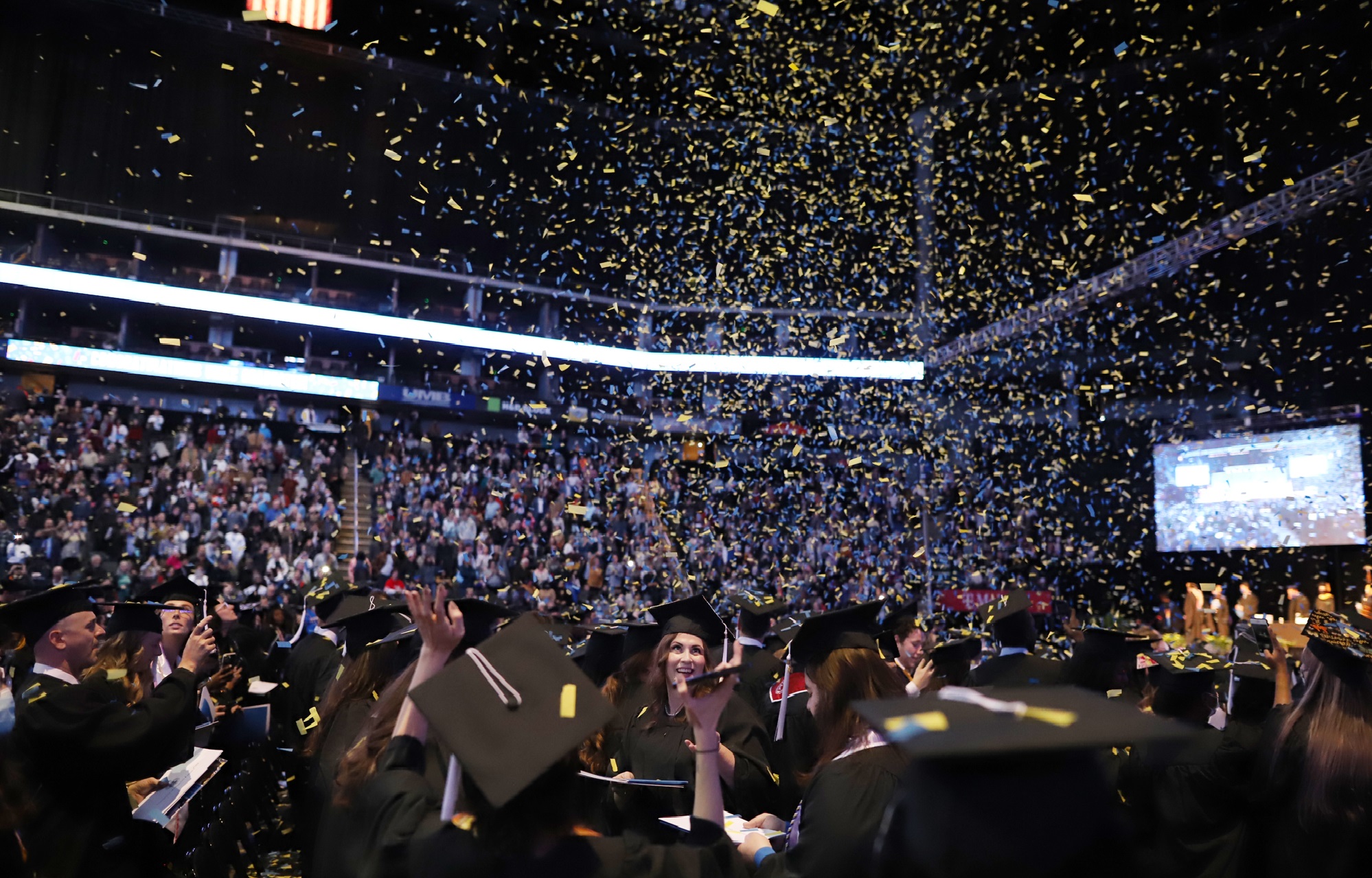
New Roo alumni celebrate graduation in the heart of Kansas City
The University of Missouri-Kansas City celebrated its graduates in a new downtown location fitting of Kansas City’s university.
UMKC Provost Jennifer Lundgren acted as grand marshal of the winter commencement ceremony at T-Mobile Center.
“We are delighted to be here today at the beautiful T-Mobile Center to continue our new tradition of celebrating our graduates at iconic Kansas City locations,” Lundgren said, referring to ceremonies last spring which were held at Kauffman Stadium.
Chancellor Mauli C. Agrawal congratulated the graduates and recognized their accomplishments.
“Earning a university degree is a significant accomplishment even under the best circumstances,” he said. “The class of 2021 has done so while overcoming a lifetime of challenges, starting with the great recession that arose when most of you were children, and continuing through to the ongoing global pandemic.”
Agrawal recognized the graduates’ resilience, perseverance and grit in the face of these challenges.
“That is something that you can carry proudly with you for the rest of your lives. Let it be a source of strength for you to draw on when you face the challenges yet to come.”
Olympic silver medalist and UMKC alumna Courtney Frerichs (B.A. ’15) congratulated the more than 1,000 new UMKC graduates. Frerichs rewrote the Roo record books in track and field and became a world-class competitor and Olympian in the steeplechase event, winning the silver medal in 3000 meter steeplechase at the 2020 Olympic games in Tokyo. She is the first American woman to break the nine-minute barrier for the event.
In preparation for her commencement address, Frerichs mined her recent Olympic experiences.
"Graduation is in many ways like a starting line, and I'm making a living knowing all about starting lines."
She said learning how to pivot and adjust her expectations has been an important part of her success, especially leading up to her silver medal race. The pandemic postponed her participation in the 2020 games and her dreams felt like they were being put on hold. But she found value in having one more year to train and prepare for the Olympics in 2021. She pulled her silver medal from around her neck to show the crowd.
"It paid off," she said to the cheering crowd.
Following Frerichs’s address and the recognition of individual graduates the class enjoyed taking part in the tradition of moving the tassels from the right of their caps to the left to symbolize the individual's movement from candidate to graduate. During the ceremony Chancellor Agrawal also recognized the supportive role family and friends have played in the lives of the graduates.
“Our part was easy. We provided them the knowledge and helped them to hone the skills they need to go to work and change the world for the better. You made them the outstanding people they are today.”
He noted that the graduates’ years at UMKC resemble the opening chapter in a good book.
“You just know there are a lot of great chapters to follow.”
At the conclusion of the program blue and gold confetti fell from the ceiling showering graduates seated in rows on the floor of the arena. An indoor pyrotechnics display launched near the stage as the crowd erupted in applause for this grand send-off for our 2021 Roo grads.
Dec 20, 2021
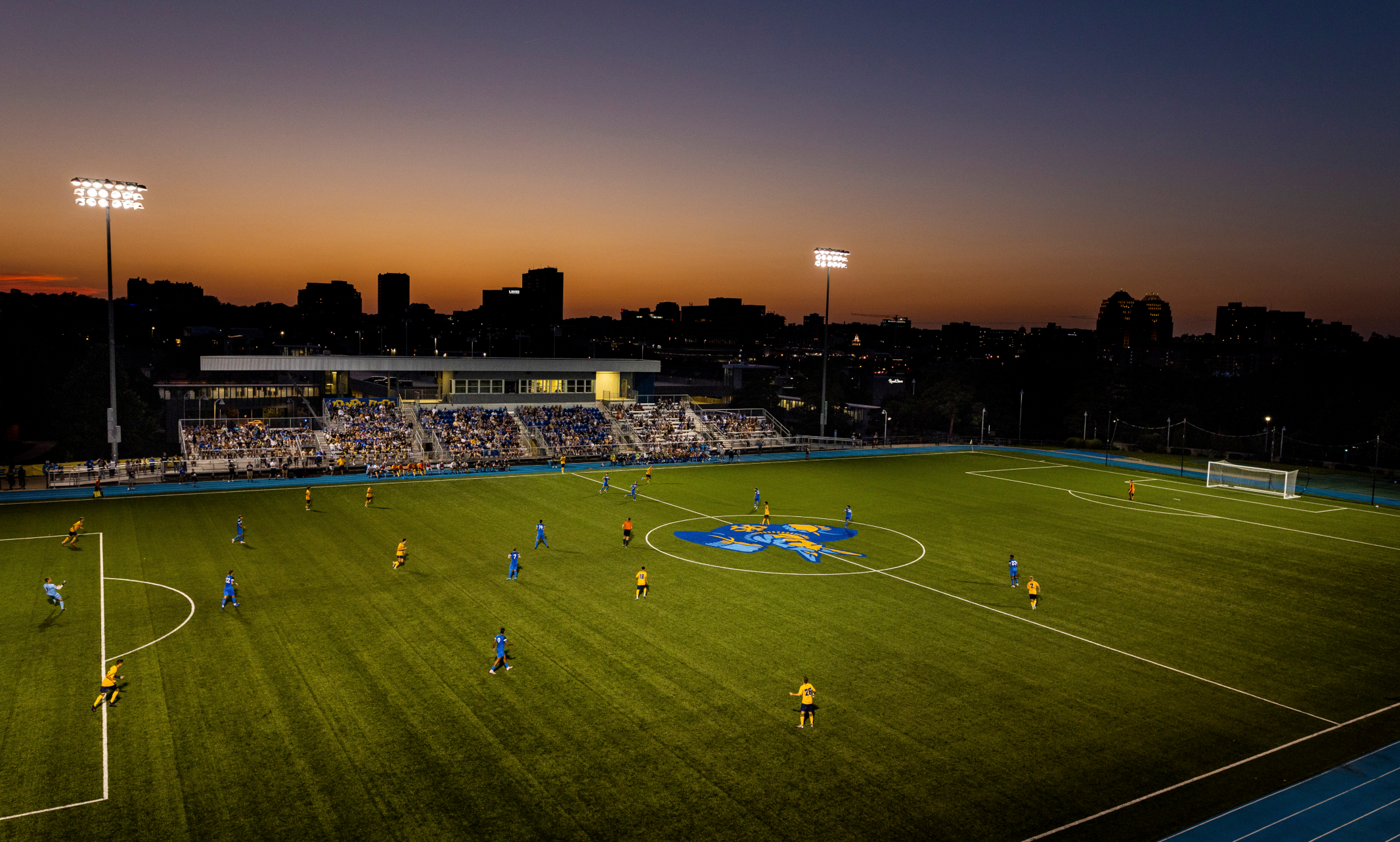
Moments we'll remember from this last year
From wrapping up the online spring semester with Commencement at The K to much-anticipated return to campus in the fall, 2021 has definitely been a year to remember.
Each year our campus photographers select some of their favorite images to share with us. Here are some of their favorites that highlight key moments this year.
Some of our favorite images are portraits we get to take of students, here is one of former Student Government Association President Brandon Henderson, who shared the importance of self-care.
Mascot bonding time: KC had a blast with Sluggerrr doing a photo shoot for our countdown to Commencement at The K this past May.
Two days of multiple ceremonies, some with rain, didn't dampen these smiles. Grads were pumped to have in-person Commencement at The K.
Incoming freshmen swung by campus on Commitment Day this spring to take some photos.
Students were excited for the dedication of our new Roo statue, designed by Kansas City artist Tom Corbin.
We love creating promo images of our student-athletes. Go Roos!
We got some great images from the Mental Health Mile color walk that Roos for Mental Health hosted on campus.
This year our Conservatory students returned to Kauffman Center for the Performing Arts for their annual Crescendo gala performance.
Not only has UMKC provided vaccine clinics for our employees and students, but many of our Roos have served in various roles in the vaccination rollout to our larger community across the city, state and region.
Dec 16, 2021
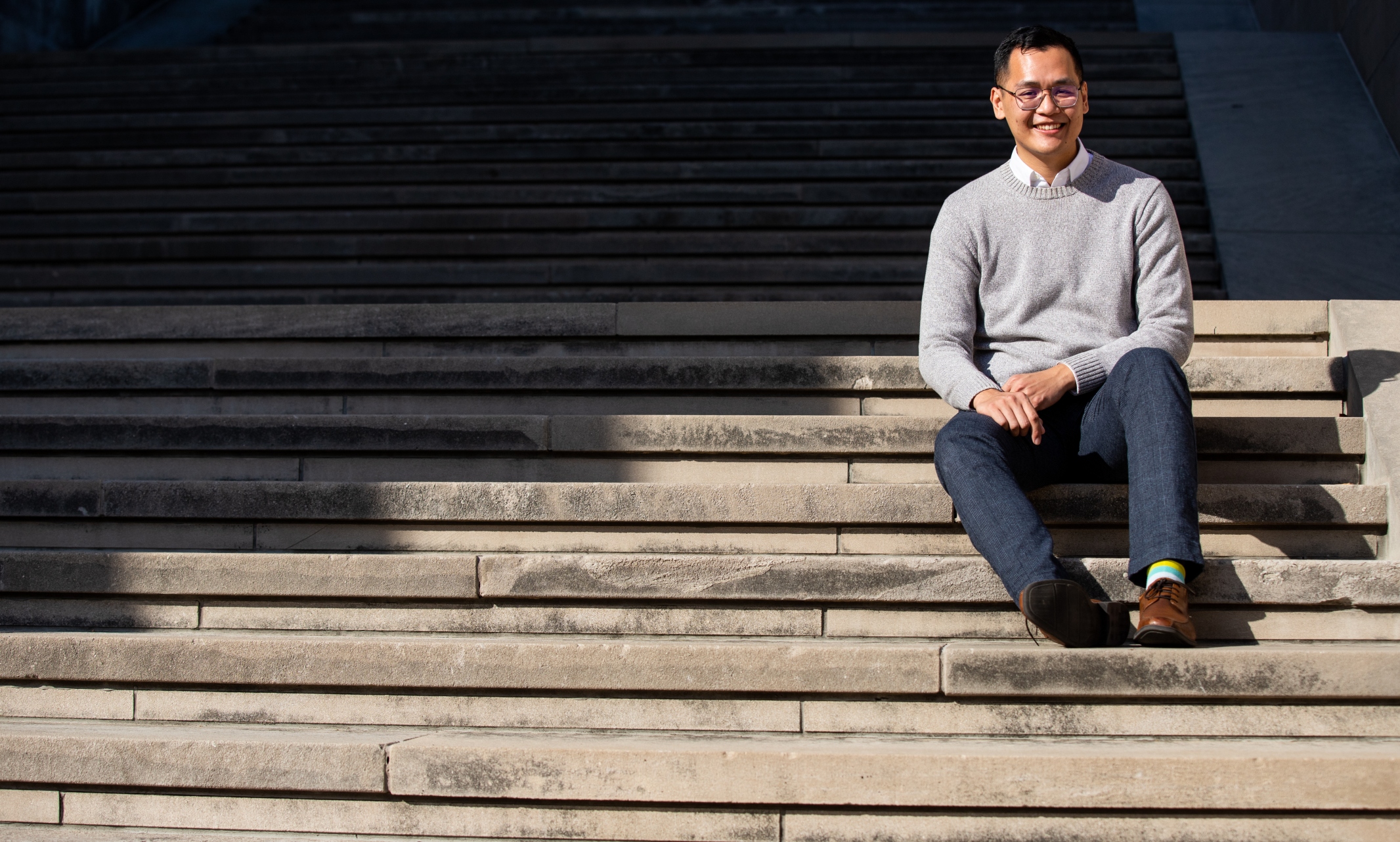
ICU healthcare provider offered comfort in a time of crisis
Roos don’t just dream, they do. Our students turn ideas into action every day. Get to know our people and you’ll know what UMKC is all about.
Name: Kevin DuAnticipated graduation year: May 2023UMKC degree program: Master of Medical Science – Physician AssistantHometown: Kansas City, MO
When Kevin Du, MMS, ’23, lost his father to an acute myocardial infarction three years ago, he was numb, but he remembers that a care provider in the ICU stopped to comfort him.
“I remember how kind she was and how heard I felt,” he says. “Looking back on that is what initiated my interest in the physician assistant profession, and I know that I want to be that type of provider in my career.”
Du is currently enrolled in the physician assistant program at the UMKC School of Medicine. He says the pace of the program can be a challenge, but he loves the small class sizes and the support he receives from the staff members.
“Also, we are a smaller cohort, so we receive more personalized attention from our amazing, supportive faculty when we need it.”
“UMKC is culturally diverse and encourages students to be understanding of others’ backgrounds. I admire the commitment to the community.”
Du is a first generation college student. His parents immigrated to the United States following the Vietnam War and settled in Kansas City. While his parents’ goals for him were more focused on having a happy life than the pursuit of an advance degree, Du would like his achievements to inspire future generations in his family and make his mother proud.
“I want to pay my mom back for all the sacrifices she made for me and validate my parents’ choice to immigrate here,” he says.
Du believes his confidence has allowed him to learn new things and expand his opportunities.
"We are a smaller cohort, so we can receive more personalized attention from our amazing, supportive faculty when we need it.”
“I will always be the first one to volunteer or answer a question,” Du says. “Whether I answer correctly or perform well does not matter to me. I take all my successes and failures in stride and just treat everything as a learning experience. After every experience I ask, ‘How did I do that, and can I do it better?’ This has given me a positive outlook on life and more perspective on how I can improve on myself.”
Du is the president of the UMKC Physician Assistant Student Association and appreciates the inclusivity of the UMKC environment.
“UMKC is culturally diverse and encourages students to be understanding of others’ backgrounds. I admire the commitment to the community.”
Dec 16, 2021
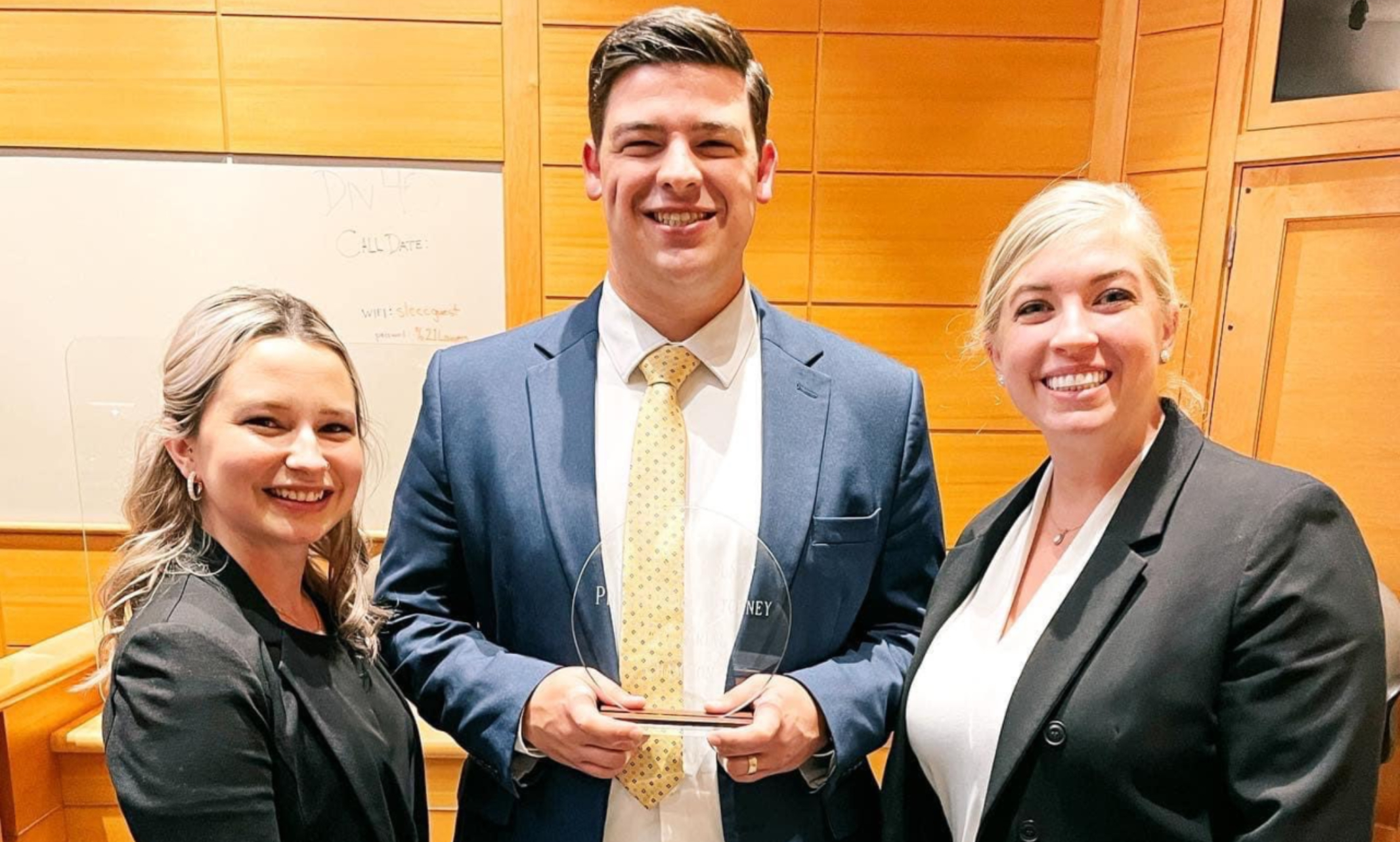
The team beat out several other Missouri law schools
A University of Missouri-Kansas City School of Law mock trial team took home top prize at the 2021 Missouri Prosecutor's Cup Mock Trial Competition.
The Prosecutors Cup is a mock trial competition among Missouri's top law schools. UMKC students studying for careers in the legal profession used trial advocacy skills to try cases against each other. This year's winning team included Trey Allison (3L), Alissa Beirmaier (3L) and Margaret Stansell (3L), coached by law professor Michaelle Tobin.
"My first reaction when I found out we had won was absolute joy. I was so excited to compete and so proud of my team. We put in a lot of hard work and late nights to prepare for this and I was so happy that work paid off and we were able to come home with a win," Stansell said.
The competition, held in St. Louis in late November, featured mock trial teams from across the state of Missouri, including teams from Washington University in St. Louis and the University of Missouri-Columbia.
After winning the competition the championship team had the opportunity to have an exhibition round with practicing attorneys as opposing counsel.
Scott Rosenblum, of Rosenblum Schwartz & Fry, Travis Noble, of Travis Noble P.C., and several other high profile St. Louis attorneys acted as defense counsel. The U.S. Attorney for the Eastern District of Missouri, Sayler Fleming, played the defendant and the Honorable George Draper of the Missouri Supreme Court was the judge.
UMKC sent two teams to the competition, the winning team, and another team that finished undefeated but came up just six points shy of advancing to the final round. The undefeated team was comprised of Casey Campbell (3L), Lauren Gregory (3L) and Eric Honea (3L).
"This win is so important to me as a 3L because it reflects all the skills I've learned, nurtured and crafted over the years in undergrad mock trial and on the law school team," Stansell said. "It always feels good to win but this was so special because we're about to graduate and really only have a few chances left to compete and bring these accolades to our school."
Dec 16, 2021
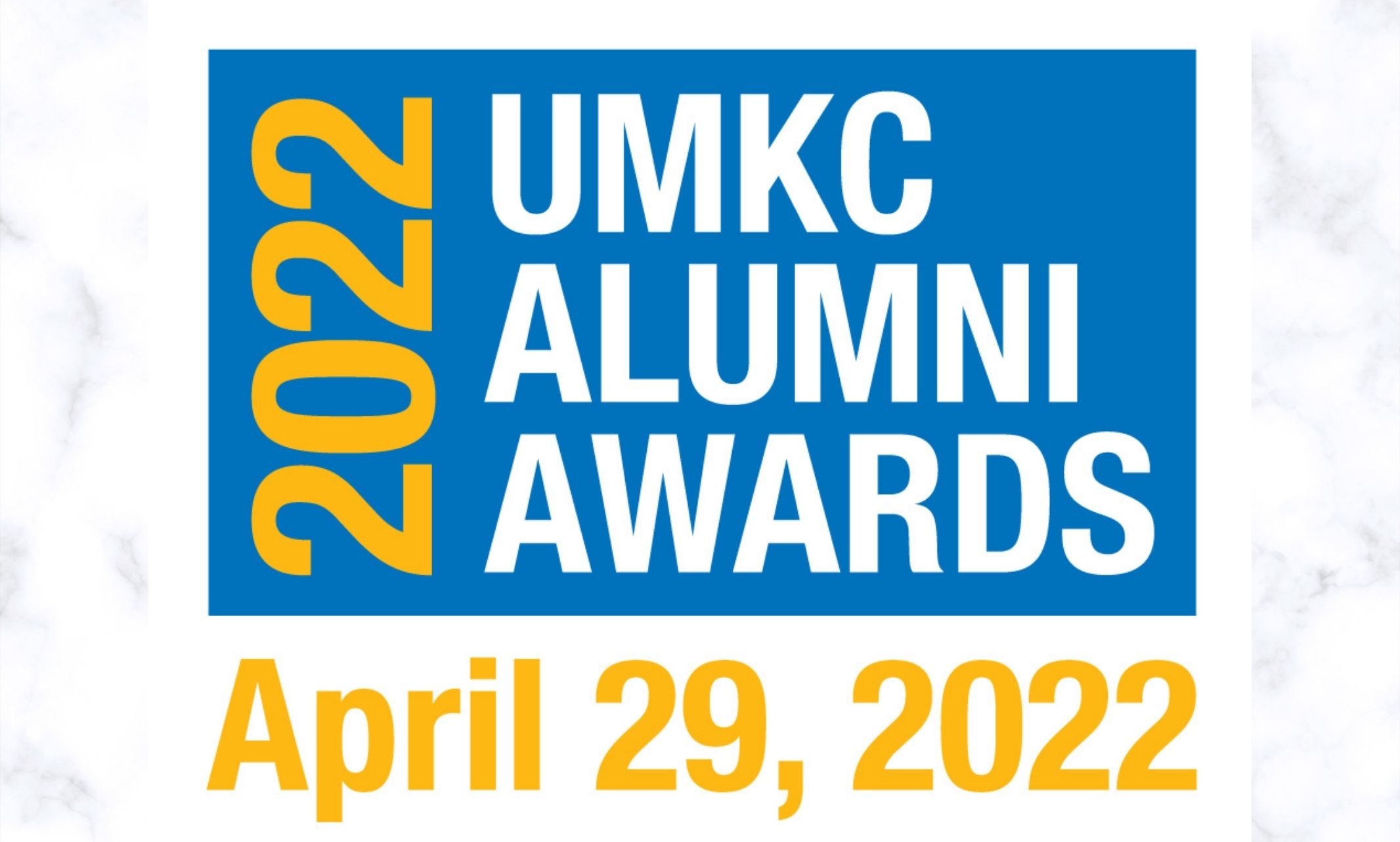
Sixteen alumni and one family will be honored on April 29
The University of Missouri-Kansas City Class of 2022 Alumni Achievement Award recipients include the founder of a veterans housing program, a judge, national CEO and a legacy family whose education and contributions to UMKC have spanned generations.
Join us in honoring the Class of 2022 awardees in an in-person celebration at 6 p.m. April 29, at the James C. Olson Performing Arts Center. Visit UMKC's Alumni Association website to learn more about this year's honorees and the event. If you are unable to attend the event but would like to donate to student scholarships, contributions can be made online.
The Alumni Awards ceremony is one of the university’s largest events to support student scholarships. In the last decade, the Alumni Awards event has garnered more than $1 million in scholarships and immediate aid for UMKC students.
Co-chairs for the 2022 event are Dr. Joseph P. Spalitto (B.S. ’68, D.D.S. ’72) and Debbie Thompson (B.S.D.H. ’81)
University-Wide Alumni Awardees
Alumnus of the Year: Bryan Meyer (B.A. ’11, M.P.A. ’15, J.D. ‘15)
Bryan served in the Marine Corps for five years before coming to UMKC. After his Marine service, he earned three degrees from UMKC: Bachelor’s (2011), JD and MPA (2015). Following graduation in 2015, he then turned his attention to helping fellow veterans by helping to establish the Veterans Community Project (VCP) in Kansas City. He now serves as the CEO of VCP, which is an innovative non-profit that provides housing for homeless veterans in a tiny home village. The village setting provides a sanctuary and emotional space needed for veterans to live and collaborate with those from similar backgrounds and shared experiences. A variety of services are offered to VCP residents, including a Veteran Support Services unit that works to address the underlying causes of homelessness. VCP also provides case managers who work with veterans to achieve incremental, lasting results in the areas of health and wellness, education, employment, financial literacy and the development of a personal support network. Bryan is driven by service and is passionate about building an organization that serves veterans.
Spotlight Award: Riddhiman Das (B.S. ’12, M.S. ‘19)
Das graduated from UMKC with a bachelor’s degree in computer science in 2012 and earned his master’s degree in computer science in 2019. While in school he was a part of the Henry W. Bloch School of Management Entrepreneurship Scholars program, which allows students to develop a business idea alongside a peer group while working with mentors who are accomplished local entrepreneurs.
In the fall of 2019, Das launched a company called TripleBlind, where he currently serves as CEO & Co-Founder. TripleBlind offers data privacy as a service to companies, allowing them to safely provide and consume sensitive data and algorithms in an encrypted space, without compromising privacy or security. Das has spent most of his career in leadership and has held various technical roles in software and product development, academia and consulting across a variety of industries. He is a recipient of the 2013 White House Champion of Change award presented by President Barack Obama. Das was named the 2013 Technologist of the Year by Silicon Prairie News and was featured in Ingram’s Kansas City Business Magazine in 2014.
The Bill French Alumni Service Award: Ann Mesle (J.D. ‘72)
In the midst of building a successful law career, Judge Ann Mesle has dedicated a significant amount of time and service to her alma matter, UMKC. She has served on several boards including the UMKC Law Foundation (President), UMKC Trustees, Martha Starr Education Fund (Co-Chair) and the Board of Diastole-Hospital Hill (Chair). She has received the UMKC Law Foundation’s Lifetime Achievement Award, its Alumni Achievement Award and its Best Friend Award.
Judge Mesle’s leadership has been demonstrated on various UMKC boards and committees including the Capital Campaign and Stewardship and Events (Chair), UMKC Trustees Board and Executive Board, Athletic Foundation, UMKC Trustees Initiative-Law, Law Foundation Board, Law Foundation, and as a Law Foundation Emeritus Trustee. Additionally, she has served on the boards of innumerable civic organizations, including years of service to the Kansas City Bar.
Defying the Odds Award: Susan B. Wilson, Ph.D. (MBA ’05)
Susan B. Wilson, Ph.D. (MBA ’05) is a proud UMKC graduate whose professional accomplishments are a stellar reflection on the University. Susan attended the University of Pittsburgh and earned three degrees. She pushed past poverty, discouragement from professors, racism and discrimination to seek research opportunities and guidance needed to prepare her for the application process for the school’s graduate psychology program. Susan was accepted to the clinical psychology program and matriculated through the very rigorous program as a single parent of two children.
Susan went on to complete her Ph.D. and secured a post-doctoral fellowship at the Menninger Foundation in Topeka. She moved to Kansas City in 1989 and went on to have a multifaceted career in healthcare administration, education and broadcasting. She served as a treating clinician for the Kansas City Chiefs and the National Football League (NFL). In 2005 Susan received her MBA at UMKC and in 2008 became the associate dean for diversity and community partnership at the UMKC School of Medicine. She was named vice chancellor for diversity and inclusion in 2014. During her tenure, she implemented a comprehensive, campus-wide plan for diversity and inclusion, built diversity and inclusion training programs, launched the Faculty Diversity Dialogues program and campus Diversity Advocates programs for students and employees. She retired from her role in January 2021, but has continued working with the School of Dentistry in a diversity and inclusion role.
Legacy Award: North/Cheadle Family
The North/Cheadle family’s UMKC legacy dates back to the 1960’s. Don Cheadle Sr. (M.A. ’70) and his brother-in-law Basil North Jr. (B.A. ‘61, J.D. ‘71) were the first in their family to graduate from Kansas City’s university and laid the path for many generations that followed to become ‘Roos.
North’s daughters, Sheryl North (M.D. ’82) and Maria North Morgan (J.D. ’91) are both UMKC alumni. A host of other relatives have attended UMKC including: Glenn North, Jr. (M.F.A. ’20), Stasi Bobo–Ligon (B.B.A. ’88), Dione Cheadle (B.A. ’89), Myles Cheadle (attended) and Kellie North (attended).
Not only did members of this family graduate and/or attend UMKC, they selected different coursework, so this award represents excellence across several schools on campus. Many of these students have also succeeded in other interests such as art and music. The family is also very committed to public service, with many participating in numerous and impactful volunteer initiatives.
School Alumni Achievement Award Recipients
College of Arts and Sciences: Melissa Zarda (B.A. ’02, M.A. ‘07)
Owner, Pixel Lunch LLC
School of Biological and Chemical Sciences: Joseph Lambing (Ph.D. ‘90)
Senior Vice President, Bristol Myers Squibb, formerly MyoKardia (retired)
Henry W. Bloch School of Management: Mike Perry (B.B.A. ’89)
President & CEO, Hallmark Cards, Inc.
School of Computing and Engineering: Jungwoo Ryoo (B.S. ’96, M.S. ’98)
Professor, Information Sciences and Technology; director, Division of Business, Engineering, and Information Sciences and Technology (BEIST), the Pennsylvania State University-Altoona.
Conservatory: Dr. Xi Wang (M.M. ’03)
Associate Professor, Music Composition and Theory, Southern Methodist University
School of Dentistry: Brenda Bohaty (Ph.D. ’09)
Nelson Professor and Chair, Department of Pediatric Dentistry, University of Missouri-Kansas City School of Dentistry
School of Dentistry – Dental Hygiene: Jo Ann Weatherwax (B.S.D.H. ’06, M.S. ’12)
Founder/director, Volusia County Health Department Dental Program (retired)
School of Education: Lucero Garibay (M.A. ‘16)
Floor Supervisor and Psychotherapist, Pilsen Wellness Center
School of Law: J. Kent Emison (J.D. ’81)
Partner, Langdon & Emison LLC
School of Medicine: Lucky Atul Chopra (B.A. ’91, M.D. ’92)
CEO, Advanced Diagnostics Healthcare
School of Nursing and Health Studies: Leslie Luke (M.S.N. ’00)
Family Nurse Practitioner/Owner, The Care Clinic
School of Pharmacy: Janelle Sabo (Pharm.D. ’00)
Vice President of Clinical Capabilities, Eli Lilly and Company
Dec 15, 2021
AccessLex proves to be a valuable resource for UMKC law students
A nationwide program is helping UMKC students take charge of their finances and mitigate the cost of law school.
The AccessLex Institute is a non-profit dedicated to improving access to law school. It offers a program called MAX by AccessLex at 174 law schools across the country, which provides quick, easy-to-understand personal finance lessons for students, including how to pay for law school, retirement and investing. Recently the UMKC School of Law was named among the top 10 schools in the country for personal finance course completion on MAX by AccessLex.
Dean Barbara Glesner Fines said that the high participation for UMKC students did not come by accident. The law school integrated the financial literacy program and frequently promotes its use by hosting presentations, sending monthly reminders and providing access to AccessLex counselors. “What makes us stand out is that we uniquely take advantage of opportunities and that’s why our students do so well in the MAX program,” said Glesner Fines.Being a law student is inherently stressful, but Glesner Fines said when students are financially strapped on top of stressing over rigorous coursework, it is apparent. “I see it so powerfully when a student doesn’t have to worry about financing their legal education or retaining huge student loans, it affects the classes they choose, the internship they take, the ability to do pro bono work and volunteer, the ability to be in competitions, be on the trial team or client counseling team. And it affects their career choices for the rest of their life.”While many of UMKC’s law students go on to pursue lucrative careers in the private sector, Glesner Fines said a majority go to work in prosecutor and public defender offices.“These are such critical roles in our community in providing access to justice, but they do not pay as much as other legal employment opportunities. If a student graduates with excessive student loan debt, they may find these career choices are simply unmanageable for them,” she said. In addition to MAX programs, UMKC students have also benefited from other AccessLex benefits. In 2019, UMKC law student Kourtney Hodge was awarded a $40,000 scholarship from the non-profit. UMKC Law also received a $25,000 grant in 2020 to assist with emergency expenses during the COVID-19 pandemic. Those funds helped students purchase technology for remote classes, provided assistance to students whose employment was affected by the pandemic, provided child care and helped with paying for medical crises. “They’ve been very generous partners,” said Glesner Fines.
Dec 14, 2021
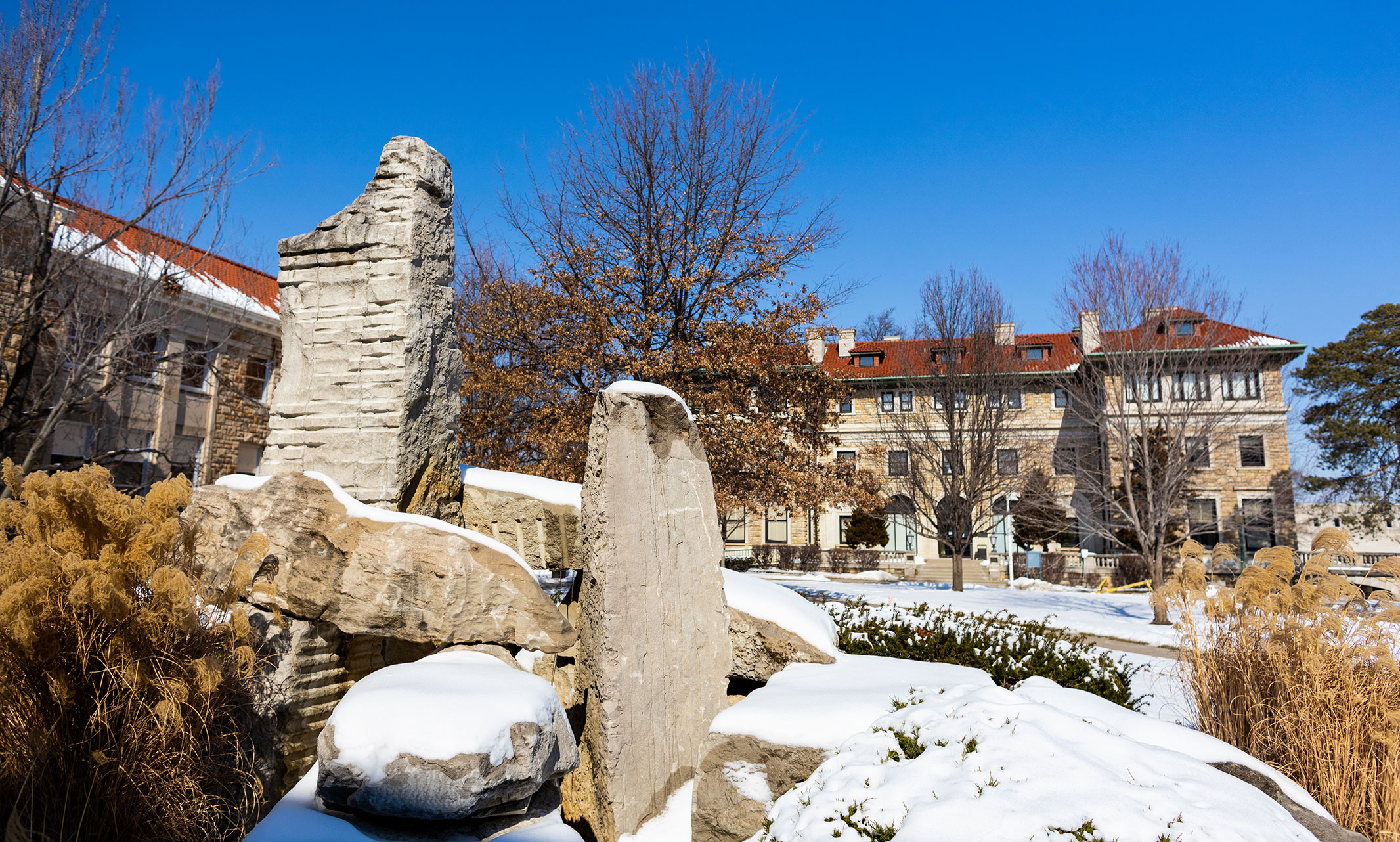
We asked the UMKC community to share their favorite winter-time activity
While we love this town in all seasons, Kansas City is particularly cool in the winter.
Not just in temperature, of course, but in how many exciting things there are to do. We asked our UMKC community on Instagram what their favorite thing to do is in Kansas City in the wintertime, and we’re sharing the best of them here for your own cold-weather enjoyment!
KC Rep’s A Christmas Carol
The Kansas City Repertory Theater and UMKC have a long history. Located on UMKC’s Volker campus the Rep is a popular place during the holiday season for it’s well known tradition of putting on A Christmas Carol, a musical version of the classic Charles Dickens tale. With stunning performance, sets and costumes, it is sure to wow and warm the heart of any Scrooge.
UMKC Basketball Games
When the weather outside is frightful, there’s nothing more delightful than catching a game at the Swinney Center, where our players are always heating up! You can catch men’s and women’s basketball games all season long. Don’t forget to check the athletics site for the latest info and to get your tickets!
Kansas City Zoo & Aquarium
One of Kansas City’s favorite outdoor attractions is not just for summertime! This is one of the best seasons to see the Kansas City Zoo & Aquarium. There’s an outdoor polar bear exhibit, and on Saturdays and Sundays, you can watch the Penguin March at 11 a.m. It’s one of the zoo’s most popular events.
Crown Center
This city district, just west of our Health Sciences campus, is the holiday headquarters of Kansas City. It’s home to the Mayor’s Christmas Tree, and the beloved Ice Terrace, the premiere spot for ice skating in town. Warm up inside with some holiday shopping, delicious food and festive special performances in their two theaters.
See the Lights
It can be a bit of a downer when the sun sets before 5 p.m. each night, but what better to lift low spirits than twinkling lights. There’s so many to see all through Kansas City. From public walkthrough displays, like Powell Gardens Festival of Lights, to drive-through spectacles like Winter Magic at Swope Park, there’s a glow out there for everyone. Short on cash? Drive by Ward Parkway or Candy Cane Lane, a neighborhood light spot that’s been a Kansas City area staple for more than fifty years. And speaking of lights…
The Plaza Lights
We’d be remiss not to mention the world-famous Country Club Plaza Lights, within walking distance of our Volker campus. Kansas City has kicked off the holiday season with a lighting ceremony here since the 1930’s. Grab a hot beverage and enjoy them while you frequent the many Plaza shops, or just take the most festive walk of the season.
Dec 14, 2021
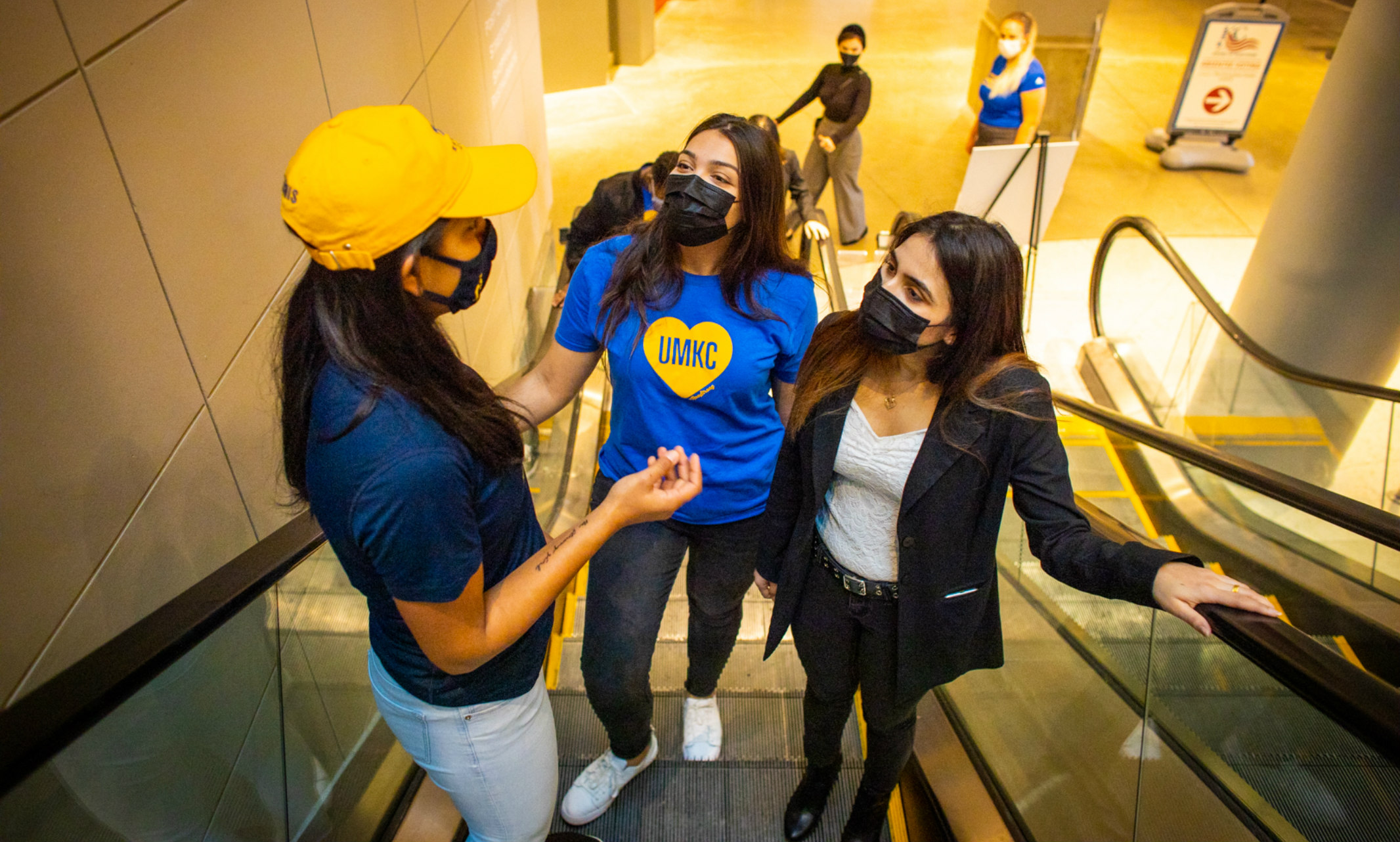
A year of investment, innovation and bold initiatives
The year 2021 will be remembered as the one in which UMKC created a sharply sloped upward spike in its growth graph, launching strong initiatives with impact that will be felt for years. The year saw the opening of a new high tech research center, the launch of the UMKC Forward reimagination initiative, the unveiling of a new outdoor artwork to serve as a campus rallying point, and much more.
Here are the university’s Top 10 stories of 2021.
UMKC Forward Will Invest More Than $50 Million to $60 Million for Excellence and Achievement
The University of Missouri-Kansas City rolled out its UMKC Forward plan, pledging to invest more than $50 million to $60 million over the next five years in five key investments. Chancellor Mauli Agrawal said the investments are designed to achieve growth and excellence for Kansas City’s university. In addition, the university will spend another $5 million to hire new faculty in key strategic areas over the next three years.
Introducing a Bold New Concept in Higher Education: Professional Career Escalators™
A centerpiece initiative of the UMKC Forward plan will create the university’s signature Professional Career Escalators™ program. This innovative student success initiative includes a unique system of personalized support and services to propel students from their academic studies to good-paying careers. University officials believe the combined features and goals of the program make it unlike anything being offered at any other college or university in the United States.
UMKC Welcomes Public to $32 Million High-Tech Research Center
The five-story, 57,800 square-foot Robert W. Plaster Free Enterprise and Research Center features 11 state-of-the-art research labs. It is the largest privately-funded capital project in UMKC history, with more than 25 donors.
Roo Sculpture by Artist Tom Corbin Settles Into New Home
UMKC students, faculty and staff welcomed the newest UMKC Roo to campus in the first public event since the beginning of the COVID-19 pandemic. Mahreen Ansari, UMKC Student Government Association president, introduced the Roo sculpture by artist Tom Corbin that stands proudly in the heart of campus on the University Walkway near the Miller Nichols Library and Learning Center.
Commencement at The K: Unique In Every Way
The university emerged from more than a year of pandemic isolation in spectacular fashion, as the community celebrated the degrees earned by more than 2,300 graduates in a historic two-day commencement celebration at Kauffman Stadium, home of the Kansas City Royals.
UMKC Awarded $5 Million to Fight COVID on the East Side
The Jackson County Legislature has appropriated about $5 million in CARES Act funding to a project led by UMKC to promote and deliver widespread COVID-19 vaccinations and other health services to neighborhoods on Kansas City’s east side, the city’s most socially vulnerable community.
UMKC to Serve as Backbone for $10M National STEM Education Initiative for Students with Disabilities
The university will serve as backbone for a $10 million research effort from the National Science Foundation, or NSF, to promote science, technology, engineering and mathematics, or STEM, education among students with disabilities. Auburn University will lead the five-year project while UMKC will "backbone," or guide vision and strategy, support aligned activities, establish shared measurement practices and support the implementation of research, according to the NSF.
African American Students Cite Chancellor for Leadership
The African American Student Union (TAASU) surprised Chancellor Mauli Agrawal in his office April 12 with the presentation of the Dr. Joseph Seabrooks Jr. Leadership Award. The award recognizes the service, leadership, professionalism and dedication of a faculty or staff member. TAASU members wanted to let the chancellor know how much they appreciated his leadership during the difficult social justice events of the past year.
$15.2M Renovation Underway at Bloch Heritage Hall
When completed, the renovation of Bloch Heritage Hall will be more than new carpet and reconfigured classrooms. It will be even more than eye-popping technology, although the reimagined facility that has anchored the Bloch School since its earliest days also will get that. The $15.2 million renovation, expected to welcome students by the Fall 2022 semester, is really about fulfilling its namesake’s unwavering vision of excellence for the school.
RoosDo: UMKC Launches New Campaign to Highlight Success Stories
The university launched a new branding and marketing campaign to demonstrate how UMKC people are powering our community by making discoveries, serving others and challenging the status quo.
Dec 13, 2021
Eight students honored for academic excellence, leadership and service
Eight graduating seniors who have excelled in both academic achievement and service were named as a Dean of Students Honor Recipients this fall. This program recognizes the exceptional students who maintain high scholastic performance while actively participating in University and community leadership and service activities outside of the classroom. Students were nominated by faculty and staff across campus for the honor.
The Division of Student Affairs hosts a breakfast for the recipients to celebrate this distinguished award with their family and nominators.
For many of the students, it is one of the last events that give them an opportunity to reflect upon their career at UMKC before they cross the stage at Commencement. Fellow awardee Morgan Kensinger had this to say about what her experience as a Roo has taught her.
"As a medical student at UMKC, I have seen how imperative and remarkable human connection can be. Holding the hand of a fearful patient. Sharing a laugh with a classmate after a stressful exam. Listening to stories from my mentors. Giving a helping hand to a member of our KC community. Connection defines us," she said. "And while we are all here to celebrate the service and honorable acts that we have completed over the past several years, I think we can all agree that it’s not the act itself that binds us, but the stories and moments shared. I have been so incredibly privileged to learn alongside amazing students and work with truly resilient patients. It is my sincerest hope that I take the lessons learned and appreciation for human connection forward with me in my career."
Congratulations to the Fall 2021 Honor Recipients!
· Nichole Alexander, College of Arts and Sciences, nominated by Lynne O’Dell
· Courtney Dorris, School of Medicine, nominated by Brent McCoy
· Anya Joyo, School of Medicine, nominated by Krisana West
· Morgan Kensinger, School of Medicine, nominated by Muhammad Shah Miran
· Micah McGlaughlin, School of Biological and Chemical Sciences, nominated by Katie Garey
· Victoria Pavlik, School of Nursing and Health Studies, nominated by Matthew Chrisman
· Matthew Robinson, College of Arts and Sciences, nominated by Mathew Forstater
· Krithika Selva Rajoo, College of Arts and Sciences, nominated by Crystal Doss
Dec 10, 2021
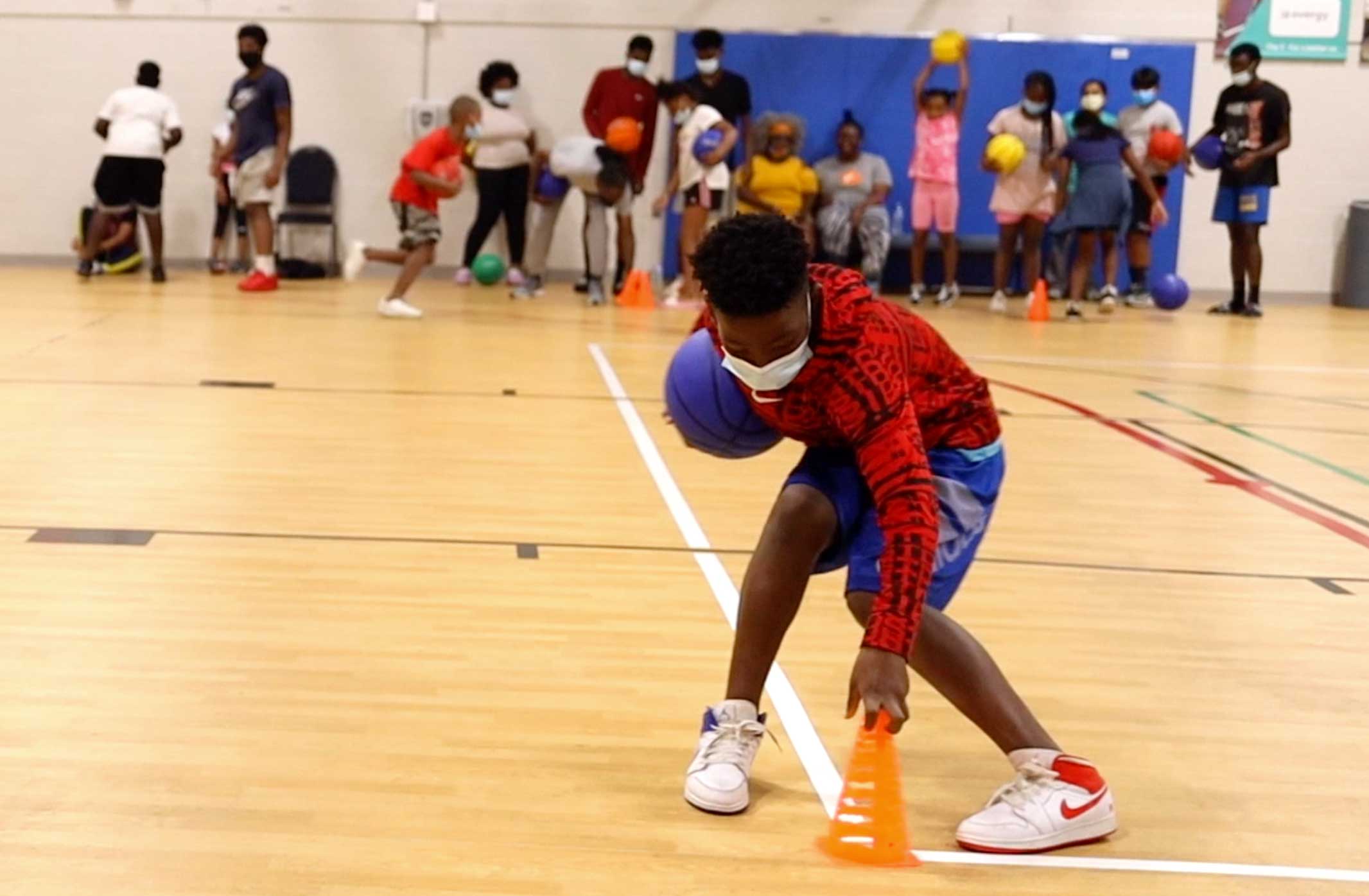
Advocating for physical education as public health policy
If parents notice a more active school day for their kids, they can thank two public health researchers at the UMKC School of Nursing and Health Studies. Joseph Lightner and Amanda Grimes authored recommended changes to physical education requirements nationally. The new guidelines recommend kids get at least 60 minutes of physical activity each school day.
“With these guidelines laid out and the evidence supporting them,” said Grimes, “we hope that someone working at the local level can use these to enact change in their community.”
According to Grimes, the guidelines have academic benefits as well. “Is physical activity of lesser value than academics?” said Grimes. “We just know that the research shows they are tightly correlated. Kids who are more physically active do better in school, behaviorally and academically.”
Lightner and Grimes work with the local program Move More, Get More, whose goal is to increase physical activity and nutrition among middle school students in Kansas City public schools. Part of the program tracks how active students are in their daily lives through pedometers so Grimes saw first-hand the affect the pandemic had on these students.
“After the pandemic hit, the kids’ activity levels went down to 40 minutes a week,” said Grimes. “That means in an entire week, they’re not even meeting what we’re hoping for in a day.”
Lightner knows that sustained behavior change is hard, but the research in the field of public health has found that it’s easier to get kids active than to get adults to change sedentary ways.
In response to that, Lightner and Grimes are advocating for not only an increase in physical activity, but also physical literacy so students can carry an active lifestyle into adulthood. With extracurricular athletics getting more and more competitive, kids can get left behind and lack the skills in adulthood to participate.
“I was super involved in sport growing up,” said Grimes. “I think about how that impacted my life and trajectory, not only in my career, but also taking a healthy lifestyle into adulthood.”
Lightner readily admits that he didn’t like physical education classes when he was in school. But he is also training for a half-triathlon, so he’s not one to shy away from being active. The difference is he’s found joy in his pursuit of being a triathlete.
“Enjoyment is one of the best predictors of physical activity throughout life,” said Lightner. “I love physical activity but not in school. I tried to get out of PE as much as possible.”
But Lightner knows that physical activity is one of the simplest and cheapest ways to combat the most common chronic health problems: heart disease, cancer, diabetes, etc. “It’s always thrown around in public health circles,” said Lightner, “but if physical activity was a pill, it would be the most prescribed medicine on the planet.”
According to Lightner, physical activity is a relatively young area in the field of public health but that doesn’t take away from its importance. “Policy is a long road,” said Lightner. “I think it’s important to note that it took us a long time to get to this point and it will take some time to get to the next step.”
Dec 10, 2021
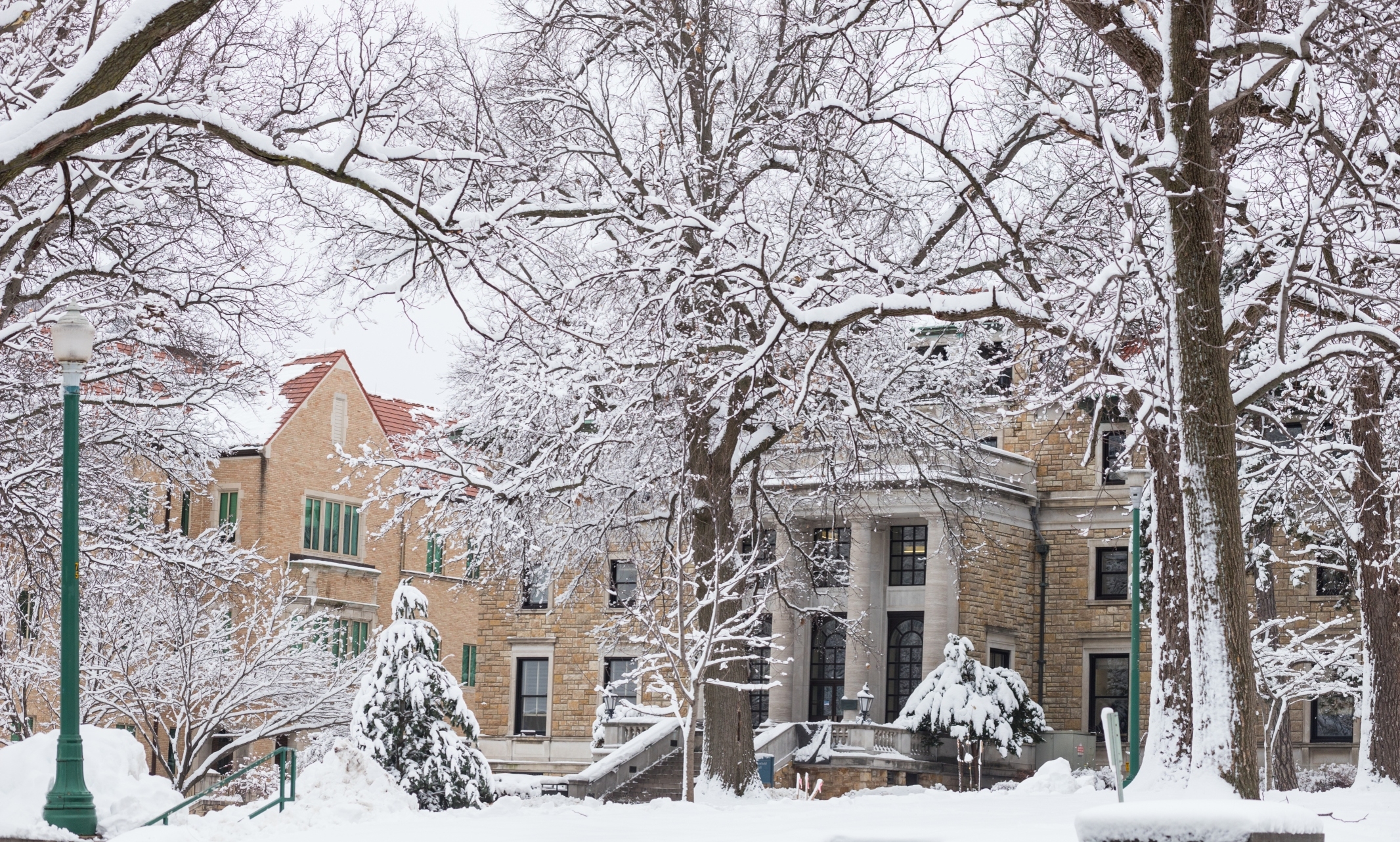
Here’s how to give
While the UMKC campus is closed during Winter Break, it’s still easy to make a year-end gift by observing the following guidelines.
UMKC offices will be closed Friday, Dec. 24 through Friday, Dec. 31. All gifts must hit UMKC Foundation accounts by Dec. 31 to receive tax credit for the 2021 calendar year. Checks and cash need to be postmarked on or before Dec. 31.
Credit card and stock gifts must hit the UMKC Foundation accounts by Dec. 31 to receive tax-credit for the 2021 calendar year. Checks and cash need to be postmarked on or before Dec. 31
The date UMKC receives and processes checks and cash from the mail has NO impact on a donor’s taxable year contributions. The “gift date” for the IRS is the date the donor relinquished control, not the date the gift is processed.
Availability and Contacts
The Office of Gift Processing will be available Thursday, Dec. 30 from 8 a.m. to noon to accept year-end gifts. The Office of Gift Processing will be closed on December 31 through the remainder of winter break and will re-open with regular business hours on Monday, Jan. 4.
The UMKC Foundation Office will be closed during winter break. Should you have any inquiries during that time, please call 816-235-5778 and someone will return your call.
For any stock gifts or wire transfers, please contact UMKC Foundation Accounting at umkcfoundationaccouting@umkc.edu.
Inquiries about all other year-end gifts can be directed to Sara Hampton at 816-235-5329 or via email to umkcgiftprocessing@umkc.edu. The Office of Gift Processing will also be taking calls at 816-235-1566 during the office hours listed above.
Gift Timing
Checks must be in an envelope postmarked prior to Dec. 31, 2021 to be credited in the 2021 tax year. If the envelope received is postmarked after Dec. 31, it will be counted as a 2022 gift. Donors should send their checks to the address below:
UMKC Office of Gift Processing 112 Administrative Center 5115 Oak Street Kansas City, MO 64112
Checks dated prior to Dec. 31, along with postmarked envelopes, should be received in the Office of Gift Processing on or before Friday, Jan. 7, 2021. Gifts received after that point will not be automatically included in processing for the annual tax receipt.
For stock gifts or wire transfers, please contact Tracie Rodriquez at tar9pn@umkc.edu for the transfer form and DTC instructions. Stock gifts must be received into the account on or before Dec. 31 in order to be reflected in 2021 tax period, per the IRS.
In order to liquidate the stock gift, it is required to provide the donor’s name, number of shares, security, expected date of transfer and area for where the gift is intended. This information can be completed on the transfer form or sent via email. Stock gifts will not be liquidated until confirmation of this information is received.
Mutual funds take an additional 3-5+ business days before posting to our account. Please advise your donors to have their brokers initiate any mutual fund transfers no later than Dec. 21. Regular equity stock takes 24 hours to post to our account.
Credit card transactions must be received by the Office of Gift Processing by 5 p.m. Dec. 31 to be reflected as a year-end gift. Credit cards may be called into the Office of Gift Processing on Dec. 30 from 10 am to 2 pm at 816-235-1566 or the form may be hand-delivered. On December 31, credit cards can ONLY be called in to 816-235-5329.
Credit card gifts may be made online through the UMKC Foundation website until midnight on Dec. 31 to be reflected as a 2021 gift. Any online credit card gifts received after midnight Dec. 31 will be dated in January.
Gifts received after hours may be deposited in the night deposit box located beside the Cashiers Office at the Administration Center lobby and will be processed the following business day. Credit card gifts received through the lockbox will be dated the following business day. Credit card forms dropped off on December 30 after 2 PM will not be processed until January 3, 2022.
Giving 2022 Information
Dec 08, 2021
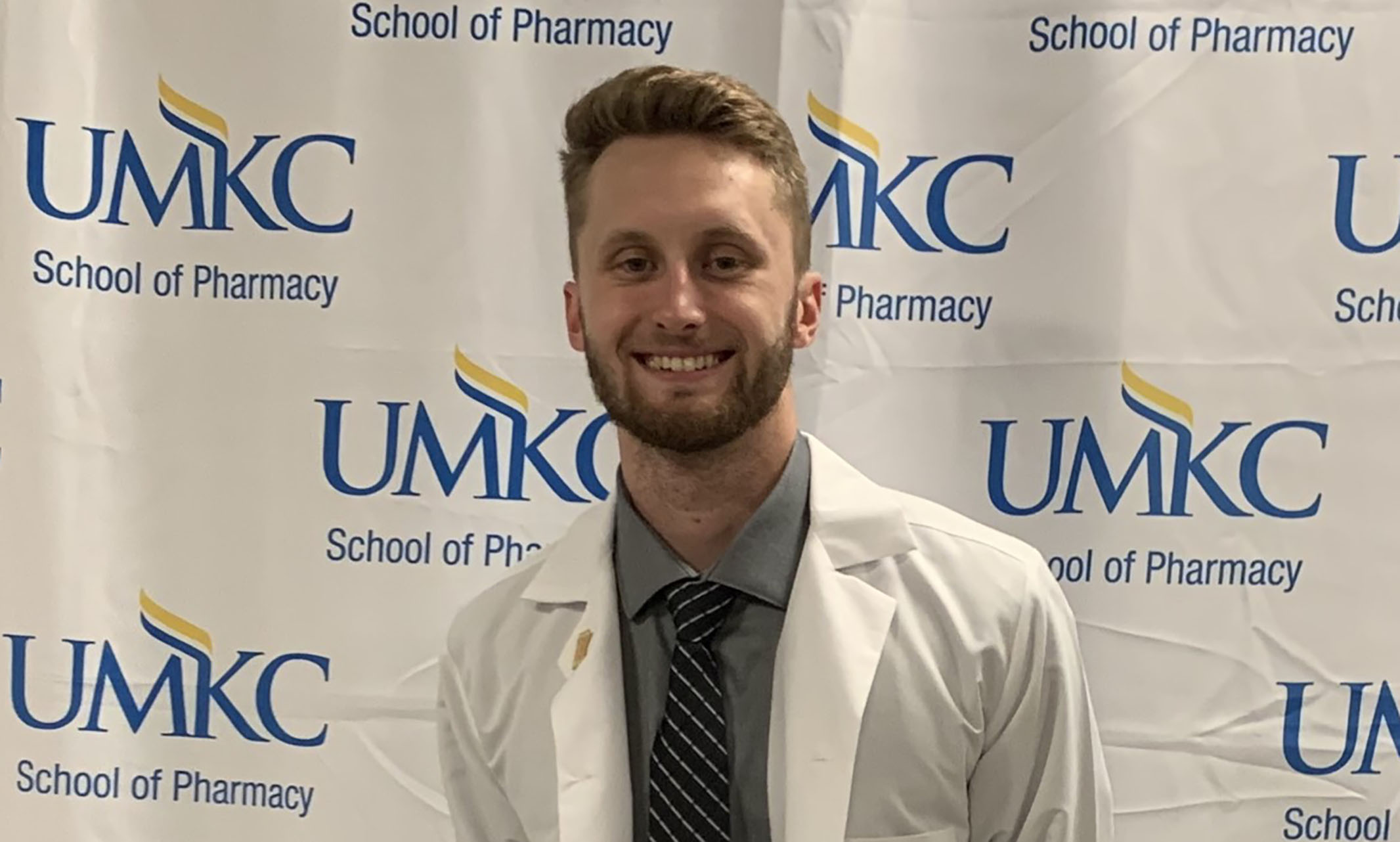
School of Pharmacy student's resume of success, leadership stands out
Brady Smith was still in middle school when he felt the tug of his career calling. It started with a job shadowing opportunity at school. Following his pharmacist father seemed like a safe bet.
“Dad was the one I job shadowed because of the convenience,” Smith said. “And I figured out, hey, I really kind of like pharmacy. Pretty much from sixth grade on, I’ve known that I’ve wanted to go into the pharmacy field.”
Smith began working in his father’s community pharmacy in Neosho, Missouri, during his senior year of high school. His career path hasn’t veered much since.
Now a fourth-year pharmacy student at the UMKC School of Pharmacy’s Missouri State University campus in Springfield, he is an accomplished student, a mentor for younger students and an ambassador for the School of Pharmacy.
He’s also the Missouri Pharmacy Association’s Student of the Year. Presented annually, the award recognizes a pharmacy student for commitment to pharmacy and community, participation in pharmacy organizations and community involvement.
The award caught Smith off guard.
“I didn’t even know it was a thing. I was actually quite surprised,” Smith said. “I was very honored to receive the award.”
His resume made Smith a perfect candidate for the award.
Since moving to Springfield to attend college, he has spent the past four years working as a pharmacy intern at a local community pharmacy.
“It’s really the niche that I enjoy in pharmacy,” Smith said. “I've been working there since before I got into pharmacy school. I feel like that's kind of helped me through the pharmacy curriculum as well.”
Earlier this year, Smith took an elective course in business planning. He and three classmates teamed up to participate in the Community Pharmacist Association’s Student Business Plan Competition. Their plan was strong enough to place them in the top 10 in the national competition.
Smith points to his leadership experience as a highlight of his student career. He’s been a student liaison on local and national committees, while at the same time doing weekly tutoring sessions with third-year pharmacy students. He also serves as a student ambassador for the School of Pharmacy. It’s a big responsibility helping students on the Springfield campus get and stay connected to the school in Kansas City.
“You’re the face of the UMKC School of Pharmacy, welcoming new students, attending orientation and helping students transition into pharmacy school,” Smith said. “That role has a lot of responsibility and a lot of merit.”
Smith exemplifies the quality of students at the School of Pharmacy, said Paul Gubbins, Pharm.D., associate dean for the UMKC School of Pharmacy at Missouri State University.
“UMKC School of Pharmacy has the best student pharmacists,” Gubbins said. “They contribute much to their communities and our profession, which has been recognized time and time again at the national and state level. Being from the Springfield site, we are incredibly proud of Brady. He is someone who has demonstrated himself as a student leader since the day he started our program. In addition, he is passionate about our profession and thus, I have no doubt he will be an excellent pharmacist and accomplish much in his career. I will be excited to see his future achievements for many years to come.”
Smith is on track to graduate from pharmacy school next May. But he’s already looking at extending his academic career. Next up, he hopes, will be a residency to prepare him to work in ambulatory care or possibly academic pharmacy.
“It’s a one-year residency and they say that you get three years’ worth of teaching in that one year,” Smith said. “I’d love to get that additional knowledge and information before I get out there in the real world.”
Dec 08, 2021
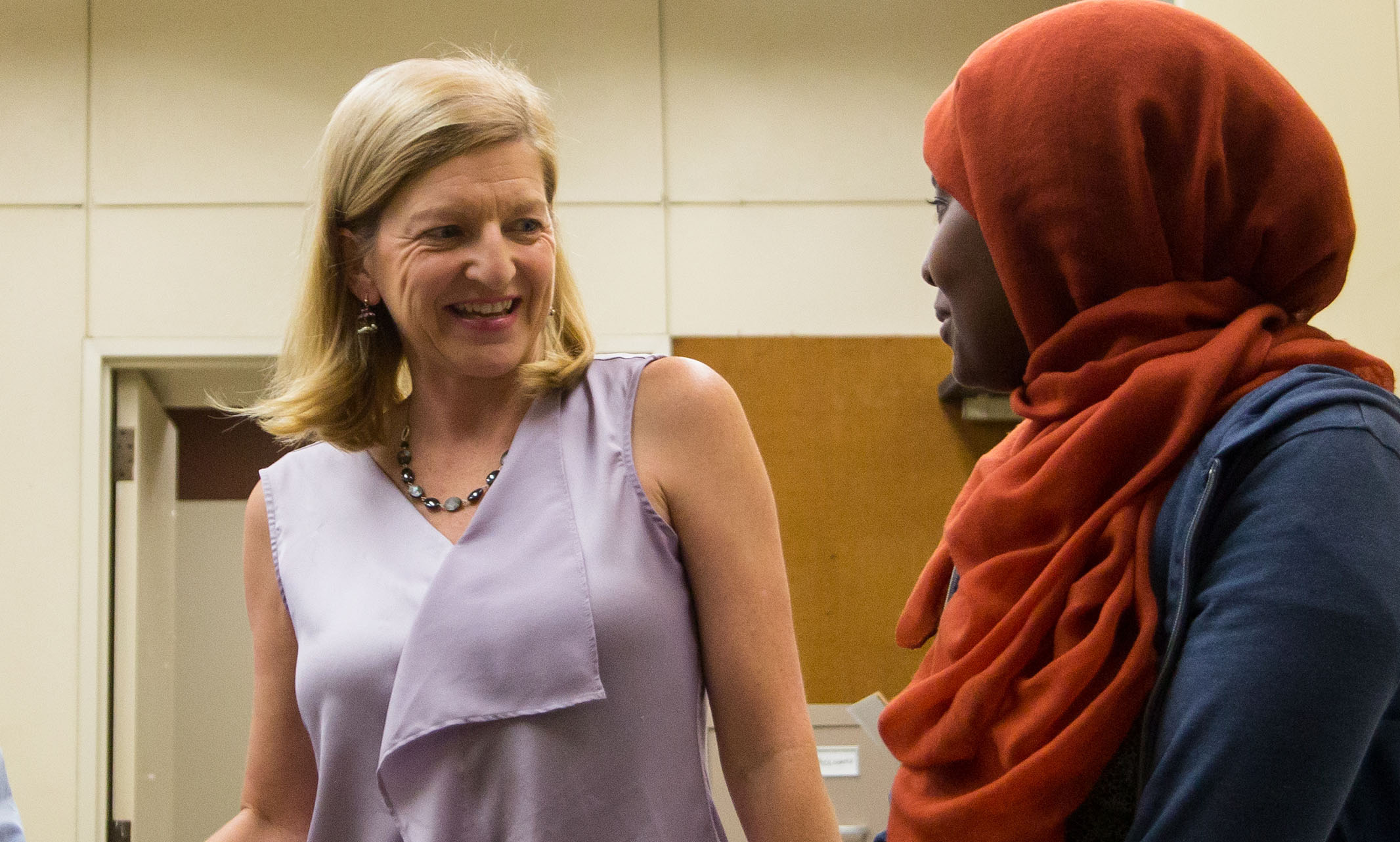
Study is part of part of a 5-year, $3 million projected supported by the National Institutes of Health
UMKC School of Medicine researcher Paula Monaghan Nichols, Ph.D., has received a $867,000 National Institutes of Health grant to look into a treatment that minimizes neurological side effects for a chronic lung disease that affects a significant number of premature babies.
The project is part of a multi-principle investigator initiated proposal between Monaghan Nichols, Dr. Venkatesh Sampath from Children’s Mercy Hospital Kansas City, and Dr. Donald DeFranco at the University of Pittsburgh School of Medicine, Pennsylvania, that totals more than $3 million in NIH funding over a 5-year period.
The research will explore the use of Ciclesonide (CIC), an inhaled steroid currently used to treat asthma, as an alternate therapy for bronchopulmonary dysplasia (BPD). BDP causes tissue damage in the tiny air sacs of the lung leading to severe respiratory distress. It is often the result premature birth and mechanical oxygen ventilation. The disease touches nearly seven of 10 infants born before 28 weeks of gestation. In the United States, that is an estimated 10,000 to 15,000 babies a year.
There is currently no cure for BPD but clinical treatments to limit inflammation and the progression of BPD include long-acting synthetic drugs such as dexamethasone. Those drugs, however, also come with a significant risk of adverse effects on a child’s systemic growth and neurodevelopment that can lead to long-lasting changes in brain structure and function.
Monaghan Nichols, associate dean for research, professor and chair of Biomedical Sciences, said infants that acquire BPD face significant mortality rates. Survivors often have recurrent hospital visits, need for respiratory therapies and persistent limitations in pulmonary function.
“Therefore, there remains a need for a pharmacotherapy for BPD in neonates that will have beneficial anti-inflammatory and lung maturation effects, but limited adverse neurological side effects,” Monaghan Nichols said.
Preliminary studies have found that Ciclesonide, even with intermittent doses, can suppress acute lung inflammation with limited neurological alterations in rat models.
“Given the established safety of CIC in very young children, the clinical translation of our proposed studies to human neonates could be expedited, particularly given the limited, safe and effective therapeutic options available for treating or preventing BPD in susceptible premature infants,” Monaghan Nichols said.
Dec 07, 2021
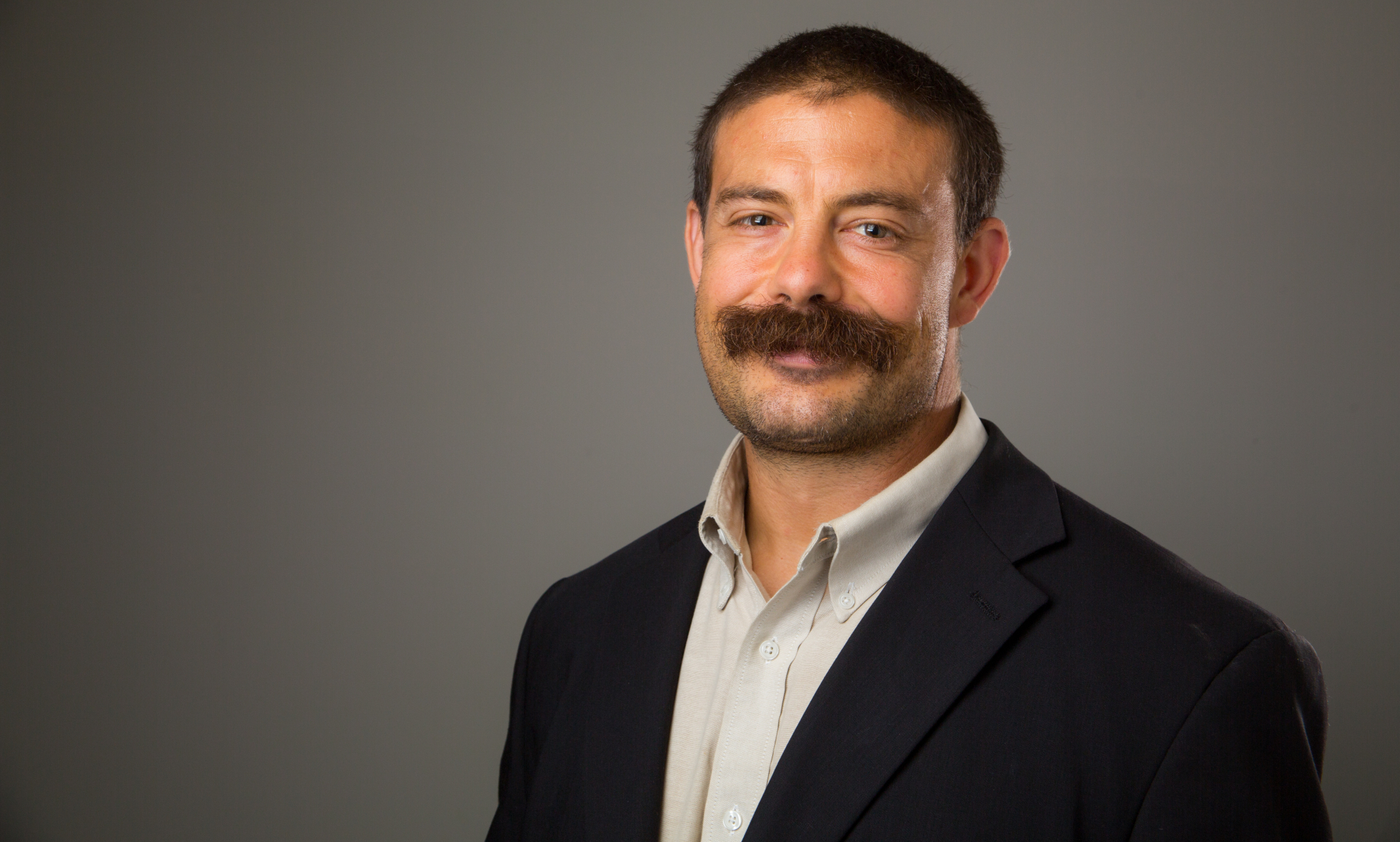
Anthony Caruso becomes the second UMKC faculty member in two years to earn prestigious fellowship
Anthony Caruso, a UMKC faculty member, has been named a Fellow of the National Academy of Inventors — the highest professional distinction awarded to academic inventors.
The NAI Fellows Program highlights academic inventors who have demonstrated a spirit of innovation in creating or facilitating outstanding inventions that have made a tangible impact on quality of life, economic development and the welfare of society.
Caruso's research team conceptualized, and for the first time, showed certain nuclear materials could be identified by their neutron emitting fingerprint. His team has also developed methods for making nuclear batteries, new techniques to generate and radiate high power microwaves for electronic attack and materials that reduce the size of computer chips.
"Receiving this honor means that our team was able to collectively execute on technology that is deemed new, novel and useful," Caruso said. "Coming together as a team is important and should be held in high regard."
Caruso wears many hats at UMKC, serving as professor in the College of Arts and Sciences and School of Computing and Engineering as well as the Associate Vice Chancellor of Research.
Beyond the university, he is highly regarded as a national expert in atomic physics and has a long-standing record of federal research support from the Department of Defense, specifically the Office of Naval Research and Defense Threat Reduction Agency. Caurso is also among a team of researchers at the Missouri Institute for Defense Engery.
"As our team forges ahead, we hope to make major changes in the affordability of whole foods, through urban horticultural engineering, and, in education, through platforms that can adapt the individual and their learning style to enrich and accelerate the information they ingest, retain and use to solve the wicked problems of tomorrow, Caruso said.
UMKC Chancellor C. Mauli Agrawal nominated Caruso for the fellowship. Upon finding out he had been named, Caruso said his first reaction was, "Chancellor Agrawal has my back."
"Tony's work is extraordinarily groundbreaking, and he has made a difference in the lives of many," Chancellor Agrawal said. "UMKC is proud to call him one of our own and is delighted to continue supporting him in his future endeavors."
Caruso is the second UMKC faculty member in the last five years to be named a Fellow of the NAI. Last year, Reza Derakhshani, professor in the School of Computing and Engineering and developer of a biometric technology that makes the eye the only password needed to secure smartphone and mobile devices, received the honor.
The 116-member 2021 Class of Fellows of the National Academy of Inventors will be inducted at the NAI 11th annual meeting in June 2022. The National Academy of Inventors is a member organization comprised of U.S. and international universities and governmental and nonprofit research institutions with more than 4,000 individual inventor members and Fellows spanning more than 250 institutions worldwide.
The NAI was founded in 2010 to recognize and encourage inventors with patents issued from the U.S. Patent and Trademark Office, enhance the visibility of academic technology and innovation, encourage the disclosure of intellectual property, educate and mentor innovated students and translate the inventions of its members to benefit society.
Collectively, NAI Fellows hold more than 42,700 issued U.S. patents, which have generated over 13,000 licensed technologies, 3,200 companies and created more than one million jobs.
Dec 07, 2021
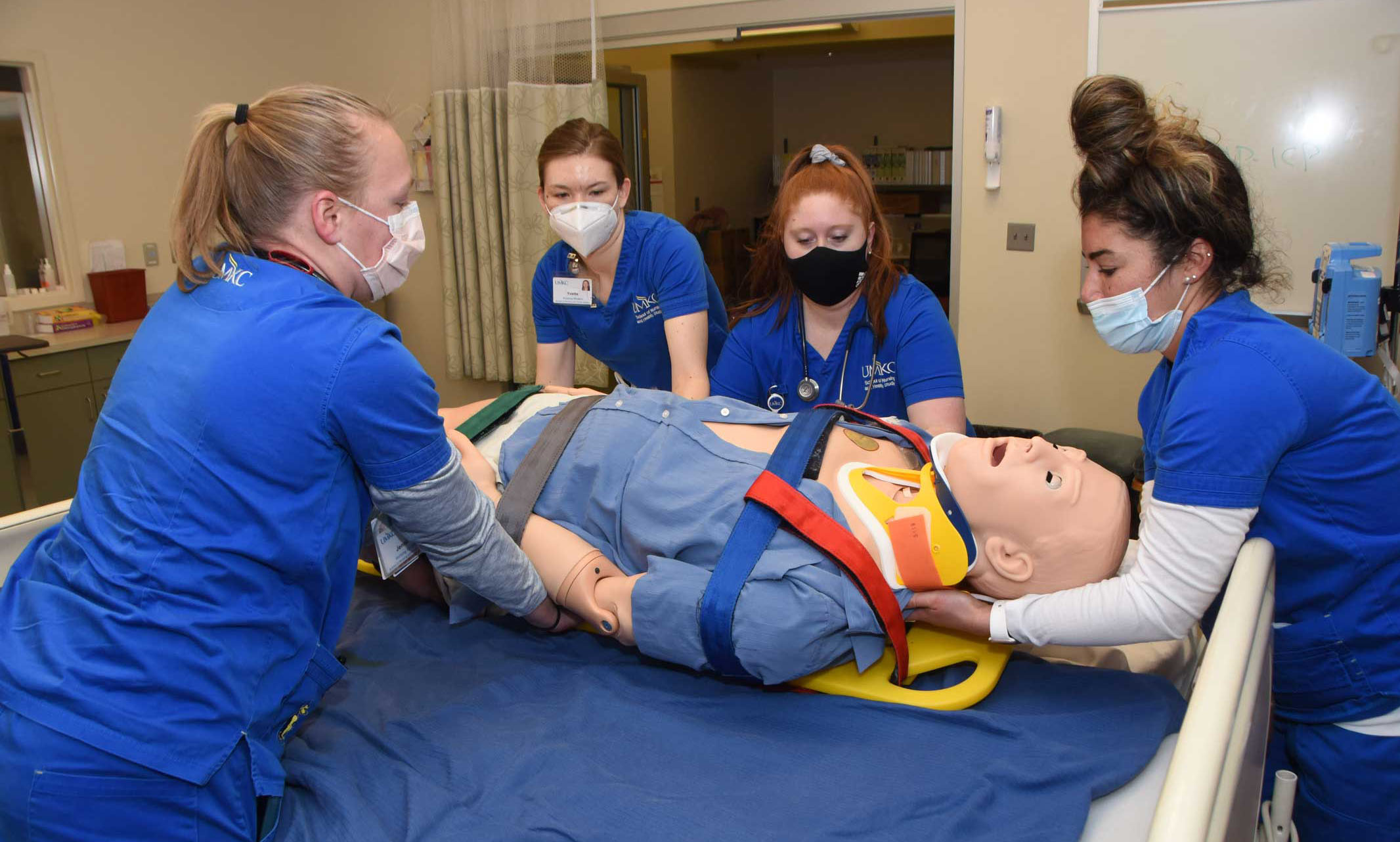
Nursing enrollment and applications increase in response to pandemic
The global pandemic directed a spotlight on many important roles within the health care profession. From contact tracers to frontline nurses to emergency room doctors, COVID has pushed health care careers to the fore front, particularly nursing.
For those in health care higher education, the question is how that attention affects the plans of future college students. Does it ignite an interest in health care or upend prospective students’ best-laid plans?
The answer is taking focus with recent data from the American Association of Colleges of Nursing. Nationally, enrollment is up 5.6% for baccalaureate, master’s and doctoral nursing programs. According to UMKC’s Joy Roberts, the UMKC School of Nursing and Health Studies is seeing a similar trend – but doubled.
“We saw undergrad applications jump by ten percent,” said Roberts, interim dean. “These prospective students were seeing the agony in their communities, in cities, and they wanted to help.”
Further proof for Roberts is the attendance she’s seen at UMKC’s First Semester Experience classes that focus on nursing. The university offers various courses designed for new students to explore the various career paths available at UMKC. Nursing offered two dates of its class, Thrills, Chills and Eeewww! Adventures in Nursing. Both proved popular with new students.
“We’ve had standing room only at our sessions,” said Roberts. “A lot of times, the students had never even thought about it – never even thought about going into nursing – until it was suddenly forced in the public eye because of the pandemic.”
At the UMKC School of Nursing and Health Studies, there are different academic paths to earning a nursing degree, as well as a degree in health sciences with minors in public health and exercise science.
Dec 02, 2021
New student program aims to encourage undergraduate research projects
Most students think research is something done by old men in lab coats, that it’s out of reach as they earn their undergraduate degree. Kimberly Johnson, Ed.D., is looking to change that.
Johnson has been an integral part of the UMKC community for the last twenty years in a variety of roles. Her passion, though, has always been working with and supporting students, particularly students of color. Her new role with Multicultural Student Affairs allows her an opportunity to do just that.
“Emerging Research Scholars is new a program with the UMKC Office of Multicultural Student Affairs that offers high-achieving, historically underrepresented students research projects in their field of study with faculty mentors,” Johnson said. “Scholars will receive academic, social and financial support while becoming integrated into the intellectual climate of the university.”
To utilize resources already available to UMKC students, Johnson reached out to Jane Greer, director of Undergraduate Research, to collaborate on this new student opportunity. Through this collaboration with the Office of Undergraduate Research and Creative Scholarship, students can be matched with a faculty mentor who can best support the student in their chosen field of research. The office was also able to offer work study positions to students in this first Emerging Research Scholars cohort.
“We've always tried to focus on making sure that our different opportunities serve the full range of UMKC students, including students from historically excluded groups,” Greer said. “We were especially excited that Dr. Johnson took on this new role in the Office of Multicultural Student Affairs and is working to create more ways to support these students in terms of getting them involved in research.”
Increasing student interest and involvement in research begins with encouraging them to conduct research in fields that interest them.
“This is not just for medical school, you could be studying arts and sciences, law, whatever field they want to study,” Johnson said. “We're hoping that they can find a faculty member or someone here in the Kansas City community that can help them. We do have some students who are not yet paired with the faculty member because we need more faculty mentors.”
Hannah Leyva, ’24, who just declared her major in Sociology, with an emphasis in Cultural Anthropology and minors in Spanish and Urban Studies, was one such student in this first cohort.
“I was not originally paired with a faculty mentor, and although this caused some uncertainty at first, it really was beneficial,” Leyva said. “As someone who has only recently declared their major, having the opportunity to reach out to professors instead of being automatically paired allowed me to investigate what kind of research I wanted to do. It is also overall helpful, as someone who wants to continue research in graduate school, to gain that experience of taking the initiative to network.”
Earth and Environmental Sciences student Amanda Mercier, ’22, is also thriving with the new connections she has made in the program, both student and faculty.
“Being part of the Emerging Scholar's Research Program this semester was incredibly motivating, insightful and helpful with regards to professionalism and getting involved in research or opportunities provided by the school or community,” Mercier said. “I felt that I constantly had a team of people that had my back and were a great source of information on any subject. I learned that the things that gave me anxiety or I struggled with, I wasn't the only one and didn't feel alone anymore.”
These conversations and the relationships that form from them are exactly what Johnson is hoping for. Her ultimate goal is for Emerging Scholars to gain experiences that will prepare them for graduate school and their future careers.
“Many of these students are just trying to get through their undergrad and are not thinking beyond,” she said. “How do we get our students, particularly students of color, thinking about grad school right now and what they need to do to prepare for it? If you're not prepared for graduate school, how does that help you in the workforce? If they're getting exposed to it, knowing that they can do research as an undergrad, they're more prepared to apply for graduate school.”
This is, of course, a main goal of the Office of Undergraduate Research, and Greer is thrilled that Emerging Scholars allows this connection with students that may not have been made otherwise.
“As the Emerging Scholars Program continues to grow, the future is really bright,” Greer said. “Dr. Johnson’s very astutely providing a lot of social support and structures to help students who may have never had these opportunities presented to them. We serve all students, and undergraduate research is something that every student UMKC should have an opportunity to get involved in.”
Leyva says she’s proud to be among the first cohort of this program and is grateful for the variety of opportunities the program can provide.
“What I found helpful about the Emerging Research Scholars is that there is a support system to help guide you through undergraduate research,” Leyva said. “It is not only your faculty mentor, but Dr. Johnson as well, and professionals who volunteer their time for research/graduate school workshops, and even other students in the program. It really is refreshing to be surrounded by others who understand the importance of diverse representation in research.”
If you are a UMKC faculty member interested in mentoring Emerging Research Scholars, please contact Kimberly Johnson at johnsonkimd@umkc.edu.
Nov 30, 2021
The 2022 Grammy Awards are set to air Jan. 31
The 2022 Grammy nominees have several ties to the UMKC Conservatory. Sandbox Percussion, a quartet comprised of UMKC Conservatory resident faculty members, received two nominations for their album, Seven Pillars. The quartet includes Ian David Rosenbaum, Jonny Allen, Victor Caccese and Terry Sweeney.
2020 Conservatory Alumni Achievement Award recipient Andrés Salguero and his wife, Christina Sanabria, were also nominated for Best Children’s Music Album.
Additionally, professor and pianist Alon Goldstein contributed to a nomination for producer Steven Epstein, whose nomination includes a composition by Goldstein.
KCUR featured KC nominees in a recent piece, which you can read here.
Nov 29, 2021
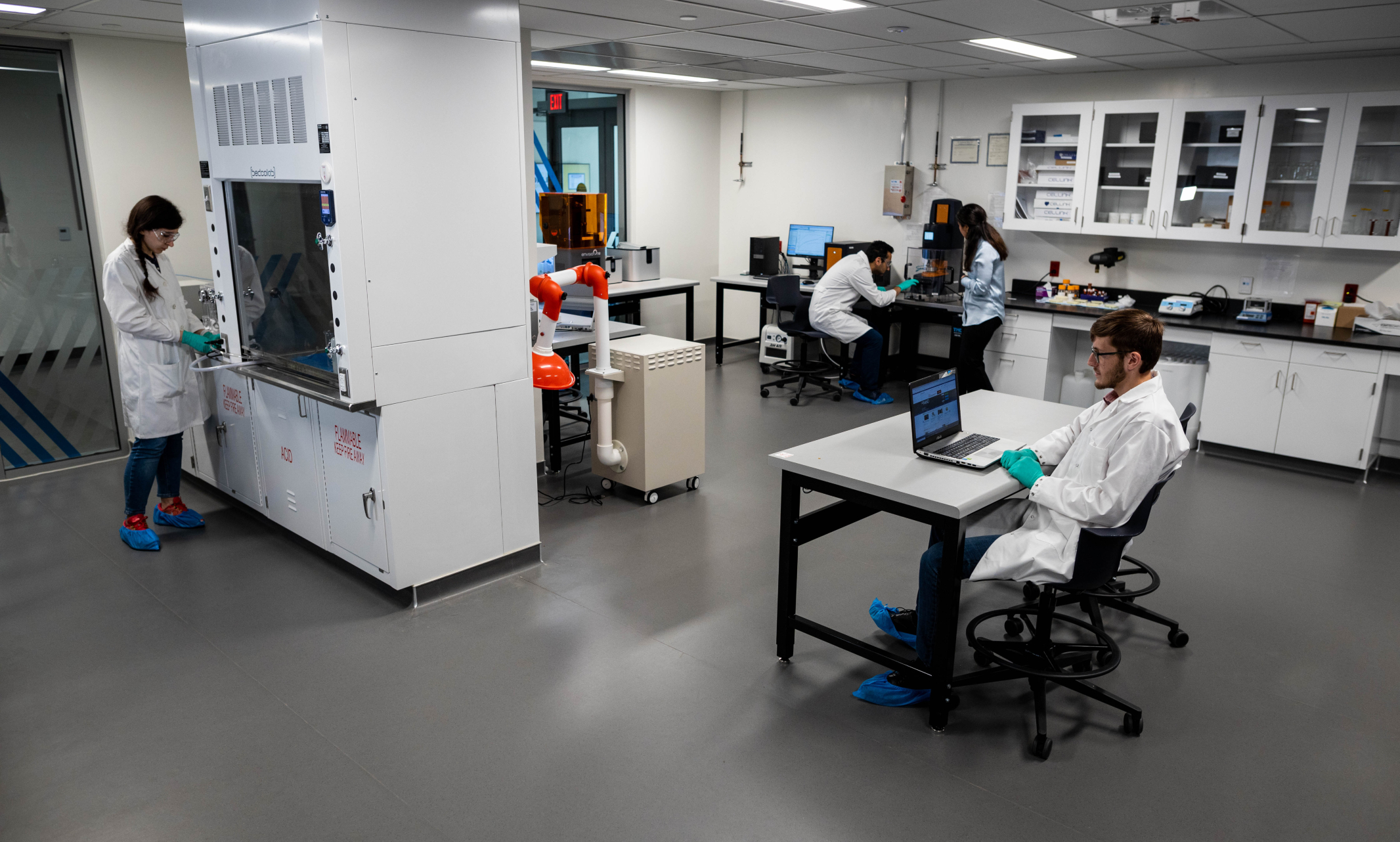
Research ranges from artificial intelligence to app design
In the second half of 2021, faculty from the School of Computing and Engineering have been awarded $906,604 in research funding.
Among those who have received funding is Reza Derakhshani, Ph.D., professor in SCE and head of the university's computational Intelligence and Bio-Identification Technologies Laboratory.
Derakhshani, whose research is primarily focused on eye vein pattern identity verification, was awarded $389,604 from the United States Army for a wearable deep vascular identification system.
Derkhshani is best known for leading the development of a biometric technology that makes the eye the only password needed to secure smartphones and mobile devices. The product, known as Eyeprint, was commercialized by the Kansas City-based startup EyeVerify.
The company was acquired by Ant Financial Services Group in 2016 for a reported $100 million. It maintains its headquarters in Kansas City and has been doing business as ZOLOZ since 2017. Derakhshani acts as the company's chief scientist.
In 2020, he was named a Fellow of the National Academy of Inventors.
Below is a complete list of research funding awarded:
$20,000 to Antonis Stylianou for statistical shape modeling for pediatric knees and ACL injury risk.
$150,000 to ZhiQiang Chen for an augmented reality pilot to demonstrate the flooding risk at 103rd Street in Kansas City, Missouri.
$100,000 to Jejung Lee for the development of GIS-based watershed need classification.
$50,000 to ZhiQiang Chen for HyperGLU: Hyperspectral and Geometric Learning for UAV-enabled plant species identification and localization.
$15,000 to Baek-Young Choi for using artificial intelligence without a data center for reliable wireless sensing and communication for space and extreme environments.
$15,000 to Sejun Song for the education of smart and reliable technologies for a future non-terrestrial network system.
$2,000 to Srvya Chirandas for a budgeting app that will be an outward-facing application that will give customers useful information about their full financial picture.
$55,000 to Amirfarhang Mehidizadeh for identification and understanding of major underlying mechanisms of asphaltene and deposition dynamics.
$389,604 to Reza Derakhshani for DVIS: A wearable deep vascular ID system.
$130,000 to John Kevern for timely and uniform application of curing materials.
Nov 29, 2021
UMKC law professor Sean O'Brien said that compensation for the exonerated Kevin Strickland is unlikely.
Strickland served nearly 43 years in prison before a judge threw out his conviction. O'Brien spoke with KCUR and the Kansas City Star following the judge's ruling to explain Missouri's laws on compensation for wrongful convictions.
Read his interview with the Star. (Subscription required)
Read his interview with KCUR.
Nov 23, 2021
Area schools struggle with students’ mental health
Marvalee Collins was interviewed by the Kansas City Star for a story titled, Your teen. Their trauma. Kansas City area schools struggle with students’ mental health, which sheds light on how the pandemic has exacerbated mental health concerns in schools, the need for more counselors, and how school counselors are a critical lifeline for children and teens facing mental health challenges.“The role of school counselors has transformed in recent years. They now serve the entire student body, focusing on both prevention and intervention by pinpointing three domains of learning: academic, social-emotional and career,” she said. “Having that mental health professional that is school-based is really critical. The school counselor may be the only mental health professional a student ever worked with”.Marvalee Collins is the coordinator of school counseling and practicum and internship at the UMKC School of Education.
Nov 23, 2021
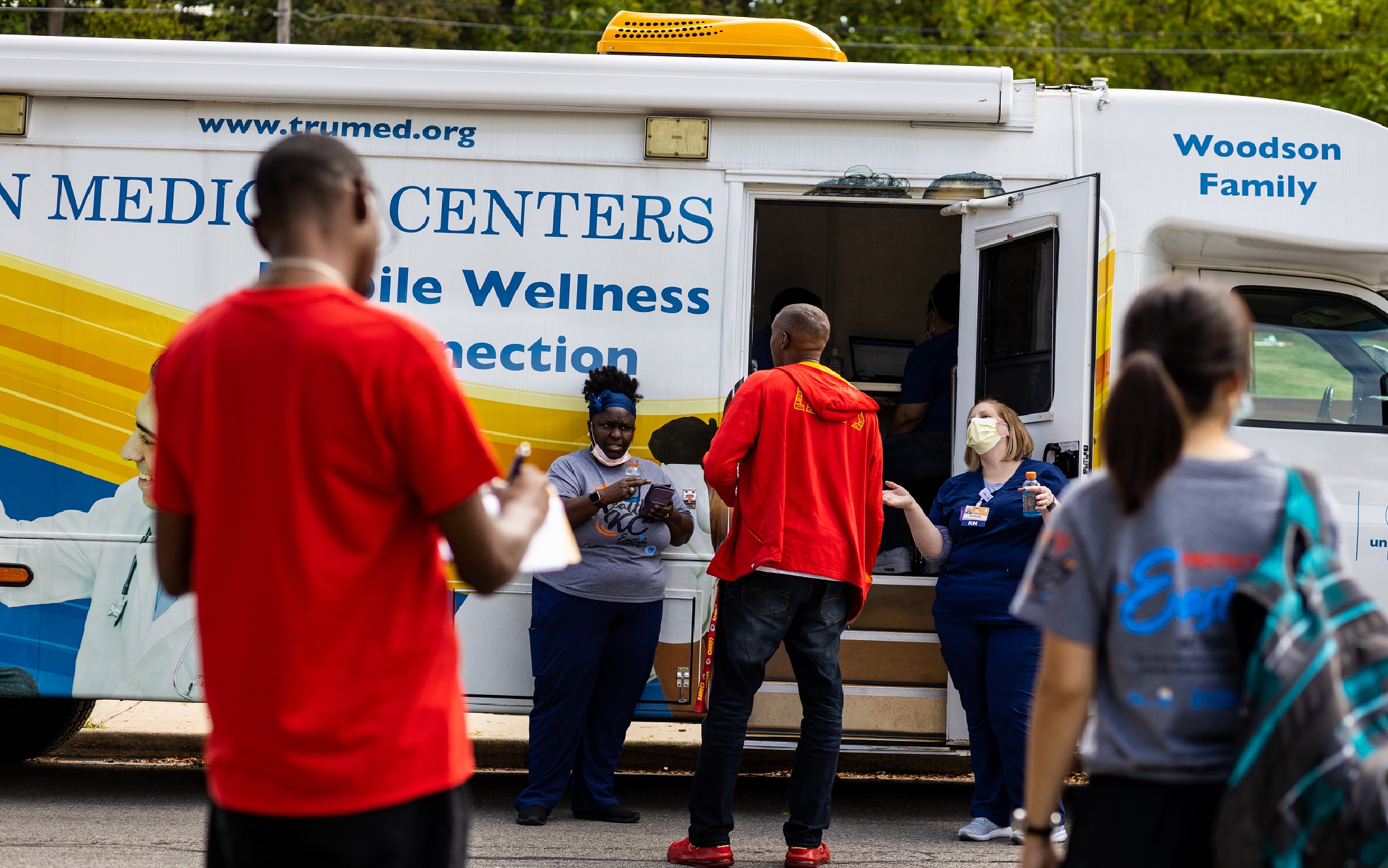
UMKC hosts discussion about facts and perceptions around vaccine hesitancy and availability for people of color
Community health leaders participated in a panel discussion on, “COVID-19, Vaccinations and (MIS)Information in Communities of Color.”
The Nov. 16 discussion was the tenth in the Critical Conversations series of panel discussions addressing systemic racism sponsored by the UMKC Division of Diversity and Inclusion. It was the second of the 2021-22 school year.
The Critical Conversations series is a part of Roos Advocate for Community Change, a campus-wide initiative launched in June 2020, which highlights thoughtful action on campus and in our community to ensure lasting and comprehensive changes. The goal of each Critical Conversation discussion is to enlighten, educate and explore the causes and potential cures for racism. Attendance to the discussions is free.
Panelist for this session included:
Jannette Berkley-Patton, Ph.D., professor, department of biomedical and health informatics, UMKC School of Medicine, and director of the UMKC Health Equity Institute
Liset Olarte, M.D., division of infectious disease, Children’s Mercy Kansas City
Qiana Thomason, M.S.W., president/CEO, Health Forward Foundation
Frank Thompson, interim director of health, Kansas City Health Department
Excerpts of the conversation are below. To view the complete recording of the conversation, click here.
History of mistrust in the health care profession by people of color
Olarte: Mistrust in the healthcare system stems from historical events related to discriminatory practices that have impacted communities of color that may continue to this day. The most known example of unethical experimentation in health care is the Tuskegee syphilis study which lasted 40 years. It ended in the in the 70s, so not that long ago.
This study targeted about 600 black men with and without syphilis, conducted by the U.S. public health service and the Tuskegee Institute. The study examined the natural course of the infection of syphilis in the participants, but they were not informed of the real purpose of the study. And what is more concerning is that once penicillin became the standard of care, the participants were not offered treatment. Syphilis can cause permanent neurological and cardiac damage, and can be potentially life threatening. This experiment has deeply impacted the relationship between the black community and the healthcare system.
Solutions in improving and tracking chronic condition management
Thomason: It's time for us to begin to look at the disparate outcomes that result in health injustices, and it's time for our states - Missouri and Kansas - and our Federal Government to require the use of race, ethnicity and language data, so that we can ensure that we have the full picture. We cannot change what we cannot measure.
Providing healthcare where people are
Thomason: We’ve seen that the best and most promising practices here locally, as well as nationally, focus on connecting underserved communities with health care services through channels that offer proximity and trust, like our faith-based communities.
UMKC role in furthering virus information and vaccination
Thompson: The UMKC group that Jeannette Berkeley-Patton heads, has access to a faith-based network that targets the populations [in Kansas City] that are the most underserved in terms of vaccine access and distribution, and have been the hardest hit in terms of cases. One of the things I’m the most excited about is that the federal grants that allow us to get out and work with community organizations that not only work with COVID awareness, but also around developing their own organizational capacity.
Improving overall health through community connection
Our medical system is set up to treat sick people. When you’re really talking about improving health, you need to talk abut relationships, so we need to think about how we restructure our medical systems. COVID is a really good litmus test. With COVID, more than ever before, we saw health services being pushed into the communities where people live.
Nov 18, 2021
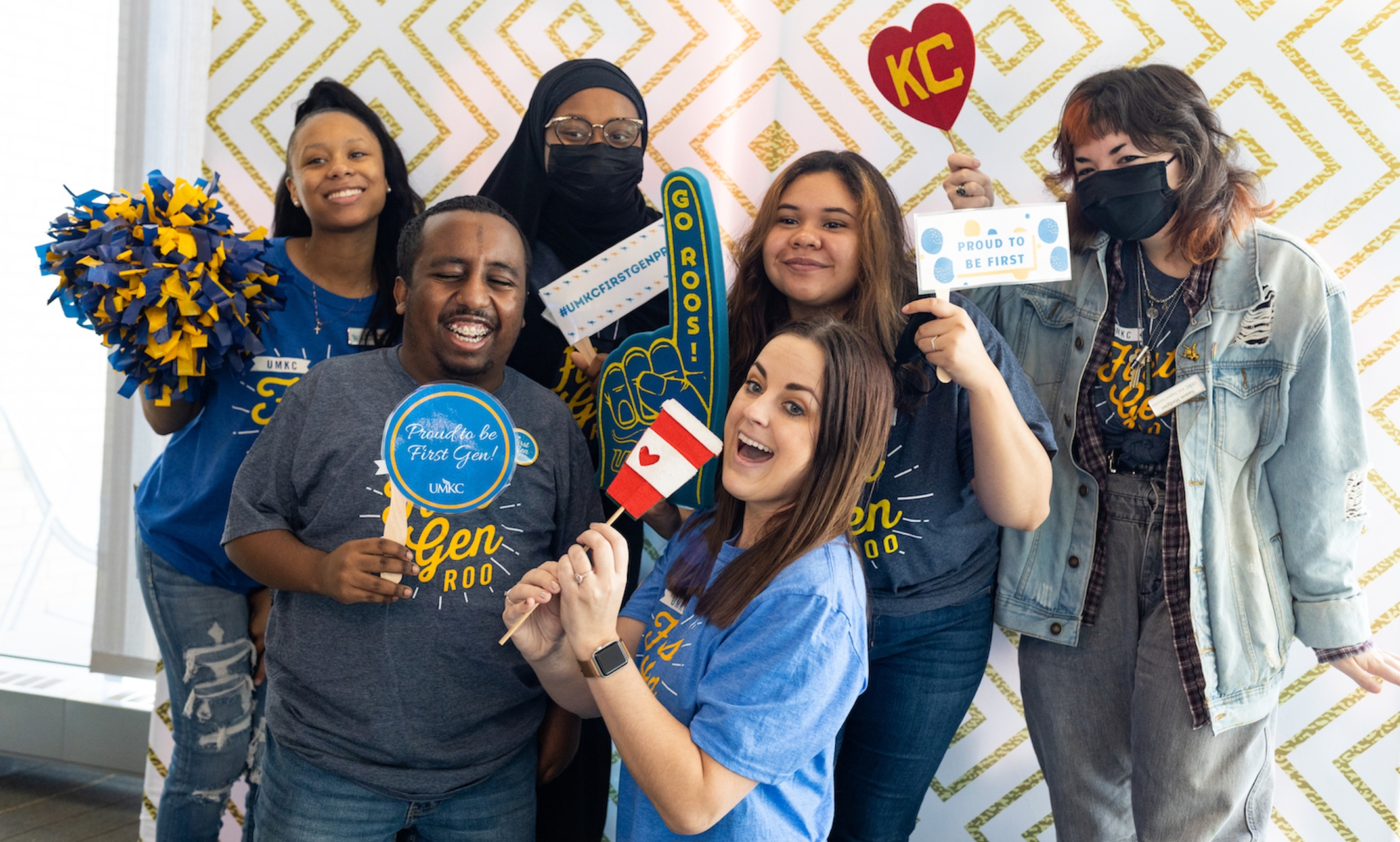
Connections and resources for first-generation students at UMKC
Student voices filled the air as peers and mentors mingled amongst each other with the occasional clash of jumbo Jenga blocks in the background in the Student Union as UMKC’s First Gen Roo Program celebrated the success of its students.
A National First-Generation College Student Celebration took place across the country on Nov. 8 and at UMKC, the activity revolved around the UMKC First Gen Roo Program, an initiative for first-generation students designed to increase student involvement, success and satisfaction and assist in GPA, retention and graduation goals.
The event kicked off with an informational resource fair in the morning, a professional photobooth available throughout the afternoon, an informational session “Networking Like a First Gen Boss” with Nabil Abas and special UMKC alumni guests Shae Perry (B.A. ’19, film and media), Kennedi Glass (B.B.A ’22, marketing), and Victor Michimani (B.B.A. ’21), followed by a discussion on the imposter phenomenon, and wrapped up with an undergraduate research panel.
There were numerous booths set up with First Gen Roo swag, a photobooth with props, caricature artist, peer mentors readily available for questions, and more.
This celebration highlighted the resources of the First Gen Roo Program which, along with First Gen Proud, helps in continuing as a First Gen Forward institution.
Starting college can be difficult for anyone but being the first one in the family to do it is even more frightening. This program is important because it offers the support and assistance that some students might miss out on when they are the first generation to attend college. There is something special about connecting with peers on another level who have been down the same path and can offer useful insight, as well as the bonds and friendships built from those connections.
Within the First Gen Roo program, students receive help navigating campus and becoming more involved, working with technology, and refining skills for academic preparation like time management and study skills, as well as social preparation such as decision-making, financial literacy, and other strategies for student success. Students are provided with many resources and opportunities like early move-in, resource workshops, and one-on-one meetings—all before the semester even begins. Once the semester has started, students can expect to have a peer-mentor available for additional support along the way.
In addition to being surrounded by peers in a similar situation, the program provides trained and dedicated mentors that are eager to help every step of the way. UMKC has a long-term commitment to discovering ways to break down barriers and assist first-generation students’ success here on campus and out in the community after graduation.
Jailyn Polk, freshman, criminal justice and criminology, said her favorite part of the program has been making friends before the semester started and how helpful it’s been meeting new people and building those bonds.
Program Coordinator Megan Elsen, who’s worked with first-generation students since 2009, says it’s vital to build a strong community of students and staff that focuses on social and emotional supports in college to create a safe space for those whose parents do not have the direct experience of navigating college.
"It's important for first-gen students to feel a part of the university just as much as other students. They need to feel like they belong," she says.
And as the program offers a place for students to connect with others and become more confident in themselves, their studies, and their overall college experience.
Nabil Abas, senior, communication studies, says that’s definitely been his experience. He reached out as a first-gen student and now he’s one of the support program specialists (mentors) with the program. “Tap into people who want to see you fly—who really care about you,’’ he says.
"You just have to find what works for you, and for me, it's First Gen Roos."
Nov 17, 2021
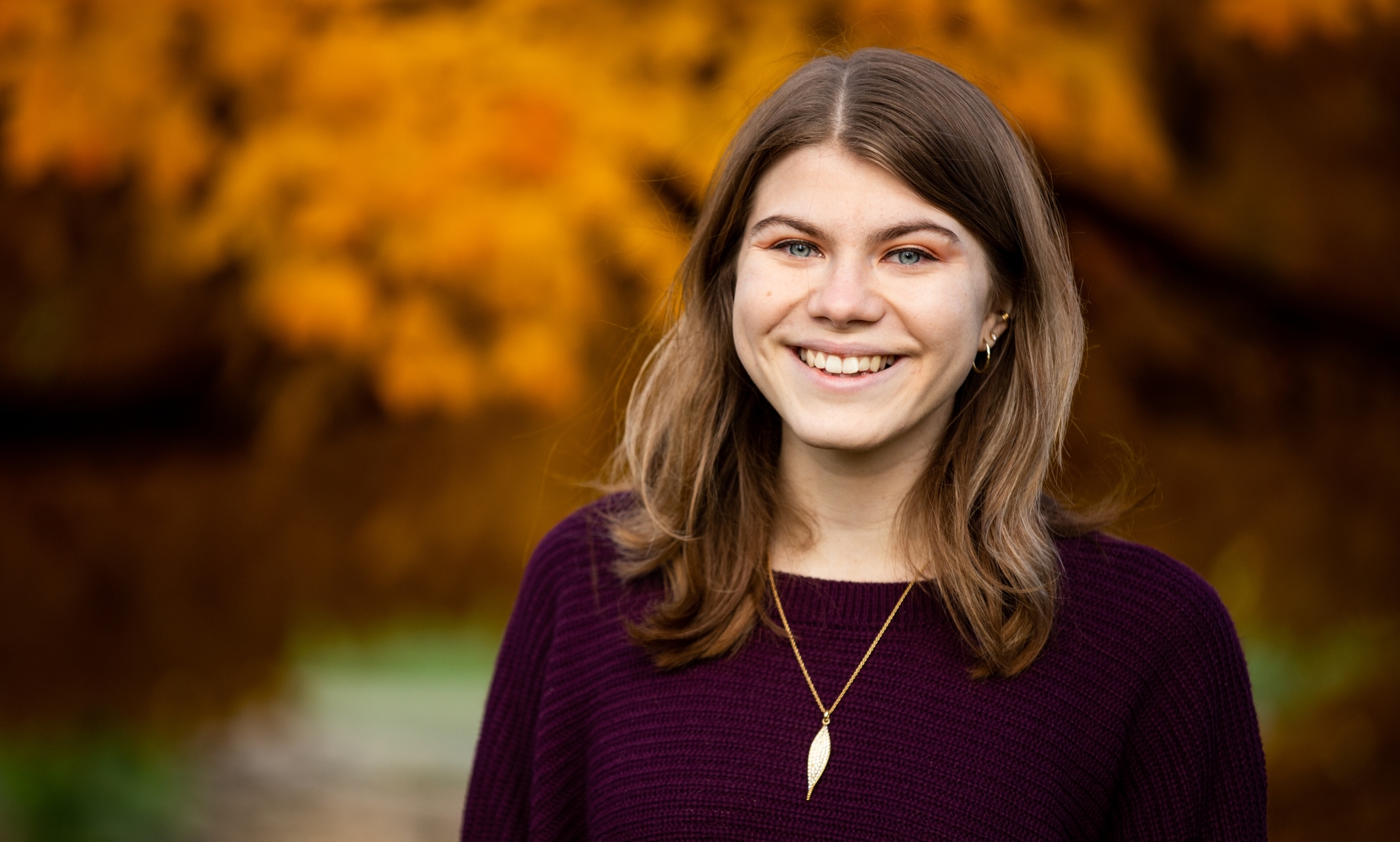
Six-year M.D. program provides opportunity to learn while serving the community
Our ongoing story starts with people from around the world, converging here at UMKC. Get to know our people and you’ll know what UMKC is all about.
Demi Elrod Anticipated Graduation: 2026Academic program: B.A./M.D. School of MedicineHometown: St. Louis, Missouri
Demi Elrod wants to be a doctor so she can help people, and she chose UMKC so she could streamline her education through the six year B.A/M.D. program. While she recognizes the challenges – the level of intensity and the fast-paced nature of the program – she likes that she will be finished in six years instead of eight. The accelerated program has helped Elrod improve the way she works and make meaningful connections.
“The course load has taught me a lot about how to prioritize my tasks and manage my time,” she says. “And another advantage is the mentoring that is available. Throughout the program I will receive guidance and counseling by my docent, who is a doctor within the School of Medicine.”
Since entering college, Elrod has discovered that she is interested in infectious disease and microbiology.
“Since the pandemic began, I have learned a lot about COVID-19 and the vaccine in my classes and during my experiences as a volunteer vaccinator,” she says. "These experiences and lessons have shown me how interesting infectious disease is, and how I can serve my community to aid in the pandemic.”
Elrod has participated vaccination events in underserved communities in conjunction with Our Healthy Eastside Kansas City (OHKCE), a community wide initiative that promotes and delivers COVID-19 vaccinations and other health services to residents on the east side of Kansas City. While the events are geared toward providing COVID-19 vaccinations and information related to the virus, they also offer other health services such as pre-diabetic and blood pressure screenings.
She says working at the vaccination events has been an unforgettable experience that’s helped solidify her choice to practice medicine.
“It’s shown me a lot about how important medicine is, and how important it is to bridge the gap between community and medical services. The message of OHEKC is, ‘You don’t have to come to us – we can come to you to help.’ Getting that message out builds trust between the community and health care providers.”
Elrod says attending medical school and the experiences it has provided have inspired her to be intellectually curious about the world around her.
“Over the past year and a half, I have learned so much about the world of science and medicine. I cannot wait to learn even more in the upcoming years.”
Nov 15, 2021
The Tenant Representation Initiative team estimates they have successfully settled up to 85 percent of their cases
When the federal eviction moratorium for COVID-19 expired in August, many renters found themselves in need of legal representation. The Truman Fellows, sponsored by UMKC, started the Tenant Representation Initiative to help. Brian Larios, UMKC School of Law adjunct clinical professor and managing attorney for Tenant Representation Initiative, recently spoke with KCUR about the program. Listen online.
Nov 15, 2021
KSHB reports some pharmacies are adjusting hours due to a shortage of pharmacy technicians
Sarah Oprinovich is a pharmacist and a professor the the UMKC School of Pharmacy. She said that staffing shortages may mean patients will wait longer for their prescriptions. Read more.
Nov 12, 2021
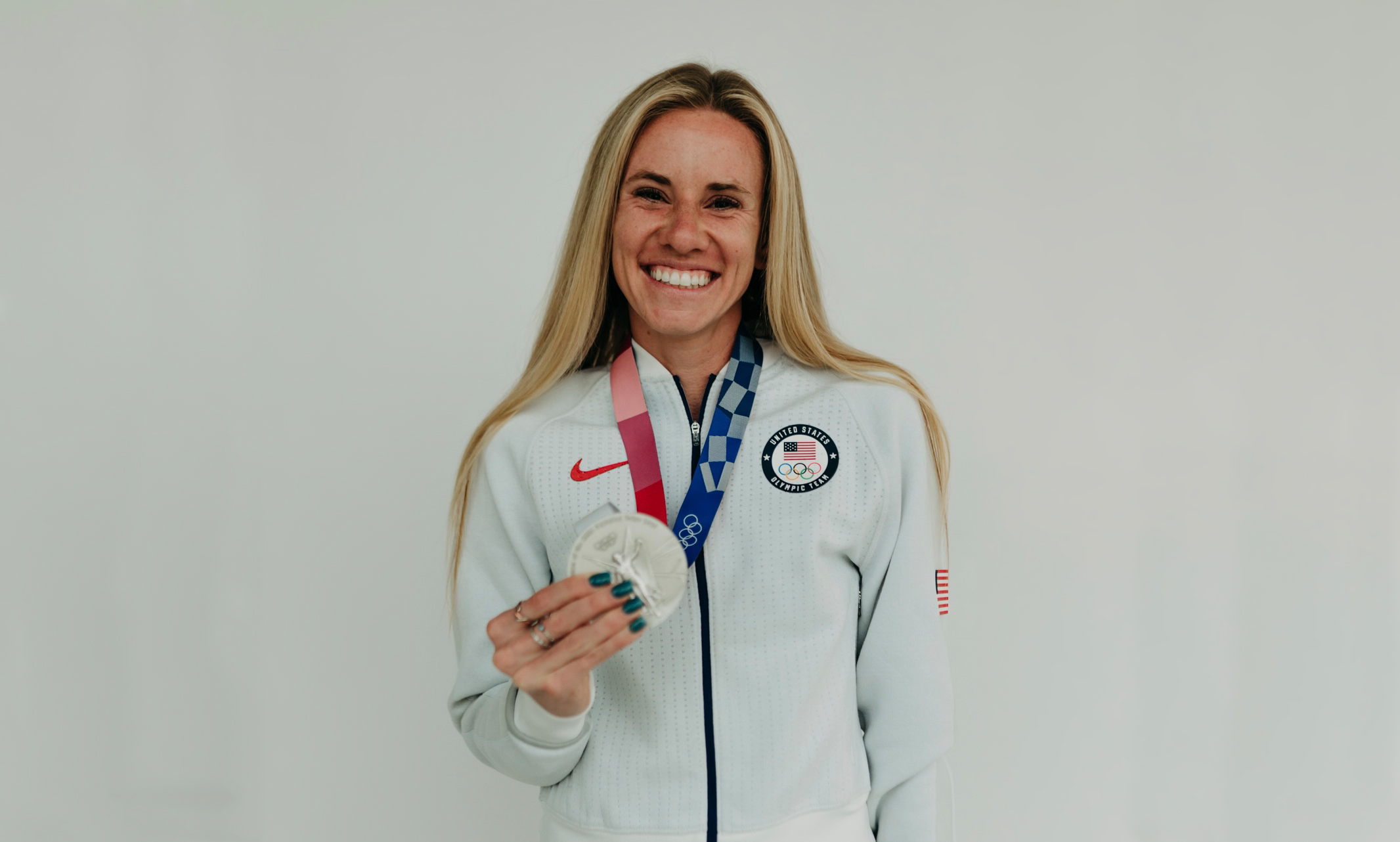
Track and Field superstar Courtney Frerichs will welcome Class of ’21 to join her in ranks of UMKC alumni
Olympic silver medalist and UMKC alumna Courtney Frerichs (B.A. ’15) will speak at the “Roos in the City” commencement celebration for the Class of 2021 at the T-Mobile Center.
The mid-year commencement will take place Sunday, Dec. 19 at 3 p.m. at Kansas City’s downtown arena. There will be a single ceremony for all academic units. More than 1,000 graduates are expected to participate.
Anyone who would like to submit messages of congratulations to our graduates can do so using this online form.
Frerichs raced to a silver medal at the Tokyo 2020 Olympic Games in the 3000-meter steeplechase. During her athletic career at UMKC, the native of Nixa, Missouri, was an 11-time conference champion, five-time All-American and set seven school records that she still holds. She graduated summa cum laude from UMKC in 2015 with a bachelor of arts in chemistry.
Upon completing her NCAA eligibility, she signed a professional contract with Nike and joined the Bowerman Track Club. She has competed professionally for the last five years, during which she has made two Olympic teams (2016, 2020), three World Championship teams and won a silver medal at the 2017 World Championships. After the 2020 Olympics, she reset her American record in the event, becoming the first American woman to break the nine-minute barrier.
She currently lives in Beaverton, Oregon and is married to fellow Roo Griffin Humphreys (B.B.A. ’16). She trains full-time while also pursuing a master of science in nutrition at Auburn University.
Nov 12, 2021
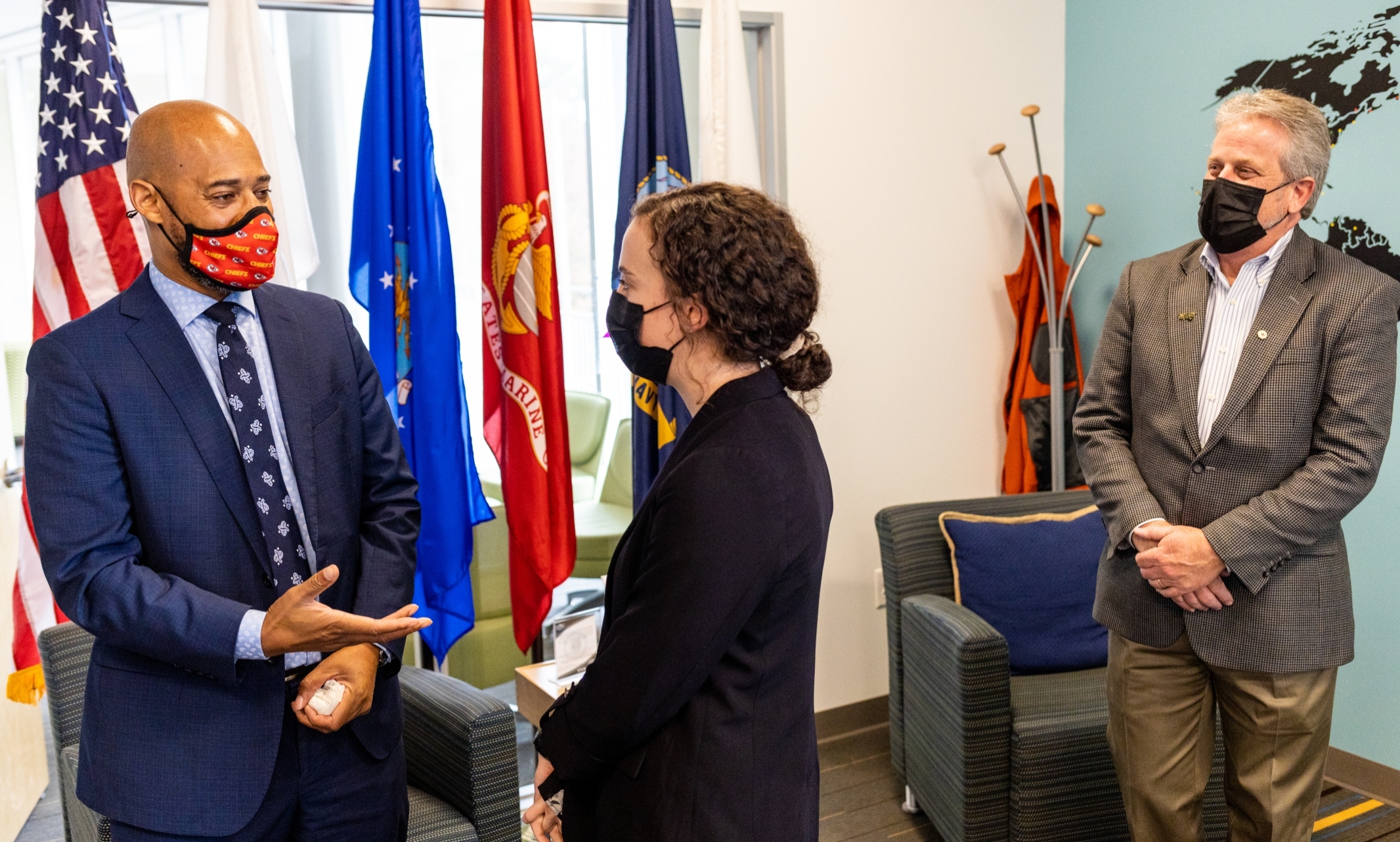
Couple honors their late son through education support for veterans
The Spencer C. Duncan Make It Count Foundation donated $10,000 to the Spencer C. Duncan Make It Count Fund at the University of Missouri-Kansas City to further educational opportunities for United States veterans.
Spencer C. Duncan, a U.S. Army Reserve door gunner, died in combat in the largest single-incident loss of U.S. lives in Operation Enduring Freedom in Afghanistan. While his family was grieving, they decided the best way to honor Spencer, an Olathe, Kansas native, was to help other servicemen and women.
“Our family really wanted to shut other people out and grieve,” Dale Duncan, Spencer’s father and chairman of the board of the Spencer C. Duncan Make It Count Foundation says. “But we knew that our son wouldn’t have wanted that.”
Following Spencer’s death, a family friend recommended organizing a 5K run in his honor. His family decided this would be a great way to honor Spencer and help others. The event raised $20,000 that year and has raised more than $900,000 in its ten year history.
"These student veterans receive more than just money towards their expenses. It also shows that UMKC has community partners who support the student veteran population and want to see them succeed.” — Eric Gormly
Jason Parson, BA ’99, president and CEO of Parson & Associates, LLC, and a veteran who served in Iraq, is president of the board of the Make it Count Foundation.
“I joined the military when I was 17 years old,” Parson says. “It was the greatest decision I ever made. It’s been the foundation of all my success. I hope we can continue to grow this partnership and help more veterans earn their degrees.”
Shelby Manning, who is currently pursuing her master’s in business administration and has plans for law school; and AJ Sharif, a first-generation student determined to get his master’s in business administration; are two UMKC student veterans who have received scholarship support through the Make It Count Foundation.
Eric Gormly, assistant director of Veteran Student Support Services notes that this support makes a significant difference.
“These generous gifts can help reduce some of the stress a student veteran may be having and allow them to focus more on their schoolwork rather than how they are going to afford books. But these student veterans receive more than just money towards their expenses,” Gormly says. “It also shows that UMKC has community partners who support the student veteran population and want to see them succeed.”
Nov 10, 2021
Ken Novak said cities need a portfolio of strategies
Novak is currently a Professor of Criminal Justice and Criminology. Read his interview with the Kansas City Star here. (Subscription required)
Nov 10, 2021
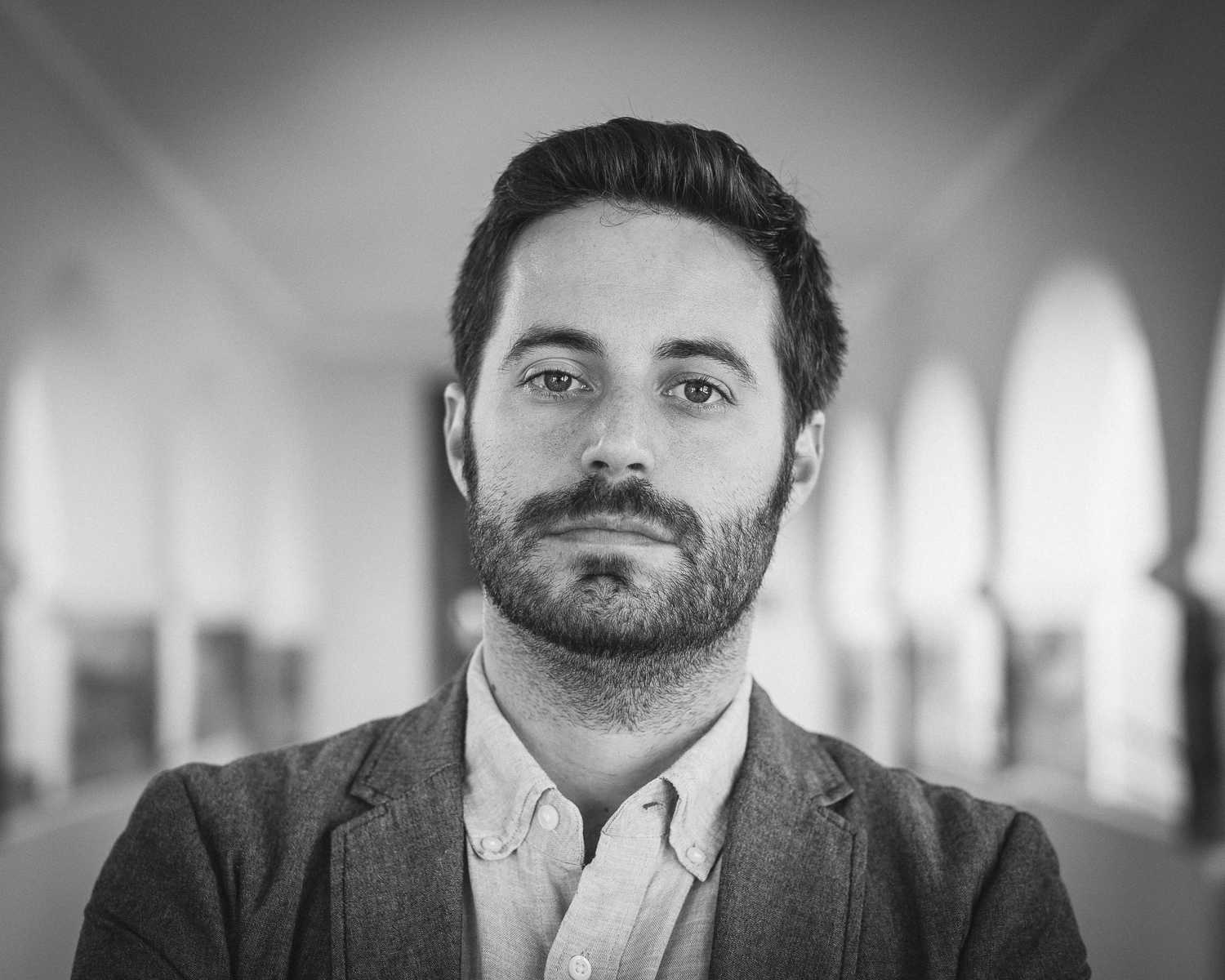
Garrard Conley shares life story of overcoming the trauma of conversion therapy
New York Times Best Selling author Garrard Conley shared his story of surviving conversion therapy during the 15th annual UMKC Pride Lecture on November 9.
The lecture, presented by the UMKC Division of Diversity and Inclusion, covered his journey of removing from the trauma of conversion therapy and how to meet hate with compassion.
In his memoir Boy Erased, Conley recounts his childhood in a fundamentalist Arkansas family that enrolled him in conversion therapy during his college years. The book was later adapted into a film by the same name in 2018. It featured Nicole Kidman, Russell Crow and Lucas Hedges, who was nominated for a Golden Globe in his role based on Conley.
Conley is now an activist and speaker, lecturing at schools and ventures across the country on radical compassion, writing through trauma and growing up gay in the South. He also works with other activists to help end conversion therapy in the United States and abroad.
Below are some highlights from his presentation, delivered live over Zoom:
Please note: This lecture features content that some may find upsetting- including mention of sexual assault.
Life growing up
Conley grew up in a small town of roughly 100 in the Mississippi Delta region of Arkansas. Every aspect of his life revolved around the local Missionary Baptist Church, he said.
"All of our gathering, pot-lucks, you name it, was all taking place there. We didn't even have a general store, that was our whole world," Conley said. "The way these people thought, was the way that we thought because that's really the social glue that held our lives together."
Through his church, Conley said he had beliefs instilled into him that included the idea that women were not permitted to hold positions of power and that marriage was strictly between a man and a woman.
As he was entering his teen years, Conley began to question his own sexuality, right around the time Matthew Shepard was murdered. Shepard was a student at the University of Wyoming who was beaten, tortured and left for dead on a fence post — many believe because he was gay. His death sparked conversations nationwide about what it meant to be gay in the United States.
"I was thinking to myself, 'I don't know exactly what I am, but I don't feel comfortable with any of this.' My parents had no idea that I was gay, but if they had known they would have been sacred out of their minds that would have been me tied to the fence post," Conley said.
Conversion therapy
While in college, Conley confided in his roommate, a friend from high school, that he was questioning his sexuality. Conley's roommate responded by sexually assaulting him and confessing that he sexually assaulted another young boy at a church camp.
Conley reported his roommate to his school's administration. His roommate sought revenge on Conley by outing him to his family.
"My dad gave me an ultimatum that if I didn't go to conversion therapy, that I wouldn't see my mom or my dad again, I wouldn't continue my education and I wouldn't be allowed to step foot into the house again," Conley said.
Conley then began attending a six-month period of Bible-centered therapy sessions every weekend, which culminated in a two-week conversion therapy camp that left him suicidal.
When he first began thinking about writing a book on his life experiences, Conley said he had to face some hard questions about his journey and his relationship with his family.
"When you are writing a memoir you have to think in terms of the big picture. The question I kept coming back to was, what really brought our family to the doors of (conversion therapy)?" Conley said. "What brought a loving family to this place? What brought my mom and dad to make that decision, and most importantly, why did I agree to go? I struggled with these questions for years."
Changing minds
Conley said he hopes his work has an impact on the fact that people can choose to live a more compassionate life.
"I realize that in 2021 that can often sound naive. It seems like everyone is yelling at each other and there is no understanding and no real desire to actually speak the truth to people. But in my life, what I have seen, that is not always true," Conley said.
Every person can instill compassion into others through the art of communication, Conley said, and by sharing his story he hopes to show others that change is possible.
"People can actually change, not that they can change their sexuality because they can't, but they can change how they feel about other people and they can grow and become more compassionate," Conley said.
Nov 10, 2021
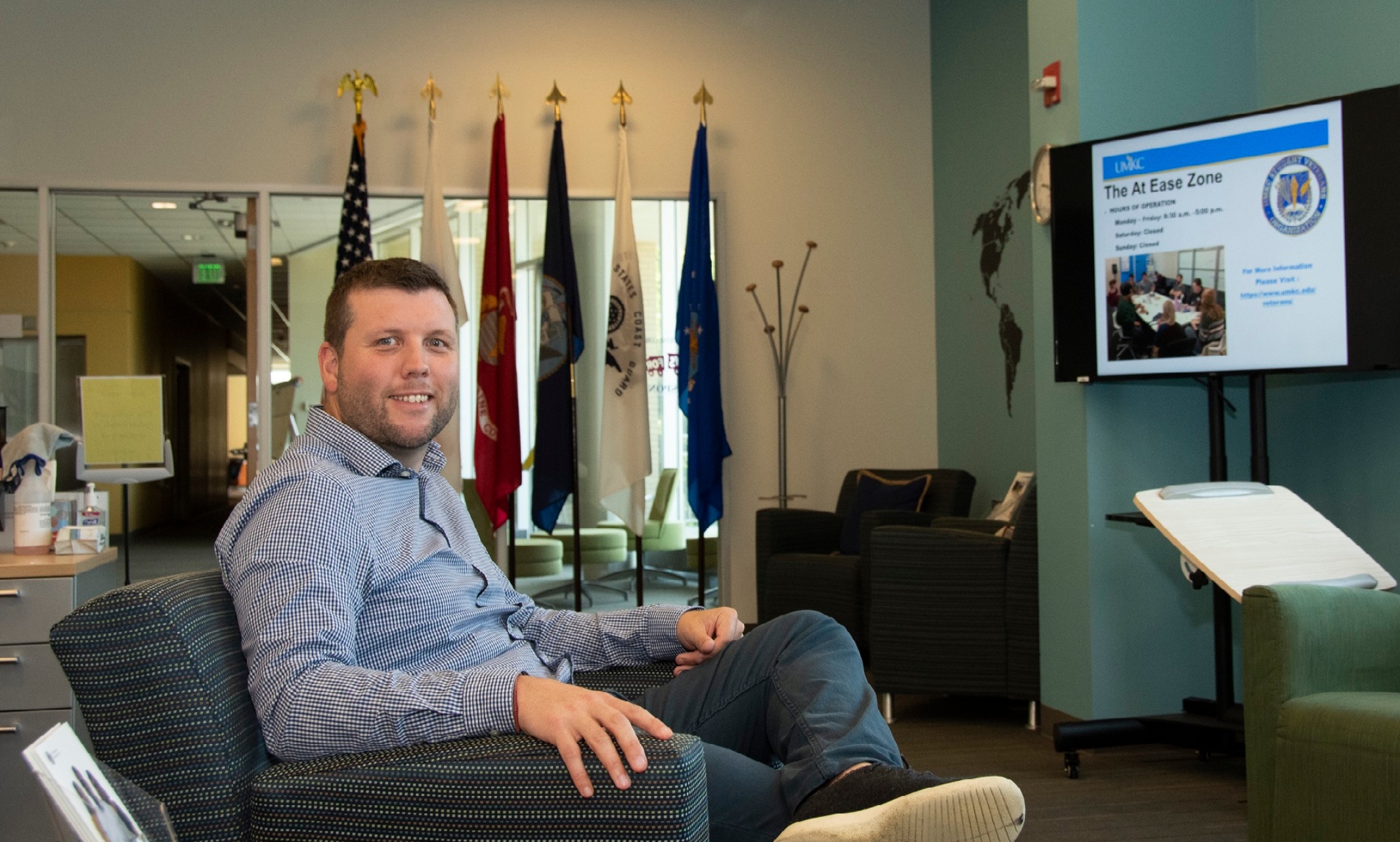
Resource for veterans has convenient home in the Student Union
Eric Gormly, assistant director for Student Veteran Support Services at UMKC, oversees the At Ease Zone, a resource center for veterans on campus. His background gives him keen insight into student veterans’ needs.
While in the U.S. Marine Corps, Gormly was deployed to Hurricane Katrina, Iraq and Peru. When he completed his service, Gormly, a Kansas City native, took advantage of his G.I. Bill and enrolled in community college to pursue a degree in law enforcement and worked in the Veterans’ Affairs office.
“After a couple of semesters my academic advisor said, ‘You talk a lot about helping vets. Are you sure you want to go into law enforcement?’”
He realized that helping veterans was his calling. Gormly has spent 10 years working in higher education establishing programs to make the transition to college easier for veterans, and to help them feel a part of campus life.
“Veterans go from a highly organized structure in the military to no structure at the university. We help with the transition.” — Eric Gormly
“There is culture shock on re-entry,” Gormly says. “Veterans go from a highly organized structure in the military to no structure at the university. We help with the transition.”
In order to be better informed of veteran enrollment, there is an opportunity for applicants to identify veteran status on the UMKC admission application. Gormly’s office uses that to contact and connect with students who might benefit from services his office provides. While that form provides some basic information about veterans on campus, Gormly recognizes that all veterans do not have the same needs.
“We know who receives benefits, but there’s a wide range of student veterans,” Gormly says. “Also, the military doesn’t do a great job explaining the benefits, and some veterans may not be clear on how to use them.”
The At Ease Zone can be a great place for veterans to find resources. Located in Student Union, the At Ease Zone also provides a comfortable spot on campus for military-affiliated students to study, socialize and connect with staff and each other.
There are 156 new veteran students at UMKC this semester.
“I call every incoming student,” Gormly says. “We push that out. They don’t have to ask. They may need help to connect on campus. For some students, groups are better, for others one-on-one meetings work best. We try to find the best fit.”
Regardless of their preferences, Gormly notes that having a visible location on campus has made a significant difference in the way they can provide services with a variety of resources beyond being a place to relax and do homework.
“There are computers available, and students are welcome to come in to study or do Zoom classes. We have tutors, academic coaches and a 32-inch display with resources including veterans’ organizations on campus and information on the Kangaroo Pantry.”
He says with students back on campus this semester, they have been able to do more events, including volunteering.
“There are many opportunities for student veterans to get involved. Every home Chiefs football game, 20 student veterans volunteer with the Chiefs organization for pre-game activities.”
Building these connections is critical to student veterans’ success. Kavitha Reddy, BLA ’99, MD ’00, is associate director of Employee Whole Health in the Veterans’ Health Administration Office of Patient-Centered Care and Cultural Transformation and assistant professor in Emergency Medicine at the Washington University School of Medicine. Throughout her career, she has been an advocate for veterans’ health through a variety of resources in and outside the hospital setting.
“Places like the At Ease Zone are perfect places for veterans to be proactive about their health and well-being,” Reddy says. “For the men and women who went into the service relatively young – often 18 years old – they are facing a lot of new challenges along with mental and physical health issues. Civilian life may seem fragmented, and taking care of themselves, mind, body and spirit, is incredibly important
“The university establishing a safe space that is visible on campus is significant.”
Gormly is excited about the opportunities ahead.
“Vets face a lot,” he says. “They are often confronted with the idea that veterans have trouble adapting, but being in the military often helps us to adapt. These students bring a different level of commitment with maturity, motivation and persistence.
Our office provides training for faculty and staff to understand a vet’s mindset. There are so many positive qualities that they bring to campus. We hope to expand.”
For more information on services or to volunteer contact Eric Gormly at gormlyea@umkc.edu or 816-235-5599.
Nov 08, 2021
Beth Vonnahme, Ph.D. helped put the increased turnout and election results into perspective
Vonnahme attributed the increase in turnout to a variety of factors. Read more
Nov 08, 2021
Emily Wesley was recently in The Kansas City Business Journal
Wesley lost both her parents to health complications at a young age. Inspired by one of her father's doctors, she now studies Biology and works in a research lab at the Stowers Intitute. She also founded a peer mentoring group on campus. Read more.
Nov 08, 2021
William Black suggests people buy gifts early
Black, an associate professor in economics, said supply chain shortages and delays will make the typically busy holiday shopping season even tougher this year. Read more.
Nov 08, 2021
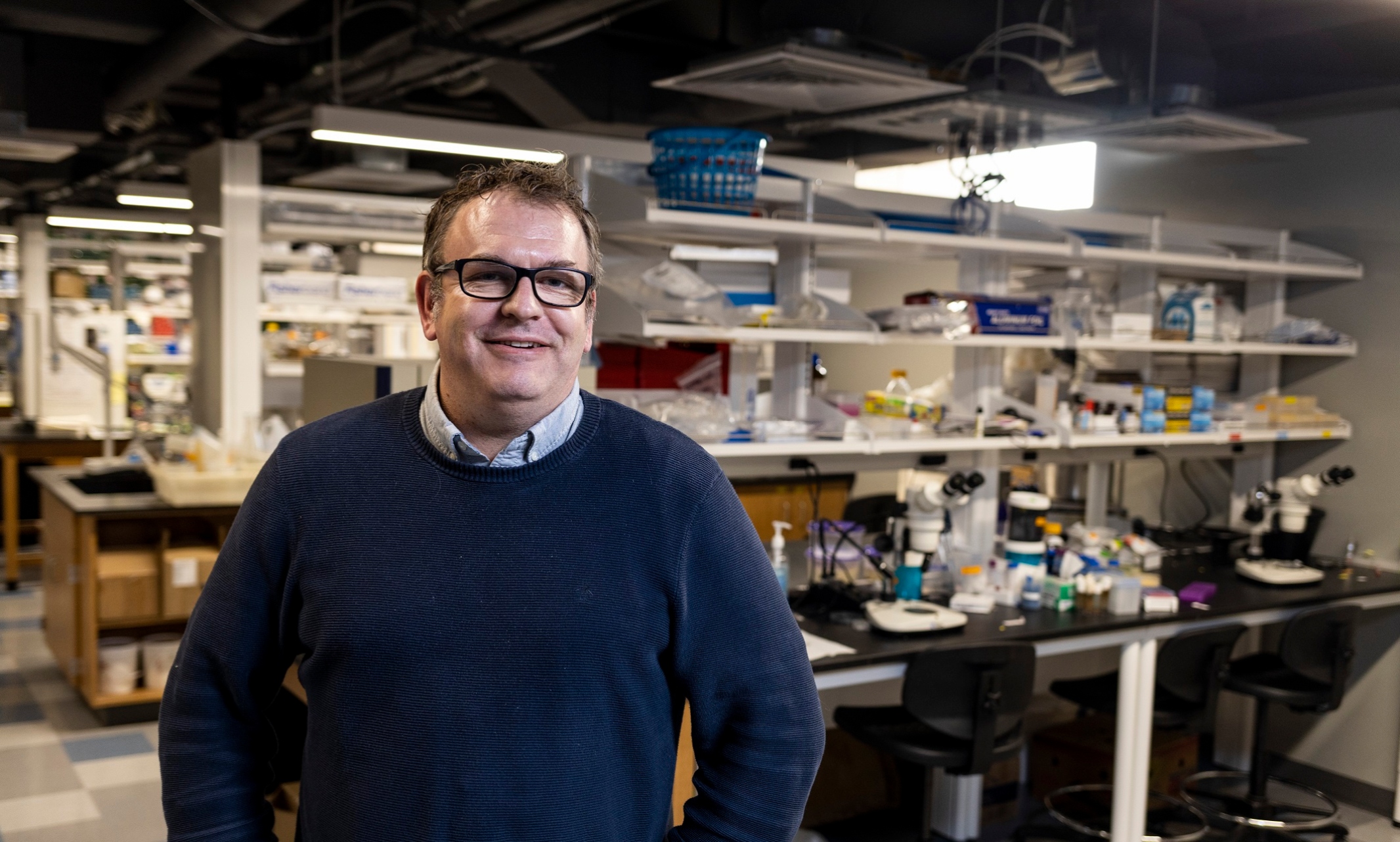
Successful research on flies furthers advances for humans
Stephane Dissel, Ph.D. fell in love with biological research as an undergraduate in his home country of France thanks to his natural curiosity, his love of the lab and a little luck. His interest in the connection between Alzheimer’s disease and sleep came later.
During his undergraduate studies, Dissel focused on immune response using flies. His current research studies the effect of sleep on flies’ brains and the ability to manipulate the expression of specific genes to affect memory. Sleep ensures that everything gets connected in the right way Dissel says.
“Every animal on the planet has to sleep.” Dissel says. “Depriving people of sleep has been used as a method of torture,” he says. “People start by losing their sanity, but eventually they could die. It’s essential. Every species, every animal sleeps.”
Dissel says sleep is important for the development and the wiring of the brain.
“It helps ensure everything works properly. Even in the animal kingdom, babies sleep more in early life. But as people age, they tend to sleep less, and their sleep is less efficient.”
“The question is, are these people developing Alzheimer’s because they have sleep problems, or do sleep problems increase with Alzheimer’s?” — Stephane Dissel
Dissel notes that it’s common for people in their 40s and 50s to start sleeping less and less. Sleep during this time becomes less deep, which makes it more likely that people will wake up in the night. He says that most neurodegenerative diseases come with a sleep deficit component.
“The question is, are these people developing Alzheimer’s because they have sleep problems, or do sleep problems increase with Alzheimer’s?” Dissel says. “This is still up for debate. But what I know for sure is that if you can improve the quality of sleep, you can delay or diminish the onset of severe Alzheimer’s.”
He says flies are critical to his research because their brains allow for precise, targeted manipulation. The way that humans sleep, and flies sleep are obviously different, but there are commonalities that allow the research to apply to human conditions.
“At the end of the day it’s about healthy memory– or plasticity. We are trying to understand which neurons in the brain are underlying the benefits of sleep on plasticity. If we can identify the important cells, we can manipulate, activate or silence them. “
While there is no “cure” for Alzheimer’s on the horizon, Dissel is heartened that there is a lot of funding available for this research. He also notes that there is good news.
“We know from our research that, in a fly that has a genetic mutation that leads to memory impairment, making sleep more efficient enables the brain to find an alternative way to bypass that mutation and restore memory.”
“It’s never quick enough, but little by little we will find a way to prevent the disease.”
He says the means of inducing sleep are less relevant than the sleep itself.
“We can increase the quality of sleep in different ways. We can activate specific neurons in the fly brain which we know are sleep inducing. We’ve also used drugs for pharmaceutical activation, and it leads to the same conclusion. No matter how you do it, increasing sleep in flies makes memory better.”
He notes that part of the challenge with Alzheimer’s disease is that it is complex and controlled by genetic, environmental and lifestyle factors.
“You can’t pinpoint a single gene that triggers the disease. In some cases, there are multiple gene mutations, which can lead to increased risk. There are so many possible causes that lead to this disease, it’s very difficult to find a treatment strategy that is applicable to everyone.”
Still, he is confident in the progress that is being made, though it’s often in incremental steps.
“It’s never quick enough, but little by little we will find a way to prevent the disease. Even if we cannot cure it now, I’d consider it progress if we can delay onset, lessen the severity or improve the quality of life. I’m much more optimistic about this right now because I know it’s doable.”
Nov 05, 2021
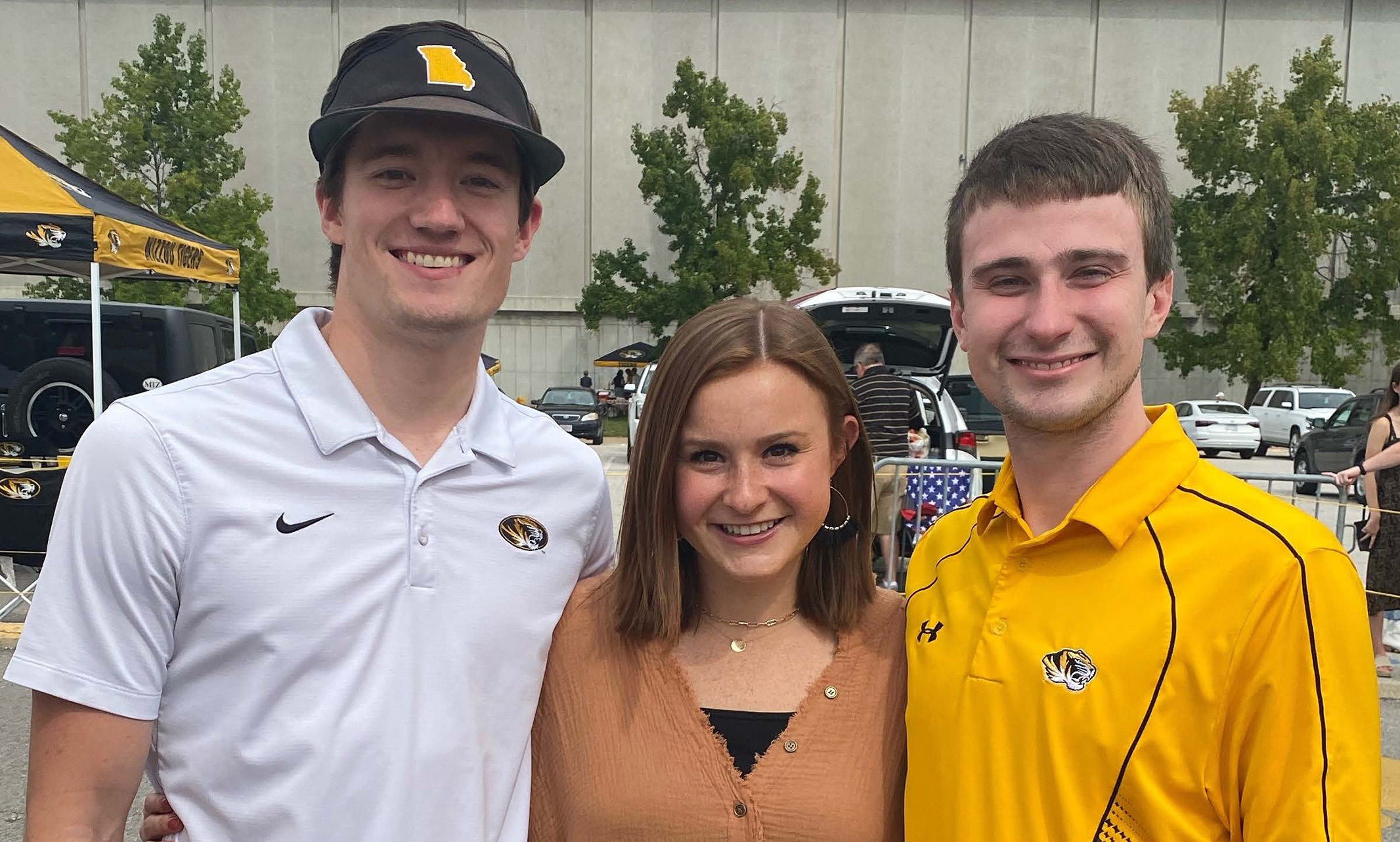
Run to the Clinical Pharmacy Challenge final four follows UMKC’s 2020 national championship
UMKC School of Pharmacy students Zach Carroll, Allison Baker and Austin Dockins have a certain chemistry with one another. After all, they’ve been together since what seems like forever.
It’s a connection that helped them make it all the way to the semifinal round of this year’s national Clinical Pharmacy Challenge sponsored by the American College of Clinical Pharmacy.
“The three of us have been friends since elementary school so it has been fun to see how much we’ve learned over the years together,” Baker said.
They met as third graders at Mill Creek Elementary School in Columbia, Missouri. They graduated together from Columbia’s Rock Bridge High School. The three fourth-year pharmacy students even discovered a common interest working at the same local pharmacy while completing their undergraduate degrees.
“All of us enjoyed working there and we individually decided to apply to pharmacy school,” Dockins said.
It wasn’t until after each had submitted their applications to attend UMKC’s School of Pharmacy at the University of Missouri’s Columbia campus, that the trio realized they would be continuing their college careers together while following similar career aspirations.
“We didn’t talk about applying to pharmacy school until after we all had submitted applications,” Dockins said. “We were all a little surprised that each of us had made the decision to apply, but we were excited to take on the adventure together.”
Earlier this year, that journey culminated with the three battling their way to the national semifinals of the annual AACP Clinical Pharmacy Challenge.
The competition pits three-person teams from pharmacy schools and colleges against one another in a quiz bowl–type format. It began in September with more than 90 teams from across the United States. Each round of the competition consisted of trivia/lightning, clinical case and Jeopardy-style segments with questions prepared by expert clinical pharmacy practitioners and educators.
“It’s been great to work together as a team,” Baker said. “Throughout school, most assessments are individual, so this has been a neat opportunity to collectively think through questions, use each other as resources and pull from our unique rotation experiences to answer questions.”
The UMKC team successfully navigated the first five rounds to reach the national semifinals before being eliminated from the competition. The trio credited their UMKC pharmacy professors for their preparation, both the competition as well as their future careers as pharmacists.
“Competing against intelligent students from prestigious universities across the country was a really neat opportunity,” Dockins said. “We feel very accomplished and proud that we were able to make it to the top four.”
Dockins said that he, Carroll and Baker have participated in team competitions as an opportunity to reinforce how much they’ve learned throughout pharmacy school.
“We really just compete to see how well we will do,” he said. “We don’t have huge expectations when entering, although each one of us has a bit of a competitive spirit. We know that each one of us brings something different to the table and we know each other so well that it’s easy to communicate during these competitions.”
Their sprint to the final four is the continuation of what is a growing legacy of excellence for the UMKC School of Pharmacy on the national stage. Last year, the UMKC team of Jamie Sullivan, Kathryn Rechenberg and Brooke Jacobson won the Clinical Pharmacy Challenge national championship.
Nov 04, 2021
The Latinx Education Collaborative teamed up with researchers from the Urban Education Research Center (UERC) to generate a “landscape analysis” of...
UERC is a research and evaluation center within the University of Missouri-Kansas City School of Education. Read the story
Nov 03, 2021
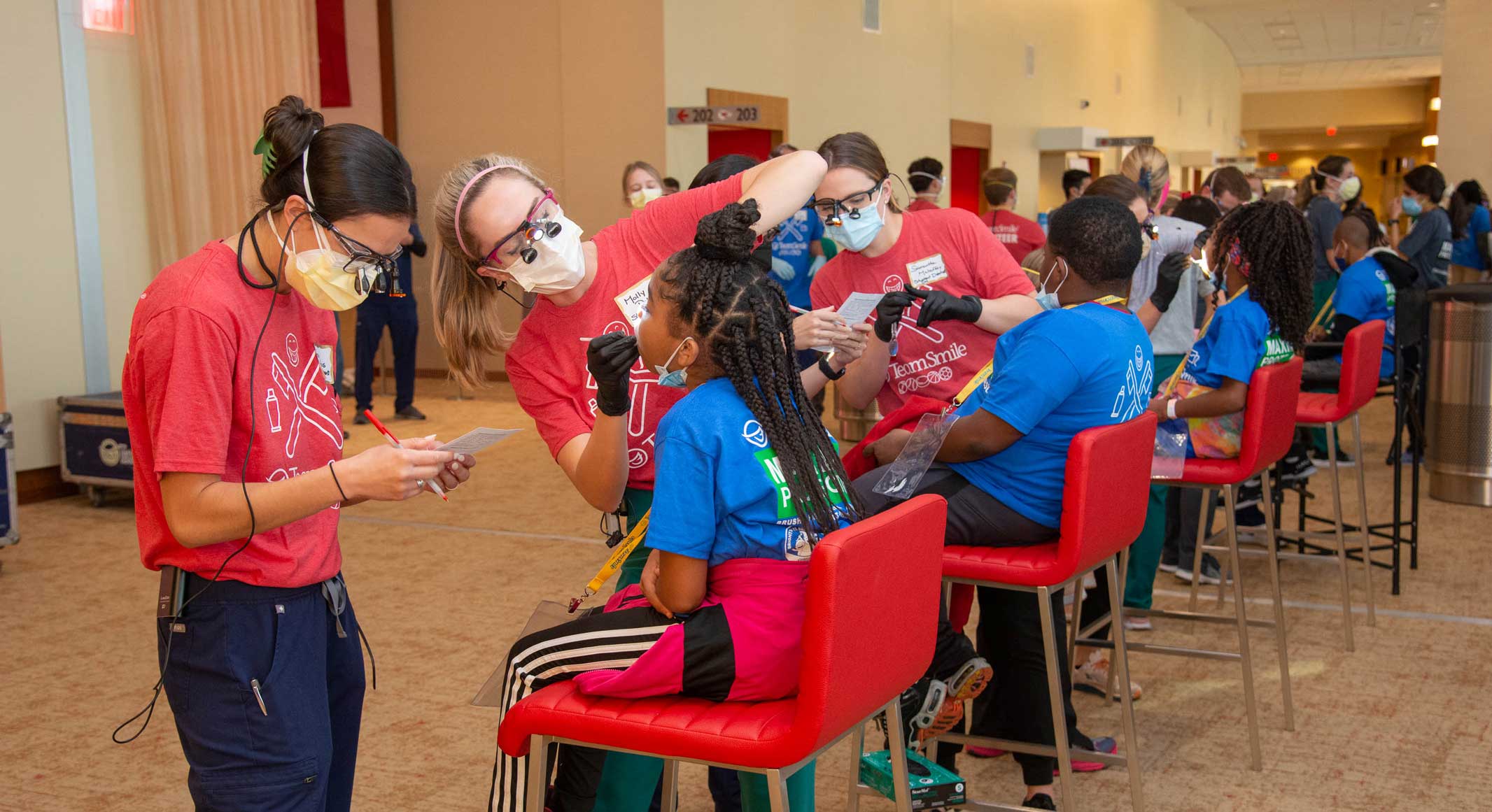
School of Dentistry, TeamSmile, United Way and Chiefs make a great team
Pearly whites were plentiful as well as Chiefs red at the TeamSmile event at Arrowhead Stadium on Oct. 26. Students from the UMKC School of Dentistry volunteered at the event, delivering much-needed dental care to 200 local elementary students.
Sponsored by the United Way, more than 40 students and faculty from UMKC participated, providing initial dental screenings, X-rays and recommendations for what care the kids would need that day. Each year, dentistry and dental hygiene students participate in three TeamSmile events: at the Kansas City Chiefs, Royals and Sporting KC.
Started in Kansas City, TeamSmile is a national advocacy group that works with professional and college sports teams to provide children in need with a life-changing dental experience. For those youngsters who may have a fear of the dentist, seeing their favorite athletes can help put them at ease. The friendly faces of UMKC students help, as well.
Since the organization’s inception in 2007, UMKC School of Dentistry students and faculty have volunteered their time with TeamSmile. The organization provides comprehensive care to the children who participate, from preventive care such as fluoride treatments and cleaning to extractions and root canals.
“We’re incredibly proud to have been involved with TeamSmile for over a decade,” said Becky Smith, one of the faculty members who accompanied the students at the event. “It gives our students the opportunity to hone their skills, provide dental care to some of our youngest citizens of Kansas City, and help instill the importance of volunteerism going forward.”
Nov 03, 2021
The U.S. Department of Education’s Trio program is designed to provide services for students from disadvantaged backgrounds.
The University of Missouri-Kansas City found that 40% of students in the state’s largest university system have no immediate relatives who went to college. Read the article
Nov 03, 2021
Dr. Mary Anne Jackson has been studying infectious diseases for more than three decades.
The Kansas City Business Journal recently highlighted Dr. Jackson for her role in the COVID-19 pandemic response for the state of Missouri and the University of Missouri - Kansas City. The article also showed the impact that the UMKC School of Medicine has had on rural health in Missouri, teaching future doctors about social determinants of health and its recent ranking among the top Primary Care residencies on U.S. News and World Report’s Best Graduate Schools list. Read more
Nov 03, 2021
Over the next year, Kansas City, Missouri, will study the effectiveness of three pilot programs designed to repair sidewalks.
The city, along with partners at the University of Missouri-Kansas City Department of Civil and Mechanical Engineering, Gunter Construction and Rubberway, will study how a rubber sidewalk near East 41st Street and Kenwood Avenue holds up in the snow, ice, rain and to heavy foot traffic. Learn more
Nov 03, 2021
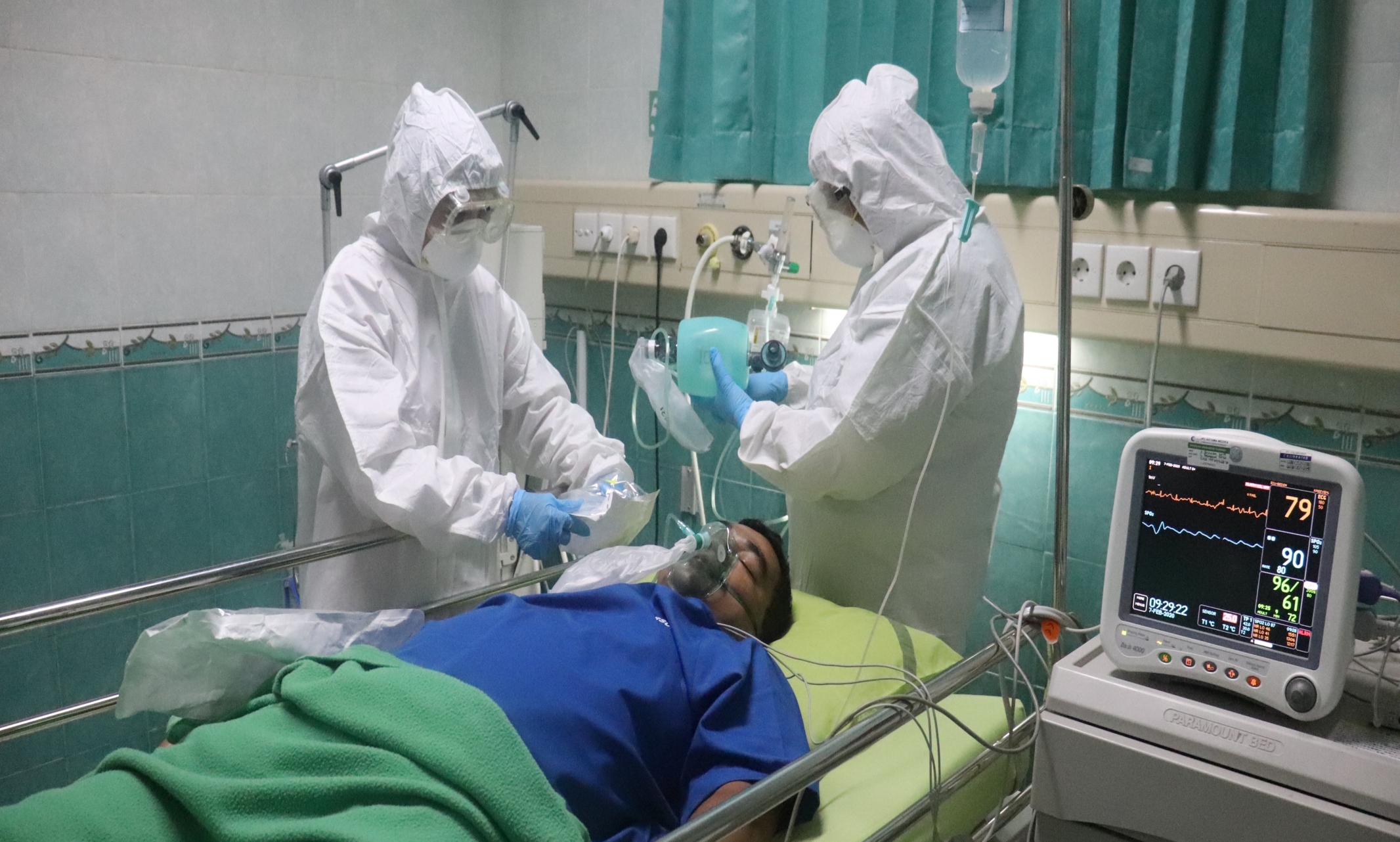
Bloch assistant professor Karen Landay recently led a study to see how passion helps fight stress and burnout amid COVID-19
Assistant professor Karen Landay, Ph.D., has always been fascinated by the connection between work and passion. Inspired by her first career as a violinist, the assistant professor of management at the Henry W. Bloch School of Management now focuses her research on work passion.
“That’s really stuck with me, this idea of passion as a really important part of our work and as this force that helps us get out of bed in the morning and go and do what we do,” she said. So, when the COVID-19 pandemic threw health care workers into some of their most challenging circumstances ever, she was curious if passion helped them avoid stress and burnout during the darkest of days. Landay said she was particularly interested in the effects of two different types of passion, harmonious and obsessive. Harmonious passion, Landay explained, is a voluntary passion that is under our control and stems from a love of a job. Obsessive passion is involuntary passion that can be all-consuming and uncontrollable. Landay said the latter form of passion can stem from pressures like workaholism or expectations from loved ones.“Harmonious passion is generally a good thing that leads to other good things. Obsessive passion is a lot more mixed. It’s not always bad, but it’s not universally positive like harmonious passion,” Landay explained. Landay enlisted the help of a professor at another university and her Bloch School graduate assistant, Allen King. From November 2020 to January 2021, the team sent a series of surveys to dozens of nurses across the United States. They asked them about their jobs, the level of passion they have, what was behind their passion and questions to gauge their stress level at various points throughout the pandemic. Landay expected to find that nurses who had harmonious passion would have decreased levels of stress and burnout, while nurses who had obsessive passion would experience increases. Instead, she found that nurses who were passionate about their work had less stress and burnout regardless of the type of passion they had. Landay said her team believes that timing may have played a role. When the surveys were conducted, vaccines were only recently becoming available and nurses had endured month after month of extraordinary circumstances with no end in sight.“It’s possible had we conducted our study six months later, perhaps we would have found those different results for those different types of passion,” said Landay. That is exactly what her team hopes to find out in a follow up study that is kicking off soon. This time, the surveys will also include many other types of first responders in addition to nurses including doctors, firefighters, police officers and EMTs. They hope to have a large enough sample to separate the nurse data out, compare it to the 2020 data and see how things have changed since last year.In the meantime, Landay said her findings can be a valuable tool for health care employers as they look for ways to support an overburdened, pandemic-weary workforce. “It’s not expensive. You can have small support groups, things like that. Encourage people to talk about it, but it’s not like you’re having to buy equipment or those kinds of things. So it’s kind of the best of both worlds. It could be a fairly cost-effective solution that could have a big impact,” said Landay. “These are some really intriguing preliminary findings. We’re excited to pursue this and see where it goes and hopefully be able to make a difference for some people.”
Nov 02, 2021
Providence Medical Center recently added Certified Nurse Midwife Emily Fox, MSN, APRN, CNM, to its healthcare team.
Fox received her Bachelor of Science in Nursing from the University of Missouri – Kansas City and Master of Science in Nursing with an emphasis in nurse midwifery at Frontier Nursing University, Versailles, Kentucky. She is board-certified by the American Midwifery Certification Board. Read more
Nov 01, 2021
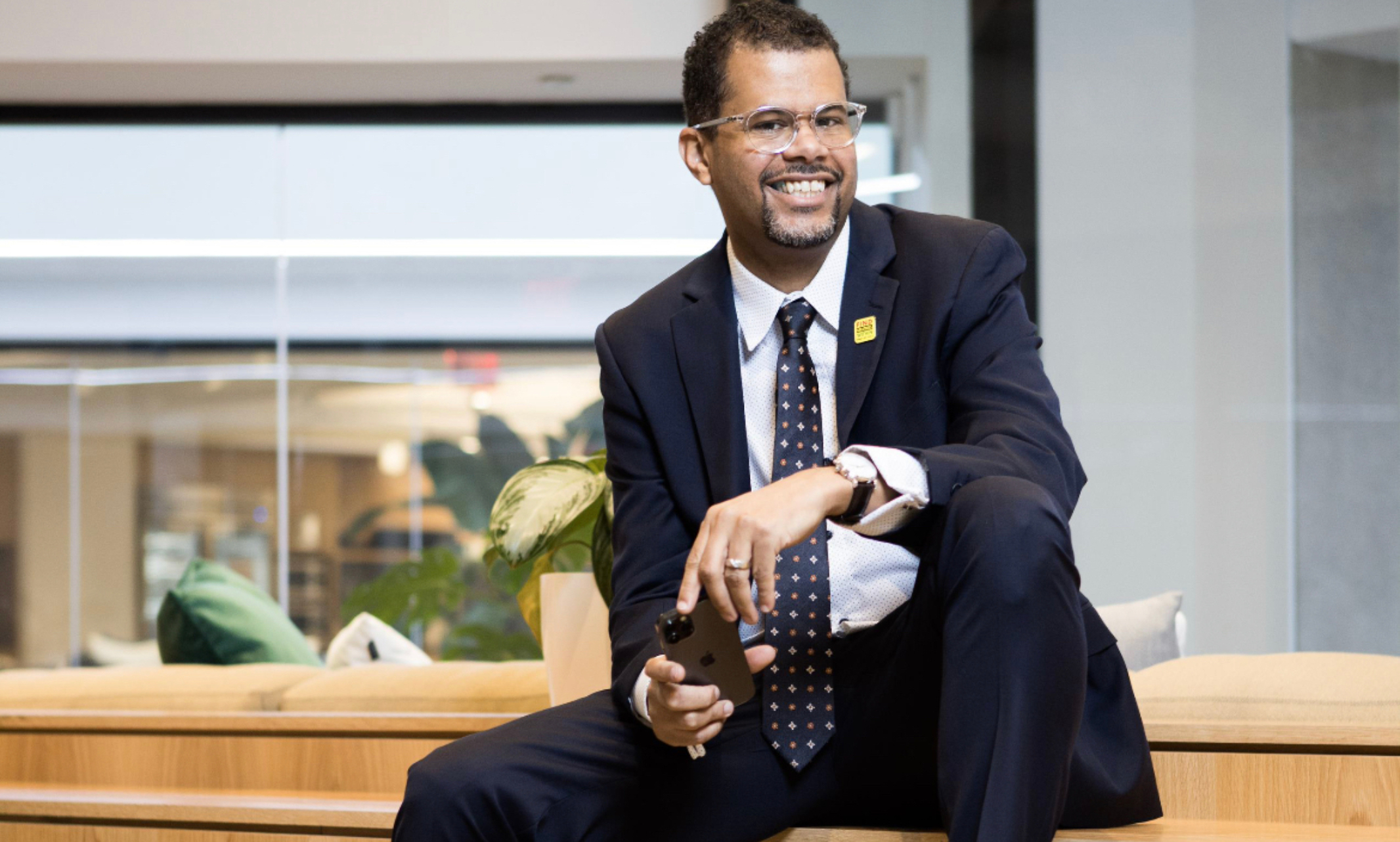
Hogan Family Scholarship supports Kansas City Public Schools graduates enrolled as Business majors
“Redefining Potential” is the theme of the new Hogan Family Scholarship Fund at the University of Missouri-Kansas City.
It’s a subject Nate Hogan knows well, because it’s essentially the story of his life.
Hogan serves as chair of the Kansas City (Missouri) Public Schools (KCPS) Board of Education. He and his wife, Felecia, endowed the fund to support KCPS graduates of color who enroll in the UMKC Henry W. Bloch School of Management. Hogan holds an Executive Master of Business Administration degree from the Bloch School.
His route to a master’s degree was hardly a typical one; that road began with his decision to drop out of his Florida Keys high school in 10th grade (the only year he lived outside of Kansas City). Today, he is Vice President, Healthcare Solutions for NIC Corp. in Olathe.
The scholarship is designed to support and inspire young people who face similar hurdles to those he overcame.
“My high school grades were terrible,” he admits. “Nobody would have offered Nate Hogan a scholarship.”
The Hogan Scholarship has no GPA or standardized test score barriers.
“Why look at every kid through the lens of standardized tests?” he said, noting that such tests also heavily influence high school GPA. “It’s not a really good predictor of a person’s potential.”
The scholarship program is designed to ensure every student who wants to go to college, has an equitable opportunity to do so. The $2,000 annual scholarships are intended to supplement the Pell grants and other financial aid these students typically receive – and serve as a motivating force.
“We want to tell these kids, ‘you have a real opportunity here,’ and help them understand that they can ignore all the noise going on in their lives, all the noise going on in society, and think about how they can dig deep and tap into their full potential,” Hogan said.
Nate and Felecia started the scholarship fund with an $8,000 contribution, and have committed to make that same donation on a yearly basis. Additional fundraising has added another $2,000 to the fund, and the Hogans plan to step up their personal involvement in fundraising for the scholarship in future years.
The focus on business education is also based on the Hogans’ personal journey.
“Our entire careers have been business-focused,” Hogan said. They met at Commerce Bank – Nate’s first job outside the service industry – where today Felecia serves as senior vice president and director of diversity, equity and inclusion. Nate has served in a variety of business roles before taking his current position at NIC, crossing just about every major business discipline (accounting, finance, sales, relationship management, operations and leadership).
“We believe a business degree can be a great foundation no matter what you end up doing in your career,” he said.
Ultimately, Hogan’s motivation for setting up the scholarship fund is the same as what drove him to become a leader for the city school district.
“Because I was a very mobile student who came to school carrying a bunch of stuff that no child should have to take on, I can identify with our students.”
Oct 28, 2021
Best colleges in Missouri
The University of Missouri-Kansas City was listed at #7 on their list of the best colleges in the state, according to Niche. Read more.
Oct 28, 2021
Hair-raising stories surround UMKC’s Epperson House
When you look at the old, abandoned Epperson House on the UMKC campus, it’s easy to imagine how it might have looked in the last century. Chris Wolff is a campus employee and a major history buff. He gives tours of the campus and one of his favorite stops is the Epperson House. Read more.
Oct 28, 2021
Six universities on Best Global University list, including UMKC
Six Missouri universities have landed on U.S. News and World Report’s list of Best Global Universities. The University of Missouri-Kansas City scored in the 65th percentile. Read more.
Oct 28, 2021
Students getting $218 million from $496 million in federal pandemic funds awarded to Missouri public universities
The University of Missouri-Kansas City is allocating over $18 million for student financial aid from CARES Act Higher Education Emergency Relief Funds. Read more.
Oct 28, 2021
Kansas City rocks! Take a geological journey across the region
Richard Gentile, professor emeritus from UMKC, explains this history in a recorded series of lectures on local geology from Linda Hall Library in early 2020. Read more.
Oct 27, 2021
Charting a new course, plug artist collaborative opens a gallery in the former Agnes Avenue police building, where it joins a complex of artist stu...
“plug has a really great reputation for showing contemporary art in Kansas City,” said Davin Watne, who teaches art classes at the University of Missouri-Kansas City and runs the UMKC Gallery of Art. “Who better to move into that space? It’s not as large square footage-wise as what they had before, but it’s got a much higher ceiling. It’s a unique kind of space that they can have a lot of control over.” Read more.
Oct 27, 2021
Kansas City leaders consider declaring a climate emergency. Here’s what it would mean
A research group led by the University of Missouri-Kansas City will collect data this summer in an effort to find out who suffers the most in Kansas City’s heat. Read more. (subscription may be required)
Oct 27, 2021
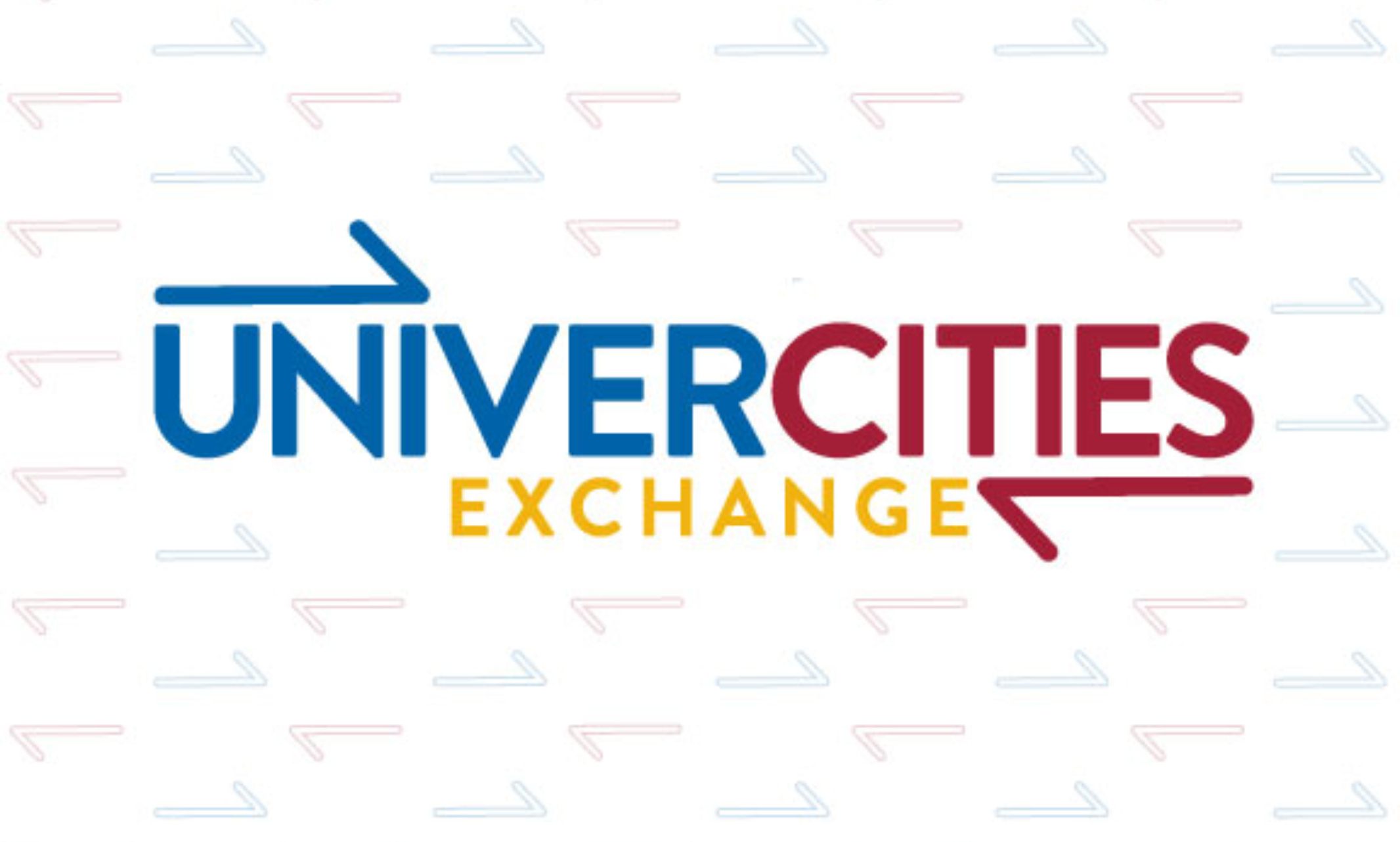
UniverCities Exchange is a continuing collaborative of UMKC and UMSL.
Academic and community leaders from Kansas City and St. Louis met virtually on Oct. 13 to discuss issues local adolescents have faced throughout the COVID-19 pandemic.
The session was conducted through UniverCities Exchange, an ongoing collaborative project between UMKC and UMSL. In this installment, the panel discussed how Missouri youth are adjusting to the complexity of nearly two years of life in the era of COVID-19.
Between March and May of 2020, the United States saw a nearly 25% increase in appointments for children ages 5-11 experiencing a mental health emergency, and a 31% increase for children ages 12-17. This year, those numbers have climbed an additional 15%.
The panel discussed how Missouri youth are adjusting to the complexity of nearly two years of life in the era of COVID-19.
Steve Kraske, host of KCUR's Up to Date and UMKC journalism professor, served as moderator. Panelists included:
Nora Peterman, UMKC Assistant Professor of Education
Erika Gibbs, Dean of Primary School, Citizens of the World Charter School, Kansas City
Dr. Jerry Dunn, Executive Director, Children's Advocacy Services of Greater St. Louis
Dr. Tyler Smith, Fellowship Program Director, Divison of General Academic Pediatrics, Children's Mercy Kansas City
Rachel Taube, Project Director for Mental Health First Aid, Missouri Institute of Mental Health
Here are some highlights of the panel's conversation regarding the problems youth in Kansas City and St. Louis fae and how our communities are addressing them.
Please note: This conversation features content that some may find upsetting- including conversations on abuse and suicide. We encourage those who need help for themselves or a loved one to seek it out. The UM System assists in providing free Mental Health First Aid training and, for those in crisis, the National Suicide Prevention Lifeline is available 24/7 at 1-800-273-8255.
"The pandemic has certainly had an impact on the mental health of the generation that is moving into and through adolescence right now. As we look at statistics, they are documenting only the surge in mental health emergencies. But what we have to keep in mind is those health emergencies really represent only the tip of the iceberg and that we have a far greater proportion of our youth who are underneath that tip of the iceberg, whose functioning and overall well-being has been significantly impacted." -Jerry Dunn
"Online spaces and online communities have become even more meaningful and significant in the daily lives of adolescents than ever before. Whether we're talking about TikTok, gaming websites, fandom communities, these are all spaces online where adolescents are engaged in this constant process of figuring out who they are, can audition different identities and make connections with other people who can help them figure it out." -Nora Peterman
"We have to look at what's happening currently in our society. In addition to young people dealing with a pandemic, there was also a heightened awareness of racial and social injustice and reckoning. There were young people who were seeing on a TV screen, a gentleman literally dying before their eyes and that is very traumatizing and traumatic for young people to have to experience." -Tyler Smith
"We really try to make sure that we emphasize self-care, make sure that they have support throughout the day whenever they need things, bathroom breaks, because the burnout is real. There's been an extreme amount of pressure." -Erika Gibbs
"There are lots of ways to help. We know that oftentimes when adolescents experience mental health challenges, they talk to their peers, but we also know that they go to family members and friends. So it's important for lots of folks to be able to respond." -Rachel Taube
UniverCities Exchange gathers community leaders and academic experts to discuss problems and possible solutions to issues affecting the Kansas City and St. Louis metro areas. The project began in fall 2020 with a discussion of health disparities during the COVID pandemic. The goal of these conversations is to foster a connection for future collaboration across Missouri.
Watch the full UniverCities Exchange discussion below:
Oct 26, 2021
FDA advisers vote to authorize the Pfizer vaccine for children aged five to 11
“Our kids are going to be dealing with this virus for many years to come,” said Jay Portnoy, professor of pediatrics at the University of Missouri-Kansas City School of Medicine. “Getting the vaccine is just the first step that they’re going to take towards being able to protect themselves.” Read the full article.
Oct 26, 2021
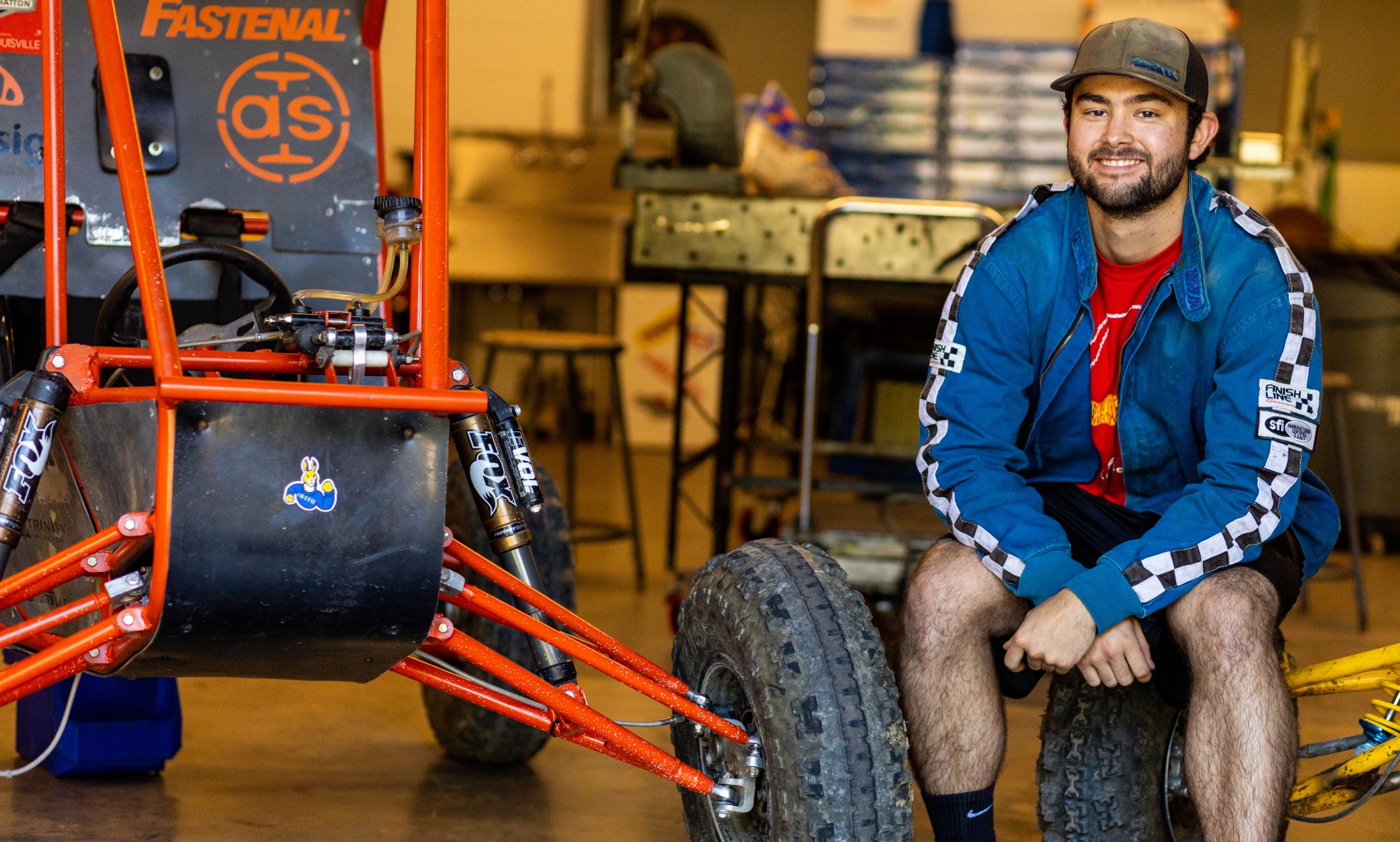
Layton Streck has a drive to succeed
Our ongoing story starts with people from around the world, converging here at UMKC. Get to know our people and you’ll know what UMKC is all about.
Layton StreckAnticipated graduation year: May 2023UMKC degree program: Mechanical EngineeringHometown: Pilot Grove, Mo.
Why did you choose UMKC?
UMKC has so much to offer. Being located in the heart of Kansas City, surrounded by multiple businesses where I could make connections, I saw myself reaching my fullest potential.
Why did you choose your field of study?
Mechanical engineering was a pretty perfect choice. I had always enjoyed being around cars and machines since I was young. I loved working with my hands and understanding how and why things were built. The field is broad enough that I can explore different avenues, whether it is manufacturing, power, HVAC, you name it.
What are the challenges of the program?
The whole program is a challenge! I am constantly studying and figuring out how to balance sleep and other things, but most of the time studying wins.
What are the benefits of the program?
Through this program I have learned the value of collaboration. In engineering it requires a team effort of everyone’s input and ideas to see which is best. I have learned time management, as well as that one bad grade won’t hurt me for the rest of my life.
"Through this program I have learned the value of collaboration."- Layton Streck
How has your college program inspired you?
It has inspired me to understand more of what I can achieve. Though it is tough in the moment, I have grown a lot as an individual.
What other extracurricular activities are you involved in at UMKC?
I am heavily involved in Baja SAE, an intercollegiate design series run by the Society of Automotive Engineers. It is a competition where teams of students from universities design, build and then compete with small off-road racing vehicles. It has given me the opportunity to get hands on engineering experience during my education.
Since entering college, what have you learned about yourself?
Being in college has taught me there are great benefits that come with hard work, whether that is with the Baja Buggy competition, grades or health. I have learned that things go right when you put in effort.
Who do you admire most at UMKC and why?
I admire the older Baja members because they create relationships with the new members by helping with latest ideas and designs. And at some points they help with classes if needed, too. It creates a mentoring environment and helps each member be the best they can be. You can usually point out our older members by their choice of hairstyle - the timeless mullet.
"I hope I will be able see everything that I learn from the time and experience at UMKC in my day-to-day work life."
What do you hope to take from your experiences at UMKC into your professional career?
I hope I will be able to take everything that I learn from my time and experiences at UMKC into my day-to-day work life. The biggest skills UMKC has helped me develop are my communication skills and teamwork mentality.
What is one word that best describes you and why?
Productive. I like to constantly be doing something to help move the project along. Even though sometimes that means not sitting on an idea all the way through, at least I have something to show. My Baja teammates would agree.
More About Layton
What’s your favorite social media channel and why?
Instagram is my favorite. It gives me a chance to connect with other Baja teams worldwide and see how they tackle common engineering challenges and on events outside the competition that are put on by SAE.
What’s your favorite spot to eat in Kansas City?
If I had to pick one spot it would be Parlor in the Crossroads art district, just because it houses many different places to eat in the same building.
Where’s your favorite spot to hang out in Kansas City?
My favorite spot is Westport. It gives a chance to meet with others easily and sometimes network with new sponsors for the team and potential members.
What’s your favorite spot on campus?
My favorite spot is the Baja shop in the brand-new Plaster Engineering building. I spend most of my free time there, as well as socialize with my friends from class.
Oct 25, 2021
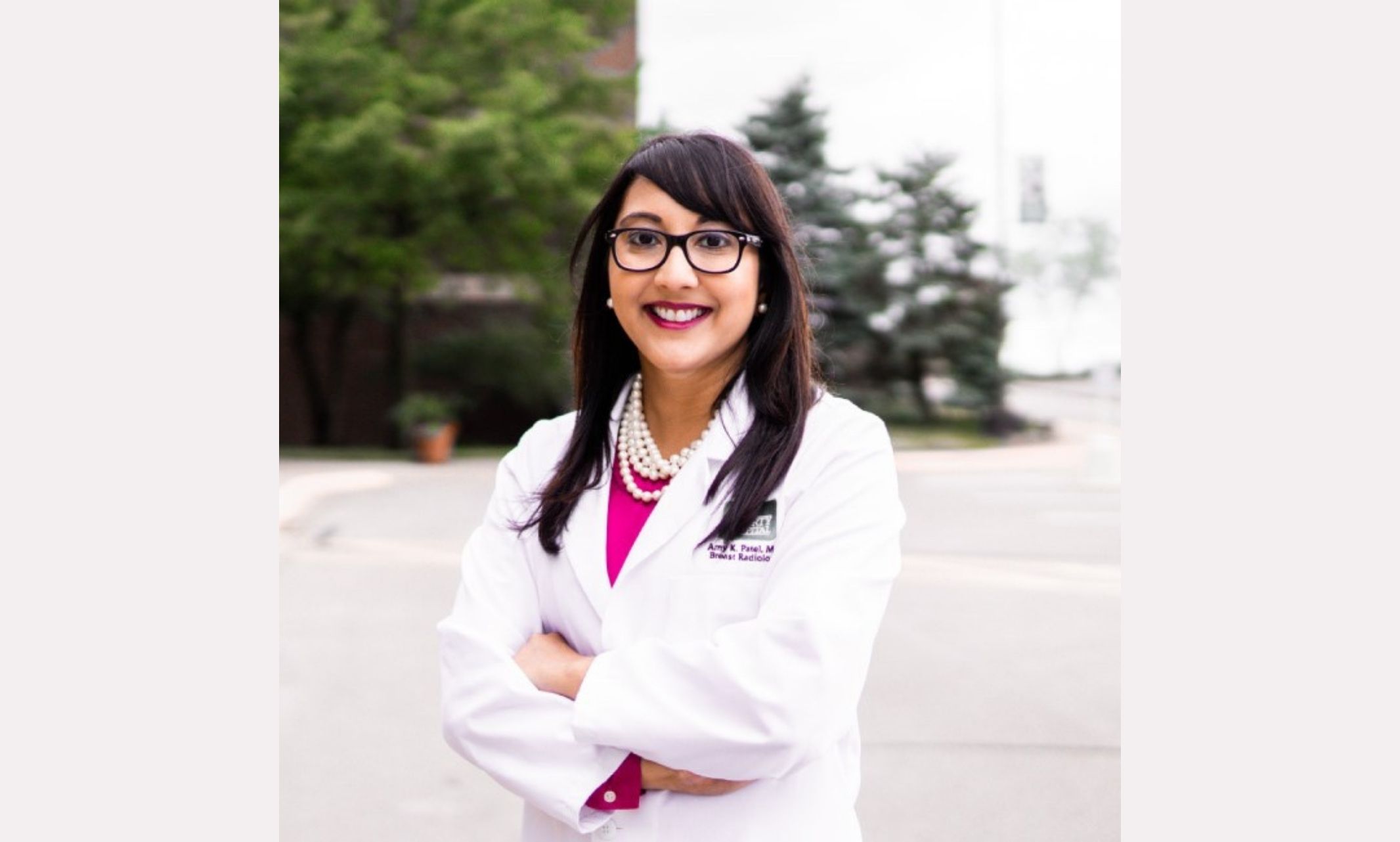
Dr. Amy Patel leads KC area Breast Care Center while mentoring students at alma matter
Growing up in Chillicothe, Missouri, a town of fewer than 10,000 people, Amy Patel didn’t see many physicians that looked like her.
“There was only one primary care woman physician in my hometown and there weren’t any women who looked like me, a woman of color. From a young age I realized there was such a need for women practicing specialized care, but especially for women of color,” Patel said.
That observation sparked a fire and passion in Patel that has continued to grow. Patel went on to study medicine at the University of Missouri-Kansas City and graduated from the school’s six-year medical program. During medical school she completed a rotation with a breast radiologist at Washington University in St. Louis, which was a turning point in her decision to specialize in breast cancer radiology.
After completing a breast imaging fellowship at Washington University, Patel began her professional career in Boston, and even found time to work as a faculty member at Harvard. But eventually, Patel felt called to return to Missouri.
“I always wanted to come back to the Midwest to assume a leadership position where I could make a difference and make an impact,” Patel explained.
In July of 2018 Patel was named medical director of the Breast Imaging Center at Liberty Hospital. Since her arrival she’s helped grow the program, adding an additional breast imaging specialist, starting a plastic surgery program and partnering with the UMKC School of Medicine to launch a Breast Radiology elective course. Patel teaches the course, which involves a rotation designed to introduce medical students to a range of screening and diagnostic breast imaging modalities to multidisciplinary care. She hopes this course will help others, especially women and minorities, become more interested in the profession.
“The percentages of women entering the radiology field have remained around 27% a year, and those numbers for underrepresented minorities are even lower. Right now, there are so many opportunities for students and I’m hopeful in the future, we will start to see growth in the percentages that have remained stagnant for many years,” Patel said.
In addition to helping launch the new rotation, Patel says one of the initiatives she’s most excited about is a newly launched genetics program within Liberty Hospital.
“Knowing your family history is very important because that could potentially warrant genetic consultation and then possible testing. That is why it's so important for a hospital system to have a genetics program and that's why we’ve worked really hard to have one here,” she adds.
While familial genetic indicators may be out of our control, Patel says everyone can proactively take steps to lower their risk of breast cancer.
“A healthy diet is important, maintaining a body mass index that is within recommended limits is key because we know obesity is a risk factor for breast cancer. Moderate alcohol consumption and not smoking are also important ways to lower your risk,” Patel said.
Regular screenings are also key in the fight against breast cancer. Patel says screening rates among women plummeted into the single digits during the pandemic due to the pause of routine screenings in Spring and early Summer of 2020 under advisement of the CDC. While the numbers have started to rebound, they’re still down about 13% compared to pre-pandemic.
“I always wanted to come back to the Midwest to assume a leadership position where I could make a difference and make an impact." — Amy Patel
“We are particularly worried about women of color, who tend to be the ones with more barriers when it comes to access and education. If screening rates don’t pick back up, we are worried that disparity could widen even further so it's really going to take the entire breast cancer community to come together and encourage patients of all backgrounds to get screened,” Patel said.
Patel says October is a good time to get screened and encourage friends and family to do so as well.
“Breast Cancer Awareness Month is not just about raising money for research; the awareness component is equally as important, and I love to see specialists coming together and encouraging others to go and get your mammogram.”
Oct 22, 2021
Maryfrances Wagner shares excitement about her prestigious nomination
Roos do amazing things, including earning one of the highest literary honors in the state.
Maryfrances Wagner, a UMKC alumna, was appointed to the position by Missouri Governor Michael Parson in July of 2021.
The blue and gold roots with Wagner go deep. After graduating with her bachelor’s and master’s degrees from UMKC, Wagner taught English for most of her career, including here at the university. During that time, she earned both local and state recognitions for Excellence in Teaching. In 2002, she became the English Coordinator for the High School College Partnership, a dual credit program, at UMKC. During those years, Wagner served on the composition committee, coordinated in-service programs on campus, wrote the composition handbook, and mentored thirty UMKC English teachers.
In addition, she is co-editor of the literary magazine I-70 Review and has served as President of The Writers Place where over the years, she has sponsored literary-based events throughout the community to include a number of programs that brought together poetry, music, and dance through improvisation. She has also served as Secretary on the Board of Directors for Kansas City Creates, which sponsors the annual Fringe Festival.
Wagner is teaming up with fellow UMKC alums to create opportunities for current students exploring literary career fields at her alma matter
“In 1988, my husband [Greg Field, MA from UMKC] and I, along with Robert Stewart (MA from UMKC), established the Crystal Field Scholarship fund, a scholarship that goes to a UMKC creative writing student, and we still oversee that as well as have an annual scholarship reading as a fundraiser where professional writers help support emerging student writers.”
Her journey as a poet, however, began long before her time at UMKC. She says, “When I was a child, my mother used to write little poems. She’d put them in our lunch bags, our suitcases, my brother’s duffel bag or on our pillows when we’d accomplished something significant. My father also wrote little poems in cards he gave to my mother.”
In eighth grade, a teacher assigned students to write about a particular topic, and her parents suggested she write a poem instead of an essay. That was her first foray in the art, and that passion would continue into her college years where she took creative writing classes to learn more about the craft.
Wagner says, “For the longest time I only showed my poems to friends, but my creative writing teachers encouraged me to try sending some poems out for publication, and after that, I kept on taking classes.”
She went on to publish nine collections of poetry, the latest The Immigrants’ New Camera. In 2020 she served as Missouri Individual Artist of the Year, the only writer to have received that award. In 2021, Wagner was nominated and appointed to serve as Missouri’s Poet Laureate
“I have always been a strong advocate for the writing community,” Wagner said. “This role will give me the opportunity to help promote other Missouri writers. It will give me the opportunity to try to reach out there to people less familiar with poetry or even to people who think they don’t like poetry, and hopefully, after the pandemic is over, I’ll be able to do more workshops, readings and events around the state.”
Wagner is Missouri’s sixth poet laureate. Her two-year term started July 1 and runs through June 2023.
You can read and hear Wagner’s work in a variety of places. She’s hosting a series of podcasts with other Missourian poets. You can also purchase her collections on Amazon, Barnes and Noble or visit her on her website.
Oct 22, 2021
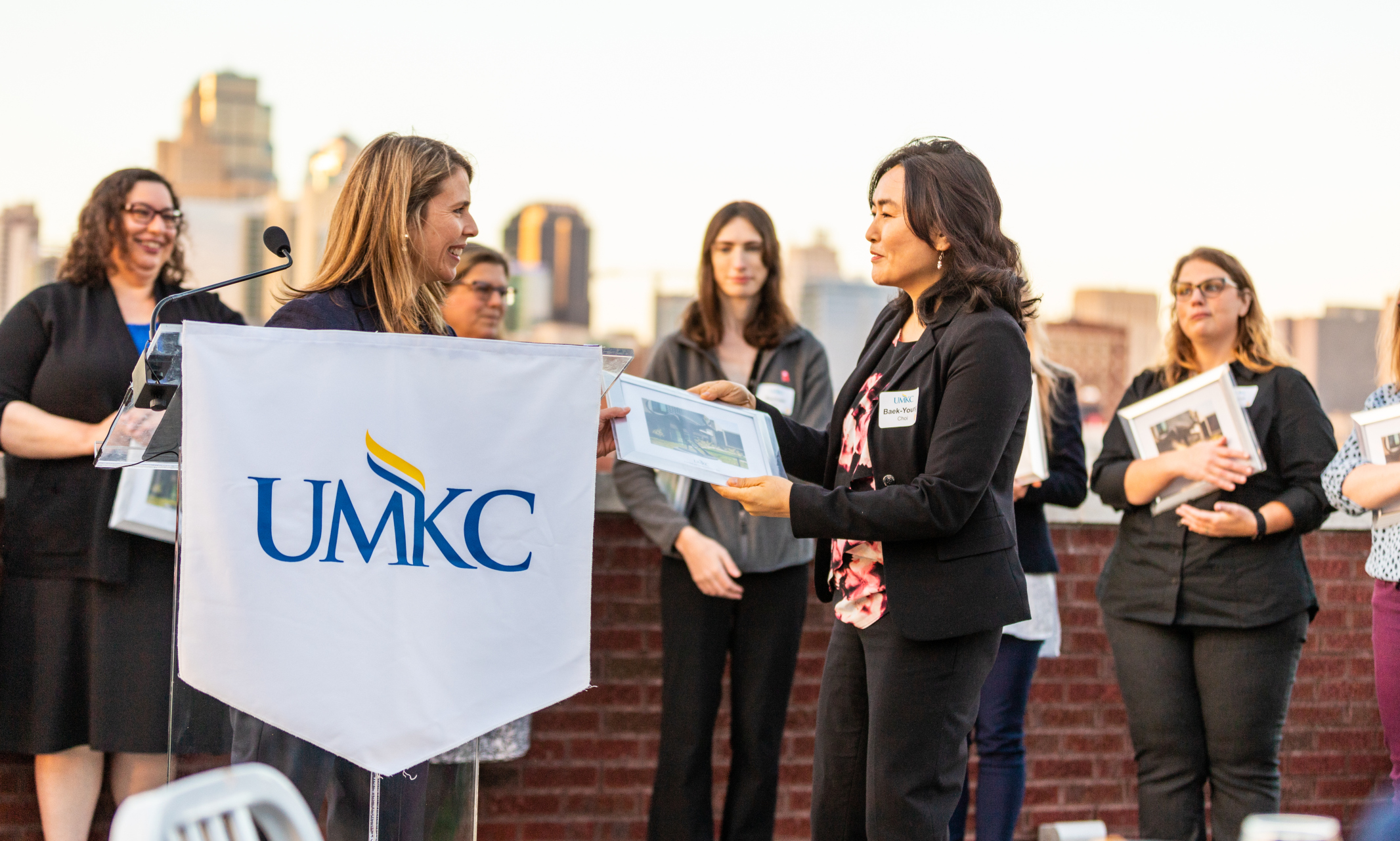
Chancellor cites ‘remarkable level of academic achievement’
UMKC celebrated the promotion and tenure of more than 30 members of its faculty Oct. 21 at a gala reception set against the city’s glittering skyline at the On Broadway event space.
“Each year, this promotion and tenure event is a celebration of achievement. Today, however, we are recognizing and celebrating a remarkable level of academic achievement,” said Chancellor Mauli Agrawal. “The operational and financial challenges posed by the pandemic came in tandem with enormous disruption in our personal lives.” He added that in the midst of those challenges, faculty also played a key role in the development and launch of the UMKC Forward initiative.
“Making your way through all that, in one piece, is a bragging point all by itself. But remember – in the midst of all those challenges, you have successfully pursued the path of professional growth and achievement that resulted in the promotions, and granting of tenure, that we celebrate tonight,” the chancellor said. “Think about that, as you stand here this evening, in October of 2021, and look back over the past several years at what you have achieved through this unique moment in history. Be proud. UMKC is proud of you. I am proud of you. You have proven yourselves to be truly exceptional.”
The event was set outdoors for the comfort and safety of the faculty members and their guests in the midst of the ongoing pandemic. The event also was focused solely on promotion and tenure. Other faculty awards and honors – such as new Curators’ Distinguished Professors, and Trustees’, Governor’s and Chancellor’s awards for research, teaching, mentoring, community engagement and commitment to diversity and inclusion – will be presented at a separate event in the spring semester.
“Our goal was an event that would be smaller, but still very special, as all of you deserve,” said Provost and Executive Vice Chancellor Jenny Lundgren. “I hope that comes through loud and clear.”
The promotion and tenure process at UMKC involves a lengthy and rigorous review of academic performance in the areas of teaching, scholarship and service. Each of the academics recognized at the celebration has demonstrated to their peers and to the administration that they have met high standards for sustained contributions and outstanding performance.
UMKC 2021 Promotion and Tenure
Ekaterina Strekalova-Hughes, School of Education, tenure with promotion to associate professor
Megan Hart, School of Computing & Engineering, tenure with promotion to associate professor
Sue Lasiter, School of Nursing and Health Studies, tenure
Joah Williams, College of Arts and Sciences, tenure with promotion to associate professor
Alison DeSimone, Conservatory, tenure with promotion to associate professor
LaVerne Berkel, School of Education, promotion to professor
Mike O'Connor, School of Biological and Chemical Sciences, promotion to professor
Viviana Grieco, College of Arts and Sciences, promotion to professor
Shannon Jackson, College of Arts and Sciences, promotion to professor
Baek-Young Choi, School of Computing & Engineering, promotion to professor
Xiaobo Chen, School of Biological and Chemical Sciences, promotion to professor
Elizabeth Vonnahme, College of Arts and Sciences, promotion to professor
Jennifer Huberman, College of Arts and Sciences, promotion to professor
Kym Bennett, College of Arts and Sciences, promotion to professor
Jacob Marszalek, College of Arts and Sciences, promotion to professor
Toya Like, College of Arts and Sciences, promotion to professor
Jasmine Abdel-Khalik, School of Law, promotion to professor
Del Wright, School of Law, promotion to professor
Dan McIntosh, College of Arts and Sciences, promotion to professor
Gary Abbott, Conservatory, promotion to professor
Lance Godley, School of Dentistry, promotion to associate clinical professor
Michael Murphy, School of Dentistry, promotion to associate clinical professor
Lynn Friesen, School of Dentistry, promotion to research professor
Heather Lyons-Burney, School of Pharmacy, promotion to associate clinical professor
Lisa Cillessen, School of Pharmacy, promotion to associate clinical professor
Kendall Guthrie, School of Pharmacy, promotion to associate clinical professor
Steven Kraske, College of Arts and Sciences, promotion to teaching professor
Crystal Doss, College of Arts and Sciences, promotion to teaching professor
Rebecca Davis, College of Arts and Sciences, promotion to teaching professor
Mitchell Brian, College of Arts and Sciences, promotion to teaching professor
Kelley Martin, University Libraries, promotion to librarian III
Danielle Merrick, School of Law, promotion to clinical professor
Rachael Allen, School of Biological and Chemical Sciences, promotion to associate teaching professor
Aaron Reed, School of Biological and Chemical Sciences, promotion to teaching professor
Oct 22, 2021
Scenes from the pandemic: Telehealth a perfect fit for treating heart failure
“Heart failure is a particularly important disease for which to examine the impact of telehealth, as it is a chronic condition necessitating continual assessment of symptoms, health status and medication adjustment,” wrote lead author Yasser Sammour, MD, a cardiology resident at the University of Missouri Kansas City, and colleagues. “Moreover, patients with HF are a particularly vulnerable population for complications related to COVID-19 infection, including critical illness and mortality.” Read more.
Oct 22, 2021
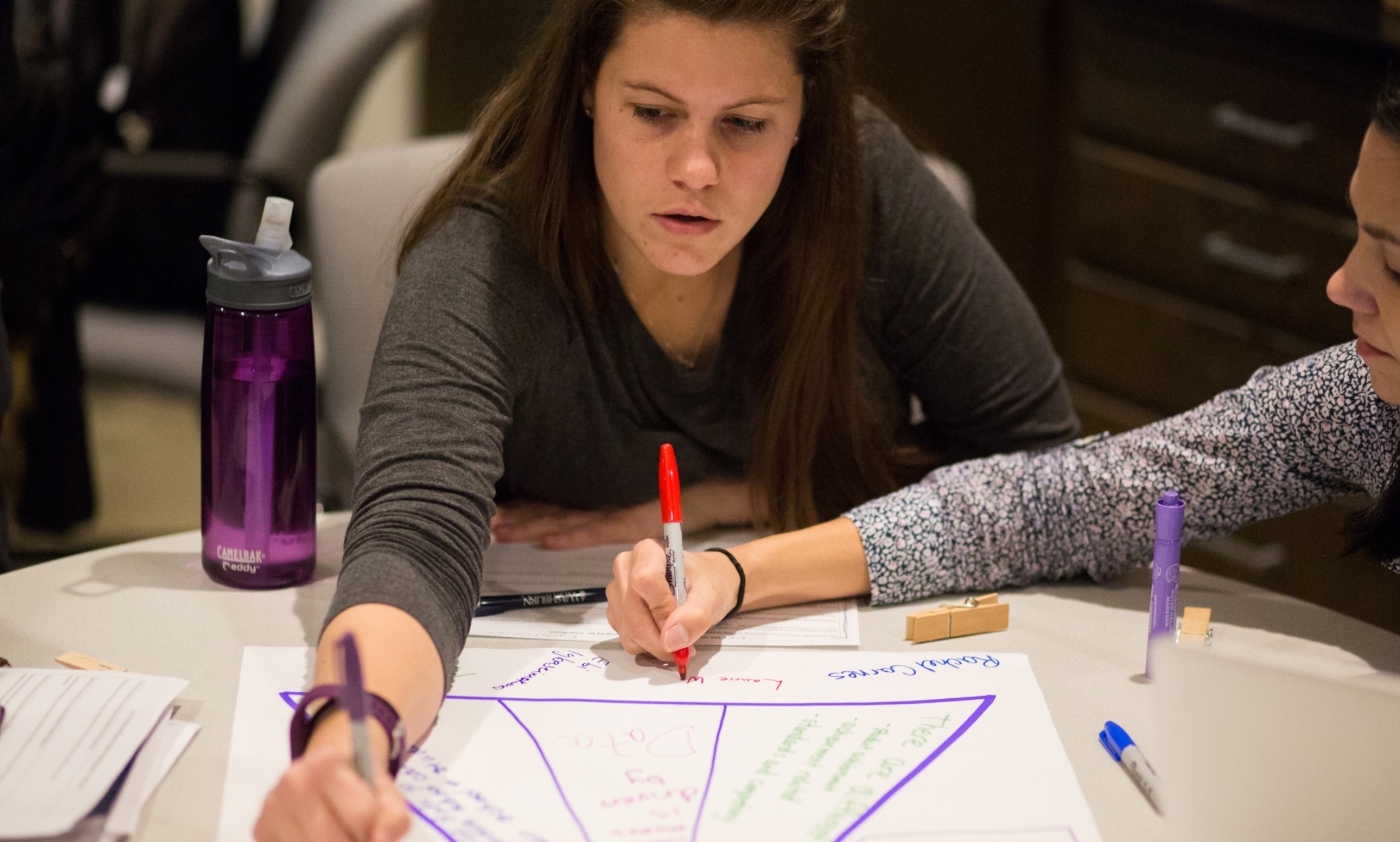
STEM curriculum offered in 163 Missouri school districts
A new study of Project Lead The Way, a curriculum which focuses on increasing students’ exposure to science, technology, engineering and mathematics skills, shows the program has significant impact in encouraging students’ long-term interest in STEM education and careers.
A new study of Project Lead The Way, a high school curriculum which focuses on increasing students’ exposure to science, technology, engineering and mathematics skills, shows the program has significant impact in encouraging students’ long-term interest in STEM education.
The research team, led by Eric Camburn, Ph.D., Sherman Family Foundation Endowed Chair and director of the Urban Education Research Center, and Karin Chang, Ph.D., associate director and associate research professor at the University of Missouri-Kansas City, studied the potential impact of the Project Lead The Way curriculum on two cohorts of Missouri high school students. Camburn and Chang conducted the study in collaboration with researchers from St.Louis University and the University of Missouri-Columbia.
Their research revealed that students who took Project Lead The Way (PLTW) classes were more likely to take dual college-credit courses in high school, graduate from high school, enroll in college and declare a STEM major upon initial enrollment than students who did not.
“We found that taking Project Lead The Way courses help students successfully graduate from high school and go on to postsecondary education,” Camburn says. “And students in historically underserved groups appear to have benefitted even more on important outcomes.”
While the initial program implementation was focused on a few schools, implementation in recent years has grown substantially. In 2005, Missouri launched the PLTW program in 10 districts and 16 schools. The program is now offered in 384 schools in 163 districts across the state and is in elementary, middle and high schools.
“We found that taking Project Lead the Way courses helps students successfully graduate from high school and go on to postsecondary education.” — Eric Camburn, Ph.D.
Camburn and his team estimate that approximately 17 percent of Missouri high schools have an active program. The team’s research included more than 145,000 first-time ninth graders, 13 percent of whom had enrolled in at least one PLTW course.
Kenny Rodrequez, superintendent of schools for the Grandview C-4 School District, has extensive experience with Project Lead The Way as a teacher and administrator. He was instrumental in expanding the curriculum into more classrooms in his district.
“I had previous experience with the curriculum before I came to Grandview,” he says. “I knew how good it was. I could see that we needed to expand the program.”
Rodriguez has facilitated expanding the curriculum from Pre-Kindergarten through twelfth grade. He thinks it’s successful in engaging students for a number of reasons.
“Number one, it’s a very defined curriculum. The lessons are mapped out in a way that teachers are able to support students at a high level. But it also provides flexibility, so they can incorporate different components at the right time.”
He says he’s seen both new and veteran teachers have positive experiences.
“It’s a great package. Veteran teachers have the flexibility they need, but there is a clear path for new teachers, too.”
Rodriguez says students often respond to the PLTW curriculum because it has a connection to the real world.
“Four years ago, I heard a group of fourth graders talking about what would happen if we had a global outbreak of [a virus.] I wish I could go back to that class and say, ‘Did you ever think that could actually happen in the real world?’”
Rodriguez was not surprised to learn the outcomes of the research on PLTW curriculum.
“There’s so much community support around this work. We can reach out and get immediate help. Teachers are so busy. That is important.”
Camburn says Rodriguez’s experience is not unique.
“We believe a reasonable implication of these preliminary findings is that widespread implementation of the program in the state is likely to help more Missouri high school students make the transition to secondary education, including college, trade and vocational schools,” Camburn says.
The Urban Education Research Center (UERC) is a research and evaluation center within the University of Missouri-Kansas City School of Education. The center works collaboratively within the School of Education, across the university and in conjunction with local partners and communities to create reliable, usable knowledge about education in urban areas.
“The Urban Education Research Center is uniquely qualified to provide exemplary research on the impact of this curriculum on student outcomes,” Carolyn Barber, interim dean, School of Education. “Dr. Camburn has devoted three decades to research on school improvement, leadership and inequalities in educational opportunity. Ultimately, we hope this knowledge promotes excellence in schooling and opportunities for residents of the Kansas City metropolitan area as well as communities across the state of Missouri.”
Oct 21, 2021
Kansas Public Radio reports on this three-day festival of the music
Hear Cooper McGuire and Alicia Willard perform Charles Ives’ ‘General Booth Enters into Heaven’ followed by a chat with UMKC Conservatory professor of music theory and composition David Thurmaier and piano professor Thomas Rosenkranz, who will do one of the Concord Sonatas. Read more.
Oct 21, 2021
Supply chain shortages could get worse before they get better
For decades, manufacturers have mostly had quick and ready access to the things they need to assemble products that people use every day. When things are running smoothly, it usually takes about three weeks to receive what they need. Now, according to UMKC professor Larry D. Wigger, Jr., the average wait time for manufacturers is 92 days.
Why Supply Chain Bottlenecks Are Keeping Home Prices Sky High - Realtor.com
Supply chain shortages could get worse before they get better - KCUR
‘What do we tell our customers?’: Labor shortage, material delays hamper home construction - Columbia Missourian
Oct 20, 2021
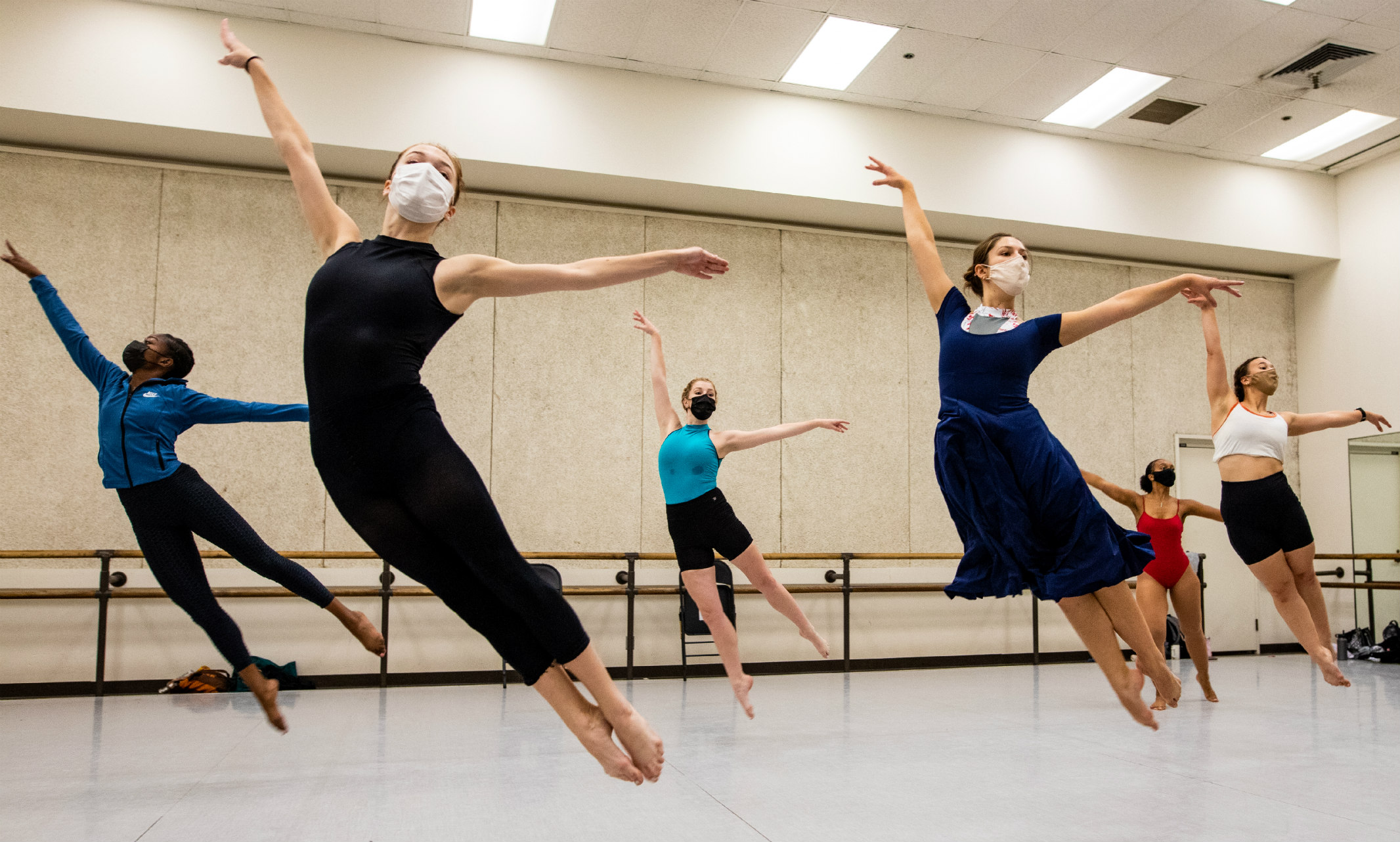
UMKC Dance brings work and art to the community
Science is the focus of the Roy Blunt NextGen Precision Health building in Columbia. But thanks to UMKC, the arts will play a significant role in the Oct. 19 grand opening event.
Kim Kimminau, Ph.D., a program lead for NextGen Precision Health, asked DeeAnna Hiett, chair and associate professor of Dance at the UMKC Conservatory to choreograph an original dance for the opening celebration.
The NextGen Building will be an anchoring facility for the NextGen Precision Health initiative, which will harness the power of the four universities in the UM System, MU Health Care, MU Extension and external partners to bring together cutting-edge research, technologies, and treatments to transform health care and save lives.
Hiett’s inspiration for the NextGen dance came from her perspective on the resilience of the human body and spirit, “We shall rise from the ashes.” The video starts somber and gets more intense throughout. In the beginning, the audience will see the dancer come from a low place in her life, struggling as she thinks back in time. Scenes will show the dancer wistfully looking out a window and walking down a busy street, oblivious to her surroundings and those around her. As the video ends, the audience watches the dancer come back to herself with a sense of encouragement to survive, creating a triumphant feeling for the audience.
“I’m hoping to give the sense of hope,” Hiett said. Everyone, regardless of their profession or place in life, overcomes struggles. And without science and doctors, Hiett said dancers couldn’t do what they do. “They keep us in operation. We’re honored, humbled and flattered to share our art with science.”
The performance Hiett choreographed for the NextGen opening is short – under four minutes. It’s an original piece with one dancer at the center of the performance. It includes nine dancers; seven are UMKC students and two are from the Wylliams/Henry Contemporary Dance Company, where Hiett is artistic director. The dancers include Ashlan Zay, senior, lead dancer; Ivyana Robinson, senior; Ashleah England, senior; Lauren Jespersen, senior; Alexa Glomp, senior; Elizabeth Lollar, sophomore; and Lecia Sims, junior. Wylliams Henry Contemporary Dance Company dancers are John Swapshire, UMKC Conservatory alumnus; and Jeremy Hanson.
The project came together quickly after Hiett accepted the invitation. She put the call out for volunteers, which was before the fall semester started. She said the first week of school was challenging because they rehearsed for two hours a day in the week leading up to the recording on Sept. 4. Four hours later, the video was shot and ready for editing and final production. Videography was provided by Ryan Bruce and Jeremy Hanson. Video editing was provided by Caroline Dahm, UMKC Conservatory adjunct professor of dance and Wylliams/Henry Contemporary Dance Company executive assistant and company member.
This isn’t the first time Hiett has said yes to creating an original dance for another discipline or for a community project. The UMKC Dance Department also collaborates with the UMKC School of Computing and Engineering and UMKC Health Sciences District schools. UMKC Dance students and faculty even created a celebration video for the Kansas City Chiefs’ return to the Super Bowl in 2021. They do these projects because Hiett, faculty and students are passionate about their craft. It’s their work. It’s their art.
“We take art and dance to the community,” Hiett said. “We love to dance, and we love to share it. So, any opportunity we have to get out in the community, of course we want to.”
Oct 19, 2021
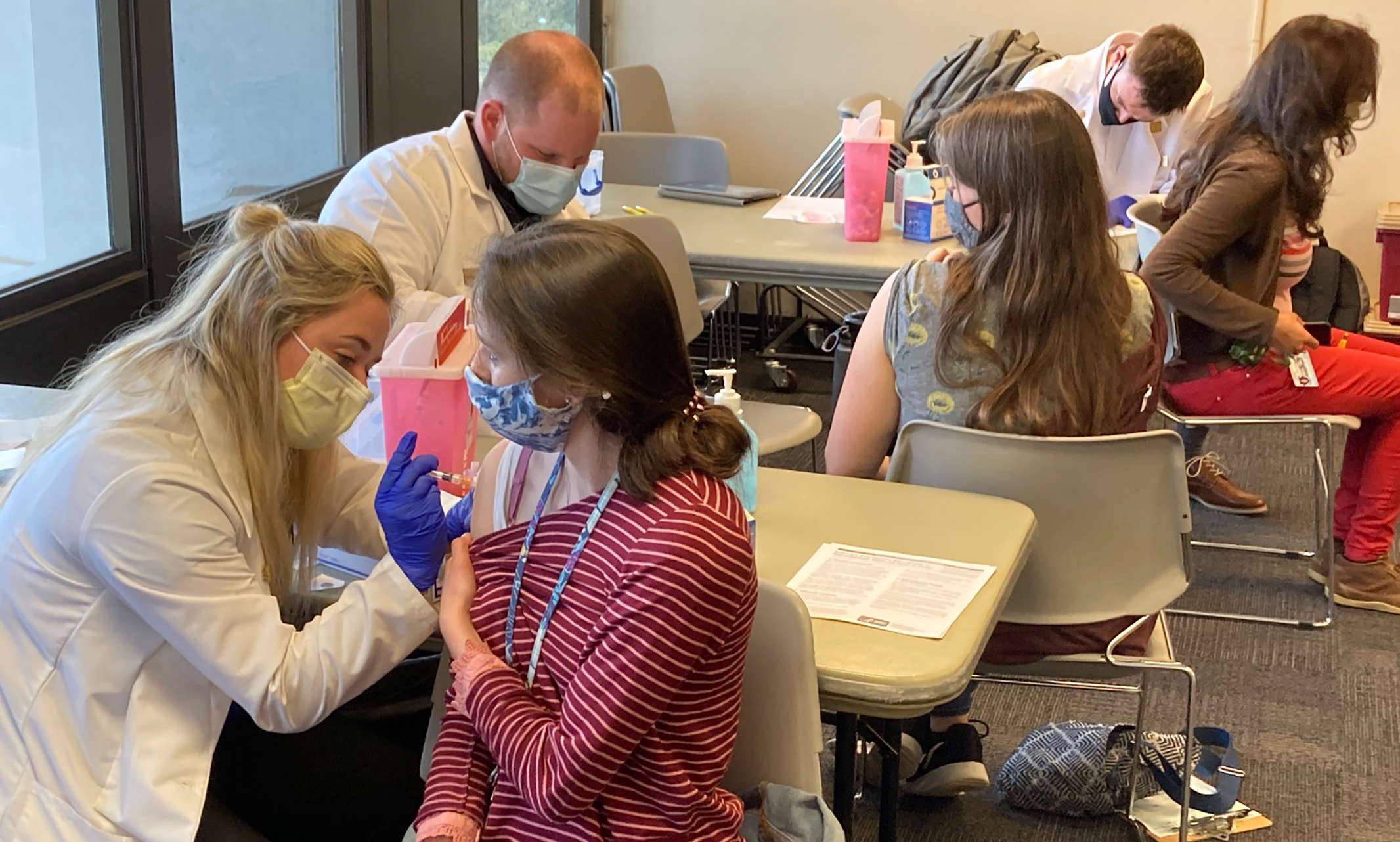
Springfield campus students, faculty are taking up a flu shot challenge
Flu season is in full swing and college students living in a campus environment that combines close living quarters with communal dining facilities and large classrooms can be particularly at risk.
That’s why UMKC School of Pharmacy students at the school’s Springfield campus are partnering with Missouri State University Magers Health and Wellness to sponsor the “Bear the Band-Aid” flu shot challenge. The campaign is meant to raise an awareness of the importance of receiving an annual flu vaccine, said Paul Gubbins, Pharm.D., associate dean for the UMKC School of Pharmacy at Missouri State University.
“We started the Bear the Band-Aid campaign in September 2016 in an attempt to increase the vaccination rates on the MSU campus,” Gubbins said. “Our effort was based on a 2016 report by the National Foundation for Infectious Diseases that noted influenza vaccination rates are typically very low on college campuses.”
The Center for Disease Control and Prevention estimates that nearly 8 percent of Americans will get sick from the flu virus each year. That means more than 26 million people developing flu symptoms.
Outreach efforts by Springfield pharmacy students included an article in a Missouri State campus newsletter where they noted that while most college students recognize the risk of flu to the very young or old, they often underestimate their own risk.
Gubbins said the initiative has met with mixed results. While a study has shown the vaccination rate on the Springfield campus to be higher than the reported rate on college campuses across the nation, there is still a need to increase awareness of the need to receive the vaccine. At the same time, among those who have been vaccinated previously, the campus campaign has created a greater awareness, Gubbins said.
“We feel it augments everything that MSU already does to make the influenza vaccine easily accessible to its students,” Gubbins said.
As of early October, nearly 2,000 employees and students on the Springfield campus had received the vaccine.
In addition to the awareness campaign, the campus pharmacy students are also active in delivering influenza vaccinations to those in Springfield and Greene County. Throughout a given flu season, Gubbins said his students will administer as many as 700 to 900 influenza vaccines throughout the community.
In Kansas City, UMKC pharmacy students have been active in administering vaccines at the university’s flu vaccine clinics in September and October. Pharmacy students from UMKC’s three campuses in Kansas City, Columbia and Springfield also collaborate with pharmacies, clinics and organizations throughout Missouri each year to typically provide nearly 3,000 flu shots to patients throughout the state.
The regional American Pharmacists Association-Academy of Student Pharmacists organization honored the UMKC School of Pharmacy in 2019 with an Operation Immunization chapter award. It recognized the extraordinary contributions pharmacists provide to improving vaccination rates in their communities. The UMKC chapter also received the national recognition in 2012.
Oct 19, 2021
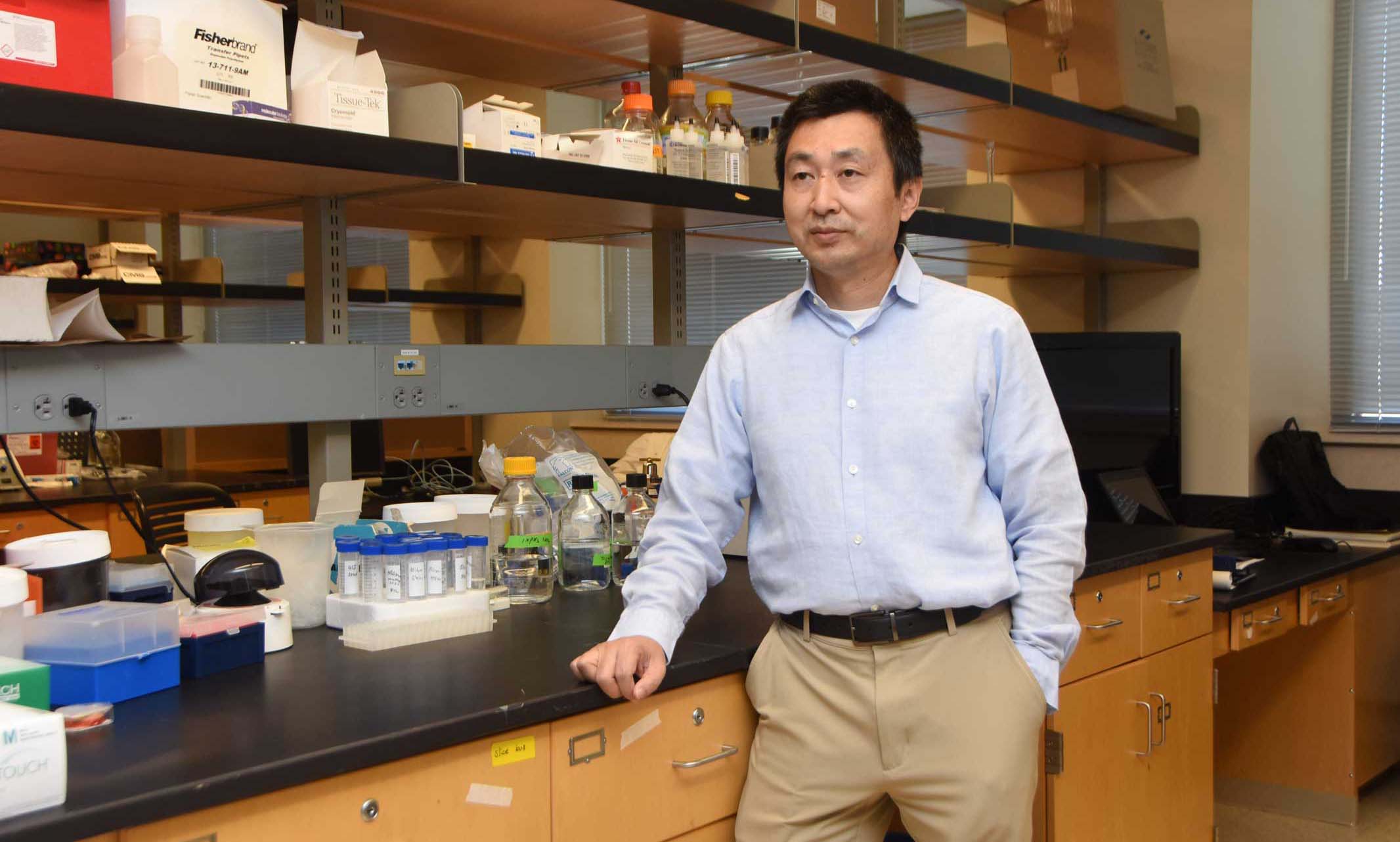
For Xiangming Zha, more labs are better than one
For Associate Professor Xiangming Zha, expanding his network for collaboration is a critical consideration for his moving to UMKC. “It’s hard for one lab to get everything done,” said Zha. “When you build up that network, your research gains more opportunities.”
That network has included a decade-long collaboration with Dr. Xiangping Chu at the UMKC School of Medicine. Now he is expanding his network to include the UMKC School of Pharmacy, where he’s joined the faculty, continuing his research focused on brain function with a general interest in neuroscience. The crux of his research centers around the study of pH – a scale used to specify acidity – in the brain that contributes to neuron function and ischemic brain injury. More recently, he has started to look at the role of pH in cerebral vascular function.
In 2004, while in his post-doctoral fellowship at the University of Iowa, he saw an opportunity in this area-of-study because of field is less explored. Prior to UMKC, he was at the University of South Alabama (USA) School of Medicine. “At USA, I was fortunate to work with a group of excellent collaborators,” said Zha. “The good thing about moving from medicine to pharmacy is that I still maintain all the previous connections. At the same time, it allows me to build new connections and thus explore new directions of research.”
That’s what has him excited about his move to UMKC School of Pharmacy. The move has additional benefits as he can lean on the school’s pharmacology and pharmaceutical researchers. He has been studying the acid-sensing ion channels and acid-sensitive GPCRs. According to Zha, there are few viable pharmaceutical options to activate or inhibit these acid receptors in the brain.
“There are a couple of pharmaceutical compounds available but none are ideal and that’s the challenging part,” said Zha. “If we have a more specific compound which can turn on and off the receptors, we may be able to better understand these acids.”
Unlocking that aspect of the research could help understand the duality of the acidity levels in the brain. Too much acid is rarely a good thing but there is recent research data that shows there may be some protective effect. To target the benefits of the acid, Zha needs to know more about the receptor and signaling involved, which aren’t well-defined yet.
These challenges have kept his research interest for the entirety of his career. Zha admits that research lives on grant funding and previous research is a key to successful funding.
“One important part for that to happen, is having good people,”said Zha.
Students and fellows interested in participating in his research efforts are encouraged to contact him.
Oct 19, 2021
UM System opens NextGen, and supporters 'can't wait for the discoveries'
Roy Blunt has been called “a champion of public higher education” for spearheading a medical student education program that raised more than $25 million for MU and the University of Missouri-Kansas City focusing on doctor shortages across Missouri. Read more.
Oct 19, 2021
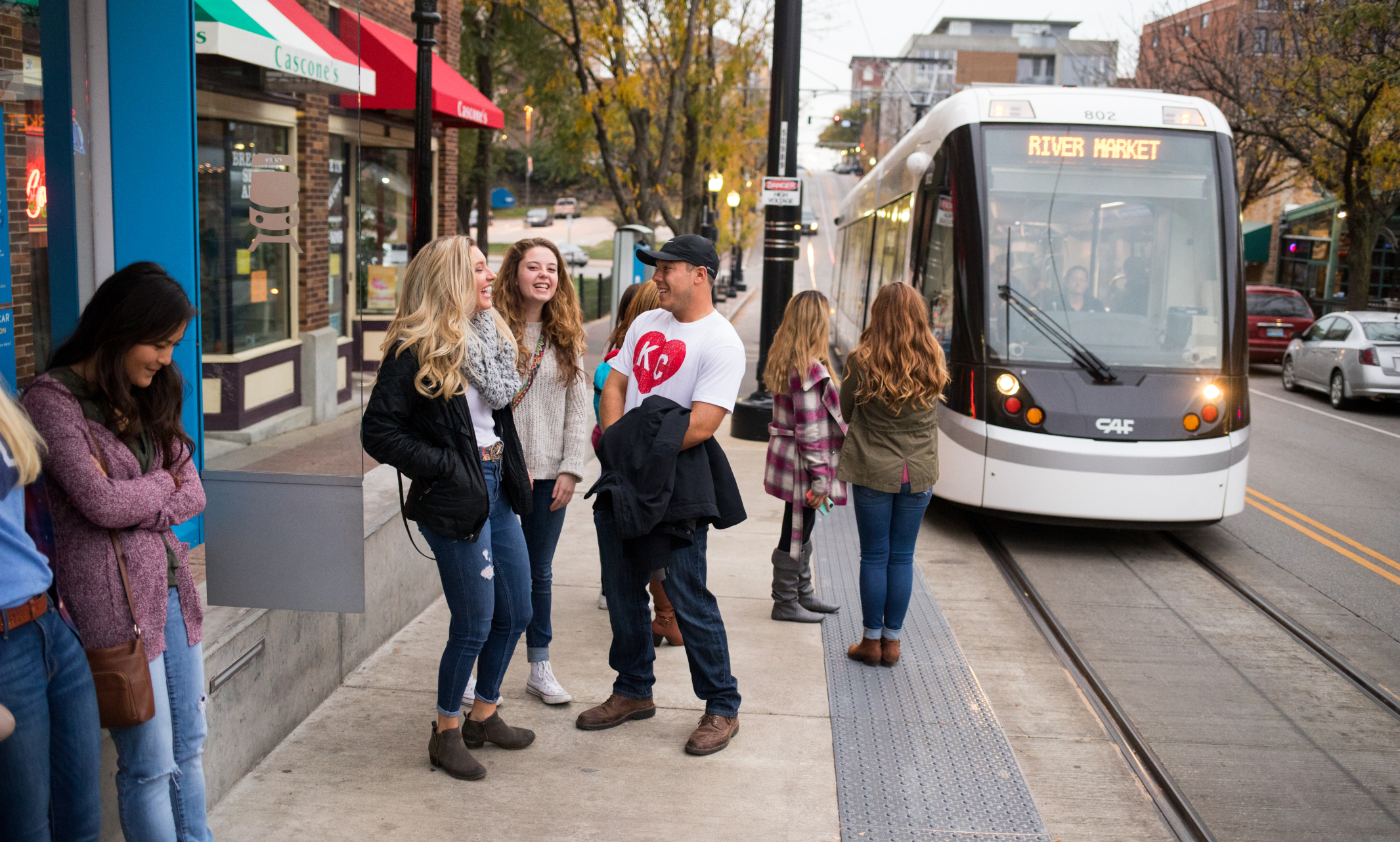
Students' plans could be incorporated in the new UMKC stop
A UMKC professor and several students had the opportunity to contribute ideas for the new KC Streetcar stop at the Volker campus.
Bill Yord, an adjunct instructor for the School of Computing and Engineering, also serves as Senior Project Manager with the Kansas City Area Transportation Authority (KCATA) and utility manager with the KC Streetcar South Extension. He is also a UMKC alumni (B.S. '01, M.S. '09).
Yord reached out to Streetcar stakeholders about UMKC senior students assisting with designs for the Streetcar's south terminus at UMKC, which is part of the ongoing KC Streetcar South Extension project.
The extension project, which has gone through planning and design by city officials since 2017 and will soon be under construction, will cover more than 30 city blocks and will extend the existing 2.2-mile 'Starter Line' to the UMKC Volker Campus, providing an exciting new access opportunity for the campus.
The UMKC Streetcar stop will be at 51st Street and Brookside Boulevard, near the former location of the Oak Place Apartments.
"I was looking at the Streetcar construction and thinking, 'We have to bring the students in on this and I called the KCATA and asked, 'Would you all be interested in involving a UMKC senior design project for the Streetcar?'" Yord said. "I got a call back in about five minutes and the answer was an overwhelming yes."
For the senior project, students were asked to study pre-existing blueprints of the UMKC Streetcar stop and come up with design concepts for the project.
"We were looking at everything: roadway design, station platform design, passenger amenities, utilities, grading and drainage," Yord said. "We would all get together and look at the designs and say 'What can we incorporate"? How can we make it better?' Then we would give those plans to the stakeholders and they would come back with suggestions and we would say, 'Okay, now how can we make this more robust?' and it went on and on from there."
Jordan Salt, a student who worked on the project, said he would walk past the stop site every day on his way to campus to "trigger" thoughts on how to do things differently.
"Knowing that this project was going to potentially contribute to a major infrastructure project made it one of the most interesting projects in my college career," Salt said. "The project's proximity to where I study and live inspired me."
Bayley Brooks, who also worked on the project, said one of the biggest things she learned while working on the project was how many people are involved in designs for city projects.
"For the Streetcar project we met with people from UMKC, KCATA, city officials, the Kansas City Streetcar Authority, the Federal Transit Authority, the Kansas City Utilities Department, I mean the list just goes on and on," Brooks said. "I enjoyed getting the chance to brainstorm creative ideas for the Streetcar stop with the group."
At the end of the semester, the students presented their preliminary design plans to a large group of stakeholders who were heavily involved in the extension. Brooks said her favorite design concept submitted was putting a kangaroo fountain at the UMKC stop.
"We are the city of fountains after all!" Brooks said.
"I ride the Streetcar all the time, so I'll be so proud to see some of our design ideas hopefully used in the stop."
Final plans for the UMKC stop are not completed, so it's too soon to tell how much of a role the students' designs will play in the final product, but Yord said he has no doubt that some of the students' design work will be implemented.
"I can confidently say that our students had a hand in making the (UMKC stop) a better place for our students, our faculty and the community to come in and come out of the university," Yord said.
The extension project, and the opening of the new UMKC Streetcar stop, is projected to be completed sometime in 2025.
Those interested in hearing more about the extension can attend the Kansas City Streetcar extension webinar from 8:30 to 10 a.m. on Friday, Oct. 22. The event is being hosted by the SCE Alumni Association and the SCE Alumni Relations Office.
The webinar will feature a moderated panel of professionals working on the streetcar extension, including Yord.
Other panelists include Tom Gerend, Executive Director of the Kansas City Streetcar Authority; Cindy Moses, Regional Engineer for the Federal Transit Administration; Jason Waldron, Transportation Director for the Public Works Department for the City of Kansas City; and Nick Stadem, Project Manager with HDR, a design and construction company.
The entire webinar can be watched here.
Oct 18, 2021
Canceled Southwest flight forces local couple to improvise
UMKC’s Russell Melchert, dean of the School of Pharmacy, was featured on KCTV 5 for his remarkable story about his trip home from Texas this weekend — which involved a UHaul truck instead of his scheduled Southwest flight. Read more and watch the newscast.
Oct 18, 2021
State Spending on Poverty Really Pays Off for Kids: Study
“Child abuse and neglect is a public health crisis, and it needs a public health response to be prevented. Pathways toward addressing poverty is one of the cornerstones, I believe, for preventing child abuse and neglect,” said lead author Dr. Henry Puls, from the pediatrics department at Children’s Mercy Kansas City, and associate professor, pediatrics, University of Missouri-Kansas City School of Medicine. Read more.
Oct 18, 2021
Rent is going up so fast, it’s not just pricing out residents — It’s hurting Kansas City
Erin Royals at the University of Missouri-Kansas City Center for Neighborhoods was quoted for this story. Read more.
Oct 17, 2021
Local news outlets report on the pandemic's effect on applications to nursing schools
The UMKC School of Nursing and Health Sciences saw undergraduate applications jump by 10% since the pandemic. “They were seeing agony in their communities, in cities and they wanted to help,” Interim Dean Joy Roberts said. Read the news:
Kansas City-Area Universities See Increase In Undergraduate Applications For Nursing Amid Pandemic - KSHB
UMKC Credits COVID For Rise In Nursing School Applications - KCTV
More Applying For Nursing Programs In Kansas City During The COVID-19 Pandemic - KMBC
Oct 15, 2021
KMBC Reports: Paper publishes story exposing MO education website vulnerabilities
The St. Louis Post Dispatch reported a story on how they found a way into a secure part of the state’s education department website. After alerting the state, the story published by the paper said, “The newspaper delayed publishing this story to give the department time to protect teachers’ private information.” Governor Parson disagreed. UMKC journalism professor Steve Kraske said he believes the paper did everything it could to avoid an issue. Read more and watch the newscast.
Oct 14, 2021
Meet six newly funded companies helping get KC’s economy ‘back on track’ with Digital Sandbox
Digital Sandbox KC announced on Wednesday its third-quarter roster of companies earning funding, selecting solutions in parenting ed-tech, esports, business intelligence and more, said Jill Meyer, senior director of the Technology Venture Studio at the UMKC Innovation Center. Read the article.
Oct 14, 2021
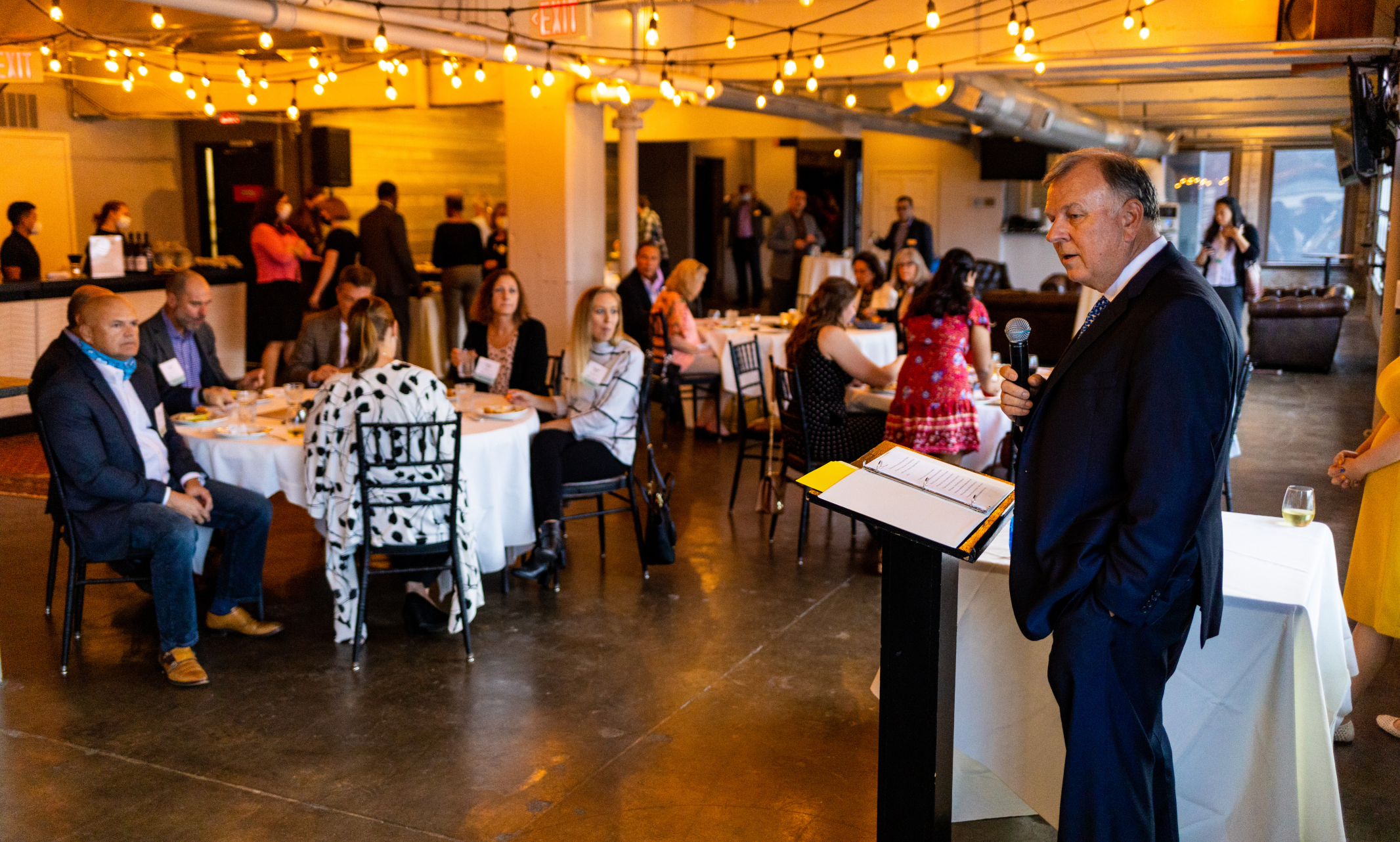
Kauffman, Sunderland foundations among this year's Vanguard Award winners
Kansas City donors, alumni and organizations were highlighted at the 2021 UMKC School of Computing and Engineering Vanguard Awards in October.
The annual award program is an opportunity to spotlight those who help expand STEM education and outreach in Kansas City.
"Our vision is to become a valued regional school of science, engineering and technology with signature professionally based education, research and community programs. I believe these award recipients are the embodiment of this vision," said Kevin Truman, dean of the school.
This year the school recognized four honorees (as well as last year's winners who could not accept their awards in person due to the COVID-19 pandemic) in the categories of SCE Young Alumni Award, SCE Supporter Award, STEM Outreach Partner and Organization of the Year.
Photo by Brandon Parigo
2021 Vanguard Award Recipients
Young Alumni Award: Riddhiman Das, BS '12, MS '19, TripleBlind.
In 2019, Das started his own company, TripleBlind. The company's mission is to build cryptographically powered 'cyber' privacy without reliance on any given legal system. Currently, they are working on building an application programming interface that will enable bulletproof privacy as a service.
Before starting TripleBlind, Das worked in Corporate Venture Capital and M&A for Ant Financial. In this role, he sourced deals in Blockchain, Artificial Intelligence, Cybersecurity, IoT Computing. Ant Financial is the financial services member of the Alibaba Group, which purchased SCE technology-based EyeVerify, now known as ZOLOZ. Prior to working for Ant Financial, Das was a product architect at EyeVerify.
SCE Supporter of the Year: The Sunderland Foundation
The Sunderland Foundation has been a strong supporter of UMKC and SCE capital project, providing one of the lead gifts for the new Robert W. Plaster Free Enterprise and Research Center and renovations within Flarsheim Hall.
Outreach Partner of the Year: Kauffman Foundation
The Kauffman Foundation is a longtime support of UMKC and the SCE, helping fund the free enterprise portion of the Plaster Center, SCE's KC STEM Alliance, student teams and more.
Organization of the Year: Black & Veatch
Black & Veatch is the largest engineering firm in the Kansas City area. It is a global engineering procurement, construction and consulting company that specializes in infrastructure development in power, oil, gas, water, telecommunications, government, mining, data centers, smart cities and bank and finance markets.
The company's support for SCE is broad and includes a major gift for the new Plaster Center, additional philanthropic support for scholarships and student teams, providing internships and hiring students and adjunct faculty for specialty areas.
Oct 13, 2021
Community group pushing to vaccinate more people on Kansas City's eastside
“We want people to feel welcomed, we want them to feel like they’re in an environment that they know, they trust, they frequent often,” said Jannette Berkley-Patton, a professor at the UMKC School of Medicine. Read more and watch the newscast.
Oct 12, 2021
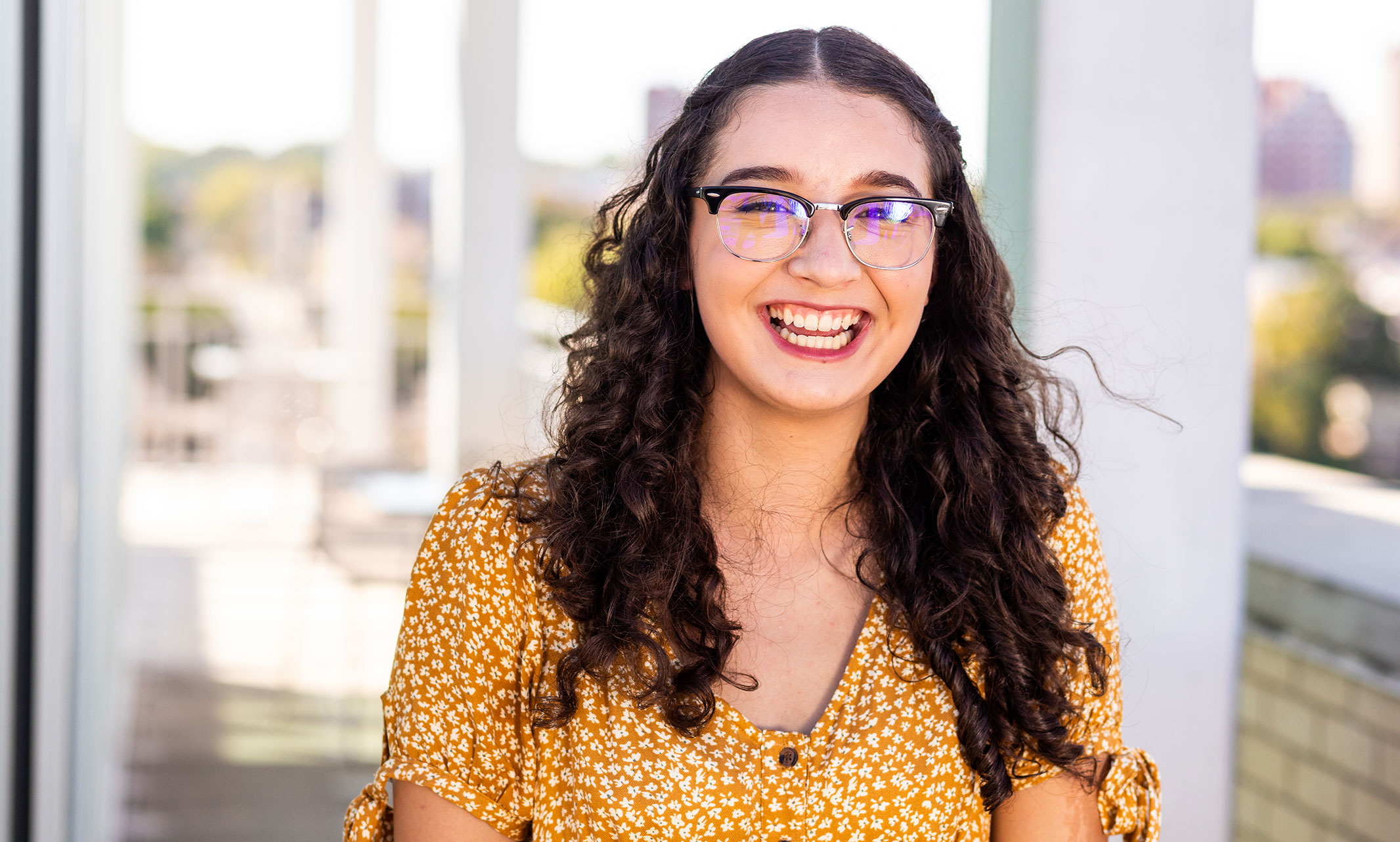
Hannah Leyva will not allow other’s expectations to define her
Hannah LeyvaAnticipated graduation year: UndeterminedUMKC degree program: University College (undecided/exploratory)Hometown: Kansas City, Kansas
Our ongoing story starts with people from around the world, converging here at UMKC. Get to know our people and you’ll know what UMKC is all about.
Hannah Leyva started her UMKC journey in 2020. A first-generation Honors Program college student, she felt a lot of pressure to go down a specific path: a biology major on a pre-medicine track.
“I came to UMKC with a set plan in mind, but it was not a reflection of my strengths or interests,” Leyva said. “My previous career goals were based around others’ expectations of me and not what I expected from myself.”
This year, Leyva is slowing down and attending the university as an undecided major. It allows her to explore her interests and ensure that her career will be one of her own making. However, this path has its fair share of struggles as well.
“The overall challenge of being undecided on your major has to do with the generalized stigma of not having your entire life planned out,” Leyva said. “The entire notion of knowing who you are and what you want to do straight out of high school is rather daunting. I think that part of going to school is learning that there is more than one way to achieve your goals, and that success is not exclusively found in a traditional path.”
"The University College is helping me determine my career goals and academic interests based on what suits me and not anyone else." - Hannah Leyva
The path less traveled is not a path one has to travel alone. Leyva has found support from students with similar life experiences as a member of the Latinx Student Union (LSU) executive board. She hopes to continue this connection by establishing a book club through the LSU.
“We are made up of first-generation students and are passionate about making a better future not only for ourselves and our families but for our community,” she said. “Listening to them talk about their stories and the obstacles they have overcome to get where they are today, reminds me that I am not alone and to keep going.”
Leyva says she has also gotten similar support from faculty and staff at UMKC as well.
“Choosing to be in the University College is helping me determine my career goals and academic interests based on what suits me and not anyone else,” Leyva said. “The team there is specialized to work with students who are uncertain about their majors and or careers. So, it is really refreshing consulting someone who actually knows how to help you.”
"I chose UMKC for the small community feel of the campus."
While she is not completely sure what her future holds, Leyva knows she is better off with this opportunity to go to school. She is a KC Scholar and a Hispanic Development Fund Scholarship recipient, which she says are a huge part of her success here at UMKC. Beyond that, she says her family and their cultural background have helped shape who she is today
“My parents are immigrants, and they have always motivated me to do well in school,” she said. “The value of education for me is immeasurable, and I really am doing this for my family, who has not had the opportunity or privilege of pursuing higher education.”
More about Hannah:
Why did you choose UMKC?
I chose UMKC for the small community feel of the campus. It is a lot more common to run into someone you know, which really made me feel more at home. I also chose UMKC for the affordability. I was fortunate enough to receive a few scholarships through the university which made UMKC more accessible.
What is one word that best describes you and why?
I would consider myself a caring person. Much of the work I have done is in the social realm, not because I am extroverted, but because I find happiness in helping others.
What’s your favorite social media channel?
I’m not sure if I have a favorite, but I do spend a lot of time scrolling through TikTok (like a true Gen Z kid).
What’s your favorite spot to eat in Kansas City?
I love Friend’s Sushi on 39th, and it’s close to a lot of cute shops so you can walk around and make a day out of it.
What’s your favorite spot on campus?
My favorite spot to hang out on campus is patio on the top floor of the Student Union. It has a really great view of the Nelson, and it’s a great place to hang out with friends or take a break from studying indoors.
Oct 07, 2021
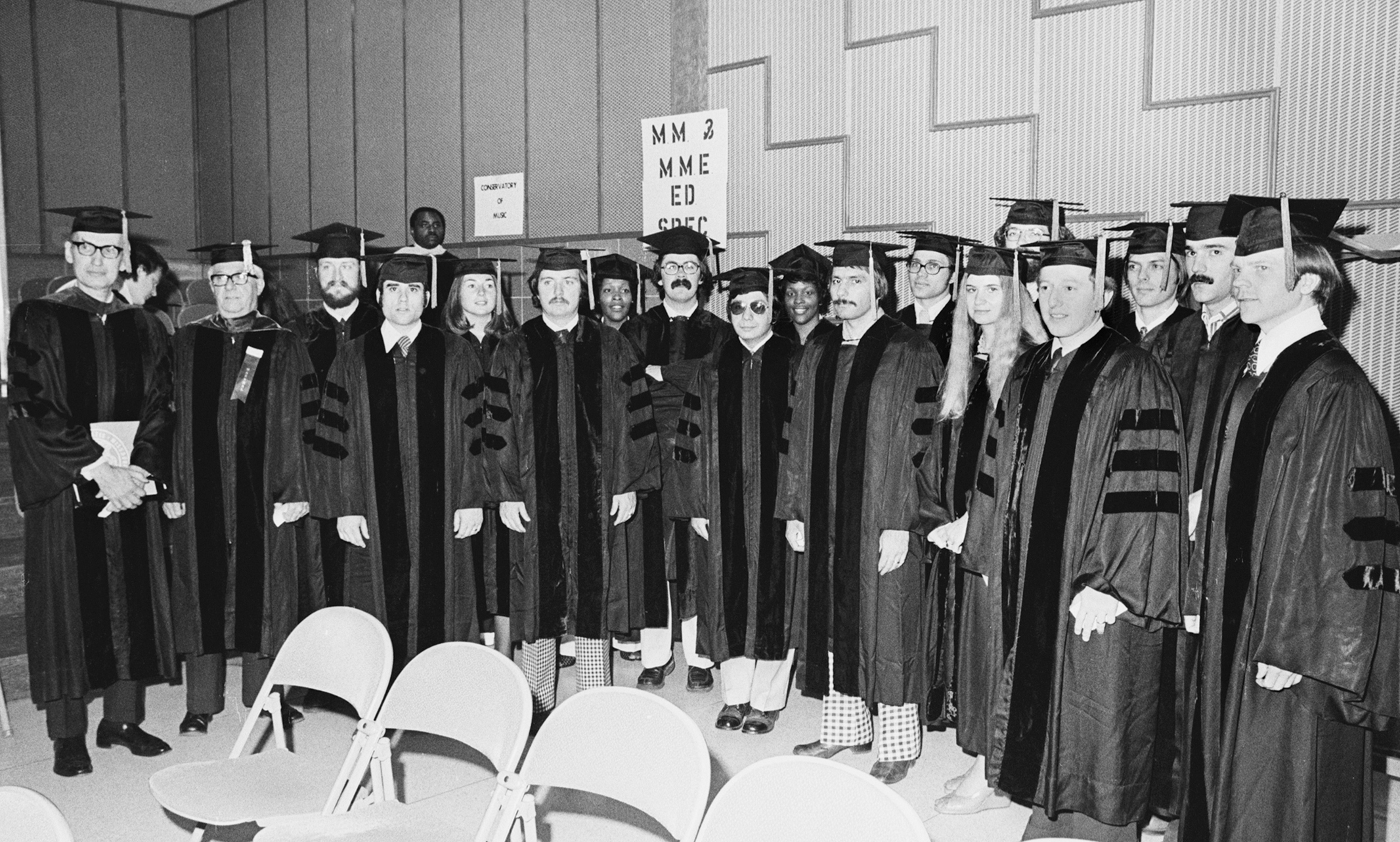
The University of Missouri-Kansas City School of Medicine is kicking off the observance of its 50th anniversary.
Fifty years ago, the University of Missouri-Kansas City launched a bold experiment in educating the medical leaders of the future.
After years of planning, more than $8.8 million in federal funding and a charter class of 18 students, the doors of the UMKC School of Medicine opened in 1971.
Fifty years later, that bold experiment is a cornerstone of Kansas City’s medical community.
This month, the University of Missouri-Kansas City School of Medicine is kicking off its yearlong observance of the 50th anniversary. A new logo, a special website and many special events will highlight the celebration. Among the key events:
A series of distinguished guest lectures, including:
Nov. 5: Roger Bush, M.D., from University of California-San Francisco, speaking on rural health inequities.
Nov. 17-19: Silvio Inzucchi, M.D., from Yale, sharing research linking type 2 diabetes, insulin resistance and cardiovascular complications.
Dec. 2: Harriet Washington, medical ethicist and Shearing Fellow at the Black Mountain Institute, University of Nevada, Las Vegas, speaking on medical apartheid.
Dec. 9: Kenneth Churchwell, M.D., from Boston Children’s Hospital, speaking on pediatric critical care (Noback-Burton Lecture).
Feb. 11: Geeta Swamy, M.D., from Duke University, speaking on maternal vaccines, COVID pregnant women, preterm delivery interventions.
Special signage around the SOM campus and 50th-anniversary themed touches for Match Day, Commencement and other signature academic occasions.
A Gold Jubilee 50th anniversary gala, set for June 4, 2022, at the Loews Hotel in downtown Kansas City.
Today as in the past, UMKC’s School of Medicine is making a difference the health and wellbeing of Kansas City communities and beyond. Long known for its innovative research, humanities-focused education and unique medical programs – namely the accelerated BA/MD program where students enter medical school straight from high school and complete their degrees in six years – UMKC continues to graduate future leaders in health care. The school has been instrumental in founding Kansas City’s UMKC Health Sciences District, where it continues to play a primary role.
“This is an exciting time for the UMKC School of Medicine, as we celebrate half a century of history and traditions,” said Mary Anne Jackson, M.D., ’78, dean of the medical school. “As our nation’s health care profession has evolved, so has the School of Medicine. We are bringing new technologies and innovations to the forefront that continue to solidify our standing as a leader in today’s medical education.”
Since 1971, nearly 4,000 physicians and health care professionals across the United States have received their degrees from the School of Medicine. Through the years, additional programs added include master’s degrees in anesthesia, physician assistant, health professions education and bioinformatics, and graduate certificates in research and health professions education. In January 2021, the school opened its second campus in St. Joseph, Missouri, with a focus on rural medicine. But it is the school’s MD programs and its docent system of learning – where faculty physicians combine the best of apprenticeship instruction with small-group teaching, mentoring, peer coaching and other techniques – that have withstood the test of time and continue to position the school as a trendsetter in medical education.
“Fifty years speaks to the longevity of the school, not to mention we have many physician leaders across the country that are graduates,” said School of Medicine alumni association president Ralph Wuebker, M.D., ’94. “There is no doubt that UMKC is a top medical school!”
Marjorie Sirridge, M.D., one of the three founding docents and later dean of the medical school, once reflected on the early days: “I remember being tired a lot and sometimes discouraged when it seemed that we just couldn’t get it all done. But, mostly I remember the challenge and the excitement of being part of a new adventure in medical education.”
Indeed, it’s been an exciting adventure the past 50 years – and the next several months will celebrate the past, present and future of UMKC School of Medicine. Join us.
Oct 07, 2021
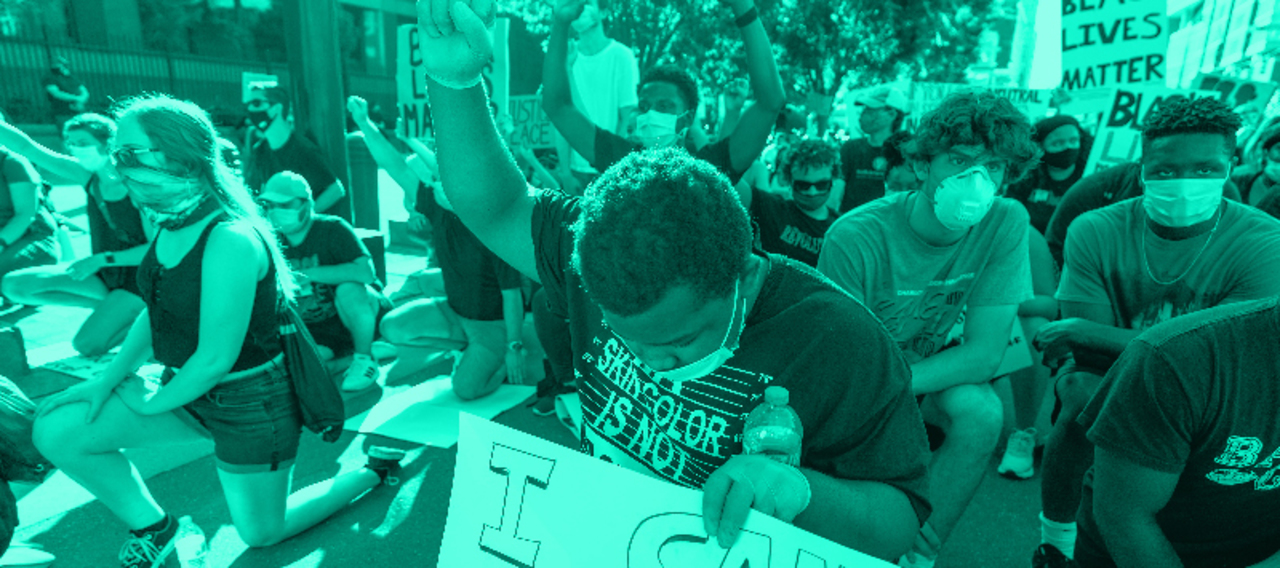
UMKC hosts discussion about the role museums play in telling the story of people of color
Art directors from across the Kansas City area participated in a virtual panel discussion on, "The Role of Antiracism Work and Healing in Museums."
The Sept. 9 was the ninth in the Critical Conversations series of panel discussions addressing systemic racism, sponsored by the UMKC Divison of Diversity and Inclusion. It was the first of the 2021-22 school year.
The museum-oriented discussion was in collaboration with The Nelson-Atkins Museum of Art.
UMKC people are taking thoughtful action on campus and in our community to ensure lasting and comprehensive changes through Roos Advocate for Community Change, a campus-wide effort announced in June 2020.
Critical Conversations are part of that initiative. The goal of each discussion is to enlighten, educate and explore the causes and potential cures for racism. Attendance to the discussions is free.
Panelists for the session include:
Gary O'Bannon (moderator), executive in-resident, UMKC Henry W. Bloch School of Management
Rashida Phillips, executive director of the American Jazz Museum of Art
Julian Zugazagoitia, director and CEO of The Nelson-Atkins Museum of Arts
Glenn North, executive director of the Bruce R. Watkins Heritage Center
Matthew Naylor, president and CEO of the National World War I Museum and Memorial
Anna Marie Tutera, director of the Kansas City Museum
Excerpts from the conversation are below. To view the complete recording of the conversation, click here.
Anti-racism and how it's discussed in the museum field
Tutera: We are defining anti-racism as a conscious decision and commitment to fight against racism on every level and on every aspect. Institutionally, we are looking at policies and procedures and practices within the museum that have contributed to racism, caused it and perpetuated it.
Lack of diversity among museum staff and board members
Tutera: You cannot have an all-white or majority-white staff or an all-white or majority white board and make any significant change. You cannot serve a diverse community without looking internally first. You can't commit to anti-racism until you take a deep dive into your own history of staffing and history of board leadership.
Zugazagoitia: If people do not see themselves in museums, then museums will become irreverent.
Naylor: Having a board that argues for us to be an institution for all is important. A board that wants to give a voice to the LGTBQ community, African American, Indian American, the place of women, raising those issues allows those issues to be express to the public. Board leadership, if it's an expression of the DNA of the organization, even though there is still is a gap and we are still not where we ought to be, can still make a world of difference.
Holding people accountable
Phillips: We really have to get back to people-to-people, really deep dialogue. This is not only a space for worship and entertainment, but it's a space where we come together. It is the kitchen and we've got to realize that there's some beautiful responsibility and energy in going into a museum and seeing an exhibition and enjoying the takeaway from that. It's deeper than that.
Support needed in museums
North: Sometimes it's hard to have partnerships. Sometimes it boils down to personality differences and complicated histories between organizations and it's difficult. Sometimes when you don't have the right intention things can get diluted.
Oct 06, 2021
Why we label ordinary objects as too special to use
UMKC Henry W. Bloch School of Management associate professor Jacqueline Rifkin wrote about her research on what she calls the specialness spiral- the accumulation of things without using or getting rid of them. Read more.
Additional news coverage:
“Specialness Spirals” - How Non-Consumption Can Drive Clutter - BYUradio
Oct 06, 2021
Could anti-vaxxers fuel a spike in childhood diseases?
Mary Anne Jackson, dean of the University of Missouri-Kansas City School of Medicine and a former member of the National Vaccine Advisory Committee and the American Academy of Pediatrics Committee on Infectious Diseases spoke with Newsweek about the potential for anti-vaccine rhetoric to spur an increase in vaccine-preventable disease in children. Read the news:
Anti-Vaxxers Could Fuel Spike in Childhood Diseases: 'It Will Be Horrific' - Newsweek
Anti-Vaxxers Could Fuel Spike in Childhood Diseases: 'It Will Be Horrific' - MSN
Oct 06, 2021
A local's guide to Native American cultural sites around Kansas City
The UMKC Gallery of Art is currently hosting an exhibition by Gregg Deal. “Yadooa Hookwu (I Will Speak Now)” explores “Indigenous identity through multiple forms of expression.” Deal (Paiute Tribe of Pyramid Lake) is a multi-disciplinary artist who addresses race relations, American history and Indian stereotypes in his work. Read more.
Oct 06, 2021
KCINNO reports on successful E-Scholars innovations
E-Scholars is an accelerator program at the University of Missouri-Kansas City that’s tailored for early-stage ventures. Most program participants are at the idea stage and need guidance in launching. Others are looking for a systematic growth plan. Since the first class in spring 2011, about 300 ventures have completed the program, including RFP360, Lending Standard, Integrated Roadways and Strange Days Brewing. Read more.
Oct 05, 2021
Kansas City doctors explain why it might be time for some to get a Pfizer COVID-19 booster shot
Local Kansas City metro area hospitals are starting to give Pfizer booster shots to those that want them. UMKC medical student Geethanjali Rajagopal says most of her patients are in the ICU with COVID-19. She says it’s what prompted her to get her booster shot Tuesday. Read more and watch the newscast.
Oct 05, 2021
From Bloomberg: The Real Cost of U.S. Debt Is Nearer the Floor Than the Ceiling
As lawmakers fight over whether to raise the debt ceiling, UMKC associate professor of economics Scott Fullwiler explains how government borrowing costs relate to policy rates. Read the article from Bloomberg. This story also ran on Yahoo Finance.
Oct 04, 2021
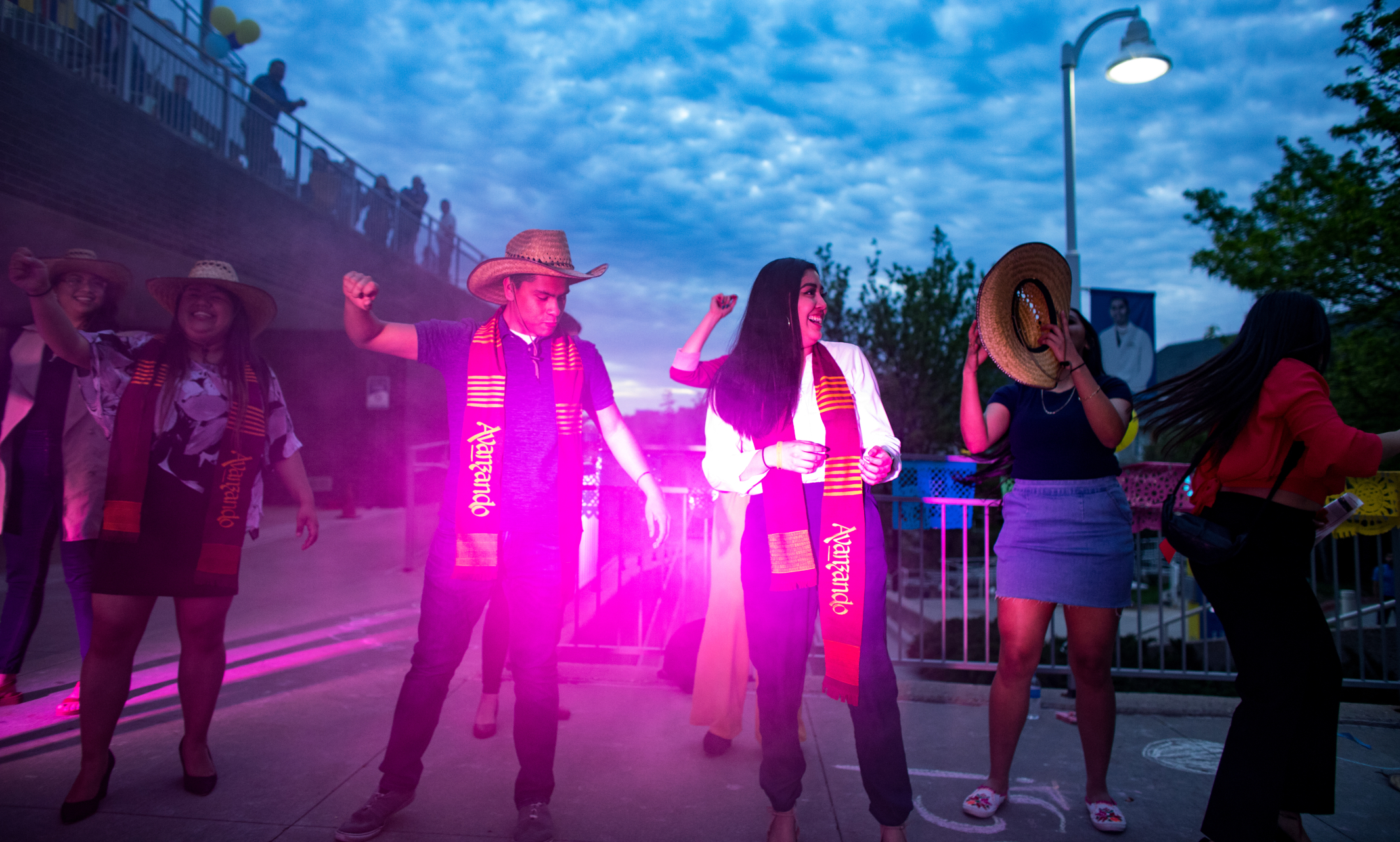
Launched in 2011, the program currently serves 150 students
Avanzando, a support and resource program for Latinx students at the University of Missouri-Kansas City, will celebrate its 10-year anniversary this year.
A decade ago, many Latinx students at UMKC felt they lacked a sense of belonging on campus and personal relationships with role models in the professional world for them to emulate. As a result, Avanzando was born.
"There was a clear need to support the growing Latinx student population, not only academically but also professionally, after graduation," said Alberto Villamandos, one of the founding mentors for the program. "We knew a membership program with Latinx and Hispanic faculty and the KC community was the way to go. Representation matters, and feeling that there are people who understand what you are going through as an undergraduate student, and who you can share your achievements with, was, and still is, critical."
The program began as a partnership between the UMKC Divison of Diversity and Inclusion and the Hispanic Development Fund. In 2017, the program transitioned to the Office of Multicultural Student Affairs, where it has expanded from only serving Hispanic Development Fund scholars, to any Latinx students interested in being served through the program.
Avanzando works to communicate to Latinx students that there is a place carved out for them at UMKC through supporting, mentoring resources and connections to help them do well in school, graduate and find success in their careers.
Goals of the program include increasing student retention, improving graduation rates and assisting in successful transitions of students into graduate school and/or career positions.
An Avanzando student reads from a 'career development guide' at a meeting in 2012. Photo by Brandon Parigo.
"The program started with 27 original members," said Ivan Ramirez, coordinator for the UMKC Multicultural Student Affairs Department and the Avanzado program. "In 2016, we had grown to 73 scholars, and then it grew to its biggest size of 260. Right now, we are at 150 scholars and we serve them just as well as we were serving the original 27."
Avanzando mentors are volunteers from UMKC faculty and staff, as well as community members with no ties to the university. Students are matched to mentors based on common goals and career interests and meet regularly with mentors throughout their time at UMKC.
Mentors offer students academic support, promote their cultural identity development and enhance access to resources and networks in the professional world.
"There is a wide range of mentors. We have lawyers, CEOs, doctors, dentists," Ramirez said.
"I think it's important for (students) to have somebody to talk with that looks like them, that has been through what they are going through. I am a first-generation (college graduate), so when they come talk to me and tell me their stories, I can relate to them, I've been in their shoes. That's what being a mentor is, it's so valuable to have someone that looks like you say, 'hey I've been there, I get it."
Villamandos said he feels proud of the success that Avanzando has seen over the years. He said that he is still in contact with many of the original members of the program as well as students he has mentored over the years.
"We are a family. That tells you how meaningful this program is to mentors and mentees alike," Villamandos said. "The academic and professional support has been proven, with great retention rates and so many students who went into grad school and great jobs."
Oct 04, 2021
UMKC graduate continues her service.
Experienced Educator, Ann McCoy, Named College of Education Dean at UCM Ann McCoy, Ph.D., a UMKC graduate with a Ph.D. in Curriculum and Instruction (mathematics education), will be working to make a positive impact on the preparation of tomorrow’s teachers and school administrators as the new dean of the College of Education (COE) at the University of Central Missouri. University Provost and Vice President for Academic Affairs Phil Bridgmon, Ph.D., this week announced McCoy’s appointment, continuing her service in the position in which she has served since May 2021 on an interim basis.
Oct 04, 2021
Local media cover the name change for Truman Medical Centers
Hospital leadership feel the name change will help patients, community members and others understand the unique partnership University Health has with the University of Missouri-Kansas City. Stories appeared in these news outlets:
Rebranding Truman Med - Flatland
Kansas City’s Truman Medical Center Changes Its Name. Here’s Why, and What It Means (subscription required) - The Kansas City Star
Truman Medical Centers Drops the 'Truman' After 50 Years and Rebrands As University Health - KCUR
Truman Medical Centers Changes Name To University Health - KSHB
Truman Medical Centers Goes All-in On University Health Brand - Kansas City Business Journal
Truman Medical Centers/University Health Announces New Name, Is Now University Health - KCTV5
Truman Medical Centers Changes Name To University Health - Fox4KC
Oct 01, 2021
Local media cover the opening of the Robert W. Plaster Free Enterprise and Research Center
Several media outlets covered the grand opening of the Robert W. Plaster Free Enterprise and Research Center, a $32 million, 57,800-square-foot high-tech research center. Coverage included:
KMBC
KOLR
Fox4KC
Startland News
Oct 01, 2021
Navy grant will help UMKC develop better tools to help students from diverse backgrounds find success
A workforce development program at the University of Missouri-Kansas City, designed to bring more students from diverse backgrounds into science and technology careers, is one of 12 national Science, Technology, Engineering & Mathematics (STEM) Education and Workforce Programs to receive funding from the Office of Naval Research.
The grant will help faculty expand their capacity to provide students from diverse backgrounds meaningful research and workforce experiences in STEM degree programs.
“Equity-Forward Workforce Development Pipeline for Naval STEM Superiority” is led by Daniel H. McIntosh, Ph.D., department chair and professor of Physics and Astronomy in the UMKC College of Arts and Sciences. The $758,000 three-year grant will be used to implement and evaluate a new educational pathway framework to onboard, train and provide undergraduate research experiences to interested sophomore and incoming transfer students in one of four active research areas at UMKC that are aligned with Navy STEM priorities: cybersecurity, unmanned aerial systems, radio frequency simulations, and remote sensing. The Navy funding will support the development of competency-based research skills training courses, provide financial aid for historically underserved students, and offer paid internships for summer research experiences in any of the four research areas.
These pathways will provide STEM-interested students with 15 weeks of data analytics and technical skills training tailored to one of the four Naval STEM areas; faculty-mentored research experiences; internship programming through UMKC Career Services; and exposure to Naval STEM opportunities and careers.
The UMKC team is a partnership of faculty and staff with expertise in a variety of areas including STEM education and research, engineering, computer science, urban education and career services to provide complete workforce preparation. The team includes McIntosh; Travis Fields, Ph.D. associate professor, UMKC School of Computing and Engineering (SCE); Zhu Li, Ph.D., associate professor, UMKC SCE; Farid Nait-Abdelssalam, Ph.D., professor, UMKC SCE; Roy Allen, Ph.D., lead mechanical engineer, UMKC Missouri Institute for Defense and Energy (MIDE); Kaylan Durbhakula, Ph.D., assistant research professor, MIDE; Karin Chang, associate director of the Urban Education Research Center within the UMKC School of Education; Alexis Petri, Ed.D., senior director of faculty support in the UMKC Provost’s Office; Tess Surprenant, interim director of the UMKC Career Center; and Audrey Lester, assistant director of the Undergraduate Research office.
The program is designed to benefit STEM-minded students from all backgrounds by giving them the inclusive experiences, intentional encouragements and skill development necessary to succeed in college and beyond.
“This project focuses on equity to overcome historical barriers for underrepresented and underserved students and utilizes high-impact engagement practices to support the success of all students who are interested in research training and experiences,” McIntosh said.
He believes that university educators must do more than provide students from diverse backgrounds access to opportunities.
“To broaden student success, we must encourage inclusive engagement in their learning and workforce skill development,” he said. “The outcome will not only be vast improvements in equity but a thriving educational system that helps all students achieve their full potential.”
Recruitment for these courses will begin Fall 2021. Coursework will begin Spring 2022.
Sep 30, 2021
Research experiences at UMKC lead mechanical engineering graduate to pursue Ph.D. in bone biomechanics
With the opening of the new Plaster Center, even more students will have the opportunity to engage with leading-edge research. We recently caught up with one School of Computing and Engineering alumnus who knows just how valuable these experiences can be in guiding your career.
Elliott Goff (B.S. ’13, M.S. ’16) spent the first six years of his higher education experience at SCE and now finds himself exploring medical technology research across the Atlantic at ETH Zürich, a research university in Switzerland.
Elliott Goff
Tell us more about what you’re up to in your current position.
I’m a Ph.D. candidate and researcher within the field of bone biomechanics. I investigate bone cell (osteocyte) shapes and relate them to disease (idiopathic osteoporosis). Our collaborators sent us roughly 100 human bone biopsies; I developed a method to prepare, 3D-image and analyze the osteocytes within each biopsy to create a database of roughly 25 million cell geometries. Then I do some big data processing and compare elements between healthy (control) biopsies and diseased biopsies. The ultimate goal of this project is to use cell geometry to classify disease severity.
How did you find yourself exploring this topic?
I won a DAAD Rise Germany fellowship my junior year to spend the summer researching mouse osteocytes in Berlin at the Charité University Hospital. I clearly remember my first day: My supervisor gave me some background reading that turned out to be research studies published by Lynda Bonewald (Ph.D.), a UMKC professor at the time. Between that summer research experience and learning about the UMKC connection, I knew I would pursue the field of bone biomechanics.
How did your undergraduate and graduate research experiences at SCE prepare you for your work now?
During my sophomore year, I joined two UMKC faculty members — Amber Rath-Stern, Ph.D., and Matt Stern, Ph.D. — on a biomedical engineering research project about the mechanical stiffness of tissue scaffolds. This is where I first learned about biomedical engineering and became enamored with the intersection of mechanical engineering and biology. This experience led to subsequent projects at UMKC with Greg King (Ph.D.) in his gait lab and Lynda Bonewald in her osteocyte lab. While earning my master’s at UMKC, Dr. Bonewald introduced me to my current mentor at ETH Zürich. And UMKC’s international academics director, Linna Place (Ph.D.), helped me draft the grant application that provided the funds to send me to Switzerland.
What’s next?
I plan to graduate this year with my Ph.D. and am currently on the hunt for a position in the medical technology field. Research has been my passion for the last decade, and I look forward to bridging the gap between the laboratory and solutions to real-world problems.
Sep 30, 2021
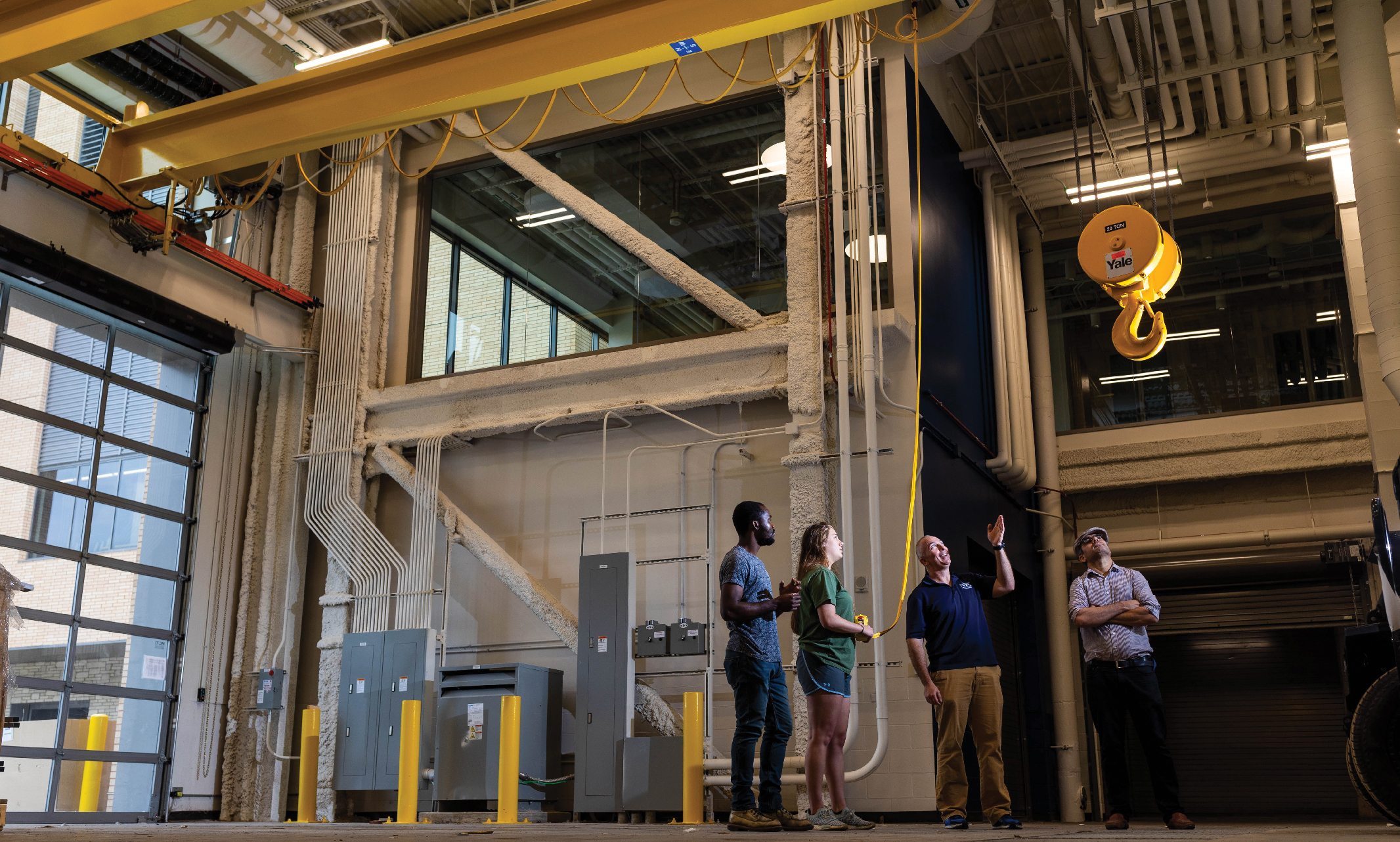
Two-story Structural Lab helps prepare Kansas City’s next generation of civil engineers
There’s no denying Kansas City is a hub for civil engineers.
With international industry leaders such as Burns and McDonnell and Black and Veatch headquartered locally, Kansas City maintains a uniquely high demand for new recruits trained in the field. So even before the plans for the new Plaster Center began to take shape, SCE leadership knew it was critical to provide students with a state-of-the-art structural lab.
Today, the UMKC Structural Lab occupies the west wing of the Robert W. Plaster Free Enterprise and Research Center. This two-story facility is designed to test full-size structural components like highway beams.
“It is always a benefit for structural engineers to see how their designs are constructed in reality,” says John Kevern, Ph.D, chair of the Department of Civil and Mechanical Engineering. “This hands-on experience provides a level of practicality that we haven’t been able to offer before and will improve the quality of all civil engineering students.”
In addition to preparing graduates for competitive jobs here in Kansas City and beyond, the Structural Lab will allow faculty to propose projects using non-traditional materials and analysis techniques because they now have a testbed for validation and verification.
By the numbers:
The two-story crane can support up to 20 tons.
Beams up to 53-feet can be unloaded and tested.
Sep 30, 2021
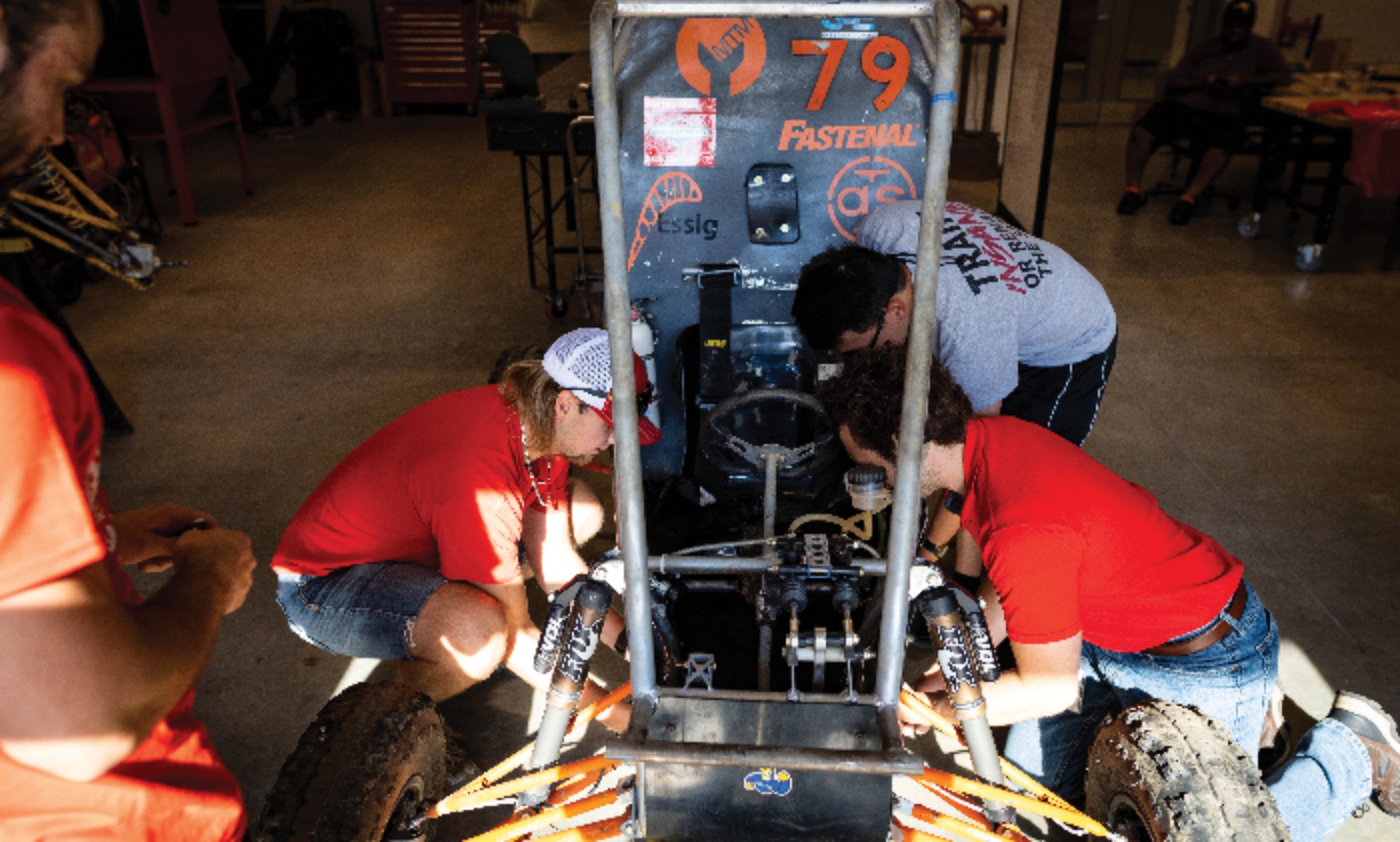
New collaboration area allows for peer-to-peer prototyping and a superior student teams workshop
Engineering is a collaborative process, and at the UMKC School of Computing and Engineering, collaboration is a cornerstone of the student experience.
In fact, in the undergraduate capstone course Senior Design, students are challenged with taking a real-world engineering problem through the entire design process alongside a group of their peers. Thanks to the School’s close proximity to industry, faculty are able to partner with local businesses to actually “hire” these small groups.
For years, students from Senior Design have crouched in empty classrooms or gathered inside their garages to work — until now.
The Robert W. Plaster Free Enterprise and Research Center features a new space on the first floor just for students: the Black & Veatch Student Collaboration Studio. With large workspaces and access to state-of-the-art 3D printers, students will be able to collaborate much more effectively. For the first time ever, they can test their prototypes in a dedicated environment.
“These projects are really the first time the students get to work on a ‘real-world’ engineering problem, just like they will be doing in a few months after graduation,” says Assistant Dean Katherine Bloemker. “They are required to take their ideas from the concept phase through to the detail design phase and, most importantly, to the prototyping and testing phase.”
Classroom requirements aren’t the only thing to draw students to the first floor. Adjacent to the collaboration space is the Burns & McDonnell Student Teams’ Fabrication Shop, another hub for students to work together — designing and building for engineering competitions such as the concrete canoe, big beam challenge and, of course, our signature Baja Racing Team.
According to Baja Racing Vice President and Frame Lead Clayton Morgan, “Having access to this new space really changes the game in terms of our ability to compete.”
The laser jet cutter, paint booth, drill press, horizontal band saw and other tools located in the student space have saved the team both time and money. Where they previously would have sent a frame to be fabricated by an external vendor, now they can manually bend, cut and notch the tubes together — allowing them to really experience bringing their designs to life.
Morgan, who is a junior in the mechanical engineering program, says he chose UMKC in part because the Baja Racing program was highlighted during his campus visit. He “saw the team was pretty prominent in the School and that year ranked 11th out of 116 teams nationwide, a sign that they’re top tier.”
In addition to Baja Racing, Morgan credits UMKC’s close proximity to industry with his choice to study here — both aspects of the school only enhanced by these new collaboration hubs.
Sep 30, 2021
New lab spaces give students hands-on training
As excitement surrounding the opening of the Robert W. Plaster Free Enterprise and Research Center has ramped up, so has excitement surrounding the expanded education and research opportunities it provides.
Among the building’s most eye-catching features is the three-story Motion Capture Lab and Flight Simulation Lab, reflecting the School of Computing and Engineering’s expansion into aerospace engineering.
Through his work with unmanned aircraft technology, Associate Professor Travis Fields noticed that many high-level contracts, grants and research initiatives were leaning toward airspace. He also noticed that students required more hands-on experiences in rigorous, interdisciplinary fields like mechatronics, an intersection of electronic, electrical and mechanical engineering systems.
Together, Fields and Assistant Professor Mujahid Abdulrahim are partnering to charter the Master of Aerospace Engineering program at UMKC.
“The courses Travis pioneered are things we would love our students to know, like system modification and guidance laws for aircraft — classes that address the research needs and lay the foundation for aerospace curriculum,” says Abdulrahim, who’s been flight-testing aircraft for 21 years. “Anytime students are tasked with designing something new or have a specific desire to go into aerospace, we’re teaching the philosophy behind it.”
Whether students need to understand how to develop new things or have a specific desire to go into aerospace engineering, Fields and Abdulrahim agree that aircraft can be a great jumping-off point for other areas of engineering. And while both professors admit their obsession is with with aircraft, students will also learn to integrate cars for those who want to go into automotive testing and performance assessment.
“There is a responsibility on you as an engineer to do good work. It’s not just optimizing the most efficient system possible, it’s also about the holistic design approach that aerospace engineering promotes,” says Abdulrahim.
That’s where the new Flight Simulation Lab comes in. The lab allows students to do complex and relevant tests in safe and accessible ways, teaching them all the things Abdulrahim says he wishes someone would’ve told him when he started out. The new space will help provide the workforce development training students really need.
Sep 30, 2021
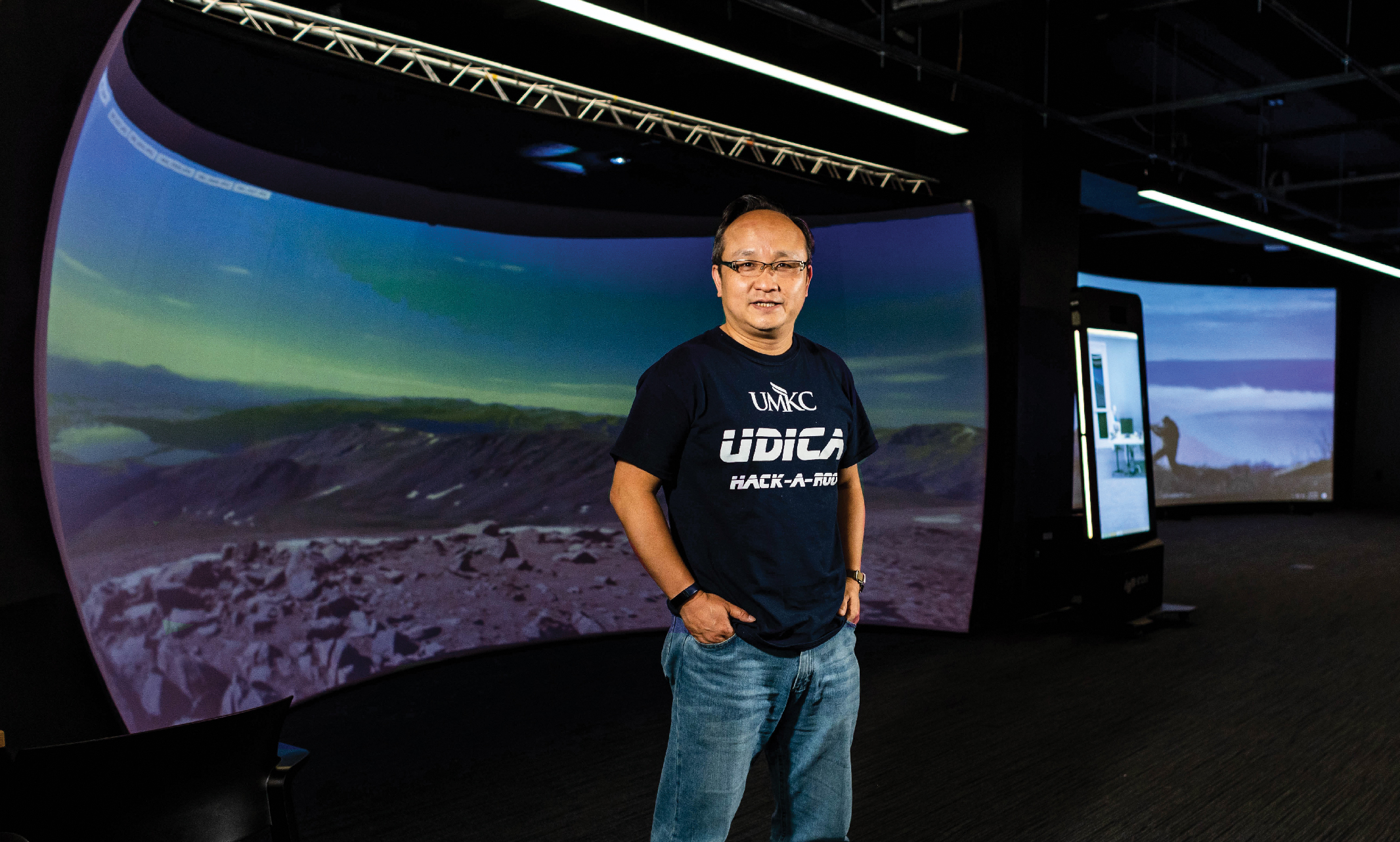
Video game technology reimagined for the real-life battlefield
We’ve all seen the dangers of war, whether it be in the news, movies or in video games where we get to virtually immerse ourselves in simulated military operations. With various combinations of the A and B and X and O buttons, we strategize actions, move in on targets and eliminate opponents.
In our increasingly digital world, one UMKC professor is exploring how to maximize the virtual experience to serve real-life military operations.
Associate Professor Zhu Li, a renowned artificial reality and virtual reality (AVR) research expert, is helping to bring virtual warfare into reality using the new AVR space located in the Robert W. Plaster Free Enterprise and Research Center.
It’s only fitting that as a war history buff – he can identify nearly every WWII aircraft – Li would be working with the United States Department of Defense and the U.S. Air Force to develop a 3D technology to give soldiers a new set of eyes on the battlefield. Using point cloud compression and communication — a way of compressing and transmitting volumetric visual data to present the real world in 3D — soldiers will be able to literally see the enemy from a mile away.
“The idea is to virtualize special forces in warfare because soldiers get air dropped into hostile-raging situations,” Li says. “Normally there’s no way to tell what they’re getting into, but with this new equipment soldiers don’t have to risk their own life. They send an unmanned aerial vehicle, or drone, with 360 cameras and 3D sensors, and the soldier can navigate the cameras and find the target based on information transmitted back.”
To enable this, the drones need 3D sensing, information capture and compressions and communication to present it back to a different device in real time. It’s the same kind of technology used in military[1]themed video games — goggles included — but reconfigured for real-life scenarios.
“It’s like they’ll have virtual eyes and ears in the battlefield. … They can be anywhere on the battlefield and have precise 3D information about the situations, buildings, vehicles, people, everything,” says Li, comparing it to Google Maps’ street view with added 3D elements.
Having a 360-degree view gives soldiers the freedom to navigate the virtual world and be able to walk around and scope out what’s ahead.
“Number one, it’s safer and, two, it’s more effective because human eyes and perceptions are limited. With this new technology, you can see much further and identify you targets much easier. You have more accurate positioning,” Li says.
He’s still doing the algorithm research, so it will be another three to five years before it’s sent off to produce a prototype. But, Li says, the state-of-the-art 3D and AR/VR technology in the Plaster Free Center will enable him to take this research even further.
Sep 30, 2021
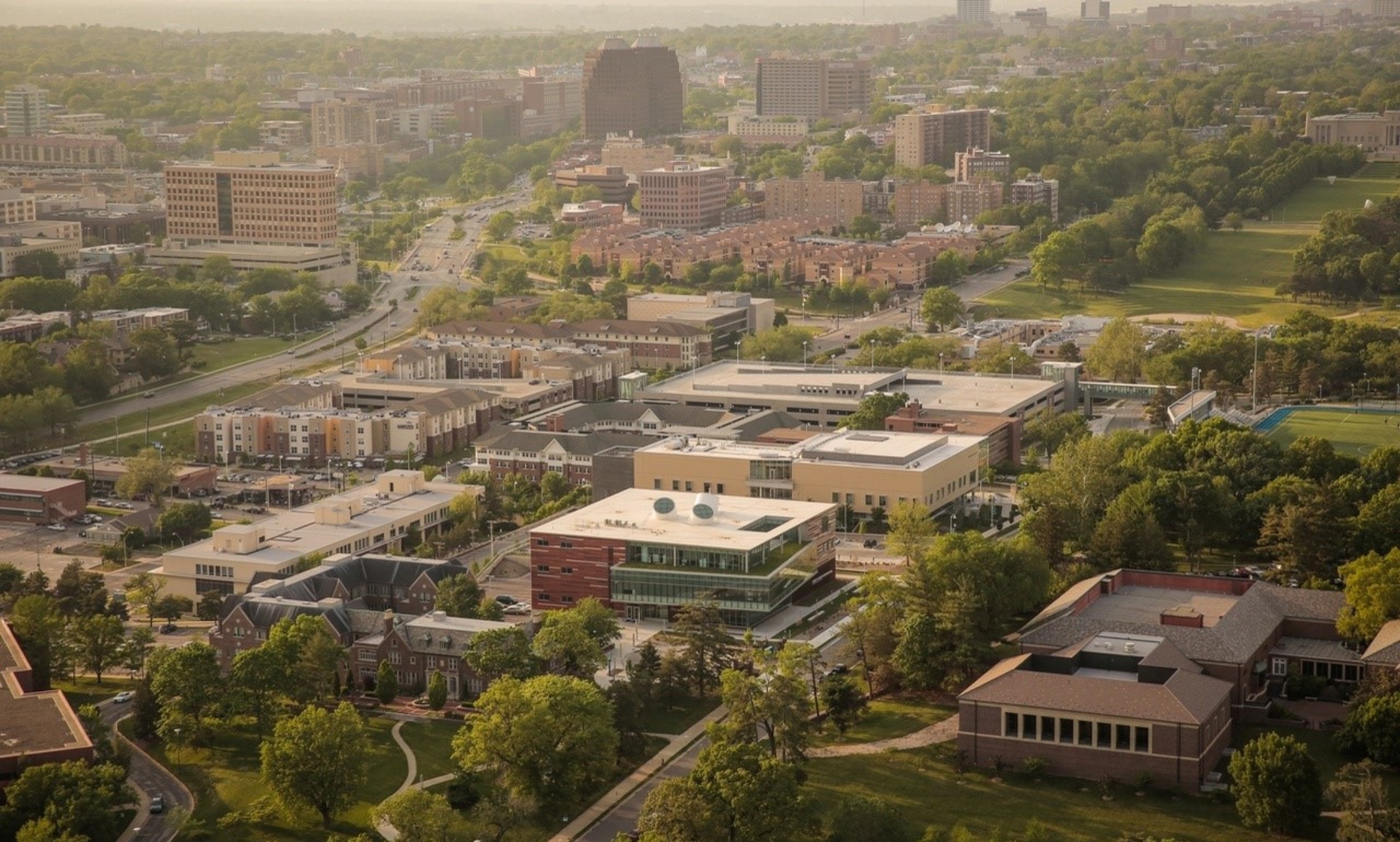
Response to COVID-19 crisis and STEM programming drive innovation, receive support through trustees awards
The University of Missouri-Kansas City Board of Trustees announced the 2021 UMKC Trustees Engagement Awards recognizing community partners and their outstanding support to the university and the community.
This year the Trustee Engagement Awards Committee recognized two recipients for both the Community Partnership Award and the Leo E. Morton Community Service Award as no awards were presented in 2020.
The Community Partnership Award recognizes ongoing and indispensable partnerships that strengthen UMKC. The recipients’ support is essential to the university’s success and is also a critical component in fulfilling the university’s urban-serving mission of education and research that enhances the quality of life in the region. Truman Medical Center and Evergy, Inc. received this year’s awards.
Truman Medical Center (TMC), a longtime, critical partner of the university, took a swift and entrepreneurial approach to community care in response to the COVID-19 outbreak. Programming included mobile testing units that went to churches, community centers and gathering places. TMC provided immediate and ongoing public education in conjunction with neighborhood partners, including the Negro Leagues Museum and the Kansas City Public Library, in both English and Spanish.
“The leadership that Truman Medical Centers and their Community Health Strategies and Innovation team showed community leaders and members during the pandemic through mobile testing and health education were critical in how our communities responded to the pandemic,” says Rev. John Miles, president of the Metropolitan Kansas City Baptist Ministers Union.
Evergy’s support of UMKC is broad and deep, including schools and programs across campus. They have supported the School of Computing and Engineering (SCE) through scholarship funding and a $500,000 pledge for the Evergy Renewable Energy Lab and Roof Deck in the Robert W. Plaster Free Enterprise and Research Center. The company’s support of the KC STEM Alliance, a K-12 STEM initiative housed within SCE, furthers the mission of building the STEM talent pipeline.
“Evergy recruits associates as classroom speakers, mentors, volunteers and judges for a variety of events throughout the year in Kansas City,” Martha McCabe, executive director of KC STEM Alliance, says. “They are committed to reaching a broad range of students and actively recruit a diverse pool of volunteers in efforts to connect with all students.”
The Leo E. Morton Community Service Award recognizes a group or entity within UMKC for outstanding work that embodies the university’s mission as an urban-serving university. The recipients’ contributions ensure UMKC remains embedded in the fabric of the community through innovative services, programs and projects that strengthen and enhance the quality of life in the region and serve the citizens of Kansas City. This year’s awardees are the UMKC School of Law Child and Family Law Program and Cameron Lindsey, PharmD, interim chair of the division of pharmacy practice and administration at the UMKC School of Pharmacy.
The UMKC School of Law Child and Family Law Program spans three decades of innovative services and programs that strengthen the relationship between the university and the community. The Child and Family Services Clinic provides free legal services for parents, relatives and custodians who need help obtaining clear and reliable custody orders for children who have a history of being abused or neglected.
The process of seeking an Order of Protection is time-consuming and challenging, and when COVID shut down courthouses in spring 2020, the problem became more acute. Last year, the school’s Self-Help Clinic worked with the Kansas courts to develop an online portal for those seeking orders protecting them from abuse and stalking. The result is an online protection order portal which is now in place across the state of Kansas.
“While I know this project was but one small part of the many ways in which the Child and Family Law Program provides innovative, justice-driven education and community engagement throughout our region, it is special,” Keven O'Grady, Johnson County Kansas District Court judge, says. “We hope that the portal can be a model for courts across the country.”
Cameron Lindsey, PharmD, interim chair of the division of pharmacy practice and administration at the UMKC School of Pharmacy, is a dedicated community volunteer, securing close to $9 million in donated medications for the Shared Care Free Health Clinic of Jackson County. During the COVID pandemic, Lindsey became authorized to provide vaccines at the university and has been holding weekly clinics, as well as working with other organizations to ensure they have adequate staffing for community events.
“Dr. Lindsey cares deeply for others, the students she mentors and the stewardship of our institution,” Sheri Gormley, chief of staff office of the chancellor. “She fosters a culture of care and service as a leader at the School of Pharmacy and in all she does at UMKC.”
The UMKC Board of Trustees is a non-profit organization established by civic and community leaders to support the University.
Sep 29, 2021
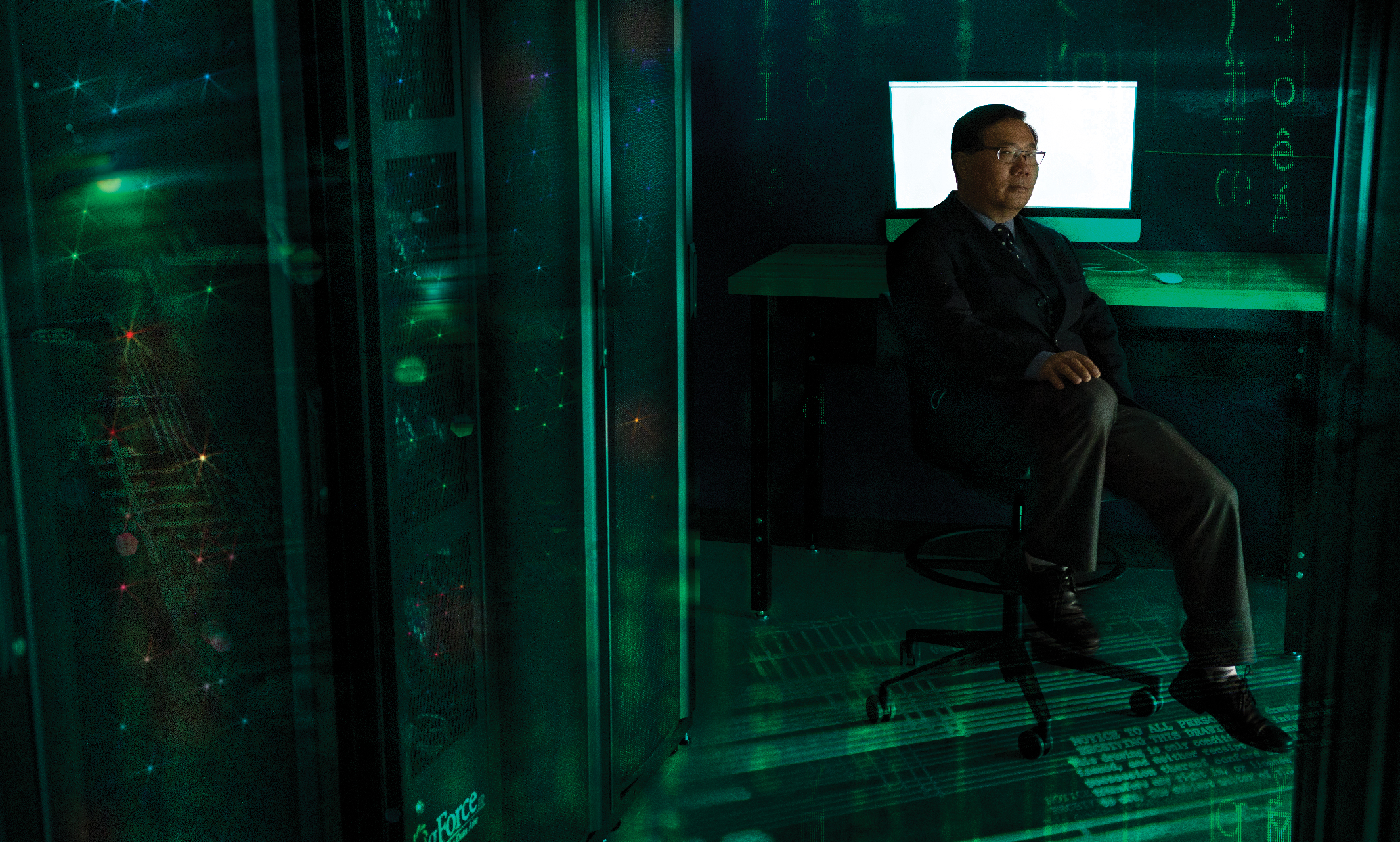
Deep learning research identifies cybersecurity risks
What’s the easiest way for hackers or spies to penetrate a secured computer network?
Have the network managers open the door and invite them in.
Almost all networks purchase basic software from third-party creators. The bad guys have figured out that the third parties present an opportunity for them to penetrate software-supplier systems and hide malware inside the software to be purchased. The software becomes a digital Trojan horse, carrying attackers inside the network’s walls.
That was the strategy behind a huge espionage campaign, first revealed in December 2020, that compromised several major U.S. government agencies, including the Justice Department and the Treasury, as well as private companies including Google and Microsoft. It has been described as one of the largest and most successful digital espionage cases in history.
That’s where Professor Dianxiang Xu comes in. In the SS&C Data Analytics, Cybersecurity and High Performance Computing Facility of the Robert W. Plaster Free Enterprise and Research Center, Xu is using deep learning models, a specialized area of artificial intelligence (AI), to help combat the emerging threat. The goal is to use static code analysis of computer programs to find potential defects and security vulnerabilities. The work is funded by a National Science Foundation grant.
“Software vulnerability is a major source of cybersecurity risks. It is very difficult to identify vulnerabilities in software code as software has significantly increased in both size and complexity,” Xu says.
“Finding software vulnerabilities is analogous to ‘searching for a needle in a haystack.’ Recent advances in deep learning can be promising for predicting software vulnerabilities.”
Spies and hackers aren’t the only bad guys Xu is working to combat. He is also studying ways to use AI to collect and process digital evidence for presentation to juries in court. Xu is basing his network security work on a deep learning model known as The Transformer.
“Finding software vulnerabilities is analogous to ‘searching for a needle in a haystack.’ Recent advances in deep learning can be promising for predicting software vulnerabilities.” - Dianxiang Xu, Ph.D.
“The Transformer is a deep learning model introduced in 2017, used primarily in the field of natural language processing, or NLP,” he says. “It has enabled training on larger datasets than was possible before it was introduced. The pretrained transformer systems such as BERT (Bidirectional Encoder Representations from Transformers) have achieved state-of-the-art performance on a number of NLP tasks.”
“Considering the similarity and difference between natural languages and programming languages, we expect the transformer systems can be pretrained with a large amount of computer code so as to improve various program understanding tasks, such as detection of vulnerabilities in source code.” So, how vital is the anti-spyware research underway by computer scientists such as Xu?
In an article for The New Yorker, Sue Halpern wrote: “The simple truth is that cyber defense is hard, and in a country like the United States, where so much of our critical infrastructure is privately owned, it’s even harder. Every router, every software program, every industrial controller may inadvertently offer a way for malicious actors to enter and compromise a network.”
Inside the Plaster Center, Xu can be found chipping away at those many cyber threats, one model at a time.
Sep 29, 2021
Talking to Maya Angelou’s son about the new award named in her honor
Novelist Whitney Terrell, an associate professor of English at the University of Missouri-Kansas City, oversaw the creation of the award with Phong Nguyen, an English professor and director of creative writing at the University of Missouri-Columbia, and Carrie Coogan, the Kansas City Public Library’s deputy director for public affairs and community engagement. Read more.
Sep 29, 2021
Where to find the best rooftop views in Kansas City
You don’t have to ride Liberty Memorial's antique elevator to get the perspective you crave; many other spots around town offer equally uplifting views, such as the Warko Observatory at UMKC. Read more.
Sep 29, 2021
Des Moines, other cities saw a record homicide surge in 2020, a year marked by protest and COVID
"To be fair and clear, we're going to be unpacking whatever the hell happened in 2020 for the rest of my career, for sure," said Kenneth Novak, a criminal justice expert and professor at the University of Missouri-Kansas City. Read more.
Sep 29, 2021
Kansas City-area fire departments offer incentives to address paramedic shortage
The Kansas City Fire Department has taken a proactive approach to attracting candidates by partnering with UMKC School of Medicine's paramedic and EMT program to bring in new candidates. KCFD is also paying for classes for current employees who go through the program. Read more.
Sep 29, 2021
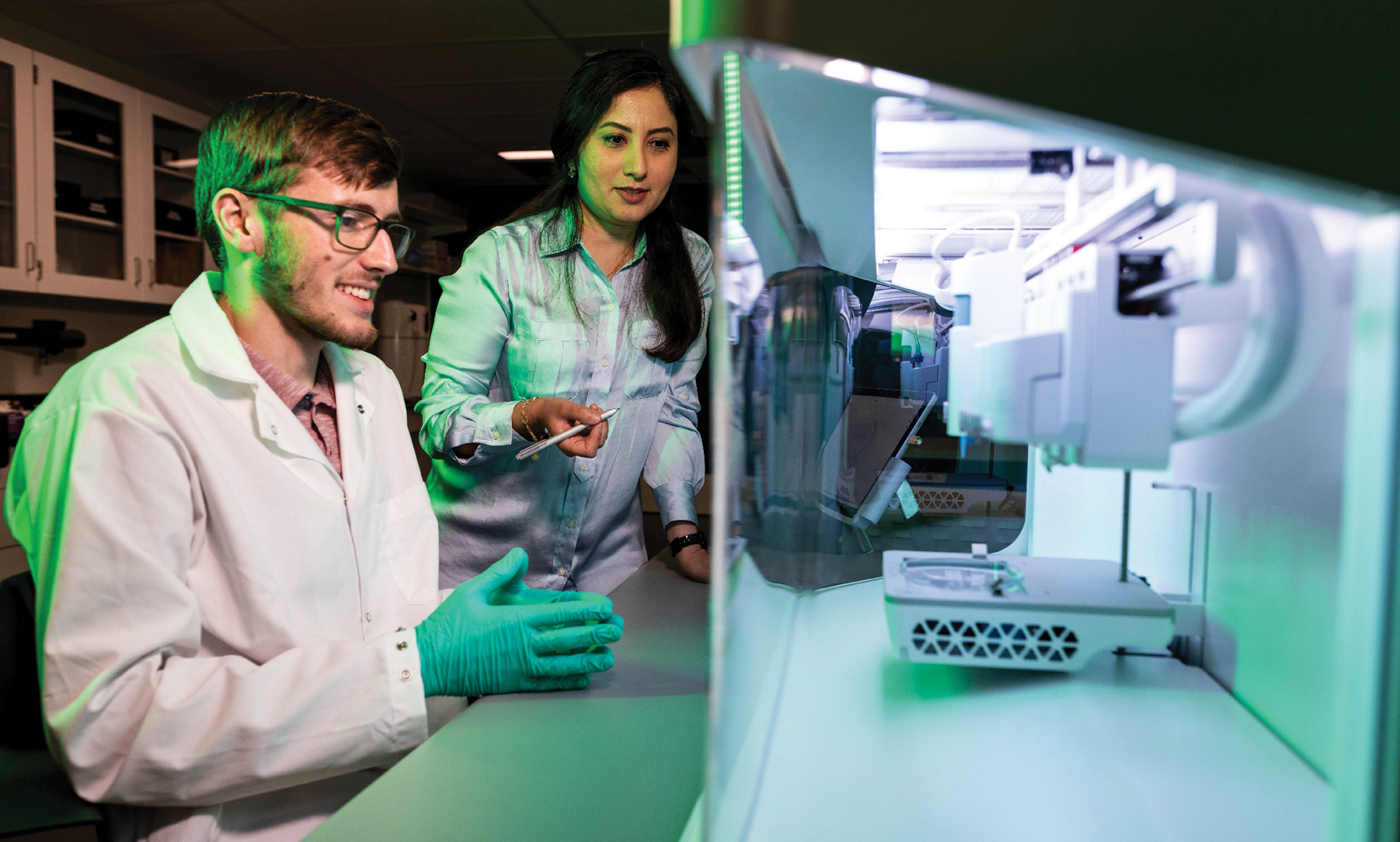
Plaster Center's contamination-free area has specs that get rid of the specks
When working with bio-and nanomaterials, success can hinge on keeping dust and other impurities out of the process. So for Assistant Professor Zahra Niroobakhsh and her colleagues, it was good news that the Robert W. Plaster Free Enterprise and Research Center would include a top-notch clean room.
“In the past I’ve had to use facilities in Lawrence, Kansas, for some work or order materials from elsewhere to start experiments, which can be very expensive,” says Niroobakhsh, an assistant professor in the Department of Civil and Mechanical Engineering. “But now we have the 3D bioprinters … and the Clean Room, to be able to make everything right here.”
APPLICATIONS ACROSS CAMPUS
For Niroobakhsh, “everything” covers a wide range of research interests and applications. She frequently works with other departments and schools, including chemistry, dentistry, medicine and pharmacy.
Clean Room experiments often involve designing and printing soft nanomaterials, which exist in a state between solid and liquid, then studying how they react and interact in different situations. Because the materials can be designed molecule by molecule, Niroobakhsh and her team can produce the tiny building blocks for all sorts of collaborative research and applications.
In petroleum engineering, for example, the aim can be to improve emulsions used in oil spill cleanup, or to enhance the substances used to recover more oil from a well. In pharmaceuticals, experiments can seek more stable and effective ways to deliver drugs or coat a microchip with a material that can detect virus or disease. And in medicine, the building blocks for cells can be tweaked depending on what is being studied.
Our new printer will allow us to inject six different liquids simultaneously and to switch materials during the print. It also has much higher resolution and other capabilities. We’re very excited!” — Zahra Niroobaksh, Ph.D.
Niroobakhsh’s team has worked with Peter Koulen, a professor in the UMKC School of Medicine who has led several groundbreaking research projects at the school’s Vision Research Center.
“Tissues for different parts of the body have different mechanical properties,” Niroobakhsh says. “We can ‘tune’ the biomaterials we are printing so they will produce cells with the properties needed in Dr. Koulen’s work for different parts of the eye.”
As versatile as Niroobakhsh’s work has been already, she’s looking forward to the much more advanced 3D printers available to her in the new Clean Room.
“One of my graduate students built a 3D printer we use,” she says, reflecting the school’s can-do approach. “But our new printer will allow us to inject six different liquids simultaneously and to switch materials during the print. It also has much higher resolution and other capabilities. We’re very excited!”
EMBRACING NEW POSSIBILITIES
Niroobakhsh is used to change and progress. When she joined the faculty in 2018, she brought international experience to the school, having earned her doctorate in materials science and engineering at Penn State, her master’s degree in Germany and her bachelor’s degree in Iran.
She also set right to work establishing her lab, including procuring the right equipment for her work. Niroobakhsh says her rheometer, which measures the flow of most materials, is the only one in the area.
One of her closest collaborators, Stefan Lohfeld, also joined UMKC in 2018 as an assistant professor at the School of Dentistry. They teach the Introduction to Biomaterials course together, using a textbook co-written by UMKC Chancellor C. Mauli Agrawal. They both also utilize bioprinters in their research, and lean on each other for support and perspective. Their printers use different processes, and they often talk about which might be better for a particular task or experiment.
“My printer at SCE uses light to solidify liquid polymers layer by layer to build a device,” Lohfeld says. That Continuous Digital Light Process, or cDLP, “is faster as it manufactures a full layer at a time. This is useful for larger constructs and could be important in mass production. But my printer can’t use multiple materials at once, unlike Dr. Niroobakhsh’s new highend machine.”
Lohfeld has a master’s in production engineering with a focus on materials sciences and his doctorate in materials sciences. He is, essentially, an engineer that works in the School of Dentistry. That works out well, because Sarah Dallas and others at the dental school are leaders in bone-muscle tissue research, and Lohfeld is expert at printing scaffolds on which research cells can grow for tissue engineering.
Lohfeld says the Plaster Center “really gives us access to technologies we haven’t had before, which allows us to expand our research on materials and their processing.”
Besides the research possibilities, Niroobakhsh is eager to have her students see what’s possible from a well-equipped clean room.
“I’m not sure yet how much access there would be for a whole class,” she says. “But the Clean Room’s walls are glass, so we will be able to show students what is being done and explain the processes. … The new facilities will have so many benefits for us.”
Sep 28, 2021
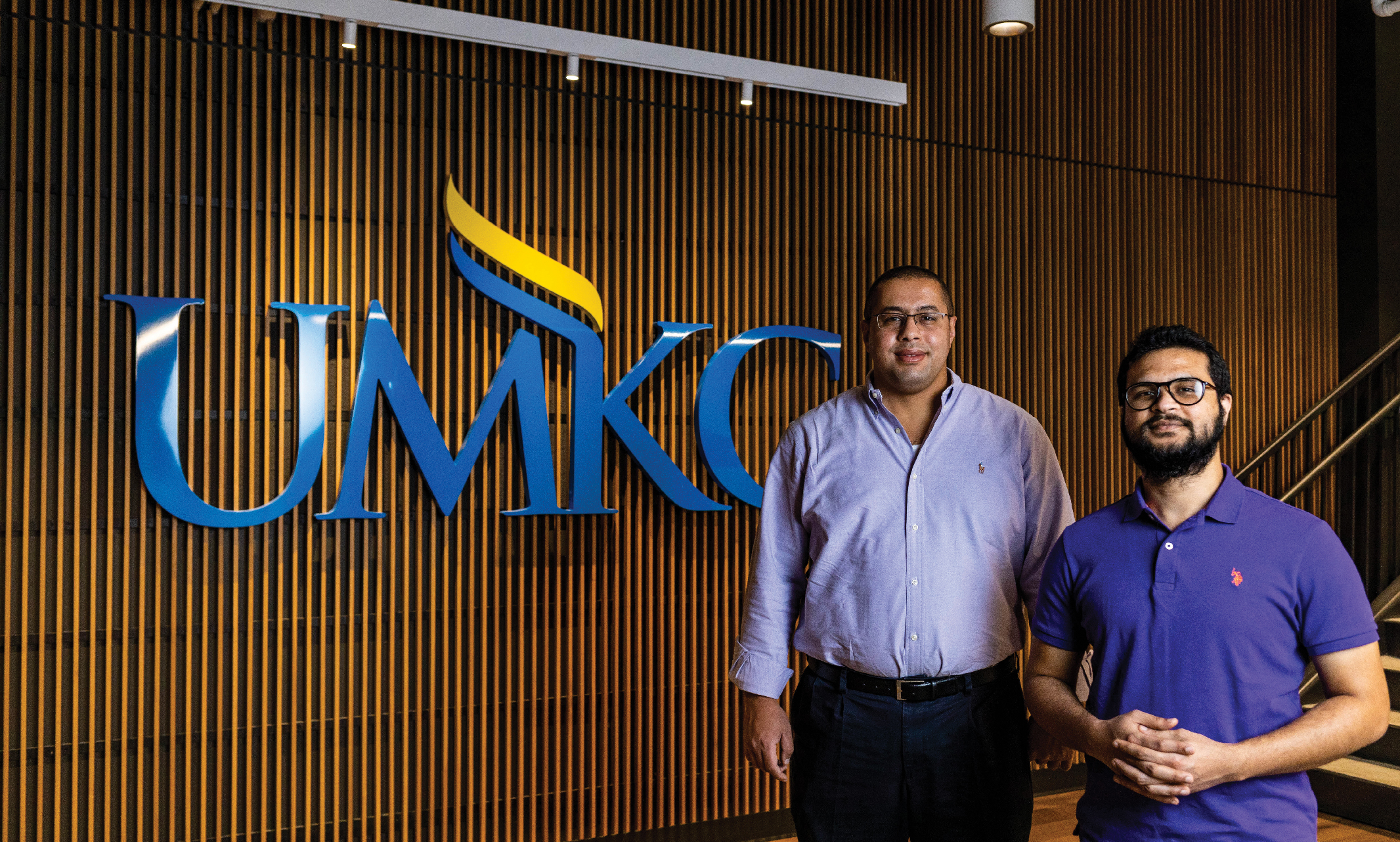
Using high-powered electric pulses to treat cancer in a 3D world
Ahmed Hassan, Ph.D., has long been fascinated by electromagnetics and how electrical impulses can affect the smallest of particles, particularly those with complex shapes. Inside the Advanced Power, Electronics and Electromagnetics Lab at the Robert W. Plaster Free Enterprise and Research Center, the associate professor is focused on how to use high-powered electrical pulses to treat cancer cells.
Scientists have for some time explored the use of electrical pulses to deliver drugs and gene therapies into biological cells. But where most of those studies have looked at cells in a two-dimensional realm, Hassan is taking things a step further.
“At UMKC, we are one of the first groups to study how the three-dimensional shape of actual cells, grown in realistic 3D environments, affects their electrical response,” Hassan says. “It’s only by looking at the full 3D structure that you can predict how the cell will behave when it’s excited by an electrical stimulus.”
Through their research, Hassan and his graduate research assistant Somen Baidya have shown that the outer shape of a cell plays a significant role in how it will react to an electrical stimulus. With help from the National Institute of Standards and Technology (NIST), where their scientists have been able to determine and reconstruct the exact 3D shape of cells, Hassan and Baidya now have thousands of cells shapes to work with, including cancer cells.
Precision to the One-Trillionth Degree
Armed with an array of computers to create computational models and simulations, Hassan is working with multiple computational techniques that can be used to calculate the response of those complex, three-dimensional cancer cells to electrical impulses.
Electroporation is a technique in which an electrical field is applied to a cell in order to increase the permeability of the cell membrane. This allows chemicals such as therapeutic drugs or even DNA to easily be inserted into the cell. The technique offers potential advantages over other therapeutic methods of cancer treatments because of its noninvasiveness and lack of toxicity for noncancerous cells, as well as the possibility of being used in combination with other therapies. The selectivity of the electroporation technique also makes it safer than other techniques that cannot differentiate between healthy and cancerous cells.
"If you want to kill cancer cells, then you apply a strong enough electrical stimulus to break down the cell membrane completely. We’re trying to figure out the optimum pulse that will give us the correct response." — Ahmed Hassan, Ph.D.
Variations in the rate of supraelectroporation used to pierce the cell membrane and penetrate the cell’s internal organelles can guide the selective targeting of desired cells with specific shapes. The current goal, Hassan says, is to determine how to calculate — with a high degree of accuracy and efficiency — the necessary voltage and precise location of these electrical pulses on the cell’s membrane to achieve the desired effect.
Electrical pulses are delivered at very high amplitudes for extremely short durations of time — from nanoseconds, which are one-billionth of a second, to picoseconds, which are one-trillionth of a second. In some instances, the goal is to create a tiny hole in the cell membrane, just large enough to deliver the material inside the cell without harming it.
“If the holes become too large, the cells might die,” Hassan says. “In some cases, that’s desired. If you want to kill cancer cells, then you apply a strong enough electrical stimulus to break down the cell membrane completely. We’re trying to figure out the optimum pulse that will give us the correct response.”
Once the computational techniques are developed, the next step will be to develop a machine learning (ML) platform that uses cell information to predict the precise excitation characteristics necessary to achieve the correct effect on the cell.
Ultimately, Hassan says, the new Plaster Center Power Lab will give him the capability to develop a novel, tunable, high-voltage pulser that can generate the desired electric surge needed as predicted by the ML platform. It will be designed to generate necessary short-time pulses of nanosecond or picosecond duration with high peak amplitude optimized for each cell shape.
From Medicine to the Moon
Once developed, this ML technology could be used to treat other types of cells, for instance, isolating and treating or modifying immune cells. Moreover, different electrical signals can be used to selectively move and isolate specific cells from a collection of cells.
“It’s like applying a magnet to the cell. That will start attracting the cell differently based on its shape,” he says.
Hassan is currently working on the first two aspects of the project to get preliminary data, then working on funding to start building the hardware.
“We’ve been working on this for three years,” he says. “An optimistic timeframe is that we’re halfway there to finishing the engineering aspects before we can take it to the medical researchers and ask them to help us with the actual biological tests.”
A member of the UMKC faculty since 2015, Hassan serves as director of the Multidisciplinary Multiscale Electromagnetics Lab. Before coming to UMKC, he began studying nanostructures with extremely complex shapes as a postdoctoral researcher at NIST. There he developed a large library of computational codes to study their response to electromagnetic stimulus.
“When I came to UMKC, I was using this library of computer codes that I had developed as an electrical engineer to study complex shapes with a wide range of applications,” Hassan says. “One application was to study biological cells with complex shapes.”
Another is looking at the electrical properties of sand and rock particles from the moon. Working with his collaborators at NIST, Hassan was able to obtain the three-dimensional shapes of sand particles obtained during the Apollo 11 mission to the moon.
“We’re trying to calculate the electrical response of those sand particles as another exciting application of using electromagnetic radiation to understand the physics of complex shaped particles,” he says.
Sep 28, 2021
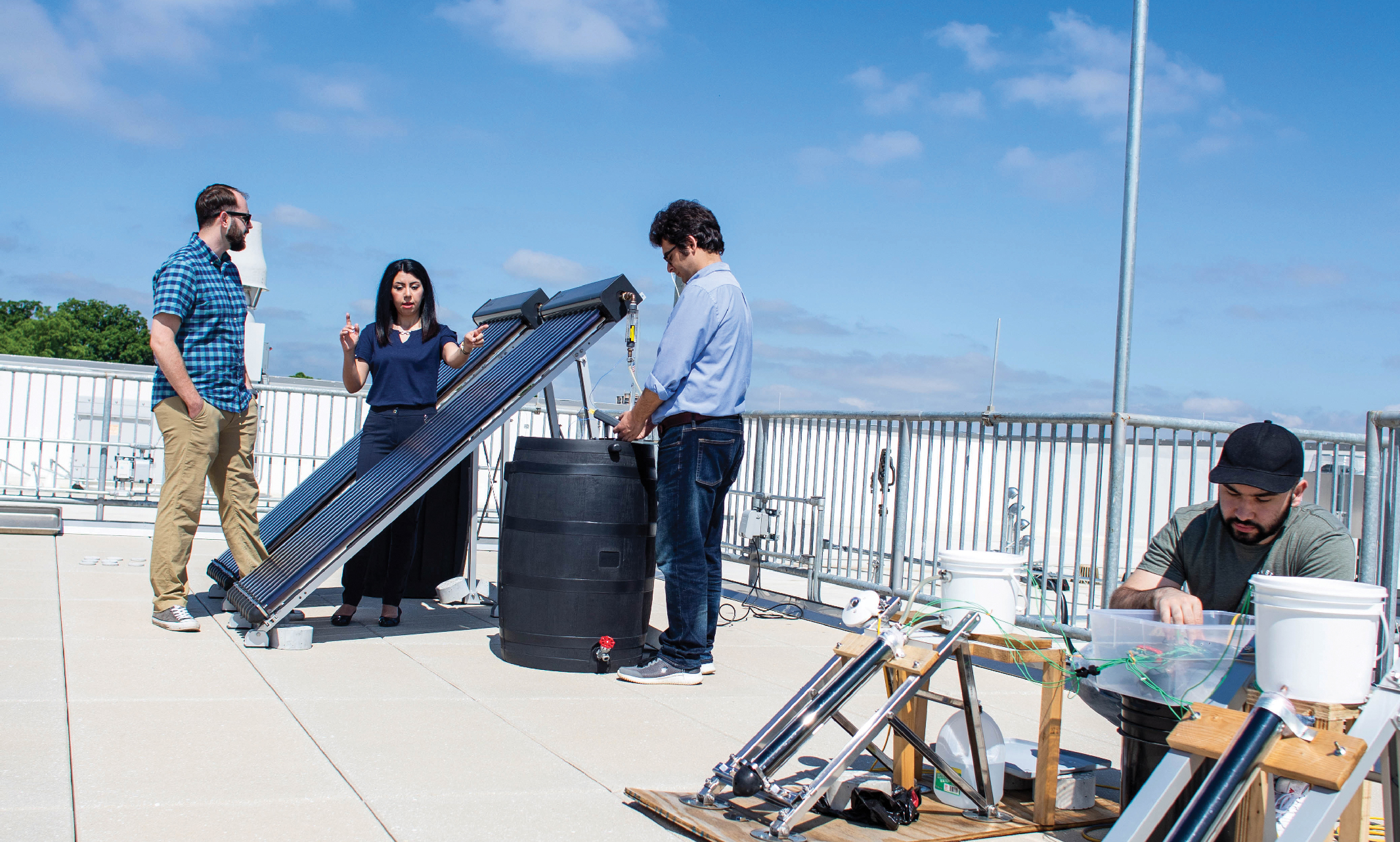
In the Plaster Center, even the roof is optimized for groundbreaking research
Most days, Assistant Professor Sarvenaz Sobhansarbandi, Ph.D., keeps her eyes on the sky.
Sobhansarbandi has spent her career studying solar energy. Her research focuses on a type of solar thermal collector called an evacuated tube collector (ETC). More specifically, she is interested in how this type of collector can make water heating systems more efficient.
The Robert W. Plaster Free Enterprise and Research Center includes two unique spaces for Sobhansarbandi and her students: the Evergy Advanced Renewable/Thermal Energy (ART-E) Lab and the accompanying Evergy Renewable Energy Roof Deck.
Since the completion of the Plaster Center, Sobhansarbandi and her students have spent much of their time on the roof and the lab, working to learn more about ETCs and how we can best utilize them.
How is the Plaster Center enhancing your research with ETCs and solar water heating?
The Evergy Renewable Energy Roof Deck was designed for maximum solar gain exposure. It uses local, easily configurable, leading-edge technology to test both small- and large-scale ETC solar water heating systems. The space will also allow us to get baseline results for Kansas City weather conditions and optimize the system’s functionality to achieve higher efficiency.
A low-voltage conduit connects the roof to the lab below, allowing us to monitor the system and data connection devices. Outside of the Renewable Energy Research Lab, the new 3D printing lab and Innovation Studio will allow us to fabricate prototypes in-house and move them straight upstairs for testing.
Are you working with any new technologies in your new spaces?
The 5,000-square-foot roof deck gives us plenty of space for a new full-scale solar water heating system. In the future, we plan to integrate photovoltaic arrays and a weather station to track comprehensive, real-time conditions. Currently, we are able to monitor solar radiation intensity using Pyranometers on the roof, connected directly to the lab space.
How have your students responded to the new research lab?
My graduate and undergraduate students are very excited as the new lab gives them the opportunity to perform research in an even more well-equipped environment. Here are some of their individual reactions:
“Moving into this new lab is great as we now have a more sophisticated facility to do hands-on experimental research.”
“It’s wonderful to have more space to work on our research and collaborate comfortably.”
“The new lab is equipped with high-tech devices and a big glass window, which makes it a more visually and thermally comfortable place to monitor the technology.”
“The new facilities have given me the opportunity to pursue my research in avenues that I previously thought were impossible.”
Does the new space enhance your teaching?
Absolutely! My mechanical engineering students get to see some real-world applications of heat transfer in action in our solar water heating system setup, as well as all of the instrumentation used to monitor the equipment and collect data for our research.
My colleagues are also able to show examples of material analysis using the Thermogravimetric Analyzer and Differential Scanning Calorimeter in our lab. On top of all that, it’s a great excuse to take students outside for fresh air and sunshine to look at cool technology and the view of downtown KC!
How does your new lab compare to those of schools across the country?
Having 1,000-square-feet of interior space and direct access to the roof deck is a distinct feature. The dedicated space to perform field testing gives us the potential to cross-validate our simulation modeling results without the need for travel to other available research sites. In addition, the high-end video conferencing technology has been a huge benefit when collaborating with other researchers and staying connected.
What is the next step in your research?
Next steps include experimental investigation of modified large scale ETCs by applying preliminary findings from small scale analysis with the goal of efficiency enhancement. Additionally, development of control systems to automate and optimize the system functionality are being studied.
Sep 28, 2021
Startland News reports on the opening of the Robert W. Plaster Free Enterprise and Research Center
“We have never had a facility like this — with the diversity of equipment and the availability to get involved,” said Christina Davis, director of the studio for the School of Computing and Engineering at the University of Missouri-Kansas City. “Anyone walking through the building can see exactly what research is being done. And to invite students to participate and collaborate, that is what makes this building special.” Read more.
Sep 28, 2021
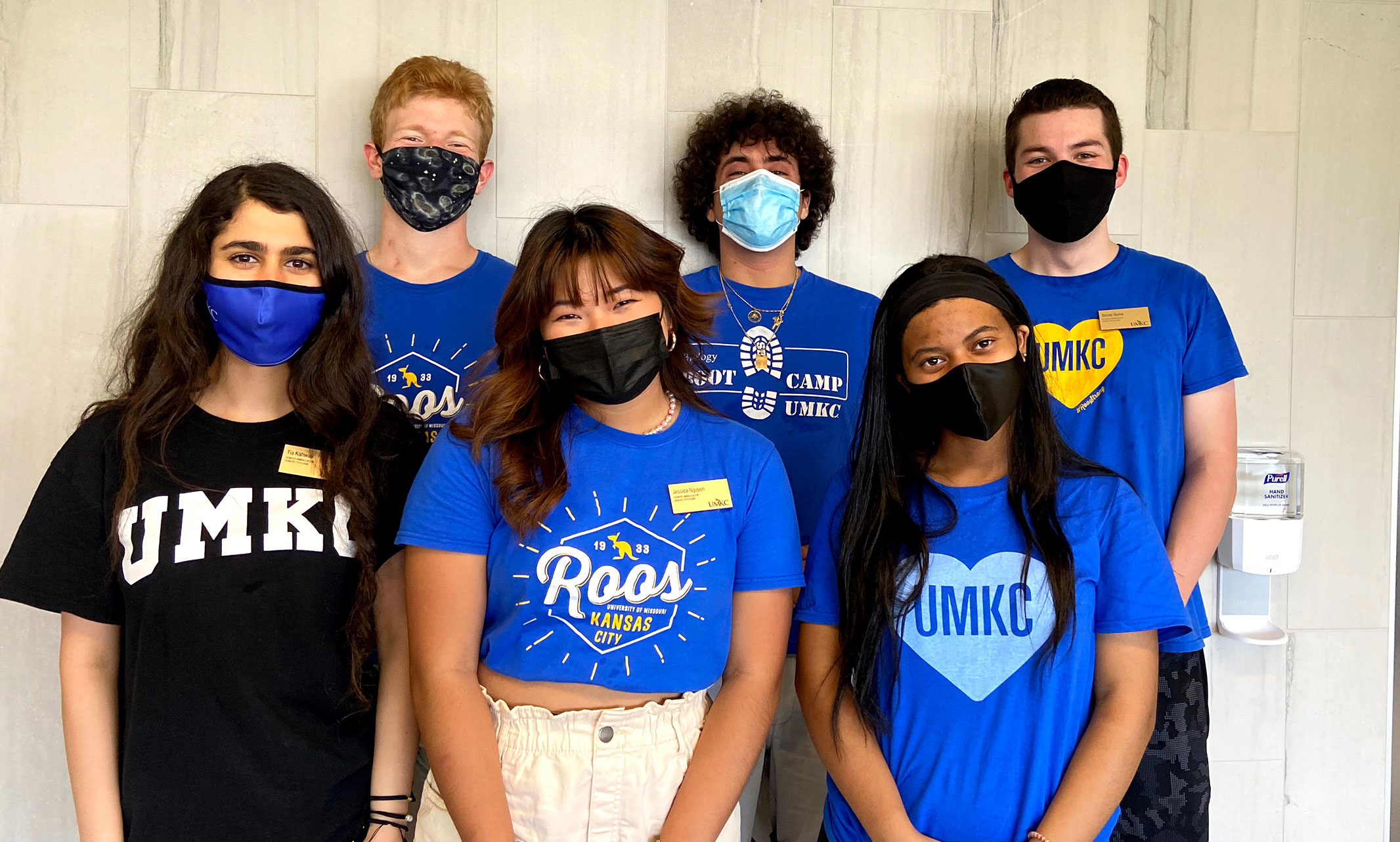
Students combine academic rigor with community service
A record number of new students across disciplines have committed themselves to academic excellence, while also serving their communities, by enrolling in the UMKC Honors Program.
This year, 471 students are enrolled in the prestigious Honors Program. The program, formerly known as the Honors College, provides a multitude of services to our campus community.
“The Honors Program invites and includes new and continuing students from all programs and all disciplines across the university,” said Henrietta Wood, Ph.D., one of two full-time Honors Program faculty. “We offer honors versions of general education courses, and we supply a number of courses to help students accrue the credits they need to graduate with honors.”
Gayle Levy, Ph.D., is the Director of the Honors Program. She serves as an advisor to students, especially when they are writing their Senior Honors Thesis. She also works with faculty on how to get involved with the Honors Program or, more specifically, if they are interested in teaching an honors class. Stephen Christ is the other full-time faculty member, teaching innovative and engaging courses. He’s also actively engaged in mentorship of honors program students on an individual level and organizationally as the faculty advisor to the Honors Student Association.
The program also offers the Roo Honors Academy for local high school students, as well as the Roos@Noon Speaker Series presentations that anyone in the university community can attend. It’s that wide university impact that inspired Sean Purdue, a senior honors student in civil engineering, to become an Honors Ambassador.
“That's what I really like about the Honors Program,” Purdue said. “I love civil engineering, but I don't want just civil engineering friends. I want friends from all the different majors, and that’s been a huge benefit of the program.”
These benefits extend well past a student’s college career into their professional careers. Alaina Shine, ‘15, brought the skills she learned into her career as a pediatric resident physician in Seattle.
“Often in the hospital I am challenged with problems where there is no ‘right’ answer,” Shine said. “A large portion of my job as a physician is teaching patients and their families about their medical illnesses and conditions. I lean upon skills I began learning as an Honors Program student to incorporate ideas from my multidisciplinary team to develop a solution for our patients and their families.”
This interdisciplinary approach does not stop with the students or alumni. Jess Magaña, Ph.D., a professor in the School of Biological and Chemical Sciences, serves as a faculty mentor for honors students.
“One of the very best parts of teaching is getting to know the students, getting to know their specific journeys and helping them take that next step,” Magaña said. “Being an Honors Program mentor is a really great way to do that, and it's especially good for getting to know students who are not in your school.”
Faculty mentors assist students through a variety of informal meetings to check up on the students’ progress, academic and otherwise. If you are interested in becoming a faculty mentor, reach out to Margo Gamache, Director of Student Services for the Honors Program at gamachem@umkc.edu.
“We're not just academic people,” Purdue said. “We still like having social events and friends, and it can be hard to balance. I think most faculty have had that same experience. Having someone to help us navigate that is so beneficial.”
That benefit spreads to the university as a whole. Many Honors students are highly motivated, and they balance academic excellence with serving both UMKC and the wider Kansas City community. Most of the Student Government officers are honors students.
Honors students volunteer to lead clubs for youngsters at the Kauffman School and have communicated with residents of a senior living facility. In the Honors Social Action class, students have promoted campus recycling, mental health awareness, and recognition of commuter students.
“I'm constantly impressed with how involved Honors Program students are and how much they're willing to do to affect their own lives and the lives of other students at UMKC,” Magaña said. “They're super involved, and they're all just such great people to get to know.”
Sep 27, 2021
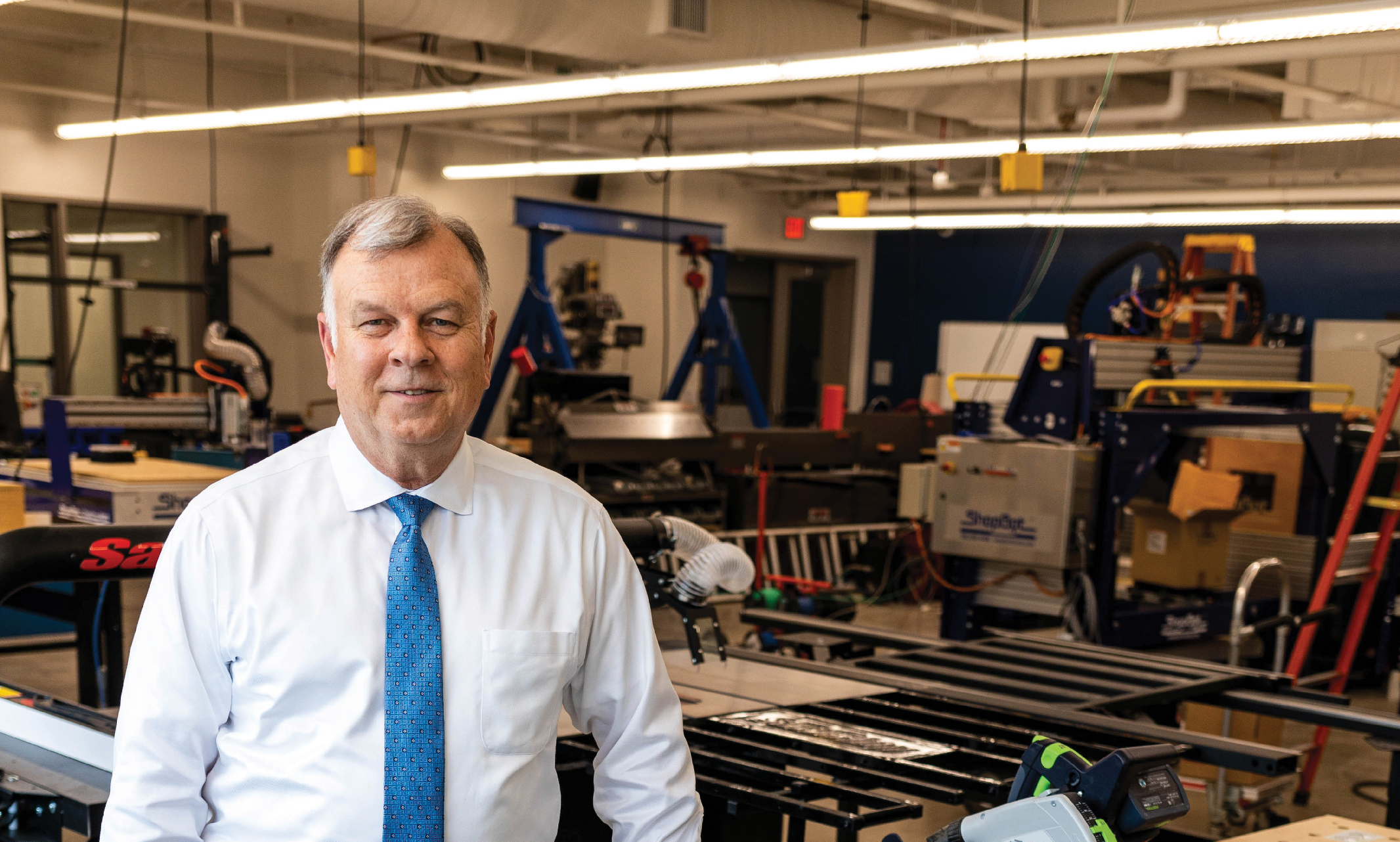
New innovation studio brings together UMKC and the community
Dean Kevin Truman has vision.
As he walks through the halls and labs of the UMKC Innovation Studio in the Robert W. Plaster Free Enterprise and Research Center, he sees progress, growth and untold opportunity.
“This is a place for entrepreneurs to come, collide and create,” he says. “It’s digital to physical.”
While the machines are quiet and the few students in the building work independently and masked, Truman’s eyes are alight with the certain creation of new products, new processes and new collaborations that will not only build UMKC and the school, but also the community.
“We hope to see art students from the Kansas City Art Institute, K-12 students interested in science, technology, engineering and math, or enthusiasts of the virtual reality world.”
While providing some familiar components, the Innovation Studio is different than traditional makers’ spaces. For example, the space provides access to new technologies for rapid prototyping using the 3D printing lab.
“The makers’ spaces in town do a great job serving their market, but we are focused on entrepreneurship,” Truman says. “We can provide services to companies, researchers and the community. It may be someone building one model, but if they need to make 20 prototypes to make sure they’ve gotten it right, we can also accommodate that.”
The Ewing Marion Kauffman Foundation is a major partner and funder in the Innovation Studio. They consider the programs and spaces for students, faculty, staff and the community as critical to the regional entrepreneurial ecosystem.
“Our grant to UMKC helps build on the university’s strong foundation of student and community-facing entrepreneurship support programs,” says Melissa Roberts Chapman, senior program officer at the Kauffman Foundation. “That includes the Innovation Studio. We are excited to work together to see how entrepreneurship can help remake our regional economy to become more equitable, more vibrant and more innovative.”
Students will also have the opportunity to take advantage of the labs in the Innovation Studio and will be able to work at cost. In order to maintain state-of-the-art capabilities, community members will be charged reasonable fees. The center will maintain a staff for assistance, training and maintenance, and there will be a shop manager to help with 3D printing.
“Our 3D printing facility is one of the top five in the country,” Truman says. “Someone could send a graphics package here and a technician can use the company’s files to create what they need. The machine can create product composed of metals including titanium, machine grade steel or copper. We’d track the materials used, pack and ship it to them. It couldn’t be easier.”
The Augmented and Virtual Reality (AVR) lab will have the very latest technology. Professionals and enthusiasts can use the AVR Training Lab to experience the newest augmented and virtual reality technology. The AVR Showroom can accommodate meetings, product development and training. Visitors, whether they are enthusiasts or professionals, can experience the latest virtual reality technology as well as learn the latest 3D design and development software.
“We will be a hub of information,” Truman says. “We have relationships with others and are excited to share resources. We are not an island. We are here to create community.”
Sep 27, 2021
Kansas City-area schools face racist incidents as critical race theory debate continues
Antonio Byrd, an English professor at UMKC who studies Black literacy, described critical race theory as a way to illuminate the role of racism in a society that doesn’t tend to think racism is a major problem. By considering the impact of racism, Byrd said, steps can be taken to fix it. Read more. (subscription required)
Sep 27, 2021
The Oklahoman reports on scholarship awardees
The Heritage Hall Alumni Association recently recognized Genesis Franks as its 2021 Alumni Scholarship recipient. Franks, a 2020 graduate of Heritage Hall, is a sophomore at the University of Missouri–Kansas City. Read more.
Sep 27, 2021
Olympic medalist Courtney Frerichs has no doubt
This is a story about Courtney Frerichs, who turned in one of the surprise performances of the Tokyo Olympics. But really it is a story about mantras, because who Frerichs is and what she managed to accomplish this summer are all about the words she has been repeating to herself for years. She attended the University of Missouri-Kansas City. Read more. (subscription may be required)
Sep 26, 2021
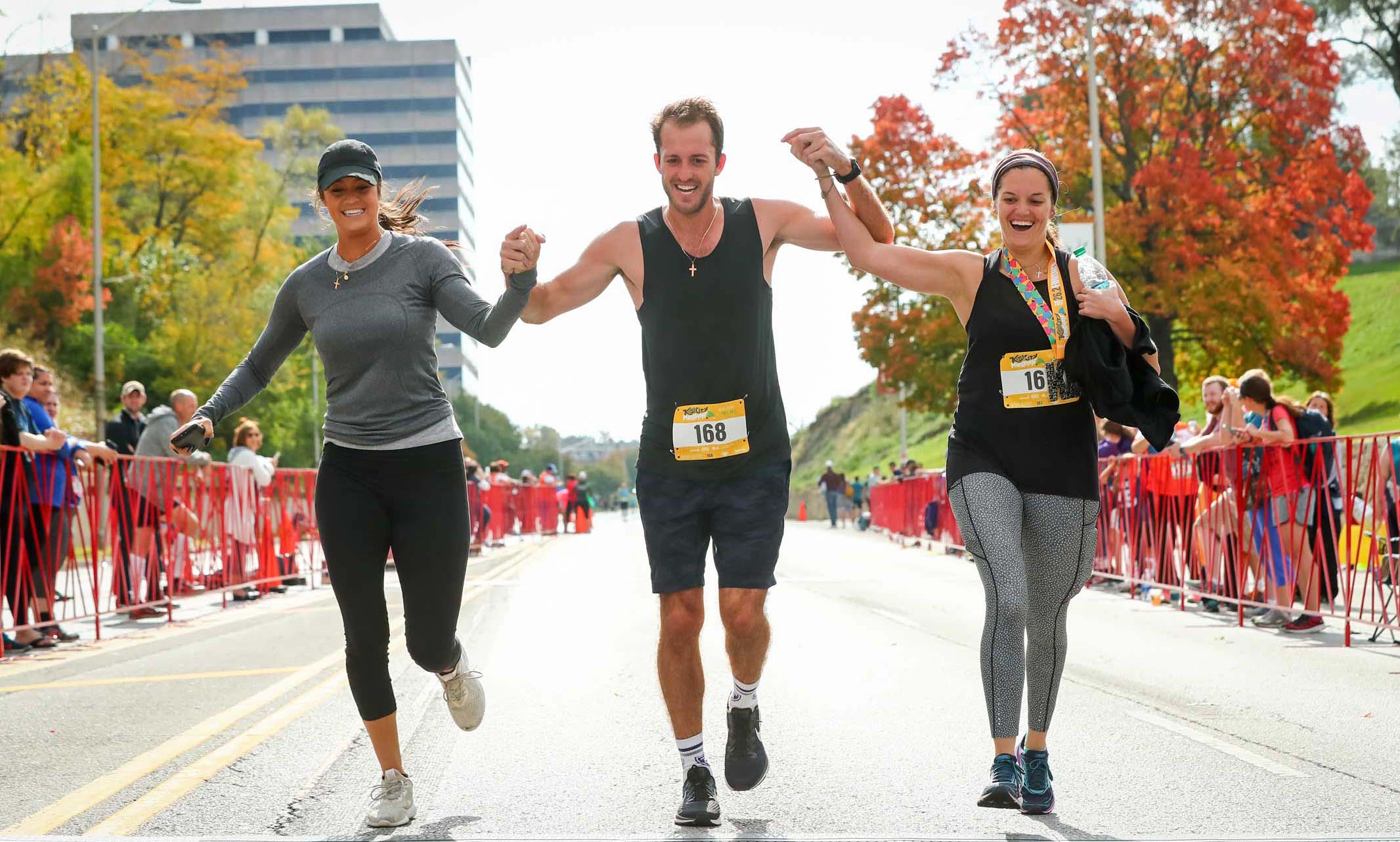
Registration is now open for KC's largest racing event
UMKC and the School of Medicine are proud sponsors of the Oct. 16 Garmin KC Marathon – the largest race event in Kansas City and a significant community tradition. This year’s race has something for everyone: a full- and half-marathon, as well as a 10k and 5k, plus many volunteer opportunities.
Sep 23, 2021
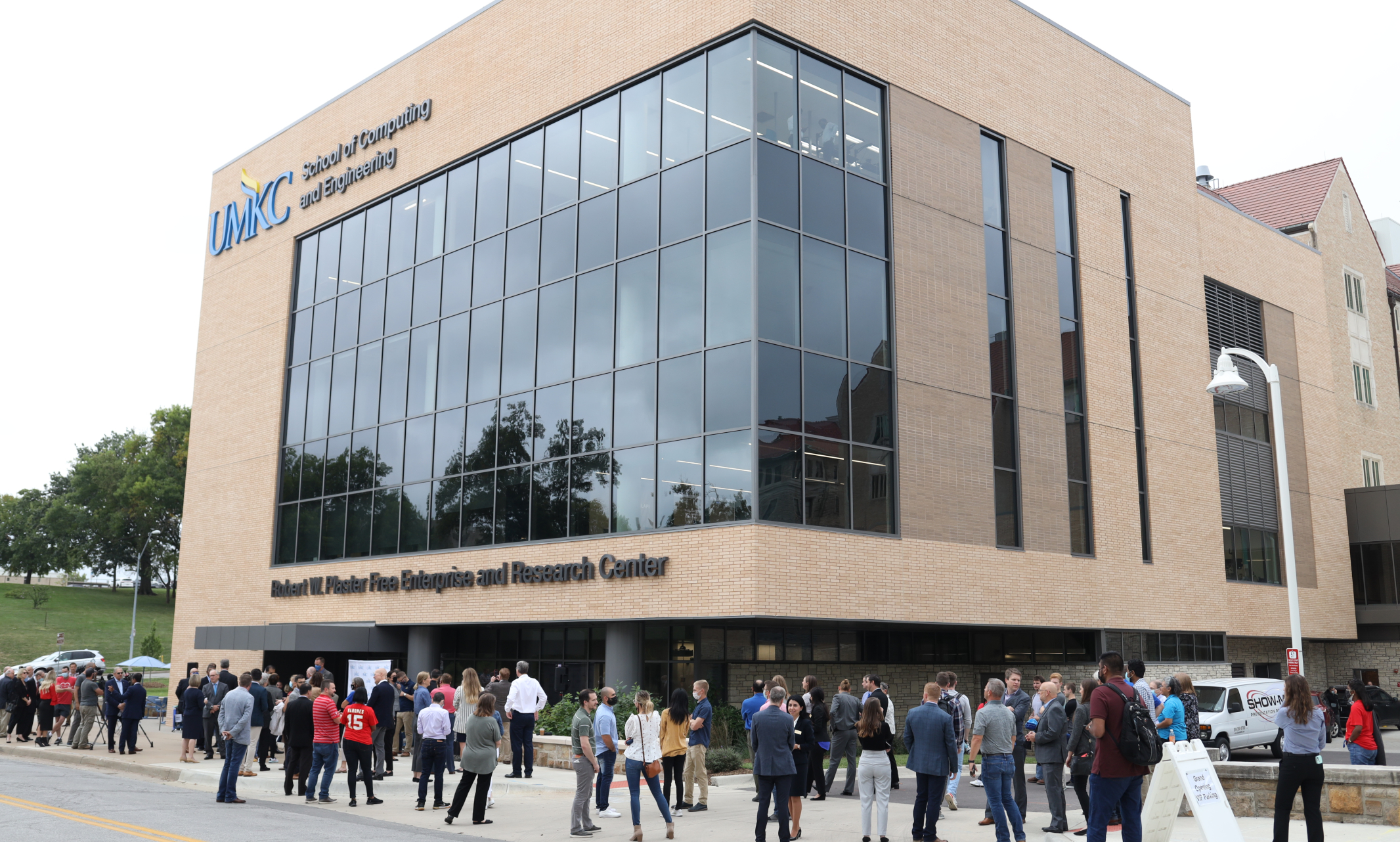
Features 11 state-of-the-art research labs
The University of Missouri-Kansas City unveiled its new $32 million high-tech research center to hundreds of guests on Oct. 1.
The five-story, 57,800 square-foot Robert W. Plaster Free Enterprise and Research Center features 11 state-of-the-art research labs. It is the largest privately-funded capital project in UMKC history, with more than 25 donors.
"The Plaster Center has all but ensured that UMKC will remain the #1 ranked school for computing and engineering in Kansas City for years to come," said Kevin Truman, Dean of the UMKC School of Computing and Engineering, which will oversee the multi-purpose facility.
The labs within the Plaster Center contain a 3D printing lab and fabrication studio to build prototypes, high-performance computing and analytics equipment and software, an FAA-approved flight simulator, a two-story drone flight-testing bay and $3 million of augmented and virtual reality equipment.
A group of guests receives a tour of the Innovation Studio inside the Plaster Center. Photo by Brandon Parigo
The labs aren't just for UMKC faculty and students — the facility is also a community hub where people from across the university, city and region can come together to discuss, design, build and innovate while propelling economic activity in the region through free enterprise.
"This center will be open to all of ours students. In addition to the students at the School of Computing and Engineering, who make their home here, students of entrepreneurship at the Henry W. Bloch School of Management will be able to build custom prototypes in conjunction with our engineering students," UMKC Chancellor C. Mauli Agrawal said. "The Plaster Center is a resource for our community. From independent makers to entrepreneurs and innovators, our lab spaces are available for them to experiment and explore new technology, new innovations in materials and breakthroughs in application and design."
Some of the technology within the labs is not available anywhere else in Kansas City, allowing UMKC to remain state of the art in research and education while helping community partners do the same.
"We are excited to play a part in the cutting-edge research and prototyping at UMKC and in Kansas City," Truman said.
The Plaster Center, on the corner of Rockhill Road and East 51st Street, is named after Robert W. Plaster, founder of Empire Gas Corporation, which was one of the nation's largest retail LP gas distributors.
"This accomplishment would not be possible without the support of the Robert W. Plaster Foundation," Truman said.
Dean Kevin Truman and Stephen Plaster, Chairman and President of the Robert W. Plaster Foundation. Photo by Brandon Parigo
A Missourian, Plaster started Empire Gas in Lebanon, Missouri and sold the business in 1996. He then went on to found Evergreen Investments, LLC, an investment company that owns several businesses. The Robert W. Plaster Foundation, a major donor to the center, is also located in Lebanon.
"The Plaster Foundation is thrilled to have contributed to the new Robert W. Plaster Free Enterprise and Research Center at UMKC," said Jason Hannasch, Associated Executive Director of the Plaster Foundation. "The Plaster Center labs house advancements in computing and engineering technology that will help students, faculty and community members completed advanced research in their chosen field."
Take a virtual tour of the Plaster Center
Sep 23, 2021
Dancing Into A New Era: Local Company Marks 30 Years of the Best Contemporary American Choreography
Most of Wylliams/Henry’s dancers are UMKC Conservatory-trained, which means they have worked directly with dancers, teachers and choreographers who have served as key figures in both the company and the Conservatory. Some of the individuals include Mary Pat Henry, who formed the company a generation ago with the late dancer-choreographer Leni Wylliams when both were on the UMKC Conservatory faculty; DeeAnna Hiett, co-artistic director and UMKC Conservatory dance division chair; Paula Weber, former company member and retired UMKC dance professor; and Caroline Dahm, executive assistant and UMKC Conservatory faculty member. Read more.
Sep 23, 2021
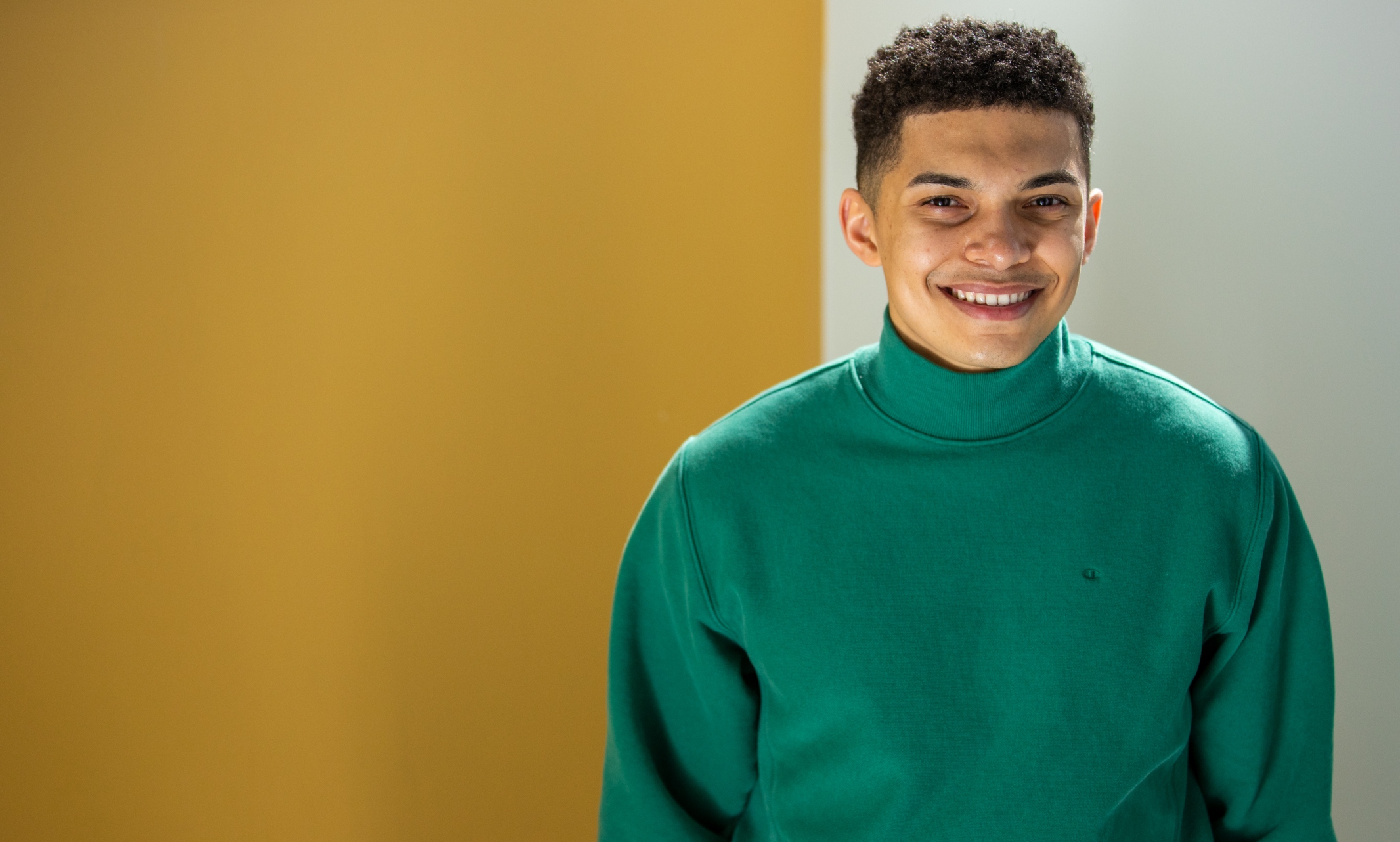
Brandon Henderson stepped back from opportunity with positive results
Brandon Henderson stepped away from his role as UMKC Student Government Association president to focus on his mental health in 2020. Nearly a year later, he thinks it was the best decision.
In hindsight, does stepping away from SGA seem like the right decision?
I am very glad that I stepped down as SGA president, and I have absolutely no regrets doing so. It gave me the space I needed to get healthier and get my academics back on track. I am 100% certain that I wouldn't have made the Dean's List last semester if I hadn't stepped down.
Have the lessons you learned during that challenging time stuck with you?
I learned last year that I'm not Superman, and I have to prioritize taking care of myself if I want to help others, too. Now that I've gotten healthier, I'm getting more involved in my community again. But in the back of my mind, I know that I must be very intentional about how much time I allocate to my extracurricular activities.
What coping mechanisms did you adopt last year that are still helping?
Something I learned last year was the importance of keeping an accurate calendar. Not only does it help me remember things, but I can visually see where I'm budgeting my time to things other than myself. That helps me avoid overextending myself.
If someone were feeling overwhelmed, what resources would you recommend to them?
I highly recommend scheduling a visit with UMKC's Counseling Services. Even if you think you don't need it, or that it won't work for you, if you're feeling any signs of burnout just try to visit with a counselor at least twice.
Often people don't want to talk about personal issues with their friends, but everyone needs someone to vent to. If you don't have that someone, then I highly recommend you go visit Counseling Services and find that someone!
You’re finishing up your degree this semester. How does that feel?
It feels equal parts exciting and nerve-wracking, but nevertheless I am ready to cross the finish line. I've been a college student for the last four years, so it will be quite an adjustment to transition out of that. I'm looking forward to seeing what this new phase of my life has in store for me.
Sep 22, 2021
How would you use an extra $500?
Twenty UMKC students have already won big prizes for uploading their vaccine information – ten free parking passes for a full year (value $338), and ten $500 Visa gift cards. Twenty more of the same prizes will be awarded on Oct. 15.
Twenty faculty and staff have also won prizes, and have the same upcoming opportunity. All you have to do to be entered to win is voluntarily upload your vaccination information. Here is the link for students; faculty and staff should use the COVID Vaccine Uploader in myHR.
Already fully vaccinated? Just snap a photo of your vaccination card and upload. Not vaccinated yet? No problem. UMKC offers free vaccinations by appointment through our partners at Truman Medical Centers/University Health. Register online or call (816) 404-CARE (2273) and press option 1.
We are also planning another on-campus walk-in vaccination clinic for the near future, and additional incentives. Watch for more information coming soon.
Student winners so far include:
Free parking for one year: Atheer Alsalhi, Vanessa Anne Frank, Zachary Braunschneider, Nicholas Jakubowski, Rafia Siddiquea, Randi Entrekin, Nicholas Hartwig, Nicholas Putnam, Danielle Everly, Kassandra Estrada
$500 Visa gift card: Samantha Fisher, Jill Wenger, Mary Signorino, Rachael Huffmaster, Revanth Muthyam, Ashley Appleberry, Kassandra Munoz-Valencia, Aidan Payne, Caitlin Ayala, Blake Setzer
Employee winners so far include:
Free parking for one year: Brittany Bummer, Justin Guggenmos, Julie Dawn Kohlhart, Jennet Irene Miller, Kyle James Pate, Kathleen M. Spears.
$500 Visa gift card: Brenda Lee Bethman, Daniel Mani Cherian, Michele Rene Logue, Johanna E. Nilsson, Elizabeth Ann Savidge, Meghan Sholy-Wells, Kimali A. West.
Sep 22, 2021
Kansas City's Overlooked Housing Stock
Jacob Wagner, director of Urban Studies at the University of Missouri-Kansas City, was a guest on Up to Date. Listen to the podcast.
Sep 22, 2021
No, Kansas City will not escape climate change unscathed
An August study by UMKC and the Office of Environmental Quality aims to map the neighborhoods most vulnerable to the heat island effect. The resulting data will guide solutions in the plan. Read more.
Sep 21, 2021
How can I learn about Tennessee Williams?
The 16th annual Provincetown Tennessee Williams Theater Festival is scheduled for Sept. 23-26. Felicia Hardison Londré, Curators’ Distinguished Professor of Theatre Emerita at the University of Missouri-Kansas City, is a Tennessee Williams Institute scholar and will participate in this year’s symposium. Read more.
Sep 21, 2021
WalletHub reports on best car insurance companies in Missouri
UMKC Professor Larry Wigger answers insurance questions. Read more.
Sep 20, 2021
Guardians of child and family law
The UMKC Family Law program was awarded an A+ rating (one of only six schools nationally to get this top grade) and was featured in this issue (page 30, link below). UMKC alumni were also the highlight of the ranking as one of the top 45 schools in the country for the percentages of grads (13%) named as Super Lawyers and Rising Stars (page 16). UMKC was the only law school serving the Kansas City region to be named to this list. Read more.
Sep 20, 2021
From Startland News
Sally Williams is the technical development and commercialization consultant at the Missouri Small Business and Technology Development Center at the University of Missouri-Kansas City. Read more.
Sep 20, 2021
Nov. 12 is the date for UMKC Conservatory Crescendo Gala 2021
The evening, which will be held at the Kauffman Center for the Performing Arts, will be a celebration of the 25th anniversary of the event. Read more.
Sep 20, 2021
Justice Department faces familiar hurdles in battle against Texas abortion law
“They are trying to take this argument and pull it up to the 30,000-foot level and really address how this law in Texas challenges fundamentally what they described as the national compact,” Yvonne Lindgren, a law professor at the University of Missouri-Kansas City. Read more.
Sep 20, 2021
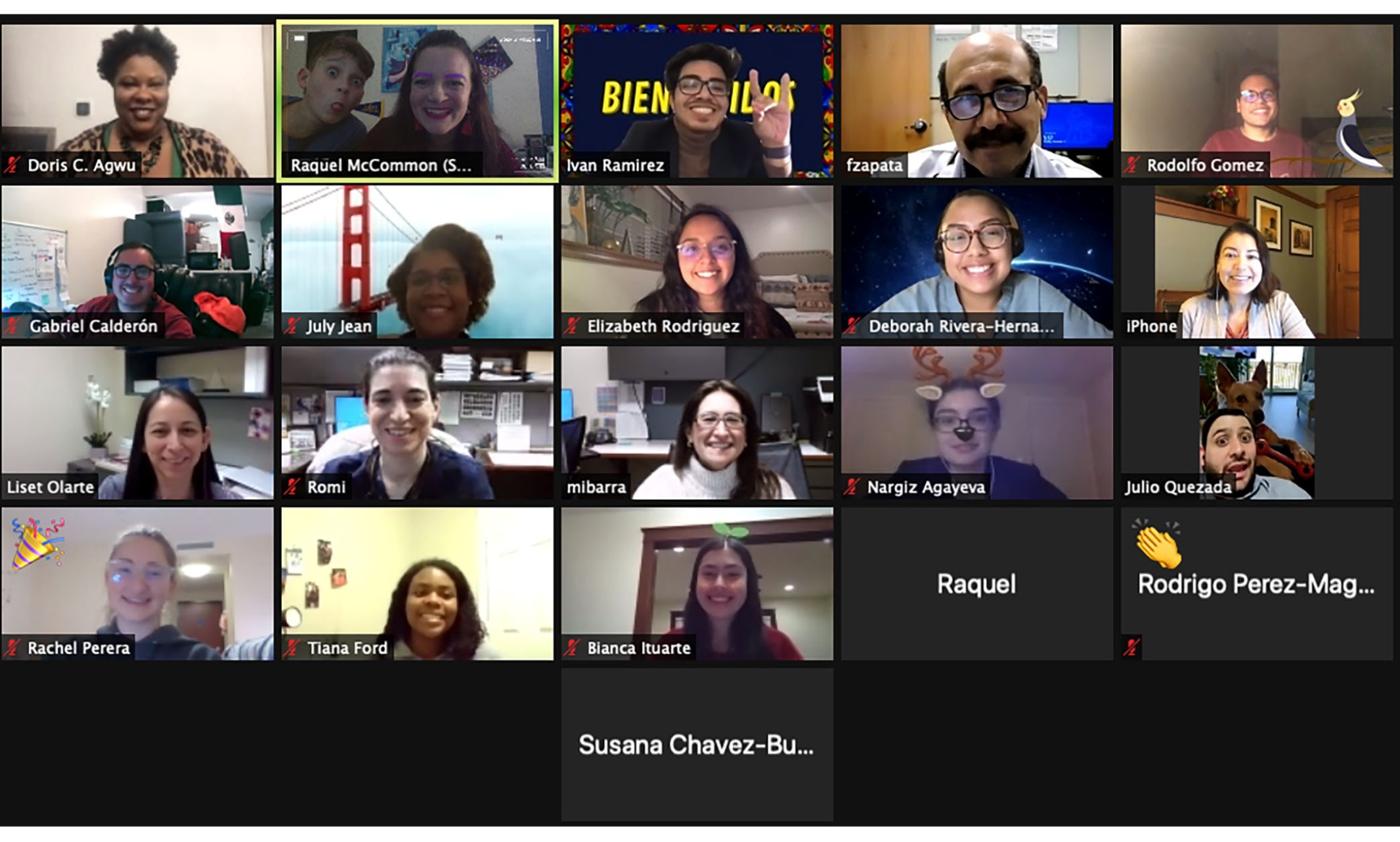
Latinos in Medicine provides mentoring, encouragement to help students succeed in medical school and as physicians
A new organization at the UMKC School of Medicine is designed to support and encourage Latinx students to help them succeed in medical school and as physicians.
Raquel McCommon, coordinator of strategic initiatives in the school’s Office of Diversity, Equity and Inclusion, said Latinx students are paired with physician mentors who can meet with and help the students through the challenges of life as an underrepresented minority in medical school and beyond.
Latinos in Medicine, established a year ago, gives the students the opportunity to meet and see successful Latinx physicians.
“That in itself is supportive, motivating and inspiring,” McCommon said. “It’s a way of making them feel a sense of belonging, connected, that they have people who are looking out for them, who understand where they’re coming from to help them have better success.”
McCommon said most of the students participating in the program are also involved in the school’s STAHR (Students Training in Academia, Health and Research) program. Supported by a grant from the United States Health Resources and Services Administration, that program also helps prepare students from disadvantaged backgrounds entering health care programs.
However, McCommon said, the STAHR program currently does not have any Hispanic mentors for students.
“What we were hearing from our Latinx students was ‘we need mentors and we need mentors that look like us,’” she said. “Part of the challenge is finding physicians who come from the same background and experiences as our Latinx students.”
As a result, School of Medicine Dean Mary Anne Jackson, M.D., reached out to Liset Olarte, M.D., a pediatrician at Children’s Mercy Kansas City, where Jackson is also on staff. Olarte leads the hospital’s Latinx Employee Resource Group, which includes several Hispanic physicians.
Olarte and her colleagues agreed to serve as physician mentors for the School of Medicine’s Latinos in Medicine program, which also partners with UMKC’s Avanzando program for Hispanic students campus wide.
“Not all of our students are going to go into pediatrics, but this is a stepping stone,” McCommon said. “Here is a physician that does look like you, who might speak the same language as you, that might have experienced a similar background or struggles as you.”
Ten students actively participate in the program, which is open to all Latinx students at the School of Medicine. In addition to one-on-one mentoring, the plan is for the Latinos in Medicine students to meet at least twice a year, including a welcoming program at the beginning of the school year.
McCommon said the broader goal is to offer more group meeting opportunities such as in-person study sessions where students and mentors can come together in an informal setting.
“Often students feel intimidated. There’s a level of hesitancy or reluctance,” McCommon said. “We want them to have what they need when they need it, not when it’s too late.”
Sep 17, 2021
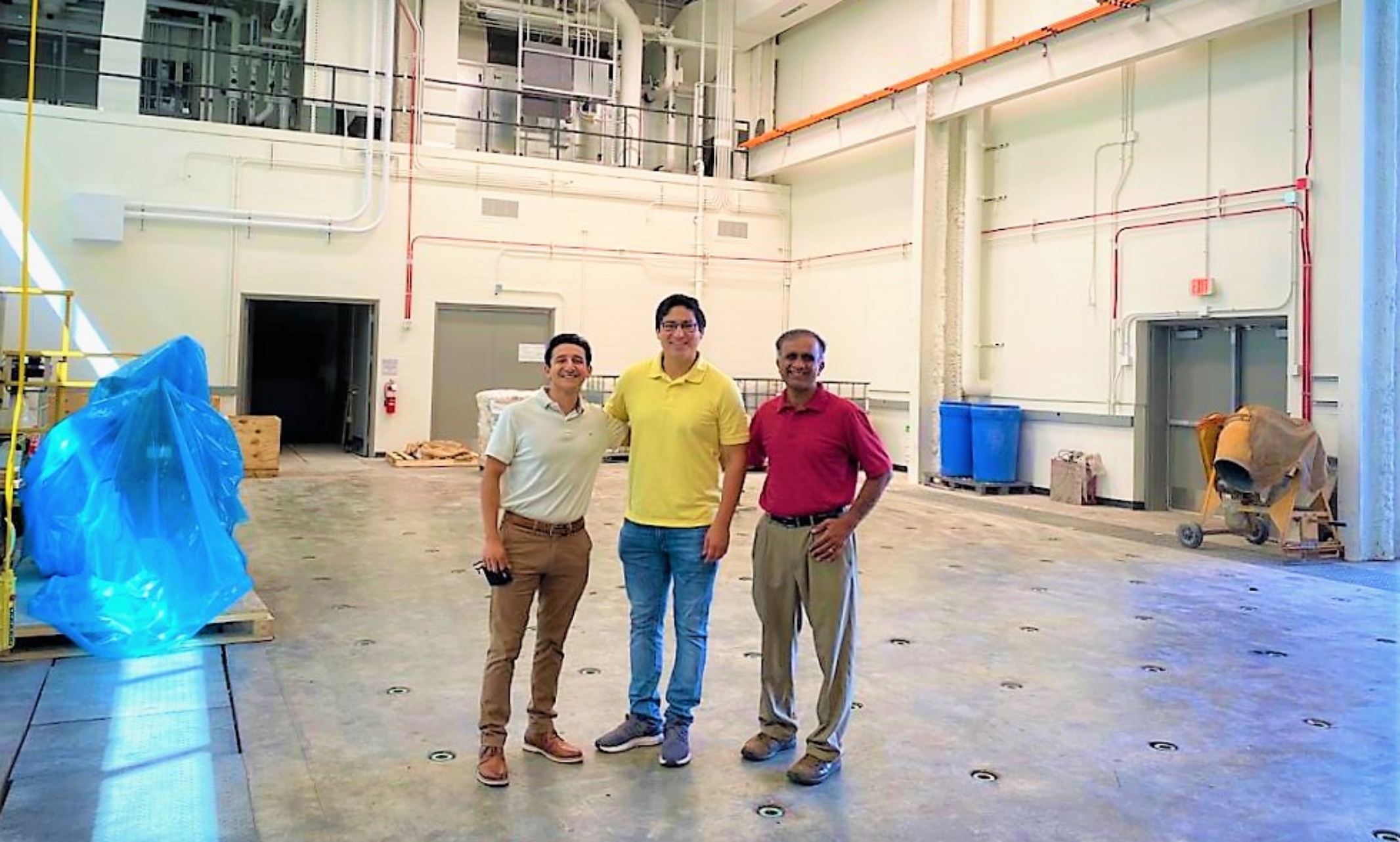
Competitors design, build and test a concrete beam
A team from the University of Missouri-Kansas City has won first place in a national-level student engineering design competition.
The Precast/Prestressed Concerte Institute announced on Monday that a UMKC team had placed first in their 2021 Big Beam Competition.
The competition, now in its 21st year, teaches college students important structural engineering skills in an applied learning environment. Teams of students with a faculty advisor design, build and test a 20-foot, precast, prestressed concrete beam.
Entries are judged on a variety of criteria, including the beam's performance in stress tests. The tests simulate real-life conditions structural building and infrastructure components must endure to ensure safety, as well as the quality of their analysis, reports and overview of their project.
The winning UMKC team included two students, Jose Luis Ramirez and Juan Carlos Plasencia Chinchay, and Ganesh Thiagarajan, Ph.D., professor of civil & mechanical engineering, faculty advisor for the team.
Plasencia Chinchay said the team was very happy with how things turned out and thanked Thiagarajan for encouraging them to participate.
"It is a great experience just to participate in this outstanding competition," Thiagarajan said. "I have coaxed and encouraged students to participate in it just for the learning experience alone, which itself adds so much to the overall prestressed concrete knowledge of students."
In addition to the first-place team, UMKC had a second team place in the top 10. Students Nick Shifflett, Logan Chamberlin, Christopher Bryan and Cristobal Hernandez placed seventh.
Sep 17, 2021
The initiative supports student writing in a multitude of ways
Starting graduate school is a huge step. Unlike most undergraduate programs, students will write proposals, dissertations, theses. How can one prepare for such a large shift in writing style?
UMKC graduate students can turn to the Graduate Writing Initiative. This grassroots effort was initially proposed by graduate students at the university who desired support with a very new style of writing. Demand for this resource became so high, the university has added a full-time academic staff position to the initiative. Marcus Meade, Ph.D., is the university’s first Graduate Writing Specialist.
Meade, originally from the Kansas City area, graduated with a degree in journalism from Northwest Missouri State University before going on to achieve a master’s and doctoral degree in English. He was previously on the faculty of the University of Virginia before joining the UMKC Graduate Writing Initiative.
“I was interested in the opportunity to work with students outside the classroom, setting outside writing support that didn't involve grades,” Meade said. “I found that was more holistic and more supportive. I get to focus on graduate writers, who I think are a particularly underserved population.”
Through the initiative, one-on-one counseling is available, as well as larger workshops. Students can connect with their peers for mentorship opportunities. The Writing Studio also offers blocks of time for students to have a quiet space to write, uninterrupted. This is a very important service for students who are juggling careers and families on top of their studies.
“All the research in supporting graduate students shows that the thing most students need is the ability to carve out time to write,” Meade said. “So, we try and create that for them. We can help them work that into their schedules. They can develop good writing habits, which includes protecting their own writing time.”
This somewhat unique service is available to all UMKC graduate students, across any discipline. Meade hopes students continue to utilize this resource so it can keep growing, supporting even more students through graduation.
“You’re not born with the ability to write a personal statement, or whatever you need to write,” Meade said. “We have a method for teaching them about that genre, understanding its conventions, practicing within it and tweaking them if they need to. We’re here to help them move into those new genres and find success in them.”
Learn more about the Graduate Writing Initiative and the services they provide. The UMKC Writing Studio, The School of Graduate Studies, UMKC Libraries and faculty, staff and graduate writers from departments across campus collaborate to provide these resources.
Sep 16, 2021
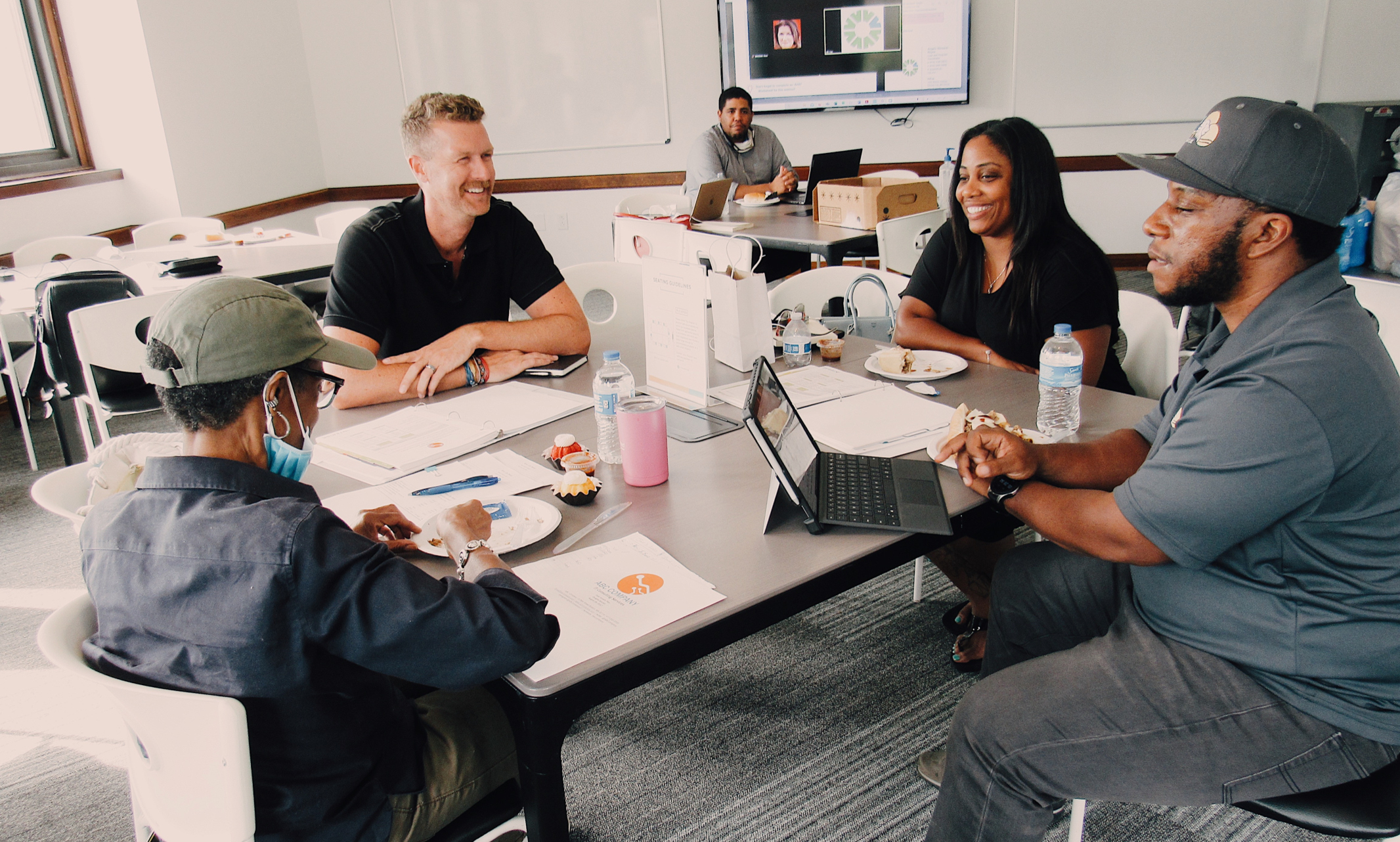
Students and urban small businesses both benefit from program
In most cases, the pricy services of a professional business consultant are beyond the reach of small businesses. A unique partnership between the UMKC Bloch School of Management and AltCap, however, is bringing valuable consulting services to local entrepreneurs from underrepresented communities.
MBA students in a new Bloch class formed teams that functioned like consulting firms and spent a semester working with small business clients of AltCap, a community development financial institution set up to increase the flow of capital to communities and businesses not adequately served by mainstream financial institutions.
The clients, participants of AltCap’s NeXt Stage KC business development program, received relevant, actionable recommendations for growth. The students, meanwhile, gained real world experience working as a consulting team. The Business Consulting class concept was developed by Bloch School Dean Brian Klaas. The class was taught by Tony Mendes, Managing Director of the Regnier Institute for Entrepreneurship and Innovation, and Ellen Junger, chief marketing officer at Helzberg Diamonds.
Student Dominika Luszcz was part of a team that worked with Parrish & Sons Construction, an excavating and grading contractor. The students developed a strategic plan for Parrish & Sons with recommendations in areas such as market differentiation, branding, website, social media and development of mission and vision statements.
“I was always very interested in consulting and always wanted to learn how the consulting business should be conducted,” Luszcz said. “By working firsthand with a real enterprise, I was able to experience and learn authentic business issues, questions that need to be asked to make the best possible decisions, and dive into a completely new industry.”
“As an international student from Poland, I found it fascinating to learn how business is conducted in the USA from every aspect including human resources, marketing, sales, research and development, supply chain management and finally strategic planning to increase revenue and expand sustainable growth.”
Parrish & Sons founder and CEO Fahteema Parrish said the student team delivered genuine value.
“They brought a fresh set of eyes and ideas on different ways we can improve on our media and marketing displays. They worked diligently and were persistent with getting any information they needed from me,” Parrish said. “I was very impressed with their final presentation.”
Zach Lieberman is one of the students who worked with Integrity Capital Management, a firm that works with both rental property owners and tenants to expand affordable rental housing options in the urban core.
“There were several different companies that were introduced to us at the beginning of the class. I gravitated towards my selected company because I saw the passion the owners had in their industry,” Lieberman said. “This organization is squarely focused on a small niche to rehab, restore and rent properties in Kansas City. There is an extreme shortage of livable houses in this area and this organization is attempting to turn this blighted and often forgotten area into an oasis of livable space.”
Terrell Jolly, founder of Integrity Capital Management, had high praise for the student consultants.
“We were blown away with the initial presentation. We were not expecting so much detail,” Jolly said. “Not only did the team present us with missed opportunities but also with solutions that would meet our needs and budget. They also created a timeline of implementations and steps needed to incorporate. I liked the versatility each of the students brought to the table. They worked well as a team that really helped with implementation strategies.”
Luszcz said the team approach was the best part of the experience.
“I met a wonderful group of students who became my partners during the class, but also friends who provided a lot of significant expertise to help me become more aware of the professional business environment. The whole class really felt like I was a part of a well-known and respected consulting company.”
Lieberman agreed.
“Nobody knows everything. A network of people can provide information and insight to help grow an organization. We took the owner’s passion and developed measurable next steps to help his organization grow.”
Sep 16, 2021
Comeback KC Ventures aims to turn pandemic-related ideas into healthy startups
KC Digital Drive and the UMKC Innovation Center are searching for at least 20 fellows for Comeback KC Ventures, with the goal of creating at least 10 new businesses, 30 new jobs and $5 million in follow-up funding. Read more.
Sep 16, 2021
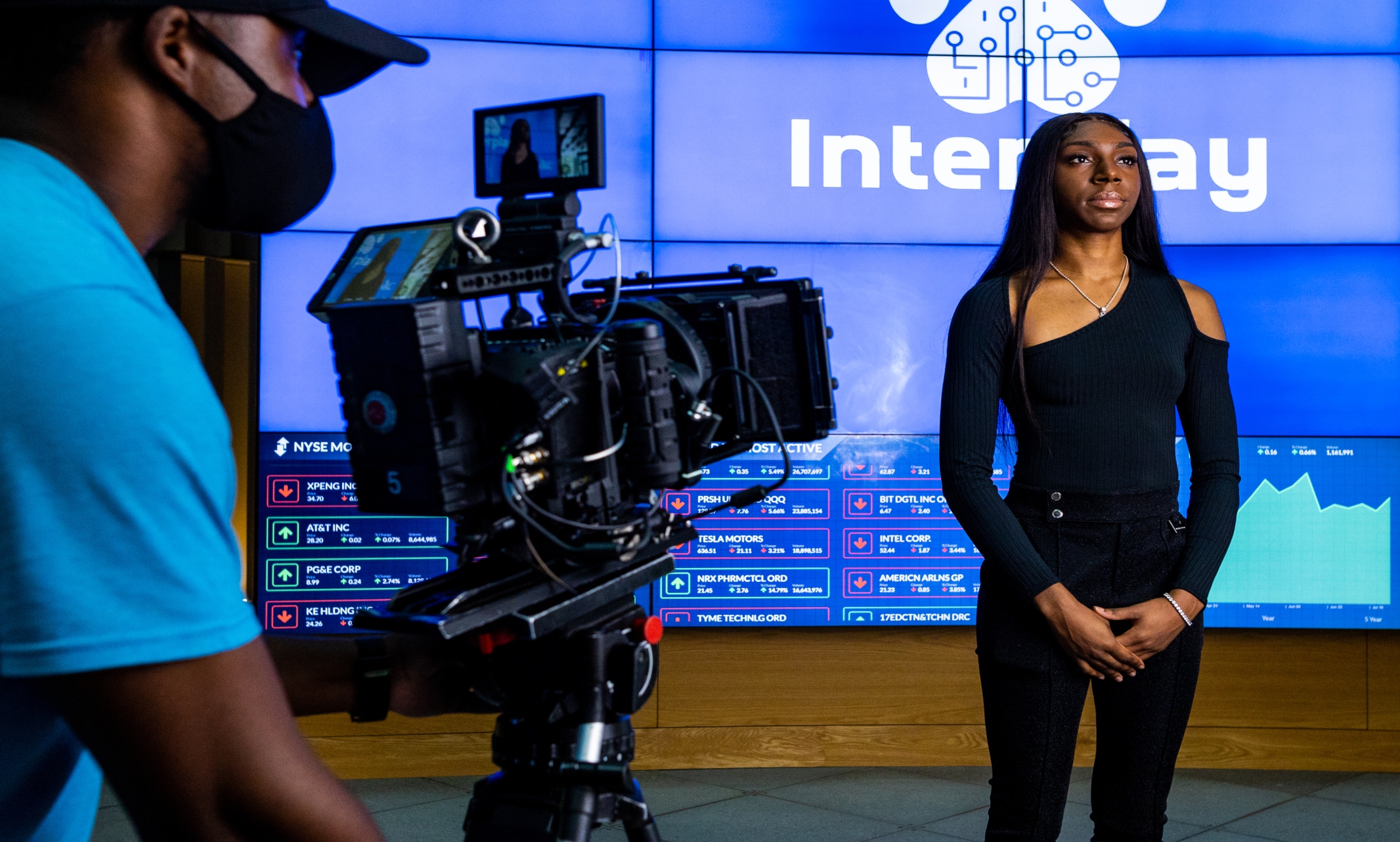
What ends up as a 60-second spot involved months of planning, entire day of shooting
The University of Missouri-Kansas City debuted a new commercial this month showcasing university people creating real change through excellence in learning, research and service.
The commercial is a part of the university's new branding and marketing campaign, with the theme RoosDo. The campaign is designed to showcase UMKC people, driven by inclusion, excellence and strong community connections, putting ambition into action.
It took months of planning to produce the 60-second commercial, according to Kim West, chief marketing strategist for the UMKC Divison of Strategic Marketing and Communications.
"We had many meetings and discussions to meticulously plan how best to showcase all the amazing things we do at UMKC," West said. "While much of this is really fun and exciting to think about, this is serious thought behind each and every shot you see."
Here's a look behind the scenes:
The day began with shooting at the Robert W. Plaster Free Enterprise and Research Center. Photo by Brandon Parigo.
Crews shot a number of students working on projects at the Plaster Center. Photo by Brandon Parigo.
The commercial was produced by Trozzolo Communications Group, based in Kansas City. Photo by Brandon Parigo.
Assistant Professor Mujahid Abdulrahim's flight simulator was also featured. Photo by Brandon Parigo.
It was then time to film a children's music class over at the Conservatory. Photo by Brandon Parigo.
Johnson and Interplay were among the final shots of the day. Photo by Brandon Parigo.
Crews wrapped for the day at the Henry W. Bloch School of Management. Photo by Brandon Parigo
Sep 15, 2021
How much exercise do we need to live longer?
“The very active group, people doing 10-plus hours of activity a week, lost about a third of the mortality benefits,” compared to people exercising for 2.6 to 4.5 hours a week, said Dr. James O’Keefe, a professor of medicine at the University of Missouri-Kansas City and director of preventive cardiology at the St. Luke’s Mid America Hear Institute, who was an author on the study. Read more. (subscription may be required)
Sep 15, 2021
How one KC entrepreneur is taking her venture concept to the next level
Jonaie Johnson is wired for success. A recent University of Missouri-Kansas City graduate, Johnson is a natural leader who thrives on challenges and puts her ambition into action. Read the full article.
Sep 15, 2021
UMKC professor uses his passion for flying to help pilots and passengers get home safely
Assistant Professor Mujahid Abdulrahim at the UMKC School of Computing and Engineering powers his research by using computers to model aircraft movement. Read more.
Sep 15, 2021
Berkley-Patton brings health care and healthy activity to underserved populations
Jannette Berkley-Patton, a UMKC professor and director of the University’s Health Equity Institute, is actively working to improve the health of African Americans in Kansas City using a unique strategy centered around building trust within communities and fully engaging them in the efforts. Read more.
Sep 15, 2021
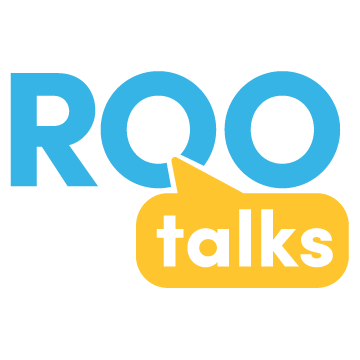
Alumni share their expertise on new series
The University of Missouri-Kansas City Alumni Association is launching a new town hall-style series called Roo Talks.
Roo Talks is a quarterly webinar speaker series presented by the UMKC Alumni Association. The talks will help alumni, and the UMKC community, become better informed on important topics and more aware of the great work our alumni are doing. The speaker series will be held free on Zoom as a webinar to allow alumni and individuals anywhere to attend.
“We are excited to launch this new speaker series and highlight our outstanding alumni,” said Kaitlin Woody, interim managing director of Alumni Relations. “The idea of Roo Talks came from wanting to highlight our outstanding alumni and all the different fields they are working in and have an event that was accessible to alumni where they are.”
Topics chosen will appeal to a national audience and will feature outstanding UMKC alumni. The first Roo Talk will focus on the impact of the pandemic on performing arts, particularly live theatre.
Roo Talks Series
First session, Sept. 27: When the Lights Went Out On Broadway. The free Zoom town hall will be at 4 p.m. Advance registration is required.
Theatres around the country went dark in March of 2020, but that did not deter UMKC Conservatory alumni from creating great performances. The first Roo Talks discussion with be with UMKC Theatre alumni. You will find out what they have been doing since the pandemic began and how things have changed for them and the industry.
Panelists include Charlie Corcoran (MFA, '01), Rocco Disanti (MFA, '08), James Yaegashi (MFA, '98), Donnie Keshawarz (MFA, '98) and Kate R. Mincer (MFA '08).
For more information on Roo Talks, contact Woody at zayk@umkc.edu.
Sep 14, 2021
Students in the Division of Theater at UMKC return to in-person productions
The show goes on for students in the Division of Theater at the University of Missouri-Kansas City, who are back performing in front of an audience starting this Thursday. Read more and watch the newscast.
Sep 14, 2021
UMKC gets $300K research grant to study racial barriers for Black and Hispanic entrepreneurs
A $300,000, three-year grant recently was given to the University of Missouri-Kansas City’s Center for Neighborhoods to support community-focused research analyzing barriers Black and Hispanic entrepreneurs face in Kansas City. Read more.
Sep 14, 2021
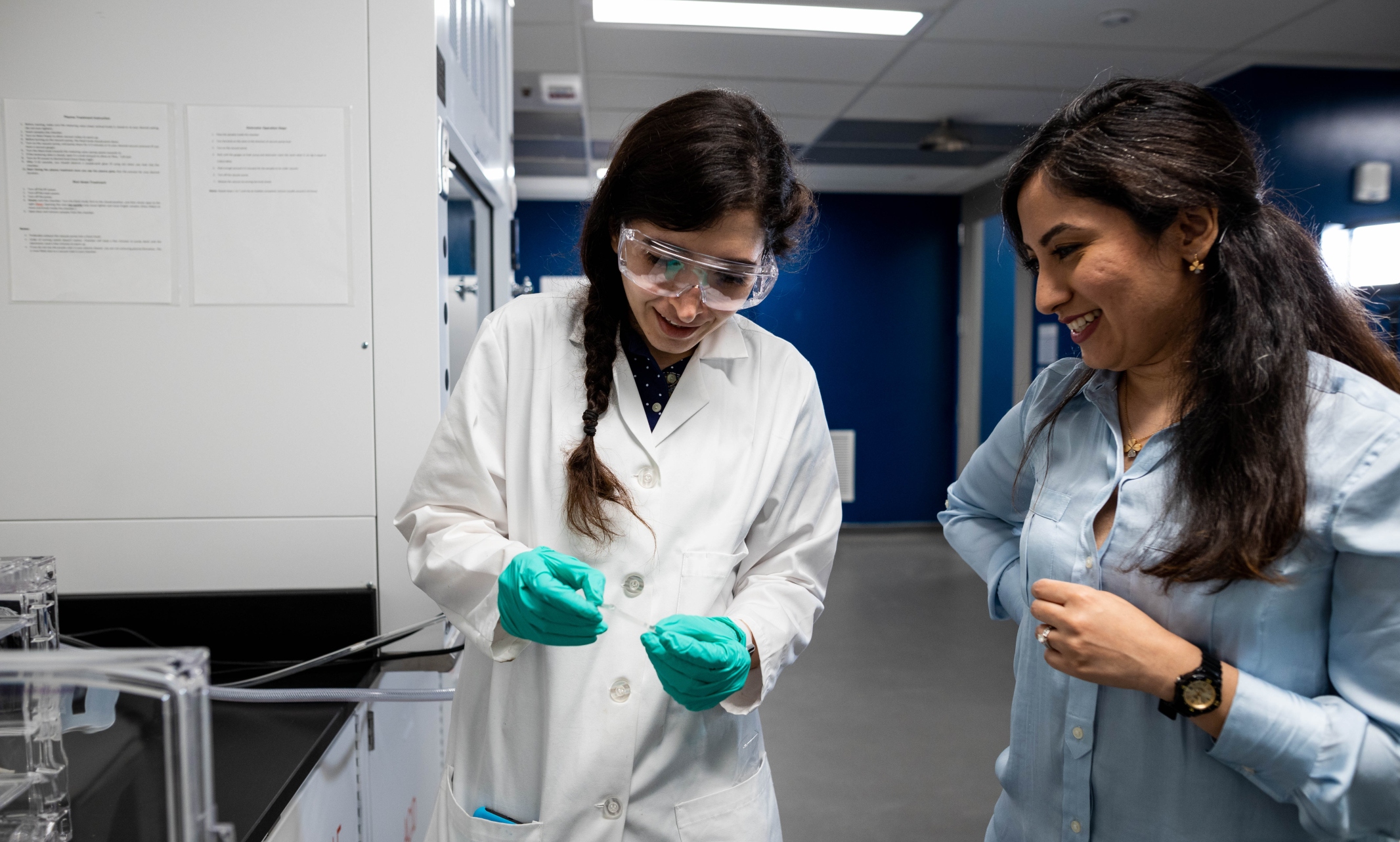
Alumni, faculty and students driving real community change to be showcased on TV, billboards, social media and more
The University of Missouri-Kansas City has launched a new branding and marketing campaign to demonstrate how UMKC people are powering our community by making discoveries, serving others and challenging the status quo.
The campaign theme is RoosDo, and the content is designed to showcase UMKC people creating real change by delivering excellence in learning, research and service. The campaign demonstrates that UMKC is the place where excellence meets action.
UMKC faculty, staff, students and alumni who are making things happen in the real world will be featured in a new TV commercial, on billboards in high traffic areas, print advertisements and digital advertising. The university will be employing both paid advertisements and boosted posts on Facebook, LinkedIn, Instagram and YouTube, including partnerships with diverse media outlets such as Kansas City Hispanic News, The Call, Dos Mundos and The Kansas City Globe.
TV commercial placements include spots during an upcoming Kansas City Chiefs game broadcast. The campaign will also involve a landing page on the UMKC website and branded water bottles, notebooks, pins and clothing. The goal of this campaign is to engage the community by sharing stories of people connected to the city’s largest higher education institution and promote what’s possible with an education from UMKC.
The campaign, launched in September, has been produced by Trozzolo Communications Group and the university’s Division of Strategic Marketing and Communications. Their work included engagement with the UMKC Trustees Brand Enhancement committee as well.
“Over the years, we have been very successful in raising awareness of the key role that UMKC plays in our community in vital areas such as workforce development, community engagement and bringing tens of millions of federal research dollars into our community,” said Anne Hartung Spenner, vice chancellor for Strategic Marketing and Communications. “With this campaign, we are taking our efforts to the next level by demonstrating what our RoosDo, the depth and breadth of our impact as Kansas City’s university.”
“When people see that game-changing innovation, medical breakthrough or social program that improves the community and say — I wonder who did that? We want them to realize there’s a good chance a UMKC Roo did, because RoosDo,” Spenner added.
With an alumni network of more than 135,000 graduates, spanning all 50 states and more than 60 countries, UMKC is educating future leaders and change makers. From local business owners to national government leaders, UMKC student stories will now be celebrated on a larger scale through this campaign.
Sep 13, 2021
Clutter…How and Why We Accumulate “Stuff”
Why do people never open up that bottle of wine for special occasions? Or that outfit hangs in the closet and never gets worn? We all have those items around the house we just can’t seem to part with. It’s known as clutter and Jacqueline Rifkin, assistant professor at the Henry W. Bloch School of Management, asked herself how this accumulation begins.
A psychologist explains why you buy things you don't need — and how to stop - Inverse
Psychological ‘Specialness Spirals’ Can Make Ordinary Items Feel Like Treasures – And May Explain How Clutter Accumulates - The Conversation
Clutter…How and Why We Accumulate “Stuff” - Missourinet
Sep 13, 2021
Kemper Museum uses contemporary art to connect two centuries of Missouri’s history
Paul Gutierrez, director of visitor experience and public programming at the Kansas City Museum, embraced the process. He worked to identify themes with Toya Like, associate professor and interim chair of Race, Ethnic and Gender Studies at the University of Missouri-Kansas City. Read more from KCUR.
Sep 13, 2021
Crowded Homes Drove People To Break Social Distancing Rules
The strain of living in crowded households may have been a large factor in breaking social distancing rules and putting health at risk during the pandemic, according to a study involving two University of Missouri-Kansas City researchers. Read the article from KCUR.
Sep 12, 2021

Ewing Marion Kauffman Foundation supports Center for Neighborhoods three-year research project
The Center for Neighborhoods at UMKC received a three-year, $300,000 grant from the Ewing Marion Kauffman Foundation to study the opportunities and challenges that Black and Hispanic entrepreneurs face starting new businesses in urban neighborhoods in Kansas City.
“Entrepreneurs and local businesses face a challenging environment for starting new or sustaining businesses in Black and Hispanic communities,” Dina Newman, director of the Center for Neighborhoods, says. “They encounter barriers such as lack of access to capital, inconsistent financing and pre-existing economic challenges related to redlining. We were honored to be invited by the Kauffman Foundation to apply for this funding.”
The Kauffman Foundation grant will support a community-focused research process that will examine the place-based challenges that entrepreneurs face due to a legacy of racially biased development restrictions. In addition, the Center will develop new knowledge about entrepreneurship opportunities for Black and Hispanic business owners.
“While we know that these entrepreneurs face race-based challenges, what is not as clear is how these challenges are compounded by the perception of their business locations by outside interests, especially financial institutions,” Jacob Wagner, associate professor and director of Urban Planning + Design says. “This study will allow us to research that impact.”
The Center will work with neighborhood and community networks to build relationships with Hispanic and Black entrepreneurs and develop a baseline analysis of the place-based challenges they face.
The second year of the grant will build on the first with a series of Asset Walks, an interactive and collaborative process in which the research team and local leaders will gather information from local entrepreneurs through informal meetings.
The results of the information from the Asset Walks combined with the baseline analysis will provide data for the center to understand which barriers to successful entrepreneurship are individualized, locational or systemic and which are a combination of these components.
The results of the study will not be purely academic, but a road map to success in rebuilding urban neighborhoods.
“We expect that this research will result in the development of new programs, workshops and training that will strengthen the ability of neighborhood organizations to be catalysts for escalating business development in the urban core,” Newman says.
“While we know that these entrepreneurs face race-based challenges, what is not as clear is how these challenges are compounded by the perception of their business locations by outside interests, especially financial institutions. This study will allow us to research that impact.” — Jacob Wagner
The Kauffman Foundation is a private, nonpartisan foundation based in Kansas City, Mo., that seeks to build inclusive prosperity through a prepared workforce and entrepreneur-focused economic development. The Foundation uses its $3 billion in assets to change conditions, address root causes and break down systemic barriers so that all people – regardless of race, gender or geography – have the opportunity to achieve economic stability, mobility and prosperity.
The Center for Neighborhoods is one of six recipients of funding from this community-engaged research request for proposal.
“We’re excited to support community engagement in the research process through this grant portfolio,” says Chhaya Kolavalli, senior program officer, Knowledge Creation & Research, Entrepreneurship. “These six projects aim to build equitable, collaborative, solution-driven initiatives between communities and researchers with the potential to advance inclusive prosperity through entrepreneurship.”
The Kauffman Foundation anticipates that findings from this project will provide practical insights and knowledge for communities, entrepreneur support organizations, ecosystem stakeholders, policymakers, researchers and philanthropy into how to develop equitable entrepreneurial ecosystems.
Sep 10, 2021
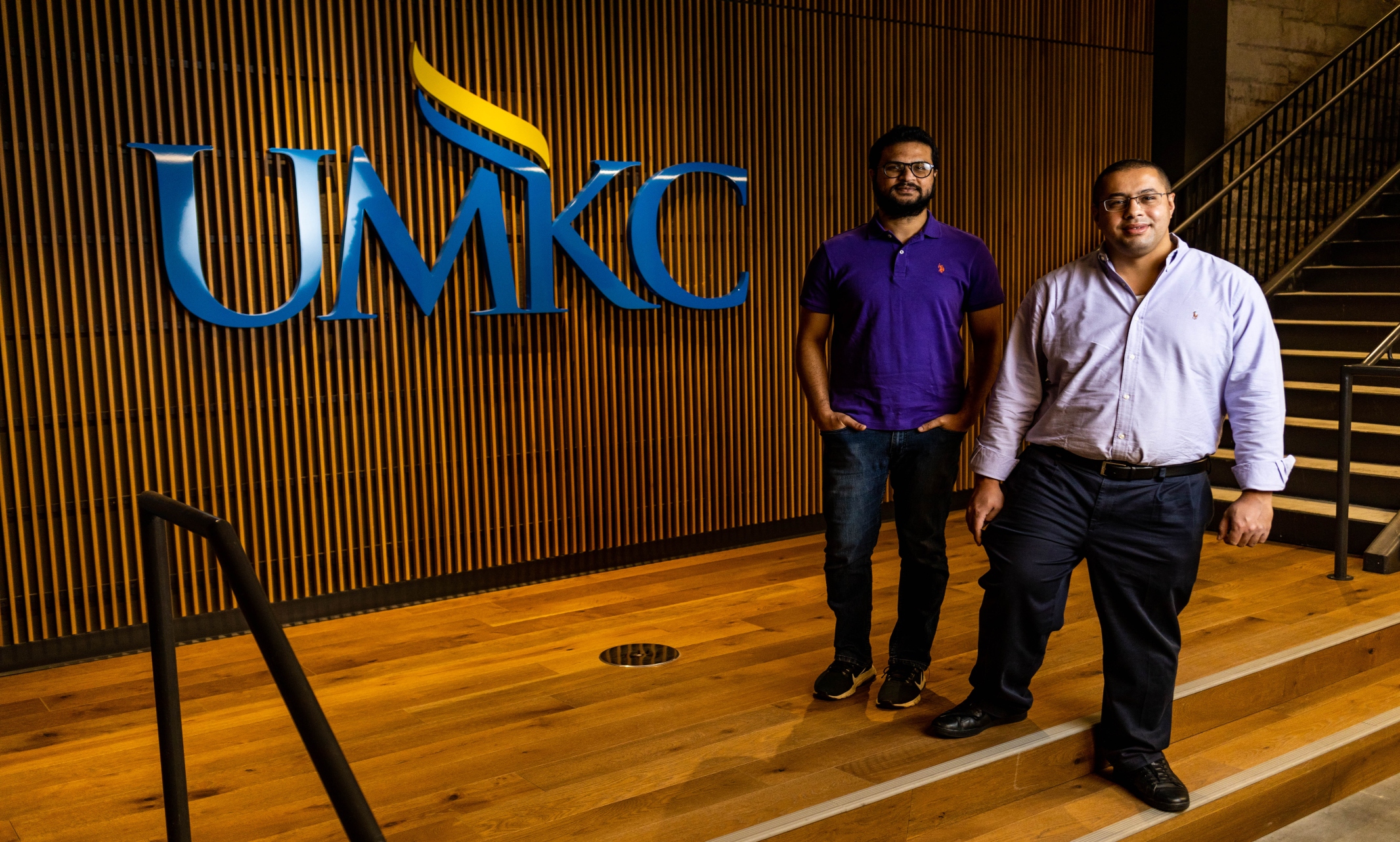
The research analyzes how moon dust particle shapes reflect light
A UMKC professor and student are among a team of researchers that have recently published a historic scientific paper measuring the exact shape of 25 dust participles collected from the Apollo 11 moon landing in 1969.
Research by Ahmed Hassan, Ph.D., associate professor of computing and engineer at UMKC, and Somen Baidya, Ph.D., will allow scientists to get one step closer to understanding why and how the moon reflects light.
"Our collaborates measured the 3D shapes of each sample," Hassan said. "We can look at those samples and calculate the electromagnetic properties like optical properties, or how they reflect light. By observing the light, we are able to get a better understanding of the optical characteristics of the moon as a whole."
The immediate practical application is satellite navigation, which can involve optical images of the moon. Longer-term, understanding properties of the dust will play a key role in creating a habitable living space for long-duration moon missions.
The research team also includes scientists from the National Institute of Standards and Technology, the U.S. Air Force Research Laboratory and the Space Science Institute.
The team's new research method both measures and computationally analyzes how the moon dust particle shapes scatter in the light.
The procedure involved stirring the particles into epoxy, which was then dropped over the outside of a tiny straw and mounted on the heads of pins, before being inserted into a special X-ray microscope capable of measuring the 3D shapes of each of the samples.
Hassan said the team sends him images of those samples to calculate the electromagnetic properties, such as how much they reflect light.
"We observe the light to be able to better understand the optical characteristics of the element," he said.
Hassan said the research has been a great way to help students relate to research they are working on.
"My main area of research is electromagnetic radiation. I love this field and I'm extremely passionate about it, but sometimes it's hard for students to relate to it because most electromagnetic radiation is invisible. You don't see microwaves or infrared rays reflected from things. This is a great way to correlate electromagnetics with a practical, real-life application that almost everyone is excited about."
Baidya, whose primary research for his Ph.D. (which he received this summer) involved studying human cells, said begin involved in the particle research helped expand his understanding of cell makeup.
"This research helped my previous studies about cell shapes," Baidya said. "It was a fantastic experience. I feel very lucky to have been able to work on this and contribute."
Research on the lunar particles is ongoing, and Hassan said the team has yet to scratch the surface of all the information they want to know. Now that the team has learned the shape of the particles, they are looking into developing ways to calculate the "mechanical and hydrodynamic properties of the dust."
"That means if this lunar sand gets into certain fluids, in the future when we maybe have settlements and astronauts there for a longer period of time, how can you filter them? How can you apply electric techniques to filter the lunar dust from the air?" Hassan said. "This is less than one percent of the particles that we have processed and it's only one set of characteristics that we have calculated. We're hoping to compute and study many, many more characteristics."
Scientific research aside, both Baidya and Hassan said simply being able to work with the moon particles has been "fantastic."
"All of us growing up have those dreams of becoming an astronaut or doing something space-related," Hassan said. "So seeing those samples, it's hard to describe the feeling of seeing those samples and knowing they are from outer space. It's really, really interesting."
Sep 10, 2021
Local media interview Stephanee Evers
UMKC School of Medicine alumna Stephanee Evers worked on a FEMA urban search and rescue team at ground zero. She now works as an emergency medicine physician at Olathe Health. Read the full story and watch the newscast. Evers was also mentioned in these news stories:
Olathe ER doctor reflects on 9/11 recovery efforts at ground zero - Yahoo News
9/11 first responder from Olathe looks back before the 20th anniversary this Saturday - KMBC
Sep 09, 2021
The Kansas City Star reports on Missouri gun culture
“We might think that a kid with a gun is irrational behavior, but in a lot of ways it is actually rational behavior,” said Ken Novak, a professor of criminal justice and criminology at the University of Missouri-Kansas City. In a culture where “there are so many guns out there, a kid knows they are at risk of becoming a victim of gun violence, so they carry a gun too.” And so it goes. Read the full story.
The Kansas City Star article was picked up by these news outlets:
MSN
Yahoo News
Sep 08, 2021
Research ranges from flight simulation to the breakdown of plastics
Between January 2020 and June 2021, faculty from the School of Computing and Engineering have been awarded $7,549,732 in research funding.
Megan Hart, Ph.D., assistant professor of Civil and Mechanical Engineering, was awarded $262,821 from the Department of Defense for work on unique ways to break down polyfluoroalkyl substances, which are substances utilized for their water and stain repellant properties.
"From non-stick coatings, like inside of microwave popcorn bags, to your rain repellent gear and beyond, polyfluoroalkyl substances touch almost every aspect of our lives from food, to water, to air," Hart said.
Unlike other hazardous materials, most polyfluoroalkyl substances do not break down using normal water and wastewater treatment techniques, which means that as the substances later break down in soil or water, they can cause harm to humans and animals.
"Our research seeks to invent new and unique methods for completely destroying polyfluoroalkyl substances in the water, as well as investigate how they transform over time in soil," Hart said.
Assistant Professor Mujahid Abdulrahim, Ph.D., was awarded a combined total of $204,995 over the last year for research on virtually modeling aircraft movement by computer.
His goal is to take auto-pilot functionality to new heights without taking flying away from pilots. He wants to make their safety net stronger through developing a computer algorithm that would interpret the actual performance of an aircraft in flight compared to predetermined models on how it should be performing.
"I don't want to replace pilots with a computers," Abdulrahim said. "I love the idea of preserving everything that makes airplanes fun to fly, but I also love the idea of coming home to my children after every time I take to the air."
Below is a complete list of research funding awarded over the last year and a half.
Civil and Mechanical Engineering:
$396,899 to John Kevern for KC Urban Renewal Engineering fellows.
$600,000 to John Kevern for supplement KC Urban Renewal Engineering fellows
$24,998 to Amirfarhang Mehdizadeh for Indian Creek Flood assessment.
$13,500 to Antonios Stylianou for the development of computational tools for pre-op planning of periacetabular osteotomies.
$188,000 to Travis Fields for graduate fellowships for students engaged in NASA-relevant disciplines.
$57,128 to Travis Fields for material processing and automation (partnership with Institute for Material Processing).
$33,000 to ZhiQiang Chen for guidelines for response planning, assessment and rapid restoration of service of bridges after extreme events.
$110,000 to Zahra Niroobakhsh for tuning the viscoelastic properties of enhanced oil recovery relevant bijels.
$60,000 to John Kevern for evaluating the impact of anti-icing solutions on concrete durability.
$40,000 to John Kevern for evaluation of non-traditional sidewalk options for reduced long-term cost and improved public accessibility.
$262,821 to Megan Hart for validation of UV/TiO2 activated alkaline media for destruction of PFAS in concentrated liquid waste systems.
$129,995 to Mujahid Abdulrahim for modeling and simulation architecture to improve research.
$60,000 to Mujahid Abdulrahim for FLEXI-Fly: Field-Reconfigurable, Mission-Adaptive eVTOL.
$22,500 to Zahra Niroobakshsh and Kun Cheng for 3D printing of next-generation therapeutic microneedles using rapid self-association of surface-active peptide drugs.
$30,000 to Ceki Halmen for justifying corrosion durability of reinforced concrete, comparable critical chloride threshold for various reinforcement types.
$40,500 to Ceki Halem for the development of instructor resources for the Contractor's Guide to Quality Concrete Construction (fourth edition).
$19,900 to Deb Chatterjee for signal and radiating systems design and modeling for app.
$15,000 to Mujahid Abdulrahim for UAV-UGV cargo drop.
$57,500 to Ceki Halmen for standard critical chloride threshold test variability due to material sources.
$129,835 to Thiagarajan Ganesh for load and resistance factor rating methodology recommendations for Missouri bridges.
Computer Science and Electrical Engineering:
$305,800 to Yugyung Lee for CUE Ethics: Experiential Learning: Bridging Digital Divides in Undergraduate Education of Data Science.
$44,200 to Yugyung Lee for supplement: CUE Ethics: Experiential Learning: Bridging Digital Divides in Undergraduate Education of Data Science.
$20,000 to Yugyung Lee for supplement #2: CUE Ethics: Experiential Learning: Bridging Digital Divides in Undergraduate Education of Data Science.
$18,000 to Baek-Young Choi for Technology Education for Women in Transition: Broadening Participation Through Innovations.
$301,413 to Faisal Khan for estimating remaining life and availability of power semiconductor devices using sympathetic string phenomena, dynamic safe operating area theory and ultrasound resonators.
$50,000 to Zhu Li for membership renewal for NSF Center for Big Learning.
$150,000 to Yugyung Lee for Smart and Connected Communities Planning Grant: Early Community Intervention for Neighborhood Revitalization Using Artificial Intelligence and Emerging Technologies.
$73,000 to Dianxiang Xu for modeling clinical notes with deep learning transformers.
$42,763 to Yugyung Lee and Brent Never for early community intervention for neighborhood revitalization using AI and emerging technologies.
$22,500 to Yugyung Lee, Brent Never and Wang Ye for Communities in Action: Sustainable Science in Cyberinfrastructure.
$90,000 to Dianxiang Xu for EAGER: SaTC-EDU: Exploring Visualized and Explainable AI to Improve Students' Learning Experience in Digital Forensics Education at MSCI and HBCUs.
$15,000 to Yugyung Lee for gamifying cybersecurity to eliminate alert fatigue.
$96,058 to Dianxiang Xu for GenCyber Summer Camps at UMKC.
$50,000 to Zhu Li for membership fee for NSF Center for Big Learning.
$25,000 to Yugyung Lee for membership to NSF Center for Big Learning.
$25,000 to Zhu Li for membership fee for NSF Center for Big Learning.
$88,490 to Yugyung Lee for Our Healthy KC Eastside: A community-wide COVID-19 vaccination and health services project to address health inequities.
$50,000 to Zhu Li for membership fee for NSF Center for Big Learning.
Sep 07, 2021
Will a pilot program in the infrastructure bill help reshape Kansas City’s inner-loop?
Jacob Wagner, the director of urban studies at the University of Missouri-Kansas City, said that while the northern and southern parts of the downtown loop merit attention, they are not the roads that left the most damage. Read more.
Sep 07, 2021
Can private club in Blue Springs use masking exemption?
UMKC Law Professor Allen Rostron said loopholes like this one tend not to stand up in court. If this scenario ends up in front of a judge, he said a major factor to the case will be proving Rae’s is in fact a private club. Read more.
Sep 07, 2021
UMKC economics professor says work-life balance contributes to lack of labor
UMKC associate professor Bill Black disputes the claim that enhanced unemployment benefits are to blame for a worker shortage. Read more.
Sep 06, 2021
KCUR: Meet Carl Allen
After Bobby Watson's long tenure, Carl Allen is the newly-appointed William D. and Mary Grant Endowed Professor of Jazz Studies at the University of Missouri-Kansas City. Read more.
Sep 03, 2021
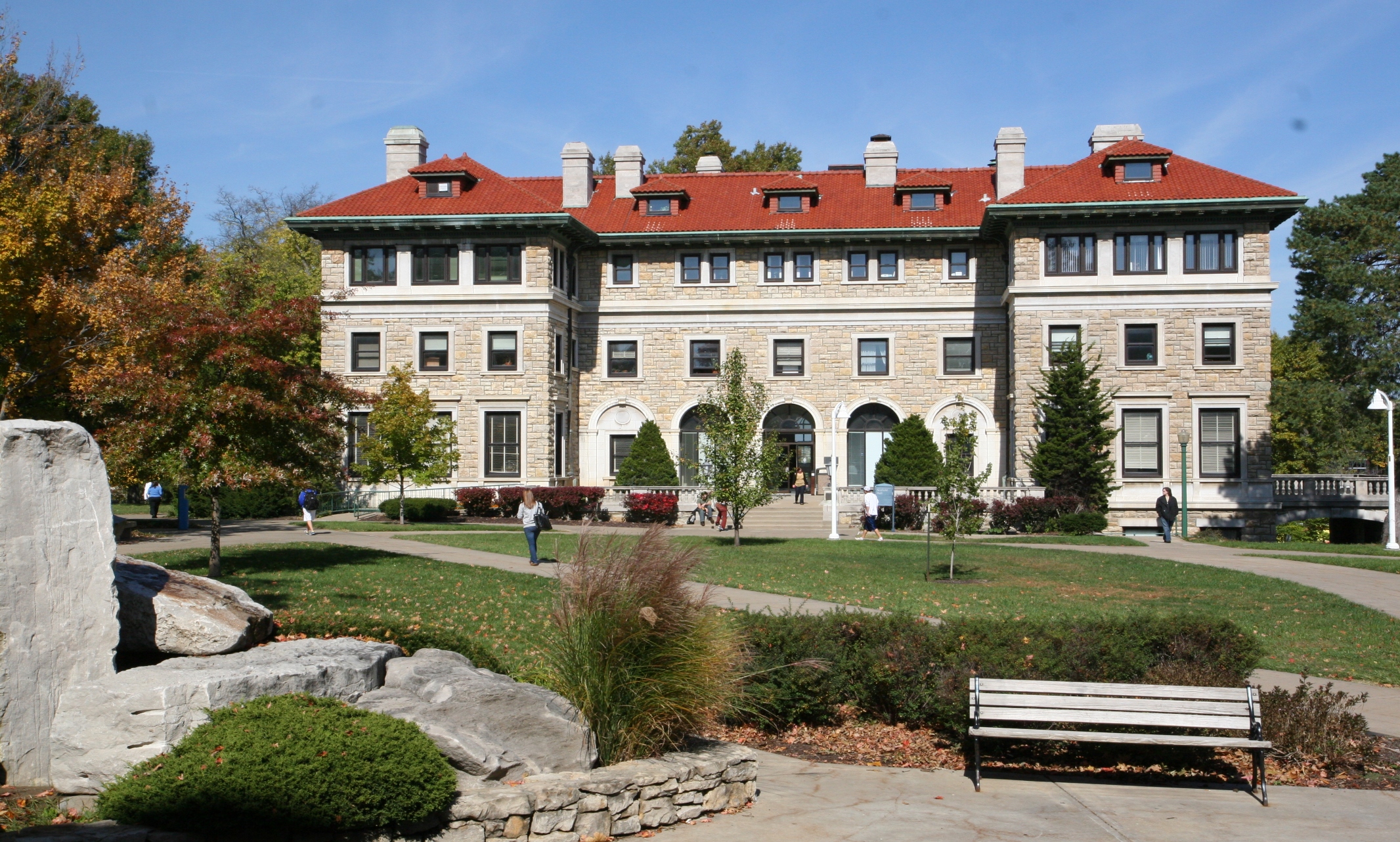
Bachelor of Applied Science helps those with Associates Degrees advance their skills and job prospects
The University of Missouri-Kansas City will offer a new degree — Bachelor of Applied Science — starting fall 2022.
The University of Missouri System Board of Curators approved the proposed degree unanimously on Thursday.
The Bachelor of Applied Science degree is designed for students who have completed an Associate in Applied Science degree. Beth Vonnahme, Ph.D., associate dean of the College of Arts and Science, said those associate degree credits do not easily transfer to many four-year degree programs, which means students wishing to return to higher education for career advancement must often start near the beginning of a four-year program.
"The new degree program allows students to use up to 60 hours of their associate degree credits toward the new bachelor's degree, enabling them to enter the workforce with a bachelor's degree in two years. This saves them valuable time and financial resources," Vonnahme said.
The new degree curriculum will combine core skills employers are looking for in future employees, such as critical thinking, communications, ethics, teamwork and complex problem-solving skills, with expertise in high-demand fields including business, organizational leadership, healthcare management, data analytics, digital media and digital humanities.
"This degree program will grow the pool of potential applicants with the technical experience and key competencies employers need for their workforce," Vonnahme said. "This innovative degree program presents a major opportunity to recruit new students, provides a high-quality educational experience to students who are currently underserved and equips the region's workforce with in-demand education and skills."
Sep 02, 2021

UMKC grad served as lead pharmacist, caring for responders at Ground Zero
Twenty years later, the horrifying events of 9/11 are etched in David Bates’ memory.
Bates (B.S./R.Ph. ’93) recently thumbed through a large scrapbook on a desk at his home in Gallup, New Mexico. As the UMKC School of Pharmacy alumnus reminisced about the role he played as lead pharmacist for the emergency response teams at Ground Zero during the early days of the recovery effort, he stopped and pulled out a sheet of paper.
“Look at this,” Bates said. “I still have a copy of my deployment orders.”
Then a member of the United States Public Health Service in Tsaile, Arizona, Bates was back at UMKC on a recruiting trip for the service when news broke that terrorists had struck in New York City.
“By the time I got to campus, things were getting strange,” he said.
Finally able to connect by phone with his superiors at the emergency response headquarters, Bates was told to immediately return home to Arizona and await further orders. A week later, when grounded flights were finally restored in the U.S., Bates received the order to report to New York. His assignment would be to requisition supplies and establish a pharmacy in support of the five treatment sites set up for response teams near Ground Zero.
“When I got there the pile was still carrying temperatures of 1,200 degrees in places and was still burning big time. All that stuff was still being released in the air. You didn’t know what you were breathing. The ash in the air was everywhere. When you looked and saw the debris fields, they were seven stories high. That was very hard for me." — David Bates
Two years earlier, as a member of a disaster response team based in Albuquerque, New Mexico, Bates had deployed to Fort Dix Army Base in New Jersey as part of Operation Provide Refuge. During that tour, he provided pharmaceutical care for refugees entering the United States from war-torn Kosovo.
“That was my big break because I was working with emergency response people,” Bates said.
The experience paved the way for his call to New York in response to 9/11. A military veteran, Bates served as a medic and pharmacy technician with the U.S. Air Force before deciding at age 40 to return to school at UMKC. After earning his pharmacy degree, he joined the U.S. Public Service Corps and fulfilled his desire to work with emergency disaster teams. Nothing he had experienced before compared to what lay before him when he arrived at Ground Zero.
Bates looked at the devastation from the 9/11 attack on the Twin Towers of the World Trade Center in New York City.
“When I got there the pile was still carrying temperatures of 1,200 degrees in places and was still burning big time,” he said. “All that stuff was still being released in the air. You didn’t know what you were breathing. The ash in the air was everywhere. When you looked and saw the debris fields, they were seven stories high. That was very hard for me.”
Bates established sick call units for responders who had forgotten or run out of their medications for chronic ailments. That was in addition to locating and requisitioning medical supplies to establish a pharmacy that could support the on-site medical clinics, which were seeing 400 to 500 volunteers, military and disaster responders a day.
Many of those, Bates said, were soon becoming ill with respiratory issues because of the large amounts of toxic dust in the air. As of June 2021, the World Trade Center Health Program reported more than 3,500 deaths of responders attributed to a variety of illnesses associated with the aftermath of the 9/11 attack.
Things became so intense at one point that the chief of U.S. Army medical corps came to Bates one morning with a special request. Cyanide gas was escaping into the air and he needed cyanide antidote kits, stat. Bates quickly called a pharmaceutical provider, AmerisourceBergan, and explained his problem. That afternoon, Bates had the kits in hand.
“When the chief medical officer came back and I gave him the kits his response was, ‘I don’t even have the protocols written up for those yet.’ I said, ‘Well you’ve got ’em when you need ’em,’” Bates said. “That made me feel good because it surprised everybody.”
What particularly caught Bates’ attention during his time in New York was the enormous outpouring of support from the American people who wanted to help in some way.
“There was a tremendous response from Americans,” Bates said. “They sent us all kinds of stuff from their (medicine cabinets). Individuals, companies were all sending things they had and we had to go through all of that and see what was good, what was expired, what hadn’t expired, and see whether we could use it.”
In addition, many New York hospitals and other providers had immediately set up small clinics along the city streets. When the federal government took over the recovery efforts, the clinics were abandoned and most everything, including medical supplies, was left behind. It was Bates’ job to confiscate and sort through all of those medications, many of them controlled substances.
“During chaos, things happen,” he said. “It was total chaos at that point. We were just trying to bring a little organization back to the world.”
Nearly 10 days after arriving at Ground Zero, Bates had set up and organized a pharmacy on site from scratch for the next wave of responders. Bates then went home to finish up some year-end paperwork before taking a well-deserved vacation to a Florida beach with his wife and family.
Now retired from the Public Health Service, Bates is a contract pharmacist working with the Winslow Indian Health Center providing care for the Navajo Indian Nation. His career has sent him on 19 deployments to disaster sites across the country.
He says watching the recent U.S. evacuation of Afghanistan “works on you a little bit because you know what started this whole Afghan response from the military action was right where we were on 9/11.”
And it’s those events surrounding 9/11 that still stand out as a defining moment in his life.
“It helped me be more caring about people who are really in need,” he said. “I got involved in emergency response and kept taking it to a deeper and deeper level. I saw it as a way of helping people who were in desperate need of help. And these people were.”
Sep 01, 2021
Flatland interviews UMKC professor
Gary O’Bannon, HR management professor at UMKC, gave insight on the new job market in the face of a pandemic. Read more.
Sep 01, 2021

The Division of Diversity and Inclusion will continue to host a series addressing systemic racism in the U.S.
The Critical Conversations series will continue this year.
The series is part of the thoughtful action our community is taking to ensure lasting and comprehensive reform through Roos Advocate for Community Change, a campus-wide effort announced in June 2020 following the death of George Floyd.
Last year’s panel discussions were in a Zoom town hall format and featured UMKC faculty, staff, students and volunteer leaders who represent the topic being discussed. Due to the ongoing pandemic, the sessions will remain virtual until further notice.
Each discussion aims to enlighten, educate, and explore the causes and potential cures for racism. Further, the university will strive to share actionable steps that can be used to improve racial interactions in the broader community. For more information, please email umkcchancellor@umkc.edu.
Upcoming Session:
The next session of Critical Conversations has not yet been announced. Check back here for the latest updates on the series.
Critical Conversations Series:
Tenth Session, Nov. 16: COVID, Vaccinations and (Mis)Information in Communities of Color
Panelists included: Qiana Thomason, President and CEO of Health Forward Foundation; Dr. Liset Olarte, Divison of Infectious Disease at Children's Mercy Hospital Kansas City; Jannette Berkely-Patton, professor at UMKC Biomedical/Health Informatics and Frank Thompson, interim Director of Health at the Kansas City Health Department. Gary O'Bannon, executive in-house residence, UMKC Henry W. Bloch School of Management, was the moderator.
Ninth Session, Sept. 9: The Role of Antiracism Work and Healing in Museums
Panelists included: Rashida Phillips, executive director, American Jazz Museum; Julian Zugazahoitia, director and CEO, The Nelson-Atkins Museum of Art; Glenn North, executive director, Bruce R. Watkins Cultural Heritage Center; Matthew Naylor, president and CEO, National World War 1 Museum and Memorial; and Anna Marie Tutera, director, Kansas City Museum. Gary O'Bannon, executive-in-resident, UMKC Henry W. Bloch School of Management, was the moderator.
Critical Conversations from 2020-21:
To see a complete list of the first eight sessions, click here.
Aug 31, 2021
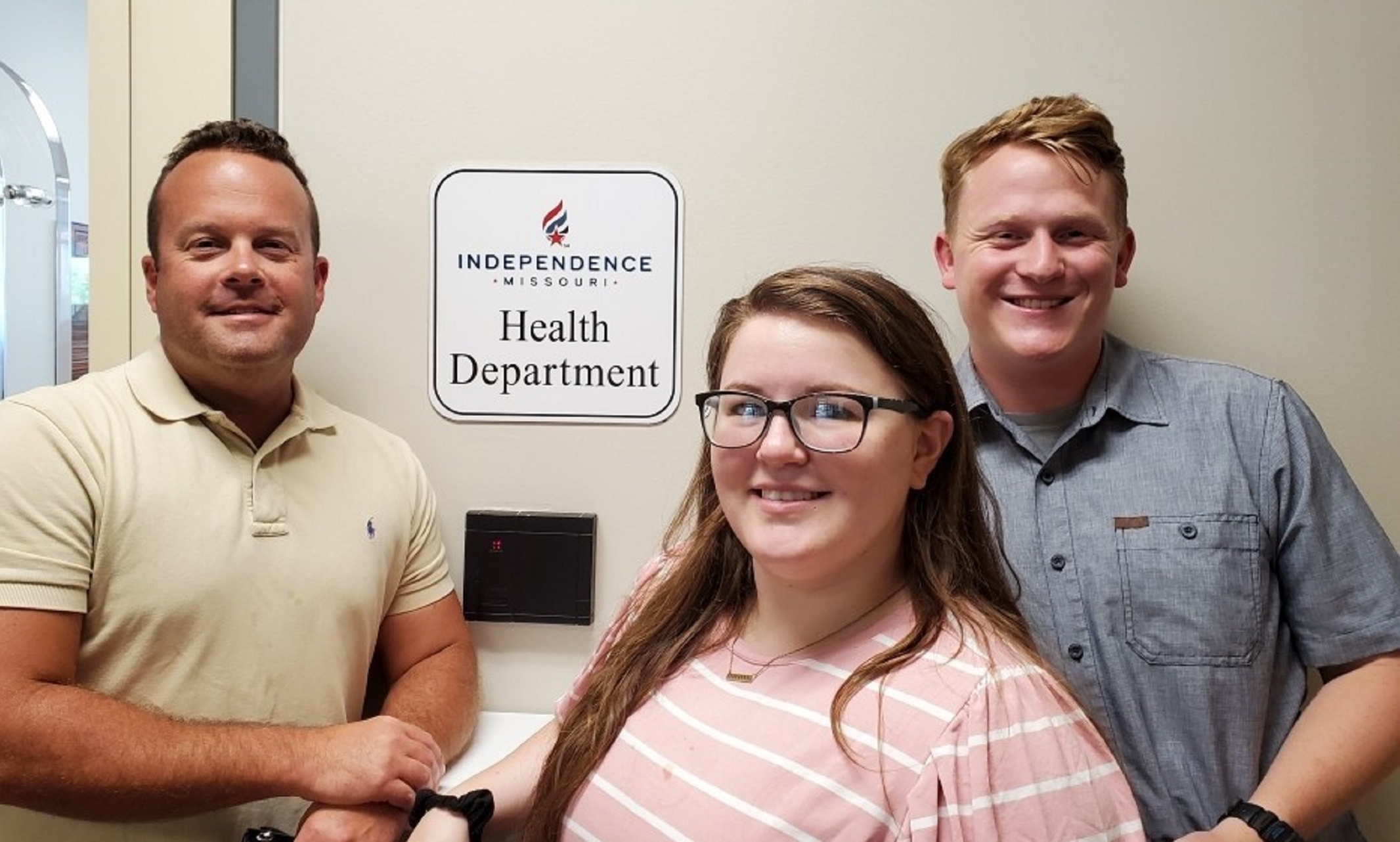
City of Independence, UMKC help each other as importance of community programs grows
When the city of Independence, Missouri, wanted to re-institute its Health Department, two recent graduates of the School of Nursing and Health Studies — and an adjunct professor — were there to help.
The process showed the value of the university to its government and community partners, and it gave the graduates full-time jobs in their field of public health.
Halie Smith-Griffin, who graduated magna cum laude from the public health program, began helping Independence restore its Health Department during her senior year as her capstone project. And when the city had an opening for a public health specialist, she was a natural for the job.
“I chose public health because I wanted to explore more upstream methods to improve the public’s health rather than focusing my efforts on them once they already made it to the hospital,” said Smith-Griffin, an Independence native. “I’m re-establishing community-based programs since the Health Department just re-opened a few months ago after being shut down for a few years.”
Another public health graduate, Conner Berens, is from nearby Lee’s Summit and was a familiar face around Independence government. “I have volunteered for the City of Independence Office of Emergency Preparedness since I was a sophomore in high school,” he said. So when there was an opening for a public health response planner, he jumped at the chance.
Berens had hoped to find a job relating to public health or emergency management right out of school, and he said UMKC prepared him to do just that.
“The public health program put me into the real world, teaching me the principles of research, how to deal with the unexpected, how to develop a health program, and how to be a kind, effective and professional public health practitioner.”
Besides their passion for public health and the lessons and experiences gained at UMKC, Smith-Griffin and Berens graduated at an opportune time, when Independence was re-establishing its Health Department.
In 2018, Independence chose to stop some department functions that were duplicated by Jackson County, such as those related to vital records and vaccinations, and shifted other functions to different city departments. But with the onset of the pandemic, it made sense for the city of around 125,000 residents to have its own Health Department again.
One longtime city administrator tasked with reinstituting the department, Mike Jackson, is an adjunct faculty member with UMKC’s public health program. Jackson has worked for the city about 20 years, holding various posts in environmental health and public works. “So I know about various funding sources, and what the Health Department looked like before and how its functions were reorganized,” he said.
Jackson also knew UMKC could be a great resource. “Around 2014 when the nursing school was putting its public health program together, I was asked to design the environmental health course. And then I was asked to teach it,” he said. “For a project in my class, Conner interned with our emergency preparedness and fire department.”
Jackson also told Smith-Griffin, whose senior project he had supervised, about the job opening she eventually filled. “But then I got out of the away, removed myself from the hiring process,” Jackson said. “It was her turn to shine, and I didn’t want anyone thinking she didn’t deserve the job.”
The re-established Health Department was officially recognized by the state late last year, and Jackson, Smith-Griffin and Berens are busy getting all its functions coordinated and running again.
“I am working on two grants right now,” said Smith-Griffin, who has a small child and great interest in child and maternal health. “One is focused on maternal child health and the other is focused specifically on child health.”
The Technology, Marketing and Media in Health course, taught by Assistant Professor Dipti Subramaniam, Ph.D., is helping Smith-Griffin create promotional material for the maternal health grant. And she said her Health Program Management class, taught by Assistant Professor Matthew Chrisman, Ph.D., has helped her set up her grants.
“I have had to find out who my target population is for my grant, a significant problem they have, and an intervention that could improve their health,” Smith-Griffin said. “I have had to write SMART goals and objectives,” SMART standing for Specific, Measurable, Assignable (or Achievable or Attainable), Realistic (or Relevant) and Time-related (or Time-bound).
Berens is working with COVID-19 surveillance and epidemiology, and with updating emergency response plans.
“Future tasks include developing plans and partnerships to prepare for public health disasters such as environmental crises, natural disasters, disease outbreaks, bioterrorism and other events that result in a mass medical surge or immediate threat to public health,” he said.
During school, Berens also volunteered for the Medical Reserve Corps of Kansas City in response to COVID-19. He said volunteering was a great supplement to his coursework, and he encourages current students to sign up for medical and non-medical opportunities at https://www.mrckc.org.
For his part, Jackson has been busy restarting Health Department functions that had reverted to the county, such as vaccine clinics and disease tracking and tracing, and reintegrating other functions that the city retained, such as restaurant health inspections.
“I know a student can’t always parlay volunteering or an internship into a fulltime job,” Jackson said, “but Conner and Halie showed us what they could do and really shined. That reflects well on them and on UMKC.”
Aug 30, 2021
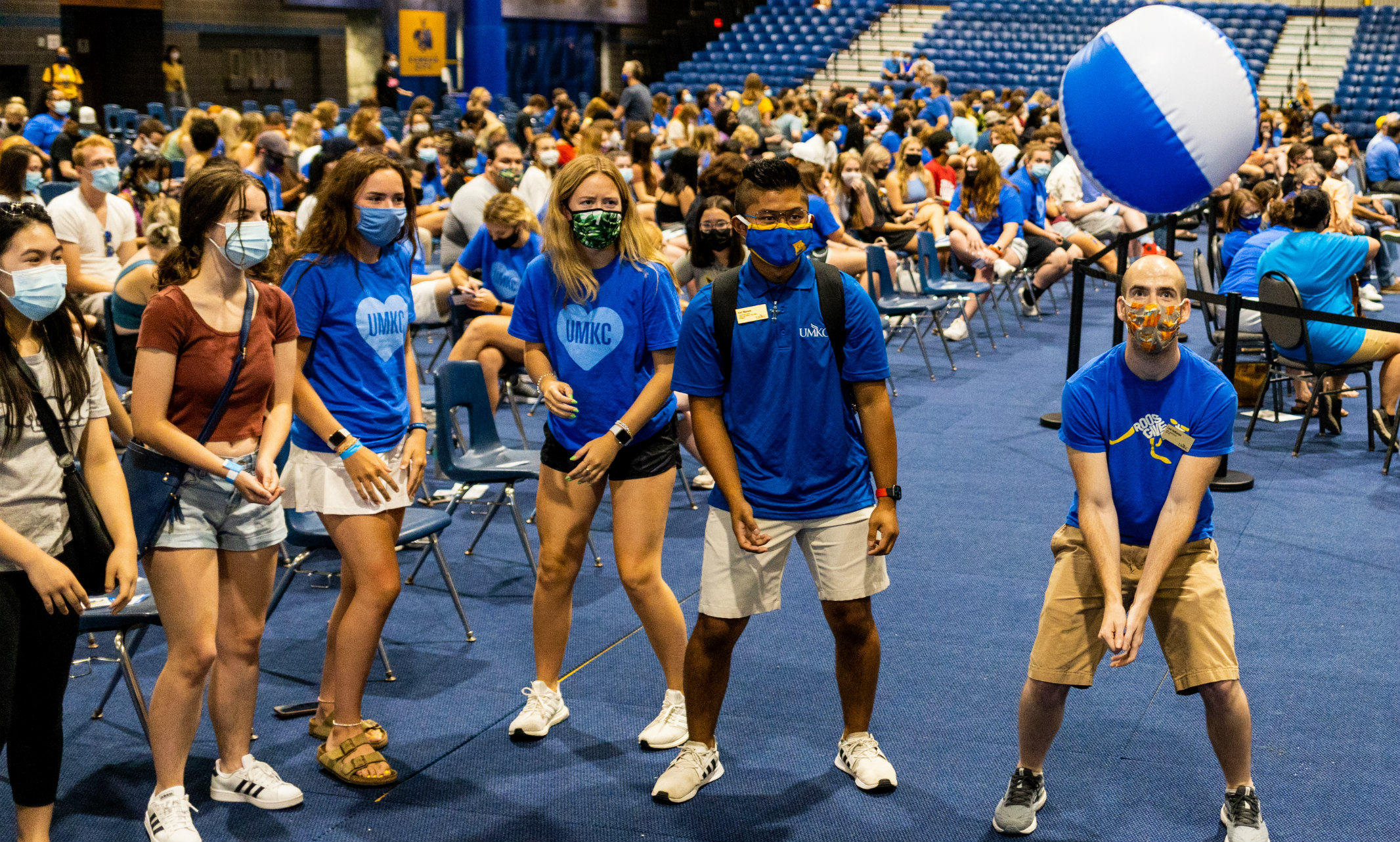
UMKC students kick off Fall 2021 semester
It started with moving in to a new campus or off-campus home. It ended with an upbeat ceremony introducing traditions and an official launch of college life. Also in the mix were meetups, brunches, impromptu introductions and organized frivolity, dancing, a pool party, a mechanical bull, soccer with pregame tailgate party and more.
Roo Welcome is the annual rite of passage for new students at UMKC. It involves informal academic preparations, sessions on managing finances, men’s and women’s soccer games and plenty of fun activities. In concludes with Convocation, where new students are welcomed by the Chancellor and Provost, learn the alma mater and fight song and put on their UMKC pins.
Here’s a look at scenes from Roo Welcome 2021.
It takes a cartload to turn a Residence Hall room into a home
Gotta have that favorite pillow
The journey begins with a single step
Summer scene at Scofield Hall
Welcome to Convocation
Pre-Convocation games
Summer sunshine on the quad
KC Roo demonstrating leadership
A tailgate feast
Game time!
Attention to detail matters
Catch a wave
Headed to the Student Union . . .
. . . for a caffeine break
Our newest campus icon, the bronze Roo by sculptor Tom Corbin
Late Night with the Greeks drew a nighttime crowd
Letting the music move you
Can he hold on?
Sunset over the soccer field
Aug 27, 2021
Rebecca Best offers expertise to media
Rebecca Best, an associate professor of political science at the University of Missouri-Kansas City, said ISIS-K stands to undermine the Taliban and the United States with its attack.
What Is ISIS-K? A Look at the Group Responsible for Afghanistan Terror Attack - KMIZ
The Revolt of Islamic State-Khorasan - Political Violence at a Glance
Aug 27, 2021
Kansas City Star taps Greg Vonnahme for article about Rep. Emanuel Cleaver
Greg Vonnahme, a political science professor at the University of Missouri-Kansas City, was interviewed for this story. Read more. (subscription required)
Aug 27, 2021
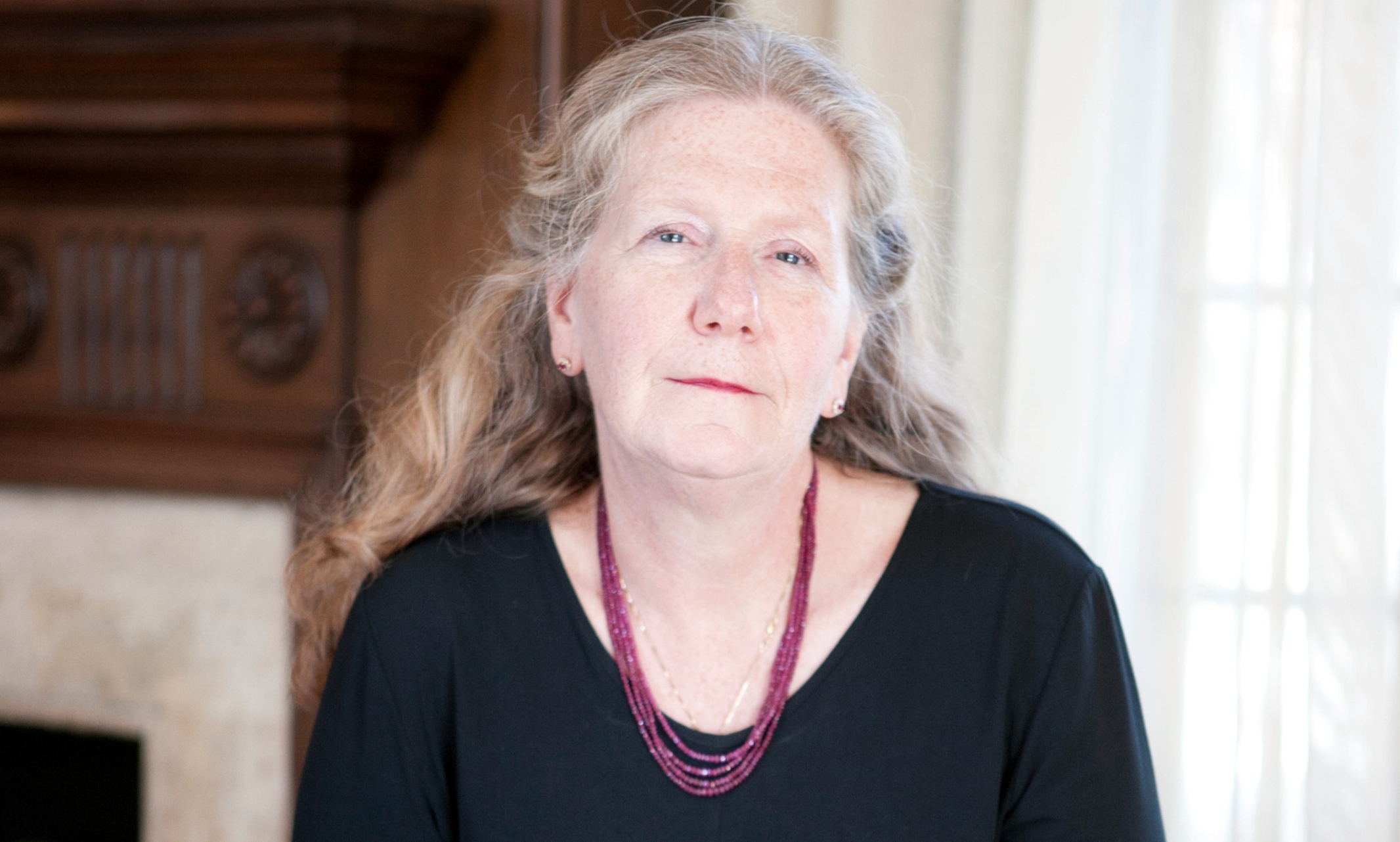
2011 Alumna of the Year Cynthia Watson wraps up career at National War College
Cynthia Watson (B.A. ’78), the UMKC 2011 Alumna of the Year, has announced her pending retirement after three decades of service at the National War College, where she served as a professor of National Security Strategy, chair of the Department of Security Studies and then dean of Faculty and Academic Programs.
As a world-renowned authority on security policy analysis, Watson has directly impacted U.S. foreign policy in everything from civilian-military relations to national security issues. Her students, according to the college, have been “future leaders of the Armed Forces, Department of State and other civilian agencies” being groomed for high-level policy, command and staff responsibilities.
As she prepares for retirement in December, Watson corresponded with her alma mater by email to share reflections on her career and thoughts on current affairs:
Looking back over your career as an educator and scholar, what would you consider to be the highlights and/or most significant accomplishments?
I am proud to show that a UMKC education offered me the privilege of working and studying contemporary issues in several settings around the country. I am especially proud of my three and a half years as Dean of Faculty and Academic Programs, out of 29 overall years, at the National War College where we bring together such a diverse array of students who tackle extraordinarily important yet often intractable problems for the U.S. and our partner nations. I will continue this as Interim Provost of the National Defense University until December 2021.
In your view, what is the most significant national security challenge the U.S. must address?
We must address our internal divisions in my personal analysis. People overseas no longer see us as a beacon on the hill. Compromise is NOT a dirty word but is what made us uniquely successful for two hundred years. By no longer doing that, we are allowing our adversaries to rip us apart which will prevent us from sustaining the power of this nation in many ways.
What are your favorite memories of your days as a UMKC undergraduate?
I have such fond memories of friends who I lost track of over the decades but with whom I have connected on social media. They are awesome people who have gone out to do such marvelous things across the country and in their fields.
Aug 26, 2021
Diane Mutti-Burke weighs-in
Diane Mutti-Burke, a professor of history at the University of Missouri-Kansas City, was interviewed by local media about the re-naming of the creek. Read the news coverage:
Controversial Name, History of Johnson County Creek Leads To Possible Name Change - KSHB
“Negro Creek” In Johnson County Likely Renamed After Finding Link To Racial Violence - KCTV5
Aug 26, 2021
Our Healthy KC Eastside interviews Dina Newman
Dina Newman, director of the UMKC Center for Neighborhoods, discusses the organization's role in Our Healthy KC Eastside, a large-scale, community-based partnership addressing vaccine hesitance and health inequities in vulnerable portions of Jackson County, Mo. Read the full article.
Aug 25, 2021
Kansas City Media Reports on Roo Blue Swirl
Betty Rae’s Ice Cream is now scooping “Roo Blue Swirl” in homage to the University of Missouri-Kansas City. Owner Alec Rodgers is a UMKC alum, and said the new mix was a collaborative effort with the university. Read the news coverage:
Betty Rae’s Debuts New UMKC-inspired Flavor, ‘Roo Blue Swirl’ - KSHB
Iconic KC Ice Cream Shop Debuts New Flavor In Honor of Local University - KCTV5
Aug 25, 2021
The Pitch profiles Steve Kraske
Steve Kraske is a professor in the UMKC College of Arts and Sciences. He is also the host of KCUR's Up to Date. Read the article.
Aug 25, 2021
KC Applauds shares performance details with UMKC Theatre students
Mobile Molièr: UMKC Theatre’s MFA actors bring their riotous romp of a touring show to local schools, performing some of Molière’s most famous and hilarious scenes. Read more.
Aug 25, 2021
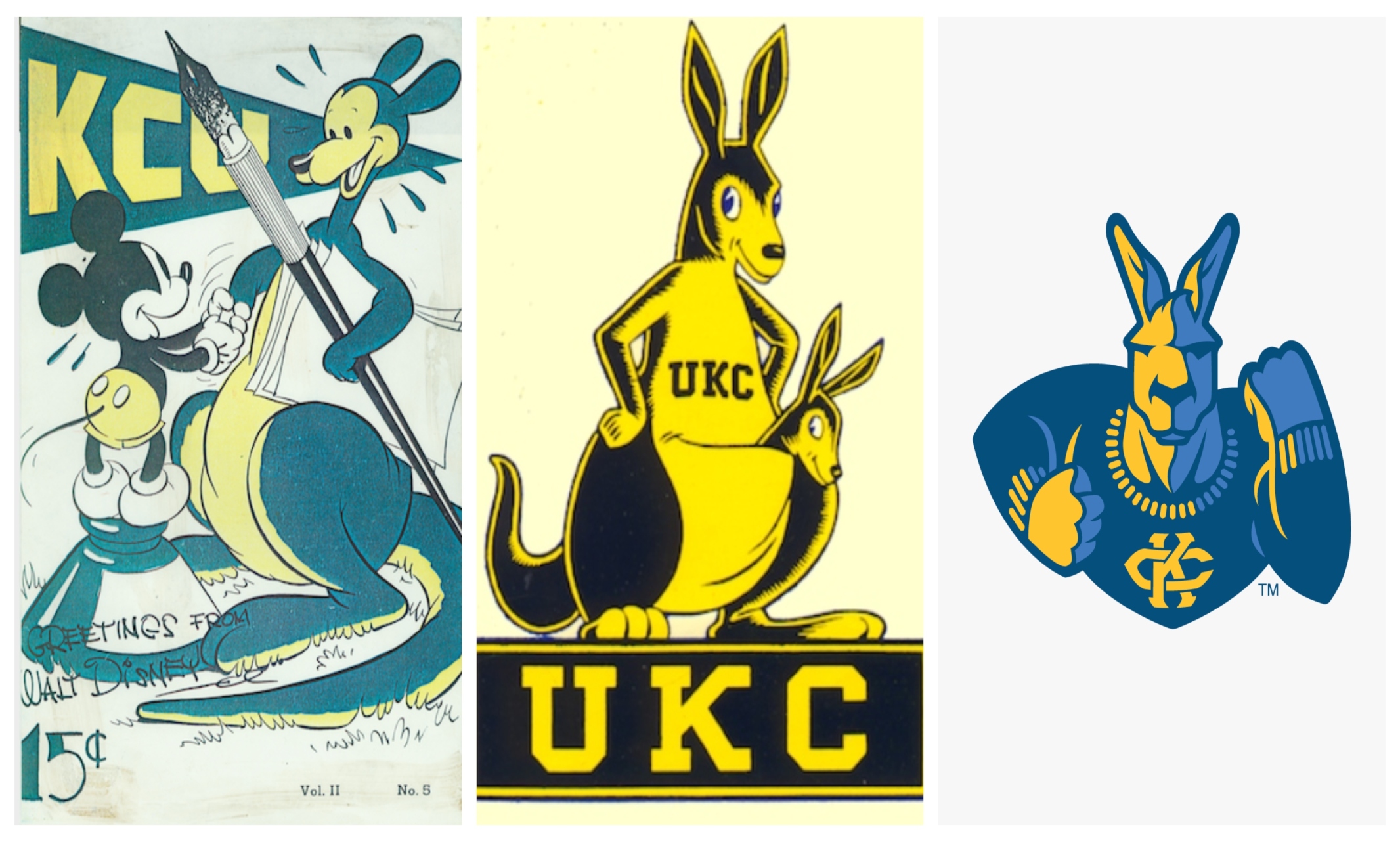
A hop back through time for a look at the mascot’s changing style
In 1936, students at the newly established University of Kansas City were looking for a mascot that would embody the spirit of their school.
The three-year-old university had yet to establish an athletics program, but the debate team was about to begin competing with other universities.
“So, this idea came about that we needed to have a mascot for the university,” said Chris Wolff, the manager of the UMKC Bookstore and a UMKC historian.
At the time, the city of Kansas City was abuzz, eagerly anticipating some very exciting news. Across town at the Kansas City Zoo, Jigger the kangaroo, who had arrived just one year before, was pregnant and the whole town was awaiting news of her little one’s arrival. With all the excitement of the joey’s debut, the students were inspired and chose the kangaroo as the new mascot of the debate team. After all, it rhymed with KCU, the colloquial term used by the community for the university, and they knew the unique selection would stand out.
At first, the adoption of the kangaroo mascot was a student-led effort. After the debate team signed on, the yearbook did too, using the kangaroo as part of the front cover. The kangaroo mascot was nearly lost forever though, when in 1937 the yearbook dropped the kangaroo as its mascot. Not everyone was happy about the change. John Chaney, the president of the KCU Student Council, started the Kangaroo Party of the University of Kansas City with the platform to adopt the kangaroo as the university’s official mascot. In the fall of 1937, Kasey Kangaroo was born.
Throughout the years, Kasey has taken on many forms, both from student-created depictions, to official university marketing. Here is a look back at some of the most recognizable iterations.
The Disney Roo - 1938
In the early years of the kangaroo mascot, the depiction of the mascot was left to students, with help from a local celebrity. Fresh off his 1937 hit Snow White, KC native and famous animator Walt Disney responded to a request from KCU students to illustrate the cover of the March 1938 edition of the student-published humor magazine, The Kangaroo. Nearly a century later, it’s still perhaps the most well-known version of the KC Roo.
Student Roos 1938 - 1968
Over the next couple of decades, students created their own version of KC Roo for various purposes. Some were based on Disney’s version, others were completely unique creations.
The First Official Kasey - 1963
For more than 25 years after the kangaroo became the official KCU mascot, KCU did not use a depiction of a Roo in an official capacity. That changed shortly before KCU joined the University of Missouri System and became the University of Missouri–Kansas City, when the university unveiled its first Roo. It was also the first time Kasey is depicted with a pouch, making her a female. When the university merged with the Missouri system, Kasey got a slight makeover to reflect the change.
Return of the Student Roos - 1970s-1980s
UMKC introduced an athletics program in 1968, but throughout the 70s and early 80s, the university usage of the Roo image declined. Students filled in the gap with their own illustrations of KC Roo playing various sports.
The Flying Roo - 1987
In 1987, UMKC joined the top competition group within the NCAA, Division I. As part of the change, the Roo was updated to be more suitable to athletic competitions.
The Boxing Roo - 2005
In the early 2000s, KC Roo tested a tougher look.
The Hopping Roo - 2009
In 2009, the second version of the running Roo was unveiled.
Fighting Roo - 2019
Today, the Roo takes on a more modern look. Now known as KC Roo, the image you see across campus and at athletic events these days was introduced in 2019.
Through the years, KC Roo has been met with both praise and criticism, but there was only one time since her official adoption that she truly faced the threat of extinction. When the university joined the NCAA Division I, there was a referendum to choose a mascot. Students voted to keep the Roo.
Asked why he believes KC Roo has stood the test of time, Wolff says his theory goes back to the early years.
“The connection to Walt Disney. That holds weight in people’s minds, gives it historical heft.”
Aug 24, 2021
Kati Toivanen featured by KC Independent
KC Independent featured Kati Toivanen, interim dean of the UMKC College of Arts and Sciences. Read the full article.
Aug 23, 2021
IN Kansas City magazine highlights UMKC Theatre, Heart of America Shakespeare Festival collaboration
The Heart of America Shakespeare Festival is teaming up with UMKC Theatre to present The Tempest in the UMKC Spencer Theatre. Read more.
Aug 23, 2021
KCTV5 interviews School of Law student
Bryce Graskemper, UMKC School of Law student, was interviewed for this story. Read the story and watch the newscast.
Aug 23, 2021
UMKC Theatre professor weighs-in
When more than 76,000 voices are at a fever pitch, the sound builds and begins moving in sheets, says Tom Mardikes, a University of Missouri-Kansas City professor of sound design. Read The Kansas City Star article. (subscription required)
Aug 22, 2021
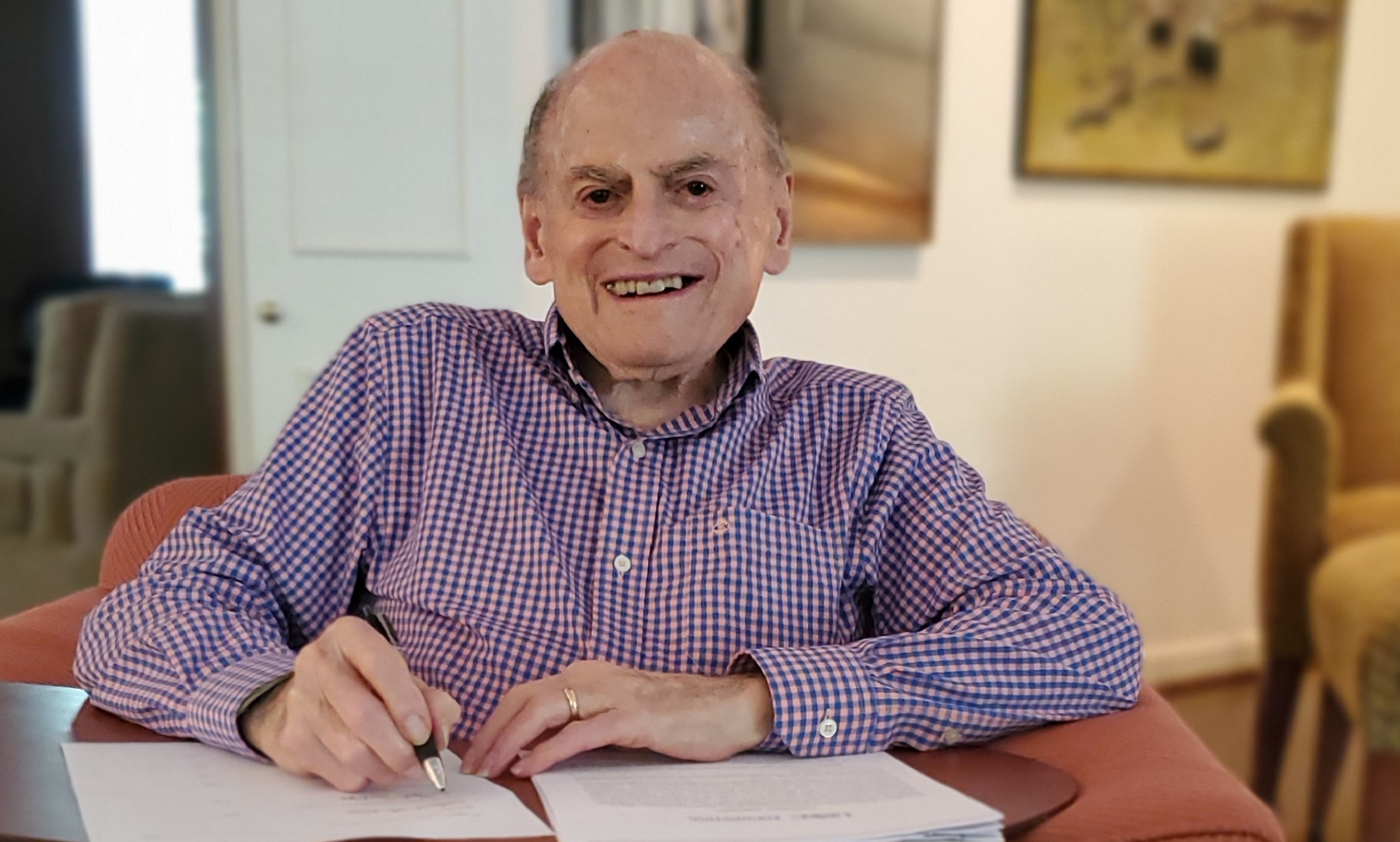
Focus on kindergarten through third grade literacy has long-term impact
Moved by the ramifications of children’s inability to read at grade level by third grade, Kansas City civic leader and dedicated education donor, Bert Berkley, has established an endowed fund of $50,000 to support the Bert Berkley Award for Excellence in Early Childhood Literacy at UMKC.
The fund will provide scholarships to individuals and awards to teachers, school administrators and organizations within the field of childhood literacy, and specifically phonics, to encourage and recognize progress in this area. The UMKC School of Education will recognize recipients at the Urban Education Forum.
Berkley is committed to early childhood education and the scientific approaches to the study of literacy, including the use of phonics.
“I’ve had a particular focus on the importance of reading skills,” Berkley says. “We have many challenges in reading at grade level here in Kansas City as well as nationally. The School of Education at UMKC does an outstanding job of training teachers for the urban classroom. My motivation for the creation of this endowment is that my late wife, Joan, and I have always believed that the power of education is what provides opportunity for young people.”
Recipients of the award will demonstrate long-term dedication to teaching reading to students in kindergarten through third grade, achieve significant progress in student reading levels and make effective use of research-based instruction methodologies of teaching reading including the use of phonics.
“Bert has been tireless in his support of literacy for children in early education,” Carolyn Barber, interim dean of the School of Education says. “In creating this award, the UMKC School of Education joins with Bert in recognizing outstanding achievement in the field of early childhood literacy.”
Establishing strong reading skills by third grade is a determining factor in long-term academic success.
“An abundance of research has affirmed the critical importance of early reading achievement,” Nora Peterman, assistant professor of language and literacy, says. “Third-grade reading proficiency is one of the most powerful predictors of a child's continued academic success and of graduating from high school. Educational equity can only be realized when all students have access to excellent, effective literacy instruction in schools.”
Berkley is a previous recipient of the Hugh J. Zimmer Award for Excellence in Urban Education. The award recognizes urban educators and urban education supporters from the region who are following the example of passion and commitment to urban young people and their communities set by former UMKC Trustee and UMKC Foundation board member Hugh Zimmer. The Zimmer Award is also announced at the Urban Education Forum.
“We are fortunate that the UMKC School of Education has such a stalwart supporter in Bert Berkley,” Mauli Agrawal, chancellor of UMKC says. “His impact on the quality of education in Kansas City is immeasurable. We are honored that he has established this critically important award at UMKC.”
A former chair of the UMKC Board of Trustees and recipient of the Chancellor’s Medal, Berkley is the founder of the Local Investment Commission (LINC) , which has nothing to do with stocks and bonds, but everything to do with investing in children and families. LINC provides social services to those in need, including thousands of children. He is a decorated veteran of World War II and Korea, graduated from both Duke University and Harvard Business School and served on many local and national boards.
Aug 20, 2021
Flatland interviews Arnold Abels
Arnold Abels, Ph.D., director and clinical coordinator of the UMKC Counseling Center, was interviewed. He said a decrease in clients at UMKC is partially due to licensing that only allows them to serve residents of Missouri or Kansas. Read the full article.
Aug 19, 2021
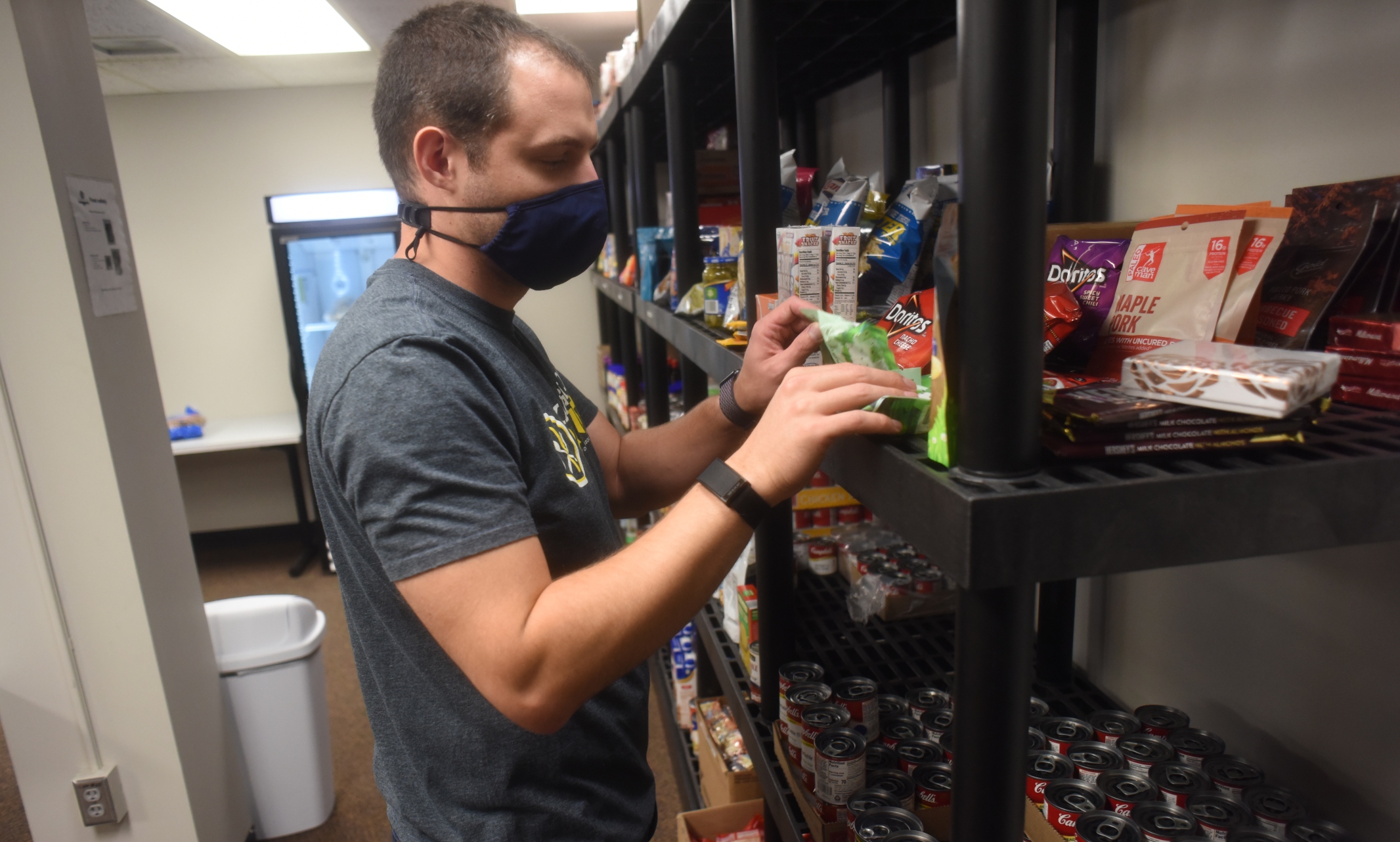
The pantry ensures no Roo goes without, especially during the pandemic
The UMKC Kangaroo Pantry has expanded its reach to help more Roos in need as the pandemic has left more hungry.
During the 2019-2020 school year, the pantry distributed 9,873 pounds of food. Last school year, their output more than doubled, as they distributed 22,140 pounds.
"This is different than anything we've seen. We're seeing more students than we have probably seen in a very long time," Taylor Blackmon, basic needs coordinator said.
The pantry has been able to meet the increased need through things like donations and partnerships with companies and organizations such as Hiland Dairy, Whole Foods and Harvesters Community Food Network.
Anthony Maly, senior program manager, said financial donations and partnerships have been extremely important to the pantry over the last couple of years.
"We really couldn't operate without that financial assistance," Maly said.
Opened in 2015, the Kangaroo Pantry provides food assistance for all Roos in need, including students, faculty and staff. Because of donations, within the last year the pantry has seen some new additions, like a refrigerator and freezer that houses fresh produce, meats and free Hiland Dairy products.
The pantry has also expanded its offerings to include items such as feminine hygiene products, dog food and baby formula.
"We believe that no Roos should go without, and that includes hygiene products, laundry detergent, whatever students, faculty or staff might need to meet their most basic needs. We want to make sure that we can provide that," Maly said.
How to receive assistance from the Kangaroo Food Pantry:
If you are a UMKC student, faculty or staff member who needs assistance, bring your university ID to the pantry to shop during the pantry's open house hours. Masks or face coverings are required regardless of vaccination status.
All Roos are eligible to pick roughly 20 food items per week, but fresh produce does not count toward those 20 items.
While the pantry does place a limit on items, Blackmon said they are willing to work with those who may have increased need for additional items.
"We do have some people who are utilizing this service that are shopping for their families and not just going back to their dorm rooms. In those cases, especially if there are children involved, your items won't be counted," Blackmon said.
"We believe that no Roos should go without." — Anthony Maly
Locations and hours:
The Kangaroo Food Pantry's main location can be found at 4825 Troost, Room 103. It's open Tuesday 1:30-5:30 p.m., Wednesday and Thursday 1-5 p.m. and Sunday 3-6 p.m.
If you are unable to make any of those hours, Blackmon said appointments can be set up.
The main location features a "full client choice model" which means individuals can walk the aisles and 'shop' for the items they want, instead of simply picking up pre-packaged bags of items.
In addition to the main campus, and due to increased need, the Kangaroo Food Pantry has also launched two satellite locations. One is in the Health Science District, on the first floor (Room 1-402) of the School of Medicine. It's open from 8 a.m.-5 p.m. for students to pick up pre-packaged bags of items.
The second satellite pantry is in the UMKC Student Union on the 2nd floor near Jazzman's. The pantry is "shelf-style," meaning students walking by can quickly grab whatever they like without having to "check out," or pre-order.
Blackmon said all of the locations are meant to encourage everyone to take advantage of the resources the Kangaroo Food Pantry offers.
"This is here for you. There is no stigma here," Blackmon said.
How to support the Kangaroo Food Pantry:
While the pantry does accept donated non-perishable food, monetary donations are encouraged, as the pantry can stretch a dollar further through partnerships than the average grocery store shopper.
If you would like to make a financial contribution, click here. Those interested in volunteering to work at the pantry can sign up here.
Another way to support the Kangaroo Pantry is to participate in the upcoming UMKC Virtual 5K which runs from Sept. 25- October 3. Registration is $25 and all proceeds support the pantry.
Aug 18, 2021
Mary Anne Jackson shares insights with media
Real-world studies that show declines in immunity among vaccinated people make clear the need for additional protection, according to Mary Anne Jackson, infectious disease specialist and dean of the University of Missouri-Kansas City School of Medicine. Read the article.
More news coverage for Mary Anne Jackson
Kansas City Health Experts Question Claims In Northland Parents' Lawsuit Over Mask Mandates - KCUR
Vaccinated And Confused In Kansas City? How To Decide Whether An Activity Is Safe - KCUR
Aug 18, 2021
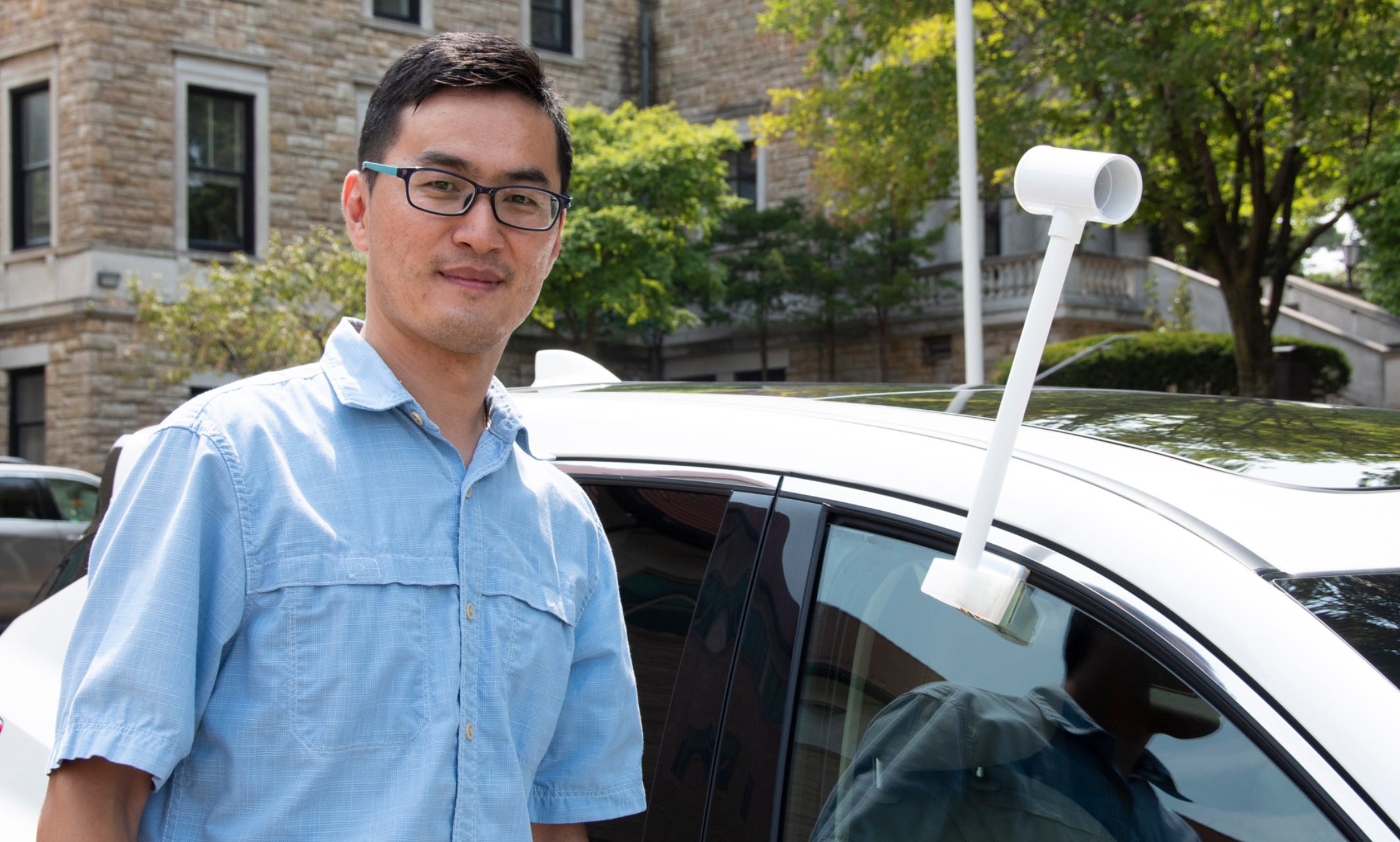
Volunteers from across the metro helped collect data for a national research project
Dozens of volunteers took their marks across Kansas City on a hot, August day. Their mission: Take an hour-long drive to find out more about how heat is distributed throughout the city.
Kansas City is one of about a dozen cities taking part in a nationwide research project funded by the National Oceanic and Atmospheric Administration. The goal is to create a map indicating where there are pockets of land that are warmer than surrounding areas. Researchers call these areas urban heat islands.
UMKC Earth and Environmental Sciences professor Fengpeng Sun, Ph.D. is leading the Kansas City cohort of the experiment. He said while most people are familiar with how greenhouse gas emissions contribute to global warming, they should also be aware of how land use and land cover change has impacted temperatures.
“You think about the Kansas City area compared to 30 years ago. We have more buildings. We have more concrete and more asphalt, we have less trees, less soil,” said Sun. “We want to utilize this project to showcase how the temperature has been distributed across our community.”
For the study, volunteers mount a sensor on their cars, which records the air temperature, air humidity and GPS location every second. Then they drive an 80-square-mile loop mapped out in advance. After that, the data is sent back to NOAA, which combines it with satellite data to produce a map that shows where the heat islands are located.
The volunteers included UMKC students and faculty, community members and employees of UMKC community partners and the city of Kansas City.
Amanda Mercier is an environmental science major. After volunteering for environmental projects around the world for several years, she decided to pursue a degree with hopes to make a larger impact. She said she was eager for a chance to work with Sun and to contribute to research.
“As soon as they were letting people back on campus, I think I was one of the first people to sign up for this,” said Mercier.
NOAA is expected to return the data in about two or three months. After that, Sun said the research his team collected can be used in a variety of ways to help mitigate the issue of heat islands in Kansas City, from comparing his data to social impact data to helping inform city government decisions.
“They are the policy makers. Hopefully my voice, the results that we get, can be heard by them,” said Sun. “It’s very important for them to develop some kind of adaptation strategy and also mitigation strategy. Make sure that your city, that your area is going to be sustainable and, most importantly, it’s going to be resilient enough in a warming world.”
It could also help project partner and local non-profit Bridging the Gap with its Master Urban Forest Plan that the city adopted in 2020.
“We will eventually be able to see, through this data, where we might want to concentrate more of our tree planting efforts,” said Kristin Riott, the non-profit’s executive director.
Most importantly, Sun said, he wants the community to be engaged and to see the results. It is why he invited community volunteers to help collect the data. He even arranged the routes to go by recognizable Kansas City landmarks so that once the results from the research were published, they would be more relatable to the public.
“It can give people more of an impression about the data,” said Sun. “Climate change is not something really far away from us. It’s happening. It’s happening in our neighborhood. And we know that we are experiencing more and more heat days, and this is exactly what we want to convey to people. It can happen anywhere. The impact could be different, but it can happen everywhere.”
The data collection led by Sun came just days before the United Nations released an urgent report warning that climate change is widespread, rapid and intensifying; and exactly a week before NOAA announced new data showing July 2021 as the hottest month ever recorded on earth.
“We all need to do this together, we’re running out of time,” said Mercier.
Aug 16, 2021
Fengpeng Sun's research is the focus of media coverage
The project in this article is coordinated by Fengpeng Sun, a climate scientist and assistant professor at the University of Missouri-Kansas City. The project gathered tens of thousands of data points in one day. The Kansas City effort is part of a larger nationwide campaign to map urban pockets where temperatures can be nearly 10 degrees higher than outlying areas.
Hunting for Hot Spots in Kansas City’s Climate - Flatland
City Dwellers Swelter In Heat Islands as High Temps Hit Neighborhoods Unequally - National Catholic Reporter
Kansas City Suffers from Severe Urban Heat. Research Now Underway Might Help Leaders Address It. - Kansas Reflector
Aug 13, 2021
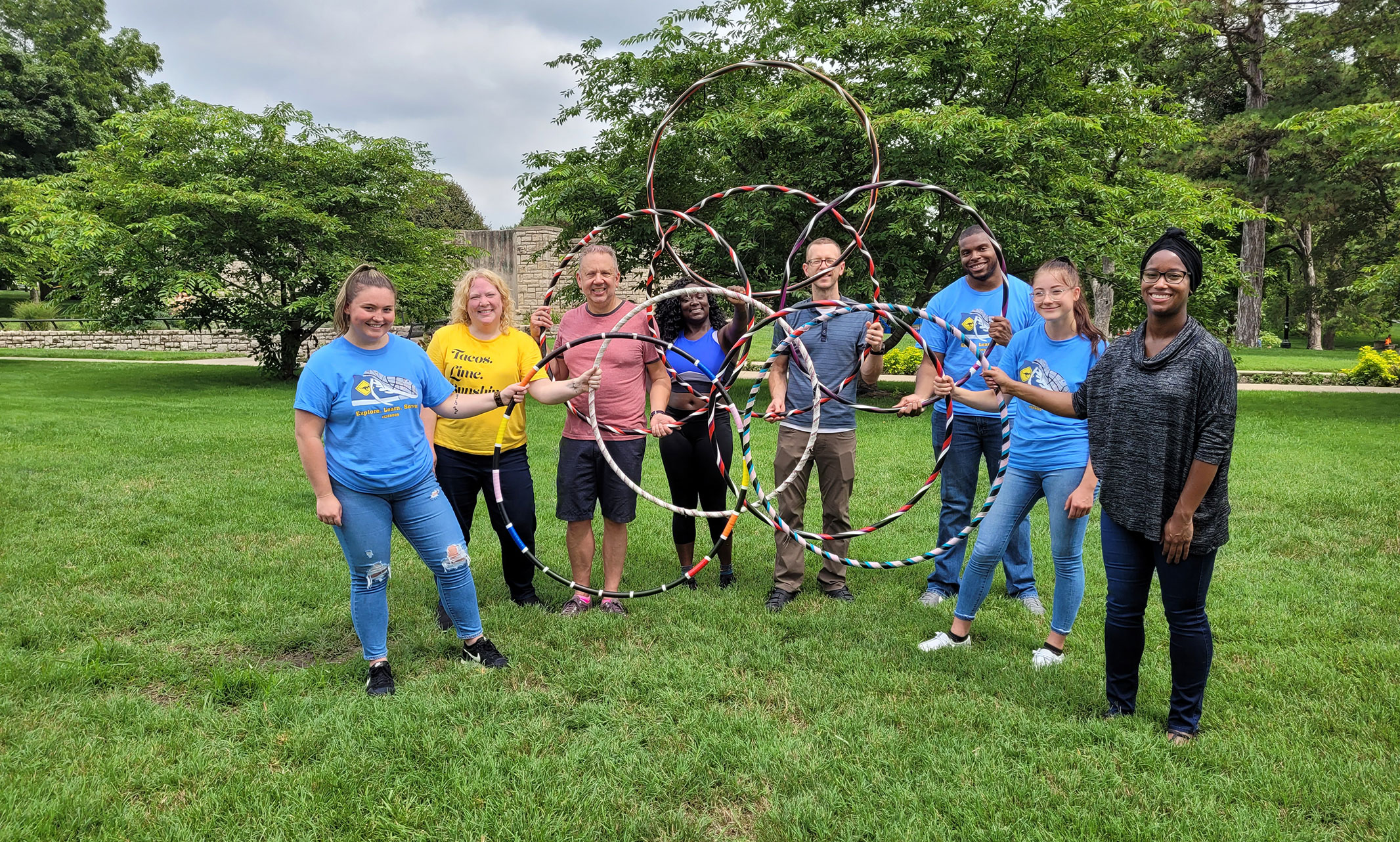
Students work with community in new field exploration course
Field experience in the community in your chosen profession is a hallmark of a UMKC education. Thus summer, criminal justice and criminology students worked in a wide range of outreach programs connected to the justice system.
Each week brought them to a different community service in the Kansas City area, including law enforcement outreach, addiction recovery and underserved youth, where they could see first-hand how their careers could make an impact. This unique field exploration course was spearheaded by professor and internship coordinator Misty Campbell.
“I wanted to provide an opportunity for students to see what everyday tasks are for those working within the justice system and the various roles one can play within different positions,” Campbell said. “Students were able to engage with a fundraising event, community policing, data collection, strategic planning, observe a facilitated training on trauma and learn about the core tenants of a multi-service agency. My goal was to provide a deeper exploration of careers and professional tasks associated within the diversity of justice-oriented professions.”
Psychology, criminal justice and honors program student Leah Maass completed the course with a better idea on where she wanted her career to go.
“I knew I wanted to work as a paralegal but after spending time at each site, I realized I could also explore a different route while still working with legislation,” Maass said. “This class was an amazing opportunity to immerse myself in the community.”
Leah Maass (second from left) and Jahvon Parker (fourth from left) with their classmates on site at Synergy
Criminal justice student Jahvon Parker is ready to graduate at the end of this next semester. The course hasn’t altered his career plans, but he had other reasons to participate.
“I knew Misty was a great teacher, so I had to enroll,” Parker said. “I learned a lot of valuable lessons that will benefit me throughout my entire life. It was so real and humbling.”
The course served as a true win-win situation: students got first-hand experiences to serve them in their lives and careers and community members benefitted from the students’ work as well.
“My hope is that our course showcased to our community partners the various levels of engagement and support our students, and the department, can provide them,” Campbell said. “I also wanted to encourage students to think about how they can support agencies with volunteer and internship roles they’ve not considered before. Our partners are doing phenomenal work, and I want them to feel the tremendous value and respect we hold for them. Part of that, to me, is about showing up and asking how we can serve with them.”
Learn more about the criminal justice and criminology department, and the courses they offer, on their website.
Aug 12, 2021
Novak tells Toriano Porter that Kansas City is on pace to ‘be one of the deadliest’
Toriano Porter, Kansas City Star reporter, talked to Ken Novak, a professor of criminal justice and criminology at UMKC, for this column. Read the full article. (subscription required)
Aug 12, 2021
Associate Professor Jacob Wagner weighs in
Mobile home parks are difficult to find in Kansas City. University of Missouri-Kansas City Associate Professor Jacob Wagner says mobile home parks make up just around 1% of living spaces in the city. Wagner, who teaches Urban Planning and Design, says that mobile homeowners stand to lose a lot in this deal. Read more from KCUR.
Aug 12, 2021
The Independent covers upcoming music composition contest
UMKC Conservatory doctoral student Yunfei Li is among the six Kansas City performing artists selected this summer as winners of the Charlotte Street Foundation’s first annual New Music Composition Competition. Each will produce a brand-new work to be performed by the locally-based Ensemble Mother Russia Industries at a concert on Oct. 2. Tim Harte, the first UMKC Conservatory student admitted with the computer as his “instrument,” formed Ensemble Mother Russia Industries in 2008 as a non-traditional performance ensemble. The Foundation chose Harte to spearhead the process and the performance. Read more.
Aug 12, 2021
Mahreen Ansari explains why College Democrats of Missouri cut ties with College Democrats of America
Mahreen Ansari, University of Missouri-Kansas City student and president of the UMKC College Democrats, was interviewed. She also served as communications director of the College Democrats of Missouri. Read more.
Aug 11, 2021
Chronicle of Higher Education interviews UMKC Honors student Nikita Joshi
UMKC Honors student Nikita Joshi received the 2021 Frederick Douglass Global Fellowship, a competitive award for a diverse group of student leaders to attend a four-week summer study abroad program focused on leadership, intercultural communication and social justice. She was part of the group of students at Queen’s University Belfast who were interviewed for this story. Read the full article.
Aug 11, 2021
The Kansas City Beacon interviews Ken Novak
Ken Novak, a professor of criminal justice and criminology at the University of Missouri-Kansas City, said investigations will likely pick up speed under the Biden administration. Read the full article.
KCUR picked this story up on Aug. 18.
Aug 11, 2021
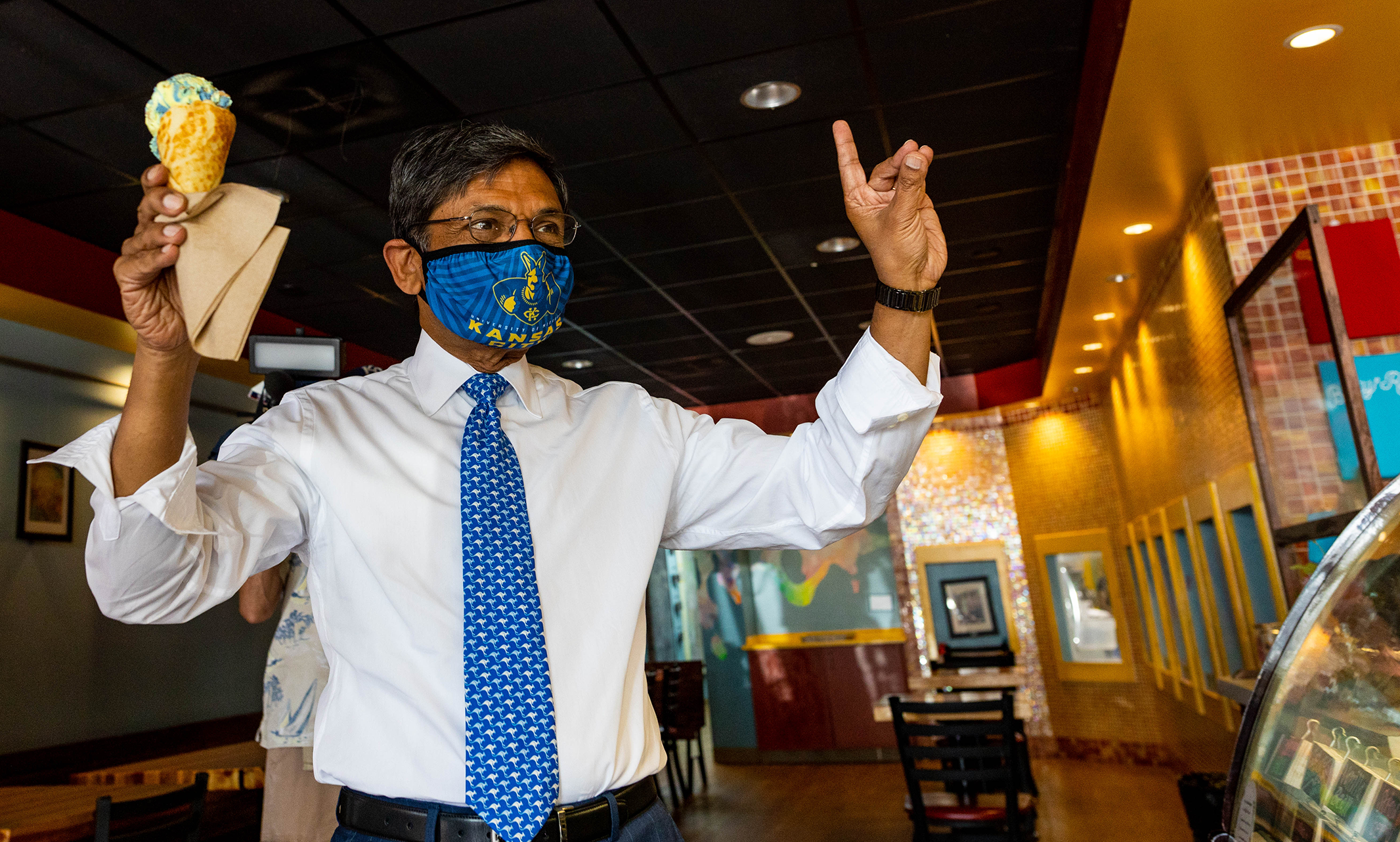
Shop’s new sensation is Roo Blue!
A partnership with a favorite local business is proving a sweet success.
Betty Rae’s, a local ice cream shop, has created a UMKC-inspired flavor dubbed the Roo Blue Swirl. The shop’s owner, Alec Rodgers, graduated from the Henry W. Bloch School of Management in 2020.
Rodgers himself placed the brand new sign in the ice cream case.
“Less than two years after graduation, I’m already a small business owner. That’s the kind of impact UMKC has and what Roo Blue Swirl really represents,” Rodgers said “We’re honored to be partnering with UMKC to create something for the university community, making their campus experience even more enjoyable.”
“UMKC’s continued involvement with small businesses and the overall community in Kansas City encourages students and alumni to engage with local businesses in effective partnerships.”
The Roo Blue Swirl is blueberry and lemon ice cream with crumble cookie mixed in.
Elora Thomas, director of admissions at UMKC, was thinking of a sweet treat she could offer new students when inspiration struck.
“I love Betty Rae’s ice cream!” Thomas said. “So, when I saw that Alec, the owner, was a UMKC alum, it made me even more excited to support this local business. I reached out to Alec and suggested the idea of a UMKC-themed flavor. He also saw the potential, not only with incoming and current students, but with staff, faculty and alumni as well. UMKC is such a community gem, and this is a great opportunity to reveal that while also giving back to Kansas City.”
Rodgers gives Chancellor Agrawal the first scoop of Roo Blue Swirl.
Of course, the most important question is what flavor would do this great university justice?
“The Roo Blue Swirl combines lemon and blueberry with a buttery crumble throughout.” Rodgers shares. “The flavor is delicious and embodies the great colors of UMKC.”
Aug 11, 2021
Students, employees can win free parking, $500 gift cards
UMKC is now offering a series of prize drawings as an incentive for students, faculty and staff to become vaccinated against COVID-19.
Prizes include free annual parking passes and $500 Visa gift cards. Separate drawings will be conducted for students and employees. To be eligible for the drawings, students and employees must upload an image of their vaccination card to a UMKC database.
Students can upload their images by signing in to Pathway. Employees should use the vaccine uploader link available through MyHR. Even if you have previously uploaded vaccination information elsewhere, you must use these links to be eligible for the drawings.
Two student drawings and two employee drawings have been scheduled. Each of the four drawings will offer 10 free annual parking passes and 10 $500 Visa gift cards.
The first student and employee drawings will take place Sept. 1, and the second pair of drawings on Oct. 15. To be eligible for the first drawing, you must upload your vaccination card before Sept. 1. Those who upload vaccination cards between Sept. 1 and Oct. 15 will be eligible for the second drawing.
Aug 10, 2021
Faculty, staff, volunteers and students included
The University of Missouri-Kansas City is now requiring COVID-19 vaccination for all faculty, staff and students who work in clinical settings and have direct contact with patients as part of their UMKC work or training. Students and employees must meet the requirement by Oct. 1, according to a campus letter sent August 10. UMKC students, faculty and staff play a significant role in providing healthcare to greater Kansas City and the state of Missouri. The requirement affects faculty, staff, volunteers and students of the schools of Dentistry, Medicine, Pharmacy and Nursing and Health Studies. In addition, the requirement applies to faculty and students in masters and doctoral training programs in Psychology, Counseling, Counseling Psychology and the School of Social Work engaged in external field education and clinical practica or clinical intervention studies. UMKC faculty, staff, volunteers, and students with patient contact at the University Health Center, UMKC Counseling Center and the Community Counseling and Assessment Clinics are also subject to the requirement.
UMKC officials said the vaccination requirement is necessary because COVID has entered a new phase, citing Centers for Disease Control and Prevention advisories that the Delta variant spreads more easily and quickly than other variants, driving higher infection and death rates and putting significant strain on healthcare resources. The university is offering students and employees the opportunity to apply for medical or religious exemptions to the requirement. For all other UMKC students, employees and visitors, masks will continue to be required in classrooms, laboratories, libraries, meeting rooms and other public indoor settings regardless of vaccination status. Individuals who have not been vaccinated against COVID-19 will continue to be required to wear masks at all times while on campus, indoors or outdoors.
Aug 10, 2021
You might be safe if you have the right skills, according to new Bloch School research.
Will a robot be replacing you at your job? It will depend on what skills you have, according to Bryan Hong, professor of entrepreneurship and management at the UMKC Henry W. Bloch School of Management.
According to new research conducted by Hong and his coauthors, adding robots to an enterprise increases demand for jobs requiring a bachelor's degree or higher, as well as jobs requiring no postsecondary education. But those with a vocational education or a community college education, as well as managerial roles, weren't so lucky.
This conclusion was reached after studying five years of data on businesses in the Canadian economy. Their research is among the first of its kind to show how robots are changing employment, the structure of organizations and other aspects of the workplace.
"A lot of people are already getting the sense that this is a new trend, and our data shows that investments in robotics are really taking off," Hong said. "This is a trend that's only going to continue."
Hong breaks down the research for us on what it means and how it will affect the future of employment.
The main question is, are robots taking our jobs?
That's a tough question to answer with a simple 'yes' or 'no.' It's complicated. What we found is there are very different answers depending on who you are inside the company when the robots come in. If you are someone with a bachelor's degree or above, which is one measure of workers with relatively high skills, we see an increase in the number of employees. There's also an increase in what we might call "unskilled" employees or those who have no postsecondary education, doing roles that require very little training. But if you are in a class of jobs that require a vocational degree, like tradespeople who have gone to a two-year college or gotten a certificate, these jobs are being eliminated by the robots. We also see a significant decline in managers.
Let's start with the groups that are experiencing increases in employment. Why is there an increase in the group with college degrees and "unskilled workers"?
When you buy robots, you need people who have the skills to work with them. For example, robots may have to programmed or you might need to do a lot more design work if robots are producing many different types of products than the factory used to produce. That requires people with the skills to do those things. The increase in unskilled workers is a different story. It turns out that robots aren't good at doing all physical labor tasks — the technology has its limitations. So for these types of tasks, such as loading trucks with inventory, humans are still needed because the robots can't do them well. But these aren't jobs that require a lot of education or training and are also not likely to pay high wages.
Why are workers with a community college or vocational education being negatively impacted?
The type of work robots are capable of is often what humans with vocational degrees do. For example, it could be welding a passenger door onto the body of a car. Now imagine a robotic arm that will repeatedly do that task, over and over again. That robot can do that same task flawlessly thousands of times a day. Robots can do that, and they don't get tired. They also don't unionize and don't raise the same safety issues that using humans might. So, you can see why a company would look at that and think it's compelling.
If I am one of those workers, should I be nervous about these findings?
Yes, it's a cause for concern. The issue is that robots increasingly do what these workers can do, and in many cases, do it better. This is also part of a larger story many people have already heard, but not about robots specifically. Many people who lose these jobs are unlikely to move on to higher-paying jobs so often the best-case scenario is that their wages will decline if they are able to find a new job. This raises a much broader set of questions about the increasing inequality we see in our society, and robots may at least be partly responsible for it.
What's going on with managers?
As of today, robots don't manage people. So we think the reason we see fewer managers speaks to the question of 'what do managers really do.' When we think of managers in companies, we usually think of someone who supervises workers every day. They keep an eye on things and make sure that employees are getting the work done. If you imagine a manager on a factory floor, maybe they also deal with whatever problems come up each day. Now, if we replace over half of the employees with robots on an assembly line, do you need as many managers to make sure that people are doing their jobs? Probably not. But it's also not this simple. One could imagine that the increase in jobs requiring at least a bachelor's degree and unskilled jobs would require more managers to oversee them, but it's clear that even if that is true, the total need for managers still decreases. That might suggest that managing each type of worker requires a different type of management. But that's something that needs more research for us to understand better.
What does this mean for the future of some of these jobs?
Companies invest in technology because it improves their profitability. If it is more profitable to use robots instead of humans for certain tasks, companies will ultimately move in that direction. If we look at the results of our story, it's clear there are some types of workers who will be negatively affected. We need to think about how to address that as a society.
Aug 10, 2021
Flatland interviews UMKC History professor
“Missouri was born in the midst of controversy about slavery and its extension into the West,” said Diane Mutti Burke, a professor of History at the University of Missouri-Kansas City, who served as a consultant on, “Struggle for Statehood,” a traveling exhibit that is scheduled to be installed in Lee’s Summit in September. Read the full article.
Mutti Burke was also interviewed by KCUR about Missouri's Bicentennial.
Aug 10, 2021
Kansas City Star highlights UMKC Innovation Center’s entrepreneur hotline
From April to October, the University of Missouri-Kansas City Innovation Center’s entrepreneur hotline had a 176% increase in calls asking for assistance, according to the UMKC Innovation Center Impact Report. Of those calls, the center reported a 367% increase in the number of people who reported starting a business. Read the full article. (subscription required)
Aug 10, 2021
Energy News Network features Fengpeng Sun's research
A coalition of partners led by University of Missouri-Kansas City researcher Fengpeng Sun gathered the measurements and will now create a map combining tens of thousands of temperature and humidity measurements with a satellite map, allowing them to quickly learn the conditions in a given location. Read the full article.
Aug 09, 2021
The university will work hand-in-hand will Auburn University, as well as other colleges across the country, to research ways to increase STEM degre...
The University of Missouri-Kansas City will backbone a $10 million research effort from the National Science Foundation, or NSF, to promote science, technology, engineering and mathematics, or STEM, education among students with disabilities.
Auburn University will lead the five-year project while UMKC will "backbone," or guide vision, strategy, support aligned activities, establish shared measurement practices and support the implementation of research, according to the NSF.
As the backbone, UMKC will host the portal and website for the project, as well as lead data collection.
Alexis Petri, Ed.D., senior director of faculty support at UMKC, said she has already begun working with Overtoun Jenda, Ph.D., whose office at Auburn will be chairing the initiative, to delineate what aspects of the project will be led by UMKC and which by Auburn.
The project's funding will be used to conduct research related to enhancing workforce development opportunities for people with disabilities.
Students involved in the research will receive benefits including peer and faculty mentoring, research opportunities and financial support to track which efforts work best to increase the number of students with disabilities entering college and completing a degree in a STEM-related field.
Overall, the research project will target three objectives, two focused on students and the other on institutions:
Increase the number of students with disabilities completing degrees in STEM.
Facilitate the transition of students with disabilities from degree completion into the STEM workforce.
Enhance communication among institutions of higher education, industry, government and local communities.
The project will encompass 27 universities, with five "hub-leading institutions." Those institutions include UMKC (Midwest Hub), Northern Arizona University (Mountain Hub), Ohio State University (Northeastern Hub), the University of Hawaii-Manoa (Islands Hub) and the University of Washington (West Coast Hub).
The Midwest Hub will initially consist of the University of Wisconsin-Milwaukee, Little Priest Tribal College and Wichita State. At least five other colleges and universities are slated to be added within the next year, Petri said.
In addition to being the backbone of the organization, UMKC will also undertake a research project with the help of $2.4 million of the grant, which will be distributed over the course of the next five years.
UMKC's research will look at student success across critical junctures such as access, entry, progress, completion and transition.
"The idea is to help students have momentum moving across critical junctures like from graduation to employment. Those are times when students are likely to face challenges or barriers to their goals," Petri said. "Knowledge gleaned from the study will be available to (other research institutions) for mid-course adjustments and ultimately to discover how well-known interventions like mentoring, applied in combination with other success programs, lead to innovations that improve degree completion for students with disabilities STEM majors."
Research chairs at UMKC will include Jacob Marszalek, Ph.D., professor and Director of Applied Cognitive Brain and Brain Science, Yugyung Lee, Ph.D., professor of computer science, Fengpeng Sun, Ph.D., professor and climate scientist, and Ye Wang, Ph.D., communications professor.
The grant began on Aug. 1 and will last until July 31, 2026. Research is tentatively scheduled to begin in 2022.
The award is part of the NSF INCLUDES initiative which invests in programs that address diversity, inclusion and participation challenges in STEM at a national scale. The initiative is one of five INCLUDES awards given by the NSF this year.
Aug 06, 2021
Dos Mundos highlights UMKC Institute for Urban Education
A program at the University of Missouri-Kansas City School of Education is working to increase the number of diverse and “exemplary” teachers in urban schools across the Kansas City area. Called the Institute for Urban Education, the cohort model program prepares students to teach in Kansas City urban schools. Read the full article.
Aug 05, 2021
Jacqueline Rifkin explains the ordinary in the extraordinary
Have you ever wondered why you have so many notebooks you’ve never used? Or candles you’ve never lit? Or clothes that you don’t wear? And you can’t seem to part with any of these items?
This phenomenon is known as clutter, an overabundance of possessions. Jacqueline Rifkin, assistant professor at the Henry W. Bloch School of Management, asked herself how this accumulation begins in the first place.
“I had a t-shirt that I had bought at a standard retail chain,” Rifkin said. “But in my mind I would wear it on a date night. I would wear it on a job interview. I would wear it to a rehearsal dinner. It was an ordinary t-shirt, but it became this thing that I needed to protect for the perfect occasion—just because I hadn’t worn it previously. I talked to different people, and this resonated with them, too. They said ‘I have a bottle of wine from Trader Joe's, but I've just never opened it. It's been years,’ or ‘I have this cologne that I got for free as an add-on with another purchase, but I haven't touched it because nothing seems special enough.’”
Rifkin had this same conversation with her co-author, Jonah Berger of the University of Pennsylvania, and they decided to get to the bottom of why we avoid using ordinary things, treating them as if they are too special to use. Through the six studies, the two found that forgoing using an item makes it seem more special, particularly when someone believes that they were waiting for a later occasion. As the item starts to feel more special, we want to use it less. As time goes on without the item being used, specialness increases further, which leads to even less usage—which Rifkin calls a “specialness spiral.” The item becomes less likely to be used in ordinary occasions, and more likely to be saved for a narrower set of extraordinary occasions.
While that may seem harmless, Rifkin shares how holding onto these items and generating clutter can become a maladaptive behavior.
“There's been plenty of research suggesting that clutter can be bad for our well-being,” Rifkin said. “It can mess with our ability to get work done. It can mess with our social relationships, and that can cause chronic stress. When it comes to that bottle of wine or the t-shirt, that special situation you are waiting for may never come. Worst case scenario is saving that bottle of wine for so long, it turns into vinegar, or saving the shirt for so long, it goes out of style. You don't even get to enjoy it.”
Fortunately, there is a way out. Rifkin suggests the easiest is this: use your stuff.
“One thing that we talked about is pre-committing to usage occasions,” Rifkin said. “If I buy a nice t-shirt, I’ll tell myself ‘I'm going to wear it this weekend.’ Setting a specific occasion or a ‘first possible occasion’ kind of commitment can break the specialness spiral. Hopefully, we’re harnessing the knowledge that can help us avoid clutter accumulation, avoid wasting time and money on possessions, and allow ourselves to actually use these things. Wearing that shirt after a few iterations of deciding not to can feel really good.”
Learn more about Rifkin’s findings on how clutter accumulates by reading her article in the Journal of the Association for Consumer Research.
Aug 04, 2021
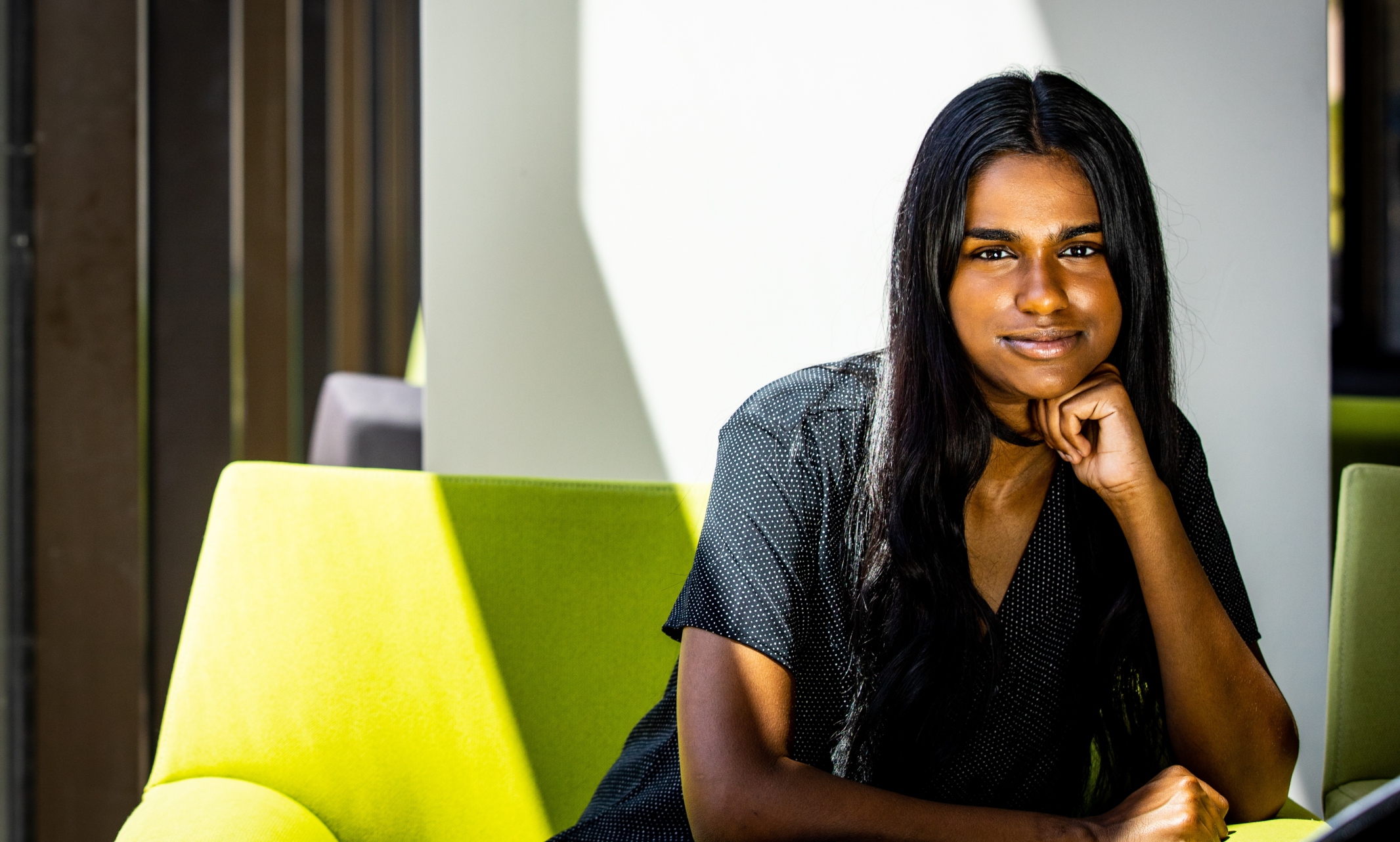
Krithika Selvarajoo takes challenges in stride
Our ongoing story starts with people from around the world, converging here at UMKC. Get to know our people and you’ll know what UMKC is all about.
Krithika Selvarajoo (Krit)Anticipated graduation year: 2021UMKC degree program: B.A. in English and Chemistry; Honors ProgramHometown: Singapore
Why did you choose UMKC?
Coming from a city, I knew I wanted a college experience where I would be able to explore a new city during my down time. I thought Kansas City was the perfect place for me to have that experience and smoothly transition to college. Also, I loved the diversity that UMKC offers and knew it would provide me with endless opportunities to meet new people.
Why did you choose your field of study?
I've always been passionate about both the arts and sciences, which led me to pursue degrees in English and chemistry. Instead of being dichotomies, I knew the fields of English and chemistry would complement, if not overlap, each other and provide me with an education that would help me continue to develop into a well-rounded individual.
What are the benefits of the program?
Both degrees have allowed me to explore the intersection between science and literature while developing skills that pertain to both of those fields. For example, I've learned the importance of paying close attention to details with both lab data and literary prose.
How has your college program inspired you?
I've been inspired to pave my own path for my future self. I was initially hesitant on majoring in two subjects. But after my first semester as a double major student, I realized I have never been happier. From that moment, I knew the importance of paving my own path. Everyone's journey is different in their own way.
Since entering college, what have you learned about yourself?
I've learned that stepping out of your comfort zone is important to grow as an individual. During my sophomore year, none of the student organizations at the time caught my interest. Rather than not being involved, I decided to start a Her Campus chapter here at UMKC. It was out of my comfort zone, especially since I had to build an organization from the ground up and go through various interviews and edit tests with Her Campus Media, but I am glad I took a leap of faith.
Creating a community that empowers women on campus while providing them an outlet to express their voices has been such a fulfilling experience. It allows me to not only grow as a leader, but as an individual as well.
"My experience at UMKC significantly improved when I started to put myself out there and meet new people." — Krit Selvarajoo
Are you a first-generation college student? If so, what does that mean to you?
Yes, it is something I am proud of. Being the first one in my family to attend college comes with its own challenges. It can be isolating not having someone in my family to talk to about these challenges, but that's what friends are for!
Who/What do you admire most at UMKC and why?
I love the diversity that UMKC offers. Different experiences and backgrounds add so much more life to campus, and I feel like I always end up learning something new when I meet someone.
Do you have any scholarships? What do they mean to you?
Yes, I was nominated by the English Department to receive the Chancellor's Non-Resident Award, which covers a portion of my tuition. Receiving this award motivated me to do better and make not just myself proud, but the English Department proud as well.
This summer, I also received the Summer Undergraduate Research Opportunity (SUROP) Award, and I received a tuition award and funding for the research I currently conduct with Dr. [Mohammad] Rafiee. The SUROP grant allowed me to gain immense research experience, particularly related to electrochemistry, and I know that the skills I've learned will be useful in the future.
What other extracurricular activities are you involved in at UMKC?
As campus correspondent for Her Campus at UMKC, I get to oversee the chapter and write and edit articles. This has provided me a creative outlet during stressful semesters.
I contribute to bi-weekly newsletters for Students for Justice, where I serve as the current events chair. I was Press Secretary for the Student Government Association which significantly enhanced my college experience.
"Both my degrees have allowed me to explore the intersection between science and literature while developing skills pertaining to both of those fields."
Creating content such as what classes to take at UMKC to educate oneself on BIPOC culture has taught me the importance of social advocacy. Writing various student newsletters, some with campus updates, has deepened my love for UMKC and the opportunities it offers to all students.
I have worked at the Writing Studio as a consultant for over two years, which has allowed me to meet a diverse group of students. Since writing consists of elements of vulnerability, I ensure that I create a safe space for writers by establishing connections with them. Establishing relationships with students as I watch them grow as writers and individuals has been the most fulfilling part of the job.
What do you hope to take from your experiences at UMKC into your professional career?
The importance of establishing relationships and connecting with new people.
My experience at UMKC significantly improved when I started to put myself out there and meet new people. There's always something to learn about each person you meet. I hope my professional career provides me with the platform to build relationships with others.
Aug 04, 2021
Local, national media celebrate Courtney Frerichs
Courtney Frerichs, UMKC alumna, won silver in the Olympic women’s 3,000-meter steeplechase final Wednesday at the Japan National Stadium in Tokyo, finishing in a season-best 9 minutes, 4.79 seconds to become just the second American woman to finish on the podium in the event at the Games. This story was covered by The Kansas City, Star (subscription required), KMBC, KSHB, KCUR and Fox4KC.
More headlines:
Why Olympic Silver Medalist Courtney Frerichs Felt She Won Even Before Starting Race - The Kansas City Star, picked up by Yahoo News.
Aug 04, 2021
UMKC professor's research is featured
Research by a University of Kansas linguist and University of Missouri-Kansas City physicians pointed to the potential medical harm of ambiguous communication in operating rooms that also complicated the training of surgeons. “We make the point in the paper that surgery is too precise to not use precise language,” said Gary Sutkin, a professor at the UMKC School of Medicine. Read more. This story was picked up by The Missouri Independent.
Aug 04, 2021
KCUR reporters receive awards
Reporters from KCUR and across the collaborative Kansas News Service received numerous awards in the 2021 Station Awards for Excellence in Broadcasting, conducted annually by the Kansas Association of Broadcasters. KCUR is a service of the University of Missouri-Kansas City. Read the full article.
Aug 04, 2021
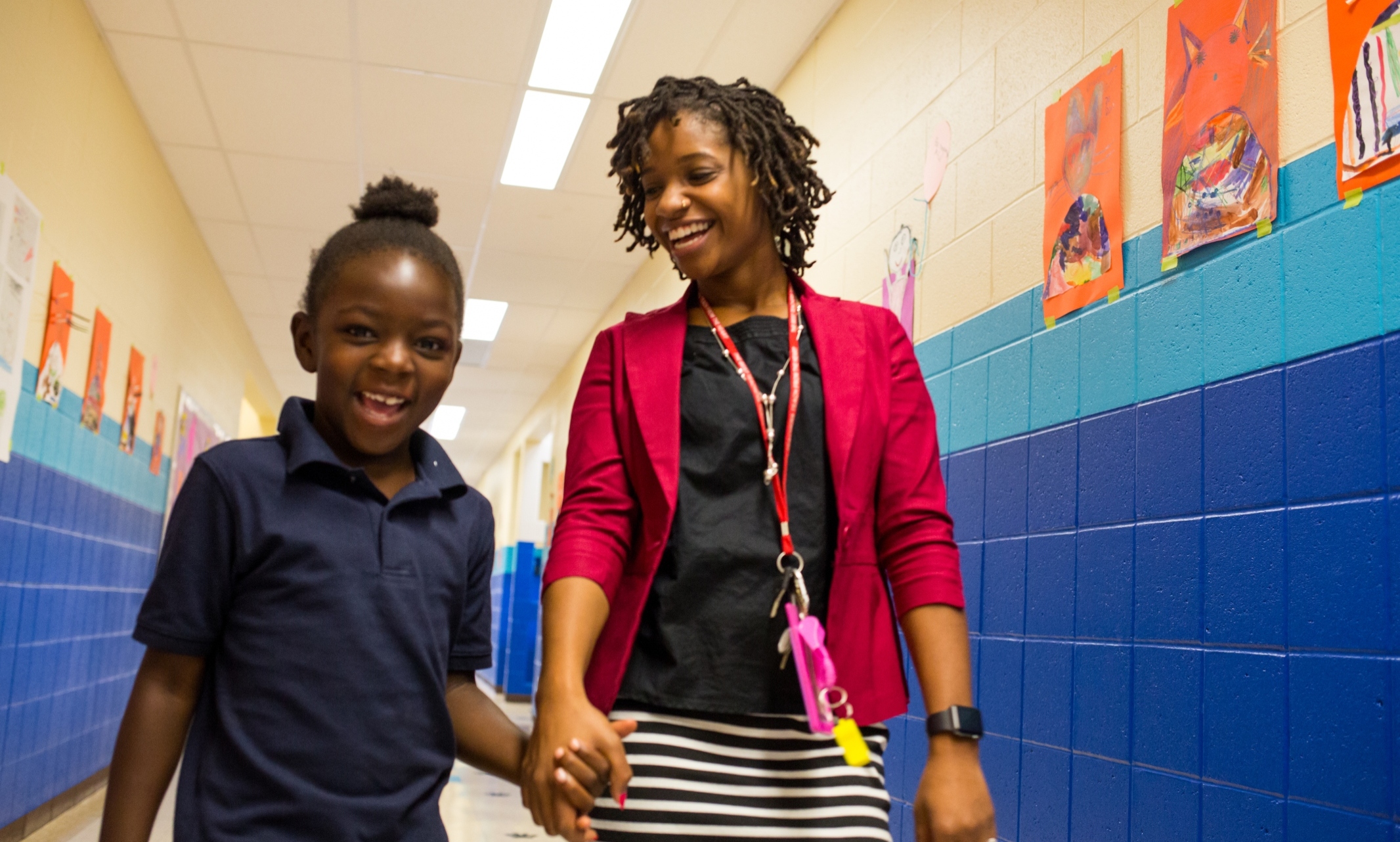
Foundation support accelerates Institute for Urban Education growth, progress
Despite the challenges of the last year, the University of Missouri-Kansas City Institute for Urban Education (IUE) in the School of Education is successfully affecting student success and teacher retention through its programming in urban schools, thanks in part to significant and steady support from major donors.
“We have very high expectations and high levels of support for our students,” Jennifer Waddell, Ph. D., director, Institute for Urban Education and Sprint Foundation Endowed Professor in Urban Education says. “Major gifts from the Sherman Family Foundation and the Sunderland Foundation – who also have high expectations in a very positive way – demonstrate their belief in the program, which is very reaffirming.”
The Sherman Family Foundation has been a longtime, consistent supporter and advocate of IUE. While there are many organizations that work toward advancing education and bolstering opportunity in underserved communities, Joseph Allen, a director at the foundation, says the IUE meets all the criteria for the Sherman Family Foundation board.
“These two donors’ gifts are important because when the boards of the Sherman Family Foundation and the Sunderland Foundation invest in us, it demonstrates a belief in us and the work we are doing.” — Jennifer Waddell
“We have three career educators on our board,” he says. “We know how important classroom teachers are. We are aware of how difficult it is to close the gaps in academic markers and graduation rates for students in the urban core. Hope is often the backbone of philanthropy. The Sherman Foundation board wants to invest in programs that have a certain degree of promise in addition to hope. We want to see that the proposed solution can move the needle.”
Allen says Waddell was instrumental in the Sherman Foundation board making their commitment for support.
“One thing we knew for sure was that IUE had a strong, dedicated leader in Jennifer.”
In addition to program leadership, the long-term research component of the IUE program has been critical to the Sherman Foundation support.
“Sometimes we say ‘no’ to people who do great work,” he says. With each opportunity we ask ourselves, ‘Does the organization or project deliver solid preliminary or proven results?’ We like to be able to see data that supports the programming. The IUE research reflects the program’s success.”
This success was due in part to the newly minted “Grow Your Own” program, which awards scholarships to high school students in urban areas who are interested in returning to teach in their alma maters. For Fall 2021, IUE awarded 42 new scholarships, despite dramatic national declines in teacher preparation over the last ten years, which were accelerated by the COVID-19 pandemic.
In total, more than 60 aspiring teachers will be part of the IUE in 2021-2022, the largest enrollment in the program’s history.
“When we talk to the young people in our ‘Grow Your Own’ program they say they want to be teachers because they want to make a difference,” Waddell says. “Our enrollment is almost double what we thought it would be. We are thrilled to have the Sherman Foundation and the Sunderland Foundation as partners in this success.”
The Sunderland Foundation is a significant UMKC funder, donating more than $15 million for building improvements in the last couple of years. But a change in their guidelines – funding had been restricted to capital expenses - allowed the foundation to support UMKC in different ways.
“Working with IUE gives us the opportunity to support needed scholarships for students from the urban core, who will return to the urban core to teach.” — Kent Sunderland
“Our main mission is still construction,” Kent Sunderland, president of the Sunderland Foundation, says. “But as the makeup of our board of directors shifted – six of the nine board members are now millennials – we began looking for ways to make a bigger impact with social justice initiatives.”
As Sunderland was looking for opportunities to meet the community’s needs, he contacted Leo Morton, former UMKC Chancellor, and Jerry Reece, UMKC Trustee.
“Jerry and Leo are committed to the success of the IUE initiative and outlined the value of the program,” Sunderland says. “Working with the IUE gives us the opportunity to support needed scholarships for students from the urban core, who will return to the urban core to teach. In addition, we were encouraged by the research that supports the program – that students of color in urban schools perform better with teachers of color who understand their environment.”
“These two donors’ gifts are important because when the boards of the Sherman Family Foundation and the Sunderland Foundation invest in us, it demonstrates a belief in us and the work we are doing,” Waddell says. “With these gifts, we hear them ask, ’How can we help make this happen because we believe in your program?’”
Waddell notes that while national enrollment in teacher preparation is down dramatically – and has been declining over the last ten years – the IUE has met their enrollment goals for the year.
“The 2021 class will be the largest in our history,” Waddell says.
“If these graduates stay in their positions, that’s success.” Allen says. “Waddell’s teachers are well-prepared and do stay – 90% of the IUE’s graduates are still in the classroom.”
Carolyn Barber, interim dean, Ewing Marion Kauffman Foundation/Missouri Endowed Faculty Chair and professor, recognizes the significance of the Sherman Family Foundation and the Sunderland Foundation gifts.
“We are excited and honored by both the financial support and philosophical conviction of the Sherman Family Foundation and the Sunderland Foundation,” Barber says. “Both organizations are pillars of Kansas City’s philanthropic community. Having them in our corner is more than a financial win, it reinforces the credibility of the program and allows us to exponentially expand student opportunity.”
Aug 02, 2021

Find your favorites, from macchiatos to mochi donuts
Dining options at both the Health Sciences and Volker campuses include on-campus opportunities and plenty of private businesses close by; new purveyors and new offerings offer fresh options for returnees as well as newbies.
Volker Campus
In the main campus dining hall in the Atterbury Student Success Center on the Volker campus, new executive chef Charles Tibbs will offer an exciting new menu with more diversity and choices daily. The hall serves students on campus meal plans, and is also open to all students, faculty and staff.
Something new this year in the Student Union: a rotating pop-up concept offering new cuisine choices every 45-60 days throughout the academic year. First up at the start of the semester will be Impossible and Bodacious Burgers, offering beef burgers as well as plant-based burgers from Impossible™ that are 100% vegan. Every burger is cooked to order, with the freshest toppings and signature sauces.
Returning to the Student Union are Baja Fresh Express, Chick-fil-A and Jazzman’s Café. Other returning Volker favorites include Starbucks Café in the Atterbury Student Success Center, the Robot Café in Miller Nichols Library and Einstein Bros. Bagels in Royall Hall. The Smart Market on the bottom floor of Oak Hall allows students with meal plans to use a meal swipe for food items once daily up to $12. The store is open to the public and offers a variety of freshly made salads, sandwiches and snacks as well as pre-packaged and microwaveable foods, household items and sundries.
Health Sciences Campus
The Hospital Hill Café, on the main floor of the Health Sciences Building, is open for breakfast and lunch and offers a salad bar, sushi and this year is adding rotating hot menu items.
There is also a Subway shop on Charlotte Street in the Health Sciences parking garage building.
Off-campus, Volker Area
Several longtime Kansas City favorites are within easy reach of the Volker Campus. These include classic Kansas City barbecue from Gates Bar-B-Q, 1325 Emanuel Cleaver II Blvd., a fixture for generations; Andre’s, 5018 Main St., run by a third generation of Swiss-trained chocolate-makers, known for classic European meals and pastries; Go Chicken Go, 5101 Troost, a local favorite for fried chicken; and The Peanut, a classic ultra-casual bar and grill famous for hot wings and BLT sandwiches.
Other options to the east include:
Urban Café KC, 5500 Troost, breakfast, lunch and weekend brunch focused on organic, seasonal, healthy cuisine
Blackhole Bakery, 5531 Troost, classic French pastries and donuts, including brioche cinnamon rolls and Mochi donuts
Fannie’s West African Cuisine, 4105 Troost, unique breakfast items such as rice bread and sardine patties, and classic African lunch and dinner dishes such as Jollof Rice, Fufu, Attieke, Banku and Kenkey
Gaels Public House and Sports, 5424 Troost Ave., a sports bar and pub scheduled for a late August-early September opening and promising a “Northwestern European vibe” combining offerings such as Stout Meatballs and German Bierocks with classic fare such as burgers and pizza.
To the west, 51st Street offers four options long popular among the campus community: Pizza 51, 5060 Oak St., offering giant slices, plus salads and sandwiches; Kin Lin Chinese restaurant, 314 E. 51st St. (try the pickled vegetable entrees); Crow’s Coffee, 304 E. 51st St., offering fresh pastries and breakfast burritos along with classic coffee drinks; and Whole Foods Market, offering self-serve salad and hot food bars.
A few blocks further west lies the South Plaza dining strip along Main Street, extending from 51st Street north to 48th Street. Options along the strip include:
Osteria il Centro, dinner-only Italian restaurant with an extensive wine list
Minsky’s, pizza
eggtc., breakfast and lunch
Blu Hwy, a new restaurant offering creative interpretations of classic American cuisine, was scheduled for a mid-August opening
Mission Taco Joint
Third Street Social, a popular Lee’s Summit restaurant and bar that opened a second location this summer
Planet Sub
Prime Sushi
Spin Neapolitan Pizza
Duck and Roll, Hong Kong-style Cantonese food, specializing in Beijing Duck pancakes
Banksia, Australian Bakehouse and Café, eclectic menu of breakfast, lunch and dinner items including Australian entrée pies and sausage rolls
The Mixx, specializing in unique salads
Chipotle
Nekter Juice Bar, freshly made juice, smoothies and handcrafted acai bowls
Yogurtini, frozen yogurt
Stock Hill, a high-end steakhouse
Off-campus, Health Sciences Area
Options close to campus include one of the city’s most acclaimed fine-dining restaurants, the Antler Room, 2506 Holmes St., offering a rotating menu of small plates influenced by Mediterranean, East Asian and Midwestern traditions.
Right next door is Teocali Mexican Restaurant and Cantina, 2512 Holmes St., a great gathering place with plenty of room indoors and out. Vested Beacon Hill Coffee, 2501 Troost Ave., is known for the 1950s-vintage Airstream camper inside the shop.
Jul 30, 2021
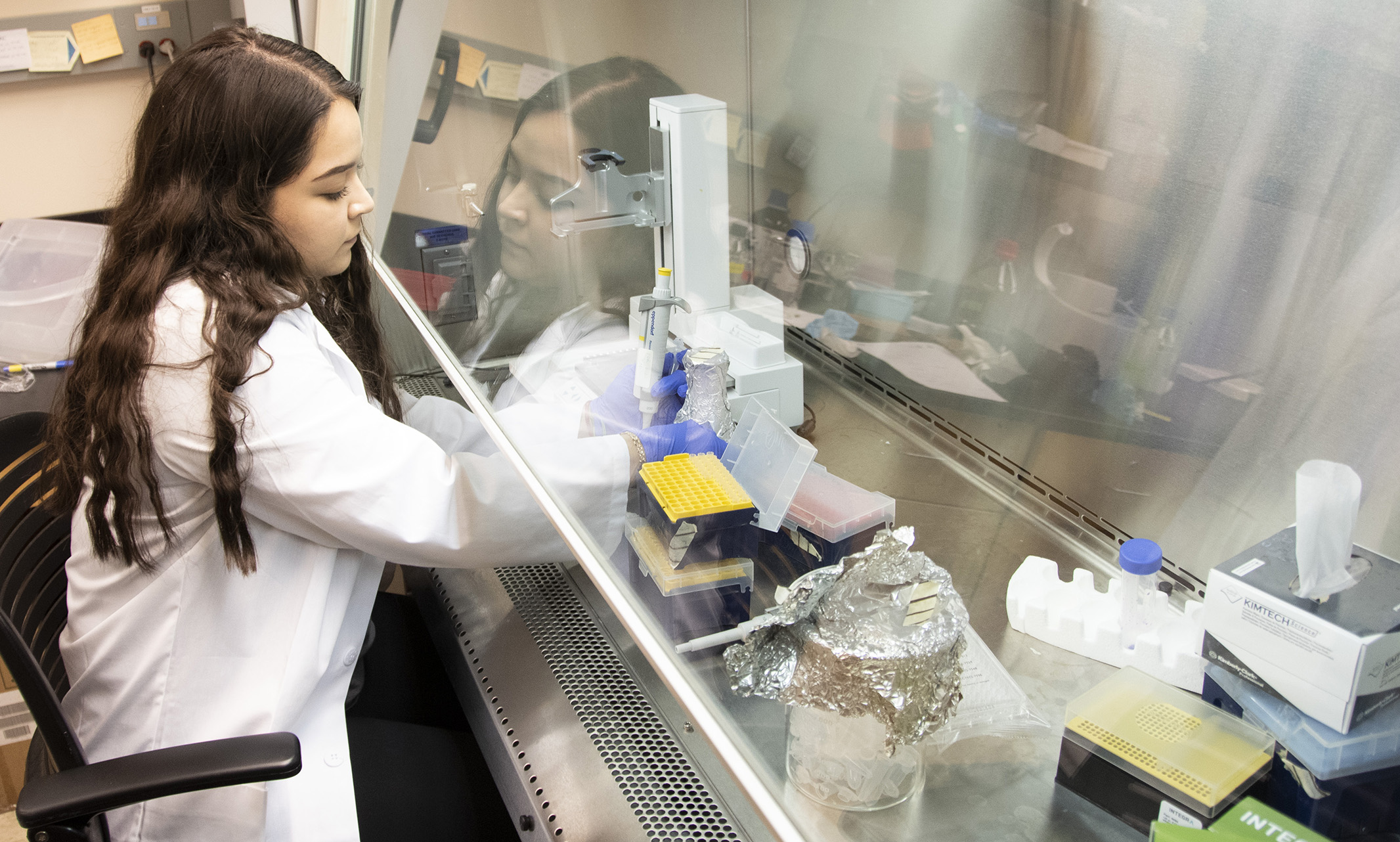
Program introduces students to the role pharmacists play in improving people's health and well-being
Karla Perez stood, bursting with excitement, in one of the UMKC School of Pharmacy’s research laboratories.
“I’m wearing a lab coat at 16, which is not something that typical 16-year-olds get to do,” she said. “I’m getting to work in a lab with experienced people and learn from their experience and their backgrounds.”
Perez is one of four Kansas City area high school students who participated in a new six-week summer research internship program at the School of Pharmacy. The internship is supported by a Walgreens grant the school received to provide programs for the underserved and underrepresented population of greater Kansas City.
Shelly Janasz, director of student affairs, said the ultimate goal of the program is to give the students a basic idea of pharmacy, pharmacy research and drug development, as well as how pharmacists affect people’s health and well-being. The students also learned about the various career paths available to pharmacists, by talking with individuals working in the field. In addition, participants met with current students and staff and learned about the school’s admission requirements.
Guided by graduate faculty members, the students learned to apply hands-on laboratory and research methods and protocols to develop a research project. They presented their findings with a poster presentation at the culmination of the program.
High school students Shun’nya Taylor and Ashley Rodriguez work together in a School of Pharmacy research lab.
“We wound up with a wonderful group of four students,” Janasz said. “They were very enthusiastic.”
Gerald Wyckoff, Ph.D., director of research and graduate studies, said he hopes their experiences will continue to pique their future interests in health professions.
“We’re excited to have such eager students in our labs working on real projects,” he said. “Our hope is that they continue their education in a way that will have an impact, not only on them, but on the health and welfare of folks throughout the region.”
Along with Perez, participants Ashley Rodriguez and Shun’nya Taylor are juniors at Allen Village High School. Participant Dana Assaf is a junior at Ruskin High School. All four were paired with a graduate pharmacy faculty member conducting bench research. The program introduced them to working with tools of the trade such as plate readers, a mass spectrometer and different microscopes. They also learned about working in a liquid handling station, as well as computer-based study and research.
William Guthiel, Ph.D., a research professor studying antibiotics, said the internship gave the students a taste of the many different aspects of research.
“One of the things I want the students to experience is how all the things they’re learning that seem so abstract all work together,” Guthiel said. “This experience shows them how physics ties in with chemistry, how chemistry ties in with biology, how biology ties in with math. All those skills merge with the others and in order to do this kind of research, you really need to have some skills in each of those areas.”
Dana Assaf works on a research presentation during a summer internship at the School of Pharmacy.
Assaf said she had read about cancer cells in her high school biology class, but the program gave her a much deeper understanding of what she was studying.
“Here, I actually worked with the cells and grew the cells in one experiment,” she said. “I had read and heard about using drugs to attack cancer cells but had never seen it before. We made medicine and used the drugs to see the effect they have on cancer. That really stood out because you can take a drug and feel better, but you don’t know what it’s doing to your body. We were actually seeing how it works in your body and what it does.”
Perez said that working in a research lab and getting first-hand experience of pharmacy research were experiences she plans to share with her classmates.
“When you think of pharmacy, you think of Walgreens,” she said. “You think of your typical community pharmacy and this is nothing like that. This is research into why things are what they are and how they are. I think that was the most fun for me.”
Jul 29, 2021
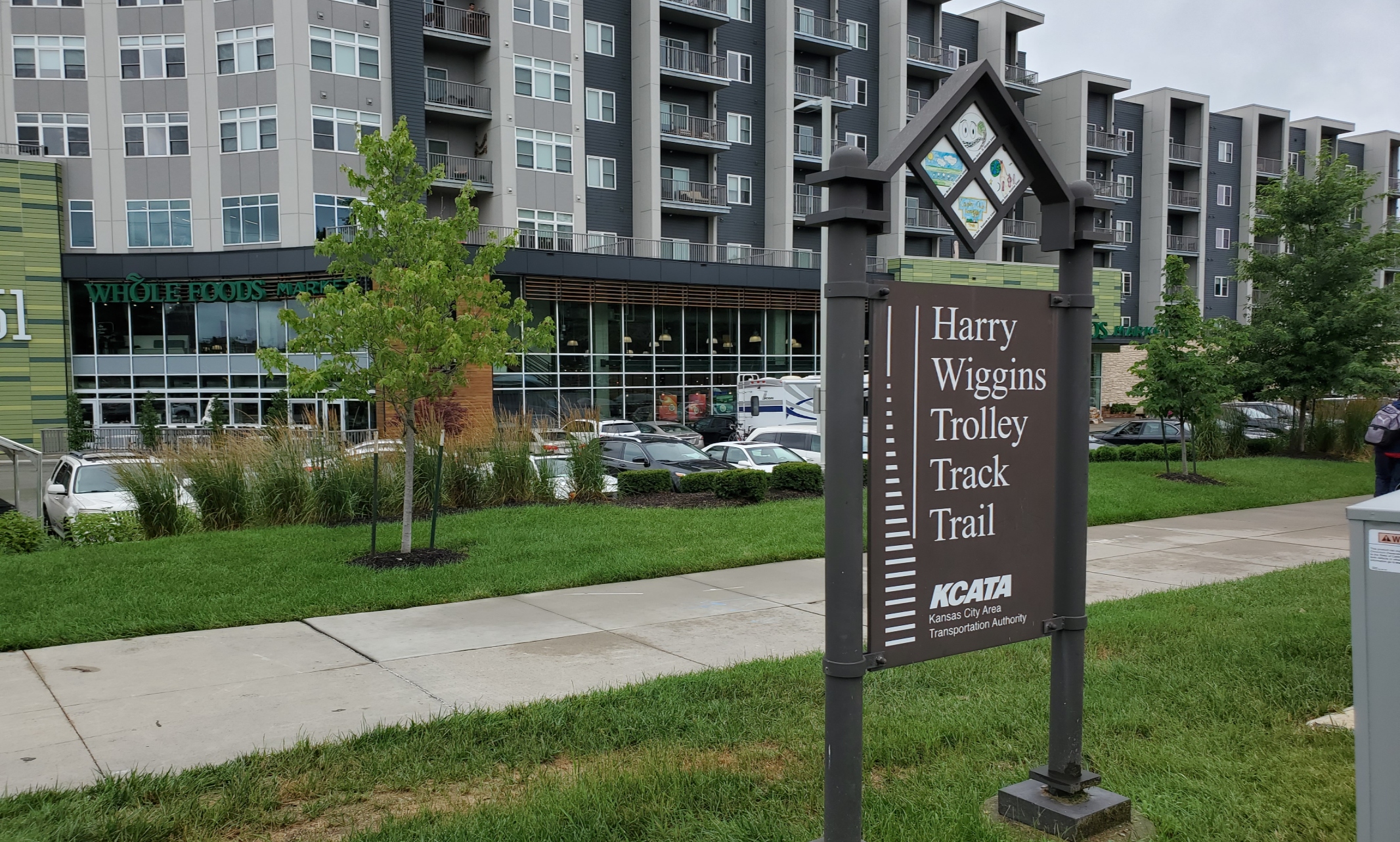
Unique Kansas City experiences just a hop away
The beauty of UMKC is the small town feel in the heart of the big city.
There are a variety of places for Roos to study, relax and play within walking distance of campus.
The Harry Wiggins Trolley Track Trail
This six-mile trail is only one block west of campus. It follows the route of the city’s original streetcar: The County Club line. Some of the tracks are still visible. You can take a stroll or a bike ride just for the exercise or check out the variety of shops and restaurants along the trail. If you need a bike, you can’t go wrong with Revolve KC. They’re close to campus and do a lot of good work in our community.
Jacob L. Loose Park
Further west on 51st street, Loose Park is as historical as it is beautiful. The land was the site of a major Civil War conflict: the Battle of Westport. One and a half of the 75 acres are dedicated to a rose garden, featuring almost 130 varieties.
Ewing and Muriel Kauffman Memorial Garden
This beautiful spot, just across Brush Creek, features bronze statues by local artist Tom Corbin and rotating floral displays. It’s open year-round, so you’re sure to see something new every time you visit. Find a moment of peace on one of their many benches or explore the orangery and say hi to the resident cat.
Art Course Mini Golf
On your way to the Nelson-Atkins Museum, check out the artist-designed mini golf courses located in the Donald J. Hall Sculpture Park. Each course is an interpretation of an art piece on display at the museum. The new course this year, inspired by Radcliffe Bailey’s Mound Magician, was made in honor of the 100th anniversary of Negro League Baseball and the Kansas City Monarchs.
18th and Vine District
Speaking of Negro League Baseball and Kansas City history, you must check out the 18th and Vine district, close to our Health Sciences campus. You can visit the Negro Leagues Baseball Museum, the American Jazz Museum, grab some delicious BBQ, and listen to some wonderful live music all in one trip.
The National Museum of Toys / Miniatures
We’d be remiss not to mention this fun experience on campus! The Toy/Miniature museum hosts the world’s largest collection of fine-scale miniatures and one of the largest collections of historic toys available for public viewing. Admission is free for UMKC students, faculty and staff with your school ID.
These are just a start, so get on out and see what our great city has to offer.
Jul 28, 2021

Students and alumni share their favorites
Whether it’s to study, relax or catch up with friends, students need a good place to hang out.
Fortunately, UMKC has no shortage of good spots. Whether you need quiet, food or awe-inspiring views, these students and alumni can give you the lowdown on their favorite places on campus!
1. Student Union Rooftop
“I like the Student Union. There is a great view of the campus and it's a nice place to relax and people watch between classes.” - Alea Roberts (Health Sciences, ’22)
“The Student Union for studying, food and the rooftop viewing of KC.” - Anna Lillig (Health Sciences, ’19)
2. Student Union Offices
“I spend a lot of time in the Student Union. I either go to our organization space to study or to the Multicultural Student Affairs (MSA) office just to hang out!” - Jonny Gutierrez (History, ’19)
“The Multicultural Student Association office. It’s a fun place to hang out with a diverse group of interesting people.” - Brandon Henderson (Political Science, ’21)
3. School of Dentistry Student Commons
“The UMKC School of Dentistry sign is an iconic spot to take photos with your classmates on milestone days like your first day of school, last day of class or white coat ceremony.” - Molly Petrie (Doctor of Dental Surgery, ’22)
4. Linda Hall Library Grounds
“By the Linda Hall Library. I walk through this area when I’m leaving the Student Union and heading to the quad. I love the big trees and the benches. It’s very peaceful over there, which can be hard to find sometimes.” - Kiarra Brown-Edwards (Communication Studies, ’19)
5. Miller Nichols Library and Learning Center
“I love a good study session on the first floor of the Miller Nichols Library. Easy printing, access to the Robot cafe, relatively quiet and I usually bump into a friend or two!” - Bryce Miller (Master's in Health Professions Education, ’20)
Jul 27, 2021
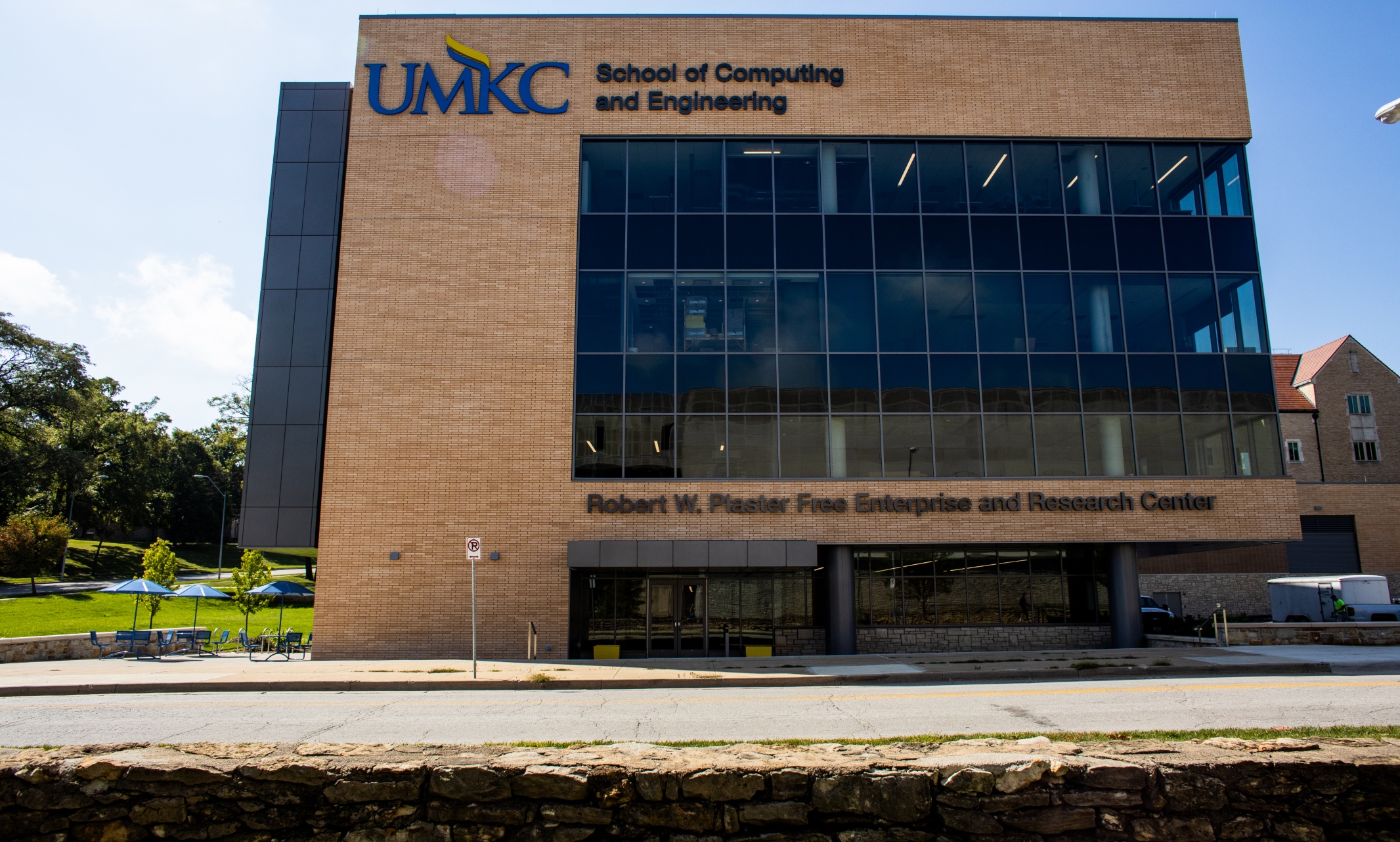
The scholarship will provide support for women pursuing careers in science, computing
A UMKC alumnus and his wife have established a new scholarship to support female students studying computing or engineering.
Nick and Soumya Simha have established "The Nick and Soumy Scholarship" to support women looking to pursue a degree in STEM-related fields at UMKC.
"We both believe that education is a gateway to a brighter future," Nick Simha said. "But the issue was, how do we help that along? What can we do?"
The engineering field is flooded with men, Simha said, and encouraging more women to get involved in STEM fields is beneficial for everyone.
"A lot of products are designed by men for women," he said. "If we get more women into the field, they can actually make things more accessible. I can see so many benefits to getting more women into engineering."
Souyma Simha said the two have always encouraged their own teenage daughter to pursue an interest in STEM.
"We wanted to do whatever we could to extend some of that support," she said.
The couple was inspired to establish the scholarship after meeting Kevin Truman, Dean of the School of Computing and Engineering, and "seeing the new energy he brings."
"We'd been donating a little amount of the university every year, but when I saw him I thought, 'this is somebody who is going to put this money to good use,'" Simha said.
Truman said he is "so grateful to Nick and Soumya for their donation."
"Their support is deeply appreciated by me and the School of Computing and Engineering. Their passion to help young women pursue their dreams, which is demonstrated through this scholarship, is evident. At the UMKC SCE, we are committed to recruiting and retaining talented female students. This scholarship will help guarantee those gifted, hardworking female students have the financial resources they need to complete their STEM education," Truman said.
After graduating with a B.S. in Electrical Engineering in India, Nick began looking for schools to pursue a master's degree in the United States. That search led him to UMKC in 1991.
The Simha family.
"I looked at a lot of schools but one of the things that attracted me to UMKC was at the time there was a big telecommunications focus in Kansas City and UMKC was one of the schools that offered a specialty in it," Simha said. "(UMKC) also gave me a scholarship, which helped us make the decision."
A UMKC education gave Nick confidence in his field, he said, through hands-on work experience and internship opportunities.
"Attending the same classes as those already working in the industry helps you get a better understanding of the real-world application of what we were learning," Simha said.
After graduating and spending a handful of years working in the Kansas City area, Nick was recruited to Silicon Valley, where the two currently live with their daughter.
He now works for Amazon and Soumya is in real estate.
The two fully paid off their scholarship pledge this year, with a gift of appreciated stock. Additionally, the two are now members of the Robert H. Flarsheim Society, as they have included a gift provision in their estate plans to support the scholarship.
"What we hope is more girls get into engineering and it turns into a very normal choice. Many times people are not afforded the same opportunities. For example, let's look at investment bankers. They are not necessarily smarter than the rest of the population, but they had an opportunity to study finance. A lot of girls don't know about the benefits of engineering," Simha said. "You can do engineering, you can go into sales, you can do marketing. That engineering degree opens all of those doors for you."
Jul 27, 2021
Flatland interviews vice provost for curriculum and assessment and alumni
Flatland interviewed Kim McNeley, UMKC vice provost for curriculum and assessment; and Adriana Velarde and Ally Elder, UMKC spring 2021 graduates. Read the full article.
Jul 27, 2021
Gail Robertson Weighs-In for CNN
Parents could also consider turning mask-wearing into a game, suggested Gail Robertson, a child psychologist at Children’s Mercy Hospital in Kansas City, Missouri. “Because we have this association in our culture with (public health) being scary — having (face coverings) as a part of play is essential,” said Robertson, assistant professor of pediatrics at the University of Missouri-Kansas City School of Medicine. The CNN story was picked up by CNN Philippines and KIMT.
Jul 27, 2021
UMKC Economics professor tells Bloomberg Business why not
Scott Fullwiler, an MMT economist and professor at the University of Missouri-Kansas City, says the COVID-19 crisis has shot down one common argument against deficit spending (used by Democrats to oppose former President Donald Trump’s tax cuts): that it risks leaving the government short of funds, so that “in the next crisis you might not be able to respond.” Read more.
Jul 23, 2021
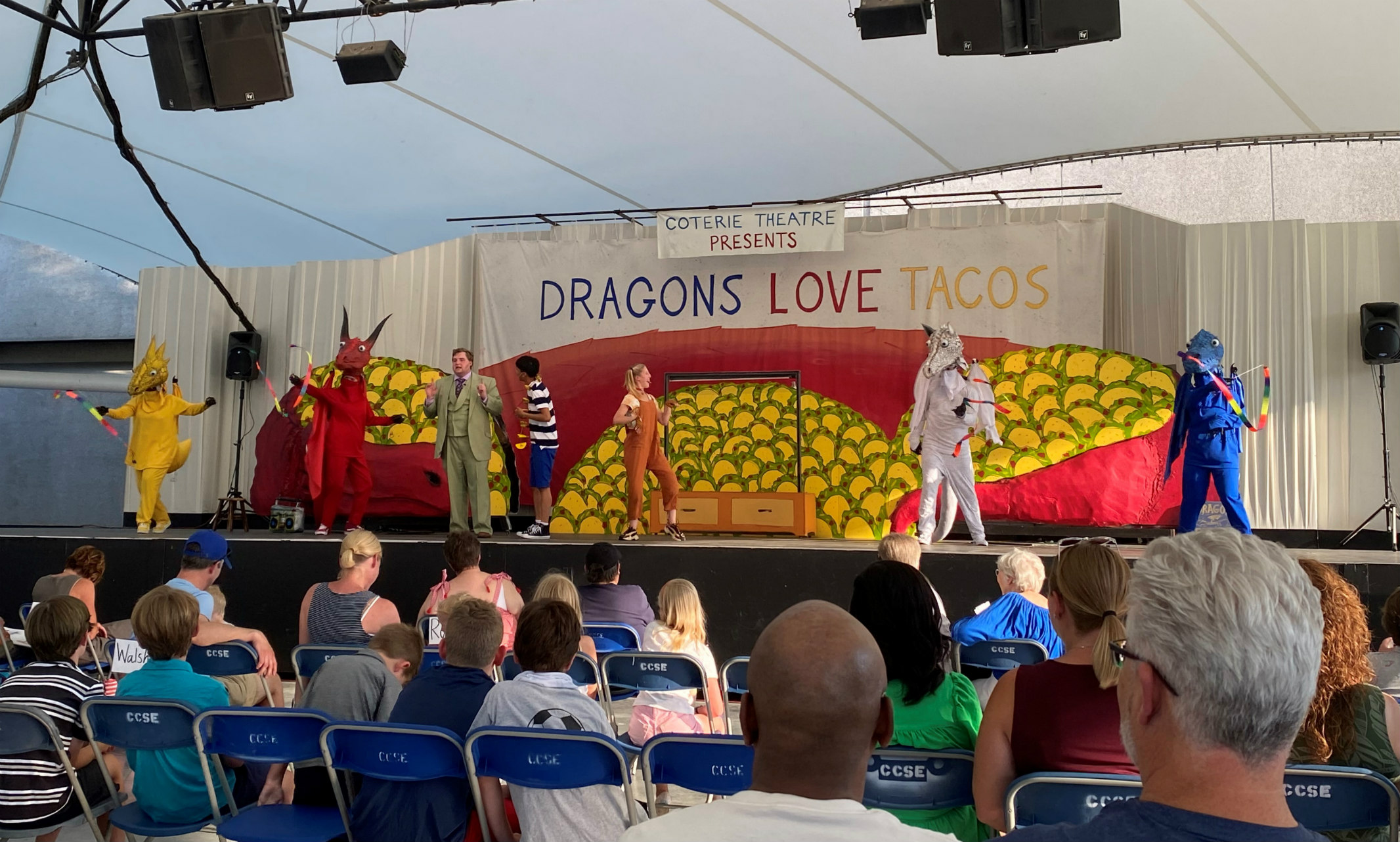
Dragons Love Tacos, best-selling children’s book, comes to life on outdoor stage
After more than a year without in-person live performances, The Coterie Theatre presents Dragons Love Tacos, written by Ernie Nolan and based on the book by Adam Rubin.
The live, outdoor performance is directed by Stephanie Roberts, UMKC Theatre associate professor of Physical Theatre. Performances are in Crown Center’s Entertainment Pavilion, 2425 Grand Blvd., Kansas City, Mo., through Aug. 8.
This all-ages show features a cast of 10 students from UMKC Theatre performing as the 306 Theatre Troupe. They will use their extensive dance and clown training to help bring the dragons to life. The show is a stage adaptation of the family classic book, Dragons Love Tacos.
Roberts and two UMKC students shared their thoughts about the show and being on stage again.
Stephanie Roberts (Director)
How does it feel to direct a live show again?
It was such a relief and joy to be back in rehearsal with more than a few people in a room together! Because we were all vaccinated, the actors were able to have close contact and really engage in physical theatre in a way that they haven’t for over a year.
What was your favorite part of this show?
One of my favorite parts was seeing the actors, my students, apply all that they’ve been learning for the last two years. They brought so much play and creative input to the show; it made my job easy. My other favorite part of the show is seeing the children’s reactions in the audience. I love that they participate: answering questions that the actors ask them, or sometimes just spontaneously jumping out of their seats and dancing when they hear the music!
What makes children’s theatre special?
Theatre for Young Audiences (TYA) can be many different things--adaptations of classics, devised theatre, community-based, educational, activism. I think some common threads are its capacity to foster empathy and self-awareness in young people, as well as providing a space for joy, wonder and play--for both children and adults.
Why did you decide to direct this play?
Jeff Church came to 306 Theatre Troupe and me with a couple options of plays. When the project was coming together, I was in the middle of teaching Clown to some of the grad actors in the cast. Since my specialty is physical theatre and comedy, they thought I was a good fit--and I’m thrilled that they asked!
What is unique about outdoor theater?
Because the show is competing with so many elements--cars, airplanes, sirens, fountain-- actors, directors and designers all need to know how to sustain the audience’s attention. Body-mics, of course, help, but there is still a need to be highly specific and larger-than-life, while still finding the truth in whatever story you’re telling.
Why should someone see the show?
In this time, when everyone is emerging from the pandemic, this is the perfect, celebratory experience. The design is whimsical and spectacular, and I see both kids and adults laughing and dancing. I even have one friend (in his sixties) who said he shed a tear at the end.
Michael Oakes (Man in Suit)
What was your favorite part of the show?
My favorite part of the show was the first week of rehearsals where Stephanie just let us work and roll with the ideas that we had. It was fun to watch all the dragons create their unique personalities and characters from their instincts. It was adorable to watch the relationship between Leroy and The Boy form in organic ways because of just trying ideas in rehearsal. It was great to throw things at the wall as Man in Suit and see what stuck. Even with the book and script giving a strong foundation, it really feels like we built something special from the ground up with this show.
What inspires you?
I'm inspired by seeing actors enjoy the work they're in and the audience feeling that joy and reciprocating it. People with authentic joy and passion in what they do fills me with an electricity that I cannot explain. Energy and joy are contagious. Seeing someone talk about or do something they truly and honestly love makes my soul happy to its core. I want to know everyone's passion because that's the core of what makes someone who they are, what they love. I'm inspired by that.
Why did you choose UMKC?
I chose UMKC because of the professors and the city. My undergrad professor went to UMKC as well and always talked about Kansas City with a deep love. He spoke very highly of everyone who taught in the program as well. And after one conversation with the faculty, I knew this was a place that would help me grow. There was an emphasis on letting actors be themselves rather than creating a generic "UMKC actor." They said they would let us be us. And they have! I've found out more about myself and my art aesthetic from here than I think I would anywhere else because of the great people I've got to work with and who support Michael being Michael always.
Why should someone see the show?
It's a blast. After a "lost year" this is the time to go out and have some fun. It's an opportunity to sit outside and laugh, dance, yell along and just have an hour of enjoyment. Plus, it puts tacos on the brain. Which is always good. It felt like in the past year fun has been hard to find. For at least an hour, there's a fun place people can go. A place where dragons are real, people come through TVs and a boat full of tacos isn't an outrageous idea. A truly joyous place.
Do you have a favorite dragon?
I can't pick a favorite dragon. I love them all so much! They're who truly make Man in Suit look good. Would people want to see "Man in Suit Love Tacos"? Nah. The dragons are the stars, and all of them deserve it equally. I love them all. This is the most fun I've had in a play process in years. Everyone in the cast and crew worked so hard to make this happen. I hope everyone in KC sees this show. It's very near and dear to my heart.
Aidan Callaghan (Production Assistant)
What was your favorite part of the show?
My favorite part of the show is probably the dragons’ entrance sequence. The actors all have such unique characterizations and it’s just really fun to watch.
What inspires you?
I am inspired by people who have drive. People who know what they want and are driven enough to take real steps to achieve them.
Why did you choose UMKC?
I chose UMKC initially because I was doing pre-pharmacy with the intent to apply to pharmacy school and follow that career path. But I didn’t enjoy it, and theatre was the only path that I knew was a good fit for me, so I stayed at UMKC and joined the theatre program.
Why should someone see the show?
People should come see this show if they are looking for a brief getaway from the woes of the world. This is a very fun light-hearted show that harkens back to everyone’s childhood where dragons and tacos were as real and as exciting as anything could be.
Do you have a favorite dragon?
While I love all of our dragons very much, if I had to pick, I think I would pick Blue Dragon because of its very endearing personality.
Tickets are $12 for youth under 18, students and seniors 60 and older; $15 for adults; and $5.50 to $8 for groups over 20. After the Saturday night performances, audiences have a chance to get their picture taken with a dragon after the show. Tickets can be purchased from The Coterie Box Office by calling 816-474-6552 or online.
Jul 22, 2021
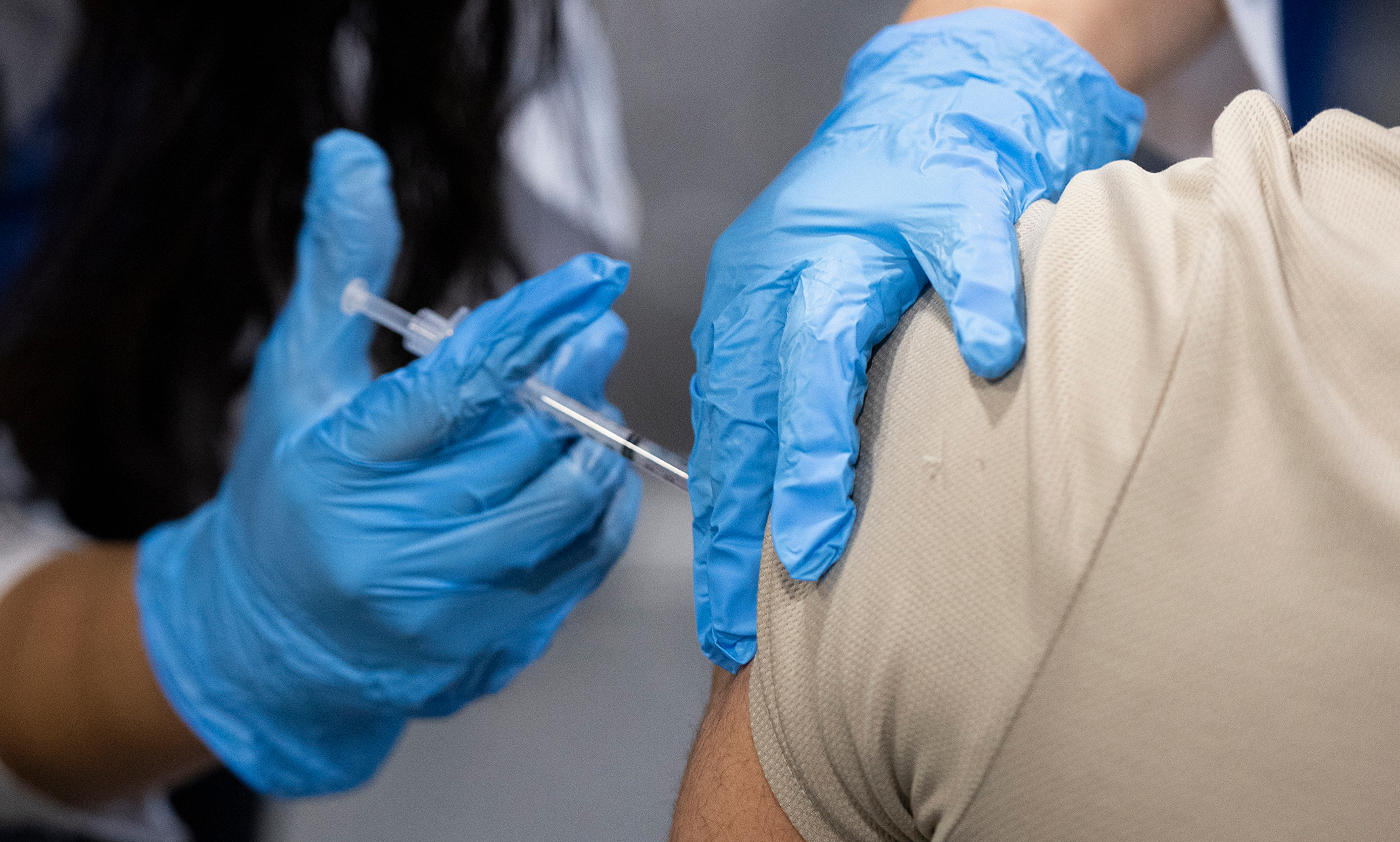
Vaccine effort targets low-income and underserved living in Kansas City’s east side
The UMKC School of Dentistry will collaborate with the School of Pharmacy to begin offering free COVID-19 vaccinations to patients visiting its dental clinics beginning July 26.
Melanie Simmer-Beck, Ph.D., R.D.H, chair of the dental school’s Department of Dental Public Health and Behavioral Sciences, said the project brings the two schools together to provide a community-based public health service.
The program is one of many UMKC efforts supported by a $5 million CARES grant from Jackson County to encourage low-income and underserved populations in Kansas City’s east side to receive the COVID vaccine.
“We felt it was important to offer vaccinations to School of Dentistry patients to be acting within the spirit of what this grant was intended to do,” Simmer-Beck said.
More than 1,000 of the dental clinic’s patients come from areas of Kansas City identified as part of the grant’s target audience with the intent of addressing vaccine hesitancy and health equities. Operating under COVID restrictions during the previous year, the dental clinics serviced more than 1,750 patient appointments and saw 576 individual patients who live in those targeted areas. When at full capacity, the dental school’s clinics serve more than 2,200 patients a week and are the largest provider of dental services in the states of Missouri and Kansas.
Simmer-Beck said patients will be notified of the vaccine option when receiving appointment reminders by phone. Student dental providers working in the clinics will also ask their patients if they are interested in receiving the vaccine if they haven’t already done so and obtain the necessary signed consent forms. Patient appointments in the clinics are scheduled Monday through Friday at 9 a.m. and 1 p.m.
The School of Pharmacy will initially have certified student and faculty vaccinators on call and available during clinic hours to come to the dental school and administer the shots when requested.
“This is the first time that pharmacy students will be providing a service to School of Dentistry patients,” Simmer-Beck said. “It’s a great opportunity for pharmacy, dental and dental hygiene students to collaborate and learn from one another in a real-world setting.”
UMKC’s pharmacy students and faculty volunteers have played a large role in statewide vaccination efforts since the full-scale rollout of vaccines in January. By March, they had administered more that 17,500 doses of the vaccines at sites throughout Missouri.
Cameron Lindsey, chair of the pharmacy school’s Division of Pharmacy Practice and Administration, said the program will provide patients the ease of being vaccinated without having to see another care provider.
“We have the vaccine and know the logistics of how to mix and store it,” she said. “We’ll help get the dental school get up to speed with the process and model that for them. It’s a team effort. It doesn’t matter who gives the shot. There’s a community need and, interprofessionally, we’re combining our resources to get the vaccine where it’s needed.”
Simmer-Beck said that Russ Melchert, dean of the School of Pharmacy, was instrumental in helping get the dental clinic vaccine program started. Melchert has served as interim dean of the dental school since last September.
“Having Dr. Melchert serve as the interim School of Dentistry dean helped move this notion forward,” she said. “His knowledge about the resources at both schools helped us bring together the right people in a timely manner.”
Melchert said the program is a great opportunity for the two schools to work together to increase access to the vaccines.
“Pharmacy and dentistry are two of the most accessible health care professions for most people in this country and putting them together creates synergistic opportunities to help people live healthier lives,” he said. “Our students have already had a huge impact in providing COVID vaccinations and this creates another great chance for the community to see what great students, staff, and faculty we have at UMKC.”
As an added incentive for dental patients to receive the COVID vaccine, those who return for their second dose will receive a free battery-operated power toothbrush.
“Even if we give just one or two vaccines a day, that’s better than where we were before,” Simmer-Beck said.
Jul 22, 2021
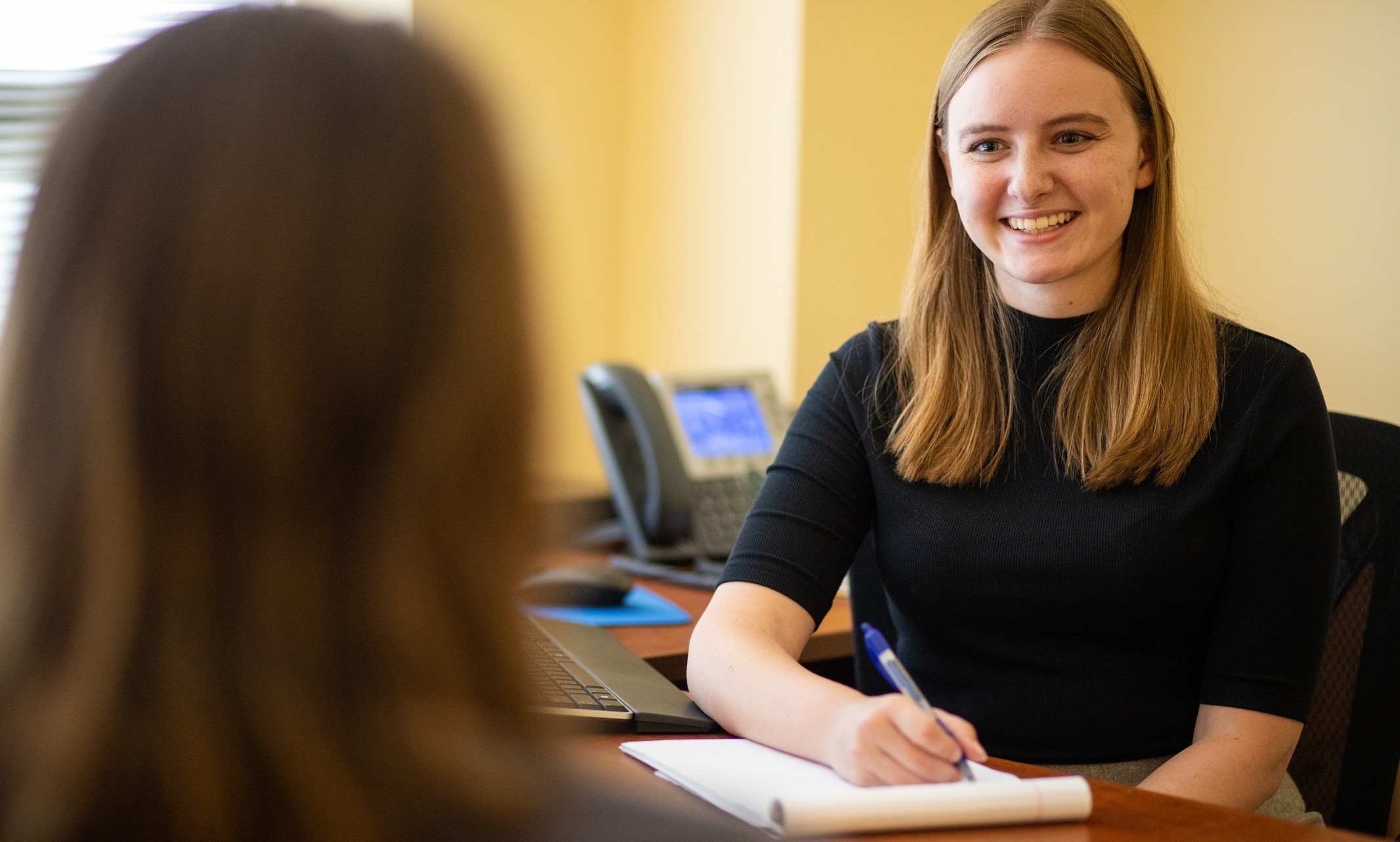
Get some tips and meet the coordinator
Living on your own, buying a car and graduating college have a couple things in common: they’re all common goals for students and they all require good money management.
Fortunately, UMKC will open a Financial Wellness Center this fall that can help students reach all their financial goals. We sat down with Financial Wellness Coordinator Anna Zimmerman for the full breakdown on what you can expect from this new service.
Tell us a little bit about yourself. What brought you to become the financial wellness coordinator here at UMKC?
I'm originally from Topeka, Kansas, and personal finance has always been a big passion of mine. After working in New York for a couple of years, I knew that I wanted to come back to the Midwest. I love Kansas City, and so I jumped when I saw an opportunity to come to UMKC. They were looking to start a new Financial Wellness Center. I’ve been following a lot of the trends across the country, and more and more schools have been starting programs like these. I was just really excited by the opportunity to build something from the ground up and be there to support students as they're establishing their own financial habits. Answer any questions that they might have.
What is the Financial Wellness Center? What benefit do you hope it will give students here?
The Financial Wellness Center at UMKC has three primary services. Our first service is one-on-one financial coaching. We meet with students individually to support them and answer any questions that they might have, whether that's how to build a budget, understanding student loans, saving to purchase a car or move out on their own. We can help students navigate all of those decisions with individualized support.
The second service we offer is providing workshops and presentations. This fall, we have 13 different workshops on topics ranging from applying for scholarships and budgeting to credit cards and student loans. We also do presentations by request. Over this last summer I've worked with physicians’ assistants on Hospital Hill and the Summer Bridge Scholars, so a wide range of students.
We also provide digital resources on our website: templates for budgeting and short videos that help break down some of the common questions that we get from students around topics like credit and student loans.
How does this differ from similar programs at other universities?
I interviewed over 100 different individuals on the UMKC campus and reached out to 15 different universities with financial wellness programs to find out what worked and what didn’t work. That means we’re able to customize and focus our services to specifically support UMKC students.
I'm so excited that UMKC is choosing to invest in this resource. It’s so empowering for students. It's not a one-template-fits-all approach. We sit down with the student and figure out what their specific goals are and how can we support meeting them. It's stressful to be a student. You're managing your course load. You're managing your social relationships. Many students are managing work. Those are all the same skills you need to manage your finances. We just are adding that little bit of information so that students feel confident to do so.
And why is financial wellness important for college students, in a broad sense?
We know that financial wellness has an impact on every other facet of an individual's well-being. If students are stressed about finances, chances are their academic performance is going to dip. They're not going to be able to spend the time and energy focused on their social relationships, and that’s going to have a severe emotional toll. We want to provide a lot of the support up front in order to help students avoid that emotional stress and manage their finances well while they're in school. It’s really empowering for students. A lot of them are on their own for the first time or they're making these lifelong decisions about student loans, which is one of the biggest investments that they'll make. We’re supporting them through these decisions and helping set them up for success, not just while they're at UMKC, but for their life. These are skills that they're taking with them and they're going to be using every day.
What’s the number one financial wellness tip you want to give to students?
My first tip for students would be to sit down and make a budget: see how much money you have coming in and how much money you have going out. Make sure you're giving every dollar a job. You want your money to work for you, whether that's paying for your tuition and fees, time with friends, time for selfcare or hobbies. Make sure that every dollar has a job, and make sure that you're setting time and money aside for your savings as well, so you can support your future goals.
Learn more about the Financial Wellness Center
Jul 22, 2021
Bloch School assistant professor of health administration discusses the term "surprise medical bill"
“Here, the term ‘surprise medical bill’ is used to refer to out-of-network balance bills that occur in which the patient was not expecting them or had no control over them,” said Christopher Garmon, Ph.D., assistant professor of health administration at the Henry W. Bloch School of Management at the University of Missouri-Kansas City. Read more.
Jul 22, 2021
Law professor discusses Kansas City police budget, city's violent crime problem
Allen Rostron, William R. Jacques Constitutional Law Scholar and Professor of Law at the University of Missouri-Kansas City School of Law, was interviewed for this story. Read the story and watch the newscast.
Jul 22, 2021
School of Law professor weighs-in on why wrongly-convicted people are still imprisoned in Missouri
Sean O’Brien, a law professor at the University of Missouri-Kansas City, said, “I do know that the Attorney General’s office, for a long time, has had a practice of opposing every case regardless of its merit. They think that their duty is to defend every judgment, no matter the justice of it.” Read the article and watch the news clip.
Jul 18, 2021
The Kansas City Business Journal highlights UMKC Professional Career Escalators Program
A new program at the University of Missouri-Kansas City, Professional Career Escalators, soon will begin taking applications for student assistance that will extend through professional school. Jennifer Lundgren, UMKC provost and executive vice chancellor; and Mako Miller, director of the UMKC Professional Career Escalators, were interviewed about the new program. Amanda Malone, UMKC senior, is part of the KC Scholars Program and was interviewed for this story. Read more.
Jul 16, 2021
Jacob Wagner tells city officials that tearing down and building new would be less cost-effective
A professor at the University of Missouri - Kansas City said he believes the answer is right in front of us. "There's about 45,000 of those units throughout Kansas City, Missouri," said Jacob Wagner, of Urban Planning and Design at the University of Missouri-Kansas City. Read the full article and watch the newscast.
Jul 16, 2021
KSHB interviews William Black
“People are saying no, why would I take that job and risk COVID for a pittance when I can get more money in a different job and minimal risk of COVID and it’s better in terms of child care and such,” William Black, associate professor of Economics and Law at UMKC said. Read more.
Jul 16, 2021
Nathan Wilcox, future UMKC student, was interviewed by KCTV5
The camp is meant to inspire and empower children with visual impairments, showing them nothing is impossible. That inspiration is something 18-year-old Nathan Wilcox has felt his whole life. Despite being blind in one eye, he will enroll at the University of Missouri-Kansas City in the fall and has dreams of becoming a civil rights attorney. Read the full story and watch the newscast.
Jul 14, 2021
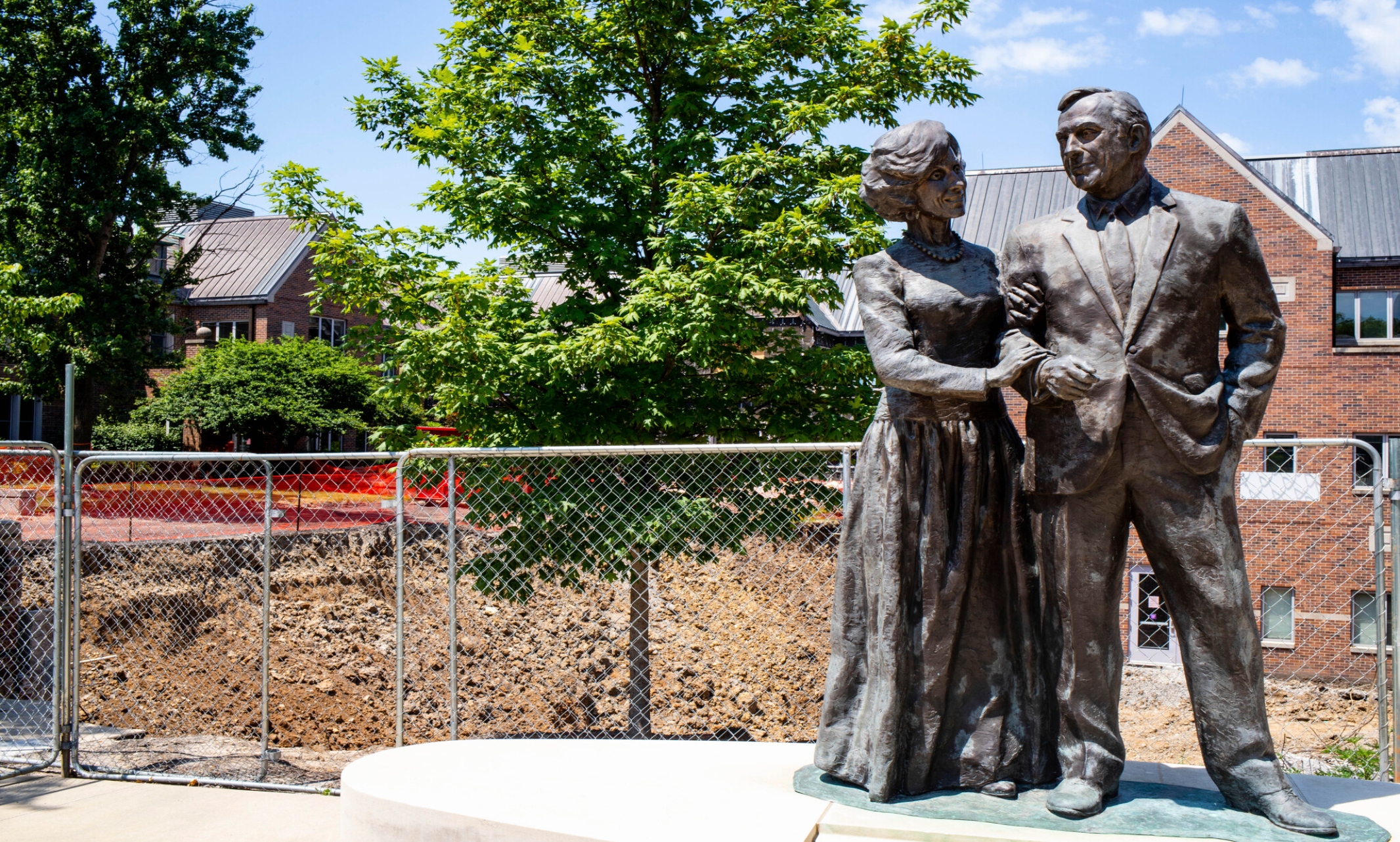
The renovation of Bloch Heritage Hall moves a thriving business school into the future
When completed, the renovation of Bloch Heritage Hall will be more than new carpet and reconfigured classrooms.
It will be even more than eye-popping technology, although the reimagined facility that has anchored the Bloch School since its earliest days also will get that.
The $17 million renovation, expected to welcome students by the Fall 2022 semester, is really about fulfilling its namesake’s unwavering vision of excellence for the school. For more than three decades, Henry W. Bloch, who died in 2019, faithfully invested in the business school with his time and money because he believed that having a top business school in Kansas City was key to the city’s success.
“The Bloch School was Henry’s pride and joy,” said David Miles, president of the Marion and Henry Bloch Family Foundation, a lead funder of the renovation project. “In a city this size, with the number of businesses and entrepreneurs we have, he believed there had to be an outlet and a location for you to receive high quality business knowledge and also a place where professionals could network and connect.”
The Bloch Foundation’s $8 million contribution to the Bloch Heritage Hall renovation project was already well in the works before Bloch died. Miles said Bloch saw the potential of this renovation project to propel the Bloch School to new heights.
“Henry was excited about this project,” Miles said.
The Sunderland foundation joined the Bloch Family Foundation as a lead donor for the Heritage Hall renovation project. In addition, six-figure gifts were received from the William T. Kemper Foundation, Mike Plunkett, Nathaniel Hagedorn, Jim Stowers and the Capitol Federal Foundation. The project also had generous support from well over a dozen alumni, community members and friends of the school, said Jay Wilson of the UMKC Foundation.
Kent Sunderland, chairman of the Sunderland Foundation and chair of the UMKC Foundation, said their gift was motivated in large part by respect for Henry Bloch and the Bloch family.
But Sunderland noted the gift also was predicated on his shared belief in the project’s potential to improve the business school. That in turn will help UMKC and Kansas City, he said. “That’s what we want UMKC to be,” Sunderland said, "A place people can go and (then) apply their talents to businesses here in Kansas City.”
For Brian Klaas, Bloch School dean, the link between the renovation of Bloch Heritage Hall and that aspiration is just as clear. The project will give the Bloch School the infrastructure it needs to better support students, improve student retention and recruit more students to meet enrollment goals.
“It’s really driven by a desire to fundamentally alter the student experience,” Klaas said.
Interior rendering of the Bloch Heritage Hall renovation.
The Project
Bloch Heritage Hall is an amalgamation of the historic Shields Mansion, an estate built in the early years of the 20th century for grain magnate Edwin W. Shields, and a sprawling addition the university completed in 1986 with a $1 million contribution from Henry Bloch. The building, with its plentiful classrooms and offices, served as the school’s primary home until 2013 when the business school expanded its footprint to include Bloch Executive Hall for Entrepreneurship and Innovation.
While Bloch Heritage Hall has continued to serve as an important piece of the Bloch School’s infrastructure, the building has not always kept up with the changing nature of education. In addition to needing better technology and differently arranged classrooms, the building’s largest deficit had become its lack of a central common entrance or student gathering area.
“If a parent walked in the front door and wanted to talk to someone about the school, there’s no one to talk to. No place to go,” said Miles.
Similarly, students had to walk through a maze of hallways to find various student service offices. Nothing was centralized or clear.
The renovated Bloch Heritage Hall will change all that by creating a main entrance off Cherry Street, which will feature a new student services hub. All of those previously hard-to-find student resources, including undergraduate advising, the career center, recruiting, tutoring, and student clubs, will reside there.
In the design created by PGAV Architects, square footage for the hub will be created by filling in two floors of an atrium — the centerpiece of the 1986 addition. On the first floor immediately below that hub, newly created floor space will be dedicated to an open common area where students can mingle and meet. The idea, said Klaas, is to help students connect with school resources and their classmates so they stay in school, graduate, and move into successful careers.
“What we’ve learned is that students need a sense of connection, and they need prompts and nudges,” he said. “We want to create an energy and a sense that this is where great things are happening.”
Demand for Flexibility
Another major goal of the renovation is to make the learning environment as flexible as students demand. This includes equipping classrooms with technology to make logging into class remotely effectively the same as attending in person.
As part of the “RooFlex” learning experience, video screens and cameras will be installed in the front and back of many classrooms so professors can see virtual students just as they see in-person students, and students can glimpse all their classmates, either in person or online. One classroom will include a wall of monitors, so professors can simultaneously see every student gathered remotely as if they are seated before them.
While COVID-19 accelerated the need for virtual learning, the demand was already there among many students, said Sidne Ward, associate dean of the Bloch School who serves as the school’s liaison on the renovation project. She expects it will only increase once the pandemic fades away.
“Our students are working full time. They might be traveling,” Ward said. “They might be in the classroom sometimes, but there might be a time when they’re sitting in Chicago in a hotel room.”
Other students are juggling children with work and school and having the option to take classes remotely — at least part of the time — may be the only way they can pursue a business degree. The renovated classrooms will give students the ability to have as much remote learning as they need, while still providing a top-notch campus environment.
The improvements will put Bloch ahead of many business schools around the country.
“Some very impressive schools are making these kinds of investments, but it’s not commonplace,” Klaas said.
Ultimately, he hopes the changes in the learning environment the renovation will give the Bloch School the ability to attract more students and meet its goal to double in size by 2029. Over the last three years, enrollment has grown by 15 percent to include about 2,000 undergraduate and graduate students.
The Shields esidence in the 1920s.
A Linked School
In addition to improving technology to enable better virtual learning, the expanded Bloch Heritage Hall will get redesigned classroom spaces, including additional small rooms where students can gather to meet on projects, and some additional larger classroom spaces, which have been in short supply at the school. One of those larger classrooms will be added underground and include a corridor to physically link Bloch Heritage Hall to its neighbor, Bloch Executive Hall.
Boosters of the project promise that the two buildings will be linked in more ways than just a corridor, however. The Heritage Hall makeover will maintain design elements that respect the architectural style of the century-old Shields Mansion. But the completed project will also infuse Heritage Hall with the 21st century sophistication that Executive Hall is known for.
When supporters and dignitaries gather to cut the ribbon and ceremonially open the new building on July 30, 2022, the anniversary of Henry Bloch’s 100th birthday, Klaas is confident that the completed project will achieve one of the Bloch School’s ongoing aspirations. The newly linked, modern campus will be something that Henry Bloch would be proud of.
“Henry was about the Bloch School supporting the needs of Kansas City,” said Klaas. “He was about the Bloch School helping Kansas City be prosperous, healthy and strong. What this building is going to do is help us provide better educational opportunities to more students. That in turn is going to support employers, making them more successful by building the talent pool in Kansas City.”
Jul 13, 2021
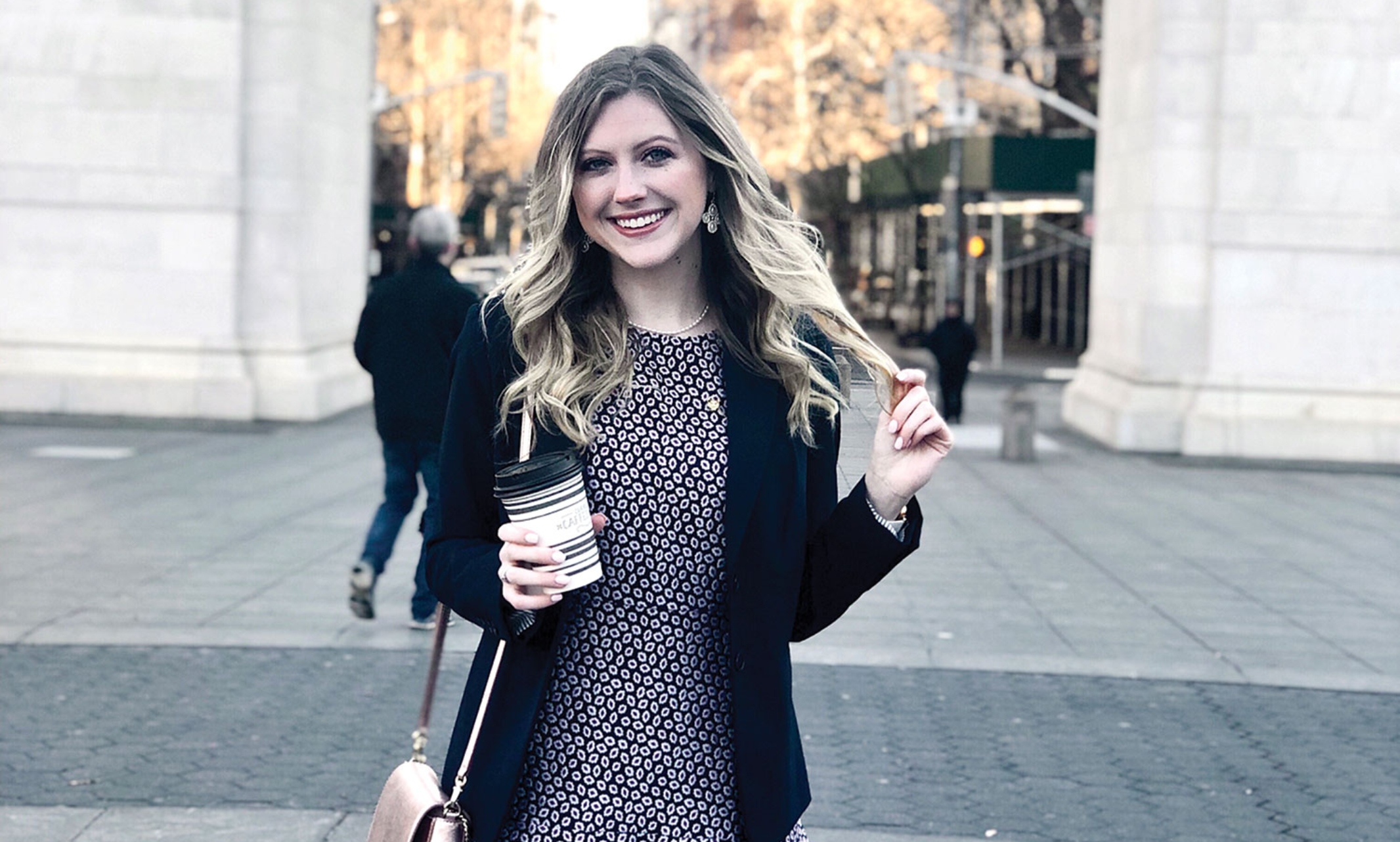
Delayed by COVID, Bloch student Courtney Collins heads East to work with leading cosmetics company.
Courtney Collins’ plans all changed on Friday the 13th.
After studying in Malaga, Spain for the Spring 2020 semester, she would head to New York City to do her marketing internship with the Estée Lauder Companies, working with the Jo Malone London perfume brand.
It’s a dream she said was inspired by her aunt who was a long-time executive for the cosmetics company and also a desire to live and work in the Big Apple. But on Friday, March 13, the semester in Spain was cancelled and Collins headed back to Kansas City. Her internship was pushed back a year.
She’s one of many Bloch students who because of the pandemic had their internship plans change. According of Tess Surprenant, director of the Bloch Career Center, about 25% of internships were delayed after an offer was made. Further, many companies shut down recruiting activities just as students were in the process of interviewing.
For those that held internships, about 80-90% were held remotely. Prior to COVID-19, remote internships were a rarity and that meant a substantial pivot for students and companies.
As she waited for 2021, Collins re-evaluated what she wants to do with her profession, and with the help of the Bloch Career Center, taking stock of her future.
“I talked with Maggie (Reyland) and Tess (Surprenant) a lot in how it looks for job placement in (the cosmetics) industry. Is it the end of it?” Collins said. “A lot of things have shifted.”
What also has shifted was how the internship was going to work, logistically. She will be one of 140 interns, out of an applicant pool of 7,000. Instead of an abbreviated six-week, remote internship, Collins decided to wait until this summer and do the full 10-week internship. Because Estée Lauder is keeping their offices closed until October 2021, it means another mostly remote internship.
“What I wanted with the in-person internship was the in-person networking and building relationships,” Collins said. “How can I do that over Zoom? How can I stand out over a video? I‘ve listened to career panelist with the Bloch marketing advisory board and they all say it’s the same, just online. You can still make those connections.”
Surprenant said she’s been impressed with the student’s resiliency.
“Since all the employers were interviewing virtually, it means that students had to learn new tips and techniques for this format,” Surprenant said. That included learning to navigate virtual career fairs and networking meetings.
“Now more than ever, in a tight job market, it is often these types of connections that help a student distinguish themselves,” she said.
Collins’ goal with the internship is still the same: get a full-time role at Estée Lauder and move to New York. She’s confident that she can immerse herself into the re-invention of the workforce and city, post-pandemic.
“I think it’s exciting. We’re starting from scratch with more resources, technology-wise,” she said. “For business and entrepreneurship students here at Bloch, the sky is the limit with what we can do and where we can do it.”
Jul 13, 2021
Will lead School of Dentistry, Student Affairs
Jennifer Lundgren, Ph.D., UMKC provost and executive vice chancellor, has announced the appointment of two new deans at the university.
Steven E. Haas, D.M.D., J.D., MBA, will be the new dean of the School of Dentistry; Michele D. Smith, Ph.D., will be the new vice provost of Student Affairs/dean of students.
Smith currently serves as dean of students and assistant vice president for Student Affairs at Missouri State University in Springfield. She is also an associate professor in the Department of Counseling, Leadership and Special Education at MSU, where she teaches in the Master of Science program for Student Affairs in Higher Education. She holds master’s and doctoral degrees in Higher Education from Ohio University in Athens.
Her research focuses on the experiences of African American student and faculty success, particularly African American women and African American women in athletic administration.
“She will be a wonderful bridge between student affairs and our academic programs and faculty, bringing experience from both university perspectives,” Lundgren said. “She brings a holistic perspective of university life to her role at UMKC and will complement and advance the already exceptional work of the Student Affairs division and teams.”
She will begin her UMKC duties on Aug. 2.
Haas comes to UMKC from the University of Nebraska Medical Center College of Dentistry in Lincoln, where he serves as associate dean for clinical affairs and interim chair of the Department of Adult Restorative Dentistry. He received his D.M.D. from the University of Pennsylvania School of Dental Medicine, his J.D. from Touro College Law Center in Huntington, New York, and his MBA from the H. Wayne Huizenga School of Business and Entrepreneurship at Nova Southeastern University in Davie, Florida. He will begin his tenure on Aug. 16.
Haas has deep knowledge of dental education accreditation and compliance, as well as innovative clinical educational practices, Lundgren said.
“He values science and research and the importance of evidence-based clinical decision-making,” Lundgren said. “Steven is committed to improving the experiences of under-represented students, faculty, staff and patients in the School of Dentistry and in advancing the university’s goals of increasing diversity among our faculty and staff.”
According to Lundgren, Haas will focus on improving diverse representation and inclusivity within the school; growing research; interprofessional collaboration; and innovation and advancement in the clinical practices and in community outreach, particularly with communities of color and other under-represented communities in the greater Kansas City region.
Jul 12, 2021
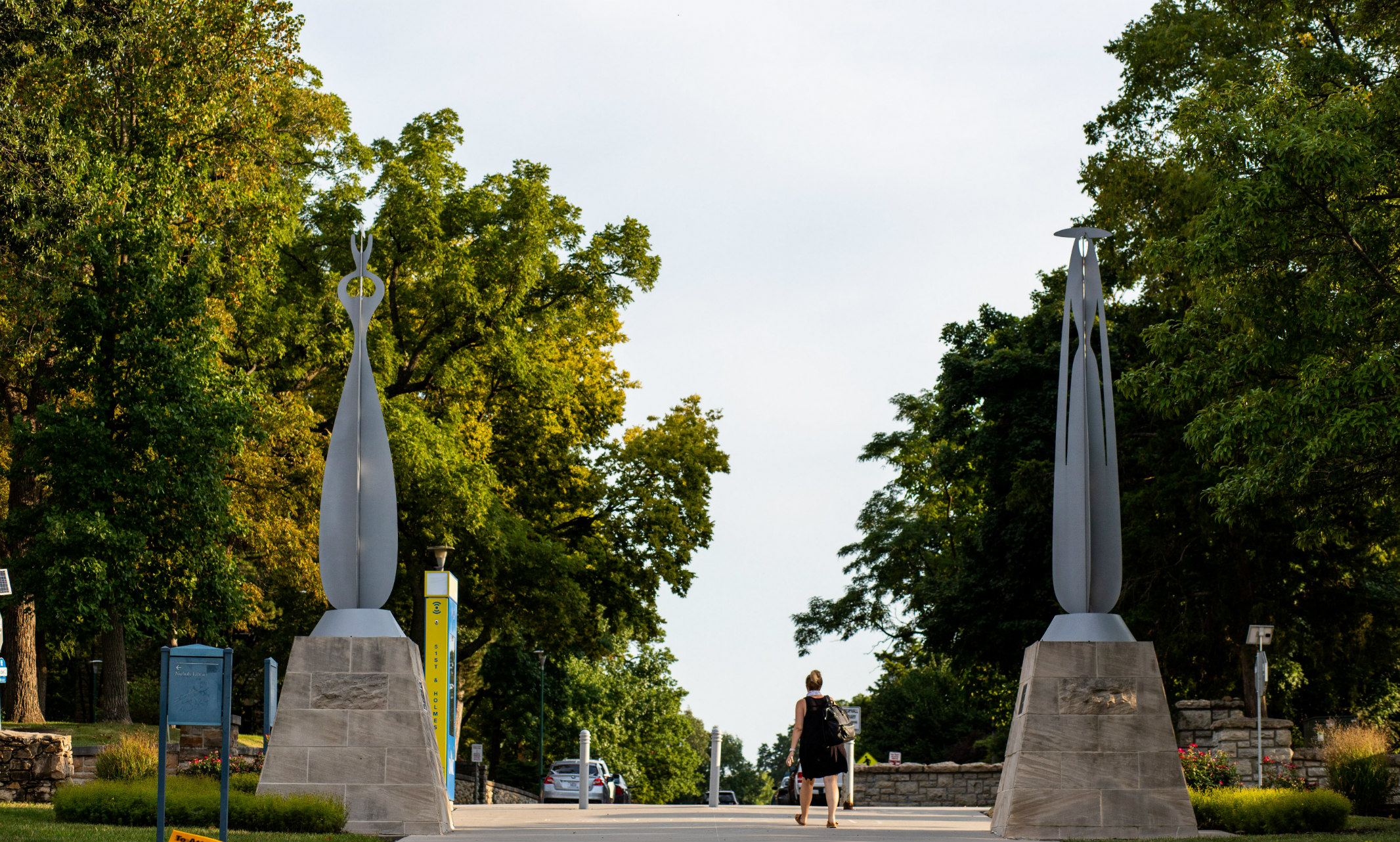
Growing our excellence and financial stability
Launched in May 2020, UMKC Forward is a comprehensive and collaborative plan to achieve growth and excellence for Kansas City’s university. The program includes ideas and exploration by a broad-based group of faculty, staff, students and community members.
In March, UMKC Chancellor Mauli Agrawal rolled out the UMKC Forward plan, which included investments in five key areas: Student Success, Faculty Development, Research Excellence, Career Expansion and Community Engagement. University work groups have been busy and share the following updates.
Student Success: Professional Career Escalators
The signature Professional Career Escalators™ program is a unique, trademarked system of personalized support and services unlike anything being offered across the U.S. It is designed to propel students from their academic studies to good-paying careers.
Mako Miller, M.A.Ed, will lead the PCE. Miller, who started her new role on July 6, will be working on all aspects of program development and engaging with the faculty working groups to learn about current practices and where program development is needed. The process will continue through the academic year in preparation for the official launch in the fall 2022 semester.
The hiring of an assistant director of Career Preparedness position was approved. A search will begin in the fall 2021 semester. This position will be involved in the development of one of the five core PME experiences, career guidance and development.
Faculty Development: Center for Advancing Faculty Excellence
A new Center for Advancing Faculty Excellence, or CAFE, will feature a comprehensive program of mentoring, development opportunities and resources to support, attract and retain high-quality and engaged faculty.
Three of four appointments have been made for leading the pillars: Molly Mead, Teaching and Learning; Alexis Petri, Research and Creativity; and Lorie Holt, Career Progression, Leadership and Faculty Life. The appointment of a lead for the Service and Engagement pillar is in progress.
Research Excellence
To reach the goal of doubling research expenditures by 2028, UMKC will invest in building up research capacity and infrastructure, identifying high-impact research collaborations, training and mentoring researchers as well as investing in faculty hiring.
UMKC has planned for and budgeted to hiring new positions in FY22:
Graduate Fellow to provide logistic support for large scaled interdisciplinary grants.
Faculty Fellows to provide narrative writing bootcamp in summer and each semester.
Pre-Award staff member.
Post-Award staff member.
Research compliance staff member.
Career Expansion
UMKC will expand TalentLink, adding a robust offering of badges and certificates alongside high-quality professional, online and continuing education opportunities meeting in-demand needs for individuals and the companies they work for.
UMKC is currently recruiting for a director of TalentLink.
$250,000 in Governor’s Emergency Education Relief (GEER) funds have been allocated to TalentLink.
New Academic Structure
Starting in fall 2022, UMKC will have three new academic units among its 10 schools: the School of Science and Engineering; the School of Humanities and Social Sciences; and the School of Education, Social Work and Psychological Sciences.
Jen Salvo, Allen Rostron and Mark Nichols have been named faculty facilitators of the work groups.
Summer preparation work includes Resource Investment Model (RIM)/budget modeling and the creation of FAQ documents for faculty, staff and students related to scholarships, fees and advising, degree requirements and more.
A fall check in is scheduled for the week of Aug. 16.
Jul 12, 2021
KCTV5 interviews UMKC assistant professor of Art History, Latinx and Latin American Studies
Joseph R. Hartman, assistant professor of Art History, Latinx and Latin American Studies at the University of Missouri-Kansas City, has studied Cuba’s history. He said the country, which was predominantly a tobacco and sugar economy, has been greatly impacted by the pandemic now that it’s more of a tourist economy. Read the full story and watch the newscast.
Jul 12, 2021
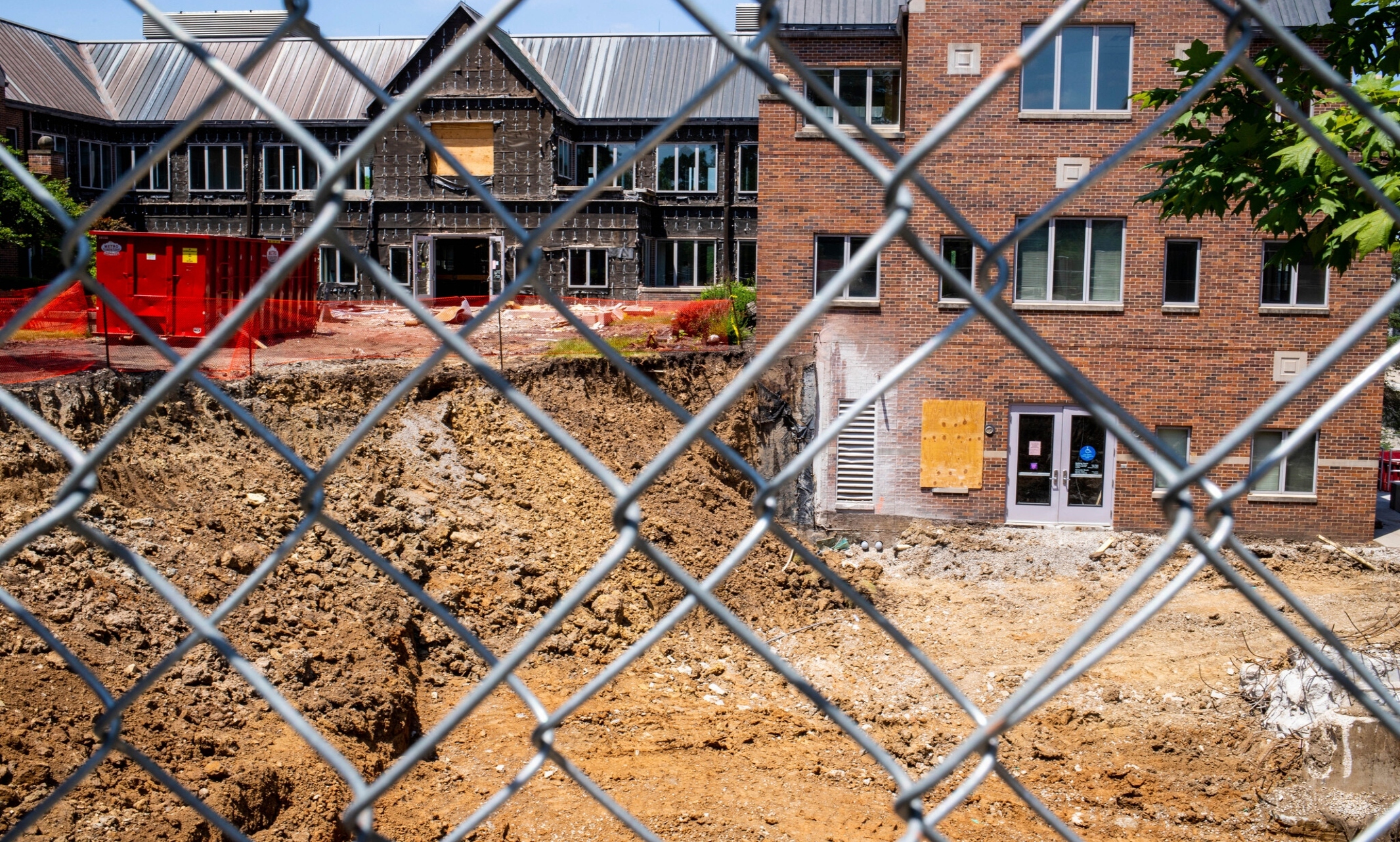
Been a while since you've been to campus? Brush up on these changes.
Construction or relocation, several UMKC buildings have seen updates over the last year. With virtual learning dominating 2020, here are some campus changes students might have missed:
Bloch Heritage Hall Construction
Construction is ongoing at Bloch Heritage Hall, the original home of the Henry W. Bloch School of Management.
The Bloch School received funding from both the Bloch Family Foundation and the Sunderland Foundation in 2019 for the renovations and technology updates at Heritage Hall.
The renovations and technology updates will help support advanced teaching methods and anticipated enrollment growth, bringing this essential space in line with the university's commitment to providing students with tools for their success.
While the state-of-the-art Bloch Executive Hall for Entrepreneurship and Innovation opened in 2013, Heritage Hall had previously not received any upgrades since 1986.
Heritage Hall incorporates the original Tudor-style Shields Mansion, built at the turn of the 20th century and an addition was completed in 1986.
Updates to Heritage Hall are slated to be completed this school year.
Miller Nichols Library Construction
Construction on the third floor of Miller Nichols Library is underway. The library is receiving upgrades for a digital humanities and digital scholarship center, in preparation for the relocation of the State Historical Society of Missouri, which is currently housed in Newcomb Hall.
University Libraries also received funding from the Sunderland Foundation and the Bloch Family Foundation in 2019 for the renovations.
Beyond being a resource for students and faculty, the Miller Nichols Library is a recognized resource for both historical and enthusiasts and professional researchers.
The At Ease Zone and Student Veteran Support Service Office was previously located in the Atterbury Student Success Center. Photo by Brandon Parigo
At Ease Zone and Student Veteran Support Office Relocation
The At Ease Zone and Student Veteran Support Services Office is now located in Room 310 of the UMKC Student Union. The offices were previously located in the Atterbury Student Success Center.
"The At Ease Zone moving into the Student Union is going to be a great fit for serving our student veterans," said Eric Gormly, assistant director of UMKC Student Veteran Support Services. "With the resources, activities and student organizations provided in this building, it should go a long way to help our student veterans feel like they are part of the Roo community."
Last month, Military Times ranked UMKC 70th in the country for being a 'best school' for military veterans, out of 366 colleges and universities reviewed. The publication mentioned the Student Veteran Support Services Office and the At Ease Zone and noted the university "values the qualities and strengths this student population brings to campus and the community."
Robert W. Plaster Free Enterprise and Research Center
While construction on the Robert W. Plaster Free Enterprise and Research Center, or Plaster Center, was completed and opened to students last fall, the center is still placing its finishing touches on the Innovation Studio.
Located on the second floor of the research center, the Innovation Studio will support research, innovation and entrepreneurship for the UMKC and Kansas City community, as members of the local engineering community will have access to the studio's resources.
The newest editions feature an augmented and virtual reality showroom and lab, a 3D printing lab and a fabrication studio that builds prototypes. The studio also features woodworking, metalwork, welding and laser cutting capabilities.
The studio is open to students now but is expected to be open to the public starting this fall.
Jul 09, 2021
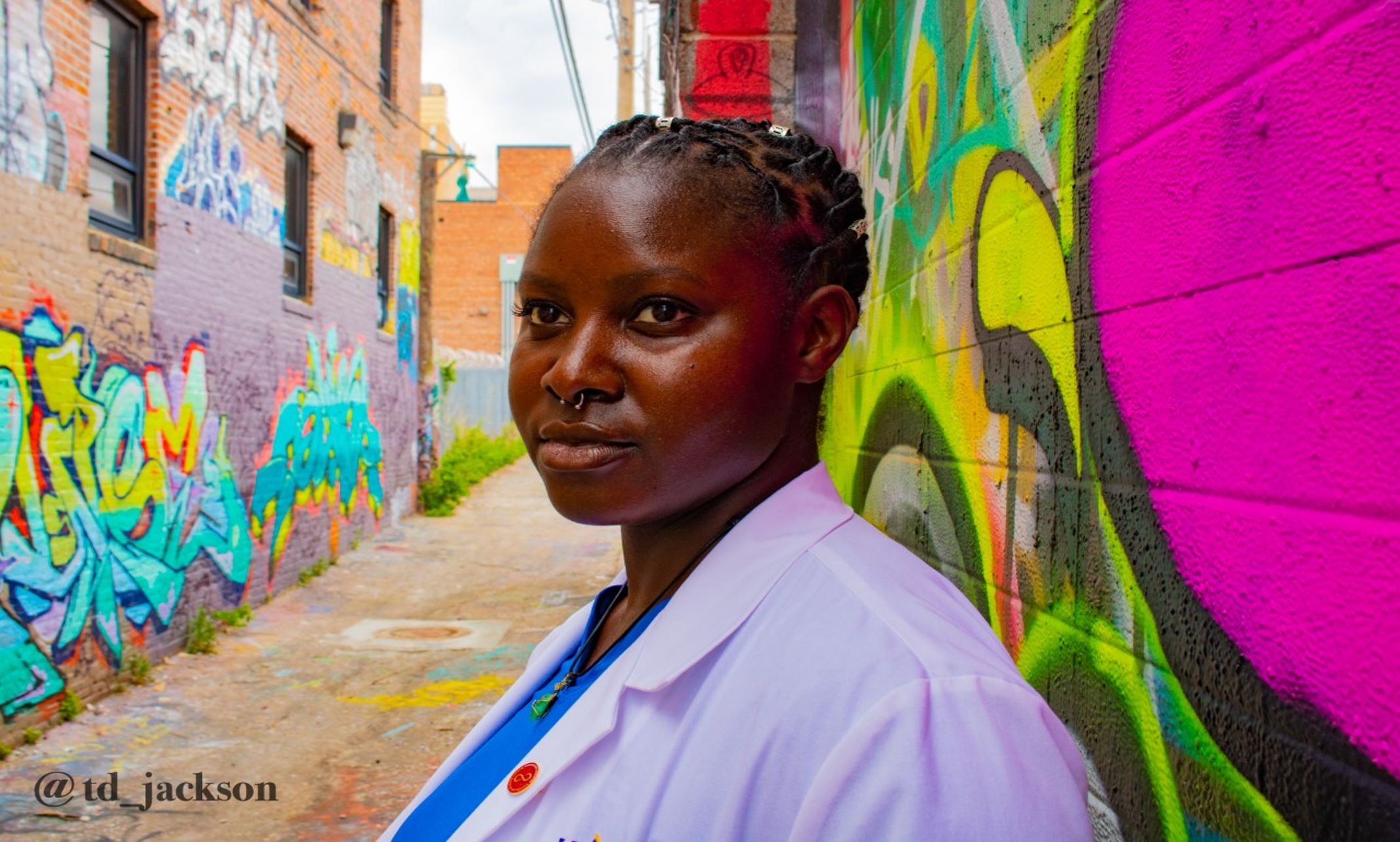
L.A. transplant Coco Ndipagbor, with help from an LGBTQIA scholarship, led her class in nursing school
Our ongoing story starts with people from around the world, converging here at UMKC. Get to know our people and you’ll know what UMKC is all about.
Coco Ndipagbor '21Academic program: Pre-licensure BSN, School of Nursing and Health StudiesHometown: Long Beach, California
Coco Ndipagbor describes herself as fearless and resilient, and it’s easy to see why. After earning a bachelor’s degree in global health from the University of Southern California, she could have stayed close to home and pursued a master’s in public health. Instead, she moved to a new city halfway across the country and distinguished herself as a leader in her class at the School of Nursing and Health Studies, becoming president of the Student Nursing Association chapter at UMKC.
She will return to the Los Angeles area in the fall, where a fulltime job as an intensive care nurse waits for her. To help finance nursing school, Ndipagbor applied for every scholarship UMKC had to offer. She landed a few, but one was especially meaningful: the LGBTQIA Leadership Scholarship.
What did you get from being an LGBTQIA Scholar?
The scholarship provided a chance to exemplify queer leadership. It was the first time that being Out and Proud funded part of my education. I also wanted to show queer UMKC students of color that they belong here. I joined the LGBTQIA Health District Alliance because I do believe that showing my pride will validate my patients and peers that I am here for them.
LGBTQIA issues are important because I love who I am and the community I represent, and I aim to create a space where we can feel safe. My little brother is a trans child, and I have had to step up big time to ensure his safety in a world that shows him otherwise. I want to uplift and empower queer youth because many of us grew up in families where the blasphemy of our existence prevented us from receiving the love and support we deserved.
The LGBTQIA community is underrepresented in the world of health care, and I want to be a part of a generation of providers that changes that. I intend to use my experience here in Kansas City to grow and thrive.
Why did you choose nursing?
I have been caring for people my whole life, and being able to do that as my profession brings me joy. I also love teaching people how to advocate for their health.
I wanted to diversify my education and my choices, too, and there are so many paths to pursue in nursing. I’m interested in anesthesia, and I knew UMKC had a Certified Registered Nurse Anesthetist program, which could bring me back here in a few years.
"The LGBTQIA community is underrepresented in the world of health care, and I want to be a part of a generation of providers that changes that." — Coco Ndipagbor
What did you learn about yourself at UMKC?
I have learned that I am fearless. I moved across the country to a place that I had never visited or known. I took the bus every day in the rain, cold or snow, and I worked 50 hours a week and still came up short financially. But I did not stop. I could not quit after coming so far, and I would do it all over again.
What do you admire most about UMKC?
I admire the dedication that many professors and administrators have for students. Once they found out that I was in KC alone, they opened their hearts and became my support system. It kept me going.
What is the best advice you received from a professor?
There is always something more to learn. Study to become a better nurse, not to pass a test. Always go with your gut, even if it goes against the grain.
Anything you will miss about Kansas City and UMKC?
I will miss the low cost of living, the clean streets and the nice Kansas Citians I encounter every day. I will miss the friends and family I made while at UMKC.
Jul 09, 2021
Reviews are in for Coterie Theatre production with UMKC students, faculty
Stephanie Roberts, UMKC associate professor, directs the cast of student actors from the UMKC Theatre Department performing as 306 Theatre Troupe. Read more.
Dragons Love Tacos Runs Through August 8 at Coterie Theatre - Broadway World - July 6
Dragons Love Tacos Warms a Coterie Crowd - The Pitch - July 8
Review: Dragons Love Tacos at The Coterie - Kansas City Parent Magazine - July 13
Jul 06, 2021
The Kansas City Star taps Stuart Hinds
Queer bars have been a part of Kansas City’s culture for decades, though they didn’t begin to gain visibility in Kansas City until the late ‘50s and early ‘60s, said Stuart Hinds, curator of the Gay and Lesbian Archive of Mid-America at UMKC. Read the article. (subscription required)
Jul 05, 2021
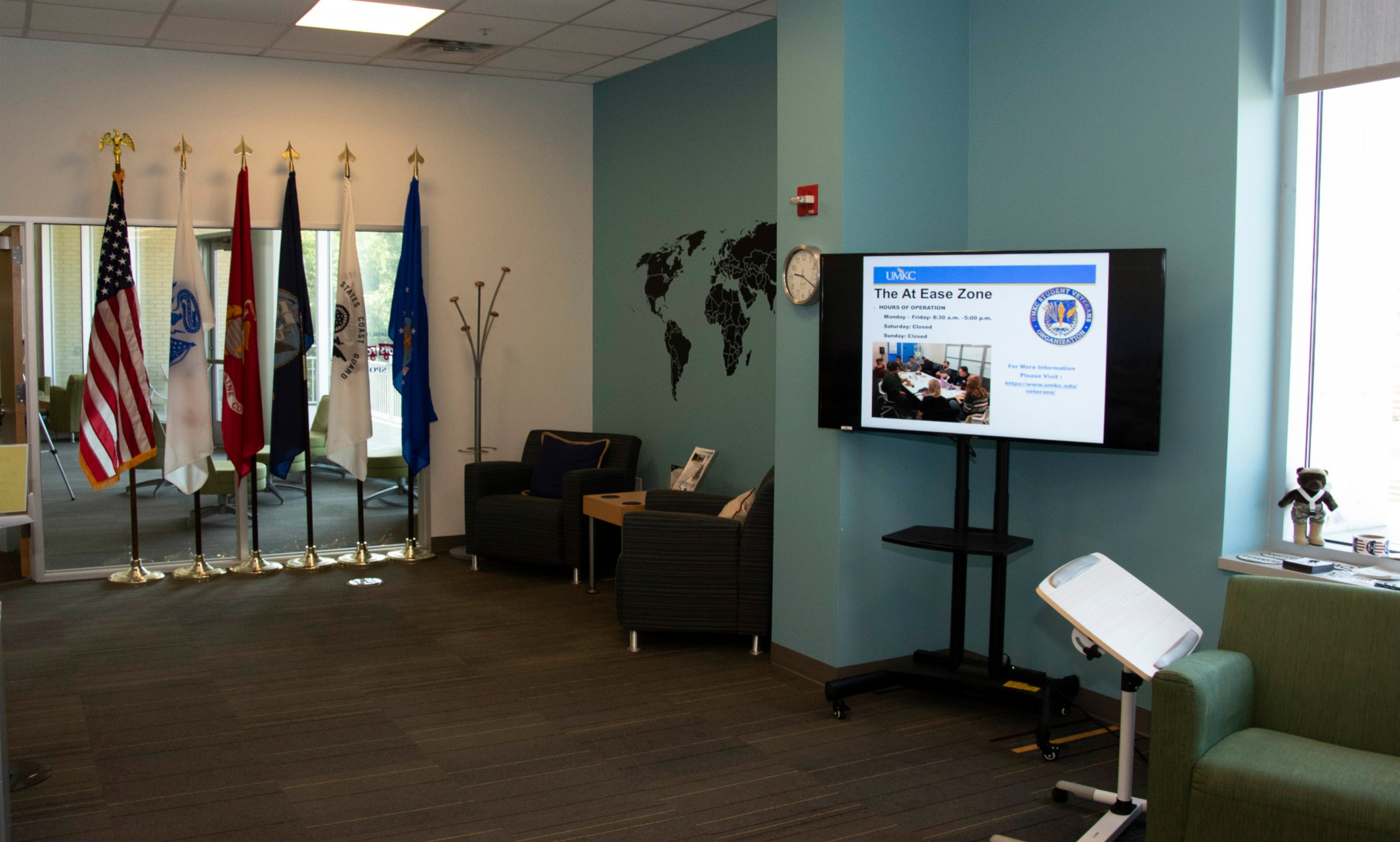
Military Times, Military Friendly® recognize UMKC
The University of Missouri-Kansas City has received two honors for being a veteran-friendly campus.
Military Times ranked UMKC No. 70 in the United States for being a best school for military veterans, out of 366 colleges and universities reviewed. According to the publication “2021 Best for Vets: Colleges,” “UMKC is the largest comprehensive, fully accredited university in the Kansas City area and has a 16:1 student-to-faculty ratio, which means professors know their students' names and take mentorship seriously.”
The publication mentioned the new UMKC Student Veteran Support Services office and At Ease Zone (Veterans Center) through which UMKC serves the student veteran and military population. The publication noted a UMKC statement that the university “values the qualities and strengths this student population brings to campus and the community, and has top-down support to ensure we are implementing best practices to show maximum support for the overall success of our student veterans.”
UMKC was also designated a 2021-2022 Military Friendly School. Military Friendly® is the “standard that measures an organization’s commitment, effort and success in creating sustainable and meaningful opportunity for the military community.”
Eric Gormly, assistant director for Student Veteran Support Services; and Debbie Kacirek, UMKC VA Certifying Official Student Veteran Support Services, are in the UMKC Student Veteran Support Services office. Photo by John Carmody.
“These two distinguished rankings go a long way as far as seeing how we match up to other institutions across the country,” said Eric Gormly, assistant director, UMKC Student Veteran Support Services. “With us not being on campus for most of this past year, I am excited for the student veterans to see just how welcoming the UMKC campus has become. Although many factors play into the ranking systems for student veteran programming, one crucial piece is having a one-stop shop for student veterans to seek out resources, build community, and make their presence on campus known, which we have in the new At Ease Zone in the Student Union. The top-down support has helped to achieve many goals that were envisioned that ultimately contribute to not only the academic success, but the all-around student success for these transitioning service members.”
The At Ease Zone and Student Veteran Support Services Office are located in Room 310 of the UMKC Student Union. More information about UMKC programs for veterans can be found online.
Jul 02, 2021
UMKC associate professor of political science co-authors Washington Post article
Benjamin Woodson, associate professor of political science at the University of Missouri at Kansas City, with a focus on political psychology and public opinion toward the judiciary, was a co-author of this article. Read the full article.
Jul 02, 2021
William Black talks to KSHB about Fourth of July cookout costs
“You can have a meal that’s much much cheaper than 60 bucks and feed 10 people,” William Black, associate professor of Economics and Law at UMKC said. Read the article and watch the newscast.
Jul 02, 2021
KCUR interviews Chris Garmon
“It would be really nice to know what the prices are,” said Chris Garmon, Assistant Professor of Health Administration at the Henry W. Bloch School of Management who previously worked on antitrust investigations at the Federal Trade Commission. Read more from KCUR.
Jul 01, 2021
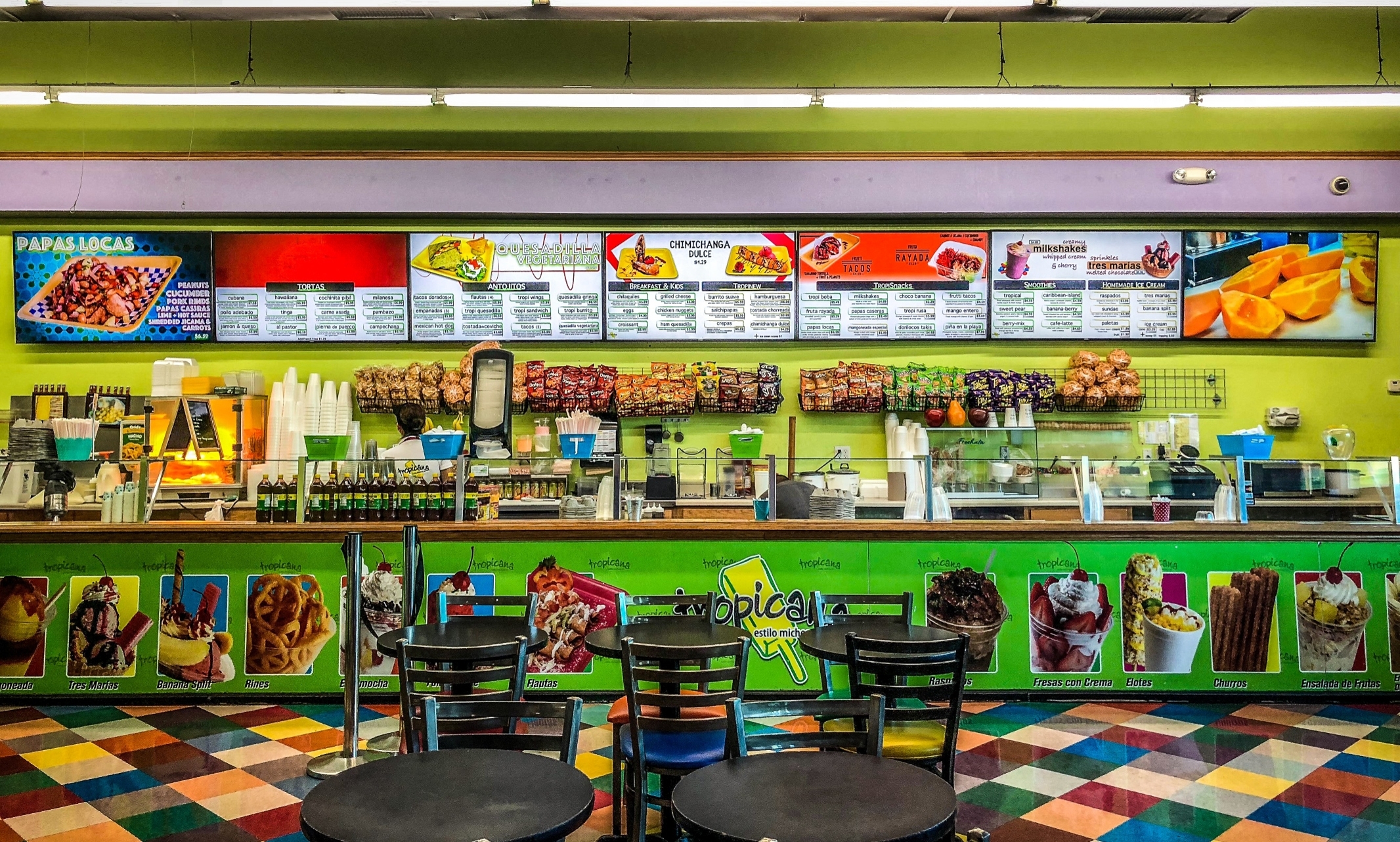
Ready to go out? Our students have suggestions on where to go
Kansas City has always been a food town, but COVID-19 has kept most of us dining on our cook-at-home favorites and carryout. As we are able to get out more safely, here are a few UMKC students’ favorite spots to eat.
Paleterías Tropicana
“My absolute favorite spot to eat in Kansas City is Paleterías Tropicana.” – Adriana Suarez '23, business administration
Since 2003, Paleterias Tropicana has served homemade authentic Mexican ice cream. From its original location on Kansas City’s westside, there are now five locations in the metropolitan area. While lime, mango and banana are safe bets, hibiscus, pineapple chile and tamarind with chile will delight the adventurous eater.
Town Topic
“I enjoy getting a burger and pie from Town Topic with my friends. We like taking our burgers and pies to go so that we can enjoy our food while overlooking the Kansas City skyline near the World War I Memorial.” – Emily Wesley '21, biology
Town Topic is a Kansas City tradition. Open 24 hours a day with three locations – two of which are basically around the corner from one another – this is a go-to for smash burgers and breakfast for both locals and newbies.
Wings Cafe
“Wings Café is one of the best places in the city for chicken wings by far. Go there and tell me I’m wrong.” – Brandon Henderson '21, political science
Convenient to both campuses, Wings Café, a family-owned restaurant in Westport, serves bare wings, boneless wings and breaded wings, but their selection doesn’t stop there. Fish, shrimp and chicken are also options as well as the opportunity to mix things up with a “combo.”
Tiki Taco
“Go! You’ll thank me later.” – Jonaie Johnson '22, business administration
Tiki Taco bills itself as “your chill neighborhood taco shop dishing out yummy California-style Mexican fast food.” “Chill” is the key word as Tiki Taco has a cool laid-back vibe. Plenty of options for vegetarians, too, with creative tacos featuring jackfruit or mushrooms along with more standard options of avocado and “mean” bean.
Chai Shai
“My favorite so far has been Chai Shai. My roommate wanted me to try Pakastani food for the first time, and she took me there.” – Marlena Long '25, medicine
Tucked into a quiet neighborhood just south of the Volker campus, Chai Shai offers a variety of dishes that often lend themselves to sharing. Spices such as cumin, cardamom, star anise and turmeric delight – but do not overwhelm – the senses.
Jul 01, 2021
Local news about UMKC Master Plan
The University of Missouri-Kansas City plans to build apartments along the extended streetcar route, which is slated to be finished in 2025. Read the news articles:
Kansas City Business Journal - June 30, 2021 (subscription required)
Flatland - June 30, 2021
Jun 30, 2021

UMKC students excited about returning to pre-pandemic life
After spending the last year distanced, virtual or masked we're looking forward to returning to normal campus life in the fall. Here's what a few of our fellow Roos had to say.
Being back on campus
"I'm looking forward to finally being back on campus and interacting with my fellow Roos!"
-Krithika Selvarajoo '21
Karl Manoza and other students pictured at an event promoting mental health awareness held by the student organization Asian Students in America.
In-person events
"I'm most excited about attending in-person events that organizations host throughout the year. I remember my freshman year in 2019: events were so much fun, and I met some amazing friends along the way. I am part of many student organizations on campus and I really enjoy being involved in the UMKC community and participating in a multitude of events."
-Karl Manoza '23
Marcus Thieu and two other students celebrate UMKC Commitment Day. Photo by Brandon Parigo
Walking to class
"As simple as it sounds, I've missed the ability to enjoy the fresh air while walking around campus. Walking between campus buildings is a basic luxury I've missed after spending this last year on Zoom."
-Marcu Thieu '22
Feeling connected
"When I'm in-person for school, I feel so strongly connected to my community. I look forward to getting that feeling of connection back! I look forward to sitting with small study groups in the library in-between classes and coffee dates with my friends on campus."
-Kylie Bias '23
Meeting old friends, making new
"I cannot wait to study with my friends at the library. Every time I am there, I run into someone old and someone new. We start by catching up or sharing what we are studying. Then, that turns into a minutes-long conversation with not much studying but that's what college is about — meeting people from all over."
-Ansel Herrera-Garcia '23
Jun 28, 2021
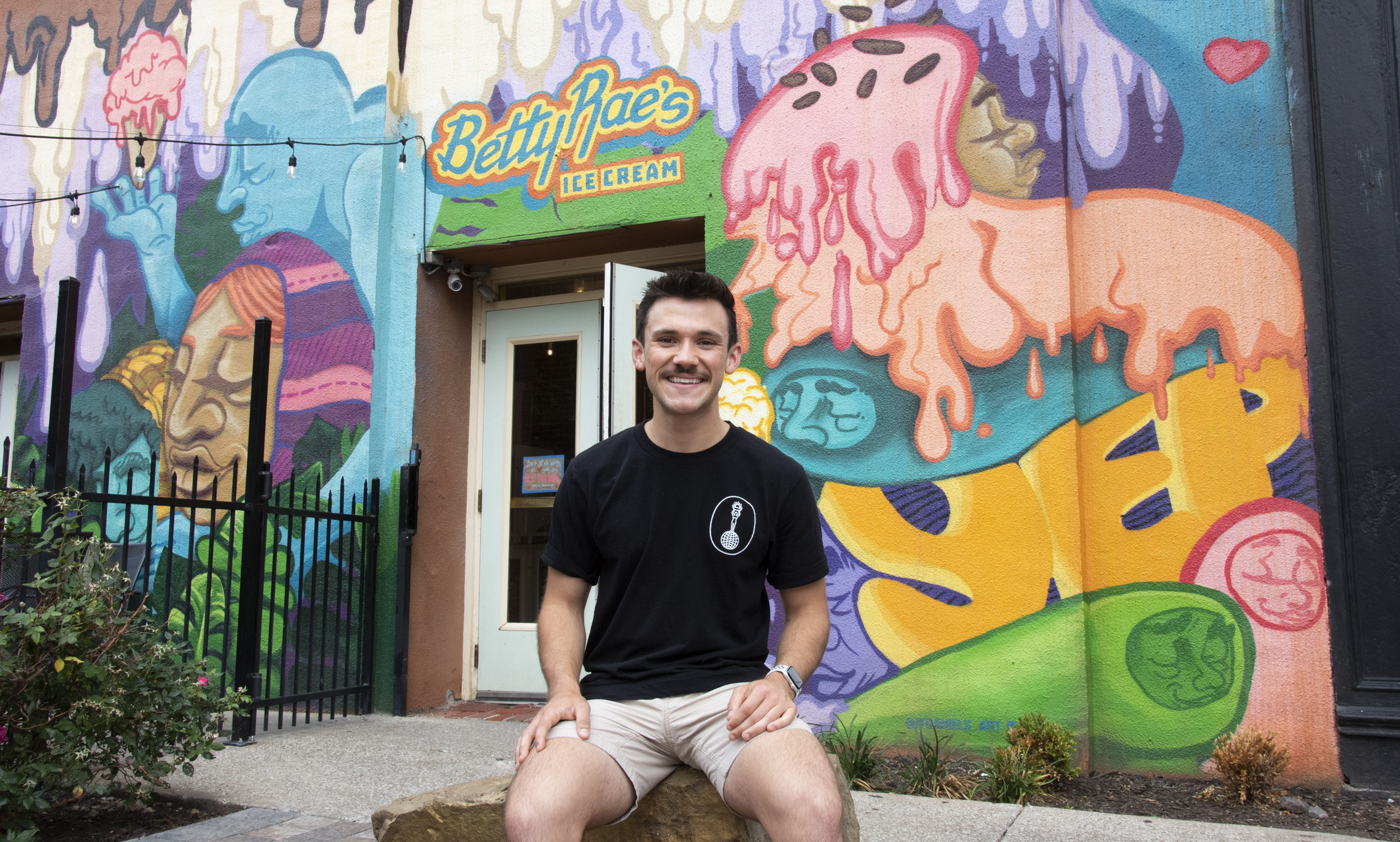
UMKC alumnus purchases popular local business
Roos are, in fact, everywhere. Sometimes, they’re in our own backyard making cool treats in the summer heat.
Alec Rodgers (’20) graduated from the Henry W. Bloch School of Management in Entrepreneurship and Finance and shortly thereafter found himself owning a Kansas City staple for ice cream: Betty Rae’s. We caught up with Alec for the full scoop on how his UMKC education prepared him for such sweet success.
What is your history with Betty Rae’s? What led you to become the owner?
It was junior year. I realized I’d be graduating the next year and wished I had a more fun job; enjoyed life a bit more. I was doing 60 hours a week, 18 credit hours. It was a lot. My mom went to a shaved-ice truck up north, and they were serving Betty Rae’s ice cream. She brought it home and said “The lady there said they might be hiring.” I said “Well, that sounds like a fun job.” David, then the part-owner, posted a photo of the new wallpaper that day, in the River Market location. I thought it was awesome wallpaper. I knew, whoever that was, I wanted to work for him. I met him the next day, and within the first month I could tell it was so different there. It felt like a family. I was going there to do homework and hang out; making waffle batter at 9 in the morning, just to be there. Everybody wanted to do that, too. I wanted to stay here the rest of my life and scoop ice cream, but I was studying finance and entrepreneurship. I graduated, started working for another company, and in February David and Mary approached me about buying the shop. I immediately said yes and put my two weeks in. It’s been fun.
Alec and the wallpaper that started it all.
What’s your UMKC story?
I actually started at Mizzou. The campus is beautiful. My friends there were amazing. It just wasn’t the culture I wanted, and I quickly realized that. After three weeks, I told my parents “I think I’m going to come home at semester and go to UMKC.” That was a big step for me, personally. So, I came to Kansas City to start at UMKC and loved it. Coming back here was the best decision I ever made. Sophomore year, I moved to England for six months, serving with youth there. It was a lot of fun. I took classes online while doing that, which again was the total opposite of what I thought I wanted to do. I was going to be done in four years, maybe three. Anything that got in the way of that was a distraction. And again, it was one of the best decisions I made. I learned a lot about myself and about people. I came back junior year and finished out here.
Were you involved in any extra-curricular activities?
Enactus was my main extra-curricular. I loved it. Working at the Regnier Institute for Entrepreneurship and Innovation kept me busy, but it also kept me involved in so many things here on campus and in the city. I would help with the Venture Hub and a few other services Regnier provided.
Betty Rae scoopers hard at work.
How did your UMKC education prepare you for your career?
Well, the thing I hated the most was group projects. Seriously. I knew I’d get stuck with the work of someone else the night before because they aren’t ready. Expectations wouldn’t match. Some peoples' were way up here and others were down here. That said, those experiences have served me more than anything else. Plus, getting to make connections here in Kansas City, going to school here and staying here, you foster a lot of relationships that I wouldn’t have had staying at Columbia. That’s been a huge advantage. The professors here were and are amazing. I still talk to them. I just texted one yesterday. I feel like that’s hard to find, because on a larger campus, you’re a number, which makes sense. They can’t be close to everyone. Here you’re in class of 25-40 people. You know the professor, and they know you. You get to learn from them not only as an instructor, but a person, too. It was awesome.
One more hard-hitting question: What is the best ice cream flavor?
We have rotating flavors and we have stationary flavors. My favorite rotating flavor, my favorite flavor of them all, is the Joe’s Burnt Ends. Stationary, I have to go for Goat Cheese, Apricot and Candied Walnut.
Alec shows off his favorite flavor of ice cream, featuring Joe's KC's burnt ends.
Jun 28, 2021
Assistant professor of geosciences lends her expertise
“Because of the position of Dotsero being on the edge of the Colorado Plateau, there’s a possibility for future eruptions, but it’s much lower than in places like the Caribbean, where we know that magma is being made at depth regularly,” Alison Graettinger, assistant professor of geosciences at the University of Missouri-Kansas City, told Denver7.
Jun 25, 2021
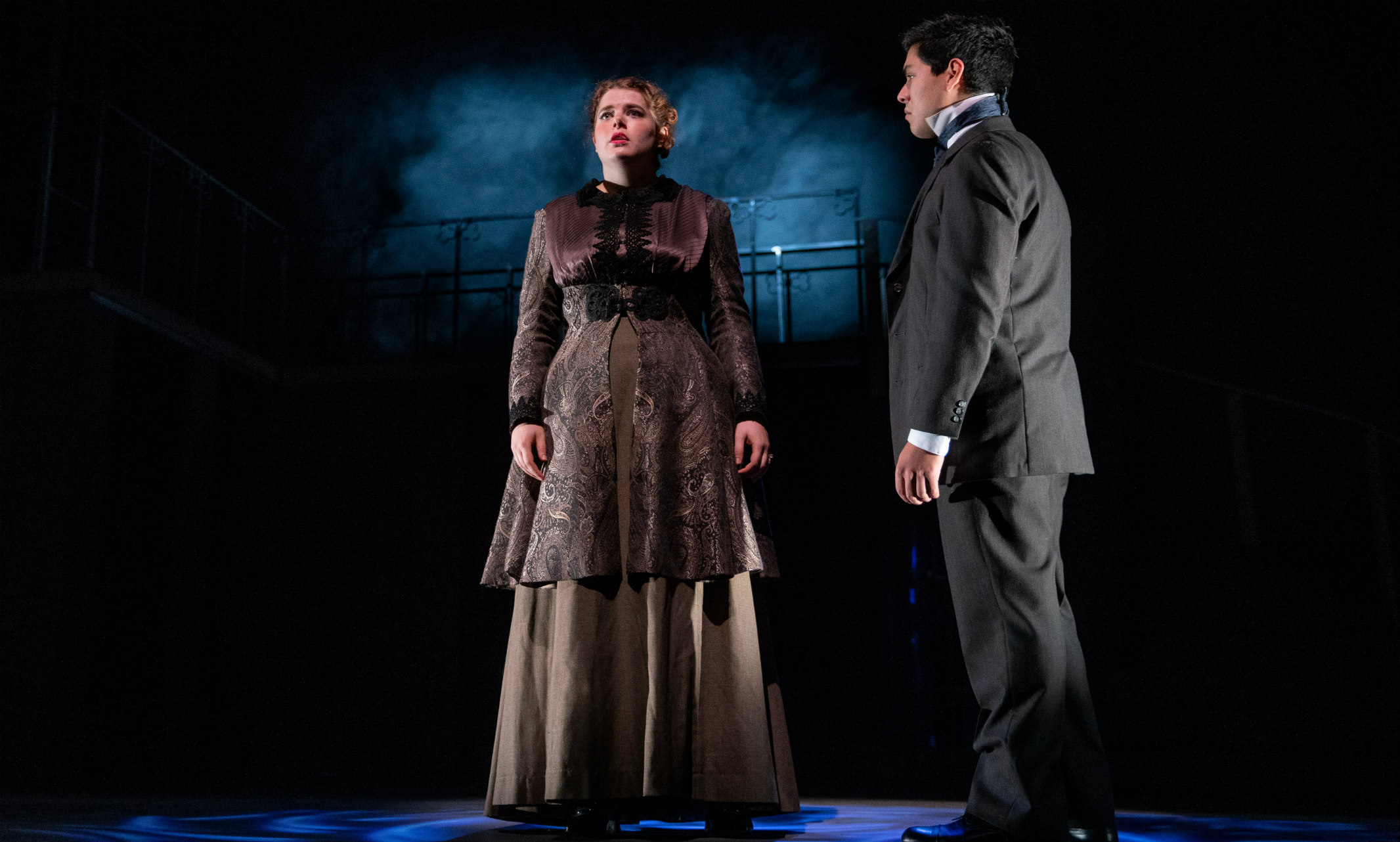
Master of fine arts program consistently recognized as one of the best performing arts schools
The Hollywood Reporter’s recent rankings have the University of Missouri-Kansas City Theatre graduate program among the top 25 in the U.S. for top dramatic and performing arts schools for the second year in a row.
According to The Hollywood Reporter, the publication consulted with academics, influencers and alums to rank the top 25 master of fine arts acting programs. In the article, the publication ranked UMKC 23rd, up one spot from last year, and highlighted UMKC for bringing theatre, music and dance departments under one roof: the UMKC Conservatory.
For the fourth year in a row, The Hollywood Reporter has also included UMKC Theatre in its list of Top 10 Costume Design schools. UMKC Theatre offers a single comprehensive M.F.A. degree in costume design and technology, which has been key to its success. Students learn many skills including drawing, painting, sketching and learning how to construct a garment with techniques in fabric manipulation, millinery, tailoring and pattern drafting.
“This is a true testament to the long history of the program, the work the of the tremendous faculty, staff, students and alumni have been able to do over the years.,” said Ken Martin, Patricia McIlrath Endowed professor of Theatre and chair of UMKC Theatre. “As we move forward, grow and change, we expect to build on our reputation of excellence, and to continue to help bring young artists into the world of acting, design, management and technology.”
Martin was named chair of the UMKC Theatre Department when it merged with the Conservatory in 2019. The merger was a natural alignment: the two programs share a long history of collaboration, a physical space, a teaching model featuring intensive hands-on training for students while they gain analytical skills taught by professional performing artists, a professional-school focus, a strong national reputation, a spirit of civic engagement and a supportive philanthropic audience.
In addition to its on-campus partnership with Kansas City Repertory Theatre, this year the program continues to partner with Unicorn Theatre, Coterie Theatre and Kansas City Actors Theatre, featuring MFA and Bachelor of Arts acting students in major professional roles.
Alumni include Nick Gehlfuss of “Chicago Med,” Patrick DuLaney of “Harry Potter and the Cursed Child” on Broadway and Toccara Cash of Broadway’s “The Play That Goes Wrong” and “Half Me, Half You” at London’s West End.
Jun 24, 2021
Local media celebrate UMKC alumna's return to Olympics
Courtney Frerichs. UMKC alumna from Nixa, Missouri, qualified for her second straight Olympics in her signature event, the 3,000-meter steeplechase, late Thursday at the U.S. Olympic Trials in Eugene, Oregon. Read more from The Kansas City Star, which was picked up by the Marietta Daily Journal.
More headlines:
Naive and Scared No More, UMKC’s Courtney Frerichs Poised to Medal at Tokyo Olympics - The Kansas City Star (subscription required)
Nearly A Dozen Kansas City Area Athletes Will Compete At Tokyo Olympics - Fox4KC
UMKC Alumna Courtney Frerichs Qualifies for 2020 Tokyo Olympics - KSHB
Jun 24, 2021
Kansas City performing arts media highlights UMKC Conservatory students in Apprentice Artist Program for the 2021-2022 season
The artists for the Apprentice Artist Program for the 2021-2022 season include UMKC students Soprano Amy Stuart-Flunker and Mezzo-Soprano Katarina Galagaza. Read the story in The Pitch. This was also covered by KC Applauds.
Jun 24, 2021
KSHB taps Ann Marie Marciarille
A Missouri judge determined that the voter-approved Medicaid expansion amendment not only omitted how the expansion would be paid for, but that people don't have the power to tell the legislature how to spend the state’s money, according to Ann Marie Marciarille, UMKC School of Law professor. Read the full article and watch the newscast.
Jun 23, 2021
Ken Novak explains the case for KMBC
Ken Novak, a criminal justice and criminology professor at the University of Missouri-Kansas City, said he also learned about the case this week. “There are too many different people, innocent people, who would have their information and data captured by the government,” Novak said after reviewing details of the case. “The risk wasn’t worth the reward.” Read the story and watch the newscast.
Jun 23, 2021
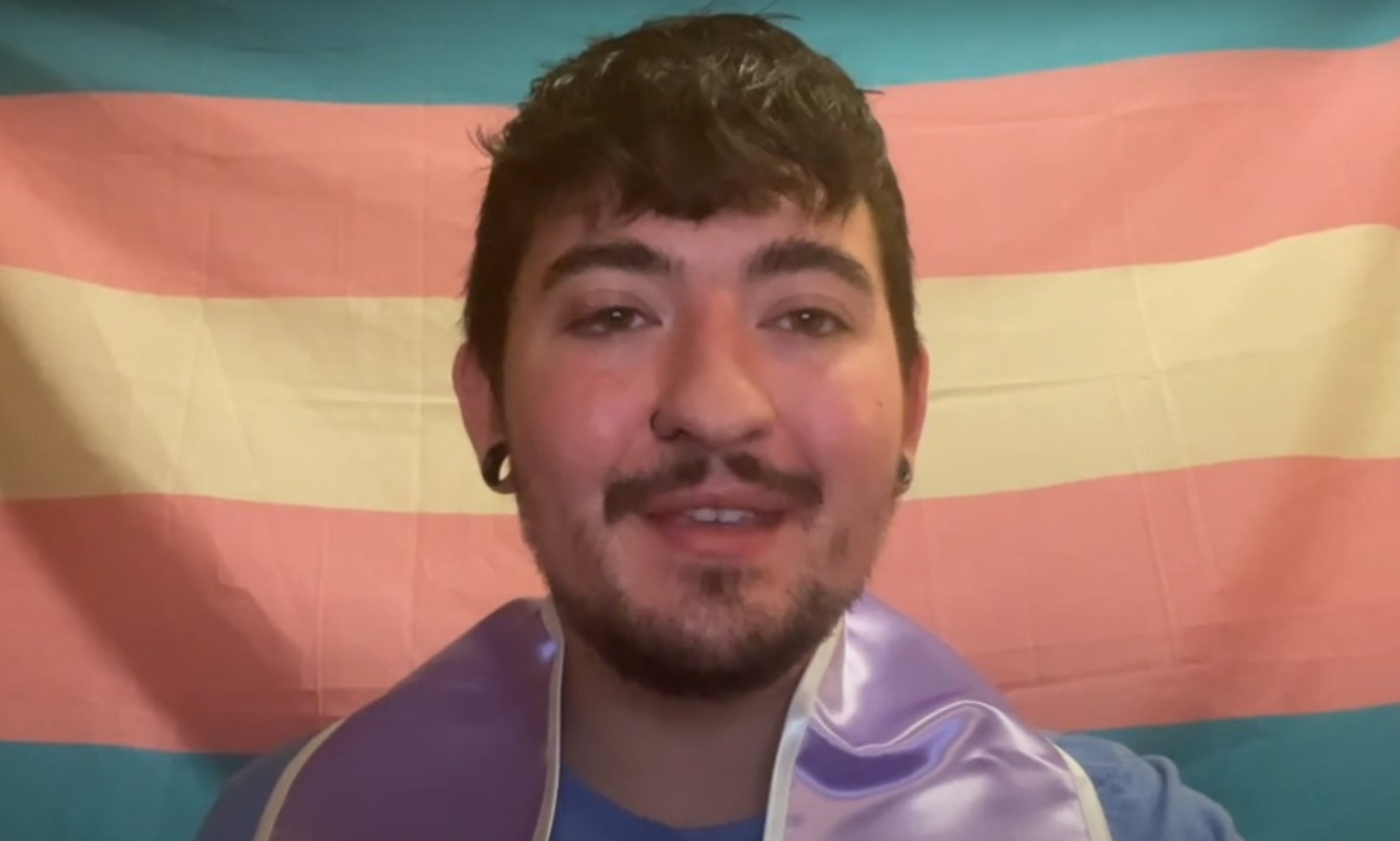
UMKC celebrates 17th annual Lavender Graduation and Pride Awards
Students, faculty, staff and alumni were honored during the University of Missouri-Kansas City 17th annual Lavender Graduation and Pride Awards Celebration.
“While this year has certainly been unconventional, it’s all the more reason for us to celebrate the accomplishments our incredible students have,” Kari Jo Freudigmann said in her welcome address.
Freudigmann is the assistant director for LGBTQIA Programs and Services in the Office of Student Involvement. The department organizes the annual banquet, which took place virtually on May 5 this year due to COVID-19.
“At its foundation, the Lavender Graduation ceremony celebrates the achievements of graduates across the spectrum of sexual and gender diversity,” Freudigmann said.
The event celebrates LGBTQIA graduates and Pride Award recipients. The awards recognize members of the UMKC community who have contributed to the betterment of the LGBTQIA community through education, support, programming or activism.
“These recipients have demonstrated not only a commitment to LGBTQIA equality, but represent a challenge for us to continually do better as a community, fulfilling our commitment to social justice,” Freudigmann said.
Kole Keeney (B.S. Computer Science ‘21) was the celebration’s keynote speaker. Keeney said when he was introduced to UMKC’s LGBTQIA programs and services four years ago, he “had no idea the opportunities it would lead to.”
“When I first came out as trans(gender) in my small town, I was afraid I was doomed to a life of hardship and loneliness, but once I set foot in the rainbow lounge, I realized that life still had the potential to be the exact opposite — to be filled with love, acceptance and most importantly, rainbows,” Keeney said during his speech. “Always remember that you make the world a better place, not in spite of who you are, but because of who you are.”
Outstanding Faculty & Staff Award, recognizes LGBTQIA, or allied facility and staff, who have contributed to a positive campus climate for LGBTQIA individuals.
Alberto Villamandos, Ph.D., associate professor and chair of the Foreign Languages and Literature Department. Villamandos has changed the curriculum of undergraduate and graduate Spanish classes to include more queer people of color in readings. He also has open conversations in the classroom about intersex, lesbian, gay and bisexual liberation.
Jim Wanser Award, recognizes individuals who have volunteered hours of service to the UMKC LGBTQIA community or greater Kansas City LGBTQIA community.
Bridget Wray is the publicity chair of the Sexuality and Gender Alliance Council and has provided leadership both on campus and in the greater Kansas City community. She helped develop Kansas City’s first LGBTQIA job fair, which featured over 25 employers and had over 300 attendees.
“Always remember that you make the world a better place, not in spite of who you are, but because of who you are.” — Kole Keeney
Outstanding Alumni Award, recognizes one UMKC alumnus who works toward fostering an inclusive community at UMKC, or in the community in which they live and work.
Samantha Ruggles holds a nonprofit management degree from UMKC and is the former Executive Director of the Kansas City Center for Inclusion. During her time at KCCI, she turned Kansas City’s only queer center into a well-known establishment. Under her leadership, KCCI was able to build community partners, host multiple weekly events and host queer proms.
Collaborative Excellence Award, recognizes departments or campus organizations whose collaborative efforts have resulted in important resources and services for LGBTQIA students, faculty, staff or community members.
Kim Kushner and the New Student and Family Program in the Office of Student Involvement. Even in the last year amid COVID restrictions, Kushner and her office connected LGBTQIA students with campus resources. She has done this through numerous tabling events in the Student Union, as well as through The First Semester Experience.
LGBTQIA Student of the Year, recognizes one student for outstanding leadership, dedication and service within the university of in the community.
Elise Byers (’21), a School of Education graduate, served as Secretary of the Sexuality and Gender Alliance Council. The organization, which she previously served as Vice President, works to foster an environment of respect and appreciation around issues of diversity, including race, gender, ethnicity, social justice, sexual orientation, gender identity and expression. She was described by her nominator as “an advocate both inside and outside of the classroom.“It’s really nice to celebrate this and feel loved and safe, to feel comfortable and just proud,” Byers said. “I really loved being a part of UMKC and all of the queer groups on campus, which have been so welcoming and exciting to be a part of.”
All graduates were given a lavender stole to wear at commencement, which took place the weekend of May 15-16.
Jun 23, 2021
Experts in mobility, climate and food waste share their knowledge
Three UMKC alumni who work at high levels in the sustainability field around the globe participated in the 10th Annual Sustainability Research Symposium this year.
The guest speaker panel featured College of Arts and Sciences alumni Rebecca Karbaumer (’06), James Mitchell (’13) and Penny Harrell (‘16).
Karbaumer is the mobility director for the City of Bremen, Germany and a promoter of mobility across the European Union. She is responsible for implementing Bremen’s Car-Sharing Action Plan and coordinating the Interreg North Sea Region project about shared mobility called SHARE-North.
Mitchell, a director at the Center for Climate-Aligned Finance and a principal at the Rocky Mountain Institute, is from London, England. He led the development of the Poseidon Principles, which launched in June 2019 as the first global climate-alignment agreement for financial institutions.
Harrell is a local graduate serving in the Environmental Protection Agency. Food waste is her specialty, and she organizes the Sustainable Food Management Summit at Wichita State University.
99 students submitted projects for the symposium. Those projects can still be viewed online.
Jun 23, 2021
Kansas City Star includes the performance “Dragons Love Tacos” by the Coterie and performed by UMKC Theatre’s 306 Theatre Troupe
The Coterie will present “Dragons Love Tacos,” performed by UMKC Theatre’s 306 Theatre Troupe, outside in the Crown Center Square’s Entertainment Pavilion, opening at 10 a.m. June 30 and running through Aug. 8. Tickets ($12-$15) and more information are available at thecoterie.org. Read more. (subscription required)
Jun 23, 2021
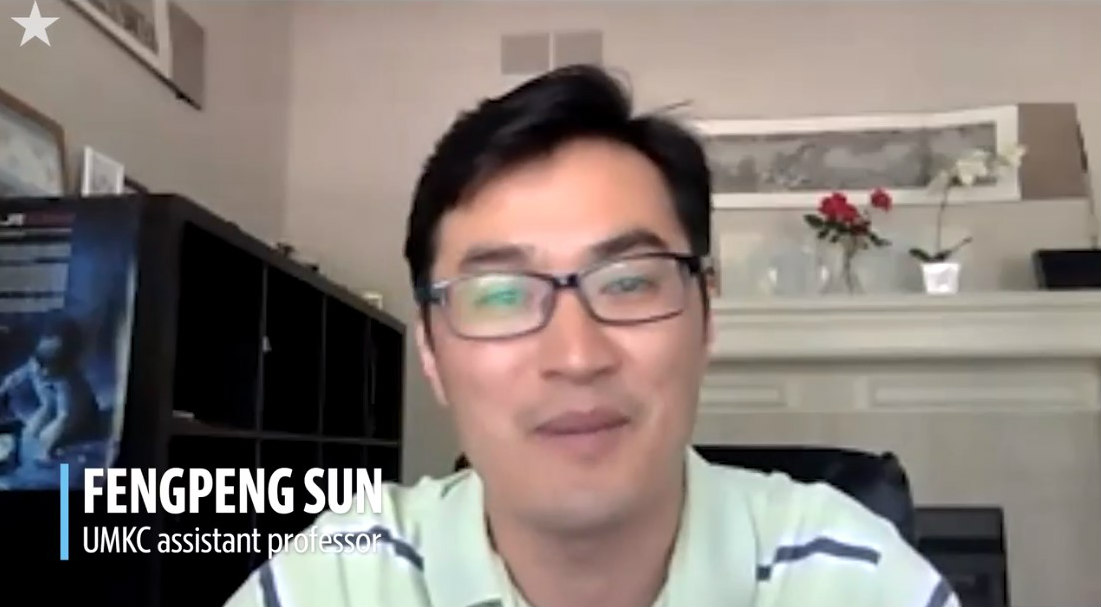
The Kansas City Star talked to Fengpeng Sun, UMKC Department of Earth and Environmental Sciences assistant professor
Summer heat can be deadly and some populations are at more risk because of their location.
“We want to show and study how the excessive warming pattern is distributed across our backyard in the KC metro area,” said Fengpeng Sun, assistant professor with the University of Missouri-Kansas City Department of Earth and Environmental Sciences, which is leading the campaign to find out where those heat islands exist in Kansas City. Read the full story. Watch the video. (subscription required)
Jun 23, 2021
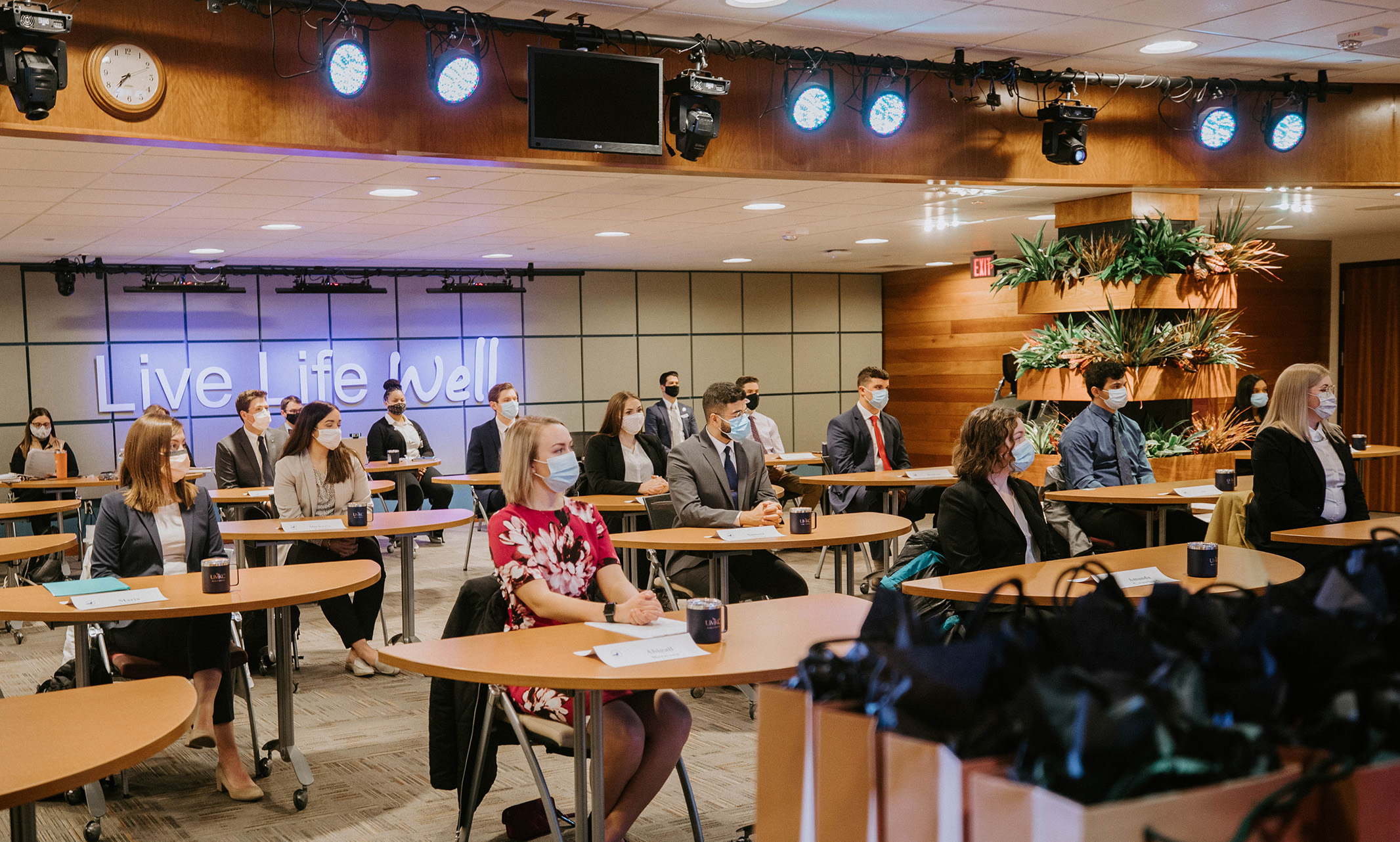
Entire class of UMKC med students has been certified and volunteered to give COVID vaccines.
It didn’t take long for the inaugural class at the UMKC School of Medicine’s new St. Joseph campus to make an impact on rural medicine.
January, as the COVID vaccines were ramping up, the entire class of 20 UMKC medicine students at Mosaic Life Care in St. Joseph took up the charge to become fully vaccinated vaccinators themselves. For their efforts, the Patterson Family Foundation, a Kansas City family-led foundation promoting rural health care, awarded the school and Mosaic a $15,000 gift to use in recognition and support of their rural medicine vaccination efforts.
“A lot of individuals as well as the medical centers they work for really put a lot of resources, time and energy into getting the (rural) population vaccinated,” said Steve Waldman, M.D., dean of the school’s St. Joseph campus. “This is a very gracious gesture from the Patterson Family Foundation in recognition of the Mosaic-UMKC School of Medicine partnership and our efforts working in tandem to get the rural community vaccinated.”
The School of Medicine opened the St. Joseph campus in January in an effort to address the need for more rural physicians. Waldman said nobody realized just how quickly the effort would begin paying dividends.
UMKC students at Mosaic were only weeks into their medical school training when they became certified to administer vaccines and joined the volunteer effort to reach rural patients. They even administered shots to members of the school’s faculty as part of their vaccine training.
“The vision of the St. Joseph campus to increase additional rural health care providers was achieved and it occurred just a few weeks into the start of classes,” Waldman said. “In partnership with Mosaic Life Care, 100 percent of our students were trained as vaccinators and 100 percent of them volunteered to administer COVID vaccines. We didn’t have to wait four years for our students to start giving back. It happened immediately."
Davin Turner, D.O., chief medical officer at Mosaic Life Care, said: “The students from UMKC School of Medicine were an amazing resource for Mosaic and their contribution was invaluable. We were honored to work side by side with the students as they assisted with our vaccination efforts. We could not have administered the more than 47,000 first and second doses without their tireless efforts. To have them part of our Mosaic community has been an immediate benefit, and we can’t thank them enough. We are grateful others such as the Patterson Family Foundation recognized their efforts as well.”
The gift from the Patterson Foundation will be used to reward and recognize those who gave their time and in some cases took the risk early on to volunteer before being fully vaccinated.
Waldman said part of the funds would also go to training additional vaccinators.
“Hopefully they’ll never be needed, but we’re excited about being a lot more prepared,” he said.
Jun 22, 2021
Fox4KC reports on new breast care center led by UMKC alumna
Amy Patel, medical director of the new Breast Care Center at Liberty Hospital, is a UMKC School of Medicine alumna and assistant professor of radiology. Read the story and watch the newscast.
Jun 22, 2021
UMKC Conservatory student is one of 35 fellows mentioned in Broadway World article
Mark Bonner Jr., graduate assistant and doctoral candidate at the UMKC Conservatory, clinician and arranger, was chosen as a fellow for the 2021 Future of Music Faculty Fellowship Program.
Jun 22, 2021
David Bamberger, UMKC professor of medicine, weighs-in on vaccine and shingles
People often feel the pain before the rash breaks out, said David Bamberger, professor of medicine at the University of Missouri-Kansas City and chief of infectious diseases at Truman Medical Centers/University Health. The Kansas City Star story was picked up by MSN Canada.
Jun 21, 2021
KSHB taps Allen Rostron, School of Law professor
“So a lawsuit has been filed saying you need to follow through on what the Missouri voters ordered you to do,” Allen Rostron, a law professor at UMKC, said. “They set the direction for this and you have to follow their instruction. The state, the attorney general’s argument, is basically saying, ‘no we don’t have to because it’s up to us to make the decision about the appropriation of money to pay for it.’” Read the story and watch the newscast.
Jun 20, 2021
The Hollywood Reporter again ranks UMKC Theatre
UMKC Theatre was No. 23 on the list.
Jun 19, 2021
Missouri Ag Connection interviewed Dean Kevin Truman about roundtable events aimed at strengthening Missouri’s manufacturing sector
Missouri manufacturers, chambers of commerce and business and economic development organizations will team up with University of Missouri System researchers over the next 18 months in a series of roundtable events across the state aimed at strengthening Missouri’s manufacturing sector. The roundtable effort recognizes that these smaller manufacturers can have an outsized impact on the overall economic health of smaller, rural communities, said Kevin Truman, dean of the UMKC School of Computing and Engineering and a member of the core Consortium grant team. Read the full article.
Jun 18, 2021
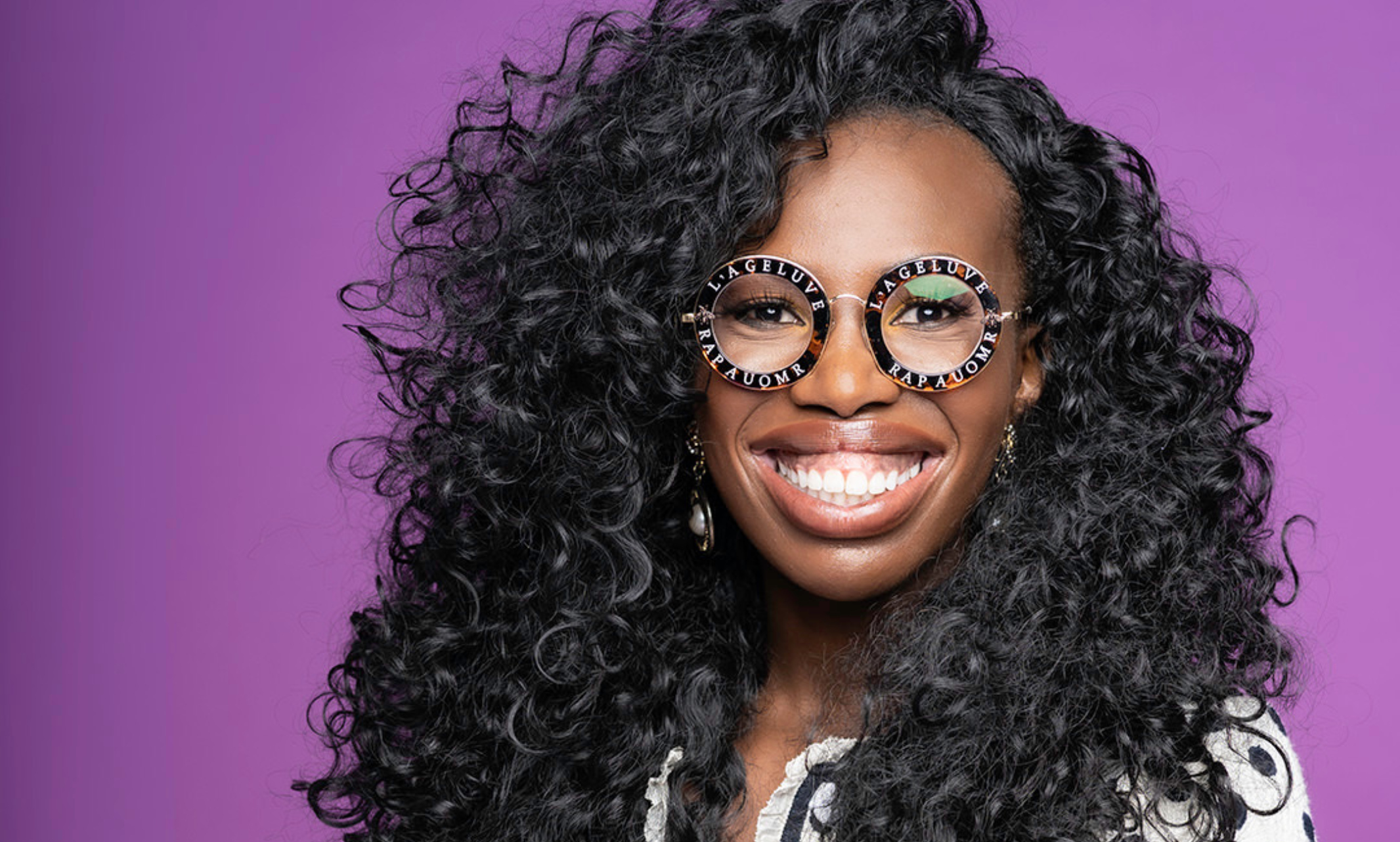
Physician Maria Uloko, M.D. (’15), a graduate of the School of Medicine, produces a popular podcast spotlighting people of color succeeding in STEM...
At first, Maria Uloko (’15) was proud of the looks of surprise, joy and comfort on the faces of people of color when she walked into a hospital room, and the patients saw a physician who looked like them. Soon, however, she began to question a society that still views Black physicians and scientists as an anomaly.
The situation made her angry, but after the murder of George Floyd last year, her anger hardened into resolve. She had been thinking about starting a podcast to highlight the achievements of people of color in STEM fields, but that summer, “someday” turned into “now.”
She launched “Battle Cry,” a podcast highlighting leaders of color in science, technology, engineering and medicine. On the podcast Twitter page, she proclaims, “We are here, we persevere, we resist then repeat.”
Today, Uloko practices urology at San Diego Sexual Medicine. Here are excerpts from a recent conversation with her.
When did you launch Battle Cry and why?
I started Battle Cry in the Summer of 2020 in the aftermath of the George Floyd murder. I had always had the idea of creating a storytelling podcast that tells the stories of BIPOC (Black, indigenous and people of color) in STEM and who they were. Often in these spaces, our voices and narratives are drowned out to fit into an institution that historically excluded us. With the rigorous training schedule of a surgical resident, it always felt more like a future project that I would do later in life. But after that horrific event, the urgency of creating something to reclaim my voice was pronounced. So, I just dove in and stopped worrying about perfection because the mission was so much greater than the need for perfection.
Why is spotlighting people of color working in STEM important to you?
I am the first of many in spaces that were never intended for me. I was the first woman from UMKC School of Medicine to match into the competitive field of genitourinary surgery (urology), the first Black class president there and the first Black woman to graduate from the University of Minnesota urology department. I wear those titles with a mixture of pride and pure exhaustion.
I lead with my race and identity because it is something I cannot separate myself from – nor would I want to. It is the first thing patients see when I enter a room and is oftentimes what defines our interaction.
During my medical training, I started noticing that every time I walked into a room of a patient of color, I would get a look of surprise, joy, comfort and elation radiating from their faces. For many of them, this was the first time they were getting care from someone that looked like them and shared their unique background and experience. These moments initially filled me with such pride that I could give back to my people in such a meaningful way. But then as the years went on, that pride turned into anger, resentment and sorrow. How was it that my 75-year-old patient had never had a Black physician? Why did I keep hearing “I never knew I could be a doctor” by numerous children, teens, and adults in this day and age when there is so much information and technology at our fingertips?
I was angry at a system that told Black and brown children they could not be whatever they wanted. I was resentful that these people could have been my colleagues if they had been supported or they had someone who believed that they could and showed them the way. And I was full of sorrow at so much lost potential to improve health care and save lives within Black, brown and lower socioeconomic communities.
How was it that they did not realize that they not only DESERVED to be treated by people that understand them, but it could actually save their lives? There are numerous studies showing that patients of color treated by providers of color have better outcomes and survival.
These encounters broke my heart, but with heartbreak comes action. The words – “I never knew we could be doctors” – replayed over and over in my head. These children weren’t being exposed to people that looked like them in the STEM fields.
I lead with my race and identity because it is something I cannot separate myself from – nor would I want to. It is the first thing patients see when I enter a room and is oftentimes what defines our interaction.
You typically go beyond career-oriented stories to portray your subjects as people, not just scientists. Why is that important to you?
I've always loved narrative storytelling. Stories define us, shape us, control us and make us. I think there is immense power when people share their story and what makes them, "them." It wasn't until college/medical school that I finally began hearing stories of other BIPOC doing such cool things, usually through podcasts. But finding people interested in STEM was still difficult. I knew that if I was going to do the hard work of anti-racism work and sustain my mental and emotional health, I wanted to do it through storytelling. I wanted to create a platform where I could give the microphone to these voices who have had to fight to get to where they were. I wanted our collective voices and stories to be a roaring and deafening battle cry, that we will not be silenced nor stop fighting. Hence the name, Battle Cry.
Stories define us, shape us, control us and make us. I think there is immense power when people share their story and what makes them, "them."
How has Battle Cry been received?
I am shocked by the popularity of the podcast. I honestly kept making the episodes as a form of healing during a really traumatic and ugly moment in our nation’s history. My goal was that if I could just expose one person to know they can do anything, all the time and commitment was worth it. I did not think this would be heard in six continents and making top podcast lists in several countries. It goes to show that people are more than ready for these stories.
I wanted our collective voices and stories to be a roaring and deafening battle cry, that we will not be silenced nor stop fighting. Hence the name, Battle Cry.
Did your experiences at UMKC influence your decision to launch the podcast, or influence its content? In what ways?
UMKC SOM is a very diverse place, and it was the first place where I felt celebrated for my differences, which was very affirming. The confidence of knowing who I am as a person and what my unique background attributed to my success is something I will always be grateful for. But even in this diverse place, I still had several encounters at UMKC that were frankly racist and shone the light on the disparities in health care and representation, which started my exploration of the historical context of why these disparities exist.
Tell us a little about your current medical practice:
I am a urologic surgeon in San Diego specializing in comprehensive sexual health including male and female sexual dysfunction and transgender care.
Jun 17, 2021
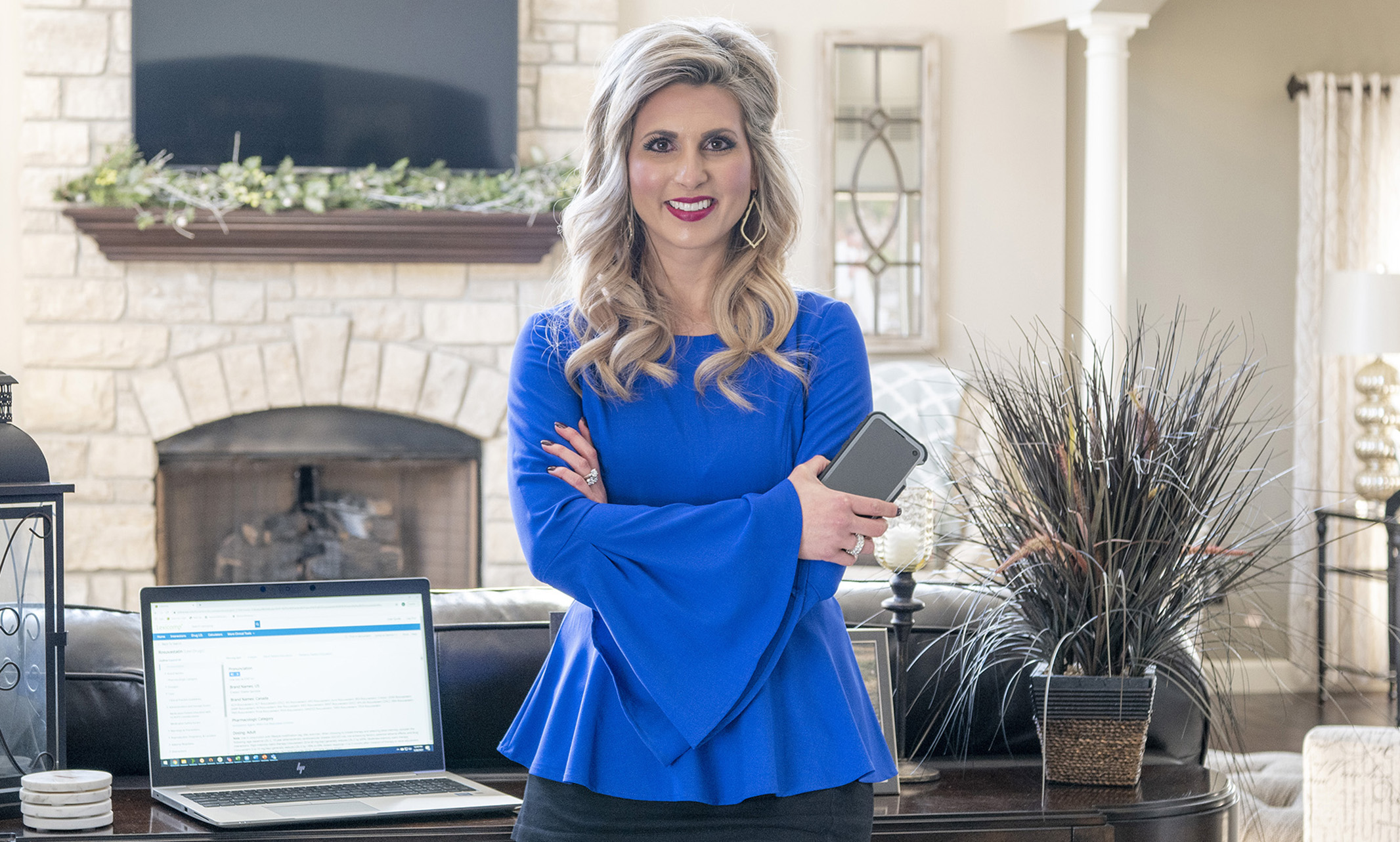
Katherine Lurk reflects on the opportunities that abound for School of Pharmacy graduates
A work-from-home pharmacist, Katherine Lurk (’10) supports TrestleTree clients across the country with drug education and medication therapy designed to drive behavioral changes toward improved health and lower costs. With her clinical expertise, she also plays an important role on the company’s business development team.
How would you describe your current job as a pharmacist?
For the past 5-plus years, I have served TrestleTree in a clinical capacity, supporting a National Health Plan. As a pharmacist, I support client members with medication therapy management and solutions for drug and disease related concerns. I maintain active pharmacist licensure in 46 states plus Washington, D.C. That enables me to work directly with members in all parts of the United States. Additionally, I provide consultative support to the client's team of nurse case managers and for internal team of Health Coaches. I have also recently joined the business development team, bringing my clinical expertise and knowledge of TrestleTree's in-depth training and model for health transformation to new clients. My ongoing goal in this role is to build relationships and promote business expansion with large employer groups and benefit consultants to create behavior change and sustainable health improvements for individuals and families across the country.
What does a typical day look like in your role?
Typically, I provide clinical support to health coaching participants directly through telephone interactions and indirectly via phone and email communication with TrestleTree Health Coaches and nurse case managers. I also work with the business development team seeking new opportunities for business growth, providing presentations for potential clients, developing and implementing a marketing strategy, and learning the inner workings of business operations. It has been a very humbling, yet exciting, experience to employ my clinical expertise in the business world.
What do you most enjoy about your particular job?
I enjoy my team and the leadership at TrestleTree. From the top down, this company is infused with goodness, kindness and compassion. And, we practice what we preach. We believe everyone deserves the opportunity to live in good health. TrestleTree has a mission to create sustainable change for individuals in all walks of life.
Why did you decide on Pharmacy as a career choice?
Growing up, I discovered a love for science, particularly chemistry. I chose pharmacy because of the diversity in career opportunities, along with the ability to develop a career that aligned with my life goals. I wanted to create a fulfilling, professional career with work-life balance that enabled me to enjoy my family, too.
What were your plans as a pharmacist when you started school?
Initially, I had a passion for oncology. I wanted to be an oncology specialty pharmacist providing expertise in this complex field, especially around medication management. After completing my first year of residency, my plans changed and propelled me into a completely different area of practice.
How do you see the roles of pharmacists continuing to evolve in the future?
Opportunities for pharmacists continue to expand beyond traditional roles. Pharmacists possess a unique skill set that can be applied in research and business-driven roles along with clinical and industry specializations. With a recent transition to the business side, I have experienced first-hand the value of clinical knowledge and experience when sharing the inner workings of a company focused on improving health and optimizing clinical outcomes.
What would be your best advice for someone thinking about a career in pharmacy?
Keep an open mind and always look for unique opportunities. Be mindful of pivot points in your journey, the key decisions that will determine your path and the direction of your life. Embrace leadership roles early and throughout your education and develop relationships with instructors and peers.
Why should someone pick the UMKC School of Pharmacy?
UMKC offers a strong pharmacy education with many opportunities for students to explore their interests and develop their passions. It is also incredibly unique that the School of Pharmacy is located on Hospital Hill with the medical, dental and nursing schools creating a collaborative environment for learning and a team approach to clinical practice.
How did your time at the UMKC School of Pharmacy help prepare you for your current role as a pharmacist?
UMKC's rigorous academics provided me strong clinical skills and knowledge that I built upon during residency and years of clinical practice. I also embraced leadership opportunities in various organizations and worked closely with faculty and staff. These relationships proved to be valuable for referrals into internships and residency programs, and many of them remain part of my pharmacy network today.
What do you do outside of work for fun?
I enjoy spending time with family and friends, nice dinners, summers on the water, and watching my kids play the sports they love. Being a mom is the best and I'm grateful for a career that provides a balance between family and work.
Jun 16, 2021
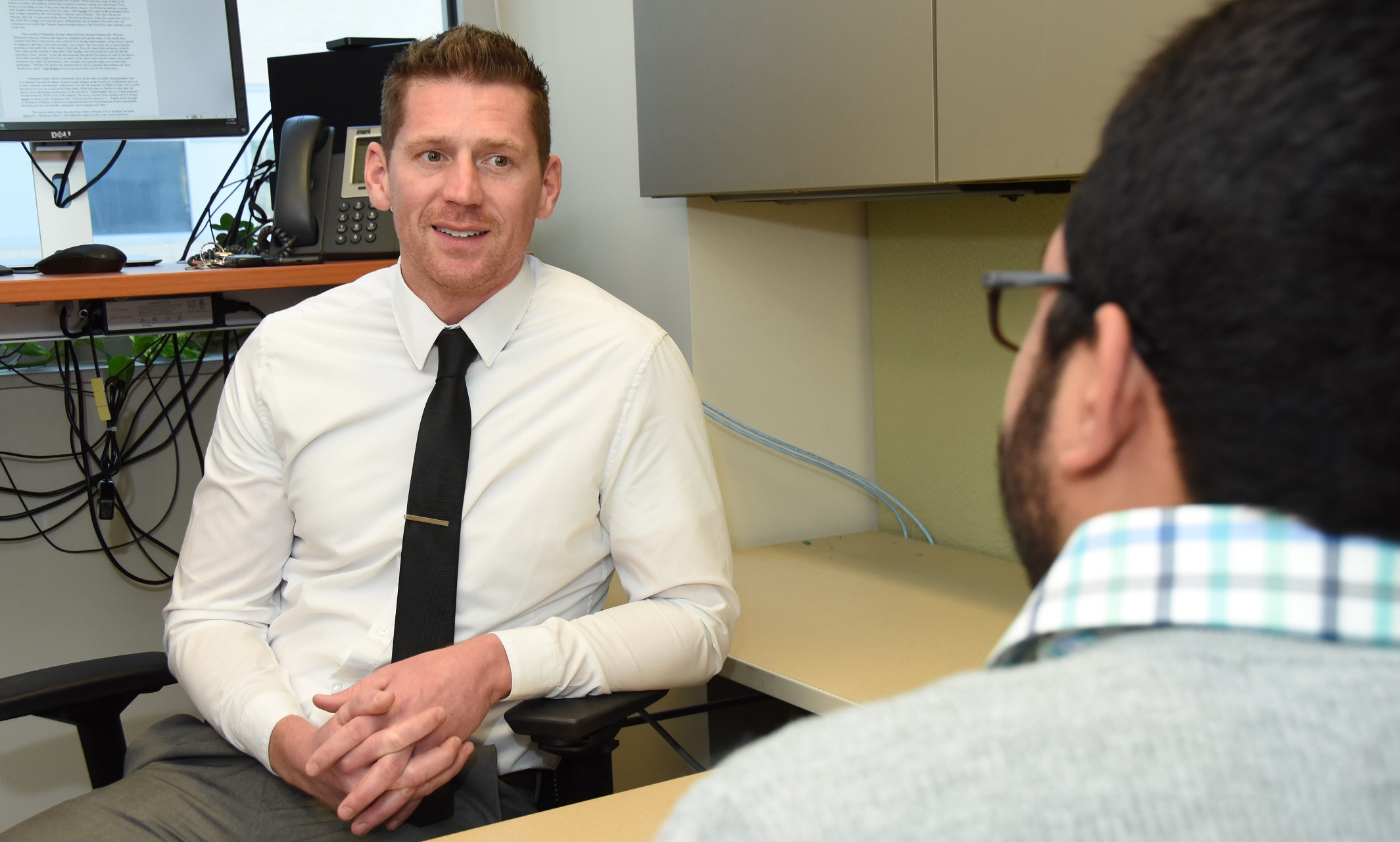
Joseph Lightner says plan aims to counter racism and its effects before they lead to chronic illness
Kansas City has a new, ambitious Community Health Improvement Plan addressing the underlying causes of poor health in the city, thanks in part to Joseph Lightner, an assistant professor in the UMKC School of Nursing and Health Studies.
Mayor Quinton Lucas appointed Lightner to the Kansas City Health Commission in spring of 2020, and he was co-chair of its committee that drew up the new plan. Cities revise their Community Health Improvement Plans, CHIPS for short, every five years as part of their national accreditation.
“The city’s plan drawn up in 2016 was innovative by focusing on social determinants of health — including homelessness, inadequate school finance, lack of transportation and access to health care — instead of the chronic health conditions that result,” said Lightner. He worked for the Kansas City Health Department as its liaison to the Health Commission before he joined the UMKC faculty in 2018.
“This 2022-2027 plan takes that one step further, acknowledging the systemic racism that’s underneath so many of the conditions that lead to poor health,” he said. “Kansas City is really a leader in focusing upstream at these causes, to try to solve the problem before it becomes the chronic diseases.”
That focus is needed, the plan says, as Kansas City has been identified as the fifth most racially and economically segregated city in the United States. Lightner, who has a master’s in public health and a doctorate in kinesiology, said the plan detailed goals for the city in six areas: public health infrastructure; safe and affordable housing; well-financed and trauma-informed education; violence prevention; implementation of Medicaid expansion; and equitable access to COVID-19 testing, vaccination and treatment resources.
“Even in a pandemic, most people die of chronic health conditions and the diseases they lead to, whether it’s obesity, diabetes, hypertension or something else related.” — Joseph Lightner, assistant professor
The pandemic showed the need for more public health capacity, Lightner said, especially in underserved areas. The plan notes that Missouri ranks 49th for state public health spending, making local and federal financing all the more important. The city does a good job with its own resources and attracting federal money, Lightner said, “but we need more.”
The plan starts by noting that the life-expectancy gap between ZIP codes with mainly white populations and those with mainly Black residents is wide, 18.2 years between the best and worst ZIP codes, and only grew wider from 2016 to 2019.
Though Kansas City’s health challenges are big, Lightner said the new plan’s goals could make a difference in the lives of thousands of residents. The plan was approved by the City Council, and resolutions and ordinances to advance several of the goals have already been introduced.
“Even in a pandemic, most people die of chronic health conditions and the diseases they lead to, whether it’s obesity, diabetes, hypertension or something else related,” Lightner said. “And people with these conditions, in poor health already, fare the worst from COVID.”
Lightner’s experience includes helping launch the nursing school’s undergraduate public health curriculum and getting students involved in innovative research that brings fitness and nutrition programs to area schools. He hopes his work on the Health Commission will further improve how the city tackles its health challenges.
“Working in the community is so important for our faculty,” he said, “to use our research to improve people’s lives and support the Kansas City community.”
Jun 16, 2021
KCTV5 reports on Kansas City area colleges' requirements for COVID vaccine
Many area colleges are strongly recommending, yet not requiring the vaccine; Ottawa University, Mizzou, UMKC, UCM, Park University, Pittsburg State, MCC , KCKCC, JCCC and Benedictine College. Read the full article and watch the newscast.
Jun 15, 2021
A KCUR conversation with the artist of the Corbin Roo
In addition to the kangaroo, Tom Corbin just finished work on a bronze life-size statue of President Harry S. Truman that will eventually find its home in Washington, D.C.
Jun 15, 2021
Signature new program provides unique system of personalized support to help students graduate career-ready
Mako Miller, M.A.Ed, an experienced educational professional with an extensive background in career development, has been named director of the Professional Career Escalators program, the university’s signature new program providing a unique system of personalized support and services to propel students from their educational aspirations to good-paying careers.
The Career Escalators program, a centerpiece initiative of the UMKC Forward plan, will launch in Fall Semester 2022.
Miller comes to UMKC from Kauffman Scholars, where she has served as Career Services Manager for the last four years. She is past president of the Missouri Career Development Association, current president of the Kansas Association of Colleges and Employers and co-founder of Young Professionals of Color-Kansas City. She holds degrees from UMKC and Kansas State University, and has served on the UMKC School of Education Alumni Association Board of Directors.
Her role at Kauffman Scholars has included planning and implementing comprehensive career development experiences for college students, while developing ongoing relationships with Kansas City-area employers to facilitate connections with students.
“Mako comes to this position with a strong network of connections in the Kansas City community,” said Kristi Holsinger, Ph.D., senior vice provost for student success. “Her innovative thinking and enthusiasm will allow her to be a strategic, collaborative leader and a strong contributor to UMKC’s Culture of Care.
The escalators will be open to all admitted students, but the program is built on research and best practice that support UMKC goals to increase retention and graduation rates of underrepresented, first-generation and Pell-eligible students. At Kauffman Scholars, Miller created Roundtable Represent, a program that intentionally recruits professionals of color to connect and network with students to discuss issues around diversity, equity, and inclusion in the workplace and build relationships that allow students to see people who look like them in professional settings.
The initiative supports two key missions of the university: student success and community engagement. It will include applied learning experiences in the community, mentorship, support for admission to advanced professional education, and leadership training. Initial professional focus areas for the escalators, based on workforce need and personal career opportunity, include healthcare, education, engineering/business and law/justice. Others will be added in the future in response to workforce demand trends.
The program components are shaped by empirical evidence on the most effective contributors to student success in higher education. Each escalator will be created in alignment with the academic discipline and provide meaningful and ongoing experiences in the following areas:
Career Discovery, Guidance & Development
Mentoring and Assessment with Student Support Referrals
Applied Learning Experience (such as internship, job shadowing, service learning)
Professional Access Preparation (such as test prep, personal statement, interviews, letters of recommendation, timelines)
Leadership Development Credential (focusing on inclusive excellence, attaining durable/essential skills)
Jun 14, 2021
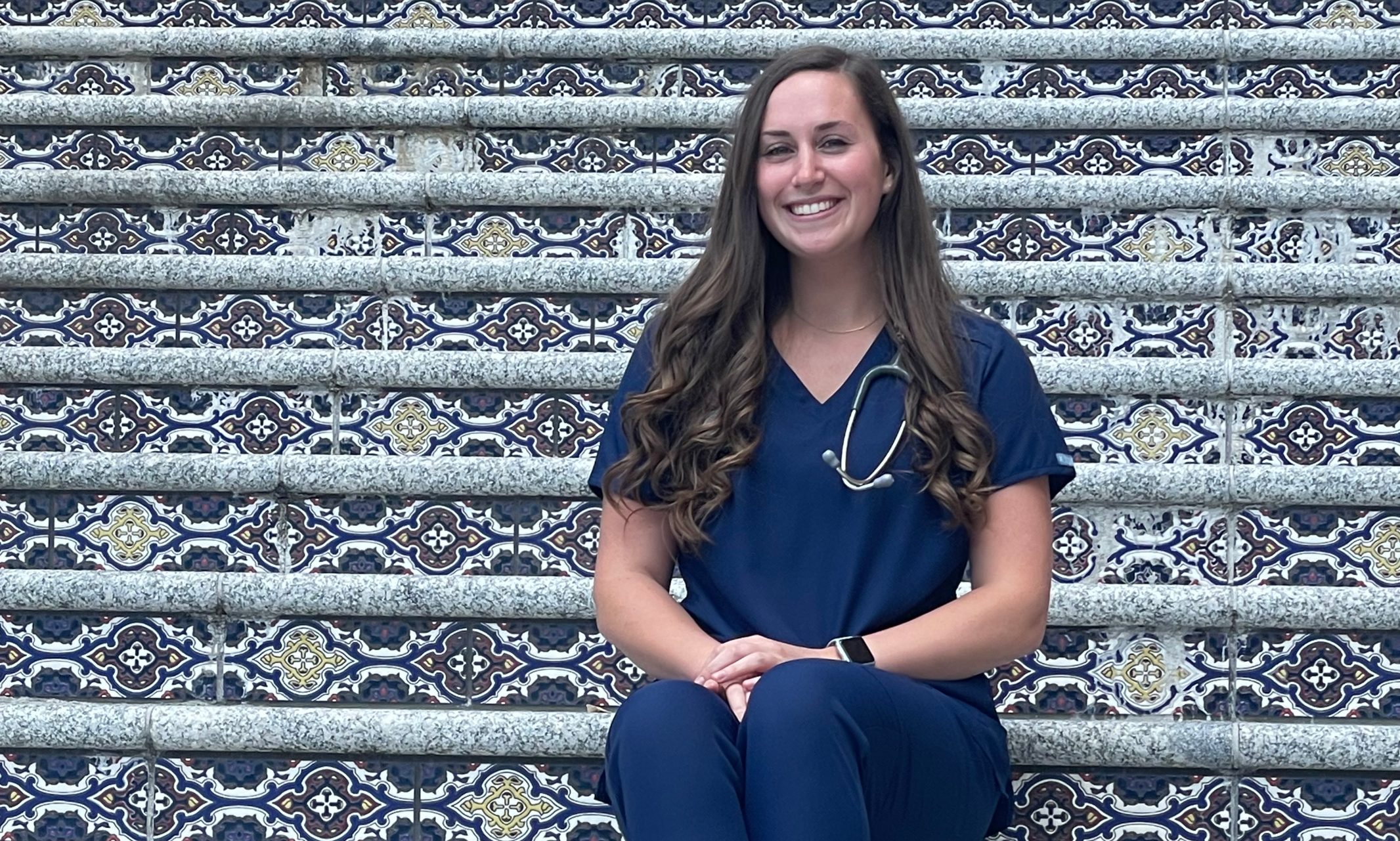
Meet five recent UMKC graduates who went straight from campus to the first stage of a rewarding career
More than 2,300 UMKC students participated in commencement exercises at Kauffman Stadium in May, and many of them went straight from campus to ballpark to the first stage of a rewarding career.
Meet four members of the UMKC Class of 2021 – and one who returned to celebrate her 2020 graduation in a pandemic-delayed ceremony.
Courtney Collins ’21
Henry W. Bloch School of Management
Where will you be working, and what excites you about this opportunity to launch a career?
I will be doing the Estee Lauder summer internship. There are about 100 interns from across the country that are placed on teams. Estee Launder has 25 to 30 brands in everything from cosmetics to skincare to fragrances. I will be the marketing intern for two of the luxury fragrance brands. Some of my responsibilities will include working with budding influencers and learning and reviewing customer insights. I’m excited to put what I have learned at UMKC into practice and hopefully have a full-time offer by the end of summer.
How did your UMKC education make this possible?
I made a ton of great connections through the Bloch School. I completed a full-time internship with SkillPath in Kansas City. I was also on executive boards for both a business fraternity and a social sorority. Those helped to really round out my experiences on campus and helped me develop skills that were easily translatable in interview situations. In the spring of 2020 I completed a study abroad program in Spain where I was able to take an international marketing class. My professors abroad were super helpful in giving insight on the international marketing industry, so that helped open up a door for me that I could pursue.
Courtney Collins
What are your long-term career goals?
I had this running joke with my friends, because UMKC has so many specific programs like pre-law and pre-med, I would tell people that I’m pre-CEO. It’s what I would love to do, be a leader of a group or an organization. It’s truly humbling to be in those positions. I would also love to be a brand manager or do something in the creative field. But in the long run I would love to potentially start my own company.
"Because UMKC has so many specific programs like pre-law and pre-med, I would tell people that I’m pre-CEO." — Courtney Collins
Jacob Furry ’21
Conservatory
Where will you be working, and what excites you about this opportunity to launch a career?
I'll be teaching K-5 general music at Welborn Elementary School in Kansas City, Kansas Public Schools. I'm looking forward to applying what I've learned during my time at UMKC to my own classroom this fall! I'll be teaching music to more than 500 kids at Welborn, which seems a bit daunting, admittedly, but I'm confident it will be very fulfilling. It's inspiring how much KCKPS supports the arts, and I'm excited to start my career within that community.
How did your UMKC education make this possible, in terms of classes, extracurriculars, internships, service-learning opportunities, networking opportunities, etc.?
The thoroughness of the curriculum in the music education program at UMKC and the overwhelming support I've received from the faculty has allowed me to approach my first year of teaching with confidence. I know I don't have all the answers, and that I'll undoubtedly struggle as a first-year teacher, but UMKC has given me mentors and colleagues that I can always lean on for support.
Jacob Furry at Welborn Elementary School
One of my favorite things about the music education program at UMKC is the large amount of time pre-service teachers are able to spend in real classrooms. During my time at UMKC, I had observation/student teaching placements in four schools across three districts in the KC metro area, ranging K-12. These placements offered a wide breadth of experiences working with many different kinds of students, allowing me to figure out exactly what I enjoyed doing the most. I landed on teaching elementary music!
"I had an amazing experience with undergraduate research while a student at UMKC, and I was even able to present my work at a national music education conference this year." — Jacob Furry
What are your long-term career goals?
I definitely plan on going back to school in the future. I had an amazing experience with undergraduate research while a student at UMKC, and I was even able to present my work at a national music education conference this year. I've found that education is a very dynamic field. We're always learning new and better ways to help students succeed, and I loved being able to make a small contribution to that evolving knowledge base through my own research. After I get some real-world teaching experience under my belt, I'd love to do more of that.
Tami Greenberg ’20
Henry W. Bloch School of Management
Greenberg has served as CEO of Ronald McDonald House Charities of Kansas City for six years, and will continue in that role after earning an Executive Master of Business Administration degree.
Where will you be working, and what excites you about this opportunity to enhance your career?
I undertook the Executive MBA journey not to “launch” my career, but to enhance and strengthen it. I am excited about demonstrating in my daily role the things I learned in the program, including leadership, strategy, business acumen, financial management, advocacy, marketing, innovation, influence and persuasion.
Tami Greenberg, third from left in front row, with her EMBA cohort at commencement
How did your UMKC education make this possible?
I enjoyed how we moved through in a cohort learning model. Our group became very close, and we learned not just from our professors and classes, but also from one another. I believe strongly that “sharp knives make each other sharper,” and I am grateful for all the “sharp knives” I got to know through my UMKC executive education. And I would be remiss if I did not mention all the extraordinary guest speakers – I felt lucky to have such access to the leaders who visited our program. One of the promises of the EMBA at UMKC is “you learn something on Saturday, that you put into practice the following Monday.” I found that to be true while I was actively in the program, and it continues to be true now.
What are your long-term career goals?
It is an honor and privilege to keep families close to their seriously ill children. With three Ronald McDonald Houses and a Ronald Family Room here in Kansas City, we serve 87 families with sick kids every night. My long-term career goals are to be the best possible leader for this organization, to ensure that we are delivering our mission with excellence and care, and to maintain the highest possible business standards in leading this team and this work.
Fiona Isiavwe ’21
Henry W. Bloch School of Management
Tell me how you found the job opportunity with Deloitte, what is your title there and what excites you about this opportunity to launch your career?
I will be starting off as an audit assistant with Deloitte. I was on the executive board of four student organizations, serving part-time as a Supplemental Instruction Leader and enrolled in 15 credit hours, while maintaining a 4.0 cumulative GPA when a national recruiter with Deloitte reached out to me via Handshake. Deloitte is filled with some of the brightest minds across the globe. I am excited to be able to work alongside such incredibly talented people, learn and continually challenge myself, and have fun during the process!
How did your UMKC education make this possible, in terms of classes, extracurriculars, internships, service learning opportunities, networking opportunities, etc.?
I remember when I was first scouted by my recruiter, she remarked that my Handshake profile had stood out to her from the others. My access to Handshake was provided through the UMKC Bloch career services department. My academic achievements were a testament to the academic resources available at UMKC. At the Bloch school, I was surrounded by faculty who believed in me and took the time to mentor and encourage me.
Fiona Isiavwe
In addition, the academic resources available like Supplemental Instruction, the tutoring center, writing studio and labs were of huge help to my academic success and I found the networking opportunities organized by the Bloch school to be worthwhile. I remember always leaving feeling ignited upon listening to the experiences of Bloch alumni and guests. Their stories made me feel like my dreams were valid, possible, and attainable.
"I want others to see that their hopes and dreams are valid, possible, and attainable." — Fiona Isiavwe
What are your long-term career goals?
I am grateful for this opportunity and hope to work my way up, gaining as much insight as I can along the way. I hope to venture into special projects back home in Nigeria and across the globe, give back and be a testament to those in positions where I once was. I want others to see that their hopes and dreams are valid, possible, and attainable.
Emma Stark ’21
School of Nursing and Health Studies
Stark will be working at North Kansas City Hospital as a nurse technician until she takes her Nursing Licensure Exam and will then start her role as a critical care nurse.
Where will you be working and what excites you about this opportunity to launch a career?
I will be working at North Kansas City Hospital as a critical care float nurse, working in the hospital’s various intensive care units as well as the emergency department. I am excited to continue working on the front lines serving the greater Kansas City area. Nursing is an ever-changing and growing career field and I am excited to continue learning every day.
How did your UMKC education make this possible?
UMKC opened many doors for me within my field. I was provided almost double the clinical hours of many other programs and this allowed me to develop connections with many leaders within the nursing profession. UMKC also made sure I was able to experience different nursing settings and hospitals so I could determine my passion. My first-ever clinical placement is actually how I discovered North Kansas City Hospital and fell in love with their mission.
What are your long-term career goals?
I know I want to pursue higher education. I want to help reform the health care system in our country and make health care more accessible to the entire population. I have a passion for helping people and I specifically want to make a difference in impoverished and underserved communities.
Jun 14, 2021
KCUR features UMKC School of Education alumnus Khalil Jones
Khalil Jones spent most of the year teaching English Language Arts to his East High School students from his bedroom. He recently graduated from the University of Missouri-Kansas City. Read more from KCUR.
Jun 14, 2021
KSHB features Judy Jacobs, UMKC alumnus and 2016 Defying the Odds Alumni Association Award winner
Judy Jacobs received an MBA and a Ph.D. from UMKC. Jacobs received the 2016 Defying the Odds Award from the UMKC Alumni Association. Read the story and watch the newcast.
Jun 14, 2021
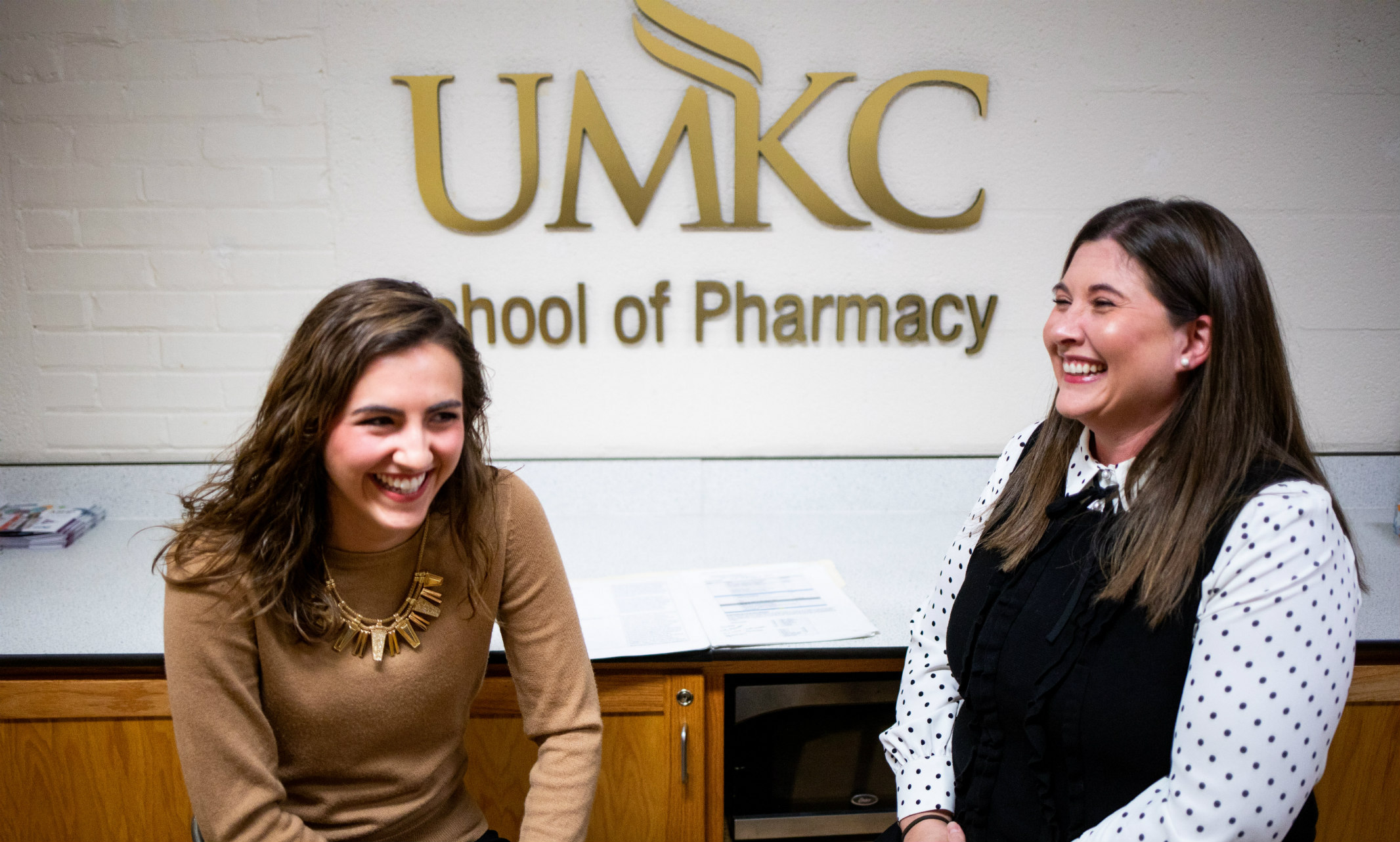
Dynamic duo at Columbia campus cares for farmers
The heart of UMKC is our campus community. With lots of opportunities, it’s easy to develop student mentorship teams. And these rich relationships—our Dynamic Duos—are some of our best success stories.
Growing up in a farm family, Kelly Cochran’s passion is spreading the message that rural healthcare needs to be a top priority in Missouri and throughout the U.S.
“We need to take care of the people who are feeding us,” says Cochran, a clinical associate professor at the University of Missouri-Kansas City School of Pharmacy in Columbia, Missouri. “Farmers often don’t have healthcare close by, and it’s challenging for them to take the time off to see a provider.”
So Cochran and her pharmacy students deliver health care to farmers.
They’re part of Pharm to Farm, a statewide outreach program of the Missouri AgrAbility Project, that helps farmers identify medical risks through their local pharmacist. In many rural Missouri areas, pharmacists fill healthcare gaps and are the first face farmers see for their health and safety.
“This program has inspired me to be more outgoing. Through my experiences, I feel that I am gaining communications skills that will help me as a pharmacist.” - Cassidy Jones
Cassidy Jones (PharmD '22) chose the UMKC School of Pharmacy campus in Columbia, Missouri, because it is near the rural community she plans to work in.
The UMKC School of Pharmacy faculty-student teams conduct health screenings at farms and events. With Cochran’s mentorship, Cassidy Jones (PharmD ’22) planned the UMKC School of Pharmacy screening at the Great Plains Growers Conference at Missouri Western State University in St. Joseph, Missouri.
It meant scheduling shifts for students to conduct health assessments including taking blood pressure and asking questions about medication — not an easy task because it was a volunteer duty three hours from the Columbia campus and an hour away from the Kansas City location. Students from the Springfield campus work at events, too, but since this one was nearly five hours away during a break, they sat this one out.
“I started planning this event shortly after the semester began in August,” says Jones, who grew up on a small farm in Auxvasse, Missouri, about 30 minutes from Columbia.
Because Jones shows horses, it was important for her to be close to home for her studies, which is why she chose the UMKC School of Pharmacy campus at the University of Missouri in Columbia. After she graduates, she hopes to work as a pharmacist in Mexico, Missouri, surrounded by farms nearby.
“This program has inspired me to be more outgoing,” Jones says. “I am usually very shy, but in the future, I will need to have the confidence to counsel patients, consult with physicians and be a leader in the pharmacy. Through my experiences, I feel that I am gaining communications skills that will help me as a pharmacist.”
Cochran enjoys mentoring students like Jones.
“We need to take care of the people who are feeding us. Farmers often don’t have healthcare close by, and it’s challenging for them to take the time off to see a provider.” - Kelly Cochran
Kelly Cochran, at left, grew up on a farm, and is passionate about teaching pharmacy students such as Cassidy Jones, at right, about rural healthcare.
“My favorite part is seeing students find success in their future career paths,” she says. “In particular, when they recognize their roles as servant leaders and advocates for health and medication safety among the rural communities they will serve.”
At the growers conference, Jones lugged in a rolling cart filled with boxes of supplies and pamphlets that filled the trunk of the car she shared with Cochran on the drive from Columbia. One leaflet was called “Standing Tall to Prevent Falls,” the most frequent accident to occur on farms. Another was “Better Sleep for the Farmer Stuck Counting Sheep” about sleep hygiene — a study found that farmers who slept less than normal experienced 7.4 times higher risk of having balance issues, which could lead to poor work or an injury.
Jones and others set up wayfinding signs to the UMKC School of Pharmacy health-screening area, tucked away from the flow of the conference to give farmers and growers privacy.
“You might want to walk around and let people know we’re here,” Cochran suggested to Jones. “They’ll probably respond to students better than a faculty member like me.”
Soon after Jones launched her recruiting mission, men and women trickled in.
“I haven’t been to a doctor in eight years,” says Matthew Shoop, a row-crop farmer from Platte County. After his screening, he says health screenings are needed for farmers like him. Stress, among others things, is common because of the unpredictability that goes hand in hand with the career.
“If not for this screening, I don’t know when I would have been seen.”
“My favorite part is seeing students find success in their future career paths. In particular, when they recognize their roles as servant leaders and advocates for health and medication safety among the rural communities they will serve.” - Kelly Cochran
Cassidy Jones, a pharmacy student at left, spent months preparing for a health screening at a growers conference in St. Joseph, Missouri.
The Need for Rural Health Care in Missouri
By the Numbers
98 of 101 Rural counties in Missouri are considered primary care Health Professional Shortages Areas. 2- to 4-fold Medicine can increase risk of injury while using farm equipment. 10+ Miles that many of Missouri’s residents live from the nearest drugstore. Many rural residents live even farther from primary-care doctors and specialists.
Health of Farmers
Common issues
Chronic obstructive pulmonary disease and diabetes are more prevalent in rural areas.
Incontinence, sleep deprivation, pain and heart disease increase the rate of farm accidents.
Medicines often cause dizziness, confusion, drowsiness, blurred vision, lightheadedness and gait problems — increasing injuries on farms.
Farmers’ stoic nature often prevents sharing health concerns with family members and friends.
UMKC School of Pharmacy care through Pharm to Farm faculty and students
They help farmers identify medicines that might be of risk to them.
They talk about ways to improve safety on the farm.
They conduct health screenings.
They work with pharmacists raised in non-rural areas to teach them about farm values: independence, pride, thrift, skepticism and a strong work ethic.
They also talk about safety barriers in rural settings such as long work hours and seasonal deadlines.
Jun 12, 2021
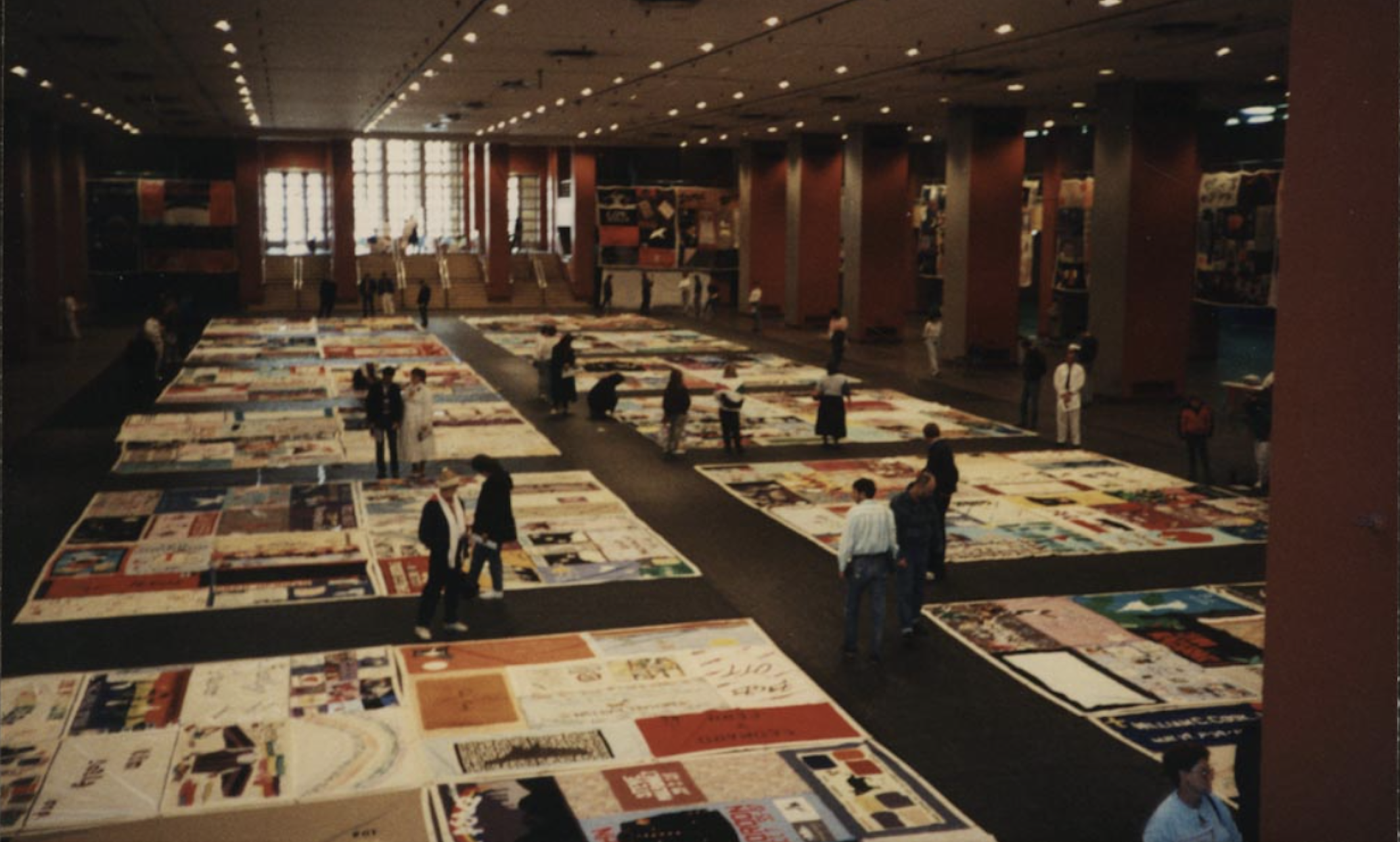
UMKC professor’s gift increases collection security, longevity
When Linda E. Mitchell, Ph.D., professor of history and the Martha Jane Phillips Starr Missouri Distinguished Endowed Professor of Women’s and Gender Studies at UMKC, began to think about estate planning, she decided to create an endowment fund for the Gay and Lesbian Archives of Mid-America (GLAMA.)
Mitchell’s academic career has focused on women’s, gender and sexuality studies, mostly in reference to the history of women and families in the Middle Ages. The combination of her research in medieval studies and gender and sexuality revealed that historically, gender has never been seen as simply a binary, despite what some people may think.
“This is what happens when you study history,” she says. “Situations were often more complicated than people try to make them.”
Because of her mentoring of students in history and women’s, gender and sexuality studies, Mitchell was familiar with GLAMA’s mission to collect, preserve and make accessible materials that are part of the lesbian, gay, bisexual and transgender (LGBT) communities’ history in the Kansas City region. GLAMA is housed in the LaBudde Special Collections at the Miller Nichols Library, and Mitchell has worked closely with Stuart Hinds, curator of special collections, on developing research projects for students in the archival collections housed at La Budde, including those that form part of GLAMA.
In addition to her professional interest, Mitchell’s connection to the collection is personal.
“My brother and his husband are two of the most important people in my life,” Mitchell says. “As I began making plans for my estate, I wanted to support GLAMA in their honor. I contacted Stuart to see if the archives had an endowed fund.”
Close-up of AIDS Memorial Quilt display Kansas City Municipal Auditorium, 1991
Hinds confirmed that GLAMA did not have an endowment, and Mitchell decided to create the Bill Mitchell and Jeff Halpern Endowment for GLAMA.
“I felt that establishing this endowment was tremendously important,” Mitchell says. “We are seeing even now attempts to erase and denigrate the history of underrepresented groups—such as women and people who do not identify themselves in binary-gendered ways—and this fund can provide some security for the collection.”
Hinds recognizes the importance in compiling the documentation of the LGBTQIA community in Kansas City that reflects a history that was previously left out of the traditional local historical narrative.
“The value inside the community really centers around preservation,” Hinds says. These stories, photographs and materials are preserved, and they're given a long-term home so they don't disappear. Over the years many donors have told me that one of the reasons they were interested in donating is because they were concerned that their family might not see the value in these memorabilia and throw it away.”
"Kansas City is lucky to have GLAMA. The archives improve the national perception of the city." — Linda E. Mitchell
While the loss of personal stories is concerning, the significance of preservation is inclusion on a broader scale.
“We're really at a moment where we're trying to incorporate a much wider variety of stories in the American historical narrative, some of which aren't very pleasant,” Hinds says. “It's the job of these kinds of archives to broaden that inclusion so historians can accomplish the work that they are trying to achieve.”
“Kansas City is lucky to have GLAMA,” Mitchell says. “The archives improve the national perception of the city. It’s not only barbecue and football. We live in one of the most culturally rich and complex cities in the country. GLAMA is a great component of that diversity.”
Jun 11, 2021
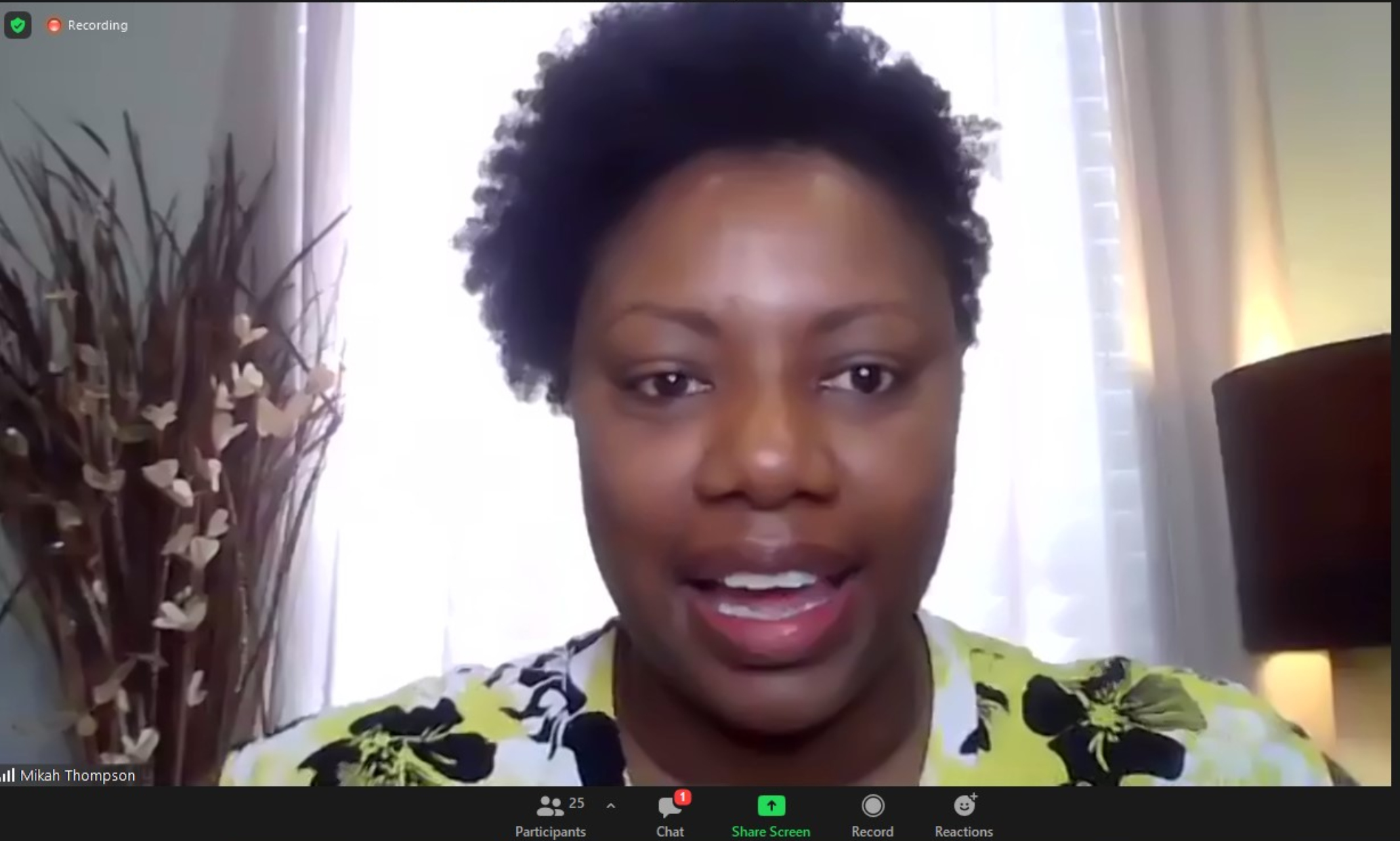
UMKC Law faculty and alumni play major role in effort to attract urban youth to careers in law
Throughout the month of June, lawyers, judges and law professors are working with urban high school students to introduce them to the legal system and pique their interest in legal careers. UMKC School of law faculty and alumni are playing a major role.
The program is called the Student Law Academy, and it is sponsored by the Kansas City Metropolitan Bar Foundation and PREP-KC, an organization that works with urban school districts in the Kansas City metro to help young people explore their futures.
During the month-long program, high school students will participate in information/mentoring sessions with lawyers, judges and professors on topics such as the Life Cycle of a Lawsuit, Persuasive Public Speaking, Negotiating Styles, TV vs. Reality and School Speech and the First Amendment.
“Participating in the Student Law Academy is just one example of our commitment to engage with and serve the community,” said Lorie Paldino, assistant director of Law Admissions for the UMKC School of Law. “Through this program, we are building bridges connecting the community, the legal profession and our students, faculty and alumni to each other, providing valuable opportunities for access, knowledge and networking.”
UMKC School of Law faculty leading Academy sessions include Sean O’Brien, Mikah K. Thompson and Daniel B. Weddle. Among the many UMKC alumni participating are Dana Tippin Cutler and Keith A. Cutler, Tim Dollar, Jolie Justus, Sherri Wattenbarger, Michelle Wimes and the Hon. J. Dale Youngs.
“The Kansas City Metropolitan Bar Foundation values diversity in the legal profession. Our Student Law Academy program allows our local legal community to take active steps to provide underserved high school students, who would not otherwise have the opportunity, meaningful exposure to different careers within the legal profession,” said Jill M. Katz, 2021 foundation president. “One goal of the academy is to help students create connections with lawyers and judges. These connections are crucial for students as they explore what their futures hold.”
Jun 10, 2021
UMKC student Alexej Savreux has rereleased a collection of poetry that runs the gamut from broken hearts to complex physics theory.
Alexej Savreux is currently a year into a graduate degree in theater tech at the University of Missouri-Kansas City and recently became a sponsored poet at Poetry for Personal Power. The position uses poetry and art to uplift and support people in need, particularly those with mental health diagnoses. Read the story from KCUR.
Jun 10, 2021
KSHB reports on Courtney Frerichs' Olympic Trials run
UMKC alum Courtney Frerichs is hoping to get a second shot at an Olympic gold medal during the 2020 Tokyo Olympic Games. Read the article and watch the newscast.
Jun 10, 2021
Yahoo Finance consults with UMKC Bloch Assistant Professor of Health Administration Christopher Garmon
“You go to an emergency room that’s in your health plan’s network, but you’re treated by a physician there that’s not in your network, or you schedule a surgery and your surgeon’s in network but then it turns out the anesthesiologist is out of network,” Christopher Garmon, assistant professor of health administration at University of Missouri-Kansas City, told Yahoo Finance.
Jun 10, 2021
Nathan Mauck weighs-in for KCTV5
“I think there are multiple reasons why folks are staying out of the workplace,” said UMKC Associate Professor of Finance Nathan Mauck. Mauck believes some unemployed people have been reluctant to look for work because they fear catching the virus. Read the full article and watch the newscast.
Jun 10, 2021
KSHB taps William Black for story about consumer prices
While spiking demand and limited supply is driving up prices, William Black, associate professor of economics and law at the University of Missouri-Kansas City, said inflation is not happening everywhere. Read the article and watch the newscast.
Jun 10, 2021
UMKC's Jenifer Allsworth weighs-in for Flatland article
Jenifer Allsworth, an epidemiologist and professor at University of Missouri-Kansas City School of Medicine, said that had the study been done a few months ago, the states’ rankings would have been more closely aligned. But vaccination rates in Kansas have gone up while infection rates have gone down in recent weeks. Read the article.
Jun 09, 2021
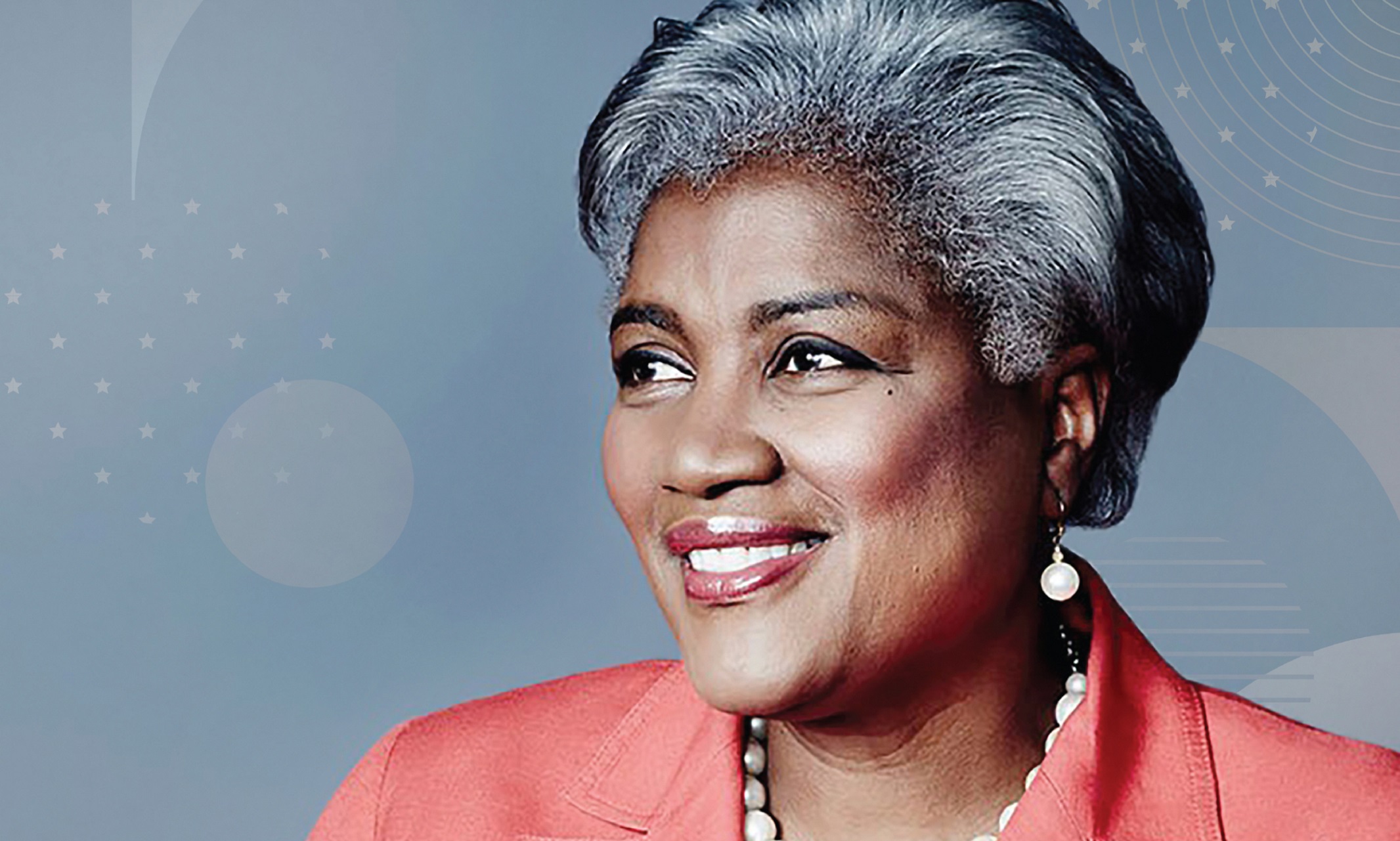
Keynote speaker for Leadership Conference Donna Brazile evokes past leaders to inspire continued action
Donna Brazile, in the keynote address for this year’s Women of Color Leadership Conference, praised women of color for refusing to give up or give in to the forces trying to hold them back.
Brazile, a longtime Democratic Party leader, also encouraged the members of her virtual audience to keep using their voices to further the dream of a just, inclusive America.
In an address rich in cultural, historical and culinary references, Brazile said America was strengthened by its diversity and needed to include everyone to be at its best. She said women of color put the “Still” in this year’s conference theme, “Still We Rise.” And she likened women of color to the roux in gumbo, binding everything together and giving the dish spice and body. Without the roux, she said, there’s no gumbo. “It’s just soup.”
Brazile also paid homage to Kansas City, saying its communities of color had made vital contributions to American culture, from barbecue to “Charlie Parker’s saxophone.” And she praised the Black entrepreneurs who turned the 18th and Vine area into a vital district long ago, including the Gem Theater and the stadium for the Kansas City Monarchs of Negro Leagues Baseball fame.
She also remarked on the Kansas City community’s courage a century ago and wondered how its members must have felt when they learned of the massacre that occurred not so far away in Tulsa, Oklahoma. She marveled at 107-year-old Viola Fletcher, a survivor who as a 7-year-old fled the Tulsa massacre with her family.
In the past, Brazile said, she has been inspired by seeing Fletcher testify before Congress and believing in a promising future for all Americans. On Tuesday, Brazile said, she was inspired to see Fletcher with President Biden in Tulsa at the ceremony marking the 100th anniversary of the tragedy.
Brazile also drew on words that have encouraged her, including:
“It took me quite a long time to develop a voice, and now that I have it, I am not going to be silent.”
— Madeline Albright, former secretary of state
“Our role is to dream a better world and to work courageously to make that dream possible.”
— Isabel Allende, author and activist
“Don’t doubt what you know.”
— Kerry Washington, actress and producer
And in her own words, Brazile summed up, “Together, we are strong, powerful and daring to make a positive difference.”
Also on the program for the day were panel discussions on mental health and on solidarity among women of color; Danielle Metz, a former prison inmate whose humanitarian efforts include helping incarcerated girls and women; and ballerina Karen Brown, who spoke on the importance of movement for good health and led an interactive session.
Jun 07, 2021
KCUR talks to Stuart Hinds
Stuart Hinds, curator of Special Collections and Archives at UMKC and curator of the Gay and Lesbian Archives of Mid America, was a guest on Up to Date.
Jun 05, 2021
Kansas City Star features event with Stuart Hinds, curator of Special Collections & Archives at the University of Missouri-Kansas City; and Austin ...
The Mid-Continent Public Library will host an online discussion about the history of LGBTQ activism in Kansas City with Stuart Hinds, curator of Special Collections & Archives at the University of Missouri-Kansas City; and Austin Williams, director of the award-winning documentary The Ordinance Project. Hinds said the event is important because it brings awareness to civil right struggles and forgotten history. Read the Kansas City Star article, which was picked up by MSN.
Jun 04, 2021
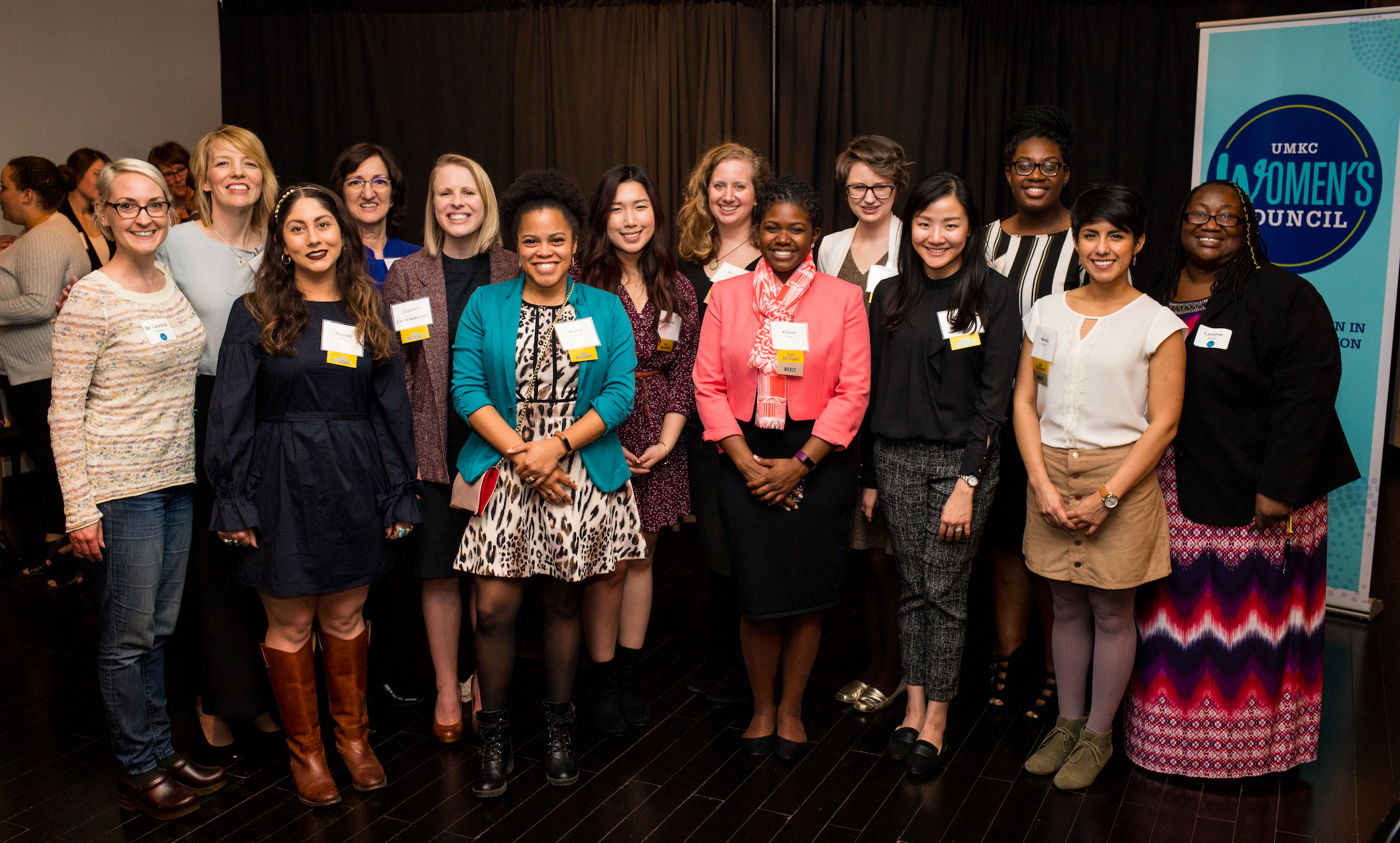
Endowment benefits UMKC Conservatory and the Women’s Council Graduate Assistance Fund
The late Caroline McBride French was an enthusiastic UMKC Conservatory donor and volunteer.
A successful attorney in Kansas City, French was active on the Friends of the UMKC Conservatory board, a fervent supporter of Crescendo, the Conservatory’s signature fundraiser and a member of the UMKC Women’s Committee for the UMKC Conservatory.
“Music was her primary love,” says Don Dagenais, a longtime Conservatory supporter. “She had a great business sense and made very sophisticated investments. As a woman attorney in her day, she must have been quite a barrier breaker.”
Her business acumen and her love for the arts resulted in a generous gift to support academic assistance for students at UMKC. Her estate gift of $800,000 will establish The Caroline McBride French Endowed Scholarship Fund of the UMKC Conservatory. An additional $460,000 will support the William L. and Caroline M. French Graduate Assistance Fund (GAF) named award through the UMKC Women’s Council.
“We are grateful for Mrs. French’s support. Endowed scholarships like this one ensure that we are able to bring more talented students into our programs.” - Diane Petrella
“We are grateful for Mrs. French’s support,” says Diane Petrella, dean of the UMKC Conservatory. “Endowed scholarships like this one ensure that we are able to bring more talented students into our programs. For many of them, scholarships are the essential piece of the puzzle that makes pursuing a degree in the arts a possibility.”
As an attorney, French would have been aware of the need to support women in advanced degrees. The Women’s Council Graduate Assistance Fund has provided short-term assistance to more than 2,200 women graduate students since its inception in 1970.
“Every time we receive a major gift like this one from Caroline French, we know it will help countless number of women complete their research, travel to perform or present at an academic conference or afford other expenses that may otherwise stand between them and an advanced degree,” says Debbie Brooks, J.D., president of the UMKC Women’s Council board of directors. “We are fortunate that Caroline had the foresight to provide these women that opportunity.”
Jun 03, 2021
Flatland interviews professor Heather Lyons-Burney
To pharmacist and University of Missouri-Kansas City professor Heather Lyons-Burney, one of the largest roadblocks to recovery is the stigma around addiction. Read more.
Jun 03, 2021
UMKC faculty provide financial insight for Ask the Experts blog with WalletHub
Ask The Experts: Best Credit Cards Sign-Up Bonuses - Jeff Johnson, assistant professor of Marketing, Henry W. Bloch School of Management at UMKC
Ask The Experts: Best No Credit Check Credit Cards - Judith Popper, clinical professor, UMKC School of Law
Jun 03, 2021
Read what UMKC's Daniel McIntosh tells the Kansas City Star
Daniel McIntosh, chairman of the department of physics and astronomy at the University of Missouri-Kansas City, hasn’t heard any of his science colleagues mention the Pentagon report. Read the full article. Subscription required.
Jun 03, 2021
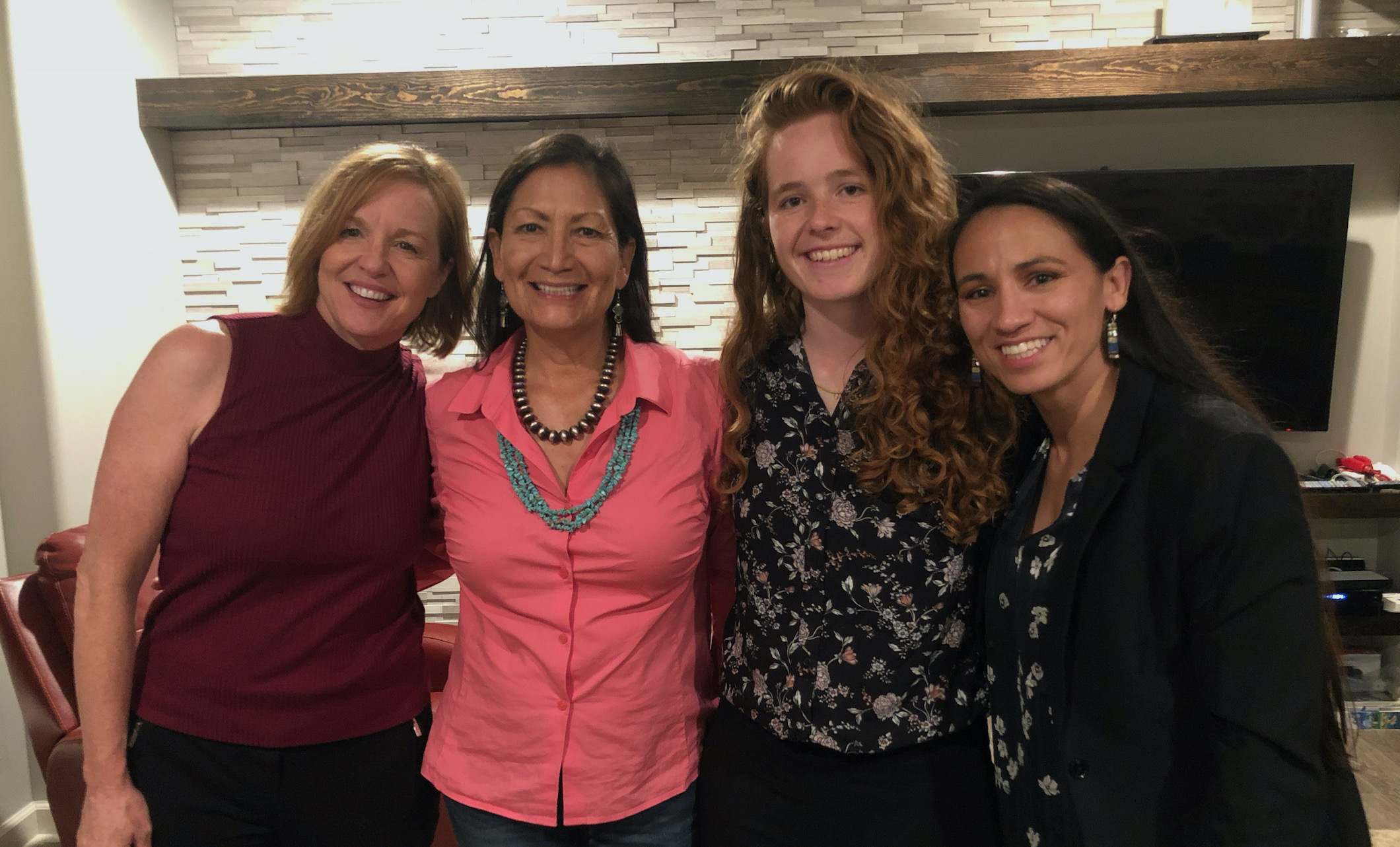
‘Sharice’s Big Voice’ tells the tale of a non-traditional student
As Nancy Mays (MFA ’17) volunteered for U.S. Rep. Sharice Davids’s (BBA ’07) campaign, Davids mentioned that she had always wanted to write a children’s book.
“She wasn’t thinking about herself,” Mays says. “She had a vision for a series of books that would introduce kids to civic responsibility with stories of how to do your part. But Sharice has such a great personal story. I thought we should start there.”
While Mays knew a lot about Davids’s life growing up with a single mother, she was interested in what she was like as a child. She interviewed Crystal Herriage (BA ’17), Davids’s mother, and went through old pictures with her for background information. With both women’s stories in hand, Mays, who is a professional writer and writing instructor, began to develop the narrative arc of the book.
“It was different writing a children’s book,” she says. “You really have to scale back your language, and that was more challenging than I thought it would be. You have fewer number of words on a page, and have to consider the type of words. But you still need to develop the voice, include all the information that is important to the editors and be true to the person’s story. It was a fun challenge.”
“We wanted to tell the story in a way that would show kids that life didn’t need to follow a script.” - Nancy Mays
Mays and Davids, who is Native American and a member of the Ho-Chunk Nation, also agreed it was important to find an indigenous artist to create the illustrations.
“We really wanted the illustrations in ‘Sharice’s Big Voice; A Native Kid Becomes a Congresswoman’ to capture the energy and vibrancy of Sharice’s childhood and Joshua [Mangeshig Pawis-Steckley] has really done that,” Mays says. “He was open to the collaborative process. There’s an illustration where Sharice is going to start campaigning an,d he drew it with her at the front of a group of people. Sharice asked him to redraw it. She said, ‘That’s not my style of leadership.’ And it made sense to him. He drew it again with her in the middle of the group.”
Similarly, the first sentence of the book mentions Davids’s mother, who raised Davids on her own. It’s accompanied by an illustration of the two of them together on election night surrounded by other people.
“When I received my first copy of the book, I showed it to my mom,” Davids says. “She knew what stories would be in the book, but when she opened it to the first page she said, ‘Oh! I’m in here.’
And it was interesting because the story of my life is so informed by the type of person she is – her supportive nature, her big heart and her fortitude. She’s is both the toughest and most kind and gentle person I know. It didn’t cross my mind to have it play out any other way.”
Herriage said it felt special that her daughter would include her in the book.
“Children see certain memories with different eyes than adults,” she says. “When she showed my promotion ceremony to Sergeant First Class in the Army in the book, I was so happy that we both saw it as a special family moment years later.”
Herriage thinks Davids revealing that she was a “chatterbox” as a child, who learned to listen as well as talk, may be helpful for her readers.
Nancy Mays
“A lot of children will see themselves, and that they can be happy with their own traits, which others may not find as endearing at the time,” Herriage says.
Beyond the strength of Davids’s relationship with her mother, one of the elements of her story that Mays thought was essential to the book was dichotomy of skills that make children successful in school, and skills that make people successful in life.
“Sharice is very friendly and really loves people,” Mays says. “But when she was a kid, that meant she would get in trouble for talking in school.”
Mays and Davids thought children would be able to relate to the challenge of sitting still and being quiet.
“Another thing we loved about her story is that it took her a long time to finish her undergraduate degree from UMKC, but she did it,” Mays says.
Davids worked her way through school as a manager of a fast-food restaurant where her mother also worked.
“Sharice and I were both first generation students,” Mays says. “People don’t always realize that this is a very different experience. She and I connected over that.”
Herriage did graduate from UMKC in 2017, 10 years after her daughter graduated.
“Now Sharice refers to herself as a former first-generation college graduate,” Mays says with a laugh.
“We wanted to tell the story in a way that would show kids that life didn’t need to follow a script.” - Nancy Mays
Both Mays and Davids agreed that the book needed to end with the story of election night.
“This story isn’t about being elected to Congress,” Mays says. “That was Sharice’s dream. We wanted to tell the story in a way that would show kids that life didn’t need to follow a script. It’s much more a message of, ‘I’m going to show you how I got to where I am, and maybe that will help you figure out where you’re going – no matter what it is you want to do.’”
Rep. Sharice Davids
Davids recognizes that it matters for children to see diversity in the characters in their books.
“I wasn’t conscious as a child that there were no characters in books that looked like me, but as an adult I learned that only 1% of characters in books that are native or indigenous people,” she says. “I think that books like “Sharice’s Big Voice” featuring these diverse characters is important. But I also think it’s interesting that we call it ‘diversity.’ Because it’s not uncommon to be raised by a single mom, or to be an Army brat, or to work while you’re in school.”
Davids says she hopes that someone reading her book – a child or adult - will see that the most important thing for people to do is recognize they can try lots of different things.
“A child might read this and say, ‘I want to work with animals,’ or ‘I want to learn magic tricks.’ I wanted to show that you can try lots of different things and that's okay, because all of us have a different path.”
Jun 01, 2021
Flatland interviews Andrew Bergerson, UMKC history professor, about exhibition
One of the people who will be part of the related speakers’ series with the exhibit, Andrew Bergerson, who teaches history at the University of Missouri-Kansas City, emphasized that very point when we talked about the coming exhibit recently. Read more.
May 30, 2021
UMKC Gallery of Art director is part of a three-person panel coordinating the application process, about creating a space at Agnes Arts for artists...
Artist Davin Watne has taught classes at the University of Missouri-Kansas City since 2002, and he also runs the UMKC Gallery of Art. He’s collaborated with Paul Migliazzo on several art studio projects, including Agnes Arts — where he’s already moved into a studio. He is part of a three-person panel coordinating the application process, about creating a space at Agnes Arts for artists to read books or look through magazines. Read more.
May 29, 2021
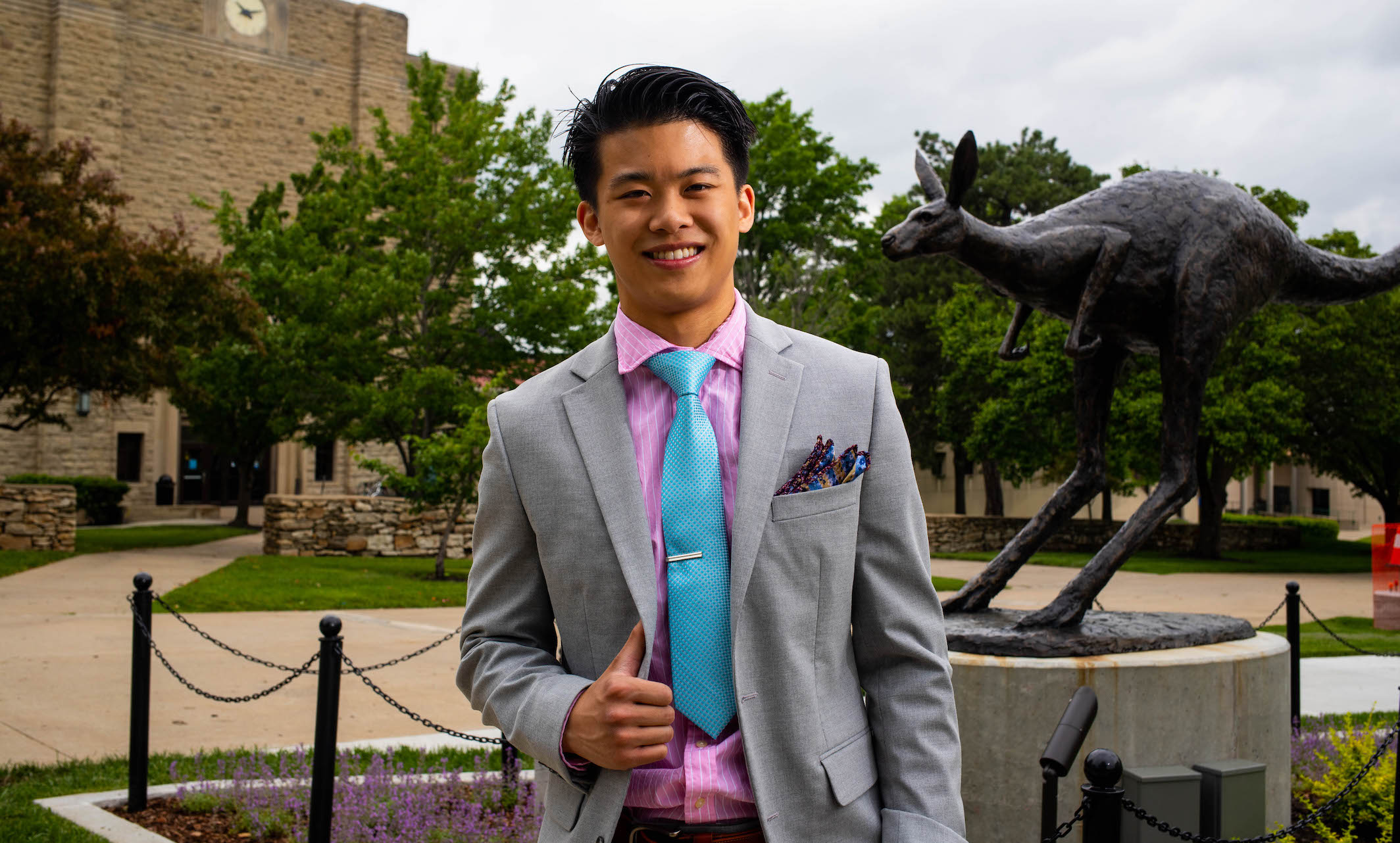
Tim Nguyen finds inspiration in faculty and fellow students alike
Our ongoing story starts with people from around the world, converging here at UMKC. Get to know our people and you’ll know what UMKC is all about.
Tim Nguyen Hometown: Lee’s Summit, MO High School: Lee’s Summit West High School Academic program: Biology B.S (Pre-Dental) and Chemistry B.A Anticipated graduation year: May 2022
Why did you choose UMKC?
I chose UMKC because it became my home away from home. The people I have met at UMKC and in Kansas City are some of the most impactful individuals who have helped me achieve my academic and professional endeavors.
Why did you choose your field of study?
I chose to study and work towards a B.S. in Biology and a B.A. in Chemistry to prepare me for dental school with a business minor.
What are the benefits of the program?
One benefit of the program is that everybody knows everybody else as a biology and/or chemistry major. You are able to form a close community with others. There will be nobody else that will be as supportive towards your success than some of the people you will meet during your time at UMKC.
How has your college program inspired you?
My college program has inspired me to learn from faculty, advisors and upperclassmen who are wiser, smarter and more hard working than me so I can continue to grow. I see them as mentors and role models and I want to embrace and embody their good qualities.
"There will be nobody else that will be as supportive towards your success than some of the people you will meet during your time at UMKC." — Tim Nguyen
Since entering college, what have you learned about yourself?
I have learned I can do anything, but I cannot do everything. Motivation comes and goes sometimes, but passion lasts forever. I’ve learned to grow comfortable in the uncomfortable. My mentality is to live life giving 110% day in and day out.
Are you a first-generation college student? If so, what does that mean to you?
No, my parents were born in Vietnam, but had some college here in America. My mom went to a small college and my dad had some community college and then transferred. I am the first in my family and extended family to be born in the United States and to go to college.
I have nothing but respect for my parents as they left Vietnam by boat to come to America, escaping the Communists there. I want to make the most of my life here as I would not have the life and opportunities here if my parents never risked their lives leaving Vietnam.
Who do you admire most at UMKC?
I met Joseph Allen during Biology Bootcamp my freshman year and have never heard anything negative said about him during my time at UMKC. He is approachable - a role model - and I view him as a one of many mentors. His humility and his presence radiate with others. He was an individual that everybody knew, and he never had to introduce himself in a room.
"I seize opportunities that I can learn from." — Tim Nguyen
What’s the best piece of advice you have ever received from a professor?
“Be on time and ready to play.”
What extracurricular activities are you involved in at UMKC?
This fall semester I’ll serve as president for the UMKC Student Government Association. I will be an assistant coordinator for Academic Support and Mentoring Supplemental Instruction in the fall as well as leading the Biology Honors Discussion Group, which I’ve led for the past two years.
I’ve led Biology 108 with Dr. Benevides for three semesters, general chemistry my second semester of college, Organic Chemistry as a TA for Dr. Kilway this past fall and spring semester.
I will be working with Residential Life, and I also enjoyed putting in time with intramurals, such as soccer and volleyball when I started college at UMKC.
Do you have any scholarships? What do they mean to you?
The UMKC Trustees’ Scholarship has given me the blessing to expose myself to all the opportunities UMKC has to offer and the networking connections of individuals in the community wanting to see me succeed.
Receiving this monetary scholarship has tremendously reduced the financial burden for my family, giving me peace of mind. It will allow me to continue to pursue my professional and academic aspirations, and I am truly grateful. This generous financial support has given me more time to really serve students at UMKC through being able to be as involved I can.
“During these internships, I learned, “If you see it, you can be it.” — Tim Nguyen
Have you had an internship/job shadow? What did you learn during your internship?
After my freshman year I was a Bluford Scholar in the Bluford Healthcare Leadership Institute (BHLI.) After my sophomore year, I spent a week with a program piloted by BHLI and partnered with the Stowers Institute right across from UMKC. During these internships, I learned, “If you see it, you can be it.” This summer, I will be doing Phase 2 of the program.
What do you hope to take from your experiences at UMKC into your professional career?
I hope to take lessons which will prepare me to embrace all the setbacks that I may encounter and obstacles I must confront. I truly feel that UMKC has given me the culture and energy to give 110% in every task in front of me. I want to maximize what I’m given to be a difference maker, a catalyst for change and someone for my community, not just in it for what my professional career may have in store for me.
What is one word that best describes you and why?
Intentional. I seize opportunities that I can learn from. These invaluable opportunities may be labor-intensive, hard, rare and sometimes definitely not easy. However, all of them are worth it. I love to listen to others and be open minded so I can lead better and become better. Some of the best ideas have come from listening to other students’ voices that helped me make an idea reality.
May 27, 2021
Provost Jenny Lundgren talks about 2021 commencement
During a third of the radio hour (beginning at 6 minutes 15 seconds), UMKC Provost and Professor Jenny Lundgren discusses the pandemic, how the campus operated and in-person commencement at Kauffman Stadium. Hear the recording.
May 27, 2021
Kansas City Star taps UMKC English professor who studies Black literacy
Antonio Byrd, an English professor at UMKC who studies Black literacy, described critical race theory as a way to illuminate the role of racism in a society that doesn’t tend to think racism is a major problem. By considering the impact of racism, Byrd said, steps can be taken to fix it. Read the article in the Kansas City Star. (subscription required)
May 26, 2021
Adriana Gonzalez will attend UMKC
KC Scholars 2021 award winner, Adriana Gonzalez, Park Hill High School, Parkville, plans on attending UMKC, and first learned of being awarded the scholarship when she opened her email and read the letter informing her of her win. Read the article.
May 26, 2021
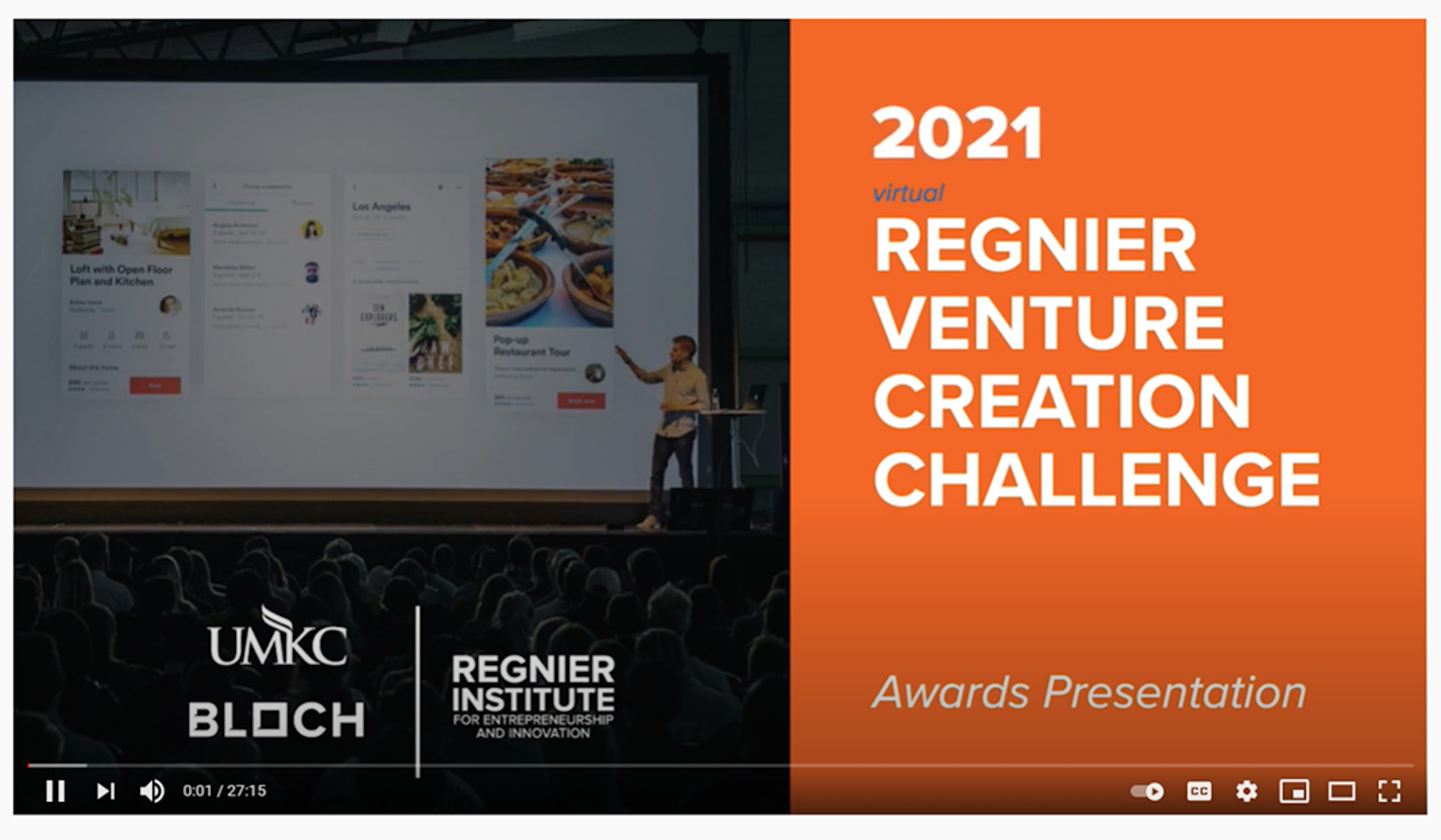
Annual pitch competition provides critical startup funding and experience
The Regnier Institute for Entrepreneurship and Innovation at the Henry W. Bloch School of Management has selected winners in the annual Venture Creation Challenge pitch competition.
“Each year we are amazed and invigorated by the energy and innovation of the entrepreneurs who are a part of the Regnier Venture Creation Challenge,” said Jeffrey S. Hornsby, executive director of the Regnier Institute. “In both the private and the nonprofit sectors, these leaders are changing the way we do business, support communities and create opportunities. We are grateful for their passion and the volunteers who take on the task of judging these outstanding business plans.”
The Regnier Venture Creation Challenge is a University of Missouri-Kansas City business plan and pitch competition promoting entrepreneurship. The Regnier Institute received more than 75 applications from 12 different high schools, colleges, universities and the E-Scholars program from the Missouri, Kansas, Iowa and Nebraska region.
More than $65,000 in prizes that were awarded at this year’s competition were made possible through donations from Bob Regnier and Regnier family, Blue Cross Blue Shield of Kansas City and David Block and the Block family.
During the competition, mentors, advisors and community partners volunteer to serve as judges throughout the competition.
“The real benefit of the competition – beyond the monetary support – is the wealth of feedback that participants receive from our volunteers,” said Bob Regnier, naming benefactor and founder, executive chairman and CEO of the Bank of Blue Valley. “Those experienced perspectives can be invaluable to the success of these emerging ventures.”
Innovation Awards
Splitsy, $15,000
Splitsy is a patent-pending mobile application that allows peers to automatically split payments for shared bills.
Woodie Goodies, $10,000
Woodie Goodies buys used books in bulk from major thrift-store chain warehouses and resells to retailers. All children's books are donated to low-income schools.
Relay Trade Solutions E-Scholars, $5,000
Relay Trade Solutions connects shippers, carriers, origins and destinations for seamless order to delivery, which saves up to 50% on back office costs and streamlines payment.
Honorable Mention Awards
Outstanding High School Entrepreneur, $2,000
Freescholars.com
freescholars.com is a marketplace that connects businesses, nonprofits and academics with high-achieving high school students for various services, which allows student to explore career interests, acquire real-world experience and enrich their college applications.
Outstanding Undergraduate Venture, $2,000
Vamose - Iowa State University
The patent-pending Vamose Gym Bag attaches to a backpack to enable students to avoid carrying an extra bag with them throughout the day.
Oustanding Creative Enterprise, $2,000
KeySpark - UMKC
KeySpark is a collaborative learning community of 7th-12th grade saxophonists that offers online music classes taught by experts in the field, an extensive resource library and a forum for students in areas where private instructors and musical opportunities are limited.
Outstanding Social Venture, $2,000
Cultura En Tus Manos - UMKC
Cultura En Tus Manos is an open online marketplace dedicated to helping artisans in Mexico market their products in the United States, allowing them to expand their customer base and easily export their products. Our platform differs from similar online marketplaces as we provide the artisans with personalized educational resources that allow them to develop effective marketing strategies to expand their online businesses while developing a cultural exchange through a meaningful connection with consumers.
BlueKC Healthcare Innovation Award 1st place, $15,000
CartilaGen, Inc., - University of Iowa
CartilaGen produces an injectable small-molecule drug suspended in a hydrogel vehicle that has been proven effective in preventing the onset of post-traumatic osteoarthritis (PTOA).
BlueKC Healthcare Innovation Award 2nd Place, $10,000
RollOut - Missouri University of Science and Technology
RollOut is a muscle roller and recovery product manufacturer that started in a dorm room and now partners with local businesses and online retailers.
Community Business Award
James and Rae Block Community Business Award, $2,500
Kufukaa, LLC
Kufukaa is a Kansas City-based small business that creates sustainable apparel at the intersection of kitchenware and home essentials which are handmade in Kansas City. This premium collection of sustainable apron lines fills a long-standing market gap in Kansas City's culinary scene.
The Regnier Venture Creation Challenge is a University of Missouri-Kansas City business plan and pitch competition promoting entrepreneurship. The Regnier Institute received more than 75 applications from 12 different high schools, colleges, universities and the E-Scholars program from the Missouri, Kansas, Iowa and Nebraska region.
More than $65,000 in prizes that were awarded at this year’s competition were made possible through donations from Bob Regnier and Regnier family, Blue Cross Blue Shield of Kansas City and David Block and the Block family.
May 25, 2021
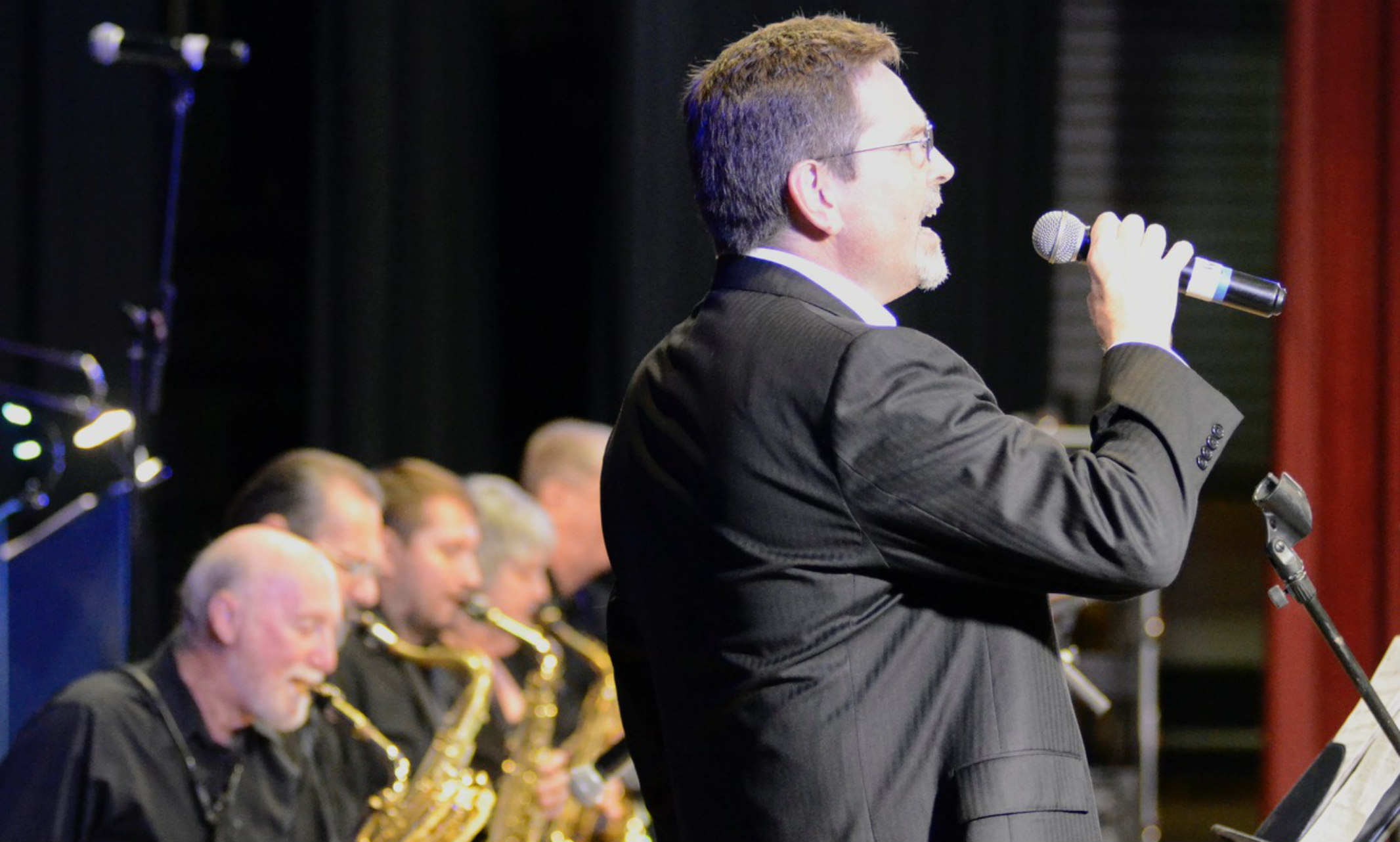
Christopher Hart’s music career goes down many paths
Where does a small-town Iowa boy go when he wants to be an opera singer? He goes to the big city for training.
Christopher Hart (M.A. '90) came to UMKC to study with Norman Abelson at the UMKC Conservatory. After graduation, he spent a few years in Oklahoma. Then “life happened” and Hart followed the calling of a small town and moved to McComb, Mississippi.
For the past 12 years, Hart has served as the minister of music, media and arts for Centenary United Methodist Church. His background in music education was useful last year as he, along with the entire world, had to navigate through the pandemic. When in-person events decreased in numbers or came to a halt, Hart had to get creative.
“We learned how to livestream,” Hart said. “It has been a big learning curve over the past year. It hasn’t been easy, but we’ve learned how to adapt to it. The church never closed.”
Throughout the pandemic, Hart said the church held in-person and livestream services. Although attendance has picked up in the last few weeks, Hart said they will continue to offer a livestream because people like having that option. Hart said they brought the choir back in March with a few people in the balcony.
“They’re having a good time up there,” Hart said.
Hart has written dozens of songs. One he wrote six years ago, “In the Cross,” won best Christian song in the Dallas Songwriters Christian songwriters’ contest. The song, and a few others, can be found on iTunes. He has also written scores for four feature films with a fifth that will be released at the end of the year.
Hart’s current project, 12 Westerns in 12 Months, is a collaboration with friend, filmmaker and actor Travis Mills. He said the project has been fun and challenging because the deadlines are constant. To write the score for each movie, Hart read the scripts and received music ideas from the director, often in the form of temporary music. He said the process has been fun.
“Composing is like putting a puzzle together,” Hart said.
Between 2020 and 2021, Hart composed the soundtracks for "Bastard's Crossing," "She Was the Deputy's Wife," “The Bank Robbery” and "Counting Bullets." “Bastard's Crossing” garnered several film festival awards, the most recent being Best Mississippi Feature Film at the Oxford, Mississippi Film Festival. The movies will all be available on DVD, Amazon and Amazon Prime. Hart garnered a Festival Director’s Choice Best Score for “Counting Bullets.”
Being a songwriter is not easy and doesn’t make a lot of money, so Hart created his own publishing company called Ten Minutes to Anywhere. The company name came out of his move to Mississippi.
“You can get anywhere in this town in 10 minutes,” he said. “It is nice.”
Even though being a composer and songwriter is more of a side gig, it is rewarding. His advice to someone considering a career as a composer is to keep writing.
“Write music every day,” Hart said. “Learn as much as you can about your craft. Study different composers. Don’t study just one genre. Be flexible. Study other people. Learn about the instruments. Learn about orchestral techniques. Learn about software and virtual instruments.”
And speaking of side gigs, Hart has also been performing onstage for more than 40 years and has become an experienced background actor.
“It’s fun being in the movies,” he said. “It’s a lot of work. It’s harder than you imagine.”
With a variety of projects at hand, Hart stays grounded and has turned projects down.
“I care about what I do,” Hart said. “I want what I do to be the best that can happen. I want to stay true to myself.”
For now, Hart is for hire as a composer and actor. His studio is in his home.
“As I get closer to retirement age,” he said. “I know I can do it from anywhere.”
And by it, Hart doesn’t only mean acting and composing. During the pandemic, Hart said he was concerned about losing his ability to sing high notes, so he’s been taking voice lessons. He’s ready to audition again. This opera singer is ready for his next role.
You can find Christopher Hart Film Composer on Facebook and see his acting credits on his IMDb page. They include The Wilderness Road, Tales of the Natchez Trace, Texas Red, Breaking News in Yuba County, Bastard’s Crossing, One Night in Miami, four episodes of NCIS New Orleans, two episodes of On Becoming a God in Central Florida, The Highwaymen.
May 25, 2021
Kansas City-area law professors are weighing in on a possible legal battle between the city and the Board of Police Commissioners
Allen Rostron, law professor at the University of Missouri-Kansas City, said the situation is a novel one. Read the full story.
May 25, 2021
Kansas City Star taps Ken Novak from UMKC
“Were it (moratorium on evictions) to be lifted, especially all at once, and there was a flood of evictions or foreclosures, that just creates more housing and shelter instability,” said Ken Novak, a professor of criminology at the University of Missouri-Kansas City. Read the full article. (subscription required) This story was picked up by The Pitch.
May 23, 2021
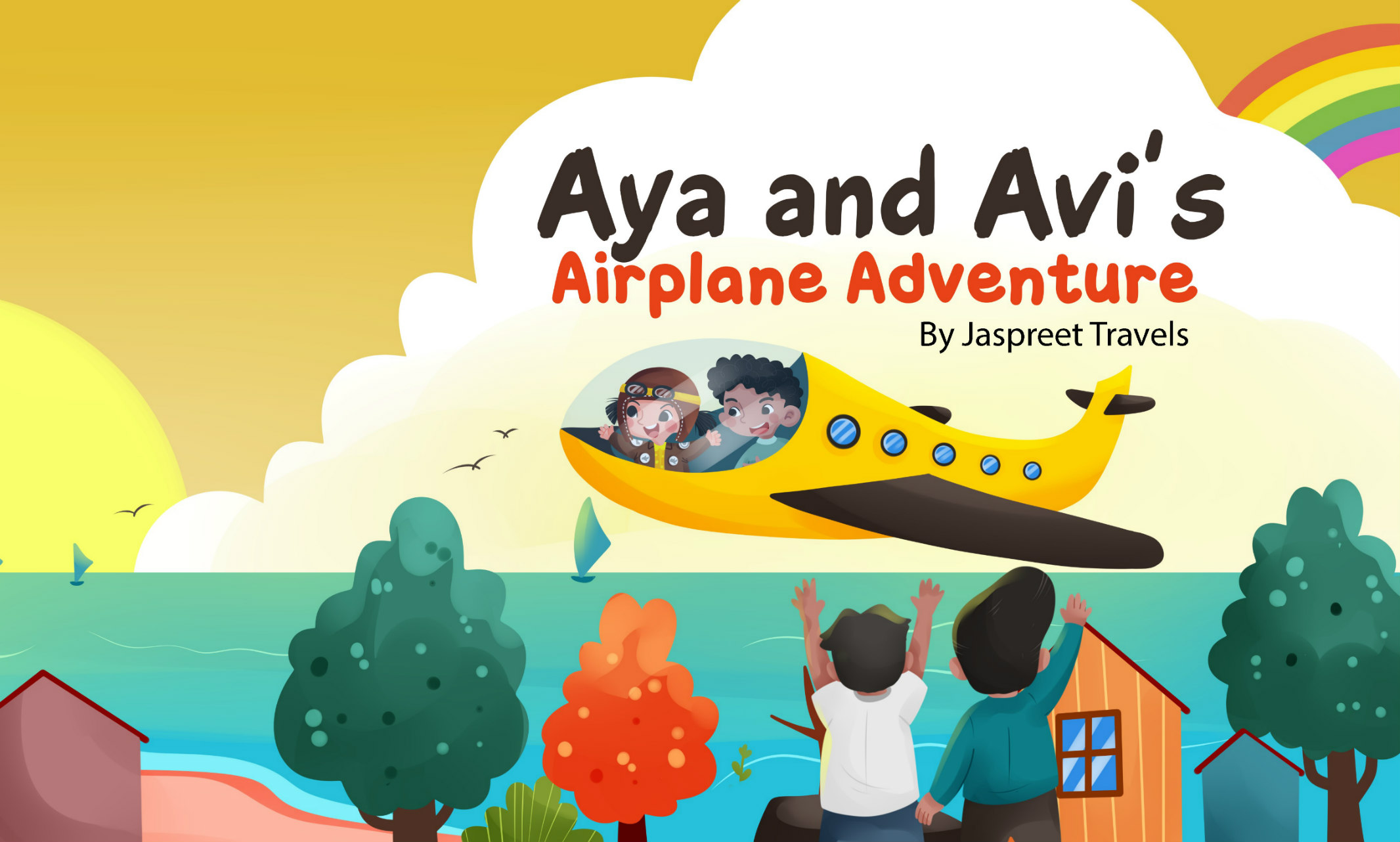
Pandemic free time prompted Jaspreet Singh to create underrepresented characters
Jaspreet Singh graduated from the Henry W. Bloch School of Management in December 2015 with an eye toward the sky. His dream was of an airline industry career on the business side and an interest in designing experiences for travelers on the personal side.
Since graduation, this 2015 Student Entrepreneur of the Year has been traveling around the world with his job at United Airlines accomplishing many of his goals. When we wrote about Singh before graduation, he said college inspired him to push himself and to be the best version of himself that he can be.
“It has motivated me to expand my network and get out of my comfort zone and focus on personal and professional goals,” he said.
So, we decided to check in with Singh and see how far he’s pushed himself. It turns out, that he’s been accomplishing quite a bit in spite of the travel restrictions caused by the pandemic. He wrote a children’s book, Aya and Avi's Airplane Adventure. He's also been named by Tripadvisor as one of eight Asian-American influencers to follow.
Singh is an award-winning airline industry passenger experience professional with experience across product marketing, pricing and revenue management, e-commerce and digital marketing. Writing the book was separate from his job. His goal is to inspire the next generation of aviators through diversity and representation by allowing the kids of today to see themselves represented in aviation.
“The idea for the book was born as a quarantine side project in my free time and took me about a year to do,” Singh said.
Professionally, Singh said the pandemic forced him to use the entrepreneurial mindset instilled in him during his studies and in his day-to-day life by learning how to pivot and think more innovatively.
“Times within the aviation and travel sector were tough, but this required a shift in thinking and prioritization to operate like a start up.”
Personally, Singh said the pandemic allowed him to reprioritize and be grateful for all of the experiences, friends and family that have led him to this point and the value of being your true authentic self every day.
“It’s also allowed me to reflect on personal goals and ways to give back, which is one of the reasons I started writing this book – to help give back to the future of aviation by inspiring the next generation of aviators.”
A study done by the Cooperative Children’s Book Center found that nine times more children’s books were written annually about talking animals than featuring an LGBTQ character; and three times more books than with Asian American Pacific Islander characters, according to Singh. He said books with talking animals accounted for more books than all underrepresented minority groups combined.
“Growing up I never saw anyone like myself represented in children’s books and always wished I had something I could relate to,” Singh said. “Ultimately instead of waiting around for someone to write it, I decided to go ahead and just do it! I wanted to write a book that captured my lifelong interest of aviation with diversity and representation of characters from many backgrounds and ethnicities, including LGBTQ characters.”
The book is currently available on Amazon. Singh partnered with a third party to complete the illustrations. He has also secured a charity partnership through an organization named Rainbow Railroad where a portion of profits from every book sold are donated to help LGBT individuals living in fear of persecution, torture or murder, find a path to safety to start a new life.
May 21, 2021
UMKC alumni share college internship experiences with Fox4KC
University of Missouri-Kansas City graduate Daisy Garcia Montoya just finished an internship at City Hall in the communications department. UMKC alumna Aly Hernandez, external affairs manager for City Hall, was also interviewed for this story. Read more.
May 21, 2021
KCUR interviews Jannette Berkley-Patton
Jannette Berkley-Patton, professor at the UMKC School of Medicine and director of the university’s Community Health Research Group, was a guest on Up to Date. Read more from KCUR.
May 20, 2021
St. Joseph newspaper features UMKC History student's internship
Solveig Klarin, who is pursuing a master’s degree in history at the University of Missouri-Kansas City, said she is interested in the education and interpretation aspect. Read the full story.
May 19, 2021
KCUR taps Associate Vice Provost Kim McNeley
UMKC Associate Vice Provost Kim McNeley said AP courses and exams provide foundational skills for college-level courses. She said it’s important the college standards that evaluate student’s learning be consistent and maintained, even during a pandemic. Read the article from KCUR.
May 18, 2021
College of Arts and Sciences faculty provide insight for KCUR story on blighted buildings
Erik Olsen, professor and chair of the economics department at the University of Missouri-Kansas City; and Erin Royals, neighborhood outreach and research coordinator at the Center for Neighborhoods at UMKC, were interviewed for this story. Read the story from KCUR.
May 18, 2021
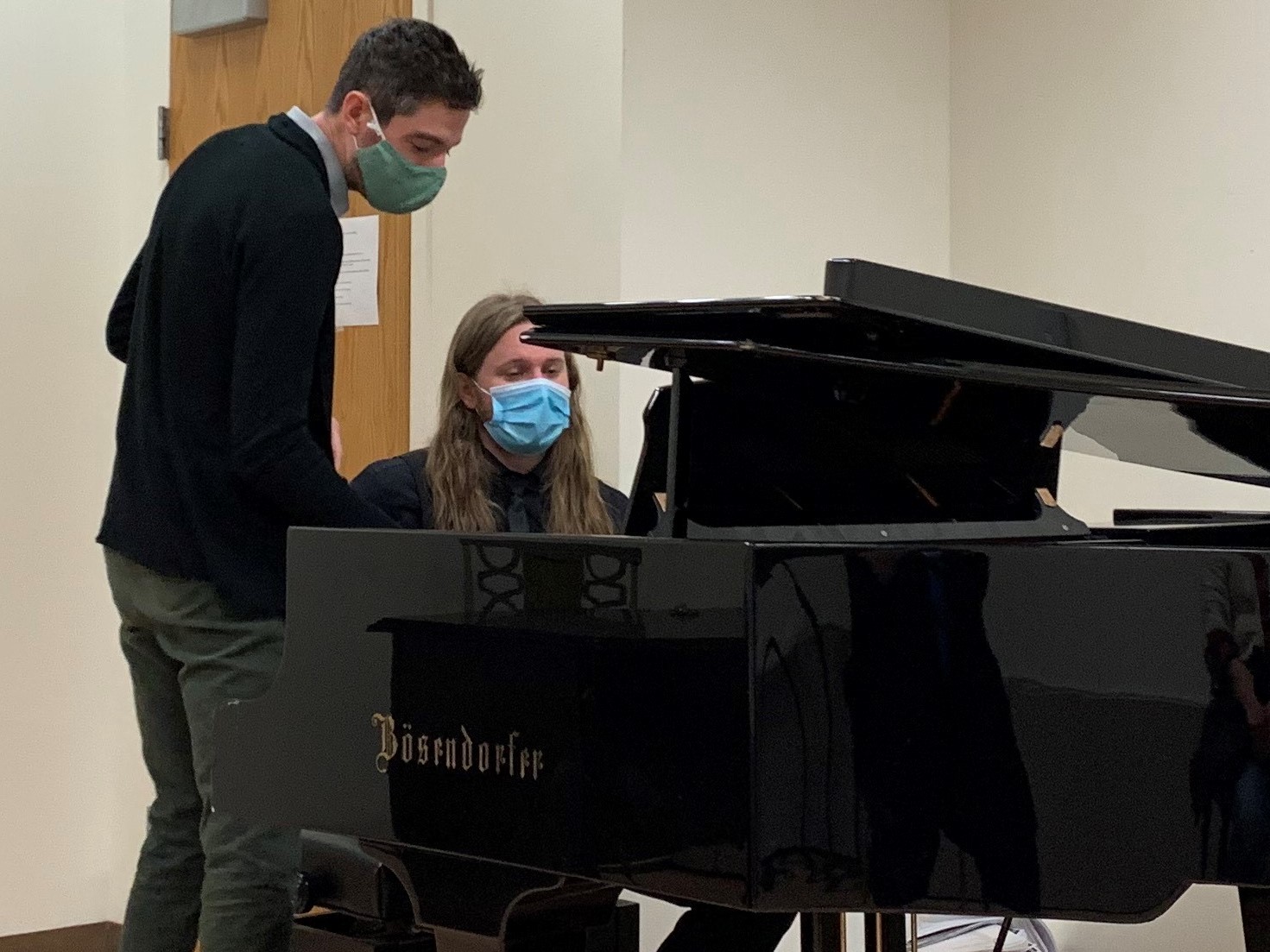
UMKC piano professor battles – and overcomes – his sudden hearing loss.
As assistant professor of piano pedagogy at the University of Missouri-Kansas City Conservatory, the ability to hear is critical to Chris Madden.
Each day, he listens intently to his students play and perform works on the piano, helping to fine tune their skills. His listens to the notes with detail and for clarity, providing valuable feedback in their learning process. He also enjoys listening to his own playing of the piano, which he picked up at the age of 13.
“Starting at that age is relatively late compared to my colleagues,” said Madden. “No one in my family was particularly musical, but piano was something I wanted to do. I even paid for my own lessons to start out!”
But last fall, Madden woke up one morning not able to hear out of one of his ears.
“I thought it was a clogged ear from congestion,” said Madden, who didn’t think much of it at the time. But that changed a few days later. “I was biking downtown and couldn’t hear a city bus passing by me on my left side. I knew something was very wrong.”
Doctors diagnosed his condition as idiopathic sudden sensorineural hearing, commonly known as sudden deafness. “I was devastated,” said Madden. “The first thing I thought of was how am I going to teach like this?” said Madden. “I just started at UMKC two years ago and then something like this happens.”
His type of hearing loss is rare – about 1 in 5,000 are diagnosed each year according to the National Institute of Deafness and Other Communication Disorders. Doctors believed Madden’s case was caused by a virus. His physician prescribed steroid treatments and shots, along with sharing the odds that only 10 percent of people regain their full sense of hearing.
“My doctor kept emphasizing with this diagnosis, every day counts,” said Madden. “With each person I talked to, I’d say, ‘I don’t know if you can get me in today, but here’s what I do for a living. I work at a conservatory and hearing is my life.’”
Researching his treatment options, he connected with North Kansas City Hospital and its hyperbaric oxygen therapy, called HBOT. The treatment involves breathing pure oxygen in a pressurized environment. It’s a well-established treatment for scuba divers suffering decompression sickness, but has also been effective in treating hard-to-heal wounds and other health conditions such as sudden hearing loss. Within 24 hours of calling NKCH, Madden was undergoing treatment.
For 20 days, he received a two-hour-long HBOT treatment. He compared the chamber to an MRI tube, with one distinct difference. “The chamber is pressurized to 65 feet below sea level so my ears were popping quite a bit adjusting to that.”
Slowly – and fortunately – Madden’s hearing started to return. It wasn’t immediate, but by the end of his treatment, all hearing tests were back to normal. “My cell phone is finally back to the lowest volume,” said Madden.
“When my students play the piano now, I sit there and think it’s just nice to hear normal sounds again, because it wasn’t like that for a few weeks there.” – Chris Madden
“When my students play the piano now, I sit there and think it’s just nice to hear normal sounds again,” said Madden. “Because it wasn’t like that for a few weeks there.”
Madden credits his recovery to the combination of his steroid therapy and HBOT, along with his ability to get treatment so quickly. And he encourages others to act fast when facing urgent changes in your health – something he also emphasized when sharing his story with KSHB TV-41 and North Kansas City Hospital.
“You really have to advocate for yourself,” he said. “If it feels urgent, go straight to the doctor and say, ‘This is an emergency!’”
May 17, 2021
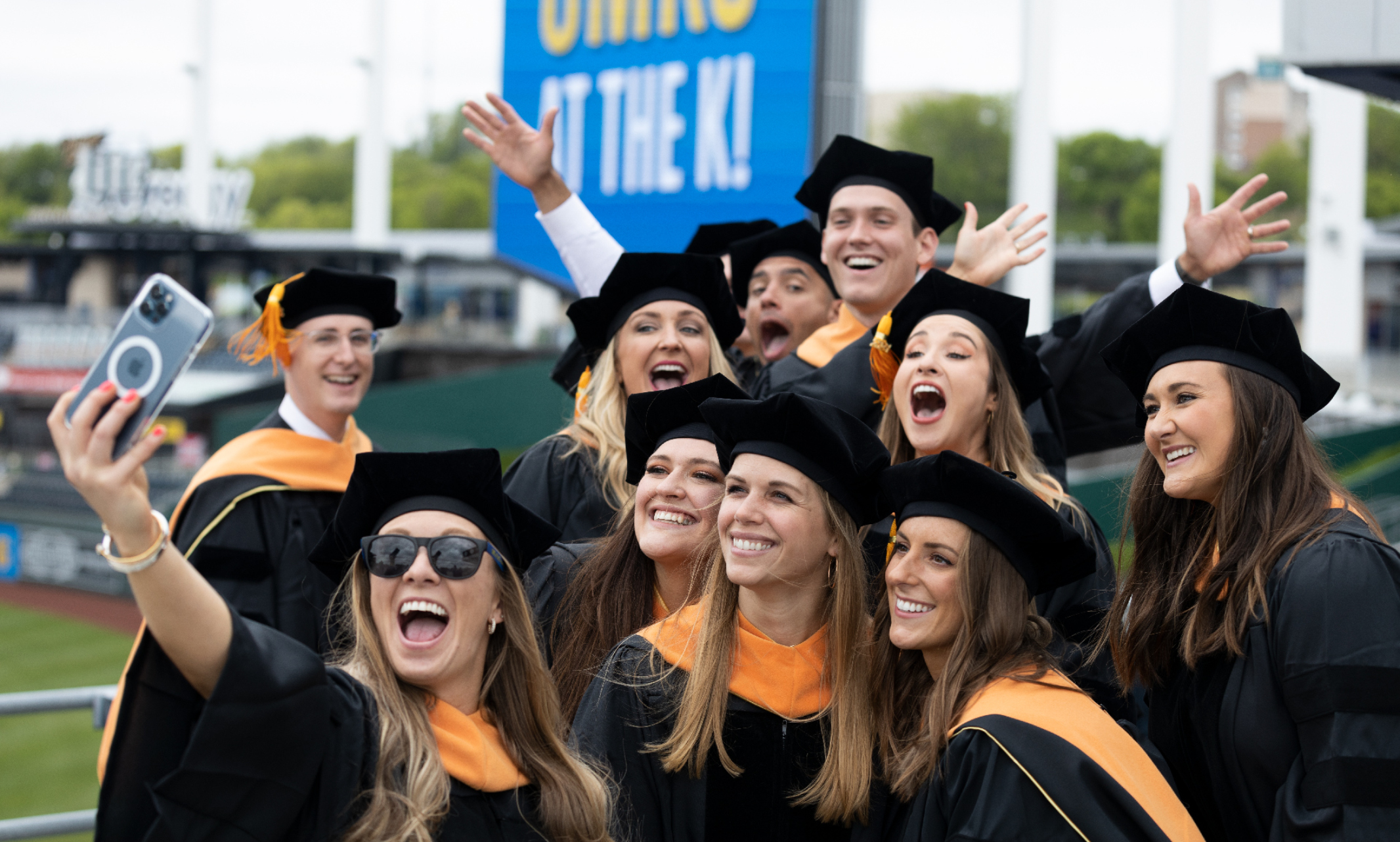
Historic setting at Kauffman Stadium marks emergence from isolation
The University of Missouri-Kansas City emerged from more than a year of pandemic isolation in spectacular fashion, as the community celebrated the degrees earned by more than 2,300 graduates in a historic two-day commencement celebration at Kauffman Stadium, home of the Kansas City Royals.
Kansas City’s university partnered with Kansas City’s beloved baseball team to create an unprecedented pandemic coming-out party in true major-league fashion, complete with the giant CrownVision screen broadcasting each individual graduate larger than life to all guests in the stadium. In addition to the Class of 2021, UMKC invited graduates from the Class of 2020 to return to their alma mater to celebrate their own achievements in person, an opportunity they had missed because of the risks of COVID-19 at its worst.
It was a celebration of not just academic accomplishment, but of perseverance through multiple significant challenges.
“Considering the unique challenges you overcame to get here, it is very fair to say that the classes of 2020 and 2021 are major league in every respect.” - Chancellor Mauli Agrawal
Kauffman Stadium was full of UMKC at The K details on CrownVision and other screens, including #RoyalRoos #Classof2021RooStrong #Classof2020RooStrong Photo by Brandon Parigo, Strategic Marketing and Communications
“Considering the unique challenges you overcame to get here, it is very fair to say that the classes of 2020 and 2021 are major league in every respect,” said Chancellor Mauli Agrawal. “From the great recession that arose when most of you were children; to the unprecedented global pandemic from which we are beginning to emerge, you have been challenged like few graduating classes before. You are here today because you refused to be defeated by those challenges.”
Graduates in the Saturday ceremonies celebrated under overcast skies but stayed dry. Sunday's ceremonies brought rain, but it failed to dampen the spirits of the graduates or the guests who cheered them.
UMKC Conservatory theatre majors wore red noses. Photo by Brandon Parigo, Strategic Marketing and Communications
UMKC graduates enjoyed the #RoyalRoos surroundings. Photo by Brandon Parigo, Strategic Marketing and Communications
Celebrating in the rain! Photo by Brandon Parigo, Strategic Marketing and Communications
UMKC Provost Jennifer Lundgren acted as grand marshal of the ceremony.
"We are so grateful to John Sherman and the Kansas City Royals for giving us this opportunity to celebrate in the majestic Kauffman Stadium," Lundgren said. "We certainly feel at home surrounded by blue and gold."
UMKC alumna Mary Daly, Ph.D., president and Chief Executive Officer of the Federal Reserve Bank of San Francisco, delivered a commencement address that also focused on the unique situation of the two graduating classes.
“The pandemic has torn away the trappings of our normal lives,” she said. “Some of the revelations have been hard. Disparities, divisions, hate, a sense that there is too little for all of us and that we must each fight for our fair share. But we’ve also seen brightness, generosity, vulnerability.”
Because of their pandemic experience, she said the graduates “bring something critical, beyond your degrees and programs. You bring lived experience.”
“In you lies the power to demand something different,” she concluded. “The tragedy of the pandemic can be your strength, your superpower … I guarantee you this: If you do that, our children’s children will read about you. They’ll wonder how those heroes changed the world.”
Graduating students stood waiting to cross the stage. Photo by Brandon Parigo, Strategic Marketing and Communications
The joy of graduation in a ballpark. Photo by Brandon Parigo, Strategic Marketing and Communications
UMKC School of Dentistry has graduated generations of Hawaiian alumni, thus the leis! Photo by John Carmody, Strategic Marketing and Communications
Cheering from the stands. Photo by Brandon Parigo, Strategic Marketing and Communications
Grad caps were especially creative at Commencement at The K. Photo by Brandon Parigo, Strategic Marketing and Communications
Student-Athlete Brandon McKissick crossed the stage. Photo by Brandon Parigo, Strategic Marketing and Communications
“We are so grateful to John Sherman and the Kansas City Royals for giving us this opportunity to celebrate in the majestic Kauffman Stadium. We certainly feel at home surrounded by blue and gold.” - Provost Jennifer Lundgren
The stage was set in front of home plate. Photo by Brandon Parigo, Strategic Marketing and Communications
Grad cap. Check. Umbrella. Check. Smiling selfie. Check, check, check. Photo by John Carmody, Strategic Marketing and Communications
Chancellor Mauli Agrawal and graduates smiled in the rain of the May 16 ceremonies. Photo by Brandon Parigo, Strategic Marketing and Communications
Even the rain tarp celebrated UMKC at The K. Photo by John Carmody, Strategic Marketing and Communications
“The tragedy of the pandemic can be your strength, your superpower … I guarantee you this: If you do that, our children’s children will read about you. They’ll wonder how those heroes changed the world.” - Mary Daly
Graduates line up to cross the stage at Kauffman Stadium. Photo by Brandon Parigo, Strategic Marketing and Communications
Hugging, finally. Photo by Brandon Parigo, Strategic Marketing and Communications
Congratulations, UMKC graduates! #RoyalRoos #Classof2020RooStrong #Classof2021RooStrong Photo by John Carmody, Strategic Marketing and Communications
May 16, 2021
Local media report on historic two-day commencement celebration
UMKC Classes of 2021 and 2020 gathered at Kauffman Stadium to accept their diplomas on Saturday and Sunday. Read the news coverage:
Kauffman Stadium serves as location for UMKC commencement ceremonies - KCTV5
A little rain wasn’t going to dampen the spirits of these UMKC graduates - Fox4KC
May 16, 2021
Kansas City Star interviews Toya Like, UMKC associate professor of criminal justice and criminology
“We’ve always seen social movements happen we just didn’t have a term for it, and movements for justice and equality and shared space, and shared resources,” said Toya Like, associate professor of criminal justice and criminology at the University of Missouri-Kansas City. Read the article in the Kansas City Star. (subscription required)
May 16, 2021
Sean O’Brien, UMKC School of Law professor, gives interviews to Kansas City media
“We thought that we opened an avenue for innocent prisoners,” said Sean O’Brien, a University of Missouri-Kansas City law professor who represented Joseph Amrine. “And then comes Rodney Lincoln.” Read the news coverage:
Lawyers set up fundraiser for Kevin Strickland, say they’re confident he will be freed - Kansas City Star (subscription requied)
Missouri Supreme Court won’t hear Kevin Strickland’s case. He’s innocent, prosecutors say - Kansas City Star (subscription required)
The Jackson County Prosecutor Says Kevin Strickland Is Innocent. Why Is He Still Behind Bars? - KCUR
Kevin Strickland is innocent, officials say. Can that free him from Missouri prison? - Kansas City Star (subscription required)
May 16, 2021
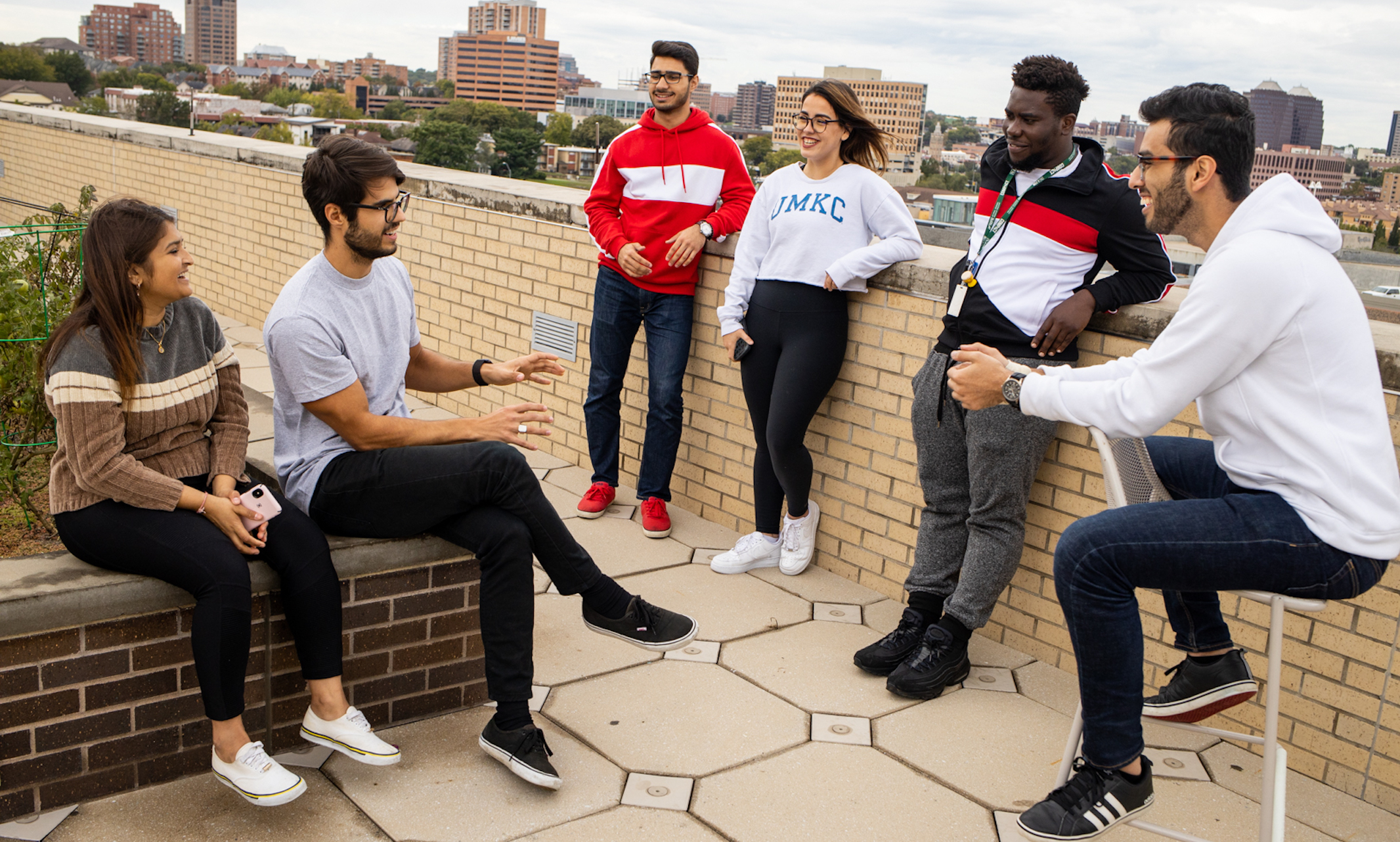
First round of funding from the Ewing Marion Kauffman Foundation supports seven initiatives
The UMKC Entrepreneurship Innovation Grant Program announced its first seven grant recipients this week. These recipients were awarded a total of $250,000 to develop new ways of approaching community challenges.
The Entrepreneurship Innovation Grant Program is a joint effort by the UMKC Innovation Center, the Regnier Institute at the UMKC Bloch School of Management and the UMKC School of Law to increase entrepreneurial activities across UMKC.
“This grant program was designed to create direct incentives to stimulate additional collaboration and growth on campus,” says Laura Moore, program coordinator for the Regnier Institute. “One of the real advantages of this program is that – in addition to the funding – we offer support programs to recipients to accelerate their success.”
"This grant program was designed to create direct incentives to stimulate additional collaboration and growth on campus." – Laura Moore
This year the Ewing Marion Kauffman Foundation donated $400,000 to stimulate on-campus innovation through entrepreneurial initiatives over the next two years. Twenty-one organizations responded to the call for proposals in February. Kansas City Explores Earth and Environment (KC E3) is one of this round’s recipients. An initiative from the Earth and Environmental Sciences department, this program provides support to students of color to pursue STEM degrees and enter the workforce. Participants will partner with high school students from the Kansas City Teen Summit (KCTS) community program to use STEM expertise to explore plans to tackle local environmental hazards and develop solutions for urban climate change.
The program would have looked very different without the grant funding.
“We would have had minimal activities if the program were run by myself and two graduate students,” Alison Graettinger, assistant professor of geosciences, says. “Funding will allow us to achieve a solid UMKC peer mentor to KCTS student ratio and provide additional equipment so student participants don’t have to share. This will enable stronger engagement and genuine practice collecting and managing real world data. We will also be able to bring Black business owners in the environmental sector to come talk to the KCTS students.”
Angela Cottrell, Ed.D, director of research and institute programs, says the funding was equally critical for her team at From Seed to Table to research education and infrastructure investment as she develops a training program for military veterans to receive workforce development and hands-on experience learning urban architecture.
“Without this funding the project would not have existed. Based on this funding our research team will receive an additional $600,000 award from the USDA National Institute of Food and Agriculture program. This will extend the project for three years and allow us to provide more military veteran participation.”
May 14, 2021
Media outlets report on COVID vaccination rates for Black Missourians
Jannette Berkley–Patton, a professor and community health researcher at the University of Missouri–Kansas City School of Medicine, says that without additional measures to boost vaccination rates in Missouri, African Americans as well as the community at large will remain at risk from the virus. Read more of the latest news coverage.
Kansas City COVID-19 Daily Briefing for May 21 - KCUR
KCUR All Things Considered
Study aimed at increasing COVID-19 testing in churches moves forward - KSHB
May 14, 2021
Two UMKC Law alumni receive significant judicial appointments
This story originally appeared in Res Ipsa, the UMKC School of Law alumni magazine. To learn more, read the full issue or visit the School of Law website.
Melissa Taylor Standridge (J.D. ’93) Justice, Kansas Supreme Court
Melissa Taylor Standridge
Justice Standridge had been a Kansas Court of Appeals judge since 2008. An adoptive and foster parent, she has a long history of volunteer work and activism on behalf of foster and adopted families. Standridge and her husband, retired Missouri Judge Richard Standridge (J.D. ’80), have six children, including four who were adopted.
She has received numerous awards during her career. Among them are the Sandra Day O’Connor Award for Professional Service from the American Inns of Court, the Carol Foreman Medal of Civility from the Kansas Women Attorneys Association and the Diversity Award from the Kansas Bar Association. She was one of the ten original committee members of the Kansas Bar Association Diversity Committee.
While in law school, Standridge served as editor-in-chief of the UMKC Law Review, Chief Justice of the Moot Court Board and the only student member of the Faculty Hiring Committee. Before graduating from UMKC cum laude, she served as a research assistant for then-professor Ellen Suni, now dean emerita, who Standridge says was an influential role model and mentor.
“A smile inevitably appears on my face when I think about the friends I made and the memories we shared, through both the painless and the more painful aspects of law school.” - Melissa Taylor Standridge
“Through her actions, I learned the importance of adhering to the rule of law, the value of a healthy work ethic and the necessity for excellence in every aspect of practice,” Standridge says. “But the most significant value she exhibited for me was her commitment to justice, fairness and inclusion.”
One of her most treasured memories of law school, she says, was her daily interaction with classmates.
“A smile inevitably appears on my face when I think about the friends I made and the memories we shared, through both the painless and the more painful aspects of law school.”
Brian Gaddy (J.D. ’94) Magistrate Judge, U.S. District Court for the Western District Of Missouri
Judge Gaddy focused primarily on criminal law during a 26-year career in private practice. He accepted
W. Brian Gaddy
numerous Criminal Justice Act appointments to represent indigent defendants in federal court and was appointed as learned counsel in seven federal capital murder cases, avoiding the death penalty in all seven.
In law school, he served as a research assistant to Curator’s Professor Nancy Levit and won the Ralph S. Latshaw Award as outstanding student tin criminal law courses. He graduated with distinction in 1994. Gaddy has served on the UMKC Law Foundation Board of Trustees since 2013. He currently serves as both vice president of the board and chair of the Resources and Leadership Committee.
“I have always felt the education and experience I had at UMKC not only helped me to become a better lawyer, but it helped me become a better person. My law school experience truly changed my outlook on the world,” Gaddy says. He credits Levit in particular. “Professor Levit has been supportive of my career ever since law school. She understands the peaks and the valleys of being a criminal defense lawyer.”
Gaddy sees his new role as a natural fit.
“I have always felt the education and experience I had at UMKC not only helped me to become a better lawyer, but it helped me become a better person. My law school experience truly changed my outlook on the world.” - W. Brian Gaddy
“My career was spent primarily in federal courts, so a federal magistrate judge position felt like home to me,” he says. “I was also positively influenced by numerous federal judges that I appeared in front of during my legal career. Many of them served as positive role models for me, and several served as mentors.”
He believes his career-long commitment to public service will influence his work on the bench.
“I have represented literally hundreds of indigent defendants in the criminal justice system,” Gaddy says. “I have represented homeless clients and victims of abuse through my work with the Volunteer Attorney Project. These experiences certainly shaped me as a lawyer and will serve me well as a new magistrate judge.”
May 13, 2021
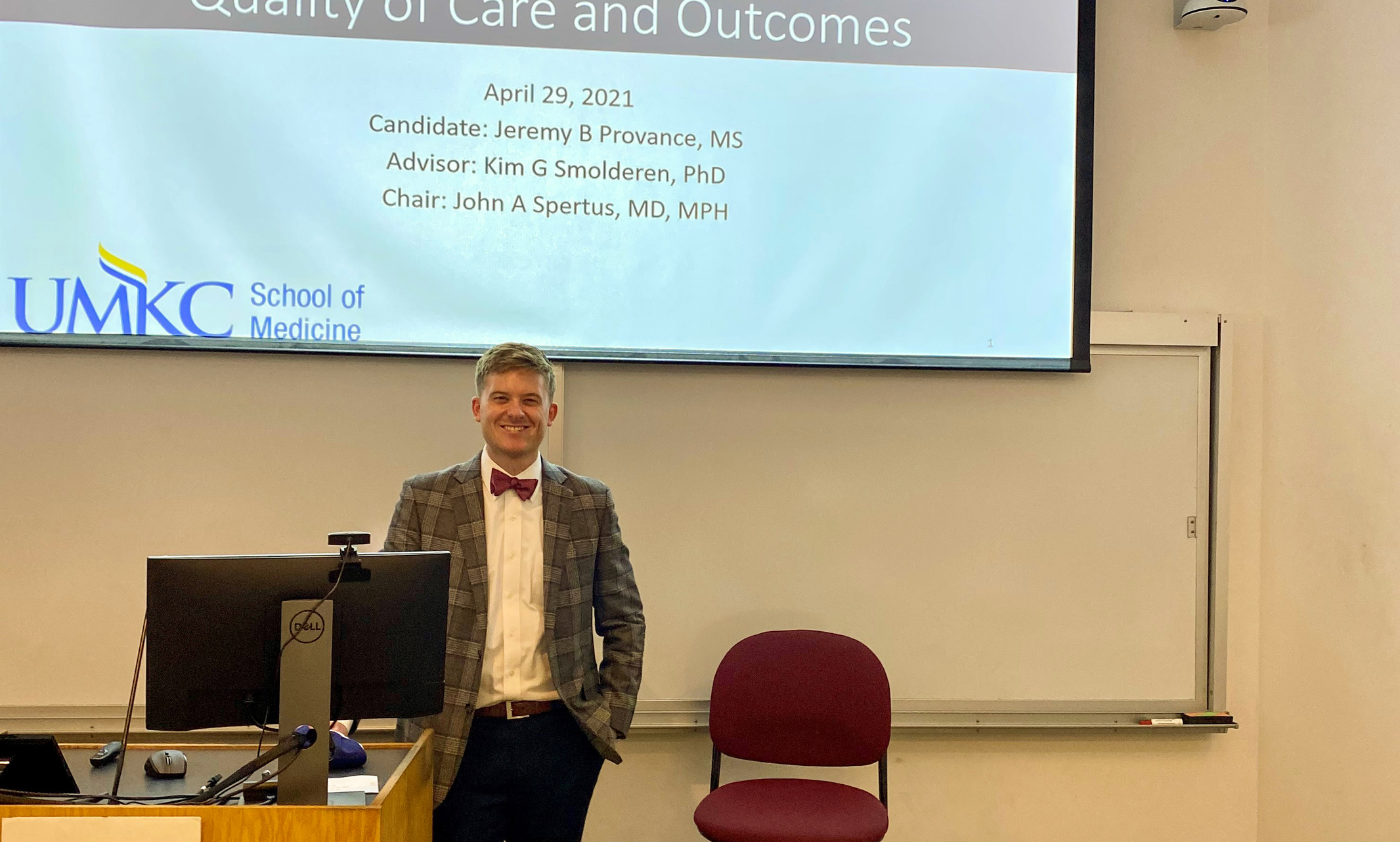
Jeremy Provance interprets data points to tell stories of people’s health
Jeremy Provance was always interested in both health care and computers but wasn’t sure how to fit them together. The UMKC School of Medicine provided his answer.
This month, Provance will be the first Ph.D. graduate from the medical school earning an interdisciplinary doctorate in biomedical and health informatics. He describes the field as taking the enormous amount of health data that is generated every day and “making sense of all of those data points and telling the story about what is happening with our health.”
Provance didn’t know bioinformatics and data science existed until he found them as part of UMKC’s interdisciplinary Ph.D. program. The program allows students to work across disciplines to develop an individual academic plan geared to their specific interest.
Through collaboration with UMKC’s School of Graduate Studies, the School of Medicine started offering bioinformatics as a co-discipline in 2014 and as a primary discipline in 2017. Studying this emphasis, students like Provance primarily focus on biomedical data and knowledge, using that information in problem solving and decision making to develop technology and processes that will shape the future of health care.
Provance earned his master’s degree in bioinformatics at the School of Medicine in 2017. He then continued in the I-Ph.D. program where he found several appealing factors during his studies, including the school’s quality of faculty, research opportunities and interdisciplinary aspect.
“My mentors were so critical to my success, and the faculty were such excellent people both in and out of the classroom. And bioinformatics is a such broad discipline – you can specialize in many different areas.” - Jeremy Provance
“My mentors were so critical to my success, and the faculty were such excellent people both in and out of the classroom,” he said. “And bioinformatics is a such broad discipline – you can specialize in many different areas.” Provance’s studies focused primarily on cardiovascular outcomes research through the Mid America Heart Institute at Saint Luke’s Hospital.
Fostering collaborations with area institutions and corporations and across disciplinary boundaries are the program’s strengths, according to Jenifer Allsworth, Ph.D., and the bioinformatics department vice chair. “Through these partnerships, our students work with and alongside people from different organizations and backgrounds. We are training students to have the skills to best contribute in a rapidly evolving field.”
Provance says his overall goal is to understand “what we do well as individuals, doctors and health systems, and to encourage those practices and to identify areas for improvement to change them for the better.” Soon, he’ll be doing just that at the Yale School of Medicine, where he’s accepted a research position with its Vascular Medicine Outcomes Group.
“I would not have been successful without the guidance of my research advisor, Dr. Kim Smolderen, and my dissertation chair, Dr. John Spertus. And certainly there are so many others – brilliant researchers, administrators, clinicians, fellow students and more – that helped me find my way through this program,” he said.
Though he was familiar with bioinformatics through his master’s degree, Provance says it’s hard to anticipate doctoral work until you are going through it. His advice to others considering the I-Ph.D. program? Find a strong mentor and understand the importance of collaboration and networking. “It makes all the difference when you are identifying the path forward,” he said.
And though it was four years of hard work, overall, Provance says he’d do it all again. “But I’m glad I don’t have to!”
May 13, 2021
Eleven students recognized for scholastic performance, community leadership and service
Graduating students who have excelled in both academic achievement and service may be nominated as a Dean of Students Honor Recipient.
“Every semester, it is our pleasure to host a breakfast in celebration of the accomplishments of the Dean of Students Honor Recipients. While this semester has been a bit different, we wanted to continue this tradition by virtually celebrating your achievements,” shared Co-Interim Dean of Students Keichanda Dees-Burnett. [watch the video]
This program recognizes the exceptional students who maintain high scholastic performance while actively participating in University and community leadership and service activities outside of the classroom.
“You are an exceptional group of people. Despite the demands of family, work and studies, you made time to give back to the community. When you saw a need, you worked to fill it. You are humanitarians, leaders and philanthropists and you should rightfully be proud of yourselves,” said Co-Interim Dean of Students Todd Wells. [watch the video]
Congratulations!
Saniya “Sunny” Ablatt – School of Medicine [watch the video]
Nominated by Stefanie Ellison [watch the video]
Mojtaba Mark Abnos – School of Biological and Chemical Sciences [watch the video]
Nominated by Kathleen Kilway [watch the video]
Abdulmajeed Baba Ahmed – School of Computing and Engineering [watch the video]
Nominated by Katie Garey [watch the video]
Charles Burke – School of Medicine
Nominated by Krisana West [watch the video]
Sarah Duggan – School of Law [watch the video]
Nominated by Sean O’Brien [watch the video]
Varsha Muthukumar – School of Medicine [watch the video]
Nominated by Brent McCoy [watch the video]
Isabella Nair – School of Medicine [watch the video]
Nominated by Brent McCoy [watch the video]
Ginikachukwu Osude – School of Medicine [watch the video]
Nominated by Katie Garey [watch the video]
Saloni Patel – School of Pharmacy [watch the video]
Nominated by Cameron Lindsey [watch the video]
Daphne Posadas – Bloch School of Management [watch the video]
Nominated by Katie Garey [watch the video]
Emily Rackers – Conservatory and Honors College [watch the video]
Nominated by Lynne O’Dell [watch the video]
May 13, 2021
KCTV5 interviews UMKC students about Commencement
Potentially heavy rain this weekend could pour down on several college graduation ceremonies, including UMKC’s commencement at Kauffman Stadium. Under sunny skies Thursday, lawn games acted as a small scale year-end celebration for a group of UMKC’s academic tutors, but the big celebration is this weekend. Read the article and watch the newscast.
May 13, 2021
School of Medicine associate professor weighs-in for Kansas City Star
“I think there’s a variation of response around COVID vaccination in general, but especially when it comes to children and parents thinking about the safety of their children,” said Bridgette Jones, pediatrician at Children’s Mercy and associate professor, department of pediatrics at University of Missouri-Kansas City School of Medicine. Read the full story from the Kansas City Star. (subscription required)
May 13, 2021
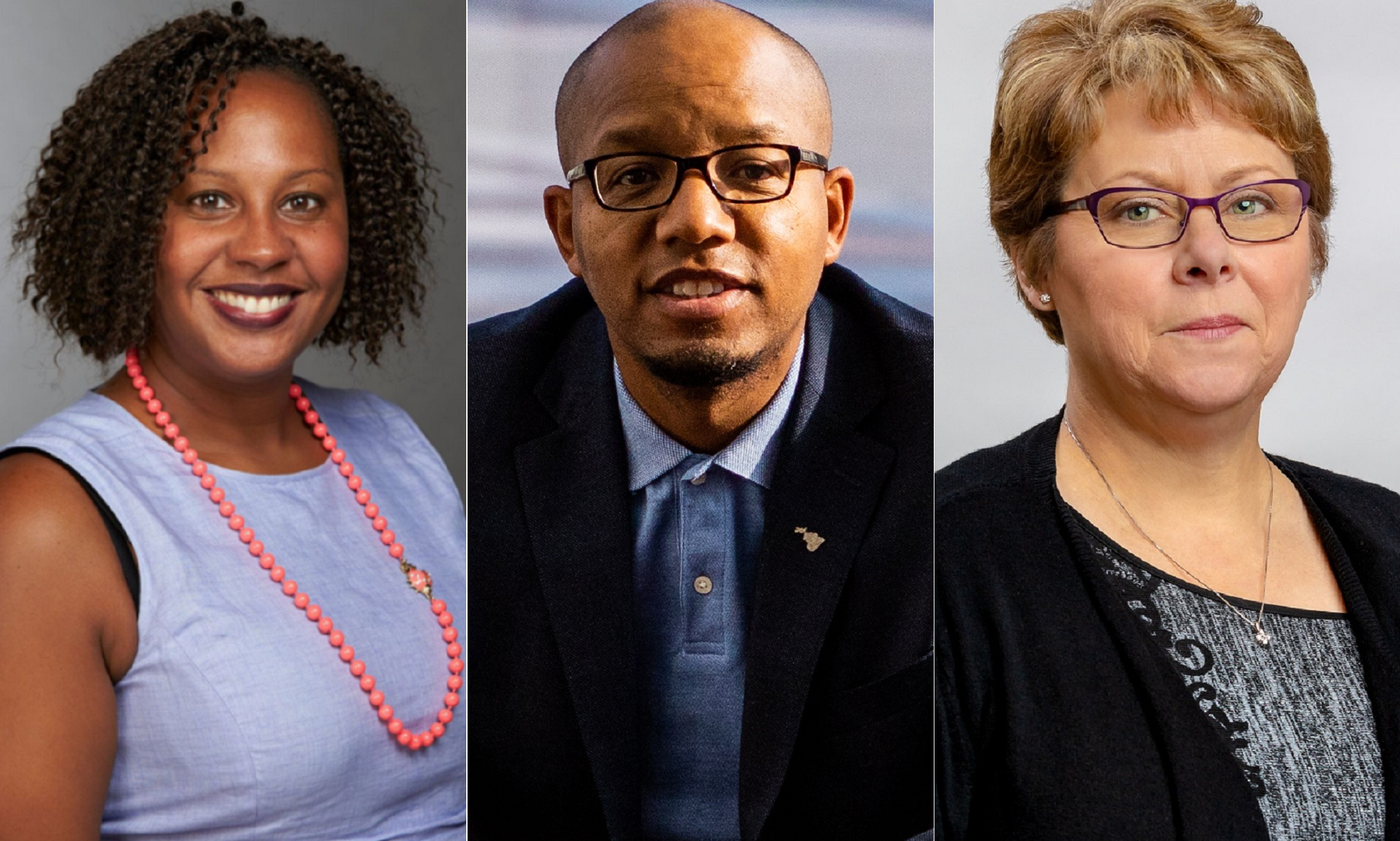
Standouts in health outreach during the pandemic will be recognized by national foundation
Three members of the UMKC health care community have been recognized by the university as 2021 Gold Foundation Champions of Humanistic Care.
They will be among those from across the country honored at a virtual gala June 10, where three national honorees, including Anthony Fauci, M.D., will also be recognized.
The winners, all nominated by the UMKC School of Medicine and its dean, Mary Anne Jackson, M.D.:
Bridgette L. Jones, M.D., M.S.C.R., associate professor of pediatrics; assistant academic dean in the medical school’s Office of Student Affairs; allergy, asthma and immunology specialist at Children’s Mercy
Obie Austin, F.N.P., M.S.N., UMKC Student Health and Wellness director and UMKC School of Nursing alum
Pam Bean, R.N., B.S.N., M.H.S.A., M.B.A., Truman Medical Centers/University Health vice president for practice management and ambulatory care
Sharing vital information
Jones was commended for working to ensure humanistic care for patients, providing COVID-19 education along with other trusted messengers and sharing her voice to eliminate health inequities for those most affected by the pandemic.
Her activities included working with a medical student leader to distribute masks to medical centers and communities in need, and collaborating with a faculty colleague to launch a fund-raising campaign to support Children’s Mercy employees who had unexpected financial need during the pandemic. She also discussed COVID-19 with community teenagers to answer their questions and was the host and moderator of a panel discussion with other trusted physicians and faculty focused on COVID-19 disease and vaccination in the Black community of Kansas City.
“Over the past year the pandemic has brought so much grief, sorrow, loss and pain to so many individuals, communities and our entire world,” Jones said. “I have been blessed to have my calling and purpose as a physician and as a human being to be a helper. I am blessed and privileged to be able to use my knowledge, skills and my voice to advocate and speak up for those who are most often thought of last or not thought of at all.”
Caring and collaborating
Austin, the longtime director of student health services for the university, was praised as “one of our true heroes over the past year” for his leadership in fostering a culture of care and service. He was commended for quickly learning about COVID-19 and continuing to say up on the latest information so he could be a trusted source for the broader UMKC community and as a member of the university’s Coronavirus Planning Team.
“Providing care never takes the back seat,” Austin said. “I learned that from so many beautiful souls that poured into me as a student here at the University of Missouri-Kansas City’s School of Nursing and Health Studies, and it has been an honor to give back to the community educators making a difference in the Kansas City community.”
Austin, a commander in the U.S. Navy Reserves, reflected on the past year.
“This war on COVID has tested our resiliency, fueled our compassion for others and most definitely our ability to see each other in an equal light fighting together as one people to save our humanity,” he said.
Rapid response throughout pandemic
Bean was praised for her efforts that kept Truman Medical Centers, a vital member of the UMKC Health Sciences District and a key affiliate for the School of Medicine, on top of the pandemic. Her nomination for the award said Bean “could not have been replaced in the early, uncertain days of the pandemic.” She helped design the protocols that enabled TMC to initially provide more than 100,000 COVID-19 vaccines, and her quick work allowed TMC to be the first medical center in the metro area to vaccinate its staff.
“Providers worked quickly, and with compassion, to match the cruel reality of patients dying without family by their bedside,” Bean said. “Patients turned to providers for emotional support, and I am proud of my team for answering that need while offering high-quality, comprehensive care.”
The Arnold P. Gold Foundation is dedicated to the proposition that health care will be dramatically improved by placing the interests, values and dignity of all people at the core of teaching and practice. In addition to Fauci, this year’s national Gold Awards will honor Wayne Riley, M.D., president of SUNY Downstate Health Sciences University and head of the Board of Trustees of the New York Academy of Medicine, and Eric Topol, M.D., founder and director of the Scripps Research Translational Institute and professor of molecular medicine at the Scripps Research Institute.
May 11, 2021
USA Today, more media outlets, interview Barbara Pahud about vaccine
Barbara Pahud, an infectious disease pediatrician at the University of Missouri-Kansas City School of Medicine, said she’s thrilled that the nation can add vaccinated teens to its list of accomplishments. Read the USA Today article. Read more from the Lansing State Journal and Wisconsin Rapids Tribune.
May 11, 2021
Fox4KC interviews UMKC Bloch professor
Stephen Pruitt, Arvin Gottlieb/Missouri Endowed Chair of Business Economics and Finance at the UMKC Block School, was interviewed for this article. Read the full article.
May 11, 2021
Nathan Mauck weighs-in on Missouri unemployment benefit news
Business owners do believe part of the reason why they can’t hire enough staff is increased unemployment benefits, but not the only reason. UMKC Associate Professor of Finance Nathan Mauck agrees with business owners. Read the news articles:
Missouri to end extra federal unemployment aid early - KCTV5
Local restaurant staff weigh in on end to COVID unemployment benefits - KCTV5
May 11, 2021
KSHB talks to dean of the UMKC School of Nursing and Health Studies about nursing shortage and pandemic
“The educational needs of the nursing profession and the need for nursing care that exists in the U.S. continues to push a feeling of responsibility and pressure on nursing educational institutions,” said Joy Roberts, dean of the UMKC School of Nursing and Health Studies. Watch the newscast and read the article.
May 11, 2021
Fox4KC taps UMKC Provost Jenny Lundgren
Jenny Lundgren, provost and professor of psychology at the University of Missouri-Kansas City, says while ads churn the economy, the “image” they oftentimes promote can affect our perception of beauty. Read more.
May 11, 2021
Bloch School professors lend expertise to media
As Kansas City starts to open back up from the pandemic, employers across Kansas City are finding it difficult to hire enough employees. When looking for experts to explain the problem, many reporters look to the economics and finance professors at UMKC. Here are some of the recent stories:
KCTV5 with UMKC Bloch School associate professor of finance Nathan Mauck
KCUR with UMKC Bloch School professor of Executive Education Ann Hackett
KSHB with UMKC Bloch School Arvin Gottlieb/Missouri Endowed Chair of Business Economics and Finance Stephen Pruitt
May 10, 2021
Local media announces efforts, which will be led by Jannette Berkley-Patton
Efforts will be led by Jannette Berkley-Patton, Director of the UMKC Health Equity Institute, and the project will run from June 1 until Nov. 31. Read the articles:
Jackson County Executive endorses 'Our Healthy KC Eastside' project - KSHB
Jackson County OKs $5 million to improve low COVID-19 vaccination rates on East Side - Kansas City Star (subscription required)
Jackson County spending millions in relief funding to vaccinate people in 6 zip codes - Fox4KC
New initiative will focus on building COVID-19 vaccine confidence in east Kansas City - Fox4KC
Jackson County will use federal funds to help vaccinate inner-city residents - KMBC
Jackson County meets for $5 million vaccine hesitancy proposal - KCTV5
UMKC-led project seeks to increase vaccination intake on KC’s eastern side - KCTV5
Jackson County Legislature Unanimously Approves “Our Healthy KC Eastside” Project - Lee's Summit Tribune
Jackson County OKs $5 Million To Ramp Up COVID Vaccinations On Kansas City’s East Side - KCUR
UMKC Awarded $5 Million to Fight COVID on Kansas City’s East Side - The Community Voice
May 10, 2021
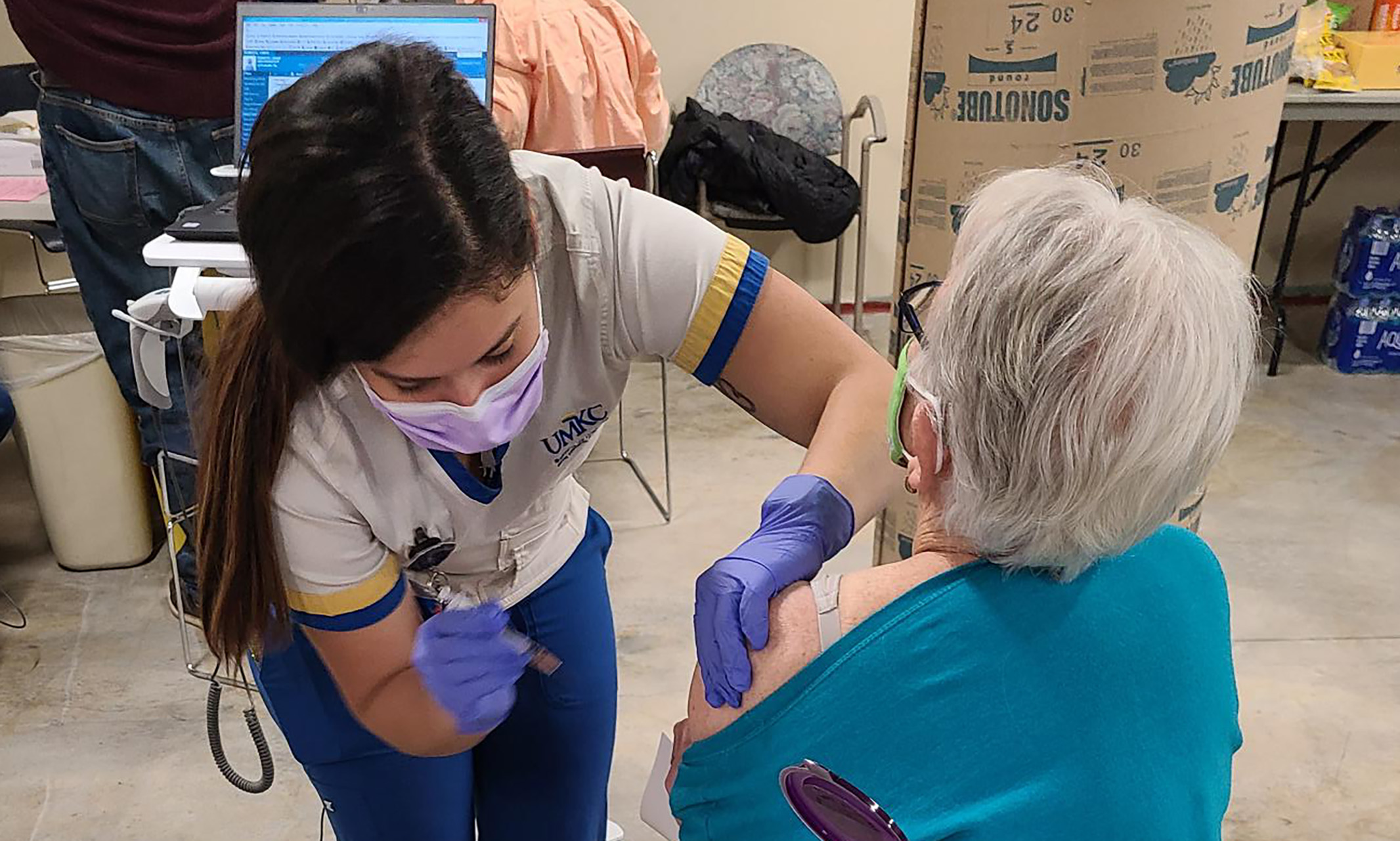
Meet the medical, nursing, pharmacy and dental students who are helping
At the University of Missouri-Kansas City, students from the four Health Sciences Campus schools have been busy in the COVID-19 vaccination effort, volunteering thousands of hours of service.
Third-year medical student Nikki Seraji said she recognizes that nurses and pharmacists often bear the brunt of the work of actually administering vaccines. So, when Stefanie Ellison, M.D., UMKC School of Medicine associate dean for learning initiatives, asked for medical student volunteers to become certified vaccinators, Seraji jumped at the opportunity.
“I’m studying the medical field and going to be doing this for a living and felt like I couldn’t help out enough,” she said. “When the opportunity to volunteer (as a vaccinator) came in in mid-January, I wanted to take advantage.”
Ellison said that 66 UMKC medical students from years one through six have been trained and certified to give vaccines. The students give vaccinations daily at the Truman Medical Center COVID-19 vaccination center at the University Health 2 building. They’ve helped with the School of Pharmacy’s campus vaccine clinic, assisted in vaccination events at Kansas City’s Arrowhead Stadium, the Kansas City Zoo, Hallmark and the Missouri Cerner campus among other events and clinics.
At the school’s new St. Joseph Campus, Steve Waldman, M.D., campus dean, said all of his students have been certified as vaccinators and have given vaccines at the St. Joseph Mosaic Life Care vaccination center. Many, he said, have participated in other community vaccination outreach events as well.
Ellison said she works daily to partner the School of Medicine with vaccine clinics and events across Kansas City.
“Our students are so wonderful that when TMC has a busy day, I can email or text our students to help in a pinch and three to five students show up to help,” she said.
Students at the School of Pharmacy are trained and certified to give vaccines during the second year of their curriculum. As of mid-March, pharmacy students and faculty had volunteered 4,400 volunteer hours to administer more than 17,500 doses of vaccines at 36 events throughout the state.
Jane Beyer, a third-year pharmacy student, said she began helping administer COVID vaccines in December as soon as they were available.
“It is exciting that as student pharmacists we are able to get out there and really help the community and be part of the solution to COVID-19” she said. “It's a very rewarding feeling to be part of the vaccine efforts in Kansas City.”
Medical student Seraji echoed that thought and admitted being a bit anxious when she was learning to administer a shot. With the help of the nurses who trained her, she was able to quickly adapt. Now she volunteers as a vaccinator at least once a week as her class schedule allows.
“I was definitely anxious when I was getting certified but I did maybe 20 or 30 (shots) the first time I was on my own and you get into a routine,” she said. “I’m trying to think how many that I’ve vaccinated. I don’t know but it’s definitely more than 80 or 90.”
Next door on the UMKC Health Sciences campus, nursing student Ciera Ayala got involved when the vaccination efforts were made an option for her clinical rotations. In fact, she has been part of eight vaccination events, most of them at Truman.
When she was vaccinated, Ayala said, she felt relief and “like there was a light at the end of the tunnel.” Now she is happy to share that feeling with all the people she inoculates.
“I find it very gratifying,” Ayala said. “I got to be a part of history, and it felt really good to be a part of the efforts to end this pandemic. It was also relieving, but also a little overwhelming, when we would have a line of hundreds of people for hours and hours ready to get their vaccine. It makes me happy that people are trusting in science!”
Ayala doesn’t remember any particular vaccine recipients, but she said, “it just felt really good when people were appreciative of our efforts.
“Health care workers don’t often get the recognition that is deserved, so when people recognized how hard we were working, it felt amazing.”
From the School of Dentistry, 119 third-and fourth-year students bolstered the ranks of student vaccinators after they were trained in early April. They already knew how to give the more involved injections needed to numb dental patients but had to learn the quicker technique for vaccines.
They were trained by Meghan Wendland, D.D.S., M.P.H., an assistant professor in the dental school, with help from faculty at the School of Nursing and Health Studies. They quickly joined in at Truman and at events for their fellow UMKC students.
One dental student, Tiara Fry, said she was “a little nervous” the first few times she gave the shot, “but once I got comfortable with it, it was great! It felt amazing to be a part of diminishing the spread of a virus during a pandemic.”
Fry said she sympathized with people who were skeptical or fearful but hoped to share the relief she felt when she was vaccinated.
“I knew it was for a great purpose to do my part in protecting myself and those around me,” she said. “I felt for those who were extremely afraid of needles. Many would tell me right before I gave the injection, so I tried my best to make them feel as comfortable as possible.”
Beyer said that working with the vaccine effort has made her a valuable resource to friends and family, helping them stay up to date on the latest information and vaccine availabilities.
“It's interesting that people have a lot of different responses to getting the vaccine,” she said. “There's kind of a split. Some people, I think, feel obligated to get the vaccine and are kind of nervous. But there's also the other half that just give sigh a sigh of relief after they get the vaccine. They're wanting to protect themselves and also all their loved ones.”
Beyer estimated that she has participated in at least 10 vaccine clinics since December and only wished she had time to do more. She said that at one mass event she participated in, more than 800 people were vaccinated.
“We wish we could be there all the time helping,” she said. “With school, it’s hard to dedicate all your time going out and vaccinating. Without all the volunteers, who knows where we would have been on this vaccine rollout schedule.”
May 10, 2021
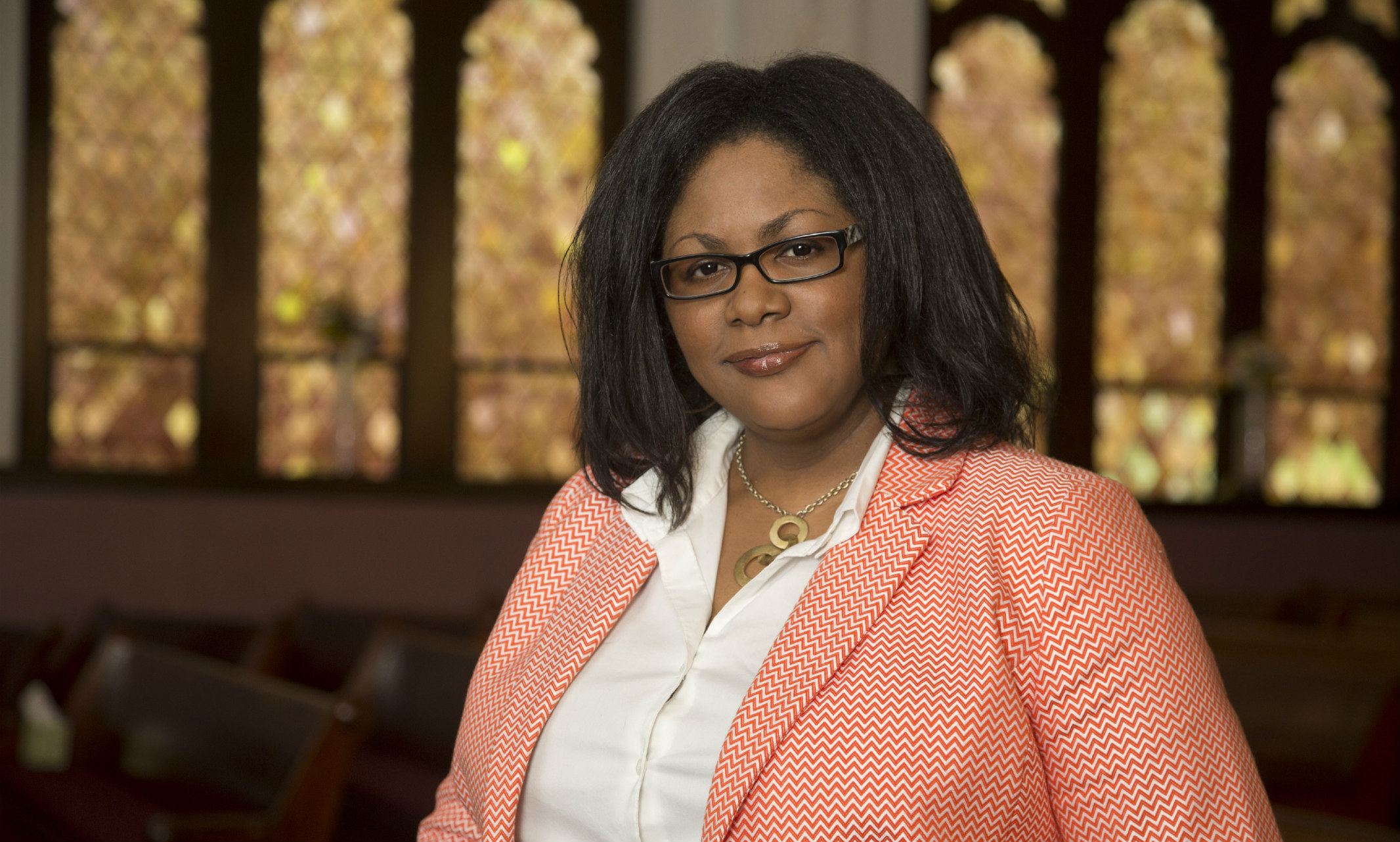
Jackson County approves CARES Act funding to promote vaccinations and other preventive care
The Jackson County Legislature has appropriated about $5 million in CARES Act funding to a project led by the University of Missouri-Kansas City to promote and deliver widespread COVID-19 vaccinations and other health services to neighborhoods on Kansas City’s east side, the city’s most socially vulnerable community.
Our Healthy KC Eastside (OHKCE) has been developed through a community-engaged process that included input from 10 meetings with community stakeholders across the east side. Jannette Berkley-Patton, Ph.D., professor in the UMKC School of Medicine and director of the university’s Health Equity Institute, is leading the project.
The project’s primary goals are to address vaccine hesitancy and health inequities in portions of Jackson County identified by the Centers for Disease Control and Prevention as having exceedingly high socially vulnerable index scores. The project will run from June 1 until Nov. 31.
“We are eager for the opportunity to partner with Jackson County on this project, and address health disparities related to COVID,” said UMKC Chancellor Mauli Agrawal. “Thanks to Dr. Jannette Berkley-Patton and her research, we have a clear understanding of the challenges and opportunities ahead of us - and the critical relationships that will ensure the program’s success.”
The COVID-19 education, communication and vaccination project will work with partners including Truman Medical Centers, the Kansas City Health Department and the Black Health Care Coalition. Other UMKC partners include the schools of Pharmacy, Medicine, Dentistry and Nursing and Health Sciences; Center for Neighborhoods, Multicultural Student Services Center and Roos Advocating for Community Change.
To reach people in the community, the project will engage with more than 120 community leaders and liaisons in east side neighborhoods, including businesses, churches, neighborhood associations and youth organizations.
According to the university’s funding proposal, the east side has experienced some of the highest rates of COVID-19 infections, hospitalizations and deaths in Jackson County while low vaccination rates persist. COVID-19 has also contributed to a drastic reduction in use of preventive health services.
May 10, 2021
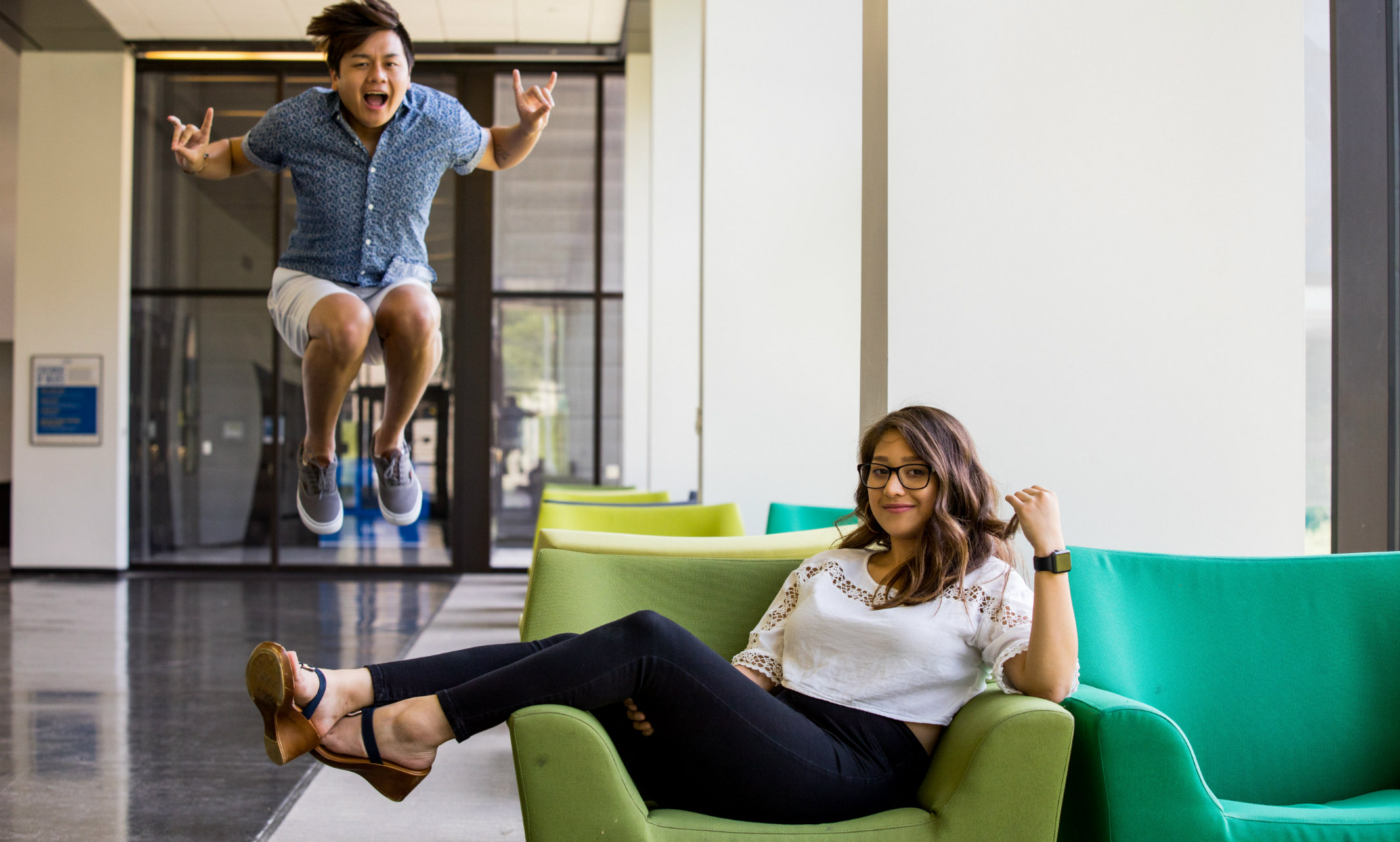
UMKC to have full-capacity Fall 2021 semester
With the incidence of COVID remaining low on campus and more and more people getting vaccinated, the University of Missouri-Kansas City is #RooReady to return to full-capacity, in-person classes and activities for the Fall 2021 semester.
“We are excited to reach the point of being able to plan for a ‘normal’ fall,” said UMKC Chancellor Mauli Agrawal. “Of course, we will continue to consult with the health experts on the UMKC Health Sciences Campus and our city’s health partners and follow their advice. But we are confident that we will be able to safely resume in-person, full-capacity classes and campus life.”
Agrawal praised the campus community for its diligence and resilience after COVID-19 prompted a pivot to online classes in March 2020. Since then, thousands of UMKC faculty and staff have worked to make the campus safe while continuing in-person classes and activities following stringent safety measures. That work and compliance with precautions — including mask wearing, free COVID testing and multiple campus vaccination events — have helped the university prevent further spread of the disease among the campus community.
For fall semester:
Residence halls and food service will resume normal operations. Lounge areas and common spaces will be reopened so students, faculty and staff can meet in person. Dining halls and other food venues will resume a full array of offerings and return to normal hours. A new monthly pop-up restaurant will be at the Student Union.
Classes, events and activities including the nearly 300 student organizations will meet in person.
Convocation, the official start to the academic year, will be in person and will kick off several weeks of special in-person student activities and events known as RooWelcome.
Our Division I Kansas City Roos are planning a full slate of regular season contests in the fall.
“Although this has been an unprecedented semester, I have no doubt in my mind that the UMKC community will persevere,” said UMKC Student Government Association President Tim Nguyen. “As UMKC Roos, kangaroos cannot move backwards; only forward. We will take it one step at a time as we transition and continue towards the post-pandemic and fall semester soon upon us.”
Provost Jenny Lundgren said faculty and staff at UMKC are ready to welcome students back.
“As our campus remains safe, we are excited to prepare for a return to in-person learning and activities,” said Lundgren. “No matter what the fall brings, we will ensure that we are ready to give our students a unique and rewarding experience.”
May 06, 2021
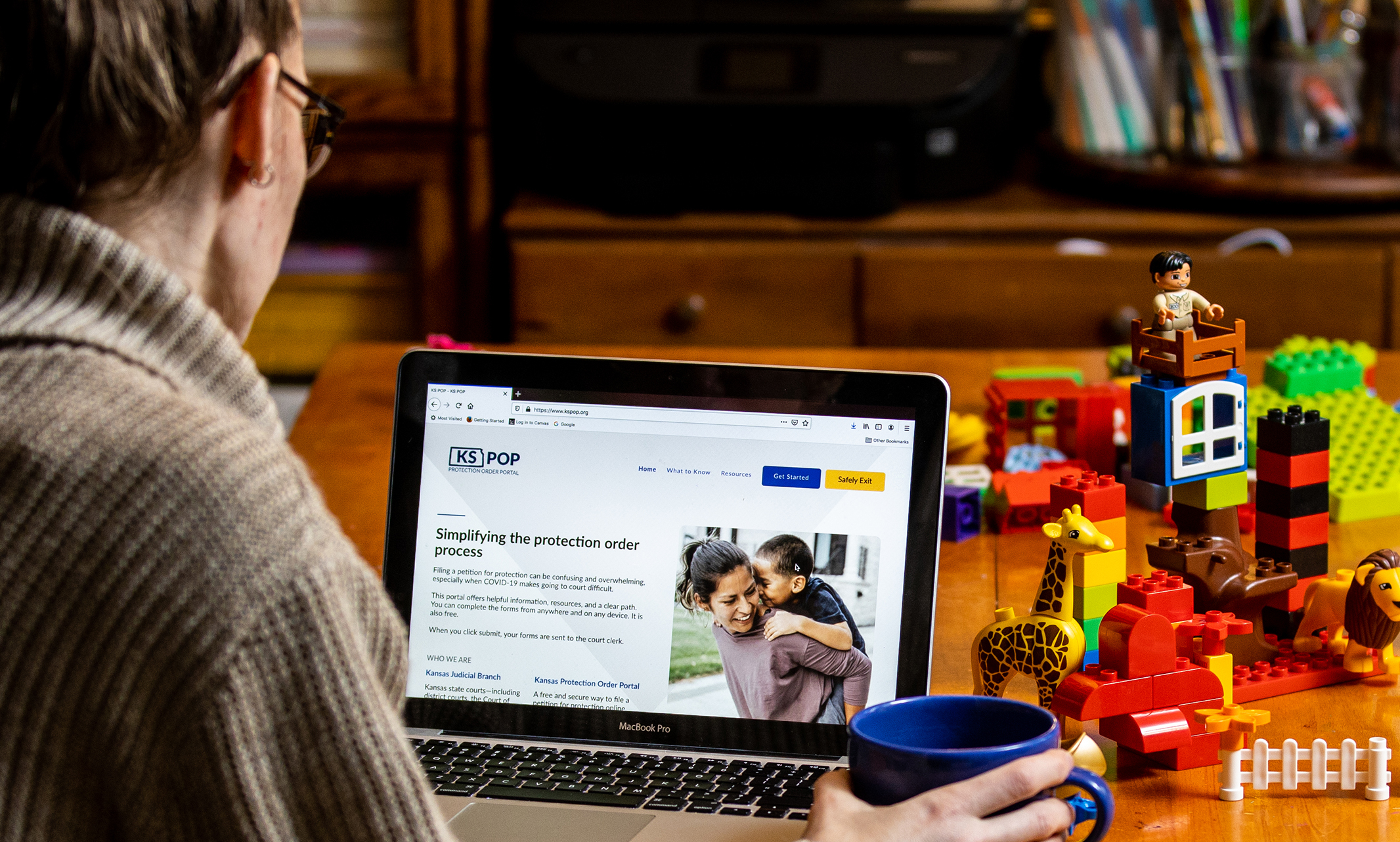
School of Law designs Internet portal to simplify how victims of domestic violence get court protection in Kansas
This story originally appeared in Res Ipsa, the UMKC School of Law alumni magazine. To learn more, read the full issue or visit the School of Law website.
Before COVID-19 changed everything, Kansas court officials knew they needed to change how victims of domestic abuse and sexual assault applied for court-ordered protection in the state.
Johnson County District Court Judge Keven M.P. O’Grady says the process of seeking an Order of Protection in Kansas was time consuming. Before a judge could consider a request, vulnerable applicants had to wade through pages of legalese-filled paperwork and file it in person with a county clerk.
“It was quite a process,” O’Grady says. “It was not uncommon for people to need two, three, four hours.”
But when a worldwide pandemic shut down courthouses across the state last spring, filing in person was no longer an option. Making updates to the Order of Protection system moved from necessary to imperative on the state judiciary’s priority list.
Partnering to Protect Kansans
O’Grady had already been in discussions with the UMKC School of Law about using technology to make the process easier. Once courthouses closed down, the project moved to a fast track.
“We were really worried about victims of domestic violence having access,” says O’Grady.
Using federal COVID-19 grant funding, the Kansas court system contracted with the Law School to develop an online filing system. Instead of having applicants print out forms and deliver them in person, the state wanted to allow victims to seek help through a computer or smartphone. And, perhaps most importantly, the entire process needed to be easy to understand.
The result, to be rolled out across the state by the end of February, is the Kansas Protection Order Portal, or KS POP. It is already up and running in Johnson, Riley and Harvey counties.
“Now people don’t even need to go to a clerk” to file a petition, says Staci Pratt, who serves as director of public services at the Leon E. Bloch Law Library and oversees the school’s self-help clinic. “I think that’s fundamental to creating equal access to justice before the law.”
In plain language, the KS POP explains exactly who is eligible for a protection order and what it takes to apply. The site also gives information about locally available advocates who can support a victim through the process.
If victims decide to move forward, KS POP takes them through a simple, guided interview. They answer questions, and the portal uses that information to populate a form, which is then submitted to the proper county court jurisdiction.
Last fall, as a small team at the Law School went to work on designing the portal, it quickly became clear that creating the computer platform to support the system wasn’t the hard part, says Ayyoub Ajmi, associate director and digital communication and learning initiatives librarian at the Leon E. Bloch Law Library.
“This was not a technology problem,” he says. “This was really a legal problem and a process problem.”
Among other things, the Law School had to convince different jurisdictions to accept the common form that the portal generates based on interview questions. The portal also needed to identify a victim’s individual circumstances, which could require varying information.
Andrew Watts (J.D. ’20), a recent UMKC Law graduate who worked on the project for three months as a Truman Fellow, says it was important to understand exactly what information jurisdictions needed to move ahead with a petition, while also making the questions as clear as possible.
“One of the goals was to simplify the process completely,” he says.
So far, that effort to simplify things has greatly reduced the amount of time required to file a petition, literally trimming hours from the process. What may have taken an entire day could now be completed in less than an hour, Ajmi says.
Making Safety a Priority
While making the process simpler was one goal, portal designers also knew they needed to take great care to make sure that vulnerable victims using the portal remained safe. For this reason, the site features a single button that a victim can touch to immediately exit the portal if they fear being detected by their abuser. And every step of the way, the KS POP provides users with information about local advocates available to help them on the ground in their community.
Marilyn Harp, executive director of Kansas Legal Services, says having that information is vital, since most victims benefit from having an advocate at their side to navigate legal and safety consequences that will arise with going to court.
The convenience the portal affords is good news for Kansans facing domestic or sexual abuse, Harp says. But survivors should know that getting an advocate’s assistance is still an important part of the process.
Often the most dangerous time for a survivor is when they leave their abuser, Harp says. Having an advocate who can help think through consequences and safety procedures can be critical. Harp thanked the UMKC team for clearly conveying that message through the portal.
“They were sensitive to make this not only a user-friendly process, but also a survivor-friendly process that recognizes all the aspects of safety for the survivors,” she says.
May 05, 2021
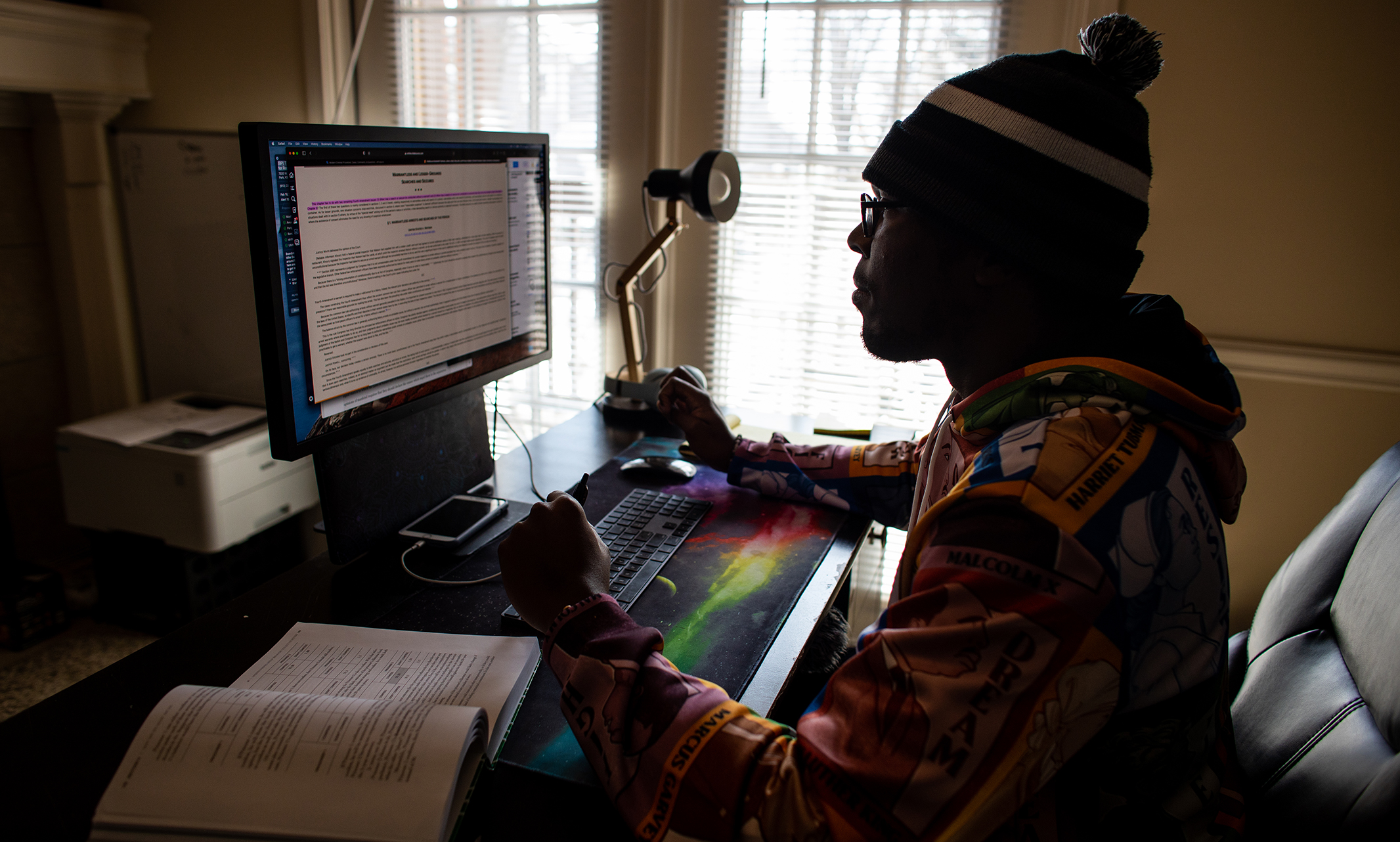
How current law students are making it work in a pandemic
This story originally appeared in Res Ipsa, the UMKC School of Law alumni magazine. To learn more, read the full issue or visit the School of Law website.
When our current 3L students graduate, they will have spent half of their law school careers online due to the COVID-19 pandemic.
We caught up with 3L students Alyson Englander, Timothy Randolph and Trevor Cunningham to hear how they’re navigating their final year — virtually.
Why did you choose UMKC for your legal studies?
Trevor Cunningham: It was an incredible value proposition with a great proximity to the Kansas City legal market.
Alyson Englander: I chose UMKC for its reputation for being a collaborative, welcoming environment that supports non-traditional students like myself.
Timothy Randolph: I chose UMKC because it offered a part-time program. I was also working in Johnson County and wanted to be local.
Timothy Randolph
Are you currently a clerk or intern in a law office?
Cunningham: I’m currently clerking at Parman and Easterday in Overland Park, Kansas. I spend most of my time drafting documents, corresponding with legal advisors and circuit clerks and researching legal issues.
Englander: While I’m not currently clerking, I have worked for the Missouri Attorney General’s office, as well as several firms during law school.
Randolph: I worked in the Johnson County Prosecutor’s office for about five to six years before I decided to stop working and focus on finishing school.
Has the pandemic impacted the job market for new lawyers?
Cunningham: Most of us are fairly realistic about the ways in which the pandemic has made firms take an honest look at their ability to hire new associates. However, I truly believe that this 3L class is an incredibly bright and resilient group of individuals. I have little doubt that they’re going to find work even in this difficult job market.
Alyson Englander and her daughter
How did you manage the shift to online classes?
Englander: The biggest challenges, for me, were balancing classes while my husband was also suddenly working from home and our 18-month-old daughter’s daycare was closed. I found myself having to switch my camera off often and text friends in my classes to see if I had missed anything important while tending to my family. For a few weeks, my peers and I were also very anxious about the format of our final exams and grading that semester. We were relieved when the law school ultimately decided to make all classes pass/fail.
I found myself having to switch my camera off often and text friends in my classes to see if I had missed anything important while tending to my family. - Alyson Englander
Randolph: My mentality, initially, was “it’s not much different because we’re sitting in class like we normally do,” but the tough part was peer interaction. Now, when you log off you have to chase down classmates to debrief after class. You get energy from your peers and being able to set up study sessions on the spot. There’s nothing personable about your laptop.
Has this experience created any additional opportunities or challenges in your personal life?
Cunningham: I suppose I’m like everyone else in that I have good days and not as good days. The pandemic has reminded me that it’s OK to take time for myself. By the same token, the pandemic has also caused some of my relationships to fracture. I attribute it mostly to the fact that so many things related to COVID have been so intensely politicized. I feel really sad that public health has been made into a political issue.
The pandemic has reminded me that it’s OK to take time for myself. - Trevor Cunningham
Randolph: One thing I miss about being on campus is overhearing peers talking about opportunities or communication you may have missed. You get so many emails a day, it’s easy to miss something, but when you hear peers saying “oh, did you do this,” or “are you going to that,” it’s kind of like a reminder.
What’s next for you after law school?
Cunningham: Upon graduating, I hope to pursue an opportunity to practice in the areas of Business and Estate planning in the KC Metropolitan area.
Englander: I hope to pursue a public service-oriented practice, but specifically I hope to work in immigration law.
Randolph: I haven’t quite ironed out exactly what I want to do after graduation. My initial plan was to work as a prosecutor and become a JAG (Judge Advocate General) officer with the Kansas Army National Guard, however I’ve recently found an interest in business law and business development. I love the idea of being in-house counsel for a few small businesses in the area and also be able help a startup business who might want to seek private equity funding. I’ve grown to love tax law and I’ve slightly considered possibly pursuing a LL.M. in Taxation.
May 05, 2021
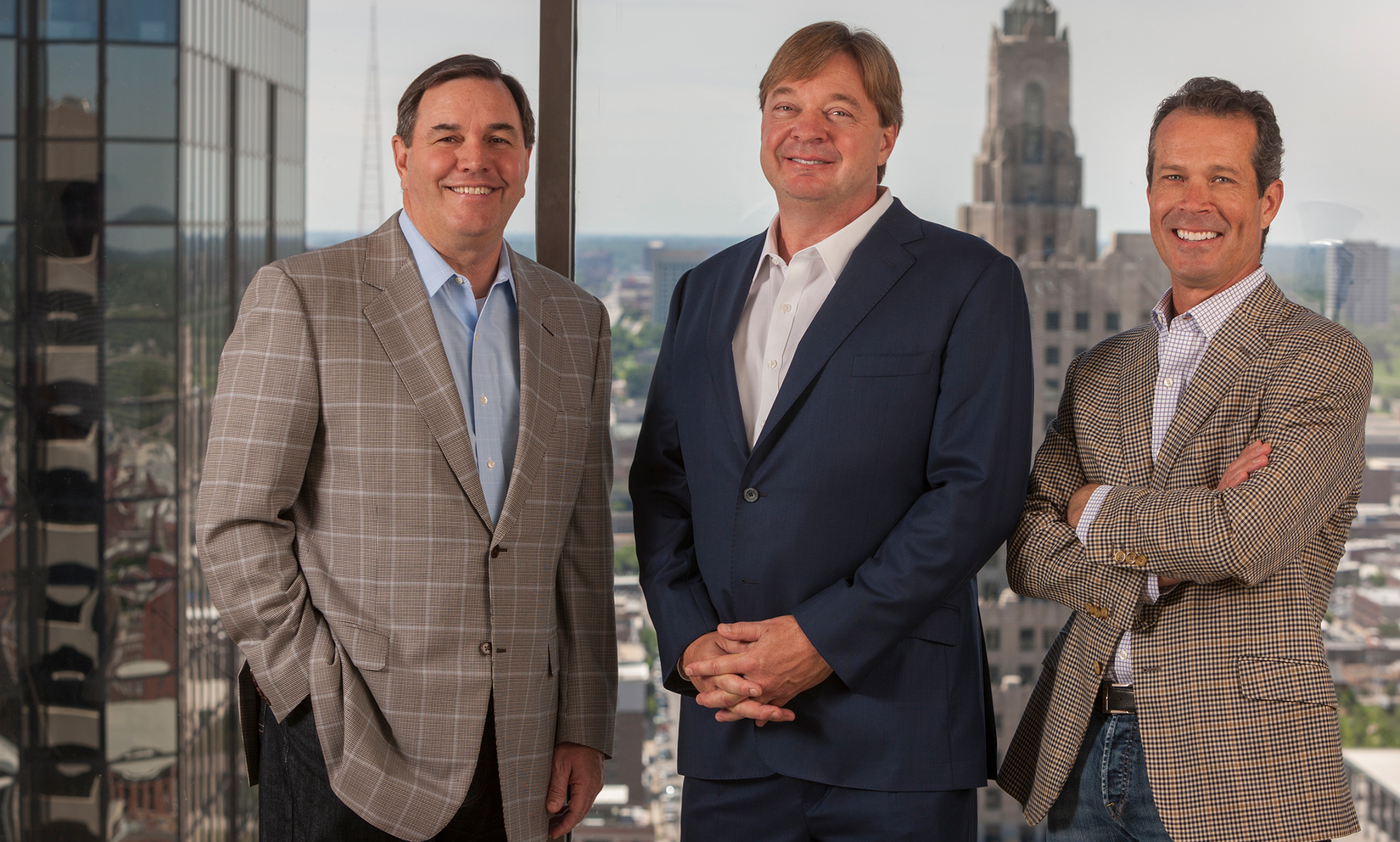
UMKC Law community steps up to support students in need
This story originally appeared in Res Ipsa, the UMKC School of Law alumni magazine. To learn more, read the full issue or visit the School of Law website.
During the COVID-19 pandemic and resulting crisis, the UMKC School of Law responded by providing emergency support for students through the Students First Fund — an example of collegial assistance that is not unusual for students or alumni of the Law School.
The Students First Fund began with an email campaign to law alumni. The firm of Davis, Bethune & Jones, LLC agreed to match all donations through June 30, 2020. With the match, alumni contributed more than $18,000. The annual appeal at the end of 2020
supported the Students First Fund as well, and the Jack and Helyn Miller Foundation gifted a $10,000 challenge grant to support the fund while encouraging law alumni to make a year-end gift to help even more students.
Tom Jones (J.D. ’88) and his partners Scott Bethune (J.D. ’88) and Grant Davis (J.D. ’87) say they established the match because they know how challenging being a student in law school can be.
“We remember how hard it was for us to be students — the time, the sacrifice, the money,” Jones says. “Being a student has historically been a financial hardship – not only on students, but on the people surrounding the student. Sometimes we forget how people are struggling to get by.”
Ashley Swanson-Hoye, who administers the fund, encounters students with these challenges regularly. She says the Students First Fund was established to help those students who are experiencing a financial shortfall with immediate needs such as rent, utility bills, childcare and groceries.
Payouts are considered an emergency loan, which students can pay back in a set amount of time with no interest. Swanson-Hoye also works with students to see if she can connect them with additional resources, such as counseling or long-term financial assistance.
In addition, Swanson-Hoye makes sure that the students know about the UMKC Student Emergency Fund, the Roo Pantry and other community services that may be able to provide long-term help. She says the Law School leadership and administration anticipated that students would have greater need.
“Some students or their partners worked in the restaurant industry part-time and lost their jobs,” she says. “The unexpected loss hit them hard, so the emergency fund helped them make it.”
The one thing students seeking emergency funds had in common, she says, was their reaction when they discovered it was available.
“Relief! They have all been so grateful that we had funds that can be used to help them with immediate needs,” she says.
Fortunately, there are still funds available.
“We continue to have requests and we want students who are facing emergency situations to reach out and use the funds,” she says. “Our goal is to support our students holistically. The emergency fund is just one piece of that.”
This community environment is one reason the firm of Davis, Bethune & Jones continues to support student success in many forms.
“My partners and I have enormous affection and respect for UMKC’s Law School,” Jones says. “We feel lucky to have been able to attend. Our experiences there as students and now as alums has inspired us to give back.”
To make a gift to the UMKC School of Law, visit us online or contact Marie Dispenza, J.D., at UMKC Law Foundation, at 816-235-6328 or dispenzam@umkcfoundation.org.
May 05, 2021
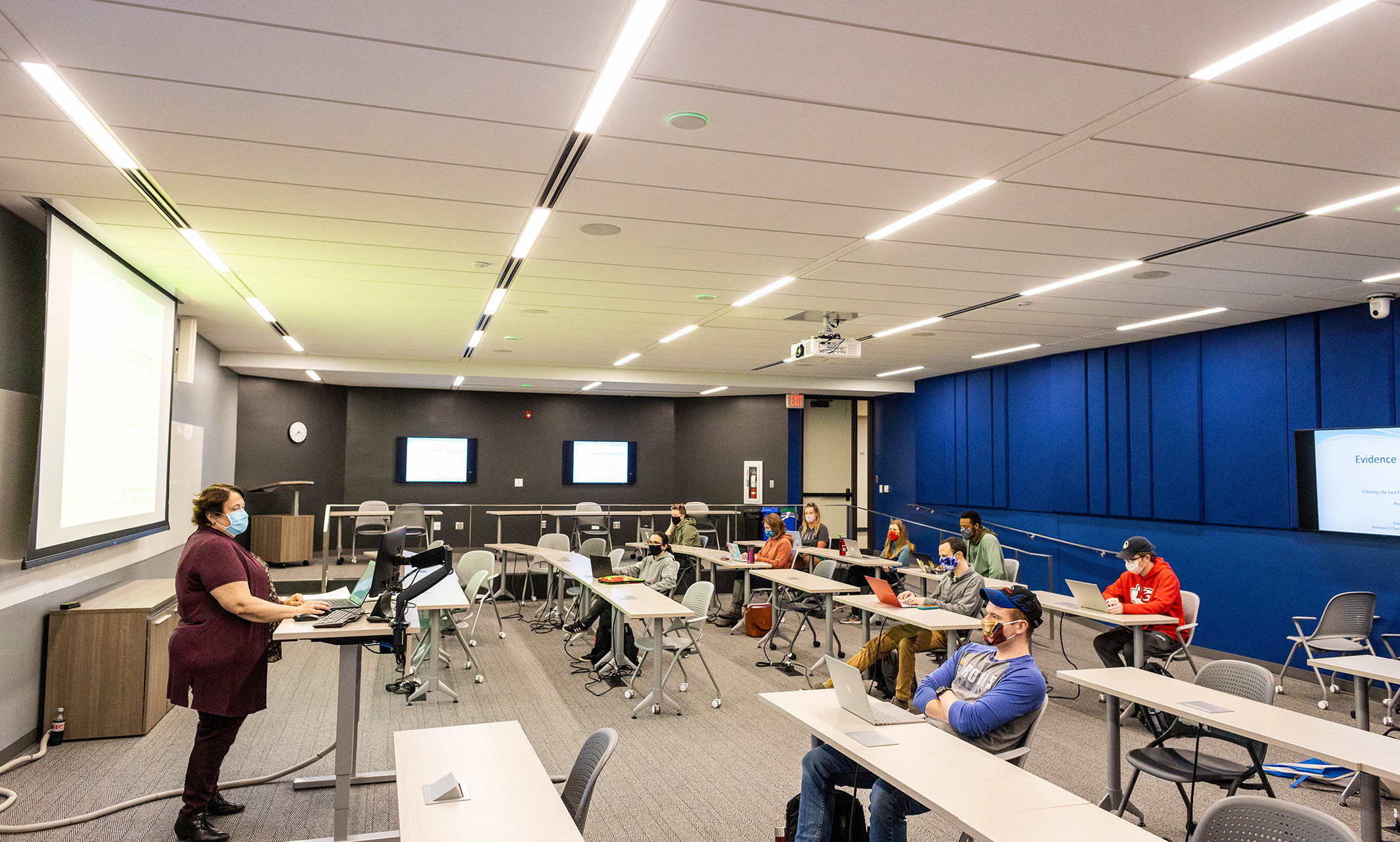
Renovations geared for student success
This story originally appeared in Res Ipsa, the UMKC School of Law alumni magazine. To learn more, read the full issue or visit the School of Law website.
The latest renovations to the School of Law building are as purposeful as they are attractive.
Classrooms 02 and 05 have been converted to more versatile learning spaces with new technology for hybrid instruction and online participation. These classrooms also dramatically expand the school’s ability to provide continuing legal education programs remotely.
A new Student Success Suite replaces the former career services suite. The new suite is home to the registrar, student services manager, associate dean for students and the professional and career development staff.
A new Admissions Suite is fully devoted to admissions staff and student emissaries to conduct recruitment activities. These renovations were funded by a $3 million grant from the Sunderland Foundation.
Next up: outdoor renovations, including a raised-bed garden replacing the fountain on the Truman Terrace; and thanks to a generous grant from David Stoup (J.D. ’77) and the family of Arthur Stoup, an outdoor contemplative space/garden outside the south entrance facing 52nd street.
May 05, 2021

A School of Law alumni conversation on race, equity and where we go from here
This story originally appeared in Res Ipsa, the UMKC School of Law alumni magazine. To learn more, read the full issue or visit the School of Law website.
The police killing of George Floyd in May 2020 shocked the nation and reignited the call to end the systemic racism that has permeated our country for decades. It also renewed conversations among attorneys — for whom upholding justice isn’t simply a goal, but a sworn oath — about what important lessons the law community can learn from the Black Lives Matter movement.
We sat in on one such conversation between three UMKC School of Law graduates who have all gone on to fight systemic racism in their own ways. They covered a vast array of topics — far too many to include here — but with a common thread: No matter where your law career has taken you, there is always work to be done to fight racial injustice. Often, attorneys are uniquely positioned to lead the way.
Meet the alumni
Adrienne B. Haynes
Adrienne B. Haynes (J.D. ’13)
Adrienne B. Haynes is the managing partner of SEED Law, a boutique business law firm, and owner of SEED Collective, a consultancy. She is also the founder and president of the Multicultural Business Coalition and president of the Black Female Attorneys Network. Haynes has been honored by the Kansas City Business Journal, Kauffman Foundation, Forbes 30 Under 30, and Greater Kansas City Chamber of Commerce for her entrepreneurship and advocacy work.
Kendall Seal
Kendall Seal (J.D. ’08)
Kendall Seal is director of advocacy for the ACLU of Kansas and an adjunct professor at the UMKC School of Law. He previously served as Vice President and General Counsel for the Women’s Foundation and a lawyer for Legal Aid of Western Missouri. Following civil unrest in Ferguson, Missouri, Seal served on the U.S. Commission on Civil Rights – State Advisory Committee, which investigated the intersection of civil rights concerns and law enforcement practices over two years. He specializes in domestic violence and human trafficking law.
Shaun Stallworth
Shaun Stallworth (J.D. ’08)
Shaun Stallworth is a civil rights attorney with Holman Schiavone, LLC. He recently completed a two-year term as president of the Jackson County Bar Association, one of the oldest associations in the region for Black attorneys. He has also worked with Freedom, Incorporated, a political organization that advocates for African Americans, and serves on the Kansas City Police Accountability Task Force. He has represented Black Lives Matters protesters pro bono, and recently joined a project by UMKC Dean Emerita Ellen Y. Suni to help people clear their criminal records in order to find employment.
On why racial justice should matter to all attorneys
Shaun Stallworth: We have to decide, what type of country do we want to be? Are we going to be an eyes-wide-open country, or are we going to close our eyes and act like if we just wish it, it will improve? We have to take proactive steps to make sure it’s happening.
Adrienne B. Haynes: For me, as I grow, I’ve been working to really train that muscle of what it means to be a systems thinker, because I don’t think it’s just assumed or normal. For me, there are these three core competencies that help me understand what systems thinking means and how I can keep this perspective in my work: the ability to see the larger system, the capacity to foster reflection and conversation, and then, ultimately, the ability to shift from reactive problem solving to co-creation of the future. I think if you start with those, it allows us to look at the issue with a more proactive perspective and pull some action items out of that.
Kendall Seal: Law schools — and higher education in general — really need to dedicate themselves to eradicating white supremacy in our society. I don’t think it’s enough to say we’re working toward justice. Law students have to be ready to meet the moment, and we’re doing them a disservice if we’re not making these conversations fundamental to their studies. And white folks need to listen more. They need to learn when to step back and when to step up.
“One of the things I’m reminded of is the state motto of Missouri, which says, ‘let the welfare of the people be the supreme law.’ Conversations about racial justice and equity and fairness go hand in hand with that.”
— Adrienne B. Haynes
On the art of listening and unlearning
ABH: Kendall, because this is going in a law school magazine, I think we should talk about that. How do you think law schools can even address that? Is it a class? Because I did notice in law school I came in wanting to be a public servant, but sometimes law school can become less about the people and get away from the real heart of the work.
KS: One of the best classes I had in law school was actually on listening. As lawyers, so much of the job is having the answer and trying to know everything. Maybe we can find ways in our legal education to help students and practitioners be more comfortable not “knowing everything” and creating opportunities for conversation and exploration. Whether that is experiential learning or in the classroom, we should be incredibly intentional. You should not graduate law school without tackling issues of systemic racism in the legal system and society.
ABH: You’re right, for there to be real change, it’s not a class — an elective makes it feel optional, so you’re right, it needs to be entrenched into the system.
SS: When Kendall and I started law school in 2005, there were roughly 200 people in our first-year class and only four Black people. When I was in Constitutional Law and we talked about Plessy v. Ferguson and separate but equal, people would ask me, “Well how do you feel about that?” And there’s this thought that Black folks are supposed to act as the monolith for all things Black because you’re the only Black person in the room. That is a difficult situation for a lot of people of color, whether you’re in the classroom, the boardroom, the office, the neighborhood meeting. I tie that back to the listening aspect that Kendall mentioned. Listening can go a long way — listening to why a person of color might feel out of place.
ABH: Things like listening and failure, those soft skills, we don’t necessarily learn or talk about them directly in law school. In my own practice, there’s an expectation that I have the answers. And in our consultations we let people know — just training people away from that.
KS: To change we have to unlearn and do things differently. We have to be honest, and I don’t know that as a profession we’re always completely honest about our shortcomings and where we have work to do.
“In our role as attorneys, you have an obligation to be a change-maker, even if you’re working in a corporate setting. You can still make a difference and assist people.” - Shaun Stallworth
On fighting systemic racism from every seat
ABH: No matter what practice area you work in, we all have to be self-reflective. If a year into the pandemic you’re an attorney wondering, “how do I help?”, you don’t have the right friends around you. ... Life is short, and we’ve got to use our time well, especially those of us who have a privilege like a law degree. Law school doesn’t necessarily make you a lawyer, it teaches you how to think — you’ll hear that all the time. As attorneys, to not see what’s going on in the world is to purposely not see it.
SS: Adrienne said a word that stood out to me: self-reflective. … What we have to do is acknowledge that people don’t always know racism when they see it. We have to be prepared to step up and say, “Could I be biased in this situation? I don’t mean to, I’m not a racist, but could I have an implicit bias I didn’t realize that I have?” It’s easy to point out when someone says the n-word, “oh that’s terrible, oh my gosh!” Right? That’s obvious. The difficult part is on the base level to be self-reflective and acknowledge, “it might be me.”
KS: White folks who are silent are complicit in this problem. That needs to be really clear, from my perspective. If you’re doing nothing, then you’re part of the problem.
ABH: We know these things take courage and unlearning. I’m in a Facebook group with women who run practices all over the world, and last week someone posted, “Oh my god, I’m sitting in court and the judge just discriminated against my client!” And she sits there, complicitly, and posts about it in the group afterward. If you feel something’s not quite right, you have to say something. And it does take courage.
SS: Kendall talked about people being silent. There was an uncomfortable situation in court just the other year, and there was another attorney in the courtroom who followed me out and said, “Man, that was terrible.” And it made me think, yeah, you’re saying it to me, but would you say something to the judge? Because as awkward as you would feel saying something to him, imagine how awkward I felt being up there having it said to me.
ABH: It reiterates for me the importance of black judges and diverse team members in all posts of the court, because otherwise you don’t have that advocacy.
SS: You don’t have to be saying the n-word or some derogatory term to have a bias in what you’re doing, even if you don’t realize it. And we should have a conversation about that. Food for thought.
KS: It’s empathy. People laugh at it sometimes, but I think we have to teach empathy. It has to be fundamental to what we’re doing, too. The appointments to the bench — that’s also a place of hope. The law can change, and lawyers can be part of the solution. It can be positive and it can be a better story.
“We gave this oath to support the Constitution and to practice law, ‘with consideration for the defenseless and oppressed.’ Sometimes we gloss over those words. But with the expensive paper comes a duty. I hope we do right by it and one another.” - Kendall Seal
Closing thoughts
ABH: I just would remind people to stay connected to the law school and those students. The things that they’re unlearning — let’s try to lovingly teach them that and be examples. Let’s change the perception of an attorney from the shark on TV to someone who’s more compassionate, a community member, someone who’s really self-aware and reflective — the best of us.
SS: In our role as attorneys, you have an obligation to be a change-maker, even if you’re working in a corporate setting. Even if you’re working at one of the largest law firms. You can still make a difference and assist people. Adrienne talked about that oath we took when we first became attorneys — remember that. Get involved, stay involved, and spend some of your time to try and assist others.
KS: We gave this oath to support the Constitution and to practice law, “with consideration for the defenseless and oppressed.” Sometimes we gloss over those words. We got sworn in, we took the picture, and we’ve got expensive paper on our wall. But with the expensive paper comes a duty. I hope we do right by it and one another.
May 05, 2021
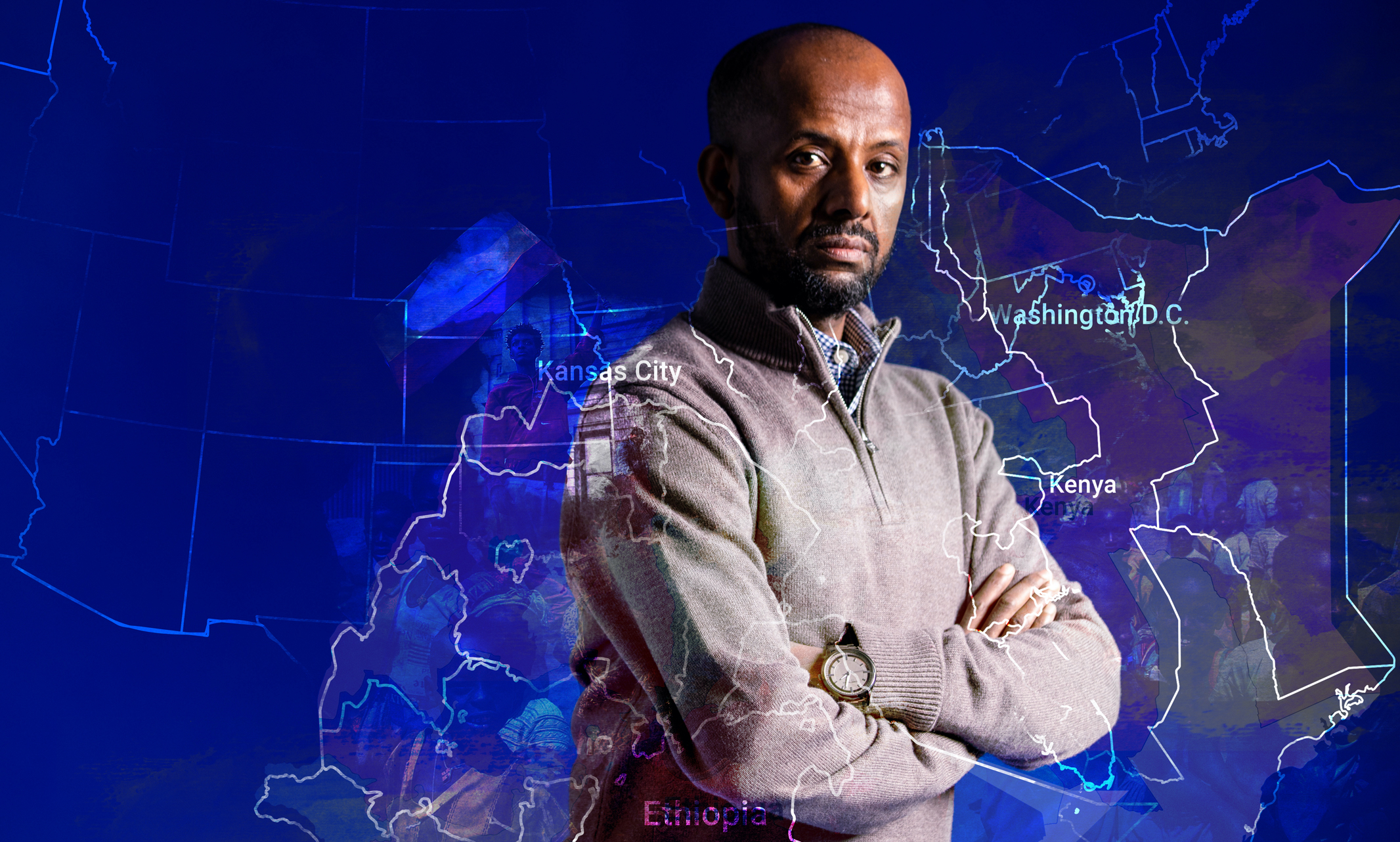
Mekebib Solomon (J.D. ’20) has earned his law degree twice, in two different countries. That’s not the most interesting thing about him.
This story originally appeared in Res Ipsa, the UMKC School of Law alumni magazine. To learn more, read the full issue or visit the School of Law website.
In his home country Ethiopia, Mekebib Solomon was a successful practicing attorney and judge — until he drew the attention of government officials who wanted him to convict political dissidents who had not received due process. Growing pressure to comply and fear for his safety brought him to the United States, where his story has been far different than those in his homeland.
“My father is a factory worker and my mother works in an office,” Solomon says of his parents who still live in Ethiopia. “They didn’t have an education, but they paid for me and my brother to go to private school. We had the best education available in my home country.”
Solomon studied hard and decided to study law. He graduated from Addis Ababa University School of Law and Governance with an LLB degree and was eventually appointed as a federal judge in the district court. On the bench, Solomon was responsible for reviewing cases of people who were imprisoned without due process.
“I left everything and fled to neighboring Kenya to save myself from unlawful arrest and prosecution.” - Mekebib Solomon
“People were arrested because of their affiliation to parties that opposed the government,” he says. “Many were human rights activists who were reporting violations … Despite the threat and pressure from government officials, I released people because no charges had been filed against them and there was no legal ground to imprison them indefinitely.”
As political unrest mounted in Ethiopia, the government was also putting pressure on Solomon to fall in line.
“My parents taught me to respect myself and others, and most of all to stand for truth and for what is right no matter what. I did not want to be enslaved and be a puppet for someone else. In law school I learned to be fair to all and to administer the law equally, without corruption, favor, greed or prejudice, so that is what I did.”
The government dismissed Solomon from his job and expelled him from the bench. He then started to teach at a law school and also became a human rights advocate reporting government atrocities to the public and international organizations. He knew that it would not be long before he was arrested.
“I left everything and fled to neighboring Kenya to save myself from unlawful arrest and prosecution,” he says.
In Kenya, Solomon became an advocate for refugees like him, who fled their country to save their lives. He worked as volunteer refugee coordinator, helping refugees complete asylum applications and make their cases to the United Nations High Commissioner for Refugees and other institutions. In 2013, he was granted asylum and came to the United States as a refugee.
What was a seemingly wonderful opportunity also came with challenges — namely, that he had to go to law school and get a juris doctor to be a lawyer once again.
“I had been a lawyer at the peak of my profession, and I had to start over.”
A new beginning
Solomon settled in Kansas City and joined the paralegal program at Johnson County Community College. He also began working with Gregg Lombardi at Neighborhood Legal Support (NLS), helping to improve neighborhoods in the urban core.
“At NLS we believed that the best solutions for neighborhood problems come from the neighborhood,” Solomon says. “Our goal is to empower urban core neighborhoods and give them the legal tools they need to solve their own problems. One way we do this is by clearing titles on abandoned and blighted urban core properties, so the properties can be turned into good-quality housing.”
Lombardi was amazed at Solomon’s humility and resilience.
“He was a respected judge in Ethiopia who was forced out of office because he wrote an opinion upholding the basic civil rights of detainees. He paid a horrible price for that simple act of courage,” Lombardi says. “He worked for years at a Walmart just to get back on his feet while he volunteered with us.”
Lombardi encouraged Solomon to go back to school — again — to get his juris doctorate.
“Gregg was always saying, ‘You should be a lawyer,’” Solomon says. “So, I was accepted to UMKC and earned my LL.M. and was able to transfer to the J.D. program.”
Many of Solomon’s friends thought law school would be too much of a strain. He’d gotten married in June, was going to school and working. Still, he was undeterred.
“I was the first person in the parking lot and the last to leave while in law school. I had to be extremely focused and dedicated in my studies because there were a lot obstacles that stood before me,” he says. “I’m not a conventional law student.”
Based on these convictions, Solomon was able to perform exceptionally in and outside the classroom. Solomon received the CALI Excellence for the Future Award for his excellent achievement in the study of constitutional law in Spring 2019. While in law school, Solomon was chosen to take part in competitive internship programs in the U.S. Department of Homeland Security and the U.S. Department of Justice. He also worked as a student assistant for the UMKC International Program and as a seasonal tax law analyst for H&R Block. And for a year, Solomon served as a Diversity Ambassador for the UMKC Division of Diversity and Inclusion.
Solomon met Associate Professor Timothy Lynch in his contracts class. The two connected after an impromptu and extended lunch close to campus. Solomon now considers Lynch a valuable mentor.
“He’s a brilliant person and his story made me particularly impressed with him,” Lynch says. “He was able to contribute so much to the class discussion since he had these intense personal experiences with these areas of immigration law. He’s one of my favorite students of all time.”
Solomon was in the final year of his law school studies when the COVID-19 pandemic hit. The relationships that he had formed with students and faculty were valuable.
“Imagine how difficult it was to switch to virtual classes and prepare for the bar exam during a pandemic,” he says. “But I told myself, ‘I’ve been through so much and still had the grit to do this.’ We were advised that it would be better to postpone the bar exam considering the disruption created by COVID-19 … no more postponing.”
Barbara Glesner Fines, dean of the School of Law, knew Solomon would be an exceptional student — not only because of his performance, but because of the challenges he’d overcome.
“Mekebib was in my lawyering skills class,” Glesner Fines says. “I knew something about his background, so when he spoke in class or in his written assignments, I would hear his statements through the lens of knowing that he had literally put his life on the line using these legal skills advancing human rights.”
She notes that it’s not unusual to hear students or other people talk about law school as something separate from “the real world.”
“But by his very presence in my class, Mekebib inspired us to always remember that the law school classroom is the real world,” she says. “It’s where we learn the skills, knowledge and values that can make the difference for an entire career.”
Solomon credits his resilience to his parents’ example.
“My dad worked hard in the factory. He never gave up on us. He taught us that if you do something to the best of your ability, you will have peace of mind.” Solomon’s father was able to see him graduate from law school and he was also present for the swearing-in ceremony when Solomon was admitted to the Missouri Bar.
“That was the moment that they could see that I did this. I deserve this,” Solomon says. “Seeing the eyes of Dean Glesner Fines and hearing her say, ‘I’m proud of you,’ that’s rewarding. This is what people need to know. You lead with examples … I had all the odds against me, but I succeeded.”
A promising future built on a tumultuous past
Solomon’s success didn’t end with graduation. After graduating, he was a recipient of the Truman Fellowship for the Tenant Initiative. Solomon represented local tenants facing eviction during the pandemic. And in January 2021, he moved to Virginia to work for the Walton Law Group LLC, a small law firm located in Fort Washington, Maryland. Solomon’s practice area includes immigration and tax law.
“There’s a large Ethiopian population in the DMV area, and they have a lot of immigration cases that need help,” he says. Solomon says his long-term plan is not very different than his current reality — just bigger: “I’d like to form a nonprofit that is dedicated to helping refugees. Every case is different … We don’t need to label refugees as bad people.”
Solomon hopes that in his work people will see him and think, “If he can be a lawyer — if he can succeed — so can I.”
Dean Glesner Fines is certain they will.
“Mekebib is characteristically modest, but I know he will make a tremendous difference in the lives of his clients and the legal system around him,” she says. “He is a courageous, skilled and compassionate advocate. He will be a powerful force for empowering his clients.”
May 05, 2021
Provides Opportunity for New Graduates and the Community
This story originally appeared in Res Ipsa, the UMKC School of Law alumni magazine. To learn more, read the full issue or visit the School of Law website.
When it became clear the COVID-19 pandemic was going to be a long-term challenge, the School of Law was left with its own challenge: how to continue its mission of supporting students and the community during a global pandemic.
One key part of that response has been the Truman Fellows program, instituted in Fall 2020. This new initiative fills two key roles:
Providing jobs for recent law alumni, some of whom have had difficulty securing jobs due to the pandemic
Supporting community members with their legal needs, especially those that have been caused or worsened by the COVID-19 pandemic
The program — named after President Harry S. Truman, who attended the Kansas City School of Law from 1923 to 1925 — was launched with a $25,000 grant from the Kansas City Regional COVID-19 Response and Recovery Fund. This initial grant enabled a cohort of four fellows to be placed in the School of Law’s Entrepreneurial Legal Services Clinic, Tax Clinic, Self-Help Legal Clinic and Digital Initiatives team.
Together, this group assisted small business owners applying for emergency federal funding, helped community members navigate pandemic-related tax issues and worked with the State of Kansas to develop an online system for domestic violence victims to obtain restraining orders while courts were closed. Additional support from United Way established the Tenant Representation Initiative, allowing an additional four fellows to work solely on keeping clients in their homes during the pandemic.
Jeffrey Thomas — associate dean for strategic initiatives and graduate programs, Daniel L. Brenner faculty scholar and a professor of law — helped set up the Truman Fellows program. He says this work is especially important today because many pandemic relief efforts have a legal element. A great example, he says, is the Centers for Disease Control and Prevention’s temporary halt on evictions instituted in September 2020. To be protected, tenants need to fill out a form and serve it to their landlord, which the landlord can then dispute in court. At this point, the tenant needs a lawyer. That’s where the Truman Fellows can step in.
“There’s this solution out there — the moratorium on evictions — but the solution requires some legal knowledge and assistance, and we can play a role that way,” he says.
David White, a visiting professor and of counsel at Foland, Wickens, Roper, Hofer and Crawford, P.C., oversees the Tenant Representation Initiative. He says what started as an eviction project eventually grew into something broader.
“Because of the pandemic, the folks that are in these service industry jobs aren’t able to go to work, and so as a result they don’t have income,” he says. “For some of them it has been a tipping point for them both emotionally and mentally — if your housing is unstable, it throws everything off.”
Adjunct Clinical Professor Brian Larios, who also assists with tenant representation, says the impact he is able to make alongside the fellows is particularly profound.
“So many of the clients we represent are at the doorstep of desperation. They have nowhere else to turn,” he says. “To literally see their tears of joy as they realize the assistance that we will be able to provide is incredibly rewarding.”
Working with United Way, the School of Law has been able to secure funding for an additional cohort of fellows in early 2021 that will continue to focus on eviction work. This will become increasingly important, Thomas says, whenever the CDC discontinues its temporary halt on evictions.
Larios says the work of the Truman Fellows — who so far have assisted more than 218 people with their eviction cases — is directly in line with the Law School’s mission.
“The work we have done has provided security to families who would otherwise have become homeless,” he says. “The impact on those lives is immeasurable.”
May 05, 2021
As court proceedings move online, judges lean into new technologies and procedures to ensure a fair hearing for all who appear
This story originally appeared in Res Ipsa, the UMKC School of Law alumni magazine. To learn more, read the full issue or visit the School of Law website.
As the COVID-19 pandemic took hold, Judge Anne J. (Daddario) LaBella (J.D. ’92) was astonished to see such a large institution shift to online operations literally overnight.
Judge Anne (Daddario) LaBella
“If you would have told me one year ago that our courthouse would close to the public when we were seeing upwards of 2,000 cases per day, I would have never believed it,” says Judge LaBella of the 16th Judicial Court of Missouri. “In the old days, just closing dockets for a snow day was a historic occasion.”
And yet, the courts never really closed. Hearings held during the pandemic, totaling tens of thousands in the Kansas City Circuit Court and close to 250,000 in the Municipal Court, were a constant intersection of legal reasoning, institutional integrity and technological know-how.
Each hearing dealt in real time: attorneys juggling childcare amid a hearing, staff fielding constant technical issues and, yes, some litigants participating in hearings while ordering fast food in the drive-thru.
Judge David M. Byrn (J.D. ’81), who serves as presiding judge of the 16th Circuit Court, helped lead a staff of 700, spread out through the metro area, to move court online. For him, logistics were the biggest concern — training staff on WebEx and ensuring everyone, from law clerks to records staff, could work remotely — along with keeping some semblance of a traditional hearing.
“All the process and procedures are the same: rules of evidence, due process, objections,” Byrn says. “It’s just a different way to do it.”
“If you would have told me one year ago that our courthouse would close to the public when we were seeing upwards of 2,000 cases per day, I would have never believed it.” - Judge Anne J. (Daddario) LaBella (J.D. '92)
Judge David Byrn
Judges were the crucial force in keeping everything running smoothly in their respective courtrooms. That meant repeating questions and answers when an attorney on WebEx couldn’t hear the attorney who was in person or coordinating with attorneys on scanning and email exhibits before hearings.
It also meant telling attorneys they were on mute. Often.
Judge Jessica Agnelly (J.D. ’05), appointed as an associate circuit judge in August 2020, had the unique experience of being both a practicing attorney and a judge last year.
“If anything, I had the experience of waiting in a virtual waiting room for a really long time before my case was called, wondering ‘Have I done this right? Am I in the right place?’” Agnelly says.
Virtual hearings aren’t new, but the increase in scope brought new questions for judges. Byrn says: “If you look at the court in general, courts are probably slow to change and slow to embrace change, which I would suggest is a good thing because the consistency of the courts is not necessarily responding to the back-and-forth changes that you oftentimes see in society. I think it makes the courts serve as the backbone of our democracy.”
But the courts did support adaptation. He noted rulings by the Missouri Supreme Court, which embraced virtual technology and acknowledged that due process rights are fully protected by video conference and teleconference.
Judge Jessica Agnelly
Practically speaking, some aspects of hearings are very difficult to do online. Jury trials, by and large, are too difficult to hold virtually without violating due process or keeping a jury engaged. Agnelly says she’s hesitant to have preliminary criminal hearings virtually because it can impede defendants’ rights to confront witnesses at trial.
At the municipal level, some virtual hearings can be more challenging. LaBella says specialty dockets in domestic violence court, drug treatment court and mental health treatment court are extremely difficult to conduct virtually because many defendants don’t appear. The reasons vary: unfamiliarity with technology, forgetfulness or because the court cannot issue warrants for failure to appear virtually.
Still, Byrn, LaBella and Agnelly say the advantages outweigh the disadvantages. It saves attorneys travel time and money if they don’t have to drive to the courthouse for a 15-minute hearing. Virtual hearings have helped pro-se litigants, providing them more opportunities to appear and be heard.
And it has allowed judges and attorneys alike to work and raise children. When she was still a practicing attorney, Agnelly was a part of hearings while homeschooling her daughter.
“I would panic that my daughter would interrupt at the wrong time and the judge would be so angry,” Agnelly says. As a judge, “I make it a point to be as understanding as possible.”
Most importantly, Byrn says that as the pandemic eases and a new normal takes hold, it will provide something crucial for all who come before judges: “better access to justice.”
May 05, 2021
Flatland interviews Sandra Enriquez
Sandra Enriquez, assistant professor of history at the University of Missouri-Kansas City, was interviewed for this story. Read the article.
May 05, 2021
UMKC law alumnae instrumental in creating scholarship for aspiring women lawyers
This story originally appeared in Res Ipsa, the UMKC School of Law alumni magazine. To learn more, read the full issue or visit the School of Law website.
“I still get choked up when I talk about it.”
Teghan Groff
For Teghan Groff (J.D. ’23), a full-tuition scholarship to the UMKC School of Law means having the freedom to pursue her true passion.
“If you want to go into criminal defense and public interest, like I do, you’re not looking at paying back debt very quickly,” says Groff. “Help like this means so much, especially when you’re paying for school on your own.”
Groff is the first recipient of a new scholarship offered by the UMKC Law School in partnership with the Association for Women Lawyers Foundation (AWLF). The AWLF will contribute $10,000 annually for three years, matched dollar-for-dollar by the Law School, resulting in a full-tuition scholarship for a first-year, female law student pursuing a juris doctorate. Recipients must demonstrate leadership skills and excel academically.
Mira Mdivani
Two Law School alumnae, Mira Mdivani (J.D. ’99) and Athena Dickson (J.D. ’03), both former presidents of the Association for Women Lawyers of Greater Kansas City (AWLKC), helped make the scholarship a reality, along with Dean Barbara Glesner Fines and AWLF leadership.
“We asked ourselves, what can we do to truly change someone’s life?” says Mdivani, a business immigration attorney with the Mdivani Corporate Immigration Law Firm in Overland Park, Kansas, and the recipient of the 2020 UMKC School of Law Alumni Achievement Award. The answer was simple: to enable a remarkable woman to attend law school without the burden of student debt, particularly someone who may not have the chance to become a lawyer otherwise.
Athena Dickson
“It’s us saying, ‘We believe in you, and here’s a full scholarship to show that,’” says Dickson, a personal injury and employment discrimination attorney for Siro Smith Dickson PC in Kansas City, Missouri. Dickson and Mdivani got involved with the AWLKC after graduating from UMKC Law School. The organization connected them to female colleagues with valuable advice about navigating the traditionally male-dominated field of law. Now, both women want to pay it forward by mentoring and offering support to other young women.
“I can tell a difference compared to when I first started out,” says Dickson of her experience as a female lawyer. “Women still have a harder time, but it feels like I’m treated better, and I think some of that is directly related to the legal profession working toward gender equality.”
Still, there is more work to be done to achieve equality in law and the U.S. workforce as a whole.
“Women make less money than men, do more busy work for businesses and families, and often don’t have the same opportunities as men,” says Mdivani. She says that’s one reason why it’s so important to support education for aspiring women lawyers like Groff, because they can influence policies and laws to combat inequality and “make life better for everyone.”
Groff, who began studying at the UMKC School of Law last summer after graduating from Fort Hays State University, wants to focus her efforts on tackling inequity in the criminal justice system.
“I thought I wanted to be a prosecutor, but then I realized how much of a mess the system is and how intimidating it can be for clients,” says Groff. “I want to be a helping hand through that, so I switched to criminal defense.”
Once she started talking to professors and fellow students, Groff knew the UMKC Law School was the ideal place to make that happen.
“I just said, ‘OK, this is it,’ and I haven’t been disappointed.”
May 05, 2021
Startland News reports on Regnier Venture Creation Challenge
The Regnier Venture Creation Challenge doled out more than $65,000 in cash prizes to emerging startups this spring, culminating in Friday’s big win for an up-and-coming fintech app. The annual UMKC contest came to a close last week after its second virtual showing in the COVID-era. Read more.
May 04, 2021
George S. Thompson weighs-in on Steve Jobs' most famous speech
George S. Thompson, M.D., a psychiatrist and associate professor of Psychiatry at the University of Missouri-Kansas City, says that “we’re sending signals to each other constantly demonstrating whether we’re safe or we’re in danger.” He then goes on to say that being in a state of fight or flight is of particular social significance. Read the full article.
May 03, 2021
KCUR interviews student about internship experience
Bryce Graskemper, HireKC intern, UMKC student and Marine Corps veteran, was a guest on Up to Date.
Apr 30, 2021
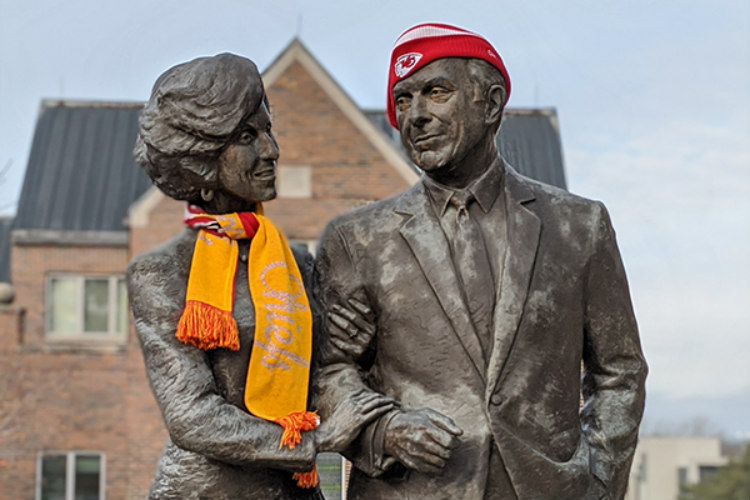
Beautiful exterior art abounds on the Volker and Health Sciences campuses
Steel. Bronze. Terra Cotta. Strong mediums turned into three-dimensional works of art continue to inspire at the UMKC campuses.
The Roo statue is just the start of what you can see on a walk around campus. Look a little closer, and you can see the history behind them, too.
President Truman bust
It’s true that President Harry S. Truman studied law at UMKC in the 1920s, but he did not graduate from the program. He was, however, awarded an honorary doctorate when he returned to Kansas City in 1945. Two years later, Mexican President Miguel Alemán was given the same honor. As a gift to the university, he brought a bronze bust of President Truman in academic regalia, posed from the previous ceremony. Check out the bust in the Truman Courtyard at the School of Law.
Playhouse patio
At one time, the Playhouse patio served as a lobby for an operational playhouse. The physical building was an army surplus movie theatre from World War II. The masks of comedy and tragedy, the country’s largest terra cotta sculpture at the time it was built, would spill smoke from their mouths when fires burned on show nights. The Playhouse was torn down in the 1970s, but fortunately the patio, at the southwest corner of the Miller Nichols Library and Learning Center, still stands as a beautiful spot to enjoy a sunny day on campus.
Pair of Archipenko statues
Cubist artist Alexander Archipenko was once in residence here at UMKC. The only sculptor to hold the position, Archipenko gifted two steel statues to the university, placed on University Walkway between Swinney Center and Miller Nichols Library and Learning Center. While they look different due to their positioning angles, the statues are completely identical. True to Archipenko’s style, they also play with light and shadow, and change in appearance depending on the time of day.
‘Dancing’
This big, yellow statue, sculpted by university alumna Rita Blitt, once on display at Bannister Mall when it opened in 1980. When the mall announced it was closing its doors in 2007, she reclaimed the statue and gifted it to the university. Placed in front of the Olson Performing Arts Center, you can see “Dancing” before you see some amazing dance performances from our students in the Conservatory.
Bloch statue
You can’t miss the sculpture of Henry and Marion Bloch outside of the Bloch School of Management. The Blochs’ children commissioned the piece from Eugene Daub in 2011 to celebrate the couple's contributions to the UMKC community. If you’re looking for a little extra luck during finals week, be sure to visit and give the statue a fist bump.
‘Any Word Except Wait’
This statue by Flávio Cerqueira was gifted to the university by the R.C. Kemper Charitable Trust. Its installation was a part of the inaugural Open Spaces performing arts festival, a collaboration between Kansas City’s Office of Culture and Creative Services and a private arts initiative to highlight Kansas City’s arts, culture and creativity. Find her in front of the Fine Arts building.
‘Blue Steel’
It won’t help in your modeling career, but it can help in your construction career! Designed by the American Institute of Steel Construction, it’s a teaching aid to help students get a visual understanding of steel framing and full-scale steel connections. The piece, located in front of Flarsheim Hall, has been educating students in the Quad since 2004.
Graces Fountain
Another sight in the Quad you can’t miss is the Graces Fountain. First built in 1940, it was a traditional, terracotta fountain until it was dismantled in 1973. The story goes that an artist wanted to revive it with a new stone base, but the rocks were haphazardly placed instead, creating the campus icon we know and love today.
Robert Flarsheim bust
See the man Flarsheim Hall is named after! Robert H. Flarsheim was a university benefactor who lived in a house at 50th and Cherry, where the Student Union is today. When he passed in 1995, he left a large gift to the university for campus beautification, and students frequently hang out in the shady green space near his likeness.
‘Rivers, Rails and Trails’
You won’t notice much if you meander by the Miller Nichols Library and Learning Center in the daylight. If you happen to do so after nightfall, though, you’ll be treated to a 22-foot-tall and 49-foot-wide map depicting Kansas City in 1926. The stainless-steel panels are illuminated with LED lights and intend to convey “flow”— of information, rivers and people.
‘Take Wing’
There’s beautiful art to see on our Health Sciences Campus as well. This bronze sculpture, cast from a carving by E. Grey Dimond, M.D., one of the founders of the UMKC School of Medicine, stands in front of the school. It shares a name with Dimond’s book Take Wing! Interesting Things That Happened On My Way to School as well as a School of Medicine graduate award. While you’re there, check out the bronze bust of Dimond and fellow founders Nathan J. Stark and Homer C. Wadsworth.
If you decide to take your own campus sculpture tour, be sure to share your photos on social with the hashtag #UMKC.
Apr 29, 2021
Hall honors Kansas City’s greatest women, past and present
A new group of extraordinary women, past and present, who have made their mark on the greater Kansas City community have been named to the Starr Women's Hall of Fame.
The Hall of Fame was created to honor women who have made Kansas City a better place to live, work and serve. Alicia Starr and Marjorie Williams, Ed.D., are co-chairs of the 2021 induction ceremony.
“We are excited to bring these 11 remarkable women into the Starr Women’s Hall of Fame, a group that sets a standard for achievement and public service,” Williams said. “The stories of these women are an example and an inspiration to future generations.”
The 11 outstanding women in the 2021 class of honorees will be honored in a private broadcast celebration on Tuesday, June 22. Festivities will commence with a preshow at 5:45 p.m. followed by the private broadcast at 6 p.m. Details about the event as well as ticket and sponsor opportunities can be found at www.umkc.edu/starrhalloffame/
The new inductees are:
Sister Corita Bussanmas (deceased) and Sister Berta Sailer, founders of Operation Breakthrough. Together, they provided education and social services to more than 10,000 of KC’s most vulnerable children and their families. In 2014, they were awarded the John and Marion Kreamer Award for Social Entrepreneurship from the UMKC Bloch School of Management.
Rafaela “Lali” Garcia (deceased), founding member of Kansas City's La Raza political club. She is a former Jackson County Commissioner and served on the boards of Guadalupe Centers, the Hispanic Economic Development Corp. and MANA, a national Latina organization empowering women through leadership development, service and advocacy.
Karen M. Herman, one of the founders and the first president of the Women’s Foundation. She is a longtime advocate and philanthropist for women and hunger relief, and has received multiple community recognitions including Woman of the Year Award from the Central Exchange and the U.S. Mayoral End Hunger Award.
Gayle Holliday, Ph.D., introduced female bus operators into the workforce as HR Director at the Kansas City Area Transportation Authority, many of whom were single mothers and heads of their households. She served on President Bill Clinton’s transition team.
Norge Jerome, Ph.D., served as Director of USAID, the federal international development and humanitarian agency. A professor and author of three books, she received the U.S. Department of Labor Spotlight Award for expanding the scope of food and nutrition services to poor women and families in developing countries.
Audrey H. Langworthy, a 17-year Kansas state senator. Her recognitions include the National Society for the DAR Award for Excellence in Community Service, the Johnson County Community College Foundation's Johnson Countian of the Year Award and was named to the University of Kansas Women's Hall of Fame.
Carol Marinovich, the first woman mayor of Kansas City, Kansas, who led the successful conversion to a Unified County Government and the development of the Kansas Speedway NASCAR racetrack, resulting in a complete economic renaissance for her community. She was recognized as Kansas Citian of the Year by the Greater Kansas City Chamber of Commerce.
Nelle E. Peters (deceased), the first female architect to have a significant impact on Kansas City’s built environment, she is best known for designing her signature colonnaded apartment buildings in central neighborhoods of Kansas City and the Luzier Cosmetics Building in Midtown. She designed more than 1,000 buildings during her career before retiring in 1967.
Rosilyn Temple, founder of the Kansas City, Missouri chapter of Mothers In Charge, Inc. after the murder of her 26 year-old son. She has responded to more than 400 homicide scenes in the city since 2012 to comfort family members and support law enforcement. She is changing the conversation surrounding violence reduction in our community by elevating the voices of bereaved mothers and women.
Sonia Warshawski, a Holocaust survivor who was sentenced to three death camps between the ages of 14 and 19. She became the voice of those who died and began speaking to students, adults and numerous organizations and has become a role model for trauma survivors. Her granddaughter made an award-winning documentary, “Big Sonia,” to share her story with an even wider audience.
The Starr Women's Hall of Fame is dedicated to recognizing extraordinary Kansas City women and preserving the history of their accomplishments. These women are social reformers, volunteers, philanthropists, civic leaders, activists and educators. They are neighborhood leaders and grassroots organizers, from yesterday and today, both famous and unsung. They are movers and shakers whose tireless commitment to community has made Kansas City a better place to live. The Hall of Fame is a repository for their legacies, offering an extensive archive of these women’s activities and achievements available to researchers, educators and historians.
A permanent display honoring Hall of Fame members is now open to the public on the third floor of the Miller Nichols Library at the University of Missouri-Kansas City. The library is at 800 E. 51 St., Kansas City, Missouri.
By sharing their stories, the Hall of Fame encourages and inspires women everywhere. Biographies of all of the honorees are available at umkc.edu/starrhalloffame/hall.cfm.
The Hall is named in honor of Martha Jane Phillips Starr, a legendary activist and philanthropist who blazed a trail for family issues and women's rights. The hall of fame is made possible through the Starr Education Committee, Martha Jane Starr’s family and the Starr Field of Interest Fund, which was established upon her death through the Greater Kansas City Community Foundation. The idea for the Starr Women’s Hall of Fame stemmed from Starr Education Committee members.
The civic organizations that advocate on behalf of women and family issues and have signed on in support of the Starr Women’s Hall of Fame include: American Association of University Women, American Business Women’s Association, Association for Women Lawyers of Greater Kansas City, Central Exchange, CBIZ Women’s Advantage, Girl Scouts of NE Kansas and NW Missouri, Greater Kansas City Chamber’s Executive Women’s Leadership Council, Greater Kansas City Women’s Political Caucus, Jackson County Missouri Chapter of the Links, Inc.; Junior League of Kansas City, Missouri; KC Metro Latinas, Kansas City Athenaeum, Kansas City Young Matrons, OneKC for Women, SkillBuilders Fund, Soroptimist International of Kansas City, Soroptimist Kansas City Foundation, UMKC, UMKC Women’s Center, UMKC Women’s Council, UMKC Women of Color Leadership Conference, United WE, WIN for KC, win|win, Women Leaders in College Sports, Women’s Public Service Network, Zonta International District 7 and Zonta Club of KC II.
Apr 28, 2021
Exploring Bridges and Barriers to Success
Local educational and community leaders participated in a virtual panel discussion about racism, how it impacts student performance and how to address the issue.
The theme of the April 22 online discussion was “Black and Brown Excellence in the Classroom: Exploring Bridges and Barriers to Success.”
Panelists for this conversation included:
Brandon E. Martin,D., UMKC vice chancellor/director of athletics
Edgar J. Palacios, president and CEO of the Latinx Education Collaborative
Loyce Caruthers, Ph.D., professor of educational leadership, policy and foundations at UMKC
Lauren Sanchez, program director at Kauffman Scholars, Inc.
Moderators were Gary O’Bannon, executive-in-residence, Henry W. Bloch School of Management; and Adriana Suarez, a sophomore student at UMKC.
The Critical Conversations series, hosted by the UMKC Division of Diversity and Inclusion, addresses systemic racism in the United States. UMKC people are taking thoughtful action on campus and in our community to ensure lasting and comprehensive reform through Roos Advocate for Community Change, a campus-wide effort announced in June 2020 following the death of George Floyd.
The goal of each discussion is to enlighten, educate and explore the causes and potential cures for racism. Further, the university will strive to share actionable steps that can be used to improve racial interactions in the broader community. For more information, please email umkcchancellor@umkc.edu.
Excerpts from the conversation are below.
Harmful assumptions about students of color often made in schools
Sanchez: There are assumptions made about time, such as if you’re not early, then you’re late. If you can’t meet deadlines, then you’re lazy. These beliefs assume that everyone is coming from the same level of experiences, when in fact, students of color are more likely to be working jobs in addition to going to school in order to help support their families.
Change has to happen at the system level and at the school level, but it ultimately comes down to that individual classroom teacher. If you’re starting to notice that a student is not on track, you need to communicate with them and find out how to support them.
Systematic issues in education that impede success for students of color
Martin: The system is not designed for Black and brown students to be successful. Educators have not been prepared to teach black and brown students in a way that accommodates their life experiences. A lot of these students go to school hungry. Transportation to school can often be a challenge. They deal with technology gaps in the home and trauma in their lives. These situations are not factored into the academic success conversation.
Young Black men in particular are subjected to stereotypes that cast them as violent, criminal and academically inferior. That produces anxiety, stress and anger.
Caruthers: Young Black women face stereotypes too: the mammy and the angry Black woman.
Even the language used in the system dehumanizes kids. “No child left behind” is a derogatory term. So is “minority,” “English as a second language,” “at risk.” Better language to use would be “minoritized groups,” “historically underserved” and “children of color.”
Palacios: People have to do the internal work of recognizing and understanding their biases. And that is lifelong work. People will focus on “how can we change the system?” which is such a big job it can lead to paralysis. Instead, people should approach it in terms of “How do I show up as an individual?”
The “one size fits all” approach to education
Martin: It’s not just about those on the margins. We have gifted students who are not getting what they need. It is important that we understand the individual student that we are serving. We need a more tailored approach.
Sanchez: It illustrates the difference between equality and equity. Not everyone has the same life experiences so we don’t all need the same things. Our lives are not one size fits all, so why should our interventions be one size fits all?
Caruthers: if you measure student performance only by tests, you miss a lot. We need multiple ways to assess learning.
The role of relationships
Martin: Building relationships is the critical cornerstone for advancing the education of young men of color. Educators need to establish rapport and trust so that they can leverage the assets the students are bringing and recognize the external influences on these kids.
Educators especially need to demonstrate high expectations for all students. If you have low expectations for a student, the student will perceive that as “you don’t care about me.” We need teachers to say to students, “I understand your struggle, I understand your journey.”
Sanchez: Teachers need to build that relationship of trust up front. It’s too late to try to reach a student after issues arise.
How white people can support students of color
Palacios: They need to speak up. When someone says something that isn’t quite right, that’s a great opportunity for allies to step in and start the uncomfortable conversation. When white people do that, it relieves the pressure on us, it makes us feel seen and it helps build relationships.
Sanchez: If it feels wrong, it is wrong. If it’s uncomfortable to say something about it, then you need to say something about it.
Caruthers: Know what resources are available so you can direct students to them. Teachers with culturally responsive skills need to become mentors.
You can watch the full conversation below.
Apr 27, 2021
Beth Vonnahme was a guest on Up to Date
Beth Vonnahme, associate dean at the UMKC College of Arts and Sciences and associate professor of political science, was a guest on Up to Date. Read more from KCUR.
Apr 27, 2021
Forbes reports on UMKC Bloch partnership
The Kansas City Art Institute recently partnered with the UMKC Bloch School of Management to create a business in art minor to support their graduating artists in being able to make the connection between passion and work. Read the full article.
Apr 27, 2021
Kiplinger interviews UMKC Bloch School assistant professor
Advocates will need to educate patients about the new law, says Christopher Garmon, an assistant professor of health administration at the University of Missouri-Kansas City. “That is one problem that you could have—providers send out bills and consumers don’t know they are protected,” he says. “They may pay it without knowing they don’t have to.” Read more.
Apr 27, 2021
Startland News reports on UMKC Innovation Center's impact
Amid a year of pandemic-prompted chaos in the business community, entrepreneurs forged ahead like rarely before seen, according to the UMKC Innovation Center’s new impact report, which details outcomes of the Kansas City-based resource network’s programming opportunities. Read more.
Apr 27, 2021
Franchise Times interviews UMKC Bloch School student
Set to graduate in December with a finance degree from the University of Missouri-Kansas City, Osama Hanif said he started working at a bank while in school and “realized the 9 to 5 wasn’t for me.” Read the article.
Apr 27, 2021
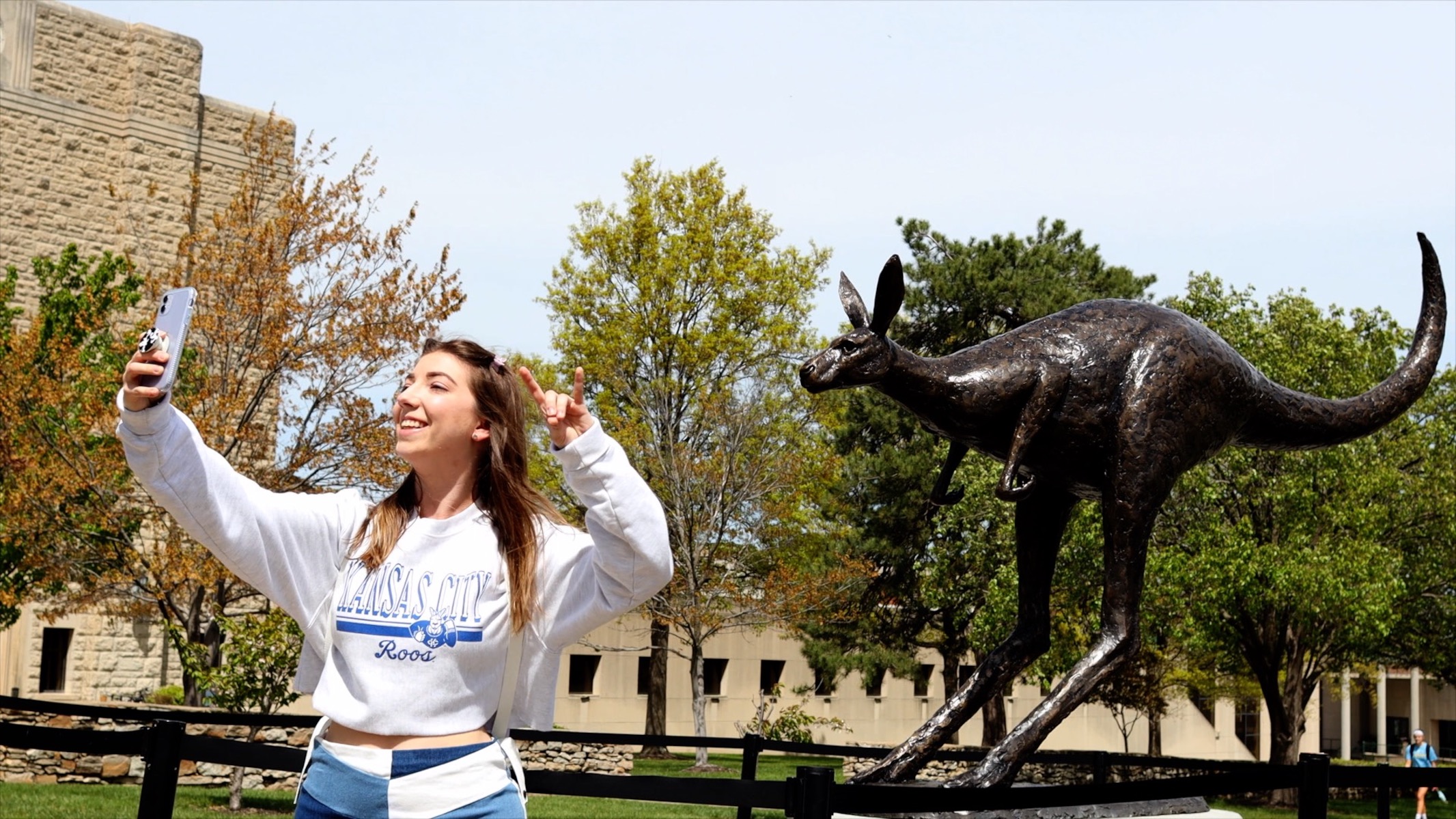
Students, faculty and staff welcome new Roo to campus
UMKC students, faculty and staff welcomed the newest UMKC Roo to campus in the first public event since the beginning of the COVID-19 pandemic.
Mahreen Ansari, UMKC Student Government Association president, introduced the Roo sculpture by artist Tom Corbin that stands proudly in the heart of campus on the University Walkway near the Miller Nichols Library and Learning Center.
“We are completing a circle that began 84 years ago, in 1937, when students at the University of Kansas City selected the kangaroo as our official mascot,” Ansari said. “From Oregon to Ohio to Oz, you can find all manner of lions and tigers and bears, oh, my, but UMKC is one of the very few colleges or universities to proclaim our identity as proud, strong, faithful and dedicated Roos.”
Chancellor Mauli Agrawal was thrilled to learn when he arrived at UMKC, that the kangaroo is one of the few animals in the world that cannot go backwards.
"(Roos) can only go forward. That’s what makes this great animal such an appropriate symbol for our great university.” - Chancellor Mauli Agrawal
Chancellor Agrawal delivers remarks at the Roo sculpture's unveiling event.
“They can only go forward. That’s what makes this great animal such an appropriate symbol for our great university,” he says. “And it’s a rallying point. This statue stands as the physical embodiment of our shared identity. It is a statement of our shared history, and our shared determination to shape the future.”
Corbin described his creative process that brought the Roo to life in bronze.
“My research into producing a sculpture of the Roo began years ago when I was approached to produce the Bloch School Alumni award,” Corbin said. “Inspired by the more modern Roo logo, my sculptural adaptation for the award was to create something more artful, elegant and sleek.
The original inspiration has carried over to our monumental Roo that has found its new campus home today.”
Chancellor Mauli Agrawal stands next to artist Tom Corbin, the artist who created the sculpture.
Brandon Henderson (Political Science ’21) was student government association president when the anonymous gift was announced.
“It looks amazing!” Henderson said. “People are taking photos by it already. It looks as if it’s been there a long time. You can tell it is going to age well.”
Chancellor Mauli Agrawal (middle) stands next to current and emeritus Student Government Association presidents.
Grace Horacek (Fine Arts ’23) came to see the unveiling with a group of friends.
“I work in the recreation center, and I saw the statue unloaded and really wanted to see it. It’s definitely cool.”
Apr 26, 2021
Fox4KC reports on unveiling of Roo statue
The University of Missouri-Kansas City added a little artwork to campus Monday. UMKC students are known as Roos, so a sculpture of it’s mascot, a kangaroo, couldn’t be more fitting. Read the story and watch the newscast.
Apr 26, 2021
Kansas City Star taps Ken Novak
Ken Novak, a criminal justice professor at the University of Missouri-Kansas City who studies policing and crime prevention, said he has become pessimistic about changing the culture of gun violence in Kansas City. Read the article. (subscription required)
Apr 26, 2021
Tampa Bay Times interviews Max Skidmore
“Biden compares quite favorably with every other president after Franklin Roosevelt,” said Max J. Skidmore, University of Missouri-Kansas City political scientist. “Not only has he accomplished many things quickly — most of them are highly significant.” Read more.
Apr 26, 2021
Yahoo! News picked up story from Action 41 News
The UMKC Institute for Human Development has released a guide to help people notice abuse of people with disabilities and how to prevent it. Read more.
Apr 23, 2021
KMBC interviews Stefanie Ellison
“I do think we have some work to do with those that are vaccine hesitant,” said Stefanie Ellison of the University of Missouri-Kansas City School of Medicine. Read the story and watch the newscast.
Apr 23, 2021
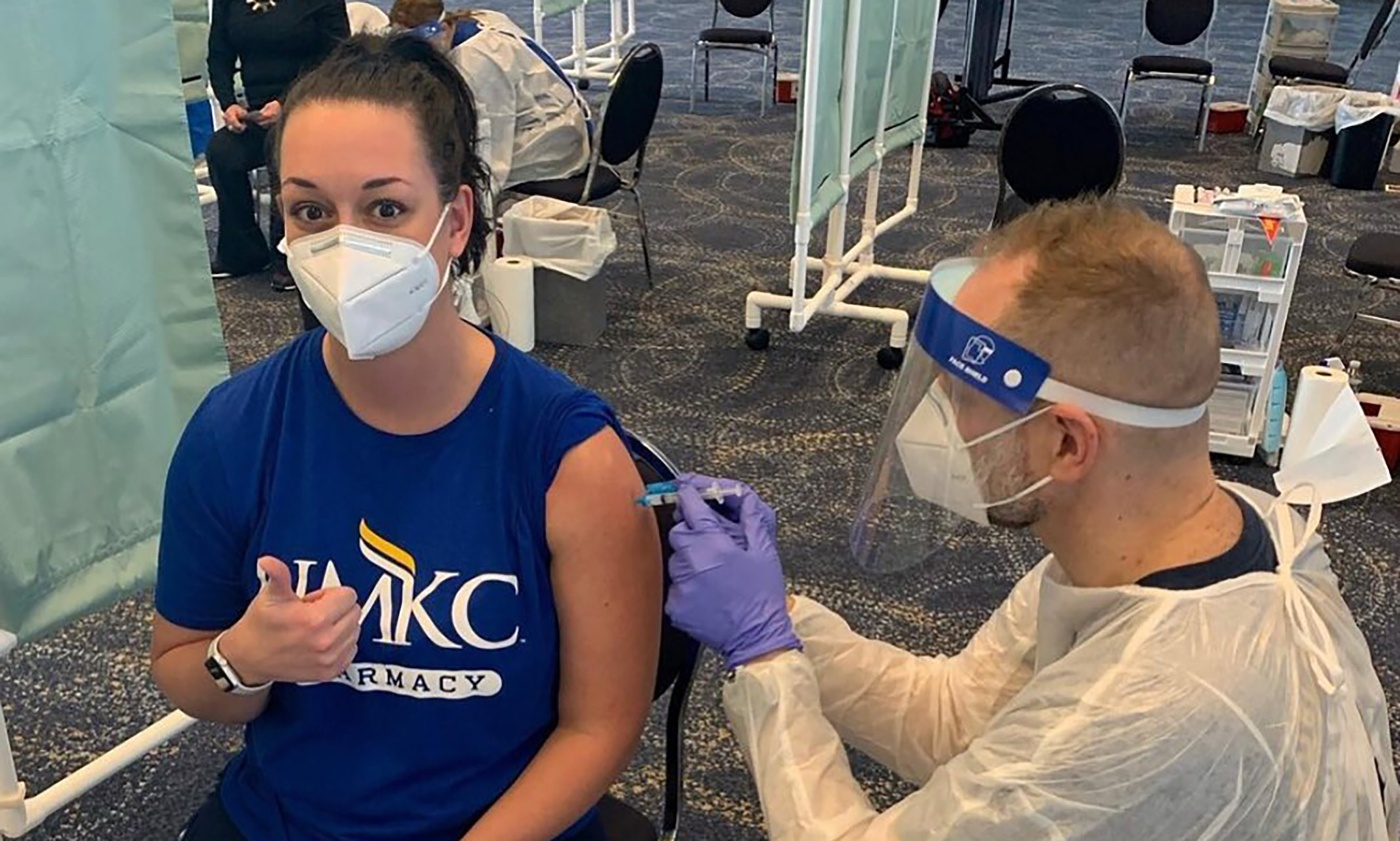
School of Pharmacy playing significant role in efforts across the state
As soon as the announcements came last November that vaccines for the COVID-19 virus would soon be released for distribution, Cameron Lindsey’s phone began ringing at the UMKC School of Pharmacy.
Lindsey, Pharm.D., MPH, interim chair of the division of pharmacy practice and administration, leads the schools’ vaccine response team. It is a group of faculty members at the school’s three campuses in Kansas City, Columbia and Springfield that was quickly assembled to provide manpower and other support for partners and outside entities launching or managing vaccine clinics across the state.
“I have people going to Clinton. I’ve got people going to Cape Girardeau, some I have going to St. Louis,” Lindsey said. “So, it is all over the state.”
UMKC pharmacy students also have done month-long rotations at the Hannibal Free Clinic since the COVID pandemic began.
By March, Lindsey said students and faculty from across the school’s three campuses had spent nearly 4,400 hours administering more than 17,500 doses of vaccines at 36 sites throughout the state in communities large and small.
Those were just the volunteer numbers reported by students and faculty. That doesn’t include the unreported number of students engaged in vaccine efforts as part of their clinical rotations or part-time jobs outside the classroom.
Vaccines are being administered at health systems, long-term care facilities, pharmacies, clinics and mass vaccine events at sites across the state. Since the inception of the first COVID vaccine in December, it’s been all hands on deck for students, faculty and staff of the School of Pharmacy and the other UMKC health sciences schools – Medicine, Dentistry and Nursing and Health Studies -- which have all been working overtime to help with the mass vaccine efforts.
As clinics quickly ramped up in March, filling the need for all of the requested help has been a challenge. Paul Gubbins, associate dean of the school’s Missouri State University campus, said he received a request from a site in Webster County near Springfield that has been typical of the need in rural communities. In short, “we just received a vaccine shipment and need any help your students can provide.”
“We've had several requests from community pharmacies that have had a pretty short lead time and some have been unable to predict when their next clinic will be,” he said. “We do the best we can to notify our students to assist. The demand is there and it's so high that the challenge is matching the resources to that demand because of the quick turnaround or the uncertainty in terms of the allocations that pharmacies get.”
UMKC Pharmacy students are trained and certified to give injections near the end of their second year of school. It’s become commonplace for the recently certified second-year and third-year pharmacy students to play an active role in vaccination events. More so, now with the COVID vaccines.
Roger Sommi, Pharm.D., associate dean of the school’s Columbia campus, said his students working with some of the area’s major pharmacies have reported sites administering as many as 300 to 350 COVID shots a day.
“There are a lot of opportunities (to help) and it’s fast and furious for sure,” Sommi said.
One student he spoke of was going back and forth between school and volunteering at a local pharmacy during her breaks between classes.
“She would go down to the pharmacy for two hours, inject 40 or 50 people and then come back to class,” Sommi said. “All of these places are taking everybody they can get.”
So great is the need for help that many of the pharmacy school’s faculty have gone through certification training on their own time to join the vaccination efforts. Sommi was one of five faculty members to go through one particular certification class that Lindsey taught.
“When I went through pharmacy school in the 1980s, injection certifications weren’t even a thing,” Sommi said. “With COVID, I saw a need and saw an opportunity to give back to the community, so I personally went through the certification process and there were least two others in my certification class in the same boat. I didn’t get it when I went to school. I didn’t need it for my practice, but I want to be part of the solution.”
The pleas for help are coming from across the state, particularly smaller communities where pharmacies and pop-up clinics are particularly short-staffed.
“Small towns are calling saying hey, we’re getting a shipment of Pfizer and we’re going to do (a vaccine clinic), do you have anybody that can help,” Sommi said. “The reality is, the students are tapped out. We just don’t have the number of students needed to meet the demand.”
In Springfield, Gubbins said a large number of his students have been busy administering vaccines through their workplace.
“Many of them work at large health care facilities or have pharmacies in their workplace that are offering a clinic where they get scheduled to work or volunteer to help,” Gubbins said. “In addition to volunteering, I think a large percent of the vaccination efforts our students engage in occur through their workplace.
“I've been putting out emails saying to students that if you have free time during the school week when you're not in class or going your clinic, here are the places that need help. Or, they're doing it when they're working. It's important to know that we really do fill that community resource by being here either in a volunteer or workforce sort of way.”
Apr 22, 2021
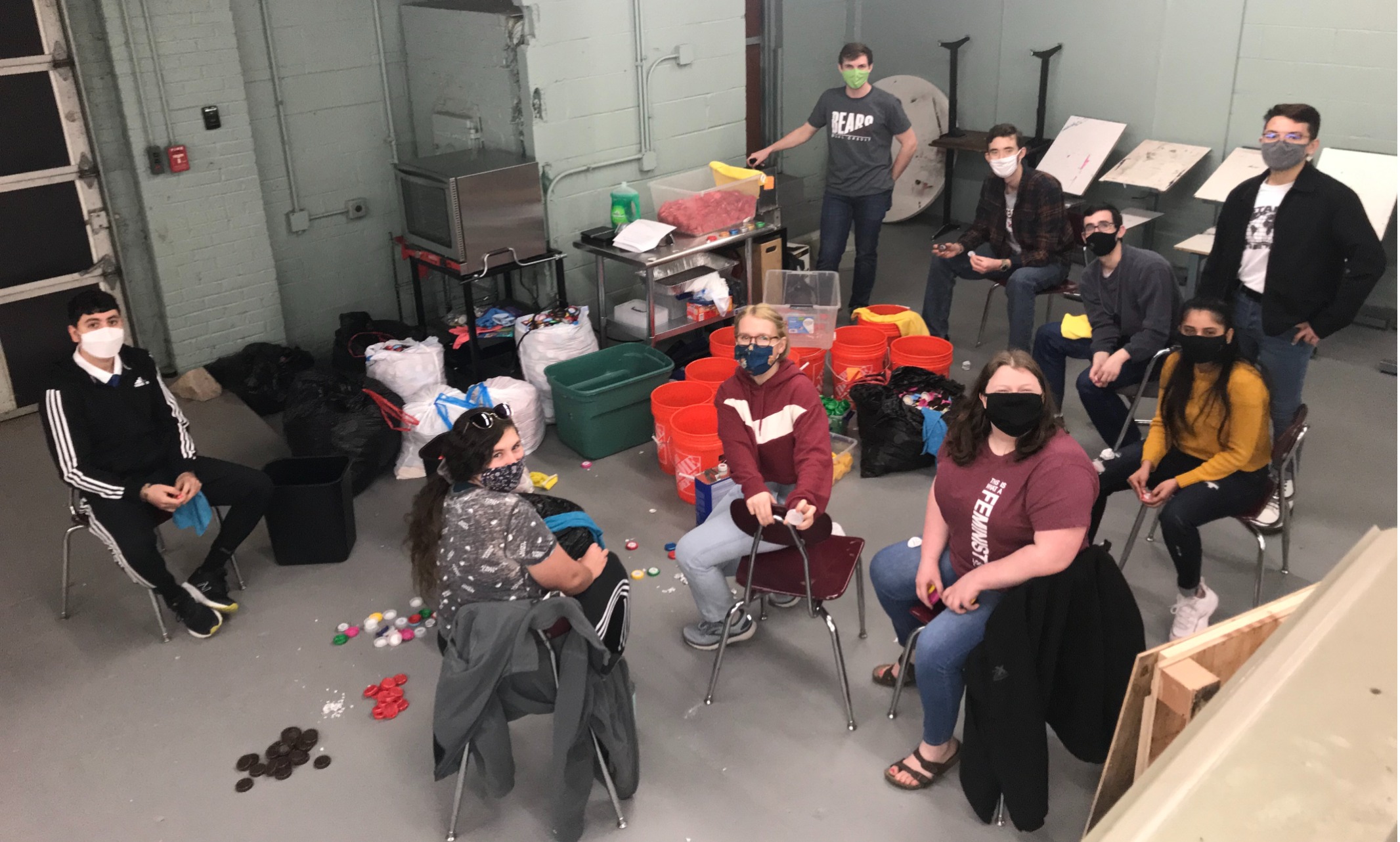
Third year in a row for high ranking
The UMKC Enactus team placed 2nd in their league and exited the 2021 Enactus USA National Competition in the top 8 teams in the country out of more than 300 teams in the U.S.
The team spent the year focused on global impacts with multiple social entrepreneurship projects, even in the face of the COVID-19 pandemic gripping our region and the world.
“It has truly been an incredible year,” said Ali Brandolino, Enactus team president. “This finish is motivating our team to find more needs and impact more people in our community and communities world-wide. It has been exciting to watch each member light up with passion when discussing innovative solutions to problems many people face every day. I will never forget what UMKC Enactus was able to accomplish during the year of the pandemic.”
The team’s achievements this year include:
Maintained a vibrant student organization virtually, with a roster of almost 100 members
Finalist for 2021 TCU Values and Ventures Completion, a premier national social entrepreneurship competition
Top 48 team in in the world in the Race to Rethink Plastics – a global challenge sponsored by Coca-Cola, Dell and Hi-Cone to motivate students think about ways to reduce plastic waste in the environment
Diverted 471 pounds of plastic through the Generation Green project and a partnership with Shatto Milk Company
Supported artisans in Oaxaca, Mexico
Raised thousands of dollars toward educational facilities for Ogwuokwu Community School in Ogwuokwu, Nigeria
Developed new student-led fundraising campaigns that have brought in thousands of dollars to support team activities
Held a virtual reverse pitch event with community leaders
Served the community as a Rotaract team
Maintained COVID-safe projects and interactions
Several students also won individual awards. Drew Childs won the $10,000 Jules and Gwen Knapp Scholarship. This is the second year in a row this honor went to a UMKC student. Hannah Case was recognized as a finalist for the Project Leader of the Year Award for being among the top 3 most impactful project leaders nationally. The team also won the $1,500 Jack Shewmaker Enactus Spirit Award for this student-produced video.
You can view the online expo and the team’s awards announcements online.
Apr 22, 2021
Startland News picked up story from Action 41 News
Chris Rehkamp is associate director of Tech Venture Studios at the UMKC Innovation Center. Read the full article.
Apr 22, 2021
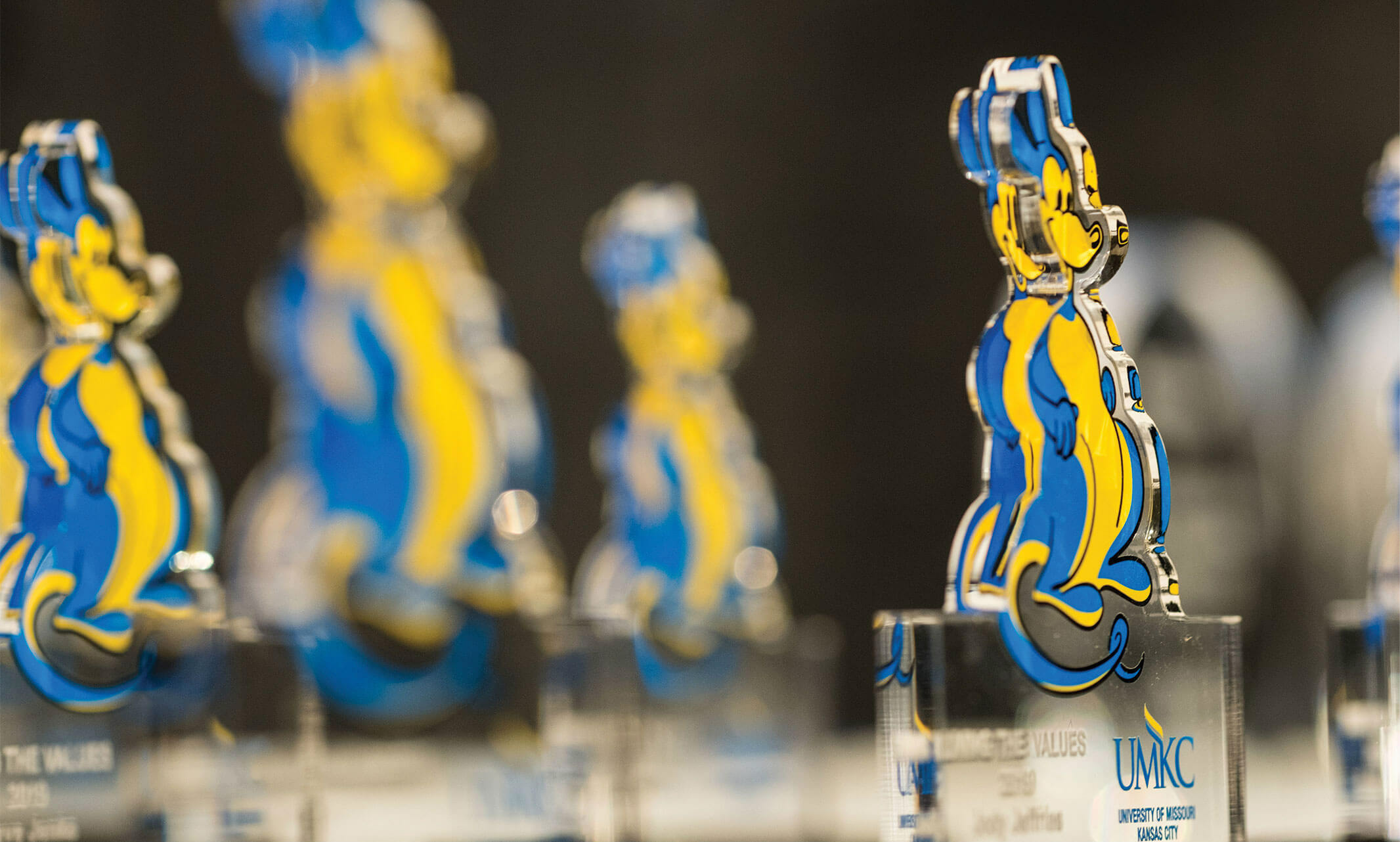
Annual event recognizes contributions
Excellence is the standard for UMKC staff, faculty and students.
More than 1,300 staff members demonstrate that excellence not only in customer service and quality of work, but in their personal ethics as well. The annual Staff Awards event gives our campus community a chance to recognize those who make a difference at UMKC.
Due to the COVID-19 pandemic, this year’s ceremony took place virtually on April 20 to celebrate dedication to student success, diversity and inclusion, engagement and outreach and research and discovery. The celebration also included milestone anniversaries, staff who were a part of the 2020 graduating class and staff who completed leadership development courses offered through the university.
“All of (our staff) have persevered through long months of disruption and kept UMKC running smoothly despite great challenges and significant obstacles,” says UMKC Chancellor Mauli Agrawal. “That, too, is worthy of note. I am honored to celebrate you today.”
Congratulations to the 2021 Staff Awards recipients:
40-year milestone anniversary
Leisha ManningJill Reyes
2020 spring, summer and fall graduates
Benjamin BissenTaylor BlackmonJamisha CooperMackenzie DossJason FosterAlissa GrattsScott GuerreroCory KinderEllyce LovelessShana MaloneCourtney McCainAlison MurdockJohari RussellElizabeth ValleBrian WesthuesMargaret Wight
Supervisory Development Series Graduates
Anne AllenMaryjane BruningErin BumannBrittany BummerJessica ElamJeremy FergusonCollin FosterMegan FrasherMargo GamacheElizabeth HanssenLaura M. KingLaura W. KingNancy KunkelDaniel McCarrollSteve McDonaldAmy McKuneZangi MitiShani NegronCasey RamseyAdam ShoemakerKristina ShultzLindy SmithRobin SommerJaney StephensAshley Swanson-HoyeAshley SylvaraHeidi UpdikeClay VernonSherrie WatkinsKaity WoodyRobert Wren
Administrative Leadership Development Program Graduates
Nathaniel AddingtonMatthew BrownKatherine GareyLisa MallowRosa NatarajMary ParsonsJennifer SackhoffTammy Welchert
Series on Leadership Essentials Graduates
Kenneth BledsoeMaria DeSimioConnor FenderCollin FosterMegan FrasherJalonn GordonElizabeth HanssenMeg HauserJonathan HernAmelia HowardBrent McCoyMyisha SimsSandra SmithPaul Wagner
Staff Council Dedication Award
Hannah Litwiller, senior student recruitment specialist, Office of Admissions
Living the Values Awards
Obie Austin, Student Health And WellnessMichael Bongartz, Finance and AdministrationCindy Brown, School of DentistryRosie Challacombe, College of Arts and SciencesSharon Colbert, School of Nursing and Health StudiesClint Dominick, Intercollegiate AthleticsMakini King, Division of Diversity and InclusionBrad Martens, School of EducationRachel McCommon, School of MedicineSteve McDonald, School of PharmacyZangi Miti, Strategic Marketing and CommunicationsMary A. Matturro Morgan, Henry W. Bloch School of ManagementHelen Perry, UMKC ConservatoryEmily Reeb, University LibrariesAshley Swanson-Hoye, School of LawJodi Troup, Office of Research ServicesJane Vogl, School of Computing and EngineeringAbby Weiser, Office of AdmissionsAsia Williams, School of Biological and Chemical Sciences
University Staff Awards
Excellence in Student Success – Marjory Eisenman, School of Computing and EngineeringExcellence in Research and Creative Works – Charles Brandon King, Institute for Human DevelopmentExcellence in Engagement and Outreach – Martha McCabe, School of Computing and Engineering Excellence in Multiculturalism, Globalism, Diversity and Inclusion – Dylan Burd, College of Arts and SciencesExcellence in Planning, Operations and Stewardship – Huan Ding, School of Computing and Engineering Chancellor’s Staff Award for Extraordinary Contributions – Anthony Maly, Office of Student InvolvementRising Star Award – Margo Gamache, Honors College
Apr 20, 2021
Unique socially-distanced event celebrates center’s fifth anniversary
The UMKC Center for Neighborhoods is celebrating its fifth anniversary Friday with a socially-distanced drive-through birthday party.
The center is a community engagement initiative lead by the university’s Department of Architecture, Urban Planning+Design. Over the past five years, 193 neighborhood leaders, representing 79 unique organizations, have participated in the center’s Neighborhood Leadership Training classes. Neighborhoods that have participated in the training secured $1,159,562 of investments (grants, donations, governmental funding, volunteer hours, etc.) in their neighborhoods in 2020.
The celebration is from 4 to 6 p.m. Friday, April 23 at the Anita B. Gorman Discovery Center parking lot, across the street from the center’s office at 4747 Troost Ave. Center staff and UMKC AUP+D students will be on hand to distribute goodie bags, yard signs and treats. Representatives of the Missouri Department of Conservation and the Anita B. Gorman Discovery Center will also be on hand to share information.
Apr 20, 2021
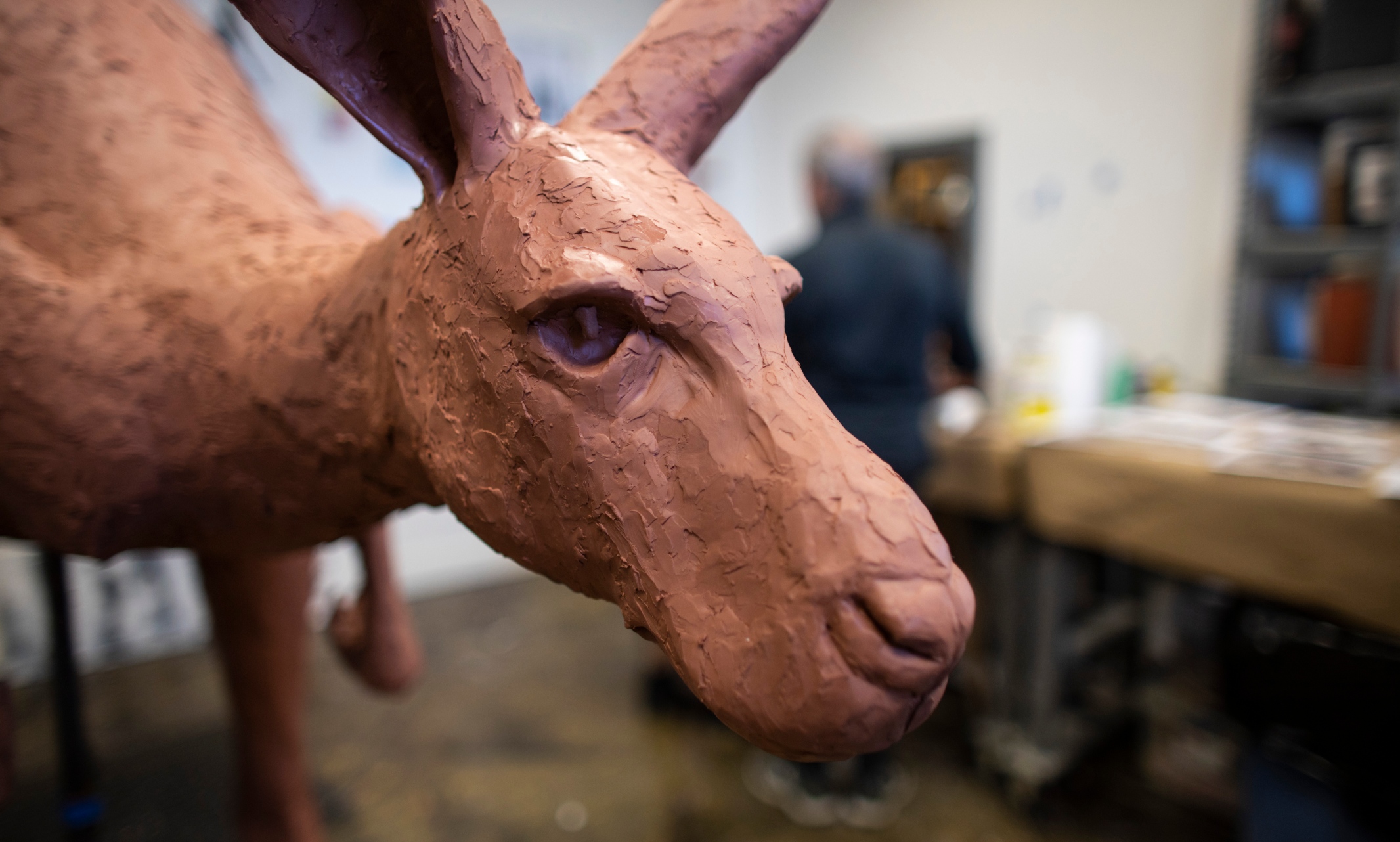
A monumental symbol of tradition at UMKC
There is no better time to celebrate the resilience of the Roo spirit than now. Our community has forged ahead through the challenges of an unprecedented year, and in celebration of that same enduring spirit, we’ll be unveiling a new Roo statue.
The unveiling is 10 a.m. Monday, April 26, at University Walkway, between Swinney Center and Miller Nichols Library and Learning Center, and the entire UMKC community is invited.
It’s an historic event that’s been a few years in the making. In 2018 the Student Government Association, with support of private donations, commissioned Kansas City artist Tom Corbin to create a new Roo statue for campus.
Donations for the statue were made in 2018 in honor of the investiture of Chancellor Mauli Agrawal. It is intended to be a symbol of our community and our history as Roos in Kansas City, and will serve as a rallying point on campus for important and meaningful events, gatherings and alumni visits.
Most important, the new addition to campus serves as an opportunity for students to establish new traditions. Former SGA president Abdul Ahmed offered a suggestion: “My hope is that future graduating classes will take photos in front of the Roo.”
History of the UMKC Roo and Campus Traditions
You would expect such a unique mascot to have an interesting origin story. We caught up with campus historian Chris Wolff to learn more about how the Roo was embraced by the students at UMKC.
Since the university’s founding, one of its core strengths has been its kinship to Kansas City. When the University of Kansas City (predecessor to UMKC) was established by local civic leaders during the Great Depression, it was meant to become a cultural monument — to put Kansas City on the map.
While it was prominent community members who built UMKC, its students are credited for much of what the university has become.
“The founders of UMKC were all-important businesspeople in Kansas City. None of them had any experience in education, so they left it upon the students to create the college experience they wanted,” Wolff said. Students chose the university’s colors, established the student newspaper and wrote the school’s alma mater.
In 1936, editors of the student newspaper decided the debate team needed a mascot. Students proposed adopting the kangaroo as the mascot due to the animal’s popularity at the Kansas City Zoo. To advocate for the mascot, a group of students formed the SGA Kangaroo Party and when they won the election in the spring of 1936, the kangaroo became the official university mascot. In 1938, Kansas City native Walt Disney drew the first picture of the kangaroo—you might see some similarities to a famous mouse!
Early illustration of our Roo mascot by Walt Disney.
The university has seen different versions of the Roo through the years. Wolff said throughout history, students have been known to draw their own depictions of the kangaroo despite the university having official branding guides for the kangaroo, the first set of which was in the 1950s.
“Even to this day you’ll see student groups draw their own depictions of Kasey Kangaroo. That’s one of the longstanding traditions of students,” Wolff said. “The reason the kangaroo survived as the mascot all of these years is because of its uniqueness and because of its connection to Kansas City.”
One of the most popular and appreciated depictions of the Roo can be found in watercolor paintings and sculpted into small awards sculptures molded by Corbin, a renowned Kansas City artist.
While traditions from spirit week activities and other student experiences change with the times, UMKC has several monuments, ones that remember classes of old and gifts dedicated by students and community members. For example, the class of 1939 donated one of two flagpoles currently standing on the quad; the other was gifted by the family of Harry Kaufman, a student who died fighting in World War II, and is dedicated to student veterans.
Wolff said UMKC grew up with Kansas City. Having been founded by the same civic leaders that established Liberty Memorial – which you can catch a glimpse of embedded in the university seal — and the Nelson-Atkins Museum of Art, UMKC has deep and longstanding connections to Kansas City. You can come from anywhere in the world, and if you come to UMKC, you are a part of that community.
“The reason the kangaroo survived as the mascot all of these years is because of its uniqueness and because of its connection to Kansas City.” – Chris Wolff
“Being a Roo means you’re more than just part of the university. It means you’re a part of a whole community that starts with the college,” he said.
With a renewed sense of school spirit and plans to establish a new sense of belonging for its students, new traditions are being created. A few of the oldest ones, however, remain — the student and alumni impact on Kansas City, a lasting gift to campus and a new version of the Roo.
“Kansas City has a very important connection to art. I can’t imagine not having the Nelson here, or the Kemper, or being able to come take photos on campus,” Corbin said. “I hope the Roo inspires other artists. When I was coming into my career as a sculptor, I was told that I could never make a living as an artist. I want to encourage students and let them know they can do it.
“I did a lot of research on kangaroos prior to sculpting the actual monument, and one of the things I learned is that Roos cannot go backward. They can only go forward.”
Join our campus community as we celebrate the installation of this monument. The ceremony will be 10 a.m. Monday, April 26, next to University Walkway near Miller Nichols Library and the University Playhouse. Please continue to follow masking and distancing guidelines.
Watch the livestream
Apr 19, 2021
KBIA taps Chi-Ming Hung about flag football
Flag football presents an opportunity for kids to play the sport they love with less chance of injury. Chi-Ming Hung, professor and neurobiologist at the UMKC School of Biological and Chemical Sciences, and a flag football program director discuss how this version of the sport is a safer alternative. Read more.
Apr 17, 2021
KMBC reports on UMKC vaccination event
Students from the UMKC schools of medicine, nursing, pharmacy and dentistry helped administer the shots. Read more.
Apr 16, 2021

The 2021 recipients include five UMKC faculty members
Every year, the highly competitive UM System President’s Awards recognize faculty who have made exceptional contributions in advancing their university community.
The awards are presented on behalf of President Mun Choi to faculty members across the four universities of the UM System. This year, UMKC faculty members were honored with five awards:
Presidential Faculty Award for University Citizenship, Service Award
Laverne Berkel, School of Education
Laverne Berkel, associate professor of counseling and counseling psychology, has earned this year’s award for distinguished service. Her exceptional contributions include creating academic policy, ensuring research compliance and advising on matters related to academic leadership development. She served on the provost’s committee for excellence in teaching and worked to address diversity concerns, even as far back as establishing the campus’s first SAFE ZONE program in 2000.
“I have known and worked closely with Dr. Berkel since she joined our faculty in 1999,” said Chris Brown, chair and fellow professor of counseling and counseling psychology. “I can think of no one else who is more deserving of this award.”
Presidential Faculty Award for Innovative Teaching
Wanda Temm, School of Law
This year’s award, which recognizes faculty who are outstanding teachers and employ novel and innovated teaching methods to achieve success in student learning, was presented to Wanda Temm, professor at the School of Law. Temm developed a program to prepare students for the legal profession’s credentialing test—the bar exam. The program has increased the bar passage rate for first-time takers at UMKC from 67% to 98%.
“My role is to try as many ways as I can to engage my students,” Temm said. “If one way is not working, then I’ll try another way. Different explanations, visualizations and exercises work for different students. I strive to present the skill they are developing in diverse ways and in an individualized manner through my comments on their papers and in individual conferences.”
The Inter-Campus Collaboration Award
Janet Garcia-Hallett, College of Arts and Sciences
Janet Garcia-Hallett, assistant professor of criminal justice and criminology, was recognized for activities that foster collaboration across two or more campuses of the University of Missouri System. She worked with faculty members on the University of Missouri and University of Missouri-St. Louis campuses on the Prison Research and Innovation Network (PRIN) grant, funded by the Urban Institute in collaboration with the Missouri Department of Corrections.
“PRIN is an externally funded project that brings together not just our UM system campuses, but also our state’s Department of Corrections, government officials and policy makers in pursuit of a better, more humane and evidence-based correctional system,” said Kati Toivanen, interim dean of the College of Arts and Sciences. “The project is a major and collaborative undertaking that serves the dual purposes of helping Missouri’s corrections-involved individuals lead more functional lives, and informing the peer-reviewed literature base so other state systems can gain from the results.”
The Economic Development Award
Reza Derakhshani, School of Computing and Engineering
Recognized for distinguished activity and serving as an economic engine for the state and its citizens, this year’s Economic Development Award winner is Reza Derakhshani, professor of the School of Computing and Engineering. Derakhshani is an internationally renowned entrepreneurial academic in the fields of biometric personal identification, privacy and mobile security. He is the named inventor on nearly 140 U.S.- and international-issued patents.
“I have also been volunteering my entrepreneurial experience with other UMKC faculty members and our University System through serving on the school and system-wide tech transfer and patent committees,” Derakhshani said, “as well as infusing that know-how in my courses and sharing them with our students so that they can carry the torch.”
Presidential Faculty Award for Cross-Cultural Engagement
Andrew Stuart Bergerson, College of Arts and Sciences
Andrew Stuart Bergerson, professor of history, received this award for promoting cross-cultural engagement through education, research and service. Bergerson’s research focus is on everyday life in modern Germany, with particular interests in the Holocaust and Nazi Germany. He reaches diverse audiences with a variety of media, including blogs, curricula, digitized archival collections, eBooks, exhibitions, drama, lectures, radio, seminars, workshops and YouTube.
“In the last 10 years, Drew has become a system leader in cross-cultural engagement through his innovative education, research, and service,” said Massimiliano Vitiello, fellow professor of history. “He is essential to our public history program has been a key voice in developing this field in our department.”
Apr 15, 2021
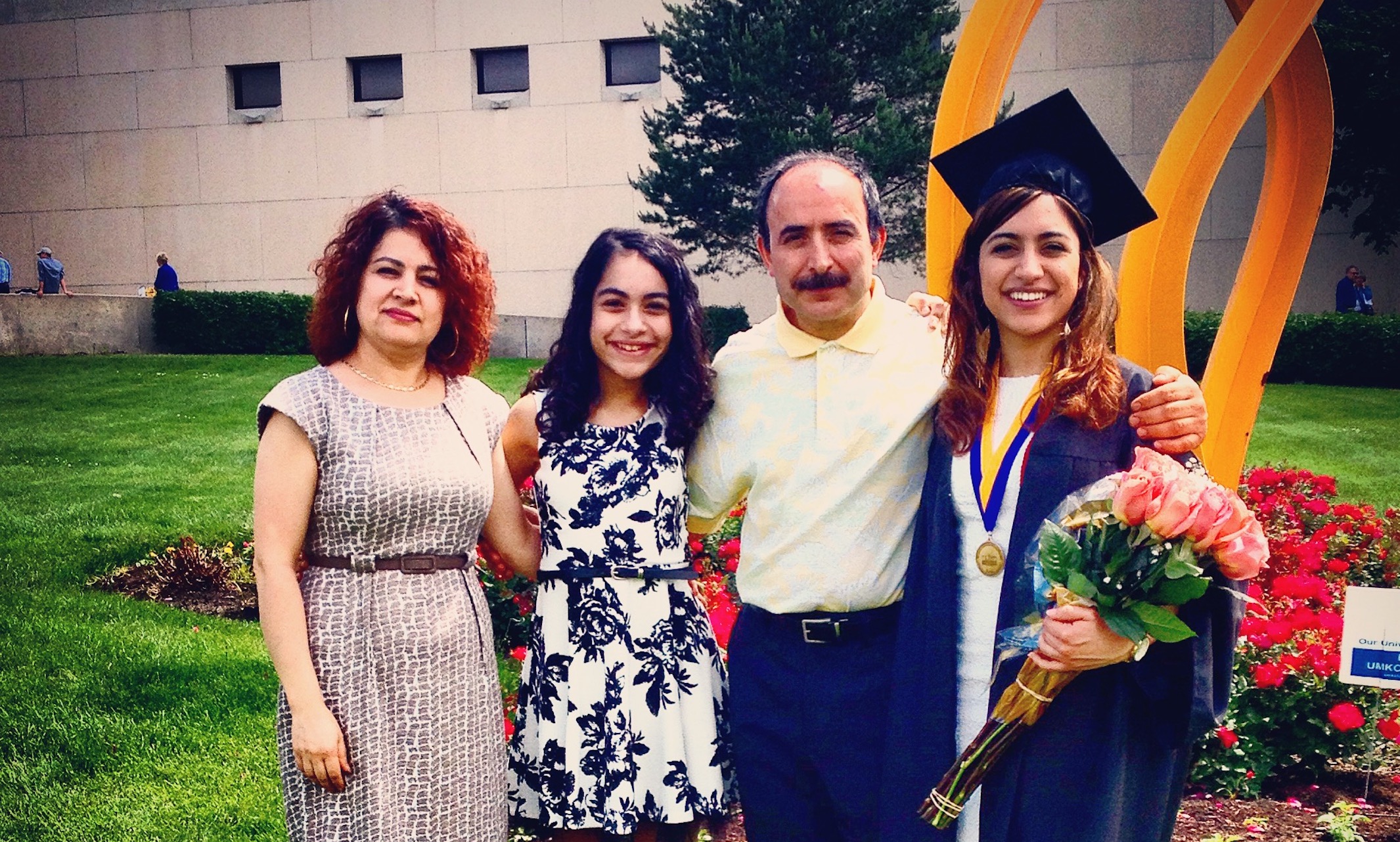
$90,000 award supports training in women’s health
Nazanin Yeganeh Kazemi, (BS, ’15, Biology and Chemistry) received a Paul and Daisy Soros Fellowship for New Americans of $90,000 to support her MD/PhD training in medicine and immunology at Mayo Clinic College of Medicine.
The merit-based Paul and Daisy Soros Fellowships are exclusively for immigrants and children of immigrants who are pursuing graduate degrees in the United States. This year the program received more than 2,400 applications for 30 fellowships.
Kazemi was working from home in Switzerland, where she is serving as a United States Fulbright Scholar, when she received the news.
“After spending the morning setting up my experiments in the lab, I was working on a manuscript in my flat here in Geneva when I got the phone call from Daisy Soros and Craig Harwood. It was such a joy to hear their voices and to receive the news in such a personal way.”
Kazemi says her success has been hard-earned.
“My parents and I moved to the United States from Iran in 1999,” Kazemi said. “Between the three of us, we knew about two words of English. I only knew how to say, ‘Hello.’"
She says her parents’ first priority was always her education and that her success is a culmination of their sacrifices.
"As a first-generation college student and first-generation immigrant, I have always known that education is the biggest privilege," Kazemi says.
Kazemi is pursuing her doctorate in immunology with a focus on women’s health.
“The health of women all over the world has undeniable implications for the health of every facet of our society from the health and success of our future generations to the global economy,” Kazemi says. “Moreover, we live in an era where, despite women all around the world making amazing progress toward our rights and fair treatment, we still face a great deal of prejudice and abuse. I am dedicated to women's health because I believe in a world where every woman feels safe, respected and treated fairly and is able to pursue her goals without fear.”
"As a first-generation college student and first-generation immigrant, I have always known that education is the biggest privilege." - Nazanin Yeganeh Kazemi
While the fellowship helps to fund her training, she is excited about other aspects of the program.
“It’s a truly unique fellowship that helps awardees reach their goals in many aspects of life through the connection with over two decades of alumni. I’m just thrilled to get to know the other fellows!” she says. “There are so many amazing recipients of this award and I’m excited for the friendships and colleagues I’ll get to have. The current and past recipients have backgrounds, goals and interests that are similar to mine, which is a rare feeling as an immigrant.”
Kazemi says she never could have imagined this opportunity when she immigrated to the United States.
“Never in a million years would I have imagined I would be here! Being an immigrant in the U.S. is a unique experience filled with the greatest potential for opportunity, but it can also be a very challenging experience. I am grateful to my parents, teachers, and mentors who have helped me make it this far.”
Apr 14, 2021
Hollywood Reporter ranks UMKC Theatre program
UMKC Theatre is again on this list of top costume design schools. Read the full article.
Apr 13, 2021
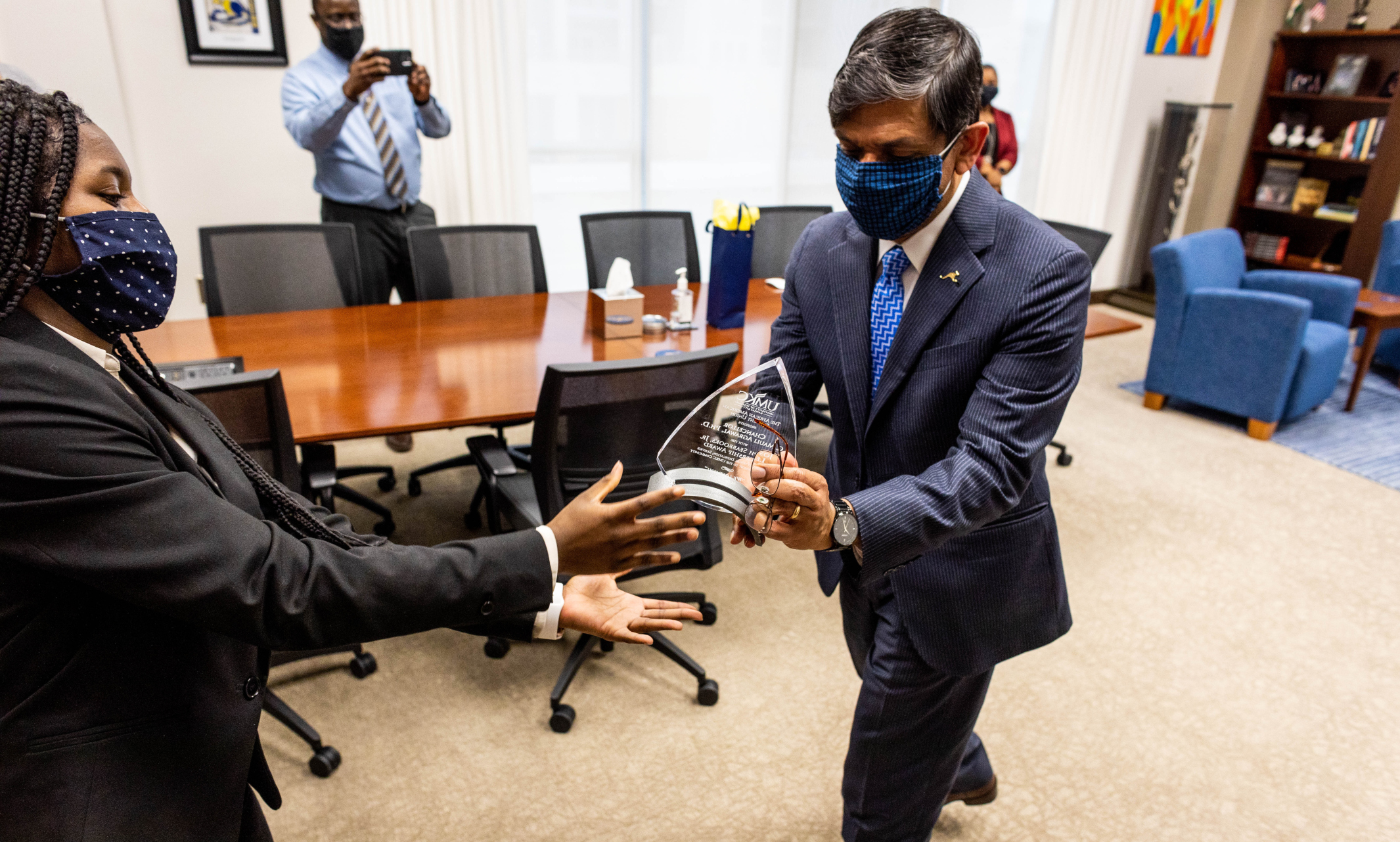
TAASU presents annual Dr. Joseph Seabrooks Jr. Award to Mauli Agrawal
The African American Student Union (TAASU) surprised Chancellor Mauli Agrawal in his office April 12 with the presentation of the Dr. Joseph Seabrooks Jr. Leadership Award.
TAASU typically presents the award at their annual Freedom Breakfast. The award recognizes the service, leadership, professionalism and dedication of a faculty or staff member. The breakfast was cancelled this year due to the COVID-19 pandemic but TAASU members wanted to let the chancellor know how much they appreciated his leadership during the difficult social justice events of the past year.
“We want to present you with this award for your help and response to everything that has been going on, and the way you have responded to our requests,” said Blessing Onwudinanti, treasurer of TAASU.
Agrawal responded simply, “There is more work to be done.”
Onwudinanti was joined at the presentation by Brenda Reed, TAASU cultural chair and secretary. They said specific responsive actions by the chancellor included the creation of the Unity Gardens and Diversity Expansion Scholarship programs, and the launch of the Roos Advocate for Community Change initiative.
“It’s just something I need to do,” Agrawal said.
See the TAASU Video
Apr 12, 2021
Yanira Merino channels César Chávez in annual lecture
César Chávez was the organizer of the Chicano Movement in the United States and founder of the United Farm Workers. Every year the UMKC Division of Diversity and Inclusion invites a leader to give the César Chávez Lecture. The presentation is designed to honor the accomplishments of Chávez and to inspire others to continue the legacy of his tireless, nonviolent leadership in ways they feel passionate so that more people can live with dignity and experience equal civil rights.
Yanira Merino
The speaker on April 8 was Yanira Merino, national president of the Labor Council for Latin American Advancement, which represents the interests of approximately two million Latino(a) trade unionists throughout the United States and Puerto Rico. In the spirit of César Chávez, Merino participated virtually and spoke about the many ways we are all fighting for a better life in the same country – the United States of America.
“You are never strong enough that you don’t need help,” Merino quoted from Chávez.
Chávez successfully used nonviolent tactics to organize farm workers against unfair labor practices and unhealthy working conditions that continue today as farm workers are exposed to harmful pesticides, dangerous equipment, hazardous “housing” and unfair wages. As a veteran labor and immigration rights leader and advocate, Merino fights in much the same way as Chávez.
Merino was born in El Salvador during a time of political violence and civil war. Merino shared her family’s struggle in the 1970s when they fled El Salvador for the United States. It was during this time Merino developed a passion for seeking justice for workers in El Salvador and those who fled for the United States. Merino’s family experienced separation, deportation and flight back to the United States as undocumented immigrants. Merino shared her feelings of fear, living undocumented, similar to the fear experienced by many today.
Merino worked many jobs in Los Angeles as an undocumented individual and knows, first-hand, what it is like to live in fear of deportation but with the hope for a better future. Perseverance is what kept Merino on the path to advocating for justice and equality. The working conditions at her places of employment were not good. But like Chávez, Merino learned the importance of working together. She and fellow workers were inspired to form a union. Despite being fired twice and working for a company that divided its employees, the union organized with Merino’s leadership. Within six months they had a contract and they stayed united. Merino recommended today’s youth look at history and learn about the labor movement, unions and how the middle class was created.
“Embrace our past,” she said. “Embrace our contributions. Embrace where we are going together.”
The labor unions play an important part in the building of the middle class, according to Merino. Unions lobby for wages and benefits. The ability to make more money gives people the chance to save money, buy homes, send children to school.
How can others speak out and overcome the barriers when you are the only one? Merino said move forward, as Chavez always talked about, know that you are speaking for everyone else.
Merino’s advice for those who want to see change is to get involved, remember change doesn’t happen overnight and it’s not easy. She said to build bridges between communities, find similarities, put together policies that benefit all, work with younger generations to understand that moving forward is up to everyone, work with churches, work with elected officers and elect people who look and think like you do.
“This is not only my fight, it’s our fight,” Merino said. “At the end of the day, we’re all fighting for democracy and this nation. When we connect as people, as workers…we achieve this.”
The lecture was moderated by Chris Hernandez, chief spokesman for the City of Kansas City, Missouri, and director of the City Communications Office. UMKC student Daphne Posadas introduced Merino and Hernandez.
Apr 12, 2021
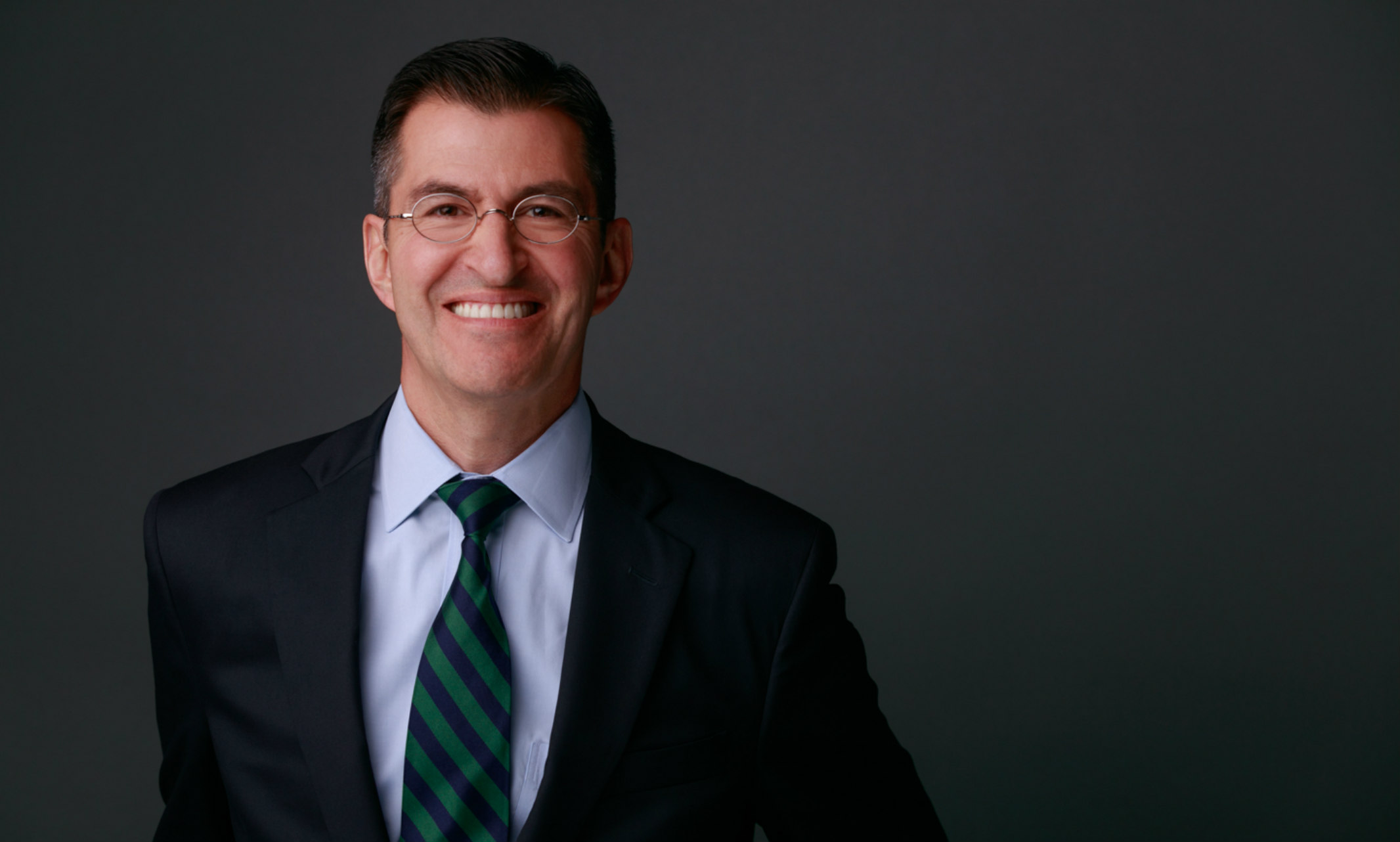
UMKC to honor Alexander Norbash as 2020 Alumnus of the Year
Each year, the UMKC Alumni Association recognizes the achievements of outstanding alumni with an awards celebration. UMKC is honoring Alexander Norbash (M.D. ’86) with its Class of 2020 Alumnus of the Year Award.
An interventional neuroradiologist, Norbash has been instrumental in inventing and implementing new technologies that are less invasive and more effective for treating strokes and brain aneurysms. Neuroradiology is a highly technical specialty that addresses life-and-death matters with techniques requiring high precision and composure.
Norbash serves as chair and professor of the Department of Radiology, associate vice chancellor for Diversity, Equity and Inclusion and adjunct professor of Neurosurgery at the University of California San Diego (UC San Diego).
As one who works on the cutting-edge of developing interventional neuroradiology, how do you see the technology changing and being implemented?
We are resistant to abandon tried and true successful revenue opportunities and risk them in moving to low individual margins where there may be much higher volumes and even greater profitability. Just because we can do a brain MRI in 5 minutes doesn’t mean all practitioners and referring physicians are confident today in the 5-minute scan. I still believe in the high-volume and high-access vision as an inevitability, although it has yet to come to pass. I know my fellow physicians will see the advantages of a more populist and broader health care delivery model. I look forward to that day.
You wear many hats - leader, researcher, educator, mentor and doctor. Is there one area most important to you? Most challenging?
Mentoring is an awesome responsibility and the greatest privilege of my professional life. It is both important and challenging. In such instances, I have the opportunity to live on in others, forge lifetime friendships and help others learn from my mistakes. I believe that is the essence of teaching and professing.
You are the founding chair of the American College of Radiology (ACR) Head Injury Institute (HII). What do you hope to accomplish with this organization?
Many medical disciplines have a spectrum of untapped contributions to make in a multitude of areas and trauma is one example. Working with large groups of practitioners interested in concussion imaging and management, there is facilitation elevation in the quality of care delivered to both individual patients and our broader society. Through collaborations we can understand both the value of concussion imaging and how to disseminate novel discoveries and best practices for the same.
In addition to your roles in radiology at UC San Diego, you serve as associate vice-chancellor for Diversity, Equity and Inclusion. Why is that position important to you?
In order to maximize the potential contributions of an organization, I believe it is important to leverage the commitment and full engagement of every individual within that organization. That is exactly what Inclusion refers to, where every single individual feels appreciated and included, therefore valued, and as such motivated to perform to their highest individual and collective potential. In my opinion, leading to this destination should be one of the highest goals of any manager.
What advice do you have for students who would like to follow in your footsteps?
First, concentrate on forging ties with mentors who believe in you and whom you can believe in. Second, say “yes” as much as possible to expose yourself to the full richness your environment provides. Third, stoke your curiosity and wonder. This will result in you seeing and understanding people, places and things beyond your dreams.
About the Alumni Awards
Join us in honoring Norbash and the other Class of 2020 Awardees in our first-ever virtual celebration at 5 p.m. April 16. Go to umkcalumni.com/alumniawards to register for this free event. If you are unable to attend the event but would like to donate to student scholarships, contributions can be made online.
Meet the rest of the 2020 UMKC Alumni Awardees
Apr 11, 2021
Alison Graettinger weighs-in on volcano
“Because of the position of Dotsero being on the edge of the Colorado Plateau, there’s a possibility for future eruptions, but it’s much lower than in places like the Caribbean, where we know that magma is being made at depth regularly,” Alison Graettinger, assistant professor of geosciences at the University of Missouri-Kansas City, told Denver7. Read more.
Apr 10, 2021
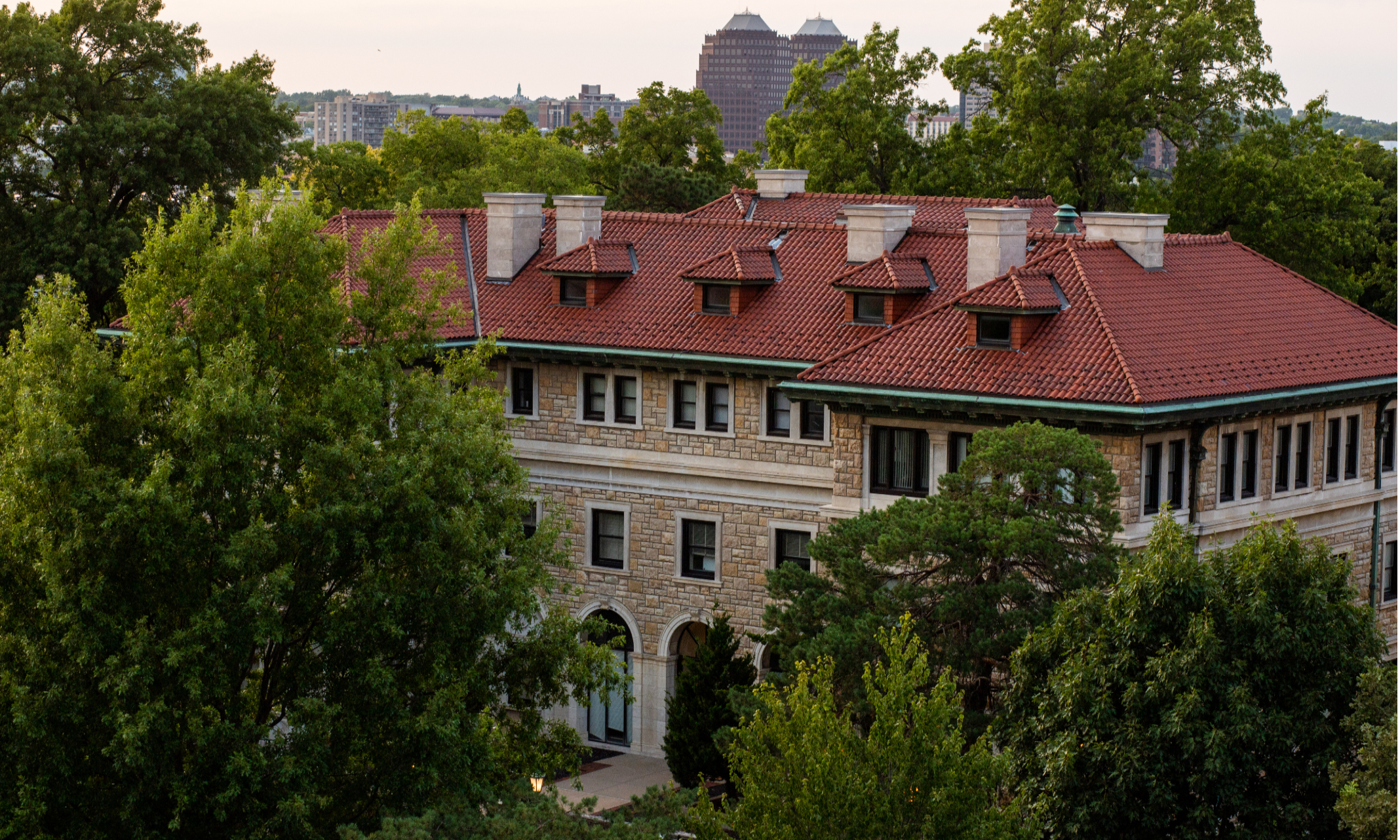
Examples available online all week
Even a pandemic cannot stop undergraduate students from pursuing significant research projects at the University of Missouri-Kansas City.
Starting April 12, students will present their research projects publicly during the University of Missouri System Undergraduate Research Day, along with students from the other three UM System campuses.
This annual event at the Capitol is typically a single day devoted to demonstrate to lawmakers in Jefferson City, as well as the public, the unique opportunities undergraduate students have to participate in faculty-mentored research at the four UM System universities. Due to the pandemic, this year’s event will be held virtually over the course of a week, which gives the students more opportunities to engage lawmakers and other key audiences.
This year, 15 UMKC students are presenting their work, the most of any school in the University of Missouri System.
Those featured research projects this year are:
Increasing STEM Engagement in Underrepresented Minority Groups
Student: Alynah Adams
Faculty mentor: Shin Moteki, assistant professor of chemistry
Adams acknowledges and encourages greater equity within the STEM fields of science, technology, engineering and mathematics to reinforce and support minority students in the Midwestern United States in order to encourage economic growth. These students face barriers that range from a general lack of representation and mentorship, unequal opportunity, limited perception of potential career paths and disproportionate access to materials, all the way to the perpetual biases and stereotyping that begins early and continues on throughout a minority student’s career. The research emphasizes the steps that can be taken to mitigate these barriers and encourage Missouri students from a variety of backgrounds to engage in STEM higher education.
Adams is studying biology.
Development of Implementation of Physical Activity and Nutrition Interventions for Adolescent Youth
Student: Maya Baughn
Faculty mentors: Amanda Grimes and Joseph Lightner, assistant professors of nursing and health studies
This study aims to provide better implementation of physical activity and nutrition interventions in order to positively increase the overall health status for all adolescent youth with mindfulness toward underserved female youth. According to the Center for Disease Control and Prevention, in 2019 there was a 18.5% prevalence for obesity in individuals aged 2-19. One possible solution for reducing the occurrence of chronic health issues like obesity is physical activity. Kansas City, Missouri was selected by the Department of Health and Human Services as one of eighteen sites to deliver a physical activity and nutrition intervention to adolescents. Move More, Get More (formally known as Youth Engagement in Sports) is an initiative that targets students in grades 6-8 who attend select Kansas City public middle schools.
Baughn is studying health sciences.
Smart Catalysts – Green and Sustainable Synthetic Approach Mimicking Living Cells
Student: Ashley Cole
Faculty mentor: Shin Moteki, assistant professor of chemistry
Chemical manufacturing is one of the largest industries in Missouri. Cole’s research is dedicated to green/sustainable production, with a product that will be highly competitive in price through a reduction in manufacturing costs.
Catalysis is a process that accelerates chemical reactions which would otherwise be extremely slow. Enzymes are biological catalysts which transform many materials (food) into essential products critical for sustaining life. Outside of biological systems, catalytic processes are involved in the industrial chemical processing of over 80% of all manufactured products. The purpose of this research is to design and prepare artificial enzymes or “smart catalysts,” which are applicable toward one-pot multi-step reactions that mimic biological systems.
Cole is studying biology.
Predator Avoidance Behavior of Dubia Cockroaches
Student: Sahla Esam
Faculty mentor: Rachel Allen, assistant teaching professor of biology
This study focuses on observing and analyzing the different behavioral patterns Dubia cockroaches use to avoid potential predation. There is considerable variation in terms of habitats occupied by insect groups and how they avoid detection by predators in those locations including camouflage or taking cover. Because of the close phylogenetic relationship between the Dubia cockroach (one of the most preferred feeder insect options available in Missouri) and the German cockroach (which is the most abundant domestic pest cockroach in Missouri) it may be possible to extend the reach of this study to find ways to dissuade domestic infestations of this widespread household pest.
Esam is studying biology.
Promoting Better Sleep: Studying Eye Physiology at the Cellular Level in Fruit Flies
Students: Connor Flathers and Anthony Reddick
Faculty mentor: Jeffrey Price, professor of biology
Flather’s and Reddick’s research on mechanisms affecting circadian rhythms will assist in the understanding of sleep-related disorders including insomnia, narcolepsy and Alzheimer’s disease. The circadian rhythm, which is produced by an internal biological clock and drives the sleep/wake cycle as well as changes in eye physiology, is driven by a nuclear accumulation of several proteins in the eyes. Understanding the circadian rhythm can lead to the development of treatments for these disorders, as well as mechanisms for changes in eye physiology.
Flathers is studying biology. Reddick is a chemistry major.
Comparisons of Support Among K-12 Music Teachers in Missouri and Kansas
Student: Jacob Furry
Faculty mentor: Lani Hamilton, assistant professor of music education
The purpose of this study is to examine correlations between various personal/situational factors and music teachers’ perceptions of support received from administration, colleagues and students’ parents. This descriptive study will help us better understand teachers’ perceptions of the music education environment in rural, urban and suburban school locations as well as perceptions held by participants located across the Missouri/Kansas state line. Furry developed a survey for music teachers in the states of Missouri and Kansas, inquiring about participants’ demographic information, educational experiences, teaching history, future teaching plans and perceptions of support.
Furry is studying music education.
Internet of Things (IoT) and Public Space: The Case of ShotSpotter
Student: Rachel Moreno
Faculty mentor: Shannon Jackson, associate professor of anthropology
The purpose of the Smart City is to help public officials and innovators respond to the needs of residents more efficiently and effectively by using Internet of Things (IoT) to gather data about user behavior and the urban environment. The belief is that devices and more automatic data collection will create a safer and more efficient city. Moreno’s research focuses on ShotSpotter (SST), an IoT gunshot detection system that uses acoustic sensors to locate and determine gunfire. ShotSpotter is one of many publicly deployed systems that is privately owned. Its integration with public infrastructure further blurs the boundaries separating public and private decision-making.
Moreno is studying sociology and history.
A Knowledge Graph for Managing and Analyzing Spanish American Notary Records
Students: Ryan Rowland and Adam Sisk
Faculty mentor: Viviana Grieco, associate professor of history
Rowland and Sisk’s research follows the changes in modern Spanish spelling and phonetics to show that modifications pioneered by prominent Spanish writers and poets transferred to the notarial scripts and focuses on how public notaries and the deeds they drafted promoted the expansion of trade and credit in seventeenth century Buenos Aires beyond the boundaries of family networks. Since advances in deep learning are transferrable to other fields, this software could be used in the management of documentary collections available in Missouri.
Rowland is studying history and Spanish. Sisk is a Spanish major.
The Intercalation of Cancer Drug Doxorubicin in Various DNA Sequences
Student: Shanya San Namiq
Faculty mentor: Wai-Yim Ching, professor of physics and astronomy
Doxorubicin is a cancer drug that treats a wide range of cancers including leukemia, lymphoma and cancers in internal organs, tissues and skins. This drug damages the cancerous cells and prevents them from growing and reproducing. This research project focuses on studying different DNA sequences that would generate the highest yield for the insertion of doxorubicin. This is determined by analyzing chemical and physical properties of the cancer drug incorporated into the various studied base pairs in the DNA.
San Namiq is studying biology.
Protective Factors and Their Relationship with Attachment in Preschoolers
Student: Kaia Schott
Faculty mentor: Erin Hambrick, professor of psychology
Attachment in the context of child development is defined as the emotional bond between a child and their parent or caregiving figure. Adverse experiences, such as a lack of consistency in parenting, can affect attachment because they may influence the child’s perception that caregivers are consistently available to provide a safe base from which they can explore their world. This can negatively affect regulation, adaptability, and resilience. This project will investigate factors that may have protected children who experienced adversity from experiencing low attachment.
Schott is studying psychology and sociology.
Cool Roofs’ Potential to Mitigate Heat-Induced Health Risks in the Kansas City Metro Area
Student: Shreya Suri
Faculty mentor: Fengpeng Sun, assistant professor of earth and environmental sciences
An urban heat island (UHI) refers to an urban area that is significantly warmer than surrounding rural and suburban regions due to human activity, sparse vegetation, and the use of heat-retaining materials in infrastructure. This increase in temperature is associated with an increased risk of heat stress and heat-related illness, such as heat stroke. A potential solution to mitigate the UHI effect in urban areas is the implementation of cool roofs, which absorb less heat and reflect a greater percentage of solar radiation compared to traditional roofs due to their reflective color and/or material. In addition to reducing local air temperatures, cool roofs can improve indoor comfort, reduce energy costs associated with air conditioning, and extend roof life due to decreased heat absorption.
Suri is studying biology and environmental science.
Real-time Prediction of Water Quality in Kansas City Urban Lakes
Student: Grant Verhulst
Faculty mentor: Jujung Lee, professor of geosciences
The expense of traditional water quality monitoring systems has limited community accessibility, giving rise to public health concerns about harmful algal blooms. Availability of reliable, affordable and real-time water quality data is not an option for most communities due to technical and financial limitations. The purpose of this project is to develop a cost-effective approach to monitoring the water quality of lakes.
Verhulst is studying environmental science.
Keeping it Together: Unlocking the Causes of Infertility and Genetic Disorders
Student: Emily Wesley
Faculty mentors: Scott Hawley, adjunct professor of biology, and Katie Billmyre
Meiosis is a complex process that most organisms use to generate germ cells (eggs and sperm) for sexual reproduction. Successful meiosis requires the correct amount of genetic material (i.e. chromosomes) to be packaged in each egg or sperm. A failure in this process results in aneuploidy (the incorrect number of chromosomes), which can cause genetic disorders such as Down syndrome, Klinefelter syndrome, infertility or miscarriage. Wesley used the fruit fly to study multiple aspects of the synaptonemal complex.
Wesley is studying biology.
For more information on Undergraduate Research Day, visit: www.umsystem.edu/ums/red/undergraduate_research_day
Apr 09, 2021
Managed care publication writes about John A Spertus research
Study author John A Spertus, MD, MPH, Lauer Missouri Endowed Chair and professor of medicine, University of Missouri-Kansas City, was on a panel to analyze what the trend of crowdfunding says about health care costs and affordability; what message payers can take from it; and what solutions could help decrease the need for online fundraising. Read the article.
Apr 09, 2021
Media covers Senator Blunt's tours School of Medicine program
Senator Roy Blunt visited medical students at Mosaic Life Care in St. Joseph Thursday. The Missouri Republican helped secure grant funding that got the UMKC School of Medicine program off the ground. This was covered by KQ2 and KFEQ.
Apr 09, 2021
Dos Mundos highlights research involving Janette Berkley-Patton
In 2018, a team of researchers at St. Luke’s and the University of Missouri-Kansas City started a project to raise awareness about PAD. The team, comprised of Kim Smolderen, formerly of St. Luke’s/UMKC, now at Yale University; Christina Pacheco, St. Luke’s Mid America Heart Institute; and Janette Berkley-Patton, UMKC, resulted in the creation of an online platform to share their findings with newly diagnosed people. Read more.
Apr 09, 2021
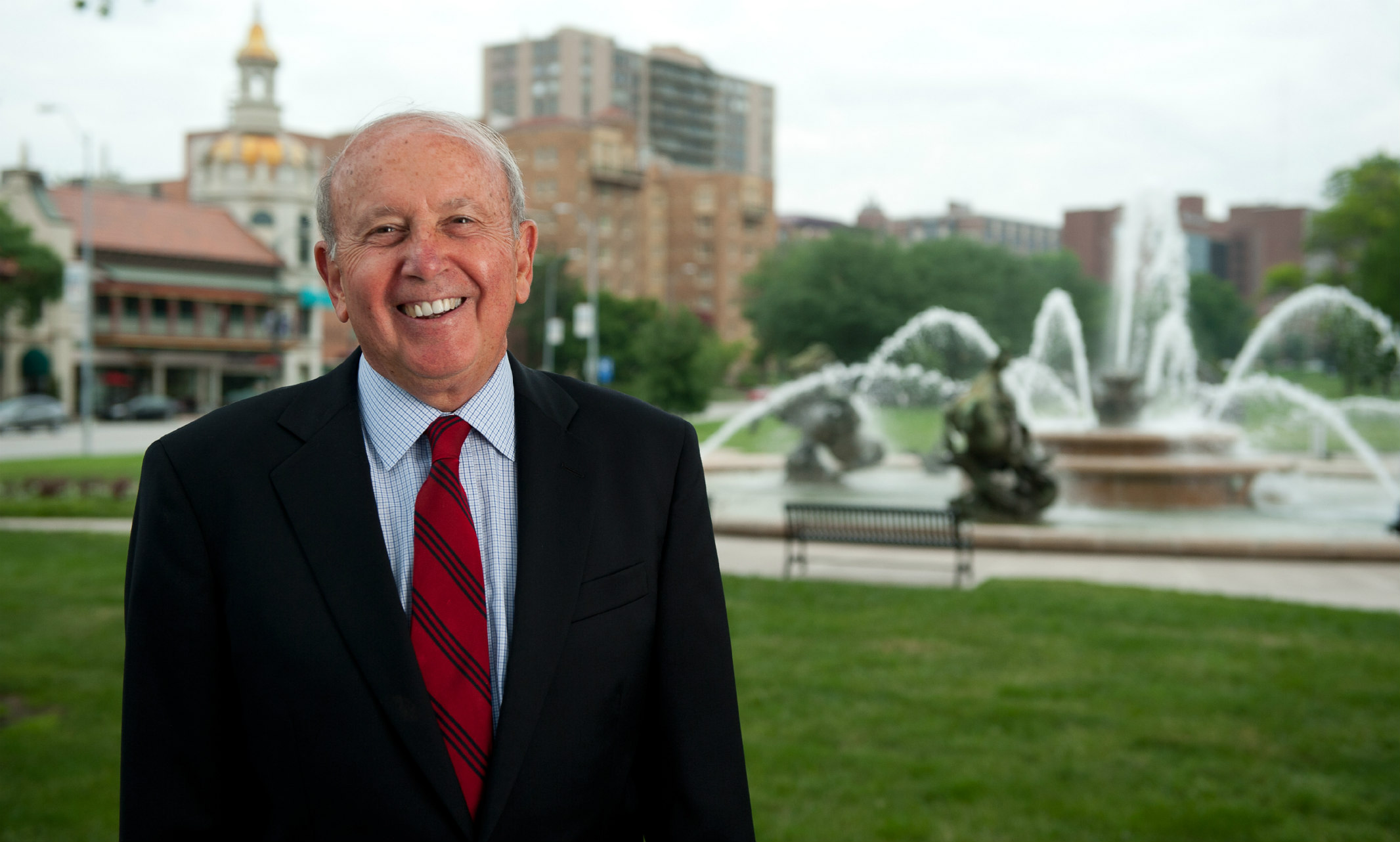
Trustee’s commitment to UMKC is enduring and multifaceted
The University of Missouri-Kansas City is honoring Jim Polsinelli (J.D. ’67, H.D. ’13) with its Class of 2020 Bill French Alumni Service Award for his dedication to the university.
Jim Polsinelli(J.D. ’67, H.D. ’13)
Giving back to the Kansas City community is key to University of Missouri-Kansas City Trustee Jim Polsinelli’s philosophy. Polsinelli leads by example. An active member of the UMKC community, Polsinelli is past chairman of the UMKC Board of Trustees, a member and past president of the Law Foundation board and former board member of the UMKC Foundation. He has served as past co-chair of the 2018 UMKC Alumni Awards, has been a tireless advocate for the university in Jefferson City and graciously hosts events for students at Polsinelli, the law firm he co-founded in 1972.
“It is hard to imagine how anyone who has built the second largest law firm in Kansas City could find the time and tremendous energy he has displayed in several capacities supporting UMKC,” said Leo Morton, chancellor emeritus at UMKC.
A dedicated community volunteer even before his retirement in 2018, he has encouraged community involvement by instilling a giving program for his associates at Polsinelli, which reflects his commitment to sharing success. Polsinelli and the firm’s associates have been consistent supporters of UMKC, donating generously to the UMKC Law School, The Kansas City Repertory Theatre, the Henry W. Bloch School of Management, the Entrepreneur of the Year program, the UMKC Conservatory and KCUR.
Join us in honoring Jim Polsinelli and the other Class of 2020 Awardees in our first-ever virtual celebration at 5 p.m. April 16. Go to umkcalumni.com/alumniawards to register for this free event. If you are unable to attend the event but would like to donate to student scholarships, contributions can be made online.
Meet the rest of the 2020 UMKC Alumni Awardees
Apr 08, 2021
KSHB interviews Bill Black, associate professor of economics and law
The fact voters are willing to tax themselves during a pandemic is a sign the economy is rebounding, according to Bill Black, an associate professor of economics and law at the University of Missouri-Kansas City. Read the article and watch the newscast.
Apr 08, 2021
St. Joseph newspaper covers Sen. Blunt's visit to UMKC School of Medicine site
Sen. Roy Blunt, R-Mo., made a trip Thursday to Mosaic Life Care, to mark the expansion of the University of Missouri-Kansas City School of Medicine’s program in St. Joseph. Read the full article.
Apr 08, 2021
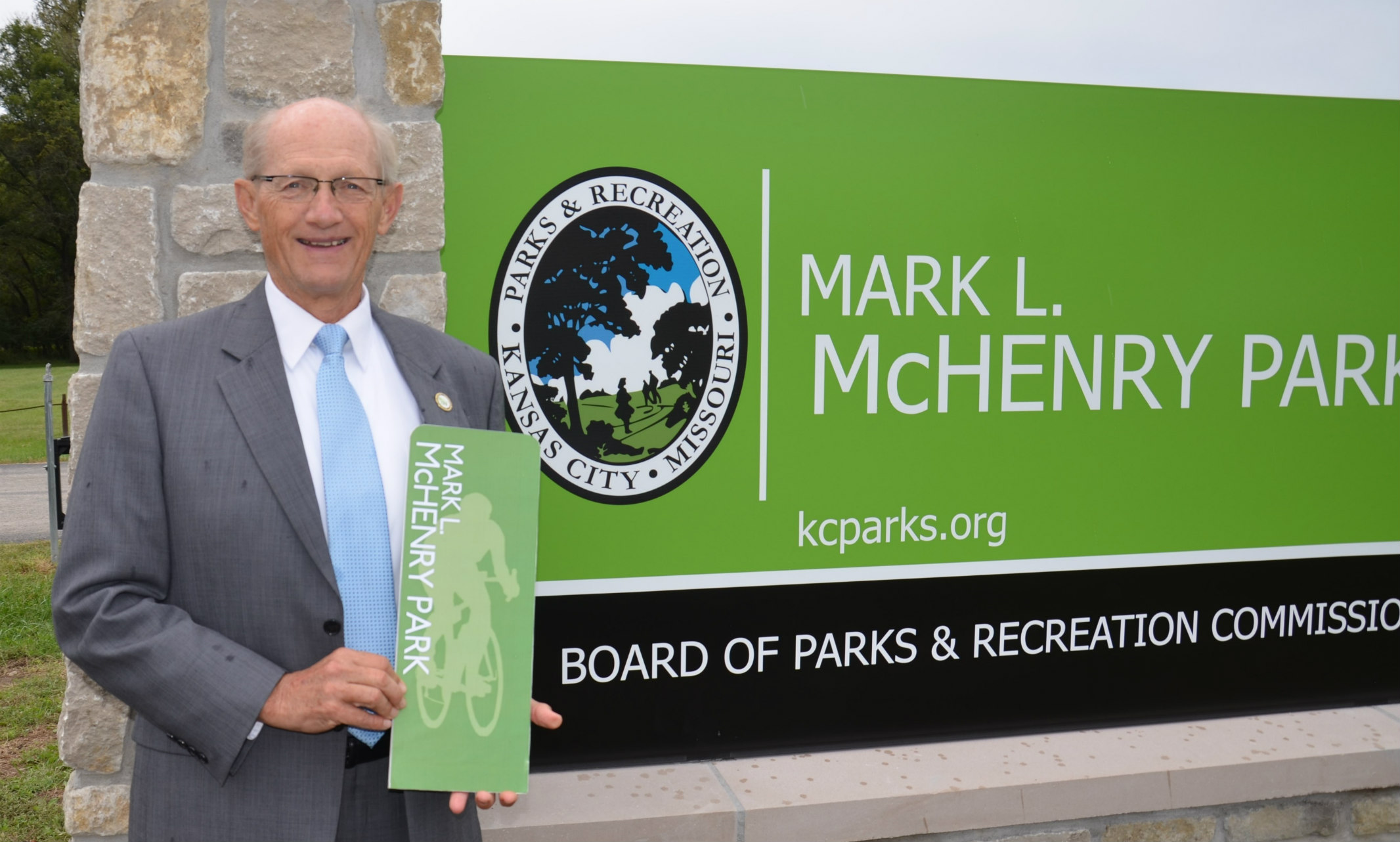
UMKC honors Mark McHenry with Alumni Spotlight Award
Each year, the UMKC Alumni Association recognizes the achievements of outstanding alumni with an awards celebration. UMKC is honoring Mark McHenry (M.P..A. '89) with its Class of 2020 Alumni Spotlight Award. The Spotlight Award recognizes an alumnus whose accomplishments, leadership and public service have caused regional and national attention to be focused on the university and the metropolitan area.
Mark McHenry(M.P..A. '89)
Mark McHenry retired as director of the City of Kansas City, Missouri’s Parks and Recreation Department at the end of 2018 but the accomplishments from his 44-year career there — including adding 34 parks, six community centers and doubling the size of the Kansas City Zoo — will endure for generations to come.
McHenry’s leadership was evident not only in the region, but on a national scale as well. A member of the National Recreation and Parks Association since 1984, he was inducted into the American Academy for Park and Recreation Administration in 2004 and served as president of the board in 2018. A perennial ambassador for UMKC, McHenry has lent his expertise to the university as a member of the Department of Public Affairs Advisory Council and helping to develop the executive master of public administration program. He recently joined landscape architecture and planning design firm Ochsner Hare & Hare, the Olsson Studio. He was also appointed to the Missouri Conservation Commission by Gov. Mike Parson for a six-year term.
Please discuss a Parks and Recreation project or two that stands out in your mind as particularly rewarding.
In the early 1990s, I was given the opportunity to lead a multi-discipline team to provide a complete renovation of the Kansas City Zoo, the first of its kind in the zoo’s history. Not all of the community was supportive of the changes we were making, which presented some unique challenges; this required several meetings and negotiations with key stakeholders.
Another high-profile public project was my role as project executive for the renovation and expansion of the Liberty Memorial in Penn Valley Park. Through a large team effort, we identified funds from federal, state, local and private resources. The next step was to design a very complicated restoration project and see it through the equally complicated construction phase. Today the Memorial, now known as the National World War I Museum at Liberty Memorial, stands as one of the premier military museums in the world.
In an interview with the Missouri Times about your appointment to the Missouri Conservation Commission you mentioned being a “voice for urban conservation.” What do you hope to accomplish during your time on the commission? How will you help other urban areas in Missouri embrace nature and conservation?
One of the strategic goals of the department is to connect people with nature, which is easier to accomplish in the rural areas of the state because of proximity. While that is more challenging in the urban areas, I believe through expanded programs, services and facilities this challenge can be overcome.
How did UMKC prepare you for/contribute to your success?
UMKC provided me with a great learning laboratory while working for the city and attending classes. It provided me with class assignments that helped resolve real city problems.
About the Alumni Awards
Join us in honoring McHenry and the other Class of 2020 Awardees in our first-ever virtual celebration at 5 p.m. April 16. Go to umkcalumni.com/alumniawards to register for this free event. If you are unable to attend the event but would like to donate to student scholarships, contributions can be made online.
Meet the rest of the 2020 UMKC Alumni Awardees
Apr 07, 2021
Flatland interviews UMKC associate professor of pediatrics
“The vaccine is not going to fix mental health,” said Amy Beck, a licensed psychologist at Children’s Mercy Kansas City and an associate professor of pediatrics with the University of Missouri-Kansas City School of Medicine. Read the article.
Apr 07, 2021
Missouri Business Alert reports on the federal funding and local match
The University of Missouri-Kansas City Innovation Center, in partnership with KC Digital Drive, will use a $750,000 federal contribution and a $239,000 local match to support the Comeback KC Ventures project. The initiative will aim to identify COVID-related community needs and come up with technology-based solutions, according to the EDA. Read the article.
Apr 07, 2021
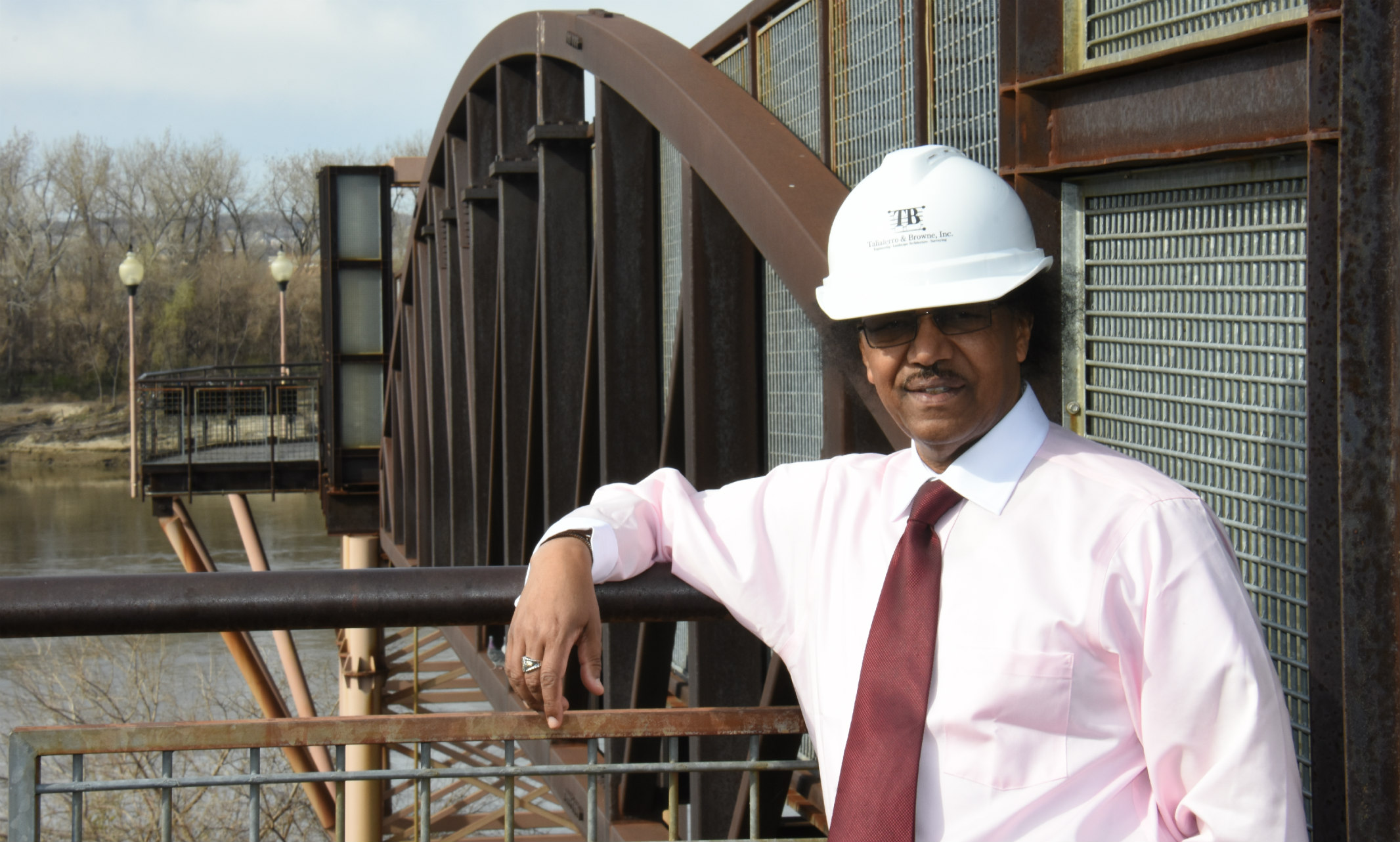
Andebrhan Honored for Defying the Odds
The UMKC Alumni Association is honoring Hagos Andebrhan (B.S.C.E. ’78) with the Class of 2020 Defying the Odds Award. Determined to create a better life for himself and his family, Andebrhan emigrated from Eritrea in 1970.
From a one-room household in Eritrea, a country in eastern Africa, to CEO of Taliaferro & Browne, a lead civil engineering firm in Kansas City, Hagos Andebrhan’s hard work and dedication have earned him success in the United States. The youngest of five children, Andebrhan came to the U.S. in 1970 to join an advanced airline pilot training program in Kansas City but ended up meeting his mentor and the founder of Taliaferro & Browne, Will Taliaferro, and changing careers.
Hagos Andebrhan(B.S.C.E. ’78)
“After high school, I took an exam and was one of thirty students in the entire nation of Ethiopia to be accepted into the Ethiopian Airline Pilot Training Program,” Andebrhan says. “A career in the airlines was not my dream, but it offered the best opportunity to earn a good salary. My desire to help my family financially was paramount.”
Andebrhan was focused on his education when the forced unification of Eritria with Ethiopia began in 1962.
“I supported the struggle for independence and engaged in student protests,” Andebrhan says. “But I was more focused on my education and was determined to emigrate to the United States to create a better life for me and my family.”
But once Andebrhan moved to the United States in 1970 he could not find work as a pilot because of the number of United States pilots who had returned from the Vietnam War. Andebrhan was undeterred in his commitment to building a life in his new homeland.
“Being a pilot was a means to an end, not a lifelong ambition,” he says. “Also, my wife was not thrilled with the idea.”
Fortunately, Will Taliaferro, who was a partner in Taliaferro & Browne, offered him a job at his engineering firm. Taliaferro became Andebrhan’s mentor.
“Mr. Taliaferro introduced me to the engineering profession and encouraged me to pursue engineering as a career. UMKC had an excellent engineering program and I was able to attend while holding a full-time job.”
While Andebrhan pursued his bachelor’s and master’s degrees, he worked full-time as a draftsman at Taliaferro & Browne, supporting his wife, children and his family in Eritrea. He does not remember this remarkable juggling act as being a burden.
“Necessity is the mother of invention,” he says. “Most importantly, I had the support of a wonderful wife.”
He says UMKC had everything he was looking for in a university.
“UMKC offered a quality education in an urban setting,” he says. “I had inspiring and encouraging professors and friendly and supportive classmates.”
After Will Taliaferro died in 1990, Andebrhan and Leonard Graham, (B.A. ‘74) purchased the company; Andebrhan became CEO in 1992. Under their tenure, the company has been a part of some of Kansas City’s most significant developments including Science City in Union Station, the Kansas City Power and Light District and the new Kansas City Airport terminal.
Despite his remarkable accomplishments, Taliaferro’s advice for a successful life is simple.
“Life is short. Live it a day at a time.”
Join us in honoring Hagos Andebrhan and the other Class of 2020 Awardees in our first-ever virtual celebration at 5 p.m. April 16. Go to umkcalumni.com/alumniawards to register for this free event. If you are unable to attend the event but would like to donate to student scholarships, contributions can be made online.
Apr 06, 2021
Provides graduates a key advantage in the job market
The UMKC Bloch School of Management is the only school in the region offering the STEM (science, technology, engineering and math) designation through its Master of Science in Finance (MSF) degree.
The program responds to the emerging trend of STEM-designated programs focused on applying mathematics and statistics to the finance industry. As Kansas City’s business school, Bloch stays current and agile when it comes to industry trends.
While several of the school’s courses align in this area – financial mathematics, modeling, advanced statistics – its MSF program is becoming even more quantitative-focused in its curriculum.
“We’ve had our eye on this rapidly emerging trend in business schools over the last several years,” said Brian Anderson, PhD, Associate Dean at the Bloch School. “We’re excited to be strengthening our curriculum to best align with changes happening in the financial industry and to strengthen our graduates in a very competitive job market.”
Bloch expects its STEM designation to attract local students as well as students from outside the local area who want to work in Kansas City. But its biggest draw may be international students. The designation, which is based on curriculum guidelines defined by the U.S. Department of Education and certified under the U.S. Department of Homeland Security, extends how long students here on an F-1 student visa can stay and work in the United States after getting their degree. With a STEM degree, their Optional Practical Training (OPT) can continue up to three years.
“This program is very popular among international students,” said Anderson. “We’ve been getting lots of inquiries and students applying. UMKC offers the benefit of completing their education and gaining extended work experience all right here in Kansas City.”
With the new designation, Bloch joins an elite group of business schools offering STEM programs, among them the University of Southern California, MIT, the University of Pennsylvania and University of California-Berkley. The school will start promoting its STEM MSF in fall 2021.
Anderson says Kansas City has a strong financial sector, making it ideal for students who want to work where the jobs are, accelerate their careers and seek opportunities for growth.
“The demand is strong for those with advanced degrees in finance,” he said. “And Bloch’s STEM-designated MSF degree provides the in-demand skills and opportunities needed for their success.”
Apr 05, 2021
KCUR talks to Chancellor Agrawal and Provost Lundgren
UMKC Chancellor Mauli Agrawal and UMKC Provost Jenny Lundgren were guests on Up to Date. They discussed UMKC Forward. More from KCUR.
Apr 05, 2021
Kansas City Business Journal lists local universities on the list
UMKC has ranked programs. Read which programs are included. A subscription may be required.
Apr 02, 2021
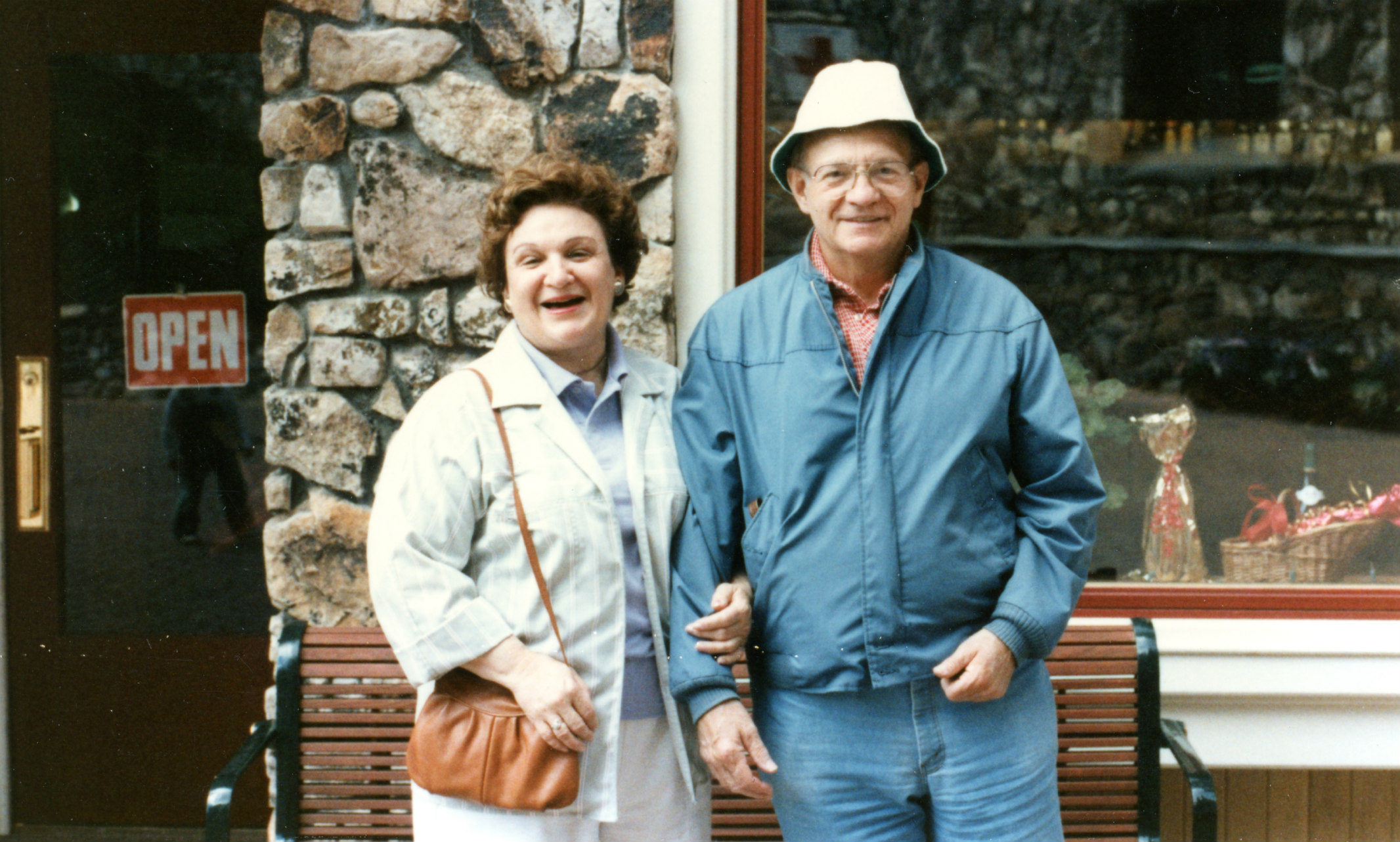
Edelman Family to receive UMKC Legacy Award
Each year, the UMKC Alumni Association recognizes the achievements of outstanding alumni with an awards celebration. UMKC is honoring the Edelman Family with the Class of 2020 Legacy Award.
Doris Edelman
The Edelman Family’s UMKC legacy began when 12-year-old Doris Tager fled Nazi Germany in 1938. Her family traveled to the Netherlands and Cuba before arriving in Kansas City, whose local Jewish community sponsored their voyage. She’d go on to attend Kansas City University (now UMKC) and graduate in 1947 with a bachelor’s degree in Spanish and economics. That same year, Doris met her future husband, William Edelman, a fellow Roo who would graduate in 1954 with a bachelor’s degree in psychology.
Doris had a successful career as a stockbroker and was the first female vice president and partner of B.C. Christopher and Company where she worked for more than 20 years. William served patients in the heart of Kansas City as a family physician for more than 50 years before retiring in 2001.
William Edelman
Their oldest son, Mark (J.D. ’75), founded the Theater League, Inc., a not-for-profit community-based performing arts organization that presented the best of Broadway to Kansas City audiences for 42 years.
Youngest son Ron (J.D. ’82) opened one of the region’s most successful law practices — Edelman and Thompson — with James Thompson in 1994.
Middle son Alan and his wife, Debbie Sosland-Edelman, great supporters of UMKC, also connect with the university through their son Alexander (J.D. ’12). He started his own firm with two other UMKC alumni and was recognized by the National LGBT Bar Association as one of the “40 Best Attorneys Under 40.”
We spoke with Mark, Ron and Alexander about their career paths.
Mark Edelman
Mark Edelman
Not everyone would connect theatre and law degrees. Did you already have a plan for putting your law degree to use in theatre when you began at UMKC?
I hoped to become an entertainment lawyer and volunteered (hung out may be a better description) in New York at an office at the Bar Association of the City of New York that provided services for artists. After graduation, I studied for the NY Bar exam; but I got a job running the Bucks County Playhouse in suburban Philadelphia instead. They were impressed I had a law degree.
Over the course of your career, you met some famous folks. Any encounters that stand out in your memory?
My first presentation in Kansas City—while I was still in law school—involved a student activities-funded presentation of an off-Broadway show called LEMMINGS. After the show, the cast came to my apartment at 44th and Walnut, where my neighbors joined me in welcoming them. Three of the actors there were Chevy Chase, John Belushi and Christopher Guest. The following year, they were all on or writing SNL.
What does leaving a legacy mean to you? How does it feel to be sharing this award with your family?
While my brother Ron and nephew Alex continue to make great strides on behalf of their clients, I am most proud to share this with my folks, who had to deal with prejudice and near poverty to succeed at KCU. My mother and her family escaped Nazi Germany to find their way first to Cuba and then Kansas City. My father faced anti-Semitism in graduate school elsewhere, but found a more welcoming, inclusive environment in Kansas City.
Ron Edelman
Ron Edelman
You’ve been nationally recognized as a top workers’ compensation lawyer. Why is representing personal injury and workers’ compensation cases important to you?
An injury on the job, or an injury caused by the fault of another party, can be financially and emotionally devastating for the victim and their family. To be able to help people in their time of need by making sure that all the bills are [covered], and that they and their family are compensated for their losses, is extremely satisfying.
What advice do you have for students who’d like to follow in your footsteps?
Don’t listen to anyone else’s advice, including mine. That said, “Follow your heart (and your head).”
Alexander Edelman
Alexander Edelman
What is your proudest accomplishment?
My proudest accomplishment is my role in helping build the law firm Edelman, Liesen & Myers, L.L.P. from the ground up. Within just a few years, we were able to build a practice that fights for individual rights, especially in their employment and in public accommodation, and have helped obtain justice for those who have been discriminated against or mistreated. The firm has continued to grow, and we are able to help even more people, and we’ve been able to help shape the law in a way that clarifies and protects the legal rights of individuals.
You were named one of the 40 Best LGBT Attorneys Under 40. How does it feel to have achieved such success before 40?
Receiving the recognition from the National LGBT Bar Association was a huge honor. I am very proud to be able to represent the LGBT community, both as a member of the community and by serving clients from the community. I am extremely lucky to have found partners who are also passionate about standing up for the rights of LGBT people as well as others, and thus to have the opportunity to be able to do this kind of work so early in my career.
How did UMKC contribute to your success?
Most directly, UMKC is where I met my classmates, Sarah Liesen (J.D. ’12) and Katherine Myers (J.D. ’12), who became my law partners, and without whom I could not have had any of the professional success I have achieved. It also provided the solo and small firm incubator, where we got our start.
About the Alumni Awards
Join us in honoring the Edelman Family and the other Class of 2020 Awardees in our first-ever virtual celebration at 5 p.m. April 16. Go to umkcalumni.com/alumniawards to register for this free event. If you are unable to attend the event but would like to donate to student scholarships, contributions can be made online.
Meet the rest of the 2020 UMKC Alumni Awardees
Apr 01, 2021
KSHB, KMBC, MSN report on UMKC Conservatory professor's hearing loss
This story is about Chris Madden, University of Missouri-Kansas City Conservatory assistant professor of piano pedagogy. Read the news coverage:
KSHB
KMBC
MSN
Apr 01, 2021
Blake Eyres is a UMKC School of Dentistry alumnus
Blake Eyres graduated from the UMKC School of Dentistry. This story was covered by Showbiz CheatSheet and ScreenRant.
Apr 01, 2021
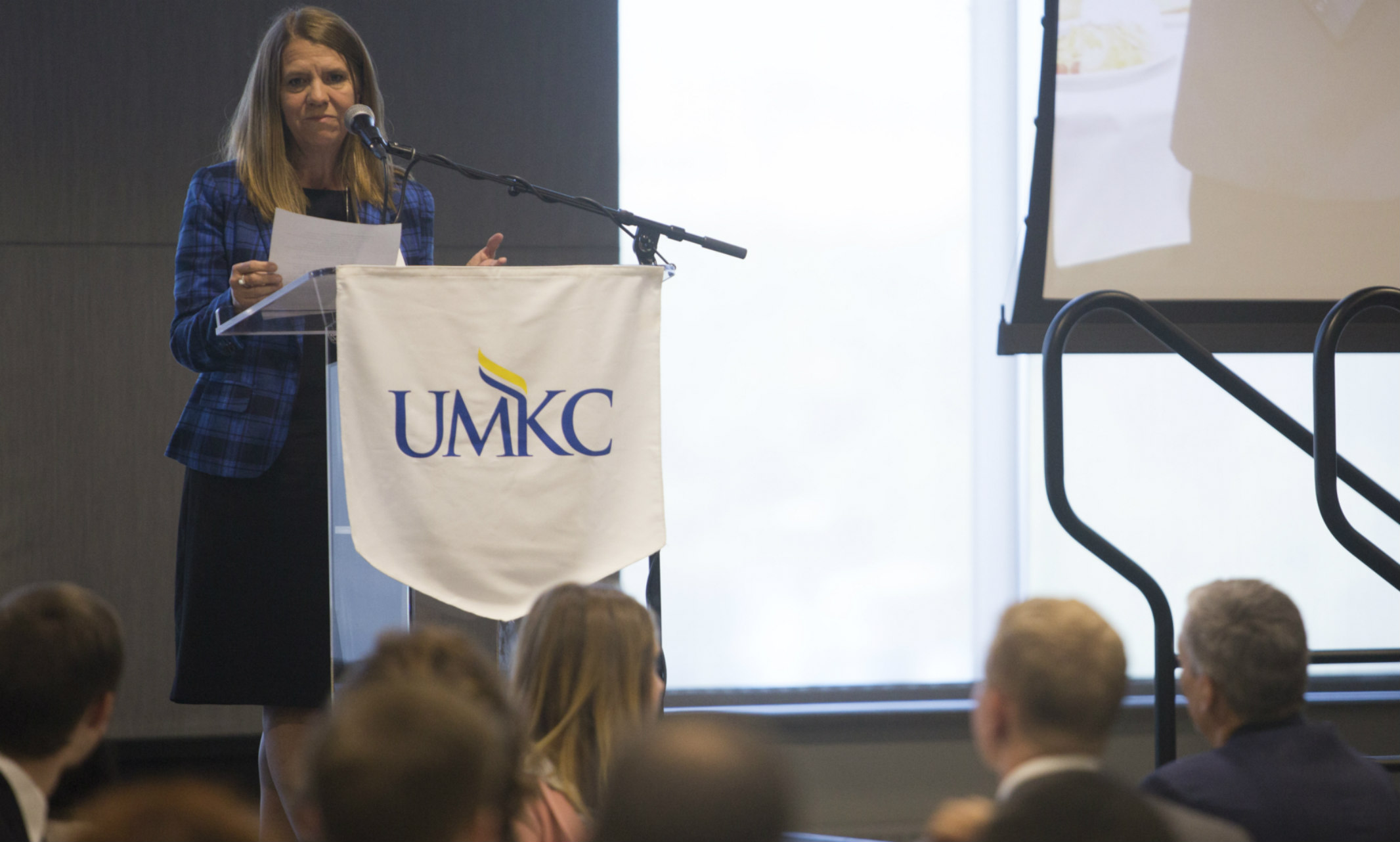
Bonnie Gorman receives School of Computing and Engineering Alumni Achievement Award
Each year, the UMKC Alumni Association recognizes the achievements of outstanding alumni with an awards celebration. UMKC School of Computing and Engineering is honoring Bonnie Gorman (B.S.M.E. ’86), with its Class of 2020 Alumni Achievement Award.
Bonnie Gorman(B.S.M.E. ’86)
Bonnie Gorman serves as director of modernization and innovation for Olin Winchester, an industry leading ammunition manufacturer and current operating contractor of the Lake City Army Ammunition Plant in Independence, Missouri. A natural leader, Gorman has held roles of increasing responsibility at Lake City Army Ammunition Plant, including engineering director and manager of manufacturing, quality, safety and facilities. In 2017, she was awarded the Orbital ATK President’s Award for Execution Excellence for restoring a critical operation after a catastrophic event. A longtime supporter of UMKC, she joined the School of Computing and Engineering Alumni Association board in 2015 and helped recruit new members. She continued this work on behalf of the school’s alumni board, stepping in as board president during a time of need and helping to grow its membership.
What are the challenges and benefits of your field?
The challenges are integrating new technology and continuous improvement efforts into processes (and facilities) that are over 70 years old; identifying and finding time to give engineers assignments that promote growth; and hiring the right engineers that have a passion for their assignments. The benefits are creating the new and different in order to meet business goals; making the manufacturing processes easier on the employees; and experiencing the diversity of opportunities and assignments.
How did UMKC prepare you for/contribute to your success?
While at UMKC, I made some lifetime friends who had a wide variety of backgrounds, talents, intelligence and experience. With them I learned the importance of diversity and the variety of talent that each individual can and does bring. We helped each other with homework, studied for exams and solved life problems. In short, I learned the extreme value of relationships, trust and friendship that I have carried through all aspects of life.
What advice do you have for students who’d like to follow in your footsteps?
Push yourself to learn as much as you can – and vow to never quit learning. Get involved in activities that support your continued learning. Be brave and ask questions, even if nobody else seems to have any. Remember the saying that the only dumb question is the one that does not get asked.
About the Alumni Awards
Join us in honoring Gorman and the other Class of 2020 Awardees in our first-ever virtual celebration at 5 p.m. April 16. Go to umkcalumni.com/alumniawards to register for this free event. If you are unable to attend the event but would like to donate to student scholarships, contributions can be made online.
Meet the rest of the 2020 UMKC Alumni Awardees
Mar 31, 2021
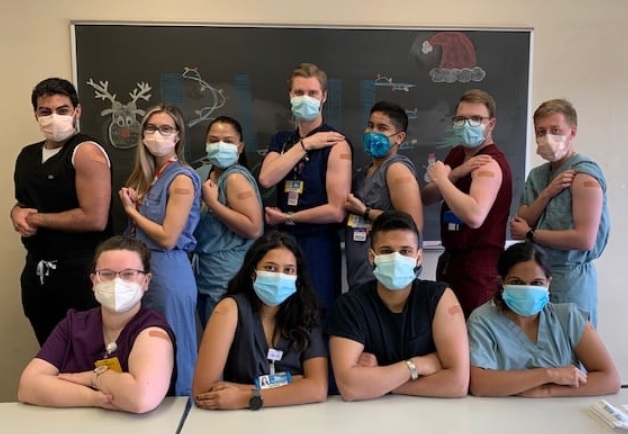
UMKC in top one-third of U.S. schools for family medicine
In only the second year that the UMKC School of Medicine has submitted information for the U.S. News and World Report’s Best Graduate Schools rankings, the school again is positioned among the nation’s best medical schools.
The school jumped 11 places, to 64th, in the ranking of primary care medical schools, and rose five places, to 83rd, for research medical schools.
The school also was recognized in the magazine's new rankings for service in underserved areas, rural medicine and diversity.
The magazine requested data from 191 U.S. schools of medicine or osteopathy and received responses from 129. Not all of those were ranked in every area, however, because of insufficient data or less-than-final accreditation.
“Our mission to train primary care physicians for the state of Missouri was again recognized by USNWR, as was our growing research enterprise,” said Dean Mary Anne Jackson, a 1978 graduate of the UMKC School of Medicine. “Moving into the top one-third of schools for primary care is quite an accomplishment, and the school’s advances in research reflect our commitment to linking patient care outcomes to our research vision.”
Jackson added that the school has seen an increase in the number of research awards and dollars to support efforts in UMKC’s areas of strength such as neurosciences, vision science, maternal fetal health, pediatrics, intervention science, surgical safety and metabolomics.
Both the primary care and research rankings are based on a weighted average of several indicators — some quality assessments by academic peers and residency directors, others objective data such as research funding, faculty-student ratios and student test scores. The primary care rankings incorporate two measures of graduates going into primary care. The research rankings include two measures of research productivity.
For three new category rankings, the school placed 17th in the percentage of graduates practicing in underserved areas; 65th in the percentage of graduates providing direct patient care in rural areas; and 86th in the diversity rankings.
The school recently boosted its emphasis on rural medicine and underserved areas of Missouri by opening a second campus in St. Joseph, and it has been bolstering its diversity and inclusion infrastructure and recruiting.
Mar 30, 2021
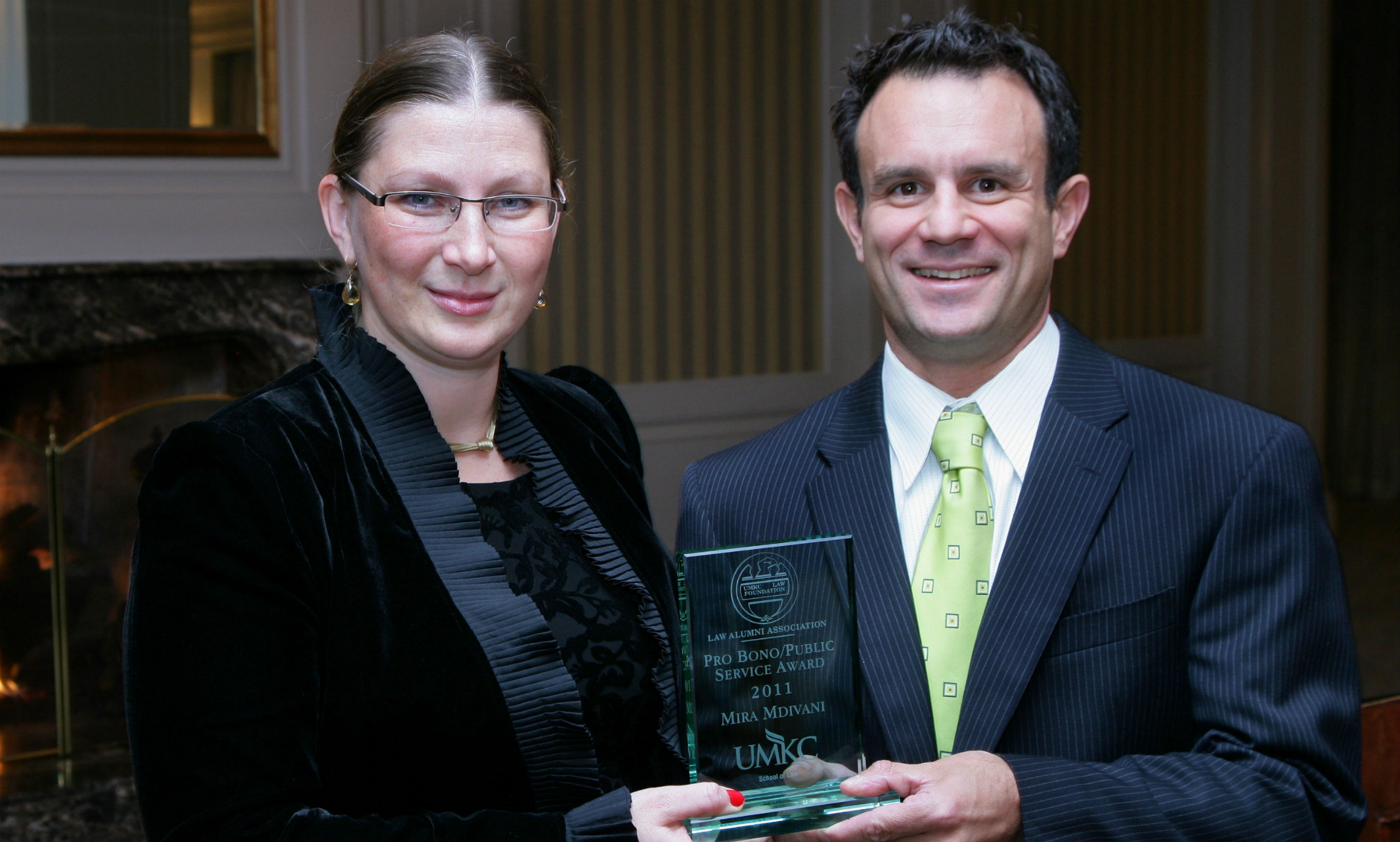
Mira Mdivani to receive the UMKC School of Law Alumni Achievement Award
Each year, the UMKC Alumni Association recognizes the achievements of outstanding alumni with an awards celebration. UMKC is honoring Mira Mdivani (J.D. ’99) with the School of Law Class of 2020 Alumni Achievement Award.
Mira Mdivani (J.D. ’99)
Mira Mdivani is one of the nation’s top corporate immigration attorneys, immediate past President of the Kansas Bar Association and has received numerous honors including for her pro bono work. We recently talked to Mdivani about being an immigration attorney and about her volunteer work.
For 20 years, you’ve provided pro bono services to immigrant women and children escaping abuse and violence. Why is it important to you to help women and children come to America?
My regular area of practice is corporate immigration law including business global mobility and U.S. employer corporate immigration compliance. At the Mdivani Corporate Immigration Law Firm, we provide pro bono services to immigrant women and children who are already in the United States -- the best country in the world -- because our hearts tell us we must. We focus on helping immigrant women and children escaping abuse and violence because they are the most vulnerable segment of our society and we are the best lawyers for the job. We are dedicated to providing the same excellent level of expertise and care to our pro bono clients as our corporate immigration clients. In the U.S., survivors of domestic violence and other violent crimes are treated with dignity and humanity. Our pro bono clients have survived abuse, rape and other violent crimes. They usually are referred to us by our firm’s community partners such as Hope House, New Home and Metropolitan Organization to Counter Sexual Assault.
How does being an immigrant help you in your role practicing corporate immigration law?
There is no civilization and no economic development without migration. Being an immigrant and a businesswoman, I see this very clearly. Bustling economic centers thrive because people from all over the world bring their energy, enthusiasm, expertise and a different point of view to add to the magic mix of economic success and cultural abundance. Also, being an immigrant, I take nothing for granted. As a first-generation U.S. citizen, I love my adopted country, the United States of America, and work hard for my country, state, city and community to thrive.
How did you become involved with CASA (Court Appointed Special Advocates)? What is the goal of the organization?
Friends asking friends! This is one of the most important boards I serve on. CASA provides a very important service to our community. CASA volunteers advocate for the best interests of abused/neglected children removed from their homes for their safety. With the support of the nonprofit’s staff, CASA volunteers work to provide critical information to judges, helping them make the best possible decisions regarding where the children should live and what medical, therapeutic and educational services they need. Children who have a CASA volunteer are far less likely to be re-abused and far more likely to find a safe permanent home.
You serve as an adjunct professor for the Law School, a member of the Law Alumni Association Board and Law Foundation Board of Trustees. Why is it important to you to stay involved at UMKC?
UMKC is my alma mater. I am deeply grateful to the UMKC School of Law, my professors and the deans for the excellent education I received and for enabling me to lead a happy, meaningful life. I love being a lawyer. I will continue to give back to my law school and to vigorously support the school, its students and alumni.
About the Alumni Awards
Join us in honoring Mdivani and the other Class of 2020 Awardees in our first-ever virtual celebration at 5 p.m. April 16. Go to umkcalumni.com/alumniawards to register for this free event. If you are unable to attend the event but would like to donate to student scholarships, contributions can be made online.
Meet the rest of the 2020 UMKC Alumni Awardees
Mar 30, 2021
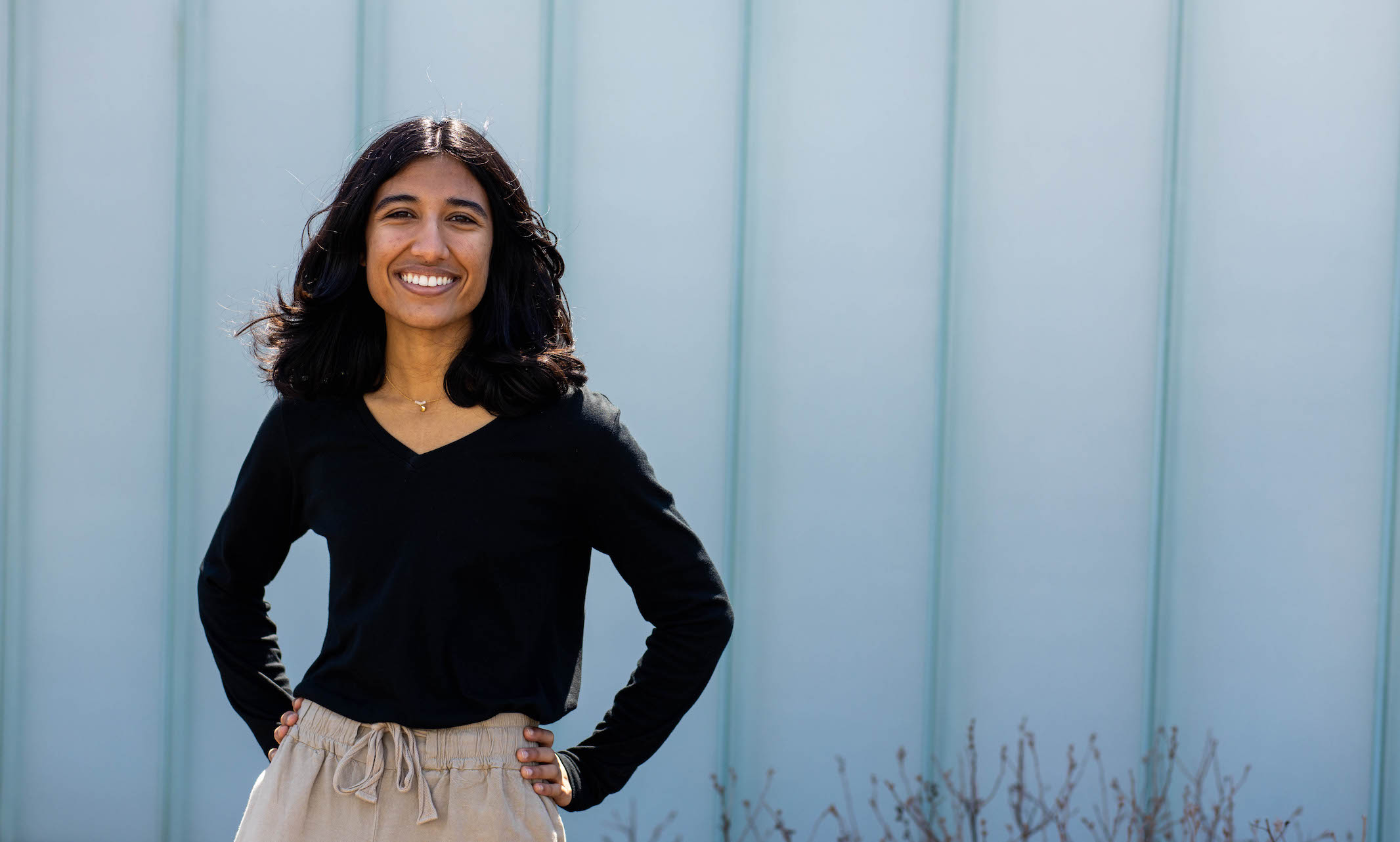
Vice President Kamala Harris congratulates Niki Joshi via Zoom
Niki Joshi received the 2021 Frederick Douglass Global Fellowship, a competitive award for a diverse group of student leaders to attend a four-week summer study abroad program focused on leadership, intercultural communication and social justice. Joshi will study in Ireland this summer with 13 other fellows from across the United States.
Joshi, a sophomore history and English student as well as a UMKC Trustees' Scholar, was hopeful that she’d receive the scholarship, but she knew the selection process was highly competitive.
“I knew hundreds of other intelligent and accomplished students were applying and that the competition would be stiff,” she says. “So, receiving the congratulatory phone call was an unexpected and wonderful surprise. I still don’t think the news has really sunk in.”
Joshi met the other fellows in her cohort in a congratulatory Zoom meeting with Vice President Kamala Harris, Ambassador Daniel Mullhall, Taoiseach Micheal Martin and Nettie Washington Douglass, chairwoman and co-founder of Frederick Douglass Family Initiatives, Frederick Douglass’s great-great-granddaughter and great-granddaughter of Booker T. Washington.
“Vice President Harris and Taoiseach Martin were so kind, genuine, supportive and encouraging,” Joshi says. “I left the meeting feeling like I could do anything.”
She was grateful, too, to have the time to hear Nettie Washington Douglass speak about Frederick Douglass’s time in Ireland.
“It’s fitting that this diverse group of young people will have the opportunity to develop their leadership skills in a place so special to Frederick Douglass,” Douglass said. “The welcome and respect with which Frederick was greeted across his tour of Ireland affected him profoundly. I can think of no better place for future American leaders to gain a global perspective and prepare to be agents of change.”
“Vice President Harris and Taoiseach Martin were so kind, genuine, supportive, and encouraging. I left the meeting feeling like I could do anything.” – Niki Joshi
“It was an incredible opportunity to learn more about the emotional significance and impact that Douglass’s time in Ireland had on his personal development and activism,” Joshi says. “I’m deeply humbled and honored to have this chance to follow his journey and walk in his footsteps.”
Joshi had planned to study abroad in Scotland with professors and students from the Honors College last summer, but her plans were canceled due to the COVID-19 pandemic. While she took the cancellation in stride, she was aware of what she was missing.
“I think studying abroad grants a greater sense of clarity and independence,” Joshi says. “But most importantly, I think the experience allows students to test their personal limits by learning how to navigate social and cultural divides through exposure to different languages, values, practices, or traditions. It allows students to return with new knowledge and experiences that prepare them for an increasingly globalized world.”
“UMKC’s International Affairs team was delighted to find out one of our students received this prestigious, competitive honor,” says Kate Wozniak, assistant director of UMKC study abroad and exchange. “Niki was chosen from over 500 stellar applicants. The fact that she will be part of the fifth cohort of Frederick Douglass Global Fellows is astounding.”
Wozniak believes the program will be intense and transformational for Joshi.
“The four-week summer fellowship program in Dublin will focus on leadership, intercultural communication and social justice,” she says. “We fully expect Niki to return as an even stronger advocate for students of color as well as for international education.”
During the announcement Vice President Harris shared her perspective on one of the values of the experience of studying abroad.
“Like Frederick Douglass in Ireland, you can come as you are and you can leave who you aspire to be.”
Joshi’s expectations for the experience are clear.
“I aspire to be someone who feels comfortable with the unknown and wholly self-assured despite not knowing what will come next.”
Mar 30, 2021
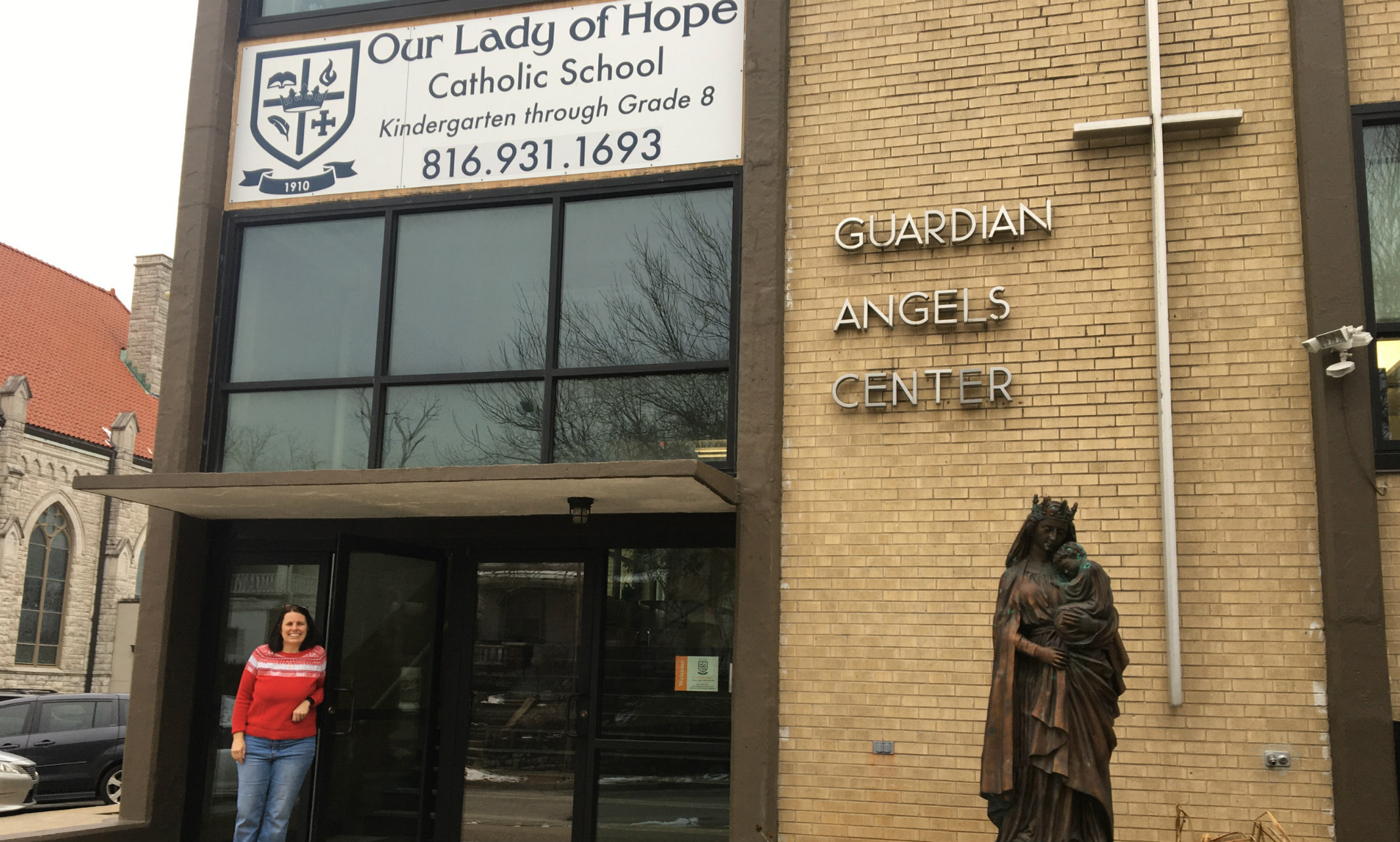
UMKC School of Education selects Mary Delac to receive Alumni Award
Each year, the UMKC Alumni Association recognizes the achievements of outstanding alumni with an awards celebration. UMKC is honoring Mary Delac (M.A. '98) with its Class of 2020 Alumni Achievement Award.
Mary Delac (M.A. '98)
First as a teacher and now as a principal, Mary Delac has been a generous, kind and dedicated supporter of her students for more than 20 years. Today, Delac serves as principal of Our Lady of Hope, a kindergarten through eighth-grade school in Kansas City, Missouri. Going above and beyond her role as principal, Delac has helped some of her students by providing basic necessities in order to succeed. She often spends her spare time attending concerts and sporting events to support her school’s students.
Why is it important to you to ensure that students have the items they need at home, too?
Students cannot truly thrive in the classroom unless their basic needs for survival are being met. Educating the whole child means when they are hungry, you feed them. If a student has a toothache and no dental insurance, we connect them to Seton Center. If they need a uniform shirt, we find them one. These are my kids.
Where does your passion for helping children and families stem from?
My passion stems from my belief in the scripture verse from Luke 12:48, “To whom much has been given, much is required.” I was blessed to grow up with a lot of love and positive support from my family and mentors. I am passionate that every student feels important and supported in our school.
What legacy do you hope to leave behind with the students you’ve taught?
I hope my legacy will be that my students never, ever give up on their dreams. That my students remember that past events or mistakes never determine their future. As good as they are, they can always get better.
How did UMKC prepare you for/contribute to your success?
I feel UMKC has always been a leader in urban education. I was very fortunate to be part of some of the first cohort groups that were specifically geared to urban schools’ needs. My experience at UMKC formed me as an urban principal and empowered me to always try and look outside the box for ways for my students to succeed. The one great lesson that has stayed with me and influenced the way I run my school came in a question posed by the great professor and educator, Dr. Eugene Eubanks, “Who does the school belong to?” My answer is the school belongs to the students. Even though it has now been 22 years since that class, I still think of that when I make decisions on policies and procedures. I will always advocate for the needs of my students before the needs of adults in the building.
What advice do you have for students who’d like to follow in your footsteps?
A principal’s job is to take care of people not paper. You have to be relational. You have to be all in because sometimes the job is lonely and overwhelming. Always keep your focus on the students, your mission and stay positive. If you can do that, even when it’s hard, you will not only survive but thrive and so will everyone around you.
About the Alumni Awards
Join us in honoring Delac and the other Class of 2020 Awardees in our first-ever virtual celebration at 5 p.m. April 16. Go to umkcalumni.com/alumniawards to register for this free event. If you are unable to attend the event but would like to donate to student scholarships, contributions can be made online.
Meet the rest of the 2020 UMKC Alumni Awardees
Mar 29, 2021
Diane Mutti Burke offers historical insight for local media
Diane Mutti Burke, chair of the UMKC History Department, said research she and doctoral candidate Deborah Keating conducted makes her confident the story of a Black slave killing himself was the likely origin of the name.
Burke has been interviewed by:
NBC News
The Kansas City Star
KSNT
New Haven Register
Mar 28, 2021
The UMKC School of Medicine partnered with Mosaic Life Care and saw an inaugural class this January of 20 students
The University of Missouri Kansas City School of Medicine has expanded to St. Joseph and the local extension has plans to grow. Read the article.
Mar 26, 2021
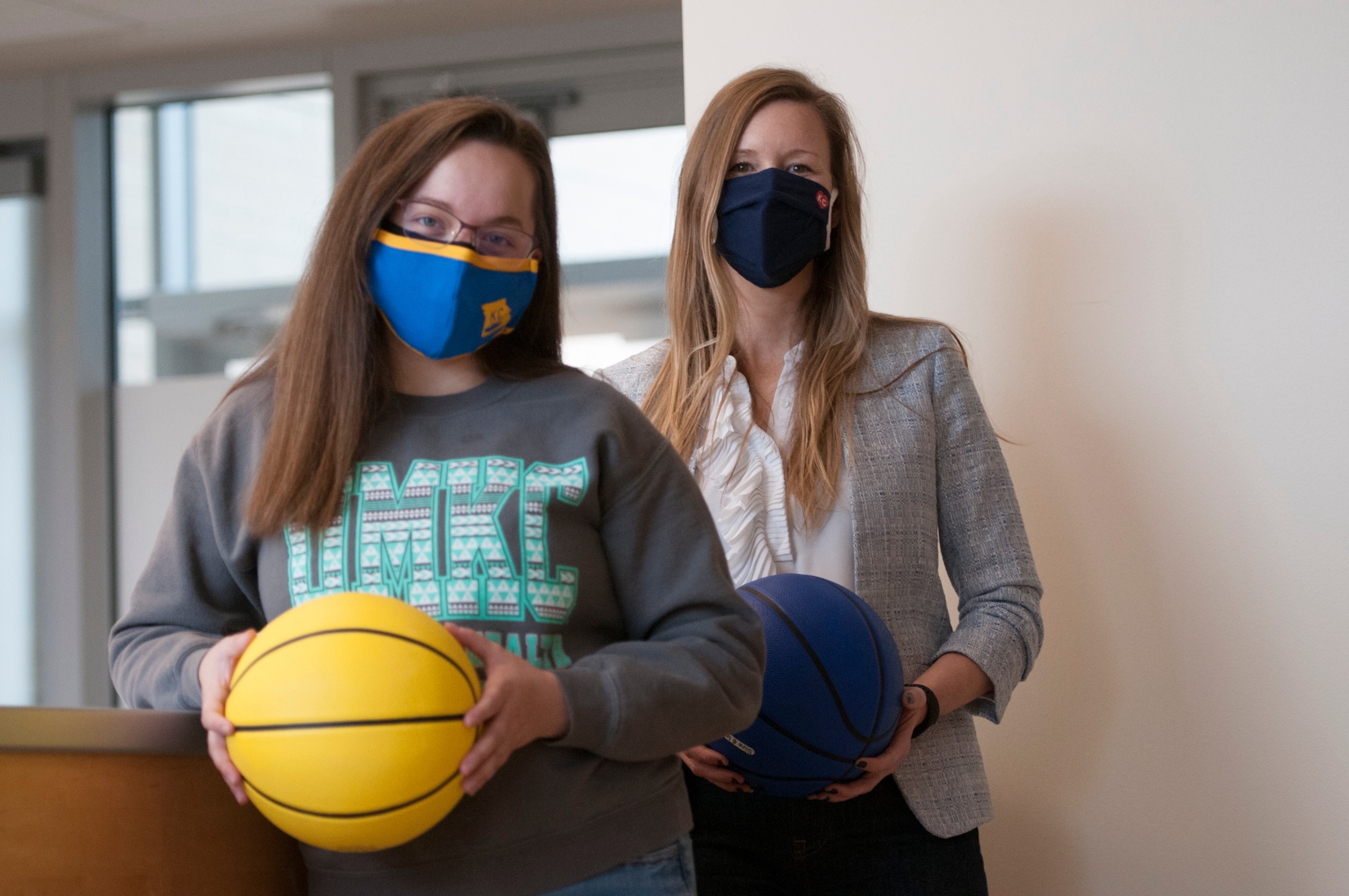
First-generation college student seizes opportunity; mentor opens even more doors for her
The heart of UMKC is our campus community. With lots of opportunities, it’s easy to develop student mentorship teams. And these rich relationships—our Dynamic Duos—are some of our best success stories.
When Maya Baughn heard that the health sciences program was looking for student research assistants, she immediately reached out for more details.
She met about the opportunity over Zoom with Amanda Grimes, assistant professor of health sciences, and the two clicked. Given Baughn’s curiosity and positive personality, Grimes said, “I could tell right away she was a great fit for our team!”
In high school, Baughn had nurtured her interest in health care by getting involved in health related classes, clubs and organizations. One summer she spent a week at the School of Nursing and Health Studies under the KCHealthTracks program, which exposes high school students to health career options and professional connections.
“I just loved it,” Baughn said.
Then she took the leap to enroll at UMKC, becoming the first person in her family to go to college. “I felt lost when I first started,” she said. “Since then I have unapologetically grown in my confidence.”
Having Grimes as a mentor opened even more doors.
“I enjoy watching young people find passions, learn through hands-on experiences and begin to carve out a path to their academic and professional goals.”
—Amanda Grimes
Grimes is a principal investigator for the school’s Move More, Get More program, which measures the effects of the fitness activities and nutrition resources that the program brings to middle school students. For Baughn, who is interested in fitness and health advocacy, the research assistant position was perfect and allowed her to work regularly with Grimes.
A good mentor, Grimes said, can promote student success by providing a personal champion, “some who is rooting for them when things get challenging”; nominating students for scholarship and grant opportunities; and helping them build their resumes.
Baughn will take advantage of one such opportunity in mid-April, presenting results virtually to legislators and others in Jefferson City for the University of Missouri system’s Undergraduate Research Day.
“It wasn’t long after Maya became a research assistant that I recognized her natural ability to communicate with people of different ages and backgrounds, even on topics such as research,” Grimes said. “When I saw the opportunity to present at the Capitol, she immediately came to mind. These students are tasked with discussing their research outside the research and academic world, which takes skill.”
Baughn, who is on track to graduate in May 2022, is looking forward to that opportunity — and to continued growth with Grimes’ help.
“My mentor has helped me grow as a person by providing me opportunities to expand my social network, my research skills and knowledge on many different topics,” Baughn said. “Dr. Grimes has challenged me by exposing me to new areas of research, such as work involving older adults.”
Baughn added: “UMKC has solidified my interest in advanced medicine while also exposing me to aspects of health care I never imagined before. I love research and health advocacy. UMKC has allowed me to learn a lot about those two things while studying for my bachelor of health sciences degree.”
For her part, Grimes said, “I enjoy watching young people find passions, learn through hands-on experiences and begin to carve out a path to their academic and professional goals. Most of all, they are fun to be around.”
Mar 26, 2021
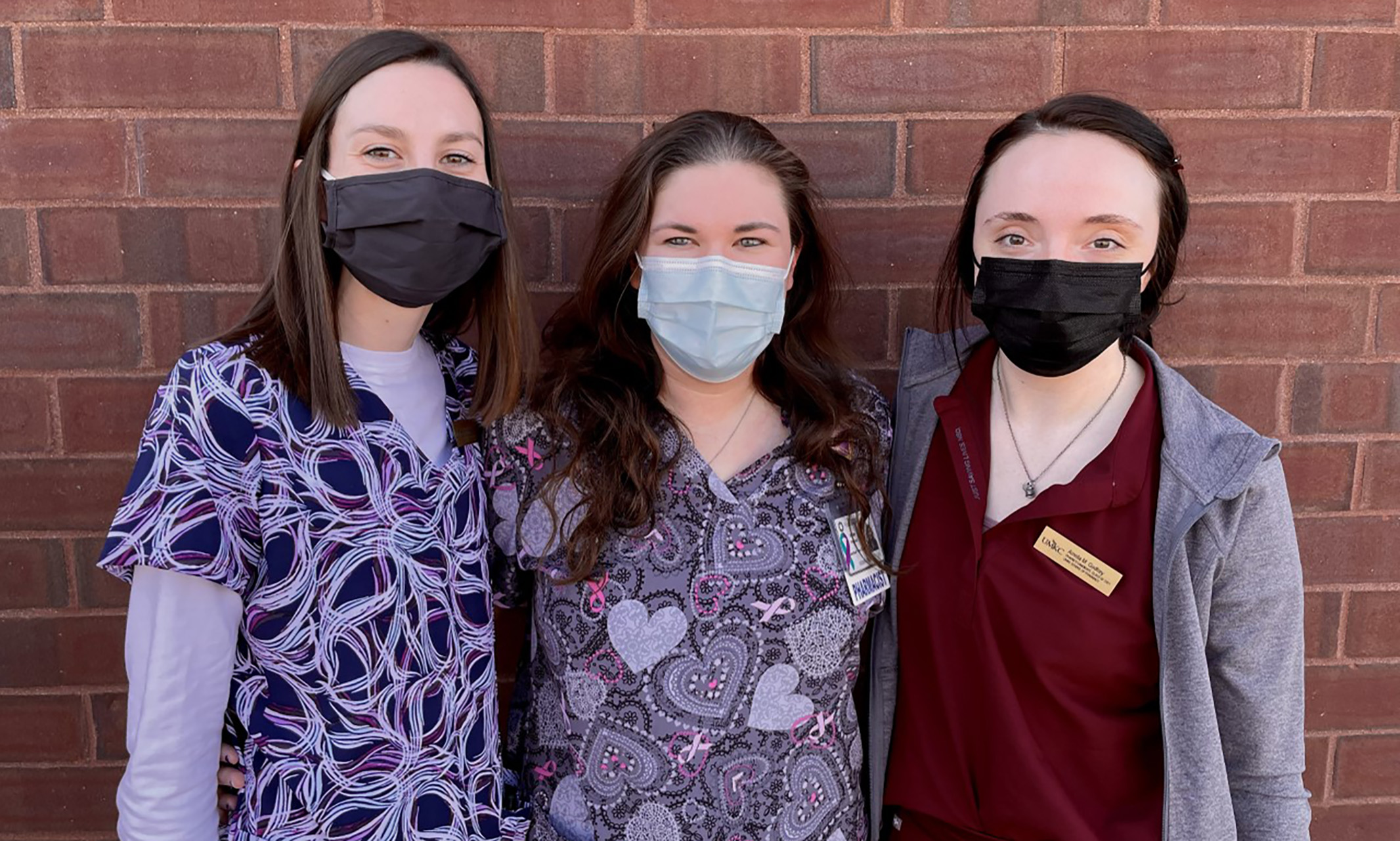
Caring for uninsured adults since the beginning of the COVID pandemic
Before the coronavirus ever swept across the globe and became a pandemic, UMKC School of Pharmacy student Amelia Godfrey had already decided to go home to Hannibal, Missouri, to do her ambulatory care rotation at the Hannibal Free Clinic.
Having grown up in the northeast Missouri community of about 17,000 made famous by Mark Twain, she looked forward to the time when she could return and be a part of giving back to the community.
“I've been interested in doing primary care, so I was really excited to come back home for a couple of rotations and be here at the free clinic to help with those patients,” said Godfrey, who spent the month of February working in the clinic. “When COVID hit, you got to play a bigger role. There's a huge need for what they're doing right now and I've seen that in my community.”
Godfrey is one of four UMKC pharmacy students who have done month-long rotations serving at Hannibal Free Clinic since the COVID pandemic began. Haley Hurst, the clinic’s pharmacist and one of only four paid staff members, welcomed the help with open arms.
“We are mostly a volunteer clinic, run by retired nurses and office staff,” Hurst said. “A lot of them had to stop coming from March 2020 through now because of COVID and these students were really a saving grace for us. It really helped us bridge the gap because we basically lost almost all of our volunteers.”
The clinic covers an area of six counties surrounding Hannibal, proving primary care services for uninsured adults from 18 to 64 years old. It serves as many as 400 patients a year with about 100 to 150 of them being part of the patient centered medical home, a program of patients who meet with Hurst and her student pharmacists for additional education and medication management.
There is a waiting list to be seen that is based on the level of need. That has only grown throughout the COVID pandemic.
Hurst meets with patients referred to the clinic to provide help with issues from diabetes, cholesterol and smoking cessation, to blood pressure issues.
“We have been so short on nursing volunteers to help with taking vitals and doing medication reconciliation for our volunteer providers,” Hurst said. “The students have been a humongous help to us.”
Lauren Damon, a School of Pharmacy student who worked at the clinic this past August, grew up just eight miles from Hannibal in Palmyra, a small community of only about 3,500 people.
“Palmyra is such a small area that there are not a lot of ambulatory care clinics like this around,” she said. “So, it was really interesting to me to see that they have this and that they can reach all the people that really need the help.”
Since their time at the Hannibal Free Clinic, both Damon and Godfrey have also taken part in rotations at the Hannibal Regional Hospital, which have included working in the hospital’s vaccine clinic.
But they say that it was their time at the free clinic that was particularly eye-opening. Hurst smiles when sharing that both students had the opportunity to experience having to convince a patient to take their medications. Damon and Godfrey said they saw how Hurst and the staff go the extra steps to fully care for their patients.
“You can learn what medicine to give a patient for high blood pressure,” Damon said. “But asking them things that you don't think about all the time like can they afford it, do they have transportation to get their medication. You really get a sense of that here, how to look at people as a whole picture instead of just, okay, we're prescribing you this medication and send you out the door.”
Godfrey said the clinic provided her the unique opportunity to spend more time talking with her patients about their medications and needs and learning how she could better help them.
“This is a free clinic and there are all sorts of things that they connect patients to,” Godfrey said. “There are services for mental health. There are services for dentists and podiatry and all these other things that Haley and the staff are looking to connect these patients to. So now the patient is being taken care of as a whole, rather than just kind of looking at them as somebody who takes a list of medications. I've been on some pretty cool clinic rotations with some pretty cool pharmacists, but this one by far was the most impactful because they are 100 percent all in.”
Mar 26, 2021
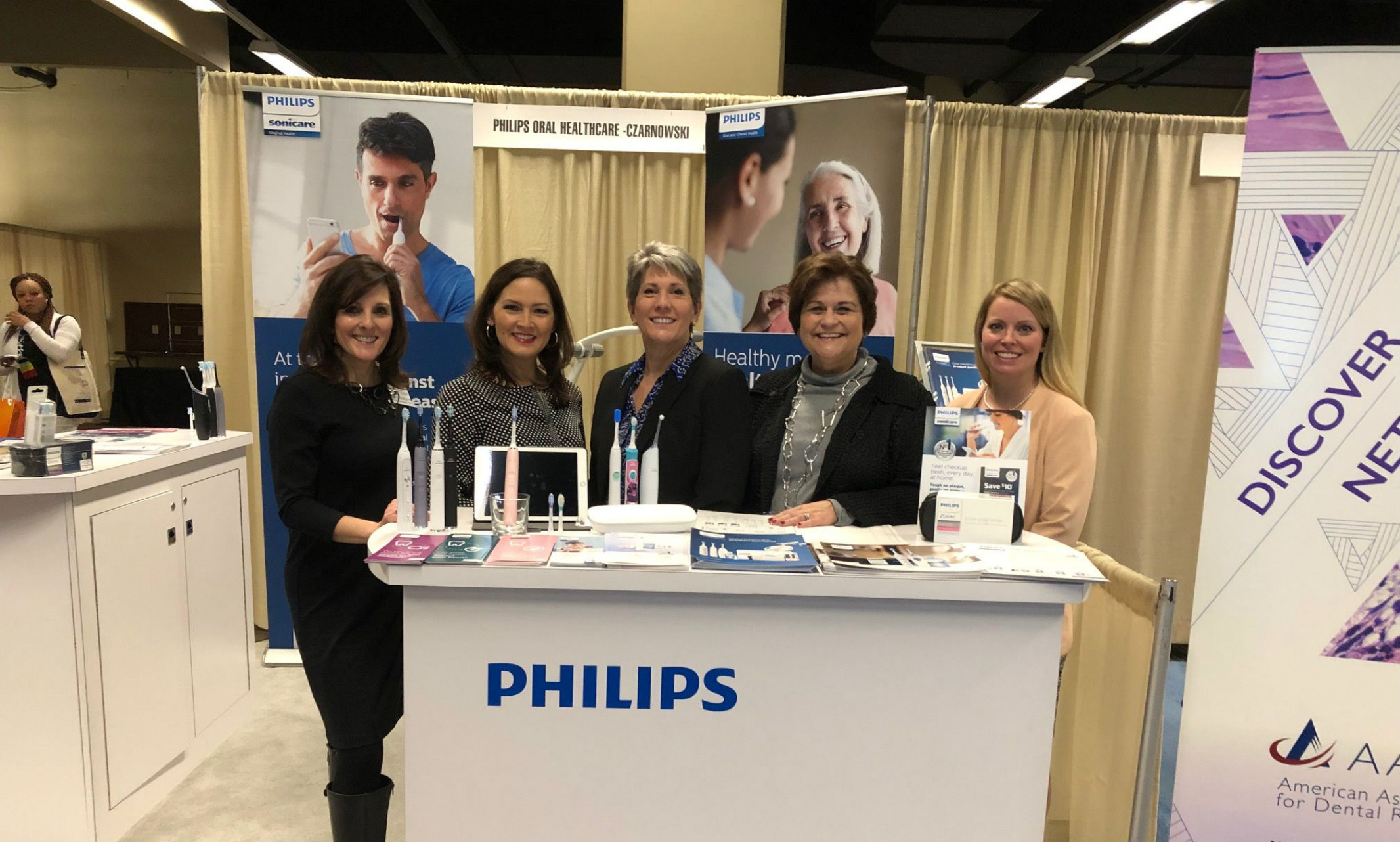
Cindy Sensabaugh receives School of Dentistry-Dental Hygiene Alumni Achievement Award
Each year, the UMKC Alumni Association recognizes the achievements of outstanding alumni with an awards celebration. UMKC is honoring Cindy Sensabaugh (M.S.D.A. ’11) with the Class of 2020 Alumni Achievement Award.
Cindy Sensabaugh(M.S.D.A. ’11)
Sensabaugh has built a career in dental hygiene education that has taken her around the globe. While she manages a team of hygienists for Philips Oral Healthcare who provide continuing education programs for students worldwide, Sensabaugh credits her education and experience as a hygienist with her success in educating her colleagues and clients. After practicing clinically for 10 years, Sensabaugh completed her dental hygiene education masters of science through the UMKC online program.
How did UMKC contribute to your success?
I learned so much from the program at UMKC that has helped me in each of my roles. I had spent a lot of time around educators prior to starting my master’s degree, but it was very helpful to have formal education on educational methodology and research.
Graduating from UMKC with my master’s and completing and publishing my research has given me the opportunity to have been selected as a reviewer for the Journal of Dental Hygiene. For most educators it probably isn’t a big deal, but for me it is.
What is your favorite UMKC memory?
Early on, the distance students did come to campus for our “micro teach” projects. Cindy Amyot hosted a party so that we could all get together informally. That is a very fond memory of my time at UMKC.
There were many aha! moments learning from fantastic professors. I am very grateful for the chance to learn from some of the very best. Though the research process was laborious, I learned a great deal and am lucky to have had such a wonderful committee (Cindy Amyot, Pam Overman and Tanya Villalpando Mitchell). They are fantastic!
What advice do you have for students who’d like to follow in your footsteps?
First, I’ve always advocated for being involved, or at the very least, a member of your professional association. Had it not been for my membership, and involvement in the Greater Orlando Dental Hygiene Association, I would not have had my first opportunity to enter the corporate world.
Second, advancing your education is always a plus. Most corporate roles require a bachelor’s degree and often a master’s degree is preferred. If that is the goal, then prepare for it by continuing your education.
About the Alumni Awards
Join us in honoring Sensabaugh and the other Class of 2020 Awardees in our first-ever virtual celebration at 5 p.m. April 16. Go to umkcalumni.com/alumniawards to register for this free event. If you are unable to attend the event but would like to donate to student scholarships, contributions can be made online.
Meet the rest of the 2020 UMKC Alumni Awardees
Mar 26, 2021
KSHB talks to UMKC students, leaders about spring break
As spring break kicks off for the University of Missouri-Kansas City, school leaders are asking students to stay vigilant. Obie Austin, director of Roo Wellness at UMKC, and two UMKC students were interviewed. Read more and watch the newscast.
Mar 26, 2021
Antoine Rozner is a UMKC Bloch School alumnus
Antoine Rozner, UMKC Bloch School alumnus and KC Roo’s Golf student-athlete, recently won the Dell Technologies Match Play Championship golf tournament. Read the Kansas City Star article (subscription requiered). After Rozner’s win, Golf Digest wrote a story, as did California Golf News.
Mar 25, 2021
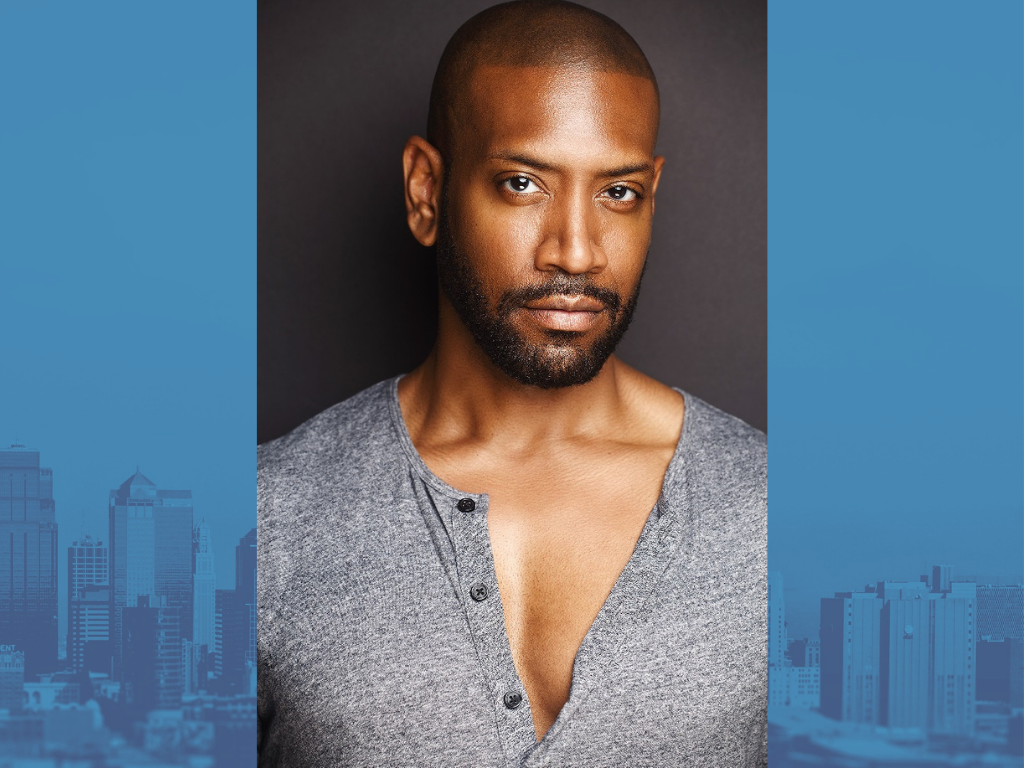
Bryan Terrell Clark shares his life story to encourage others to define themselves and follow their passion
Broadway star Bryan Terrell Clark shared anecdotes and lessons from his life Tuesday night and encouraged listeners to keep pursuing their best and truest selves on their life journeys.
Clark, delivering the 14th annual UMKC Pride Lecture, presented by the UMKC Division of Diversity and Inclusion, covered subjects ranging from hiscovered subjects ranging from his family and sexuality to finding and expressing himself through the arts and public service. Some highlights of his presentation, delivered live over Zoom, and a Q&A that followed:
Family life
He described his mother as an angel and his father as a dragon, opposites in many ways. “But they both taught me to fly,” Clark said.
His mother was a teacher who became a principal, and a Sunday school teacher who became a pastor. His blue-collar father loved his family dearly, Clark said, but ended up involved with drugs, first as a dealer and then as an addict, in and out of rehab many times.
His father’s addiction took a big toll on the family, while his mother was always taking care of others, even to the point of neglecting to take care of herself. But Clark said that when he came out to his parents as gay, it was his father who embraced him unconditionally. His father’s lesson: You have to learn to love yourself, completely. Only when his father could truly love himself, Clark said, was he able to make his addiction rehabilitation stick.
His mother’s initial reaction to his coming out was “I love you, but …” Her religious beliefs did not allow her to accept his homosexuality. But eventually, Clark said, she came around, apologized and said she loved him no matter what.
Arts and service
His mother also realized Clark’s passion for artistic expression “before I could talk.” When he heard music or saw something interesting on television, she said, he would bounce happily, immersed in the experience. So singing in the church choir was a must, and going to a high school that encouraged the arts gave him more opportunities to find and express himself.
College was a challenge, and he often skipped class to travel to New York for auditions. But when graduate school for drama seemed like the next logical step, he refused to sell himself short. He was advised to not apply to the top schools because they seldom admitted people of color, but he applied anyway and was rewarded with a spot at Yale’s drama school.
Another benefit of being at Yale, he said, came when he realized the campus was surrounded by rough neighborhoods filled with young people who desperately needed someone to see them and encourage them. So Clark stayed one summer and organized in the community, giving kids a chance to put on plays and tell their own stories.
Such involvement helped him learn about himself, too, and to find his inner resources instead of looking for definition or approval from others, Clark said. Today, his community work continues through inDEFINED, an initiative he helped found to empower young people to erase the constrictive labels in society.
Lessons to carry forward
Clark’s successes in the arts, including two stints playing George Washington in the Broadway hip-hop hit “Hamilton,” allowed him to keep learning about himself and to share his best self. It helped him greatly, he said, to trust his inner voice, follow his passion and finally quit worrying about how others saw him. Having an internal commitment to yourself is another key, he said.
“You just have to be you,” Clark said. “The labels are for someone else to understand you.”
Clark also encouraged listeners to be open to new experiences and inspirations, to find something every day that makes them happy, and to try something new every week.
Such practices, he said, help put people in the driver’s seat for their own lives and “make you a better partner, make you a better student, make you a better everything.”
Mar 24, 2021
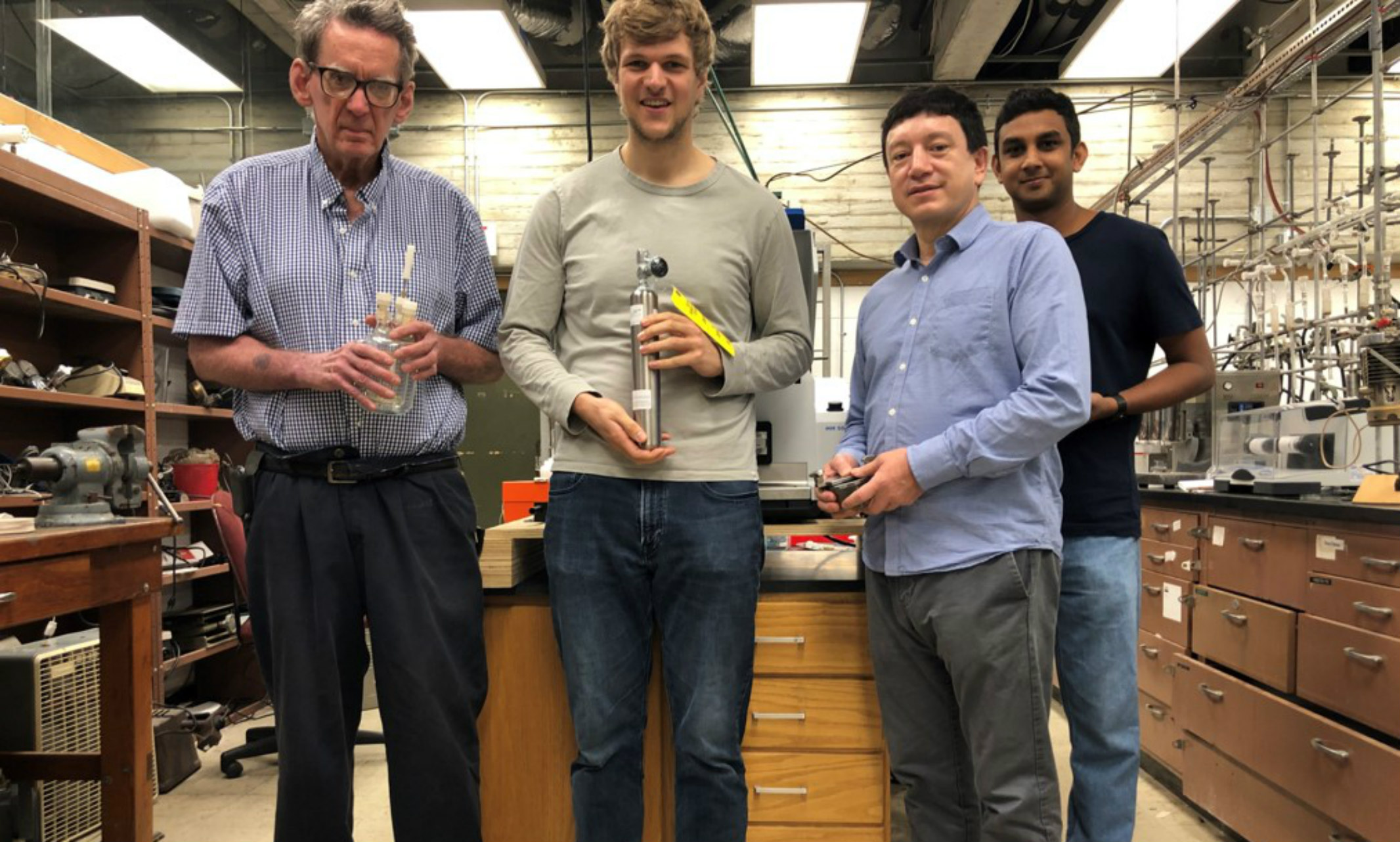
School of Biological and Chemical Sciences selects Carl Hoff to receive Alumni Award
Each year, the UMKC Alumni Association recognizes the achievements of outstanding alumni with an awards celebration. The UMKC School of Biological and Chemical Sciences is honoring Carl D. Hoff (Ph.D. ’77) with its Class of 2020 Alumni Achievement Award.
Carl D. Hoff (Ph.D. ’77)
Hoff has spent his career energizing students on the subject of chemistry. He’s recently received a grant from the U.S. Department of Energy to develop a better way to convert atmospheric nitrogen from a gas into ammonium nitrate – a critical ingredient in the production of fertilizer – that will eliminate toxic by-products, which would have a major impact on the environment.
A past recipient of the University of Miami’s Excellence in Teaching Award, scientist Carl Hoff is beloved by students for his innovative and experiential classroom techniques. Hoff has been teaching chemistry for nearly 40 years. While he has a passion for the subject, he understands that it can be a challenging subject for students.
What do you enjoy about teaching?
I had an advisor who said he could see it in his students’ eyes when they had lost interest. But the opposite is also true. You can see their eyes lift as well. In a difficult problem, sometimes you can see that light of understanding where something real was achieved.
How do you make course material engaging for students?
No one can take 50 minutes of chemistry. I learned a lot from educators at UMKC. Eckhard Hellmuth once brought in a box of assorted rubber tubing of different colors and lengths. He would reach in and grab a handful and throw it in the air, and then have the class look at it. He would repeat this several times. Each time was different, but somehow the same. It was about statistical mechanics of polymer strands. It was simple. It cost little. I try to do that at the middle of a lecture when students need a break.
You’ve received more than $2.5 million in grant funding for your work. What is the focus and goal of your grant from the U.S. Department of Energy?
We are looking for a better way to make ammonium nitrate, a key ingredient in fertilizer. The most common method developed by Fritz Haber can lead to a toxic by product that can cause algal blooms and other bad effects when misused. We’re trying to take the waste and convert it into more fertilizer, which will save a lot of money and energy and create a cleaner environment.
How did UMKC prepare you for success?
UMKC had the advantage of being a small university, where there was close student-faculty contact that wasn’t formalized or mandated.
What’s your favorite UMKC memory?
I always liked reading the saying on the old Swinney Gymnasium: “Run hard, leap high, throw strongly and endure.”
About the Alumni Awards
Join us in honoring Hoff and the other Class of 2020 Awardees in our first-ever virtual celebration at 5 p.m. April 16. Go to umkcalumni.com/alumniawards to register for this free event. If you are unable to attend the event but would like to donate to student scholarships, contributions can be made online.
Meet the rest of the 2020 UMKC Alumni Awardees
Mar 24, 2021
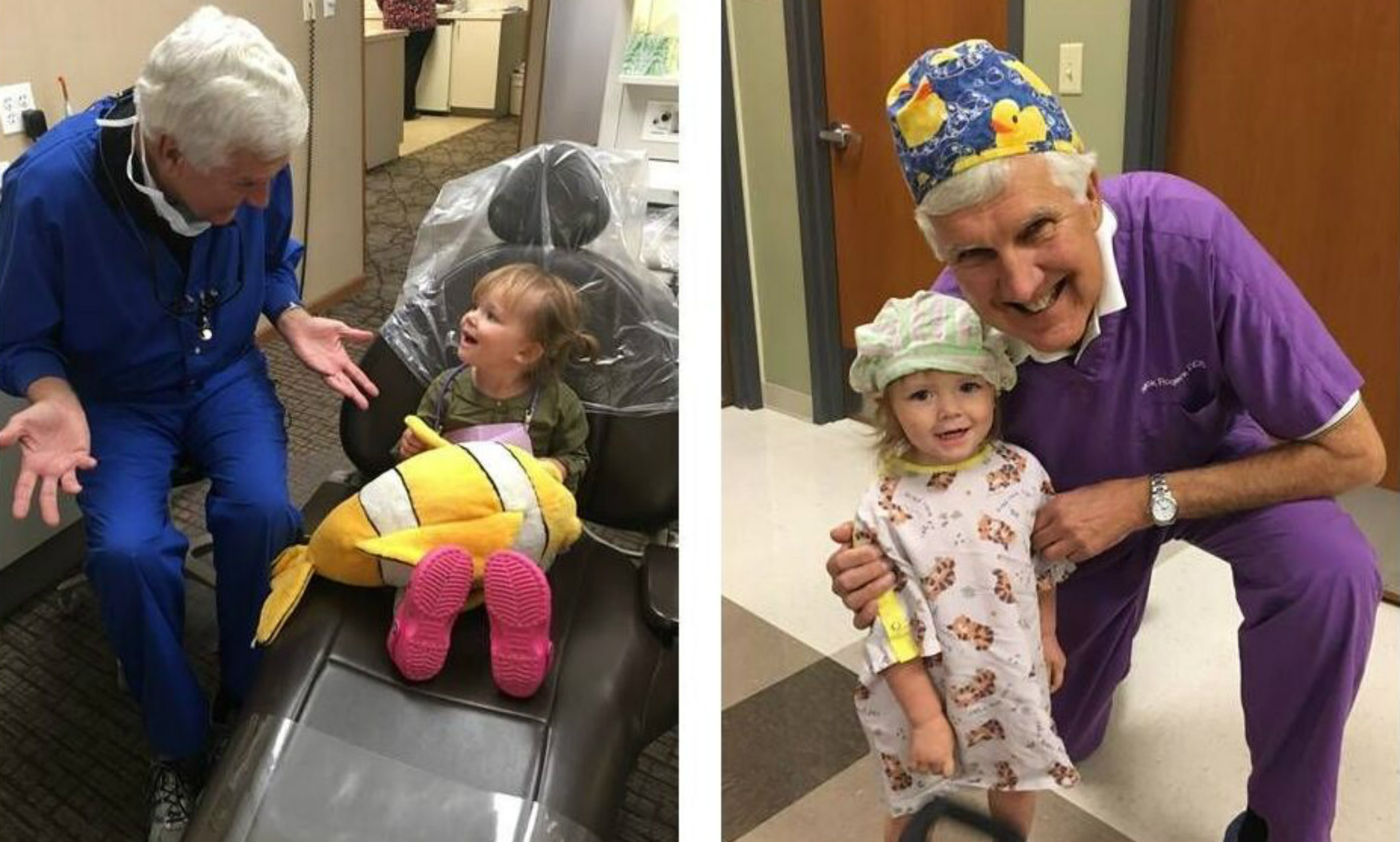
Nick Rogers to receive the UMKC School of Dentistry Alumni Achievement Award
Each year, the UMKC Alumni Association recognizes the achievements of outstanding alumni with an awards celebration. UMKC is honoring Nick Rogers (D.D.S. ’78) with its Class of 2020 Alumni Achievement Award.
Nick Rogers (D.D.S. ’78)
Rogers has served the Arkansas City, Kansas, area since 1979. A champion for children’s dental care, he secured grant money for his local Head Start program which expanded access to care for children in the region. On a national scale, he is president of the American Academy of Pediatric Dentistry’s Foundation. Rogers also devotes time to UMKC as a member of the UMKC School of Dentistry’s Rinehart Foundation board and started a scholarship for dental students. We spoke with him about his dedication to expanding access to dental care.
You’re a champion for children’s dental care — securing grant money for programs in your community and serving as president of the American Academy of Pediatric Dentistry Foundation. Where does your passion for helping children stem from?
Being a dentist in a small community, I see patients of all socio-economic levels and all ages. It became very apparent while I served for 22 years on the local school board that children were often not getting the treatment they needed. This was caused by multiple issues from lack of financial resources and lack of education to lack of availability and awareness. It became my goal to help change that to allow kids to find dental treatment and for parents to understand the need.
You recently created a scholarship at the School of Dentistry and serve on the board of the Rinehart Foundation. There are many worthy causes to support, why do you choose to give back to UMKC?
Dental school did not come easy for me. I was not accepted on my first application and my goal to graduate debt free meant working part-time jobs. I, like students today, spent many hours studying. I had much help and encouragement from others along the way.
Although the dollar amount of the scholarship is not great, I hope that it gives encouragement to students to continue their pursuit to the great profession of dentistry. I would not have made it through without help from others. This scholarship represents my thanks to those that helped me… “paying it forward.” It also represents my desire to help youth fulfill their dreams.
What is your favorite UMKC memory?
Sneaking a microfiche machine, in the days before computers, out of the library for a group of us to study for a pathology test on a weekend and returning it on Monday. (The youth in the audience will have to “Google” microfiche).
About the Alumni Awards
Join us in honoring Rogers and the other Class of 2020 Awardees in our first-ever virtual celebration at 5 p.m. April 16. Go to umkcalumni.com/alumniawards to register for this free event. If you are unable to attend the event but would like to donate to student scholarships, contributions can be made online.
Meet the rest of the 2020 UMKC Alumni Awardees
Mar 24, 2021
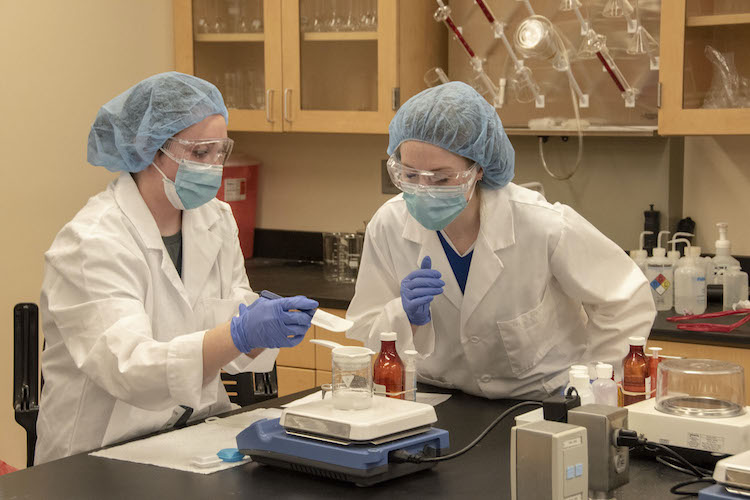
Study explores patient safety issues surrounding the use of electronic medical records during transitions of care
The UMKC Foundation has received a $35,000 gift from the Jane & Jack Strandberg Charitable Foundation, Bank of America, N.A., Trustee, that will go to support ongoing research in the School of Pharmacy.
Jennifer Ingraham, assistant vice president of the UMKC Foundation, said charitable trusts are a prudent way for individuals to fulfil their philanthropic objectives. Because they are generally treated as a tax-exempt entity, a charitable trust would typically not pay tax to the extent of any ordinary or capital gain income.
For Mark Patterson, Ph.D., M.P.H. associate professor at the UMKC School of Pharmacy, the gift is a unique funding source to support his study of electronic health records systems used to monitor patients and their prescriptions during transitions of care between hospitals and nursing homes.
The gift will benefit community related health by helping address a patient safety issue that Patterson said needs to be investigated. Part of the funding will also go to employing two pharmacy students to assist in the project, providing them training in research skills as well.
“I just feel so fortunate to have found this unique funding path and the fact that it's benefiting multiple aspects of the university,” he said.
Ingraham said the gift is unique in that it is private philanthropy supporting university research. Generally, it is federal and state agencies, research foundations and corporate research and development that provide financial support to university research.
Patterson’s project is an extension of a previous study he conducted looking at reducing medication discrepancies during patients’ transition of care between hospitals and nursing homes. That study exposed the issue of mismatched prescribing information during those transitions and the potential health risk those discrepancies pose to patients.
His latest work will look specifically at the electronic health records systems available to providers. Patterson said the interoperability of health information technology systems between providers must be as seamless as possible in order to obtain accurate patient prescribing information across the continuum of care.
“Electronic health records, and the electronic health care record systems that are available to these providers are a huge mitigating factor in regards to how accurate prescribing information is on a patient record that's being shuttled back and forth between hospitals, primary care doctors, nursing homes and community pharmacies,” he said.
The study will involve speaking with focus groups and conducting one-on-one interviews with care providers in nine different nursing homes in Missouri and Kansas.
“We’re going to very specifically zone in on how the health IT infrastructure is interacting with that goal of safe prescribing,” Patterson said. “Between the focus groups and the one-on-one interviews with providers, we’re hoping to really do almost a needs assessment for these nursing homes.”
Mar 24, 2021
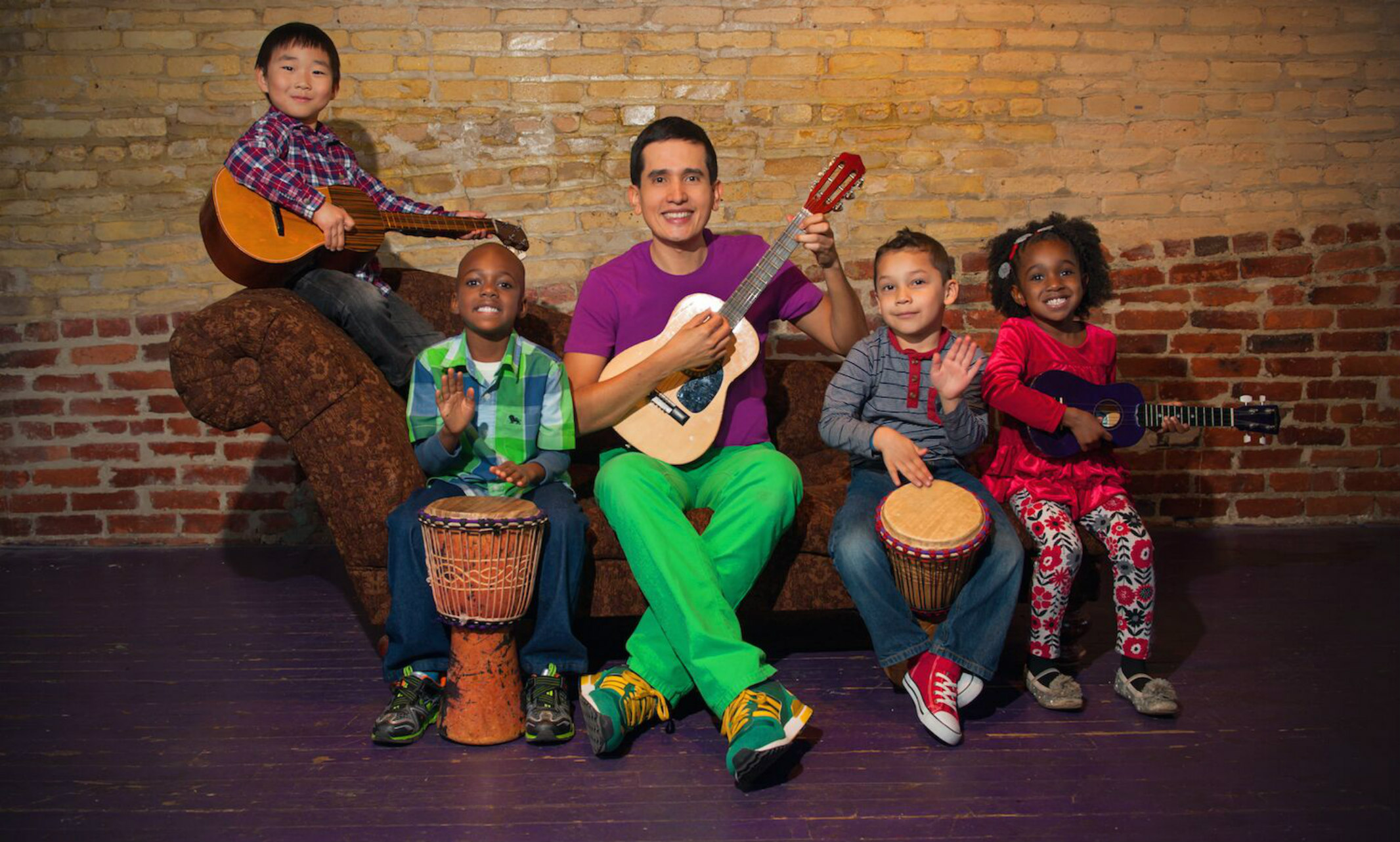
Andrés Salguero to receive the UMKC Conservatory Alumni Achievement Award
Each year, the UMKC Alumni Association recognizes the achievements of outstanding alumni with an awards celebration. UMKC is honoring Andrés Mauricio Salguero (G.R.C.T. ’11, D.M.A. ’11) with its Class of 2020 UMKC Conservatory Alumni Achievement Award.
Andrés Mauricio Salguero(G.R.C.T. ’11, D.M.A. ’11)
Along with his wife and partner, Christina Sanabria, Salguero is co-creator of the Latin Grammy-winning musical group 123 Andrés, a duo that performs music for children and families throughout the United States and Latin America. 123 Andrés has released four acclaimed studio albums, including their Latin Grammy-nominated debut, “Uno, Dos, Tres con Andrés,” Latin Grammy winner “Arriba Abajo,” and the most recent, Latin-Grammy-nominated, “Canta las Letras.” His first children’s book, published by Scholastic, debuted in 2020. We caught up with the composer, performer and multi-instrumentalist recently.
Your music teaches English and Spanish. How did you get into educational music?
When I was a young child in Bogotá, Colombia, my mom found some workbooks and cassette tapes at a used toy sale. It turned out to be “Inglés Junior,” an English learning course for children created by the BBC. They were a big part of how I learned English as a child and I never forgot them.
How does it feel to be helping children communicate better and learn foundational material from your music?
Our biggest goal for our music is to connect children and families to celebrate and learn about Latin heritage and Spanish language. We are proud that our songs support children in learning words and phrases in another language and that the underlying messages of multiculturalism, curiosity and friendship stick in their hearts and minds.
How did UMKC contribute to your success?
I am thankful for Conservatory faculty, who held us to the highest expectations. They fed my drive and nurtured a belief that I could perform at the highest level, whatever my chosen career path would be.
UMKC also offered many opportunities that went beyond the traditional coursework. I had several student work opportunities on campus that allowed me to be in different professional environments.
What is your proudest accomplishment?
Being able to give back. We have used our platform to raise awareness and funds for two amazing organizations that support children and families in need, the Greater DC Diaper Bank and Immigrant Families Together.
About the Alumni Awards
Join us in honoring Salguero and the other Class of 2020 Awardees in our first-ever virtual celebration at 5 p.m. April 16. Go to umkcalumni.com/alumniawards to register for this free event. If you are unable to attend the event but would like to donate to student scholarships, contributions can be made online.
Meet the rest of the 2020 UMKC Alumni Awardees
Mar 23, 2021
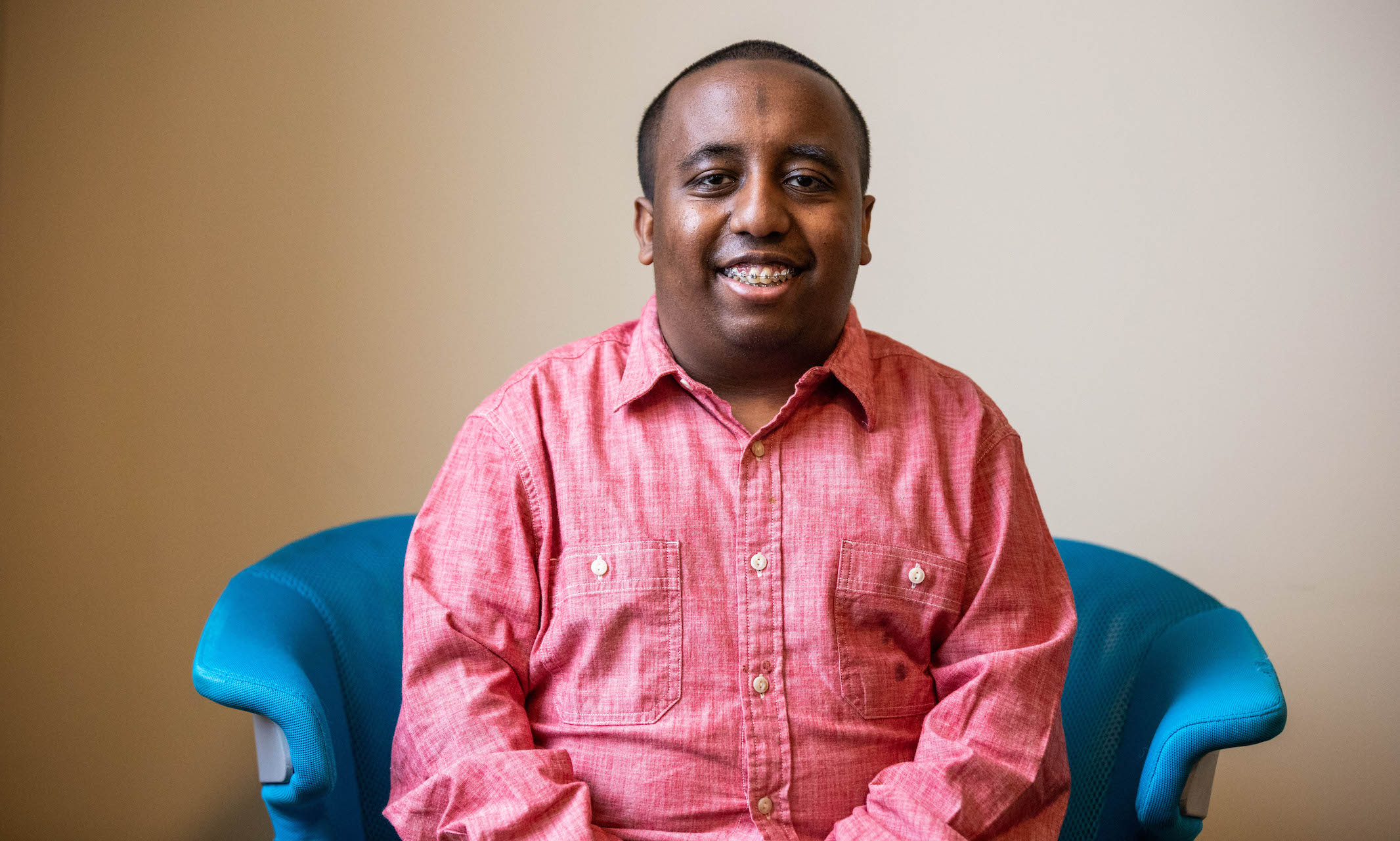
Nabil Abas builds community for himself and others
Our ongoing story starts with people from around the world, converging here at UMKC. Get to know our people and you’ll know what UMKC is all about.
Nabil Abas
Anticipated graduation: 2022
Academic program: BA’22 Interpersonal Communications Studies, minor in Sociology
Hometown: Mombasa, Kenya
Nabil Abas is a first-generation college student. While he works hard to maintain his grades, help his family and volunteer on campus and in his community, he is quick to smile, curious and engaged and determined to achieve success for himself and other people around him.
“Being a first-generation college student is extremely important, because I was the first person in my family to go through the college application process,” he says. “I had to find people to assist me in understanding FAFSA, what the college admission processes are and finding the resources that are out there.”
While the process was sometimes overwhelming, Abas has seen the benefit of figuring it out extend beyond his own success.
“It was overwhelming at times, but I use my experiences to assist my siblings, niece, nephews and community members. It means the world to me that I could be the point person that someone needed so they go after their college dreams!”
Abas’s aspirations did not stop at college acceptance. As an interpersonal communications major with a minor in sociology, he combines his interest, his experience and his knowledge from the classroom to help others.
“I chose this field of study because I love learning all about the social interactions of people, verbal behaviors and group dynamics,” he says. “My first job was working as an orientation leader. That’s what introduced me to field.”
Beyond his positive first impression, Abas has followed the lead of his professors at the College of Arts and Sciences.
“They are talented, bright, caring and experienced professors who inspire me to be the same for others in wherever I’m working at. Being around them inspires me to strive to have these qualities when I get into my field.”
"It means the world to me that I could be the point person that someone needed so they go after their college dreams!" – Nabil Abas
Still, Abas sometimes struggles with balancing school, work and family life. As the oldest sibling in his family, he has a lot of responsibility at home, but he works hard to maintain balance. He’s found it helpful to surround himself with classmates and form study groups with people who have similar passions.
“I always enjoy being able to have thoughtful conversations with my classmates on all topics on the table,” he says. “Whether that be state of our education system, social justice issues or how we could bring change to our communities. Those conversations are always the best!”
These interests reinforce Abas’s engagement in his role as president for the UMKC Men of Color initiative.
“Men of Color was created as a space where men of color and Latino males could come together to create a sense of belonging and hold each other accountable,” he says. “We do that through real-talk conversations with guest speakers, promoting positive images of men of color professionals, social media and cultural enrichment activities.”
It was Abas’s work with Men of Color that led to his involvement in the Roos Advocate for Community Change, a campus-wide effort developed to reinforce the university’s commitment to value all individuals for their contribution to the community regardless of race, social or cultural identities.
“I’m grateful to Chancellor Agrawal for creating this initiative for conversation and connection,” Abas says. “It’s been great to have conversations between Black students and university leaders like Brandon Martin, Kimberly Johnson and Keichanda Dees-Burnett. We share a mutual passion and dedication to creating a two-way street of communication between students and the university.”
"Your capabilities are limitless! This motto has helped me in every stage in my college journey." – Nabil Abas
Beyond his work on campus, Abas is heavily involved in volunteering on the weekends. He is the public relations director of Al-huda Youth Group, which helps Muslim youth in the historic northeast Kansas City neighborhoods combat the common issues or barriers that they face.
“I was lucky enough to have community leaders in my corner throughout my life, so this group is a way of giving back to my community for all they have done for us and also investing in our future leaders,” he says.
Mar 23, 2021
Local news outlets cover UMKC Forward plans
University of Missouri-Kansas City officials on March 18 announced plans to create three new schools and eliminate several existing academic programs. Read the news coverage:
Kansas City Star (subscription required) This article included an embedded link to the UMKC Forward video.
KCUR
Kansas City Business Journal (subscription required)
KSHB. This article included quotes from engineers at Burns and McDonnell and Henderson Engineers. Jenny Lundgren, provost and executive vice chancellor, was also interviewed.
University News
Mar 22, 2021
KCUR highlights School of Education alumnus
Khalil Jones is in his final semester at the University of Missouri-Kansas City and student teaching at East High School in the Kansas City Public Schools. Read more.
Mar 22, 2021
Missouri Lawyers Media features Mira Mdivani
Mira Mdivani is an adjunct professor at the UMKC School of Law and Class of 2020 UMKC School of Law Alumni Achievement Awardee. Read more.
Mar 22, 2021
Scott Fullwiler weighs-in on MMT for Bloomberg
In the mainstream models, even when governments are paying low interest rates and have room to spend, “there’s always this danger” that debt costs could spike and derail their plans, says Scott Fullwiler, an MMT economist and professor at the University of Missouri-Kansas City. Read the full article.
Mar 22, 2021

Ceremonies for 2020 and 2021 graduates will be May 15 and 16
The University of Missouri-Kansas City is pleased to announce that in-person ceremonies honoring its 2020 and 2021 graduates will be hosted on Saturday, May 15, and Sunday, May 16, at Kauffman Stadium.
UMKC Commencement at the K will be a rain-or-shine event. Please monitor weather forecasts and be prepared to participate amid light rain showers if they occur. Guests may bring small umbrellas (no golf umbrella) into Kauffman Stadium as long as they do not interfere with other guests’ enjoyment of the ceremony. For the comfort and consideration of all guests, it is requested that those using umbrellas be considerate of those around them.
In case of heavy downpours or other severe weather, UMKC will follow the Royals’ standard weather protocol. The team will make the call as to whether the ceremony must be delayed; that information will be shared within the stadium, on the MLB Ballpark app and on the UMKC Commencement 2021 web page and the university’s Twitter and Facebook accounts.
Due to the COVID-19 pandemic and safety restrictions in place during 2020, UMKC found creative ways to safely celebrate its graduates: packets of surprise mementos, lighting up Kansas City landmarks Roo blue and gold at night and virtual ceremonies with distinguished guests. In December, Kansas City native and actor Don Cheadle was the speaker.
Nonetheless, students communicated their desire to return to in-person commencement as soon as reasonably possible. UMKC leaders worked with community leaders to find a way to make this happen.
“During the pandemic, we celebrated the milestone of graduating from our university with all of the pomp and circumstance we could safely create,” said UMKC Chancellor Mauli Agrawal. “We are happy that now we can return to an in-person event that is more like the traditional ceremony we’ve come to expect – and at the home of our beloved Kansas City Royals. We are grateful that the organization could accommodate our 2020 and 2021 graduates.”
Kansas City Royals owner John Sherman said he is delighted to help UMKC graduates celebrate commencement together, at the K.
"The last twelve months have been difficult on everyone, including the education community,” said John Sherman, chairman and CEO of the Royals. “Students, teachers and administrators throughout our country have worked tirelessly during these uncertain times, so providing this opportunity for UMKC graduates to be celebrated in person, with their families, is an honor for our organization."
UMKC will host four ceremonies in Kauffman Stadium, three dedicated to the class of 2021 and one dedicated to graduates from 2020 who return for the ceremony. More than 2,300 graduates will be able to cross the stage, with COVID-19 restrictions in place. The event also will be livestreamed.
UMKC is working diligently with groups across campus to plan this in-person Commencement celebration, including External Relations, Student Affairs and the Student Government Association.
Chancellor Agrawal expressed gratitude to the community for helping to make students’ commencement wishes come true.
“These in-person ceremonies would not be possible without the many community partners who stepped up with possible solutions,” Agrawal said. “The home of the Royals is a wonderful venue and we look forward to May and the ability to celebrate together with our students and their families.”
Commencement schedule
Light Up the Night 2021
UMKC graduates and their families are encouraged to take pics around Kansas City that are lit up in blue and gold. Here's what will be illuminated:
Kauffman Center for the Performing Arts, sunset on May 15
Union Station, sunset on May 15 and 16
Kansas City Marriott Downtown, sunset on May 15
City Hall of Kansas City, Missouri, sunset on May 15
Power and Light Building, sunset May 14 to 16
The Nelson-Atkins Museum of Art, sunset May 15 and 16
Durwood Stadium on UMKC Volker Campus, sunset May 14 to 16
Roo Statue on UMKC Volker Campus
James C. Olson Performing Arts Center on UMKC Volker Campus
Local fountains will be dyed or illuminated blue all day May 15Children's FountainFountain in Mill Creek ParkSpirit of Freedom FountainThe Concourse FountainThe Women's Leadership FountainMeyer Circle Sea Horse FountainTower Park
Mar 19, 2021
KSHB features alumna Tiera Farrow during Women's History Month
Tiera Farrow. She graduated from Kansas City School of Law in 1903 and went on to lead a barrier-breaking career, and life. In 2019, Farrow was inducted into the UMKC Starr Women’s Hall of Fame. Read the article and watch the newscast.
Mar 19, 2021
UMKC students and faculty volunteer at vaccination event
Volunteers from the UMKC Schools of Medicine, Nursing and Pharmacy will also help at the mega vaccination site. Read the story and watch the newscast.
Mar 19, 2021
News of in-person commencement covered by Kansas City media
The University of Kansas City-Missouri will celebrate its 2020 and 2021 graduates with in-person commencement ceremonies at Kauffman Stadium. Read the news coverage from KSHB, KCTV5 and Fox4KC.
Mar 19, 2021
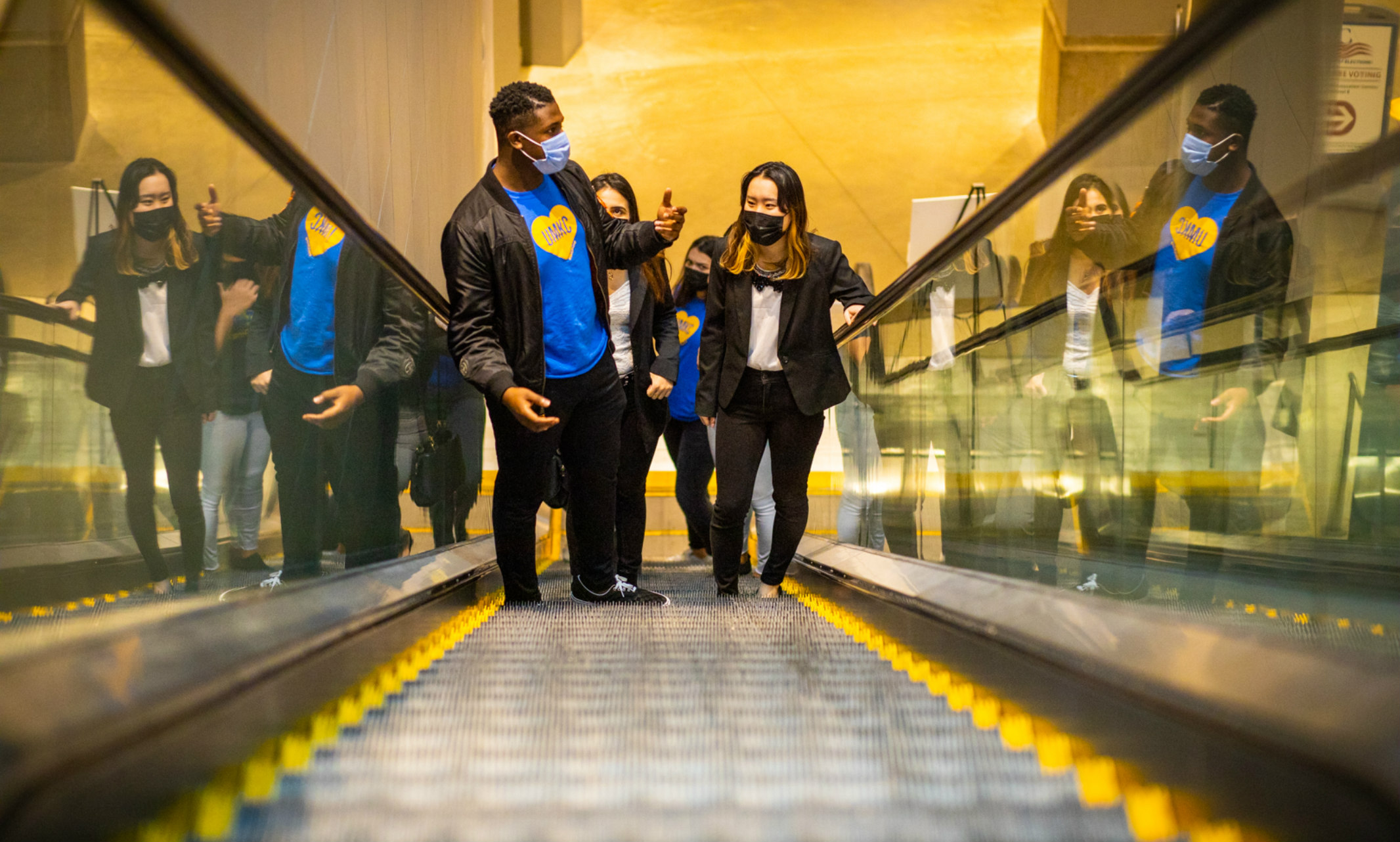
Initiative supports two key missions: public service and workforce readiness
A centerpiece initiative of the UMKC Forward plan will create the university’s signature Professional Career Escalators™ program. This innovative student success initiative includes a unique system of personalized support and services to propel students from their academic studies to good-paying careers.
University officials believe the combined features and goals of the program make it unlike anything being offered at any other college or university in the United States.
“The escalators are designed to engineer the college experience to support career attainment from undergraduate through professional training,” said Chancellor Mauli Agrawal.
The program includes signature student experiences and support programs, such as living-learning student cohorts, an entry-bridge program and advising teams with expertise in specific professions. Scholarships and other forms of financial aid will be part of the program as well.
“Professional salaries are a first step to building wealth and escaping generational poverty, and our community needs substantially more educated professionals to meet our regional workforce demand.”–
Chancellor Mauli Agrawal
Curriculum in the escalators will include for-credit applied experiences. This could include service learning, internships, or what Agrawal calls a “metromester” – like a semester abroad model, but spent in the city volunteering with a nonprofit, working with a local government agency or interning for a business.
The escalators will be open to all admitted students, but is built on research and best practice that support UMKC goals to increase retention and graduation rates of underrepresented, first-generation and Pell-eligible students.
The initiative supports two key missions of the university: public service and career readiness.
“Professional salaries are a first step to building wealth and escaping generational poverty,” Agrawal said. “And our community needs substantially more educated professionals to meet our regional workforce demand.”
Tom Mardikes, professor of theatre and chair of the UMKC Faculty Senate, said the escalators are flexible enough to work well for students who decide to change career paths during their college career.
“Many students start at UMKC to discover their major,” he said. “More, however, come with a specific path in mind. Regardless, things always change. What I like about the Professional Career Escalators™ program is that it serves as a visual metaphor for all of us — students, faculty and staff — on how to craft the means to deal creatively with that change.”
Karen King, chair of the UMKC Staff Council, said the escalators are a key element of the UMKC Forward goal of “realizing the best UMKC possible — the version of Kansas City’s University which will effectively meet the needs of the whole community.”
Staff will play an important role in executing the escalator plan. She said: “We will be working hand in hand with faculty and administration from the first steps of the escalator, through the student’s college experience and subsequently, to a rewarding career where they step off the escalator with pride.”
Initial professional focus areas for the escalators, based on workforce need and personal career opportunity, include healthcare, education, engineering/business and law/justice. Others will be added in the future in response to workforce demand trends.
The implementation schedule for Professional Career Escalators™ calls for hiring a director in Summer 2021. That director, in collaboration with working groups, will finalize escalators programming over that academic year and prepare for the official launch in Fall Semester 2022.
Mar 18, 2021

CAFE is the Center for Advancing Faculty Excellence
The UMKC Forward initiative introduces a new and expanded faculty support initiative, the Center for Advancing Faculty Excellence, CAFE.
CAFE builds on and replaces the Faculty Center for Excellence in Teaching (FaCET).
“UMKC has a long tradition of providing valuable teaching support to our faculty through FaCET," said Provost Jenny Lundgren. "CAFE will build on that foundation, offering expanded programming and resources to support all pillars of faculty life: teaching and learning, research and creativity, service and engagement, career progression and leadership development."
Tom Mardikes, chair of the UMKC Faculty Senate and Conservatory theatre professor, found the concept encouraging.
“The heart of any university is the relationship of the student to the faculty,” Mardikes said. “We are working very hard to identify ways for UMKC to be innovative in its programs and especially in how it connects our students to the city and the region. Investing in our faculty to better secure student success is a winner, and I'm very excited to see how impactful and productive this new approach can be for UMKC.”
CAFE will bring all campus-level faculty development and support programming under a single umbrella, said Diane Filion, vice provost for faculty affairs. A unified professional learning calendar, registration and attendance system will make it easy for faculty to find the programming and resources they are most interested in, while also creating infrastructure for evaluating the impact of CAFE programs on faculty and student outcomes, to ensure programming meets faculty needs.
“Investing in our faculty to better secure student success is a winner, and I'm very excited to see how impactful and productive this new approach can be for UMKC.” - Tom Mardikes
CAFE will be organized around the pillars Lundgren listed, and rather than a single director, a team of pillar leaders working with a faculty advisory board will shape and guide CAFE. Initial programs and resources planned within each pillar as described below.
See pillar chart
Teaching and Learning
Expanded campus-specific instructional support: CAFE will provide enhanced support to UMKC faculty including support for in-person and blended courses with their associated teaching tools and technologies, the Syllabus Generator, hyflex and general classroom technology.
Resources and Support for NTT and Adjunct Faculty: CAFE will include a new focused program to support non-tenure track and adjunct faculty specifically, coordinated by the pillar lead and a CAFE faculty fellow.
Course evaluations and peer teaching observations: CAFE will provide unit-level consulting and support to expand beyond traditional course evaluations for the assessment of teaching effectiveness, including incorporating formal peer observations of teaching. A new program within CAFE will prepare a group of faculty to provide peer observation and coordinate a service in which units or instructors can request a peer observation and coaching for a class. CAFE will offer the peer reviewers a small stipend for their service.
Assessment and analytics for student success: In collaboration with leadership, a CAFE faculty fellow will help design and coordinate tools for program directors, department chairs and deans focused on strengthening ongoing program assessment strategies and using data analytics to evaluate and address curricular barriers to student success.
Faculty Learning Communities: In 2019-20, UMKC started bringing together small groups of faculty from across disciplines for peer-led, in-depth learning opportunities on a specific teaching topic. CAFE will continue this program and offer a set of Faculty Learning Communities each year on topics selected and led by faculty.
Inclusive Teaching: in partnership with Diversity and Inclusion, CAFE will coordinate workshops, Faculty Learning Communities, and guest speakers focused on inclusive and culturally-responsive teaching strategies.
Mini-conference: Teaching: In past years, FaCET provided a one-day conference focused on a variety of teaching topics and typically included an external keynote speaker. CAFE will continue this tradition.
Research and Creativity
Grant-writing institutes and research mentor program: CAFE will launch a series of initiatives to support faculty research, with the signature program based on the matrix model from the University of Utah. In this model, selected faculty will engage in a yearlong program to facilitate grant writing, fellowship or foundation proposals across all disciplines. The program will provide senior and peer mentors, with extensive and intensive guidance and support for all stages of proposal development from concept to submission.
Small grants program for proposal development: Faculty can apply for funding to support proposal development through course reduction, external consultation, pilot testing and supplies.
Grant and fellowship proposal pre-submission peer review: Faculty can request a pre-submission peer review of a grant or fellowship proposal by a senior faculty member specifically identified by the Office of Research Services and CAFE pillar lead based on the reviewer’s expertise and experience relative to each proposal. CAFE will offer the peer reviewers a small stipend for the peer review service.
Mini-conference: Research: Along with the annual mini-conference on teaching topics, CAFE will design and present a mini-conference focused on timely research topics.
Service and Engagement
This pillar will have two themes and two co-pillar leaders: high-impact and community-engaged learning led by a CAFE faculty fellow and co-pillar lead, and community-based research and consulting led by a partner from External Relations serving as a co-pillar leader.
The pillar leader for high-impact and community-engaged learning will be responsible for leading the programming for faculty on designing community-based learning/service learning courses. A signature proposal involves working with the AmeriCorps VISTA program to establish partnerships at major Kansas City nonprofits for student placements with activities specifically designed for integration into course assignments. The leader also will partner with the Undergraduate Research Council, International Affairs, Student Affairs and others to design and implement programming to support faculty engaged in high-impact teaching practices.
The pillar leader for community-based research and consulting will be responsible for designing and implementing programs and services to support and expand opportunities for faculty-community partnerships.
Career Progression, Leadership and Faculty Life
New faculty orientation and non-tenure track/adjunct support: Leaders from all pillars will contribute to a new, yearlong faculty orientation that will cover all aspects of faculty life: research, teaching, service, engagement and leadership. In addition, there will be a new focused program to support non-tenure track and adjunct faculty specifically, coordinated by the pillar-lead and a CAFE faculty fellow.
Early-Career / Pre-Tenure Programming: CAFE will offer programming to support faculty in the years preceding their tenure review. This will include workshops, consultation and resources for pre-tenure faculty: promotion and tenure, creating a path-to-tenure plan, creating the tenure portfolio and making the most of pre-tenure time. Programming and resources will also be provided for department chairs and deans specifically focused on supporting their pre-tenure faculty.
Mid-Career Programming: CAFE will offer programming to support the personal and professional growth of midcareer faculty. This will include workshops focused on creating a path-to-promotion plan, exploring professional and academic leadership roles, and other resources specifically designed to connect mid-career faculty to the resources needed to chart a course for the next steps in their post-tenure years. for mid-career faculty. Programming and resources will also be developed for department chairs and deans specifically focused on supporting their mid-career faculty.
Programming for Underrepresented NTT/TT Faculty: CAFE will offer focused programming in support of the personal and professional growth of underrepresented faculty, meant to address possible barriers to their success at UMKC. These resources are designed to meet the needs specific to our Black, Indigenous, Asian and Latinx/Hispanic faculty, with a focus on fostering support and belonging and building community. Programming and resources will also be developed for department chairs and deans specifically focused on supporting the success of underrepresented faculty.
Programming for Department Chairs: Through collaborations with UM System and multiple campus partners, CAFE will offer programming and resources to support department chairs and the critical roles they play in supporting the success of their faculty, staff and students.
Faculty health and wellness: Through collaborations with UM System, UMKC HR, the UMKC Faculty Ombuds and a variety of other partners, CAFE will offer programming to promote faculty health and wellness.
Mar 18, 2021

UMKC Forward will benefit workforce readiness
The University of Missouri-Kansas City rolled out its UMKC Forward plan, pledging to invest more than $50 million to $60 million over the next five years in five key investments. Chancellor Mauli Agrawal said the investments are designed to achieve growth and excellence for Kansas City’s university.
In addition, the university will spend another $5 million to hire new faculty in key strategic areas over the next three years.
Agrawal noted that higher education has been grappling with change for years, but when COVID-19 hit and added new challenges, he knew UMKC couldn’t wait any longer to create a creative vision for its future.
“To thrive in the years to come, we needed to reimagine UMKC, to envision an innovative and financially sustainable future for ourselves,” he said.
In response, he launched UMKC Forward in May 2020 as a comprehensive collaboration that included ideas and exploration by a broad-based group of faculty, staff, students and community members.
Their collective work led to UMKC Forward’s five key investments:
1. Student Success
UMKC’s signature Professional Career Escalators™ program is a unique, trademarked system of personalized support and services unlike anything being offered across the U.S. It is designed to propel students from their academic studies to good-paying careers.
“This escalator model that focuses on students that are traditionally underserved is something that universities everywhere need to do a better job of addressing, and I’m very excited to see UMKC be one of the first to do this,” said Mahreen Ansari, president of the Student Government Association and political science major.
2. Faculty Development
A new Center for Advancing Faculty Excellence, or CAFE, will feature a comprehensive program of mentoring, development opportunities and resources to support, attract and retain high-quality and engaged faculty.
“The heart of any university is the relationship of the student to the faculty,” said Tom Mardikes, chair of the UMKC Faculty Senate and Conservatory theatre professor. “We are working very hard to identify ways for UMKC to be innovative in its programs and especially in how it connects our students to the city and the region. Investing in our faculty to better secure student success is a winner, and I'm very excited to see how impactful and productive this new approach can be for UMKC.”
3. Research Excellence
To reach its goal of doubling research expenditures by 2028, UMKC will invest in building up research capacity and infrastructure, identifying high-impact research collaborations, training and mentoring researchers as well as investing in faculty hiring.
4. Career Expansion
UMKC will expand TalentLink, adding a robust offering of badges and certificates alongside high-quality professional, online and continuing education opportunities meeting in-demand needs for individuals and the companies they work for.
5. Community Engagement
UMKC will leverage its incredibly engaged community partners to create a student and faculty engagement network, increasing opportunities for students and faculty to connect with civic and business partners through internships, service learning and research.
Agrawal explained the reasoning behind each of the five investment priorities.
“Student Success is our ultimate metric; the fundamental reason we are here. Faculty Development is a key driver of student success and research excellence,” he said. “Research Excellence is essential to our public service mission; it builds available resources through grants and patents; and it is a major attraction for high-achieving new faculty and students.
“Workforce Talent Development will help us meet the needs of employers and professionals for lifelong learning, and enhances the quality and capability of our regional workforce. And Community Engagement is integral to meeting our commitment to public service as a state university.”
“The goal of the UMKC Forward plan is realizing the best UMKC possible – the version of Kansas City’s university which will effectively meet the needs of the whole community,” said Karen King, chair of the UMKC Staff Council. “The effective implementation of the UMKC Forward plan means long-term success for this institution, present and future students, and the Kansas City metropolitan community.”
Notable in this tough fiscal environment is that UMKC Forward plans do not call for large-scale layoffs or reductions in staffing.
“The effective implementation of the UMKC Forward plan means long-term success for this institution, present and future students, and the Kansas City metropolitan community.” - Karen King
Instead, UMKC Forward will realize the bulk of its funding – $50 million to $60 million over five years – by realigning current spending to these new priorities. Additional money, over time, will come from attracting new research investment and growing philanthropy, including a future capital campaign. UMKC hit record numbers on research dollars and philanthropy in 2020 and aims to continue those trajectories. UMKC also will continue its work to retain current students and attract new students, both important to the university’s fiscal health.
Some additional revenue will come from realigning academic units and closing some academic programs, but Provost Jenny Lundgren said those plans are more about positioning UMKC’s academic enterprise for excellence and innovation than about saving money.
“When we began to re-imagine the structure of our academic units, our faculty got really creative about the possibilities of developing some new synergies in the classroom and in our research,” Lundgren said. “We wanted our academic structure to reflect our commitment to our students and their needs and to create new ways to foster innovation and collaboration among our faculty in teaching and research.”
Starting in fall 2022, UMKC will have three new academic units among its 10 schools: the School of Science, Engineering and Technology; the School of Education and Applied Behavioral Sciences; and the School of Arts, Culture and Social Sciences.
Agrawal said the UMKC Forward advances will increase the value UMKC provides for all of its stakeholders.
“We will provide an environment of greater overall excellence for students, faculty and staff; solve more problems and create greater opportunities for our community; strengthen our regional workforce; and leave a more powerful legacy for future generations.”
Mar 18, 2021
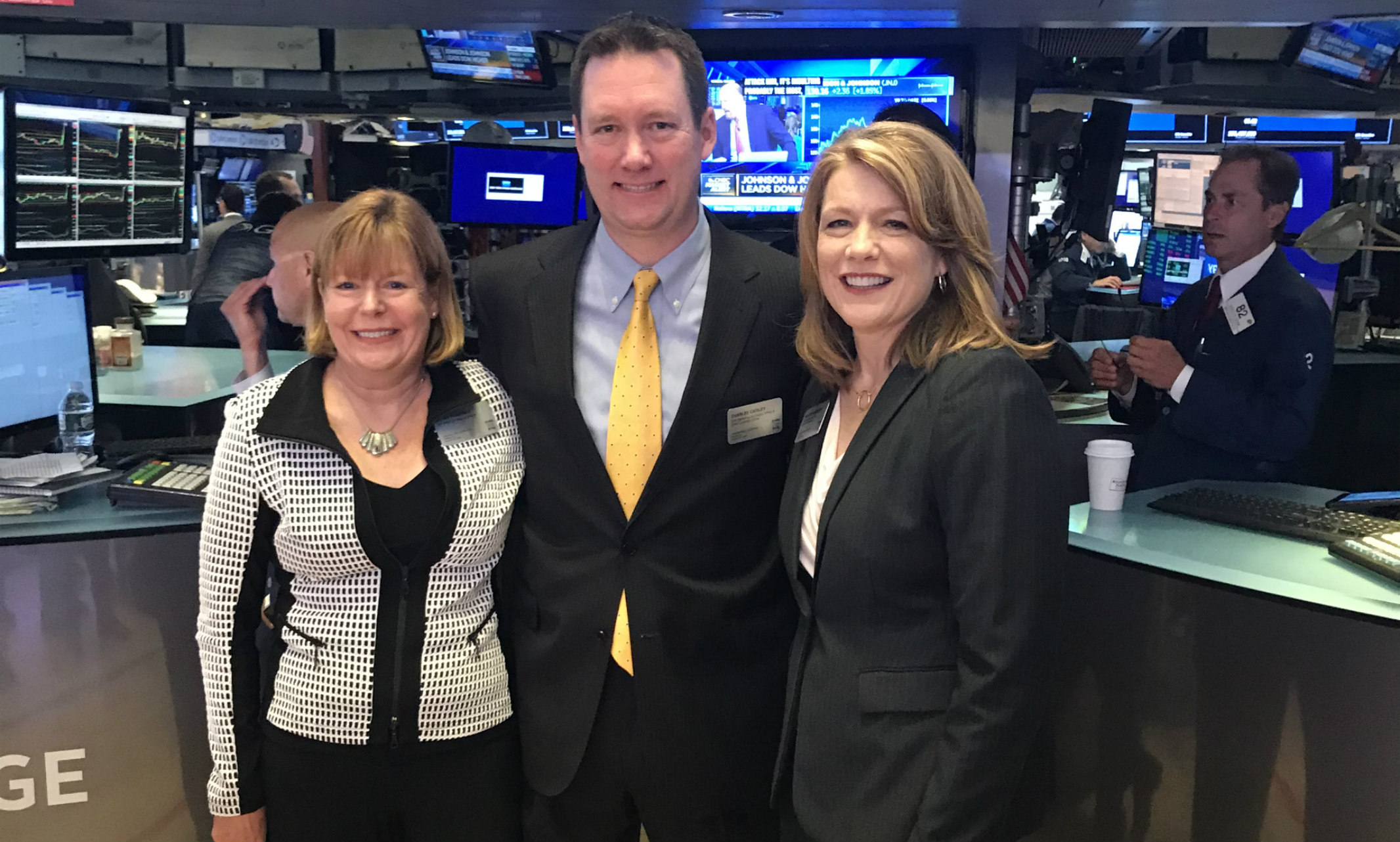
Henry W. Bloch School of Management selects Heather Humphrey to receive Alumni Award
Each year, the UMKC Alumni Association recognizes the achievements of outstanding alumni with an awards celebration. The UMKC Henry W. Bloch School of Management is honoring Heather Humphrey (EMBA ’11) with its Class of 2020 Alumni Achievement Award.
Heather Humphrey(EMBA ’11)
Heather Humphrey oversees all litigation, regulatory and corporate legal matters at Evergy, which serves 1.6 million customers in Kansas and Missouri. She serves as senior vice president, general counsel and corporate secretary for the company, which combined Kansas City Power & Light and Westar Energy.
An active member of the UMKC and Kansas City communities, she currently serves on the UMKC Board of Trustees and Board of Directors of the Greater Kansas City Chamber of Commerce. Humphrey previously served on the boards of Starlight Theatre, The Nelson-Atkins Museum’s Business Council and the Kansas City Friends of Alvin Ailey.
We caught up with her to talk about her experiences as an executive and in community service.
You have a diverse set of responsibilities at Evergy, including overseeing litigation, human resources, facilities and safety. What do you like about having multiple roles? What are the challenges?
Over the years, I’ve had the awesome opportunity to be a part of several functions within the company. The greatest part of that experience is the perspective and insight into the organization and people that is hard to replicate from any single vantage point. There are interesting problems to solve and opportunities for excellence around every corner. When you work with smart and caring people, the challenges really only come from within – time management, disciplined focus and accountability.
You’ve been involved with the Greater Kansas City Chamber of Commerce, Starlight Theatre, Nelson-Atkins Museum and more. Where does your passion for community service stem from?
I didn’t give a whole lot of thought to community service until I moved to Kansas City after law school. I didn’t know a soul in town but really wanted to connect and get involved. I quickly learned the secret of Kansas City is its cumulative devotion to public service. Once I leaned in a little, I was hooked. And it is true – the personal benefit of giving back is at least 10 times the effort contributed.
There are a many worthy causes to support, why do you choose to give back to UMKC?
I’ve seen firsthand what UMKC has to offer and am reminded every day how business and the community in general can benefit from world-class graduates committed to the region. I just want to help in any way I can. The Board of Trustees has such deep talent and experience, I am honored to be a part of the group and will lend my support in every way possible.
How did UMKC prepare you for/contribute to your success?
From the first day of class to the present, I have used and continue to use the knowledge and experience I gained from the UMKC Executive MBA program, both the substance and the relationships. A good part of it, though, is bigger than either of these – in that program, I developed a broader way of thinking. One that can be applied in different ways over and over in life.
What advice do you have for students who’d like to follow in your footsteps?
Work hard, keep (or develop) your sense of humor and don’t take yourself too seriously. Opportunities present themselves to people who engage and who seek out and solve problems. Attitude matters – positivity breeds positivity.
About the Alumni Awards
Join us in honoring Humphrey and the other Class of 2020 Awardees in our first-ever virtual celebration at 5 p.m. April 16. Go to umkcalumni.com/alumniawards to register for this free event. If you are unable to attend the event but would like to donate to student scholarships, contributions can be made online.
Meet the rest of the 2020 UMKC Alumni Awardees
Mar 18, 2021
Washington Post interviews School of Law professor about Qualified Charitable Distributions
Christopher Hoyt, University of Missouri-Kansas City School of Law professor, explained the rationale behind some Qualified Charitable Distributions rules for this article. Read the full article.
Mar 18, 2021
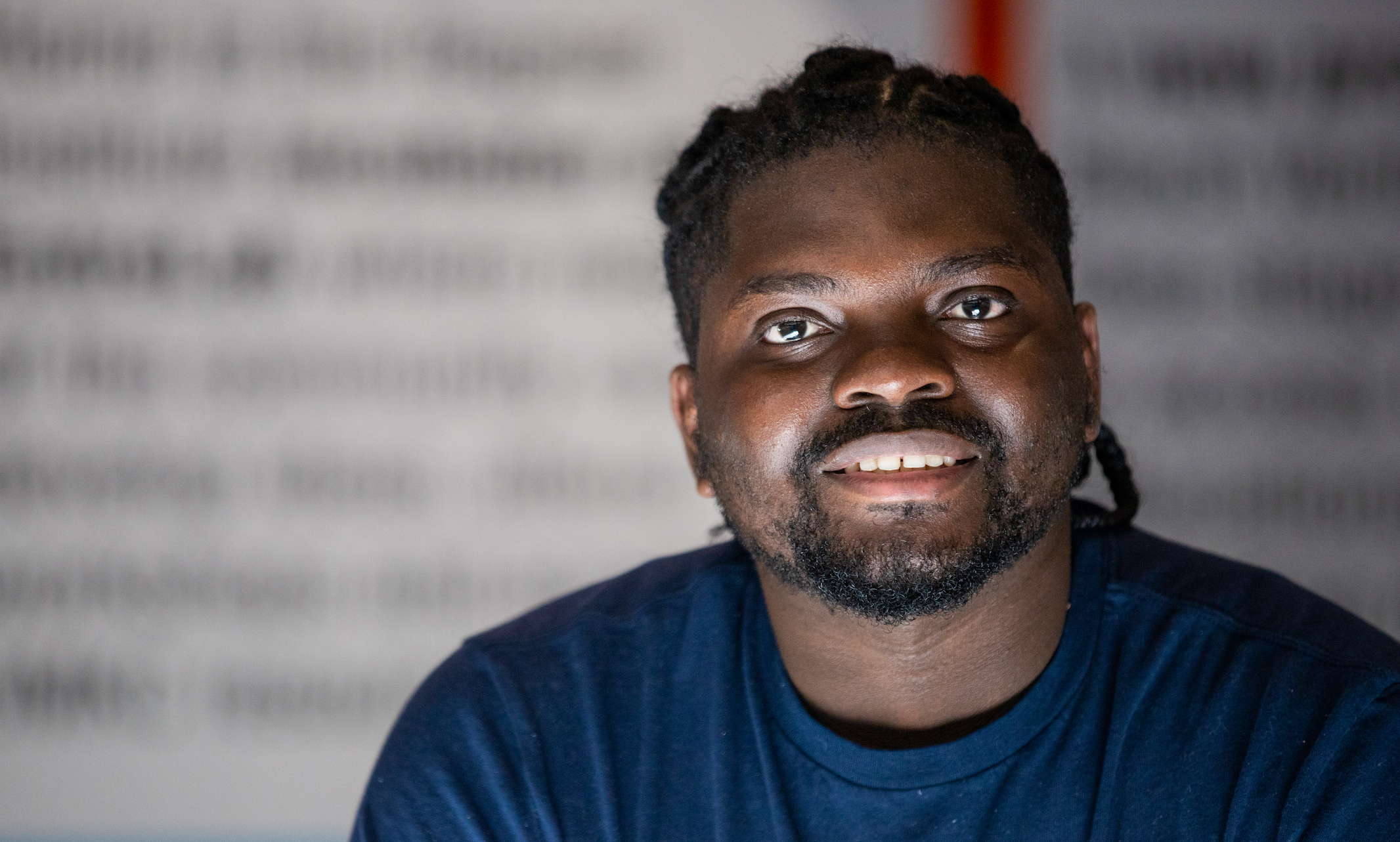
Mentorship and guidance elevate Greg Seaton’s success
Greg Seton immigrated from Ghana where he’d spent most of his young life in a refugee camp. As he prepares for graduate school, education, hard work and mentorship have been the key to Seton’s growing success.
While Seton has found his place in Kansas City, his transition was not an easy one.
“My whole family did not come to the United States,” he says. “My mom, sister and my older brother are still in Africa.”
He and his father moved in with their family members in Kansas City, and Seton felt lucky to have his cousins and other family members for support. He was in the English as a Second Language program at school, which helped with his transition as well.
“There were people interacting from various backgrounds, so I was able to relate to them better,” he says. “Then I was able to branch out from that group. It was a good starting point.”
“As I grew older, I realized that I’m a people person. I like to help people. I like to see them succeed, and I also like to lead.” — Gregory Seton
Finding his way and making the most of opportunities is a skill that Seton has developed. While he was a student at Cristo Rey High School, an urban school in Kansas City that provides college and career preparation to diverse students with economic need, he developed a mentor/mentee relationship with Bill Thompson his sophomore year.
“When I met Greg, he was very quiet,” Thompson says. “He wasn’t involved in many activities, but he had friends and was well-respected and liked. He had a real sense of himself.”
Seton shared stories with Thompson about what his life had been like in Africa.
“He walked two miles to school and stopped to fish for his family’s dinner on the way home. I don’t know anyone who makes better decisions about his life.”
“I don’t know anyone who makes better decisions about his life.” — Bill Thompson
When Seton graduated from Cristo Rey, he and Thompson decided to join Big Brothers and Big Sisters.
“They provide a lot of help with support and resources,” Seton says.
Seton enrolled in Metropolitan Community College and considered schools out of state to complete his degree.
“I had a good advisor who told me I should apply for the Bloch Scholarship. She said, ‘Greg, you are a wonderful student. I see that you are trying and I know you have a great future ahead of you. You should apply for the (Henry W.) Bloch Scholars Program.’”
Seton received a scholarship and began studying business management. He found that the faculty has been incredibly supportive to his success.
“UMKC is awesome,” Seton says. “I can’t interact much on campus just because I work full-time and have a wife and daughter at home. But the people that I’ve met, and the teachers that I have communicated with have all been amazing.”
“I’m learning a lot of real-life skills. I’ll be helping people fix problems. This is the right choice and the right degree.” — Gregory Seton
Before he came to UMKC, Seton had an interest in engineering, but he realized that management makes more sense for him.
“When I was a kid, I was always looking through trash for things I could take apart and see how they worked, which led to my interest in engineering,” he says. “As I grew older, I realized that I’m a people person. I like to help people. I like to see them succeed, and I also like to lead.”
He sees the business world as a way to utilize these skills. Thompson says Seton has always knows what he needs to do.
“I don’t know anyone who makes better decisions about his life,” says Thompson. “I didn’t envision he’d be where he is now, but his future is right there for him.”
Seton seems equally sure of his path to success.
“I enjoy the classes I’m taking,” he says. “I’m learning a lot of real-life skills. I’ll be helping people fix problems. This is the right choice and the right degree.”
Mar 18, 2021
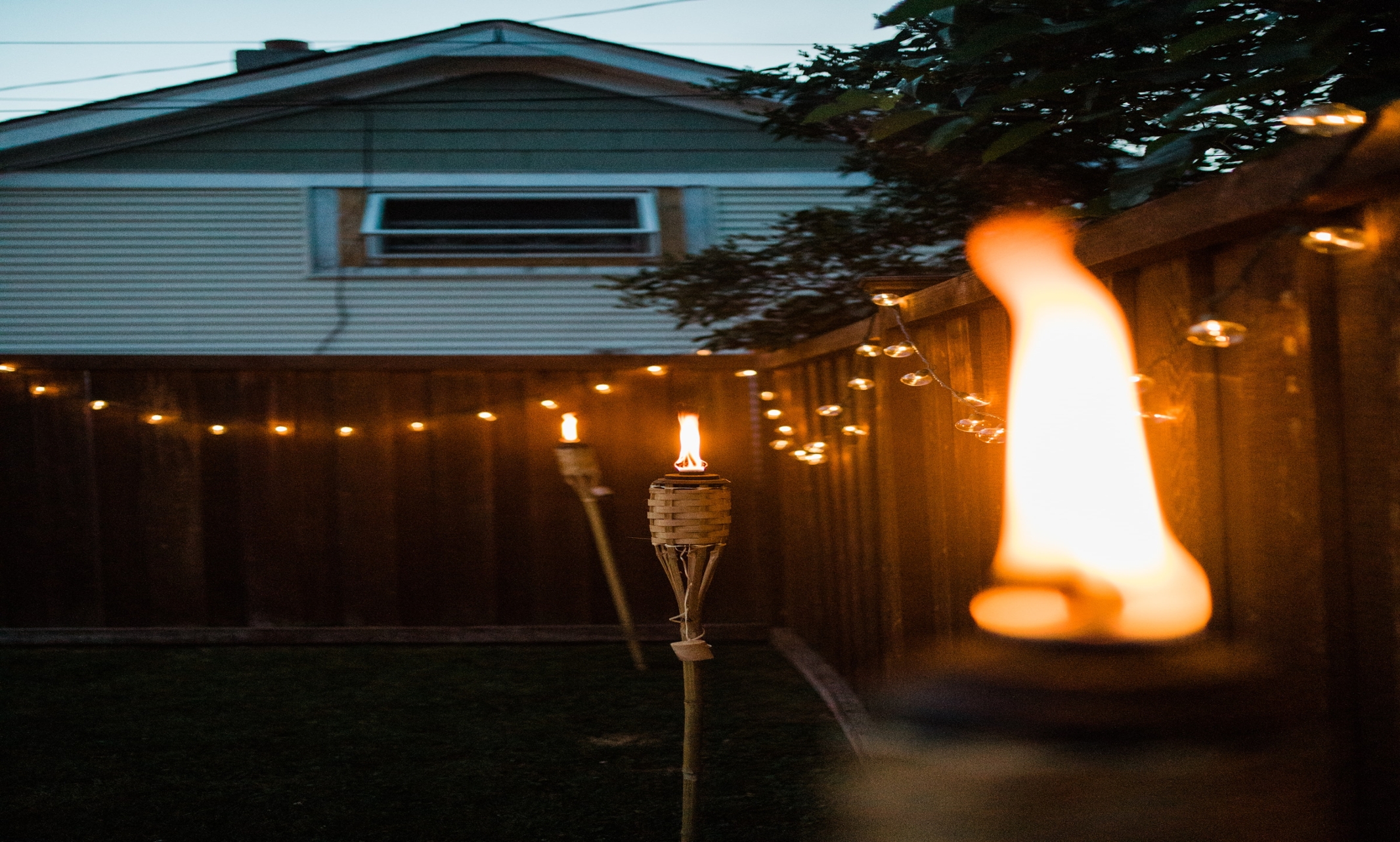
9 ideas on how to have fun wherever you are without going to the beach
While life may be different than the years before, it doesn’t mean you can’t relax and take a well-deserved break right at home! There are a lot of alternatives to traveling or gathering for spring break this year.
As concerned citizens and educated students, it is our job to be responsible and reduce the risk of contracting/spreading COVID-19 during our time apart. Here are a few things I plan to do, along with some helpful tips on how to make the most of Spring Break 2021.
1. Instead of going to a beach, you can bring a tropical oasis to your own room or house!
Decorate your space with string lights, festive tiki torches, beach balls, and make some fruity mocktails in crazy glasses. My roommate and I love to plan themed nights with different snacks and outfits to match accordingly. It’s way cheaper and safer than going out.
2. Need to get out of the house?
Go on an adventure and take Instagram-worthy pictures of the views around you. If you live in the KC metro area, there are lots of places to visit and check out! Some of my favorite areas are over at the Nelson-Atkins Museum of Art and the WWI Memorial by Union Station. Campus also has some neat hidden gems!
3. If you’re a busybody that wants to keep moving, I suggest starting a new craft or hobby.
This is the perfect time to take up running, crocheting, painting, writing, yoga, buy a plant, take a cooking class, learn to play a new instrument, join a student group or organization, volunteer, tutor, and more! Some of my new plants include a monstera my friend recently gifted me and a peace lily my roommate and I named Wall-e. Here’s a picture of them soaking up some indirect sunlight.
4. Deep clean your space!
Whether it be your dorm room, house, apartment, or wherever, spring cleaning is a MUST. I cannot stress this enough. On top of needing to stay tidy and sanitary because of the awful virus going around, it also helps clear your mind and keep you focused. When your space is cluttered, it can be easy for your mind to follow. I know I feel so much better when my area is tidy. Start with something small and have fun with it—blast some of your favorite upbeat tunes and get going! One of my go-to’s is 80’s pop or EDM :)
5. If you must travel, BE SAFE AND BE SMART
Remember to always wear your mask, bring travel sanitizer, wash your hands frequently and don’t make a lot of stops. Road-tripping with someone you live with might be your safest bet if you want to get away. Plan out a route with sight-seeing from your vehicle and try to keep your distance if you are around others for scenic views and landmarks of interest.
6. Tackle that task you’ve been putting off for so long!
We all have one, whether it be fixing the crooked hanging picture, an errand you’ve been meaning to run, re-organizing, unpacking boxes from a recent move (guilty), re-decorating, re-arranging, etc. Schedule that dentist appointment you’ve been meaning to; resources for students are available at UMKC School of Dentistry with free cleanings and more! Order from that new restaurant you’ve been wanting to try, reach out to an advisor or counselor you’ve been meaning to talk to, run that mile you keep saying you’ll do, ask someone out over the phone or try out a new dating app—do something that you’ve been needing to do or never have—and break the cycle! You’d be surprised how great it feels to accomplish something you’ve been wanting to for a while, no matter how small.
7. Take time to RELAX.
Turn off alarms, put phones away and just take time for yourself. Breathe. Sitting in silence and appreciating the little things can do wonders for your mind and help you reset. Lessen your time on social media and strengthen your time with yourself. I personally love to journal and highly suggest starting a gratitude journal. It’s easy to get caught up in the hustle and bustle of the day-to-day; don’t forget to stop and smell the roses.
8. Don’t forget about any assignments and projects assigned or due over break.
You don’t want to come back to more stress. Be sure to update your agenda and calendars with due dates and tasks for each of your courses.
9. Finally, prepare to finish the semester strong.
I don’t know about you, but time always seems to fly by in the spring, especially after break. Next thing you know, it will be May! So, keep at it and enjoy the time off while you can. We got this, Roos!
Mar 16, 2021
KCUR interviews Mary Anne Jackson
“Physician leaders from across our state of Missouri are all on the same bandwagon: we must prioritize our seniors,” says infectious disease specialist Mary Anne Jackson, dean of the University of Missouri-Kansas City School of Medicine. Read more. A similar story ran in The Pitch.
Mar 16, 2021
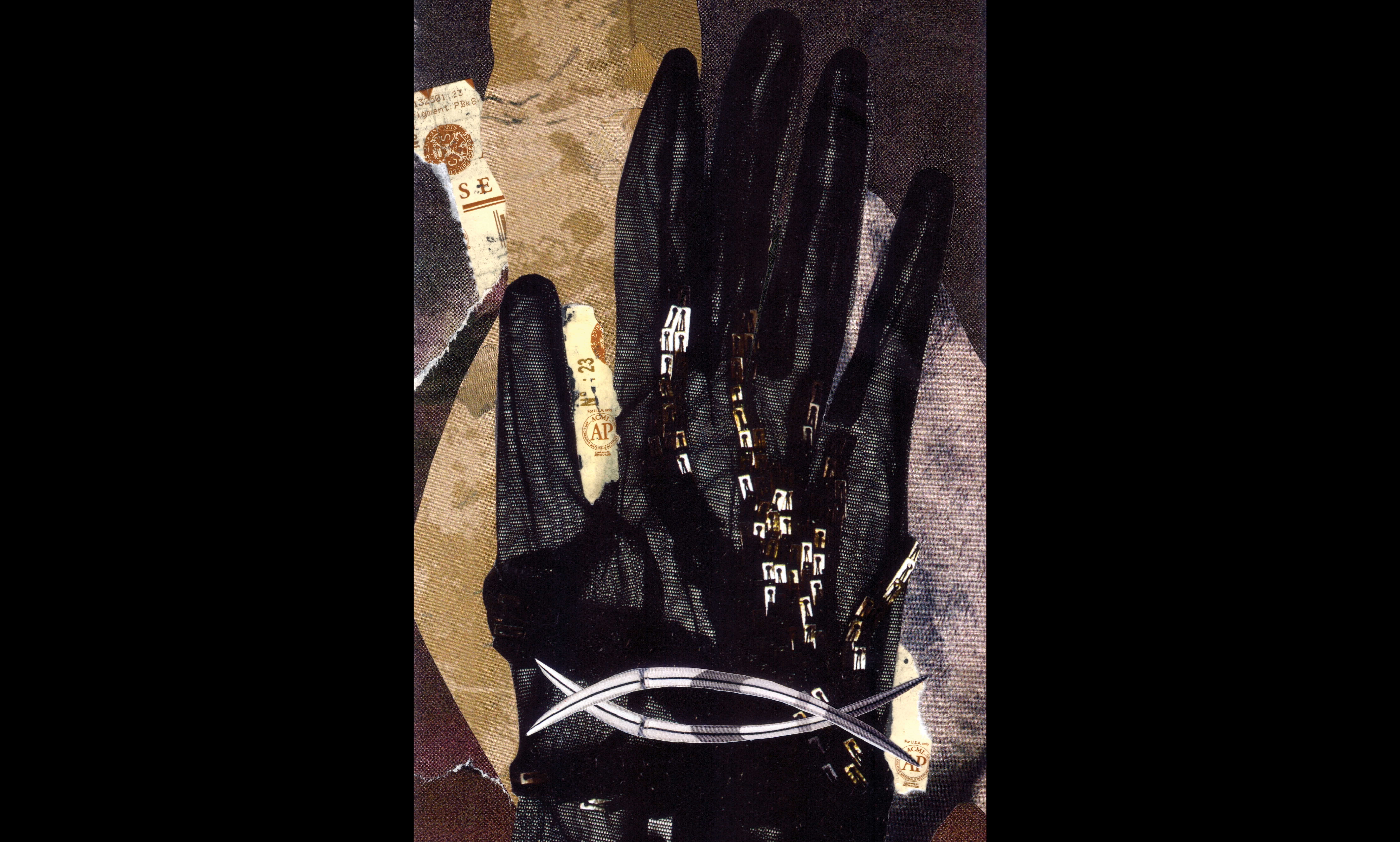
Usually a place of surgical models and data research, this UMKC School of Medicine lab is embracing its artistic side
The Surgical Innovations Lab at the UMKC School of Medicine, led by Gary Sutkin, M.D., was formed in 2016 to better understand how patient safety may be threatened in the operating room and how to make surgery safer. It approaches this mission with an inter-disciplinary team through a multitude of methodologies, including biomedical engineering, ethnography and now art.
A member of Sutkin’s team is Margaret Brommelsiek, Ph.D., associate research professor in the School of Nursing and Health Studies and the School of Medicine. Together, they are collaborating on an art and medicine project called Visual Excavation: Reconstructing Scientific Data into Visual Artifacts.
It was designed to extend the lab’s research data through visualization in the form of artist books. Brommelsiek, who is also a practicing artist, developed the images through mining data contained in the lab’s research protocols relating to quality and safety in the operating room, team communication and interprofessional surgical team interactions.
The importance of the artwork is being recognized by the artistic community as a whole. Brommelsiek and Sutkin have created five books consisting of the pieces accompanied with poems written by Sutkin and Brommelsiek. Those books are now included in the library of the National Museum of Women in Art in Washington, D.C. The institution is the only major museum in the world solely dedicated to championing women through the arts. The library’s collection includes 1,000 unique books and limited editions created by women artists in a variety of formats.
“It’s really an honor to be included in their collection and how artists and art can engage in science,” said Brommelsiek. “Hopefully, these books will inspire other future artists to collaborate in fields outside of the arts.”
By going beyond charts and graphs, Brommelsiek’s art provides a visual narrative documenting the lived experiences of the researchers. Conducting ethnographic studies, her research examines the dynamics within the operating room environment, using a humanities-informed lens and identifying parallels between medicine and art. Her finished pieces, which she describes as abstract, use collage as the primary medium to create an essence of the experiences of research processes.
“Margaret’s art and background have really opened up a window in my mind where I view my research differently and even surgery itself,” said Sutkin, who also serves as associate dean of women’s health at the School of Medicine.
According to Sutkin, this is the lab’s first foray into true art incorporation. “We’ve been making theoretical models and try to make them visual, but this is a new direction for us.”
Much of Sutkin’s research focuses on the use of a trocar, an intimidating surgical instrument used during bladder surgeries where the wrong amount of pressure can lead to dire consequences in female patients. These procedures often require working without visual cues. Through the lab, Sutkin has been able to create a surgical model that mirrors this procedure by mapping pressure used during trocar insertion. An important part of this research was having access to a cadaver.
“I wanted to really capture Dr. Sutkin’s visceral experience of the cadaver,” said Brommelsiek. “The textures, the way the surgeon’s hands were crucial, as well as the instrument itself, even the mesh that is used in the surgeries. It’s not literal, but the essence is captured in the imagery.”
This project took shape when they received funding through the KU Medical Center Frontiers Trailblazer Awards. The program provides financial support to assist with targeted research in a variety of areas of health care.
We thought it would be interesting to take three aspects of our research that had differing perspectives and extend the research data to a visual form,” said Brommelsiek. “How could we visually see the output of the research process and find meaning through a visual lens of expression?”
The backbone of their creative process is conversations around science, but also other fields of shared interest including art, philosophy, literature, films and, of course, health care. It is through this ongoing dialogue that several research protocols have emerged.
“We’ll be discussing some of the science in our research but we’ll also touch on film, visual art or novels that have a relationship to what we’re doing,” said Brommelsiek. “It all feeds into our creative process and how our research is developed.”
Mar 12, 2021
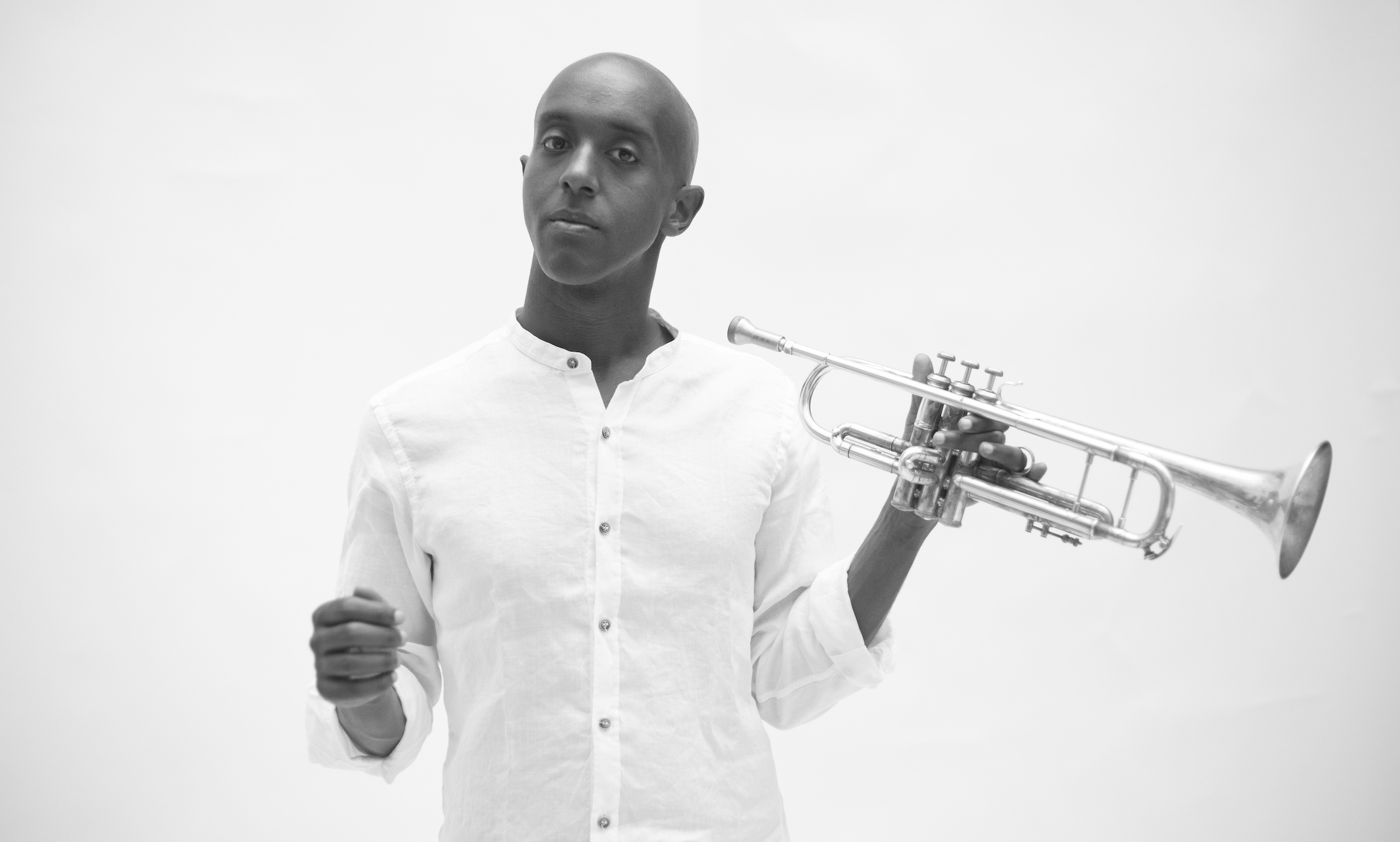
Hermon Mehari hopes to engage listeners with old favorites and new discoveries
Trumpeter Hermon Mehari (BM, ‘10) is launching, “The Session,” a new show on KCUR 89.3 from his home base in Europe. While he has deep roots and high credibility in the jazz world, his show will be a mix of old favorites and new finds.
One of Hermon Mehari’s first musical memories is his aunt giving him the Michael Jackson cassette of “HIStory.”
“I think my first favorite song was ‘You Are Not Alone.’”
While he loved Jackson and grew up listening to a lot of Motown, he did not know he wanted to be a musician until he joined the band in 7th grade. That is when his passion for the trumpet began.
“I started playing the trumpet after about a year,” he says. “I fell in love with improvisation and jazz through my classes in school. I hadn’t known anything about jazz before and started buying records and was very purposeful about it. I was reading about the history and learning the stories of the musicians. It naturally grew into an obsession.”
He had developed a passion for jazz so deep, that he applied to the top three schools known for their jazz programs.
“I was impressed by his spirit and his playing,” - Bobby Watson
“I auditioned at all of them. I got scholarships at all of them,” he says. “Then I received a phone call from Bobby Watson. Bobby is legendary and worked with Art Blakey’s Jazz Messengers. When I got his call, I had an Art Blakey and the Messengers CD on my nightstand and I was looking at it as I talked to him on the phone. He said he wanted me to come to UMKC. And I thought, ‘I want to work with someone who cares enough to call me as a result of my audition. I came to UMKC because of Bobby Watson.”
Bobby Watson, William D. and Mary Grant/Missouri professor of Jazz Studies, had heard Mehari play at a festival the year before he applied to the UMKC Conservatory.
“I was impressed by his spirit and his playing,” Watson says. “I had the chance to talk to him and it was clear he was very industrious. He has a business mind. He’s a natural entrepreneur. Even then he was always hustling, and you have to hustle.”
Once he was at UMKC, Mehari found himself surrounded by incredible musicians.
“I was immediately in a place with people who not only inspired me, but who took us out on the scene immediately. We were connected to the jazz tradition of Kansas City and the older generation that was there. But we learned from each other. I was inspired by my fellow students then and still am.”
Mehari received significant attention for his skills while he was at the Conservatory, including winning the 2008 National Trumpet Competition, but he never considered quitting school to play.
“That wasn’t a question for me,” he says. “I was a good student and my parents, who were refugees, would have been so disappointed if had quit school. In our community you don’t do that. I mean, you also don’t become a musician…”
After graduation Mehari went to Paris to explore the city and get to know the jazz scene.
“I’d been to Europe, but I’d never been to Paris. By the end of 2016 I’d moved there.”
As cities in Europe began to shut down because of the COVID-19 pandemic, Mehari and a few friends had the opportunity to rent a farmhouse in the French countryside. While he was there, he recorded his latest album, “Change for the Dreamlike.”
“I was in a good mental state. I’d written the music and had practiced a lot. I put it out for free on Bandcamp originally, because I knew that a lot of people might not be able to afford it.”
“Radio is meant to make you feel good and that’s my mission with what I do musically on the horn. I want people to feel or feel strongly, but most of all to feel good. That’s the beautiful thing about “The Session.” - Hermon Mehari
As the pandemic wore on, Mehari began to feel the strain. While he comes Kansas City three or four times a year to perform, he’s been unable to come for the last year. That makes strengthening his connection to home through his new show “The Session” on KCUR 89.3 even sweeter.
“Radio is meant to make you feel good and that’s my mission with what I do musically on the horn. I want people to feel or feel strongly, but most of all to feel good. That’s the beautiful thing about “The Session.”
Mehari had never thought he’d do a radio show, but he jumped at the opportunity.
“We’ll be celebrating Black music, which is really cool and important. But I’m also excited to showcase the diversity within this music. Some people may be familiar with jazz, but maybe they don’t know anything about music from Africa or blues, R&B or hip-hop. I want to stretch the listener. The idea is – check this out. Maybe you’ll like it or maybe you’ll like the next one.”
Mehari plans to feature a Kansas City artist in each show as well as new music, obscure music and popular music.
“It’s been really fun,” he says. “I love the curation. There’s a fine balance and I am always aware of having a few songs that are familiar to a wide range of people. The greatest compliment I could receive would be, ‘I never thought I’d like ‘X’ music, but now I realize I do.”
“The Session” with Hermon Mehari airs Saturdays at 7 p.m. CST on KCUR 89.3.
Mar 12, 2021
New music show from KCUR: The Session With Hermon Mehari
Hermon Mehari is a graduate of the UMKC Conservatory. Read more.
Mar 12, 2021

Over the months of the pandemic, alumni and faculty in every corner of health care have responded and adapted with courage and continuing creativity.
When the pandemic hit, nearly every field was affected, from architecture to zoology. In the middle of it all were health -care workers, who faced immense changes while trying to do all they could to stop the spread of the disease and help victims survive and recover.
From clinics and classrooms to research labs and executive offices, our UMKC community has worked to stem the spread of a disease unlike any other in modern history. These Roos — along with countless other UMKC students, alumni, faculty, staff and friends — are making a difference in nursing, medicine, dentistry, pharmaceuticals, health system administration and health facilities engineering, just to name a few areas.
Meet the COVID fighters
Mark Chrisman (B.S. ’02 and M.S. ’07, School of Computing and Engineering; Ph.D. ’19, Interdisciplinary Studies)
Vice president and director of the health care practice at Henderson Engineers, a nationwide firm with 12 offices, including its headquarters in Lenexa, Kansas, and Kansas City, Missouri
Alexander Garza (B.S. ’90, School of Biological and Chemical Sciences)
Incident commander of the St. Louis Metropolitan Pandemic Task Force, chief community health officer of SSM Health system and former chief medical officer for the U.S. Department of Homeland Security
Gina Mullen (M.D. ’11, School of Medicine)
Emergency room physician at Dallas Veterans Administration Hospital and Baylor Medical Center at Uptown
Debra Pankau (M.S.N. ’96 and D.N.P. ’16, School of Nursing and Health Studies)
Clinical assistant professor at the School of Nursing and Health Studies and family nurse practitioner with Northwest Health Services
Janelle Sabo (Pharm.D. ’00, School of Pharmacy)
Global leader for Anti-COVID-19 Therapeutics Platform at Eli Lilly and Company
Ahmed Zarrough, D.D.S. (Faculty, School of Dentistry)
Clinical assistant professor, School of Dentistry, who fielded calls and managed emergency dental cases while the school’s clinics were closed to most patients.
A pandemic’s progression
Like many members of the community, at the beginning of the pandemic our UMKC COVID-19 fighters didn’t dream we’d be where we are today. Each of our alumni and faculty members shared with us how the pandemic has progressed for them and the challenges they’ve faced along the way.
Early 2020
Alexander Garza writes his first situation report on the virus for the 22-hospital SSM Health system. He begins running inventory on his hospital system’s supply of personal protection equipment (PPE).
Janelle Sabo gets a call from an Eli Lilly colleague in clinical research in Shanghai. “There's some sort of virus going around,” the researcher said, “and it's really impacting our ability to continue critical clinical trials in China.”
Gina Mullen says: “Volume [at the emergency room] was down, because I think people were scared to go to the ER." The atmosphere at her VA hospital changed “to like a ghost town.”
March
Many of Mark Chrisman's projects are put on hold, and his company assembles a task force to address the emerging pandemic.
Garza appears on MSNBC to discuss the uptick in COVID-19 cases in the Midwest.
Mullen’s husband, Jim, puts his law career on hold and heads to New York to help with the pandemic response, utilizing his prior training as an emergency room nurse. Mullen picks up night shifts at the VA to help out with the influx of patients.
Debra Pankau's classroom teaching shifts online and students’ clinical hours are put on hold. “When our nursing students couldn’t be in clinic anymore, or a classroom for that matter, we turned on a dime, didn’t miss a day,” she says.
Sabo is put in charge of the team managing data tracking for COVID-19 tests at Eli Lilly. “We turned one of our parking facilities into one of the largest drive-through testing operations in the country,” she says.
Ahmed Zarrough stops seeing all his patients as School of Dentistry clinics close except for the most urgent emergencies.
April–May
The St. Louis Metropolitan Pandemic Task Force is announced, with Garza giving press briefings six days a week for several weeks.
When Mullen’s husband returns to Dallas exhausted, he quarantines in a nearby hotel. “I think that was probably the hardest part,” she says. “Being so close but knowing he couldn't see us.” Afterward, they appear together on CNN’s Anderson Cooper 360 to discuss their experiences during the pandemic.
Zarrough and the rest of the Dental Clinic staff take turns fielding after-hours emergency calls, and since the clinic closed, now every call is “after hours.” Trips into the dental school become almost surreal, “different in almost every way. The school was empty, and I had to make sure security knew I was not an intruder.”
June–July
Chrisman’s local health care engineering projects begin to move forward with new considerations, like how to keep future viral patients separate from non-infected patients. “We presented different options to dozens of clients,” he says. “Can we convert a room to keep possible COVID patients isolated until we get them into a separate room? Can we convert a waiting room just for these people?”
Garza takes on a new title: chief community health officer at SSM Health. His initial sprint to replenish PPE supplies becomes a marathon. His task force begins working to advise school districts on how to reopen classrooms and whether to resume sports programs.
Mullen and her colleagues battle a surge in coronavirus cases in the Dallas area. She helps her COVID patients connect with loved ones by using her own phone to FaceTime their families.
Pankau routinely fields more than 25 daily lab calls about positive COVID-19 tests. She finds herself personally ensuring her infected patients have groceries and medications while isolating.
Sabo begins leading Eli Lilly’s research on drugs to help people recover from COVID-19 or prevent it from developing.
September and beyond
Chrisman and his team continue to pivot their health care engineering projects as the pandemic shows no signs of letting up. “In 2015 with Ebola, health systems often considered changes but didn’t follow through,” he says. “This time I think we will make improvements and be better prepared if this isn’t the last pandemic we see.”
Garza and the St. Louis task force shift focus to planning for how to get the whole region vaccinated efficiently once a vaccine is available, whether that vaccine comes in a matter of weeks, months or even years. As a veteran, Garza reflects that “the similarities between war and a pandemic are eerie.”
A new policy provides some relief to both Mullen and her patients: Each patient is allowed one loved one or family member in their room. “I know that I’m going to be dealing with emergencies all day,” she says. “But as I tell all my patients, I know that 90% of them had no idea they were going to end up in an emergency room, so I do whatever I can to help them and reassure them.”
Pankau reflects on how the pandemic has changed both her and her field, likely forever. “COVID is a horrible thing, but I think many good things will come of this and already have,” she says. “Our online teaching and testing have improved, and telehealth isn't going to go away, especially as a way to improve rural services.”
Despite the increased stakes and urgency the pandemic brought to her work, Sabo feels grateful for the way her company and many others have responded. “One of the things I have appreciated the most is that [Eli] Lilly was willing to think about this pandemic in a super multifaceted way,” she says. “I’ve been fortunate to be involved in so many of these efforts.”
As fall classes begin, Zarrough begins to see a new silver lining to the pandemic: the slower pace it requires. “Seeing half as many patients gives us as instructors more time to spend with the students and explain things one on one and demonstrate. What we lose in quantity I think we can make up by improving the quality of the students’ learning experience.”
Mar 11, 2021
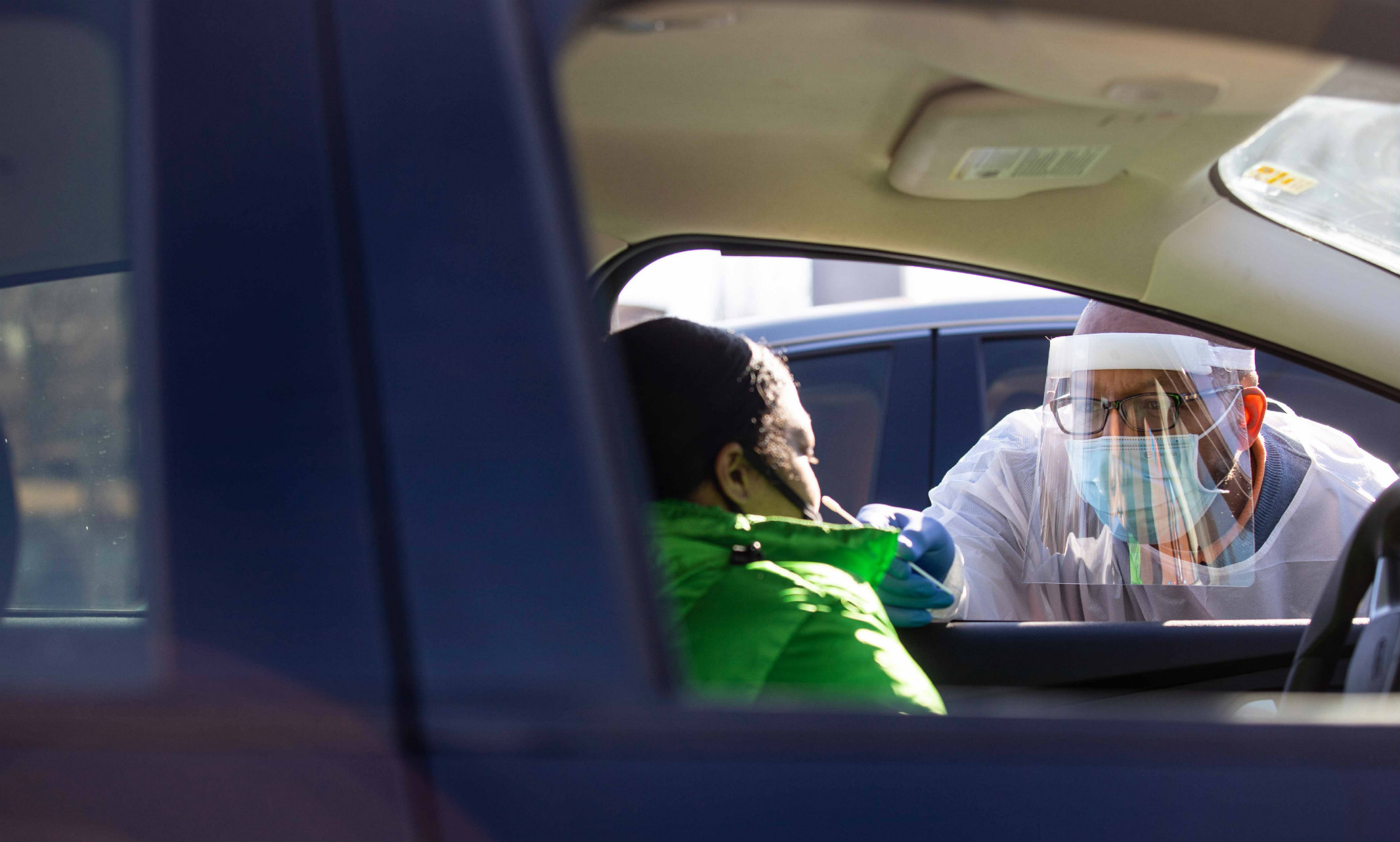
To Obie Austin, they’re both a call to service
In years to come, when you think back on 2020, what moments will stand out?
Perhaps you will remember watching the news, as stories about the coronavirus pandemic increased in volume and severity. Maybe you were sent home from work, or you had to help your children navigate online learning. You might have waited in long lines at the grocery store as people stocked up on toilet paper. Or maybe you got the call that a loved one had fallen ill or even died.
Obie Austin (M.S.N. ’99), School of Nursing and Health Studies graduate and director of UMKC Student Health and Wellness, knows one moment he’ll never forget.
It was late March. Mayor Quinton Lucas had just announced a stay-at-home order for Kansas City, Missouri, closing non-essential businesses and requiring many Kansas Citians to restrict their movement to essential activities like grocery shopping or medical care.
As he often does in times of stress or uncertainty, Austin started walking.
He walked for nearly three hours, crisscrossing downtown Kansas City. On a sunny, Saturday afternoon — the third day of spring — he saw only three people. Those he did see seemed fearful, like they “didn’t want to breathe the same air” as him.
The stay-at-home order didn’t take effect for several days. It didn’t matter
“It was an eerie, catastrophic feeling,” he says. “To be in an area that’s the bustling pride of the city, and it was shut down.”
It was just one moment in a year that, to Austin, felt increasingly like a science fiction movie.
“We are in a war for the health of our world. It’s a call to service.” – Obie Austin
The starting bell
Early in the pandemic, Austin couldn’t help but think of the H1N1 pandemic that came to the United States nearly a decade earlier, in the spring of 2009. Very quickly, though, he realized the coronavirus was going to be a wildly different experience.
“To me, (H1N1) never became scary,” he says. “This (pandemic) became scary very quickly. I felt like we were living in something we’d only ever read about.”
While the virus spread rapidly through places like New York, Texas and California, Austin could often be found in his office reading. He spent countless hours on the CDC website, trying to stay on top of a virus that is, by its nature, nearly impossible to stay on top of.
In early February, Austin dealt with his first real pandemic crisis: determining how to support a UMKC student who had recently been in China. Did they need to quarantine? If so, where? How would they get access to basic supplies like food, toiletries and internet?
Hours of research, dozens of conversations and a myriad of logistics — all for one student. One quarantine plan. Though the student never developed symptoms, as Austin puts it, “that (first) weekend went on forever.”
“That’s the moment that it clicked for me — this is the beginning,” he says. “And it was just a race from that point on.”
Once the virus reached the Kansas City area, Austin and his team played an even more integral role in the university’s pandemic response efforts. Their work became all hands on deck, pulling in faculty, staff and even students across campus to help track cases and support students who were infected and exposed.
“Things were changing every day ... It was just a whirlwind,” Austin says. “We just thought, ‘This can’t go on forever … I don’t know how we keep this pace going.’ That was a year ago.”
Then, the Navy called. They wanted Austin — a combat veteran who served in both the Navy and Army — on the front lines in New York.
Immediately, he began preparing his family, his staff and the UMKC COVID-19 task force for the possibility that he would be deployed. He didn’t know when he’d be called up — in a few days, a few weeks or perhaps not at all — adding uncertainty to an already stressful situation.
“Everything in me wanted to go,” Austin says, but his obligations at work and at home were also top of mind. “My wife was very scared of me going to New York, and she’s lived through me going away to a combat zone,” he says. “I felt this overwhelming sense of responsibility and guilt at the same time.”
In the end, Austin was never deployed. While it was hard to watch fellow health-care workers struggling on the front lines, Austin didn’t yet realize how much he would be needed at home, both personally and professionally.
A sprint becomes a marathon
As spring turned to summer, it became clear that the pandemic was getting worse, not better. Austin and his team worked around the clock to track cases and support students who needed to quarantine. On team calls, he began to notice the fatigue on his colleagues’ faces.
Meanwhile, like everyone else, Austin was feeling the pandemic’s effects in his personal life. He watched as, one by one, his daughter’s high school activities were canceled. Visits to his mother changed drastically, reduced to a masked exchange of groceries and supplies outside her apartment.
Outrage following the police killing of George Floyd added to the feeling of unrest. Across the country, people engaged in protests against Floyd’s killing and systemic racism. Blocks from Austin’s office, protesters and police engaged in a nightly standoff, tear gas wafting over a scene that Kansas Citians were more used to seeing in historical documentaries than in their own local newscasts.
To Austin, it all seemed to be building to some sort of unknown pressure point.
“It’s like the year that just kept giving,” Austin says. “Actually, I’m going to say it was the year that just kept taking — it wasn’t giving anything.”
Even 30 years in health care and multiple military deployments couldn't fully prepare him for the experience. And as a former critical-care nurse, he can only imagine what fellow health-care workers on the front lines are going through.
“I’ve worked in environments where people die a lot. I understand the toll that even one death can have,” he says. “So imagining all these folks trying to keep people alive and them still dying… I can understand the helplessness and the hopelessness in it.”
When asked how battling a pandemic compares with facing actual battles during his military deployments, Austin cites one major similarity: In both the pandemic and military combat, people die without their families holding their hands.
“I hope we gain more respect for relationships and the importance of the lives of others…I think we’ll be better. We always are.” – Obie Austin
The final push
Despite the collective trauma and fatigue caused by the pandemic, Austin says there is still much room for hope. At the time of this interview at the beginning of 2021, millions of doses of COVID-19 vaccines were headed to communities across the country. Some of his staff had already been vaccinated, and he planned to get the shot in the coming weeks.
To Austin, getting vaccinated is much more than a simple health decision — it’s a natural extension of the military and medical oaths he’s taken.
“We are in a war for the health of our world,” he says. “For me, getting the vaccination is a call to service because I feel like I have a duty to make sure this pandemic gets under control.”
Though the road to recovery will be long, Austin doesn’t discount the good things that have arisen out of this experience. He’s watched students support their peers who’ve come down with COVID-19. He’s witnessed the outpouring of support for health-care and other essential workers. He’s been able to spend more time with his daughter.
When COVID-19 is finally in the rearview, he hopes it will have taught us to take better care of each other.
“I hope we gain more respect for relationships and the importance of the lives of others,” he says. “I think we’ll be better. We always are.”
Mar 11, 2021
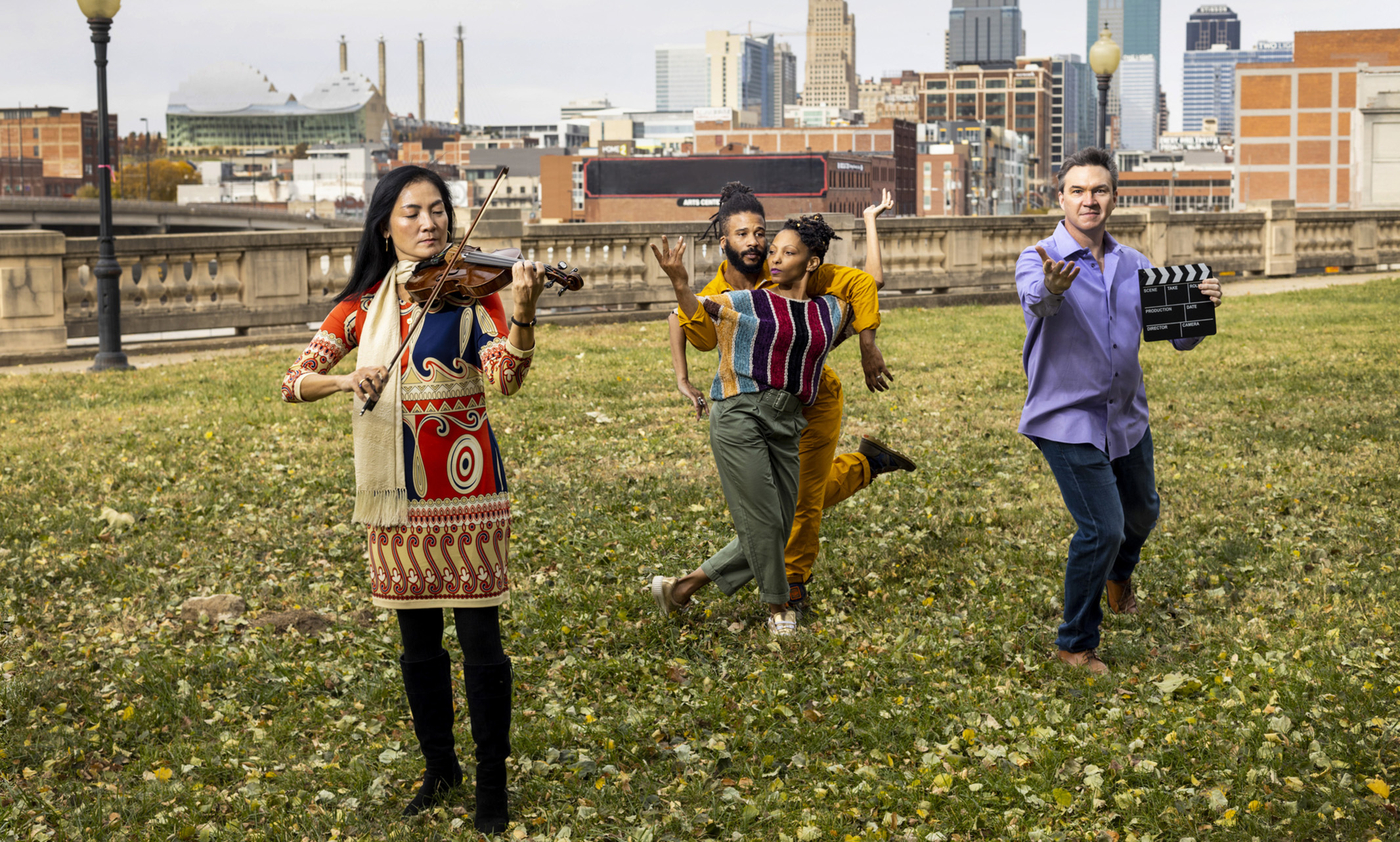
Performing arts alumni find new ways to reach audiences during pandemic shutdowns
It was the perfect Saturday afternoon in September. The sun was shining and the weather was still fine for short sleeves. Violinist and Conservatory alumna Elizabeth Suh Lane (B.M.) and her fellow musicians assembled under the shade of nearby trees to perform a community concert of chamber music ranging from Bach to Piazzolla.
A small but inspired crowd, socially distanced and masked as necessary, spread out to enjoy the free, nearly hour-long performance at Southmoreland Park near Kansas City’s iconic The Nelson-Atkins Museum of Art.
COVID-19 may have changed how things are done in the performing arts world, but Suh Lane is just one of many UMKC alumni finding new ways to bring their artistry to audiences.
“It has not stopped us,” says Suh Lane, founder and artistic director of the Bach Aria Soloists, which is hosting regular performances in a variety of live and online formats. “We are still performing. ... We’ve just pivoted the way we’re doing it.”
“We are seeing a significant increase in performance videos online to keep audiences connected. ... But it doesn’t replace the income needed for organizations to survive. We have to remember to support them through this time.” – Jane Chu (Honorary Doctorate ’10), advisor on the arts for PBS and former chair of the National Endowment for the Arts
Conservatory alumni Winston Dynamite Brown (B.F.A. ’04) and his wife Latra Ann Wilson (B.F.A. ’05) started a dance company in New York City — TheDynamitExperience — in 2018. Like many dance companies, when COVID struck Brown and Wilson had to close the doors. They moved back to Kansas City and spent the summer collaborating with other organizations.
“If there is a silver lining in this remote creativity, it’s that we’re able to branch out and reach a demographic that we wouldn’t have access to before,” Brown says. “We’re taking it outside to continue working and recording it. We’re just trying to survive this the best we can.”
UMKC theatre graduate Miles McMahon (M.F.A. ’96) has also adjusted to continue practicing his craft. The founder and instructor of Kansas City children’s theater company Theatre of the Imagination, McMahon not only took his instruction online, but performed socially distanced drama shows for other camps, many of which included the children of first responders.
“I’m an actor with a job during a pandemic,” McMahon says. “It really is about adaptation and I'm learning every day.”
That’s the key, says Suh Lane, whose ensemble had been invited to perform in Lincoln, Nebraska, in early 2020. When the pandemic hit, concert organizers asked if they would perform a virtual concert. Suh Lane agreed enthusiastically.
“Our musicians feel blessed that we can continue like this and do it safely,” Suh Lane says. “We're still offering live music, and people can be a part of it.”
Brown was recently commissioned to work with Adelphi University in New York on a six to seven-week dance project. Most of the work will take place remotely from Kansas City, but he’ll also be able to have two of his dancers assist him.
“This is a way for me to continue to create and to help them financially. It’s a way to help my creative community,” he says.
McMahon and his students are staying positive as well. Using cell phone cameras, the students created their own silly commercials and short, scripted productions. They’ve become such a hit that Nickelodeon called asking his students for virtual auditions. An internet production company in Australia even purchased one of their scripts.
"We sold it for $25, so every kid in that class got $2.50. They were so excited,” McMahon says. “Often, times of great adversity produce great art. And so here we are, the Kansas City theater community, doing our best to keep the performing arts alive during this challenging time.”
Mar 11, 2021
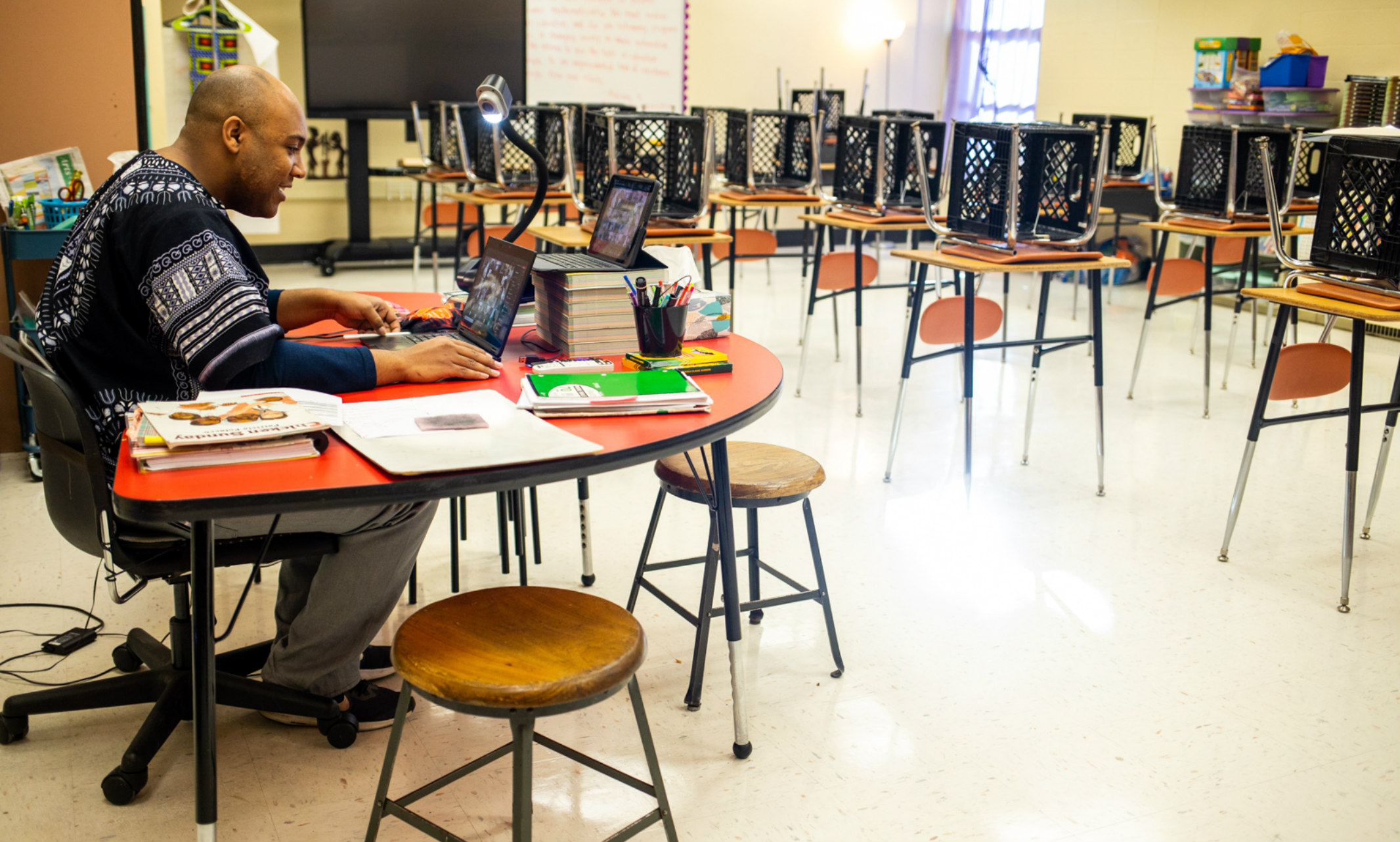
How teachers and students are adjusting to a very new normal
The COVID-19 pandemic interrupted life as we knew it, caused the world to collectively pause and, eventually, shift to a new normal.
Its specific effects, however, are not universal. It has caused varying challenges for people of all generations, social classes and walks of life, especially teachers and children as the shift to online learning brought to light a new set of challenges — and opportunities.
We spoke to two of UMKC’s many alumni working to juggle different teaching formats, student needs, technology requirements and more in their classrooms about what the experience has been like — both for them and for their students.
Adapting to the new normal
For School of Education alumni Marquis Hall (B.A.’16; M.A. ’19) and Deborah Siebern-Dennis (B.A. ’05), the pandemic has created very different realities for their classrooms.
Hall teaches at African-Centered College Preparatory Academy, which uses African-based projects to provide a unique cultural education to students in Pre-Kindergarten through 8th grade. Located in the heart of the Kansas City, Missouri School District, the academy was 100% online in Fall 2020 due to COVID-19.
Though it’s been difficult for Hall’s students to be separated from their friends and in-person help, he says they’re staying resilient.
“They can do anything,” Hall says. “They grew up using technology, so some of these kids can use it better than their teachers!”
Siebern-Dennis is a 7th grade science teacher at Bode Middle School in St. Joseph, Missouri, outside Kansas City’s urban core. As of late 2020, her classroom was in a hybrid model, meaning that in any given class period, she was teaching half of her students in person, with the other half tuning in online via Zoom.
“The biggest struggle has been to try to find a balance between giving my in-class students the attention they need while also providing my online students the same amount of attention during the same class period,” Siebern-Dennis says. “We are basically running two classrooms at the same time, and I just worry that my students are falling behind.”
Deborah Siebern-Dennis (B.A. ’05) is a 7th grade science teacher at Bode Middle School in St. Joseph, Missouri, outside Kansas City’s urban core. As of late 2020, her classroom was in a hybrid model, meaning that in any given class period, she was teaching half of her students in person, with the other half tuning in online via Zoom.
Virtual learning for every student
Both Siebern-Dennis and Hall agree that a difficult situation becomes even harder when students are facing challenges from food insecurity to access to technology. School districts spent the weeks leading up to the Fall 2020 school year racing to source laptops and internet hotspots to families in need.
Yet, for both alumni, it helps that the parent-teacher partnership is better than ever, allowing them to find innovative ways to reach students — whether they’re at home or in the classroom.
“We are in such an educational unknown right now that I feel the best way to support our students and families is to make the best out of our 'new normal' and remain as positive as possible,” Siebern-Dennis says.
“One thing I’ve learned is that you can’t take an in-person classroom and expect it to work online,” Hall says. “We have the opportunity to get creative in the way we teach.”
He’s reinvited his classroom structure and found various ways to incorporate much-needed interaction through morning breakfast, small groups and YouTube videos related to the lesson.
Heavily reliant on video creation for science labs, Siebern-Dennis spent the beginning of the school year pre-recording demonstrations and encouraging students to make predictions on what would happen next. Now that her school has shifted to a hybrid model, though, she’s re-strategizing how to engage both online and classroom students in lab activities.
Where we go from here
So after quite an interesting year, what do our alumni educators hope for the future of education?
“I’m hoping we can give our students more flexibility and grace,” says Hall. “In elementary school, we’re way too tied to standards and outcomes. Moving students academically is the goal, but we’ve learned that there’s so much more we need to be doing for them. We need to make sure we’re meeting the whole child.”
“Ideally, I want my kids (in person) every day! But I’ve seen that there are kids who learn better virtually,” Siebern-Dennis says. “The more options we have, the more we can help them in the way that they learn best.”
Mar 11, 2021
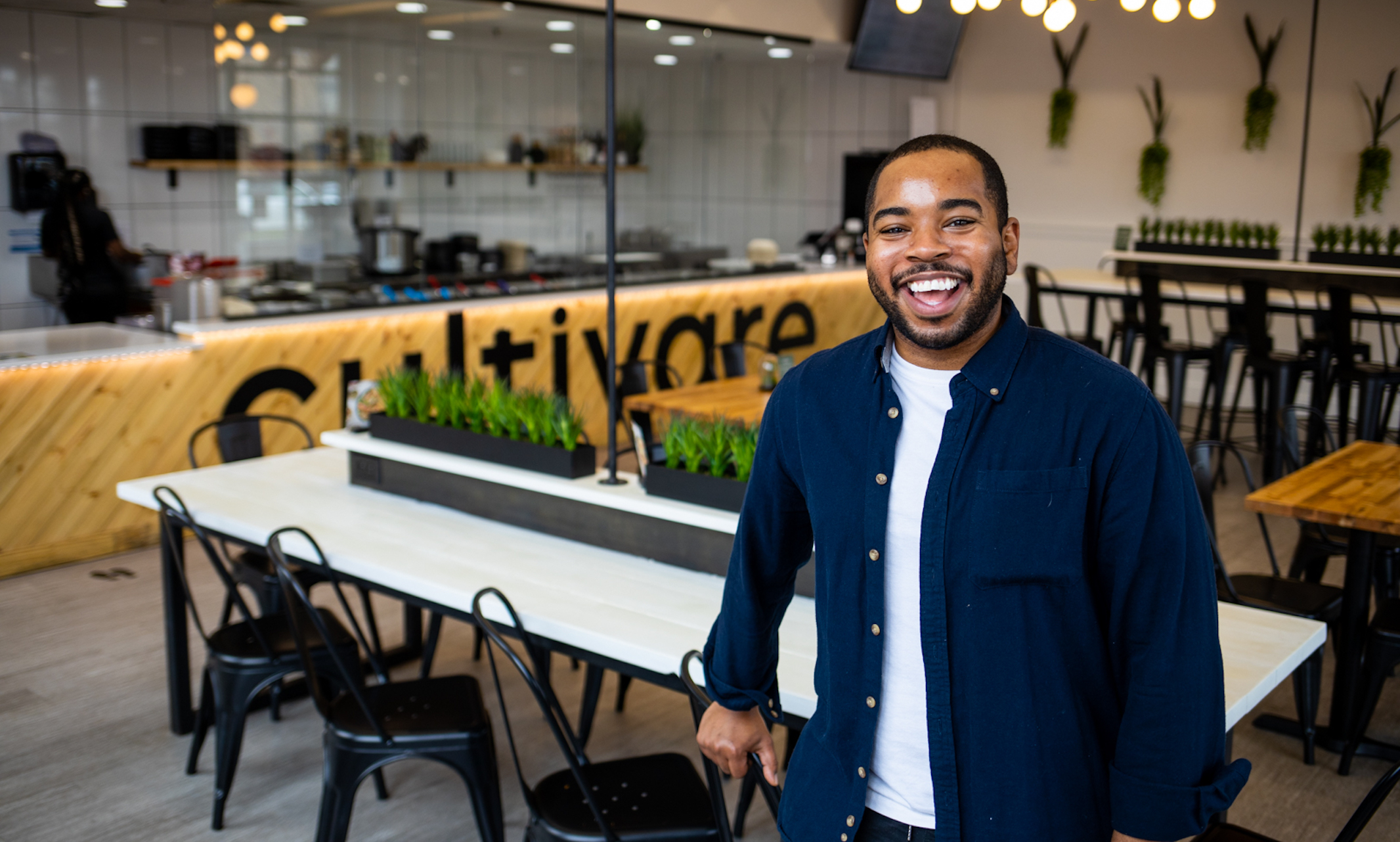
Ingenuity and flexibility are key for food and event service businesses
to survive the pandemic
While all businesses have been deeply affected by the COVID-19 pandemic, restaurants, bars and their suppliers face the challenge of simultaneously staying afloat financially, keeping people safe and trying to provide their customers the quality and experience that makes dining out or carrying out both respite and an everyday celebration.
We spoke to three of the many UMKC alumni working to keep their businesses afloat about the innovations that have kept them in the game.
Kasim Hardaway (B.S. ’15, Arts and Sciences)
Kansas City food influencer and recipe developer Head of research and development, Cultivare restaurant
What was life like for you during the COVID-19 shutdown?
The shutdown was indescribable for my professional life. Prior to the onset of COVID-19, I was seeing a sharp upward trajectory across all of my businesses. I was crushing goals, expanding my client base and even starting new ventures. Immediately upon the shutdown, however, all of that came to an abrupt (and scary) end. I lost over 80% of my contracts and work dried up in a snap.
How have you pivoted during the pandemic to continue to serve customers?
Pivoting during the shutdown was really grounded in being gritty and getting back to basics. I tapped into my network, doubling down on that hustle mentality and extending myself across all my service areas. I put all of my skills to use — collaborating with brands on recipe development, pivoting my food photography to resound with people being at home and offering marketing consulting based on client revenue growth.
I’ve always considered myself a jack of all trades. Being able to tap into one service area that was seeing growth and halting on another that wasn’t gaining traction allowed me to remain flexible but in demand in my sphere of business.
How do you see your restaurant/bar being different in the future because of the pandemic?
With restaurant owners already juggling so much, it is quite a daunting task. While I would love to be optimistic about the reality of the situation, my heart goes out to each and every small, locally-owned concept for the months that lie ahead of us.
Steve Revare (M.A. ’15, Arts and Sciences)
Co-founder, Tom’s Town Distilling Co. in Kansas City, Missouri
What was life like for you during the COVID-19 shutdown?
The early days of the pandemic were chaotic. I’m sure I wasn’t the only one who spent entire nights staring at the ceiling. At that point no one knew much about how people transmitted the virus, so we just did what we thought we should do and shut down. It was the day before the city required businesses to close.
How have you pivoted during the pandemic to continue to serve customers?
Like distilleries across the country, we were able to make hand sanitizer. We donated over a thousand gallons to first responders, prisons and charities across the country and sold enough to keep the lights on until we were able to open back up in June. We were also able to offer four to-go cocktails that highlight our spirits.
When we did open back up, we opened outside. We put up tents, rugs, lounge furniture, and actually put together an amazing atmosphere in our parking lot. We were able to fire up some pre-pandemic partnerships with live entertainment. Thankfully, the feedback has been amazing from day one.
How do you see your restaurant/bar being different in the future because of the pandemic?
We're planning more partnerships with local restaurants. They are serving our spirits in cocktails to go and in cocktail kits, like the Jack Stack Bloody Mary kit. That's some of the good that I hope comes out of this pandemic: Local companies supporting other local companies.
One thing the pandemic has taught me: Even as the world appears to melt down around people, they still like to drink! Our sales at liquor stores have actually increased over last year.
Maria Finn (B.A. ’91, Arts and Sciences)
Writer and chef in the San Francisco Bay area
What was life like for you during the COVID-19 shutdown?
When the shutdown hit, I was chef-in-resident at Stochastic Labs, a residency and incubator for artists, scientists and tech engineers in Berkeley, California, along with writing freelance and crewing on a sailboat. I really enjoyed these jobs, which all ended at the shutdown.
How have you pivoted during the pandemic to continue to serve customers?
I began a meal delivery service for our local community that had a “No Neighbor Left Behind” program with a friend who is a chef. People could donate to buy meals for those who needed it. We had a lot of seniors who couldn’t leave their homes, a single mother getting cancer treatments and others who we were able to provide meals for. We were also able to support local farmers and fishermen during this time, which made me aware of how vital it is to have a resilient local food system.
How do you see your restaurant/bar being different in the future because of the pandemic?
I think we are going to see a lot of creativity when this pandemic lifts. Restaurant people are by nature creative — In 2008, when the economy crashed, what emerged were pop-up food events and food trucks. The overhead is so high in the current restaurant model, and eating out can be prohibitively expensive. The landlords seem to be the only ones doing well with the current model. Emerging restaurants will have lower overhead and more interaction and engagement by the customers.
I also do private dinners in people’s homes, and clients have been setting up small tables outside. We have one person serving so only they touch the utensils, and we all wear masks and gloves. Many people haven’t hired a private chef before and say they really prefer it to going to a restaurant.
Mar 11, 2021
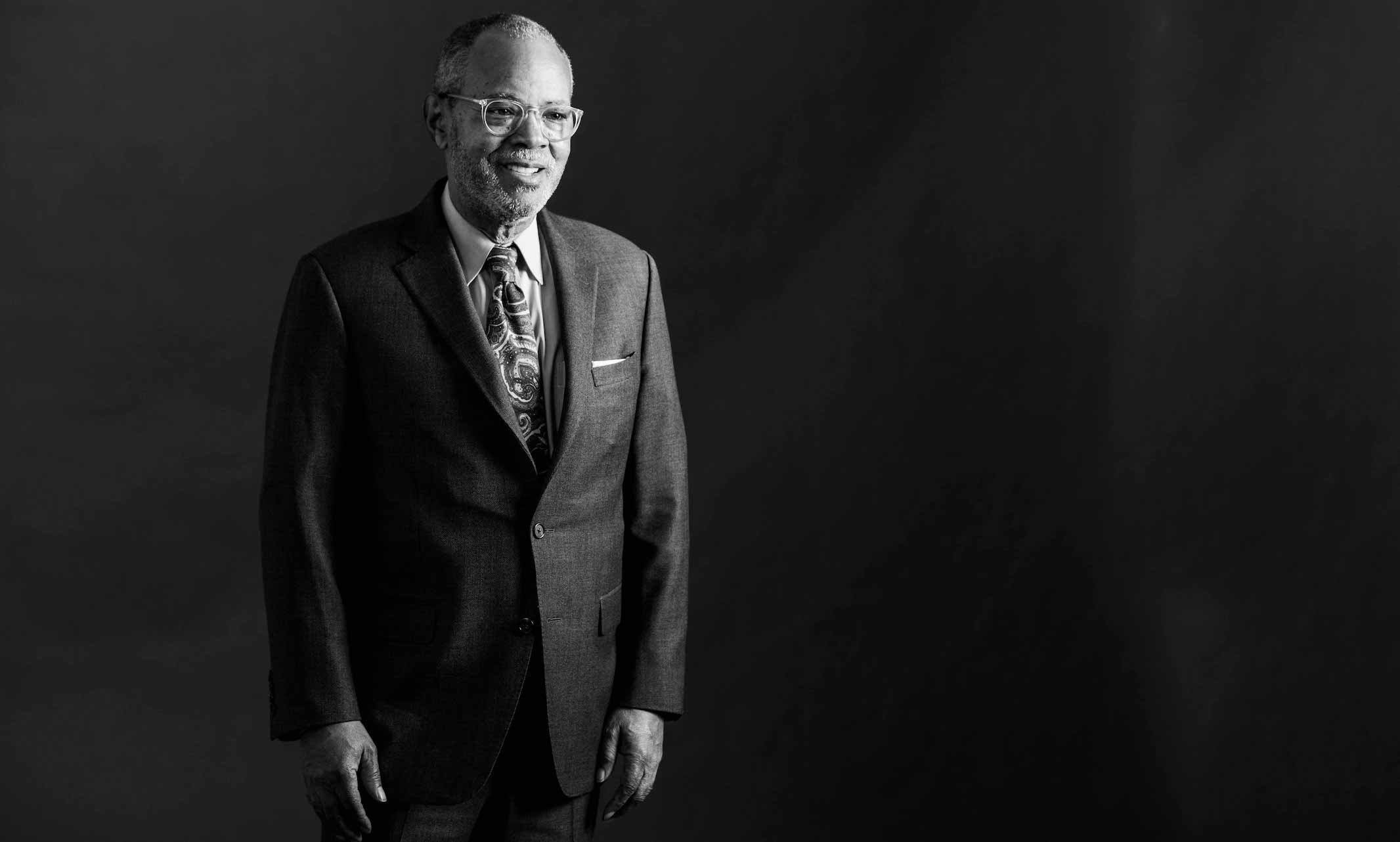
Alumni and students work toward a more ethnically inclusive and equitable future
The death of George Floyd at the hands of Minnesota police in May 2020 set off international protests and focused a spotlight on the Black Lives Matter movement. But for Black people and people of color, it was another reminder of the urgency and foundational change needed to reach racial equality in the United States — an issue so many UMKC alumni are working to address in their careers, communities, homes and day-to-day lives.
We spoke with School of Law alumnus Mark S. Bryant (J.D. ’74), who grew up during the civil rights movement and has spent much of his adult life fighting racism in government, nonprofit work and the private sector. His story sounded very much like the kind of work and activism our alumni and students are doing now — 50 years later.
Using Bryant’s experience as a guide, we’ve examined the parallels between then and now and how our UMKC family is making a difference in the lives of people of color.
Then and now
“The civil rights movement was led by religious and civic leaders and fueled with the energy of young people. The Black Lives Matter movement is led by young people.” — Mark S. Bryant (J.D. ’74)
Bryant was born into a segregated Kansas City and as a child was inspired by his parents. His mother was one of the first Black students admitted to the University of Kansas City (now UMKC) School of Education. His father was a dining car waiter on the Kansas City Southern Belle, “one of the best jobs a Black man could have," Bryant recalls.
When racial segregation was eased in 1959, Bryant's family was one of the first Black families to move south of 27th Street. At first, Bryant was surrounded by white people in his new school and neighborhood, but soon those teachers and students moved — his introduction to “white flight."
He remembers his father discussing politics at the kitchen table and being an early organizer of Freedom, Incorporated, a Kansas City organization that empowers African Americans in the political process. At the time, there were no Black people elected to public office. When Bryant’s father retired, he ran three times against the incumbent state representative for their district. His father never won, and a young Bryant witnessed the pain that it caused. Bryant resolved to get his law degree, enter politics and make his parents proud.
Today, Mahreen Ansari (’22) and Daniel Garcia-Roman (’21) are two UMKC students fighting for equal treatment of all individuals — continuing the work Bryant’s father began so many decades ago.
Mahreen Ansari
Ansari, a political science and international studies major with a pre-law emphasis, serves as president of the Student Government Association and communications director for the College Democrats of Missouri. She’s also a writer for the UMKC chapter of Her Campus, an online magazine for women in college, and a community organizer with the Sunrise Movement of Kansas City, a climate justice organization.
For Ansari, her interest in social justice was really sparked when she left high school, where she’d been surrounded by other BIPOC (Black, indigenous and people of color).
“I was lucky enough to have been somewhat sheltered by going to high school in a district mostly filled with other BIPOC,” she says. “But coming to a [predominantly white institution] I had to come face to face with a lot of things.”
Even in her earliest activism, Ansari saw a long road ahead to achieve lasting change in the realm of racial and social justice.
“It’s going to take a very conscious effort to undo those systems — possibly completely dismantling them — to stop and prevent further harm,” she says.
Daniel Garcia-Roman
Garcia-Roman is a studio art major with plans to earn a master's degree for art education and teach in the Kansas City, Missouri, School District. He is also an artist and volunteers with the Kansas/Missouri Dream Alliance, an organization that serves undocumented youth and encourages cultural exploration through visual arts at the Mattie Rhodes Center.
Garcia-Roman says his interest in activism started close to home.
“My older brother is a DACA [Deferred Action for Childhood Arrivals] recipient, and once he graduated from high school, I realized there are intentional policies in place that hinder his mobility in life,” Garcia-Roman says. “I reflected and found the forces that affected me and the people closest to me were social forces like misogyny, homophobia, xenophobia and racism. And that a small group of people can cause change through activism.”
Making a difference
“You could name and count them by hand … there were so few Black attorneys that I was a novelty.” — Mark S. Bryant
Just as he planned, Bryant became a lawyer and entered public service. After graduating from the UMKC School of Law in 1975, Bryant took a job as assistant public defender.
At the time, he says, he was one of very few Black lawyers in Kansas City. That unique role allowed him to participate in organizations like the Council on Education, Citizens Association, Committee for County Progress and Freedom, Incorporated, but it didn’t keep him from experiencing discrimination.
“Discrimination was most pronounced during encounters with law enforcement," he says. "It didn’t matter if I was driving, flying or boating. I had more encounters with law enforcement than my counterparts, and it was unpleasant."
Bryant served as a Kansas City, Missouri, City Council member from 1983 to 1991 and notably helped resolve decade-long litigation around the Bruce R. Watkins Roadway that had left Kansas City’s 5th district devasted by blight.
Today, Bryant is a land use and public law attorney at Rouse Frets White Goss Gentile Rhodes, P.C. He has also worked with Community Builders of Kansas City, a nonprofit that redevelops areas that lack essential services. With Bryant's help, the organization developed an ambulatory health-care facility, multi-family housing, office buildings and a retail shopping center in the vicinity of Blue Parkway and Cleveland Avenue, projects that, according to Bryant, “had a catalytic affect and transformed an area of Kansas City that was sorely in need of redevelopment.”
Sandra and Jerren Thornhill
Like Bryant, alumna Sandra Thornhill (B.A. ’13, M.P.A. ’17) has served her community in a myriad of ways since graduating from UMKC with both an undergraduate degree in sociology and a Master of Public Administration. She says her young son, Jerren, has been a major source of motivation for her advocacy and racial justice work.
Thornhill collaborates with Shirley’s Kitchen Cabinet, a Black women-led, nonpartisan, nonprofit organization dedicated to amplifying the voices of Black women. She also serves as a community liaison for birth justice advocacy with Uzazi Village, established to decrease maternal and infant health disparities found in the urban core, particularly among African-American women.
Recently, Thornhill worked to get the CROWN (Creating a Respectful and Open World for Natural Hair) Act passed in Kansas City, Missouri. Under the CROWN Act, Kansas City employers cannot implement appearance policies that prevent employees from wearing hairstyles or textures traditionally associated with race. This protects employees from being discriminated against for wearing their hair naturally or in styles such as twists or locs. Kansas City was only the second city in the nation to adopt the policy.
“The CROWN Act makes a huge difference for a couple of reasons: for pride as a Black person and as a measure of protection for the Black community," Thornhill says. "For a city to recognize its racist past and act to protect its most historically marginalized community — the Black community — this begins to allow one to shake the burden of internalized inferiority in exchange for pride in one's full essence of Blackness."
Since childhood, Thornhill has been keenly aware of societal white-washed standards of beauty, often rebelling against them through eccentric expressions of hair and style. Still, Thornhill wondered how her hair would dictate how people treated her at the office. For professional settings, she would sometimes style her hair to mimic white beauty standards.
“The dichotomy I faced was to either embrace my ancestral intuition of beauty, passed down by generations of Black women around me, or to subscribe to society's propaganda in order to climb the corporate ladder," she says.
Latrina Collins
Latrina Collins (B.S. ’93), a UMKC accounting graduate and former director of planning, program development and evaluation at the Full Employment Council, encourages employers to invest in diversity on an internal level, as well
“It is imperative that each company have staff dedicated to diversity, equity and inclusion,” she says. “It is not enough just to hire people of color, but companies must contribute to helping them succeed in terms of leadership development and working with each employee on a plan for success.”
Looking forward
“The color of my skin has, in many respects, defined my identity. The color of my skin determined where I could live, the schools I could attend, our family income, where I could go and what I could aspire to be. The color of my skin often defines a person’s first impression of me. When you are a person of color, it affects nearly every aspect of your life.” — Mark S. Bryant
Even with decades of time between them, Bryant, Ansari, Garcia-Roman, Thornhill and Collins have shared experiences based strictly on the color of their skin. While they are currently enacting change, they agree there is still much work to be done in bridging the equality gap.
“We have to evaluate and change the policies and practices that allow for people to be treated differently in all facets of life — in the workforce, education institutions, criminal justice system, government, health care and so on,” Collins says. “We have to be able to recognize when a system allows for racism, and we have to make those changes immediately.”
Despite the lengths still to go, a vast army of supporters, activists and allies — including many members of the UMKC community — is working to affect real change at every level, from grassroots movements to the highest levels of government.
“I think that through community organizing and legislation we can begin to try and end systemic racism,” Ansari says. “We need organizations that are built around people and their needs that can advocate for and design a better future for everyone.”
As with many movements, change starts on an individual level. Collins believes people should start their own journey with a bit of empathy.
“We have to recognize our own unconscious bias," she says. "You might not experience racism yourself, but step into the shoes of those who have experienced it and understand that it does exist."
Mar 11, 2021

Student composition featured in film festivals
Our ongoing story starts with people from around the world, converging here at UMKC. Get to know our people and you’ll know what UMKC is all about.
Kwan Leung LingAnticipated graduation: 2021Academic program: Master of Music CompositionHometown: Hong Kong, S.A.R.
Kwan Leung Ling, is a composer and performer who is exploring the similarity between contemporary Western music and traditional Asiatic music.
Ling completed his undergraduate work in California, but applied to UMKC to pursue his master’s degree in music composition. He was the first recipient of the James. A. Rothwell Scholarship at the UMKC Conservatory, which he’s received for the past two years.
“Studying at UMKC is a dream for most composers around the world,” Ling says. “We have a world-class composition faculty team.”
Ling says his scholarship has led to unexpected opportunities.
“This scholarship attracted even more attention in the sound design world, and gave me an opportunity to research and apply that knowledge into my current projects,” Ling says. “I am inserting more sound design ideas into my collaborations with artists in different art fields. I believe that this will be the best way of giving back to this honorable scholarship.”
"Studying at UMKC is a dream for most composers around the world. We have a world-class composition faculty team.” - Kwan Leung Ling
Ling came from a traditional music background in Hong Kong. During his first year in the United States, he immersed himself in Western music.
“As a traditional Chinese music instrument performer, I had very little sense of Western music styles,” Ling says. “When I came to the United States, I had two, two-hour commutes. For four hours a day, I immersed myself in Western music. I think that acclimated me to a whole new world of composition.”
Ling says the experience of studying at UMKC has helped him to put his talents to the best use.
“UMKC is such a warm family for their students,” Ling says. “I get inspired every day by talking with professors and classmates. People at UMKC are very respectful of each other's artworks and giving professional feedback. As a composer and performer, I think this is the best way to learn.”
In addition to his solo and duet recordings, Ling has completed two film scores, including the most recent, “24,” an animated film that explores the experience of a man raised in two different cultures. “24” was selected for the Animation Chico Film Festival in California and the Video Art & Experimental Film Festival in New York City last November. The film will screen on March 20 - March 30, 2021 in CINEJOY Virtual Fest.
Mar 10, 2021
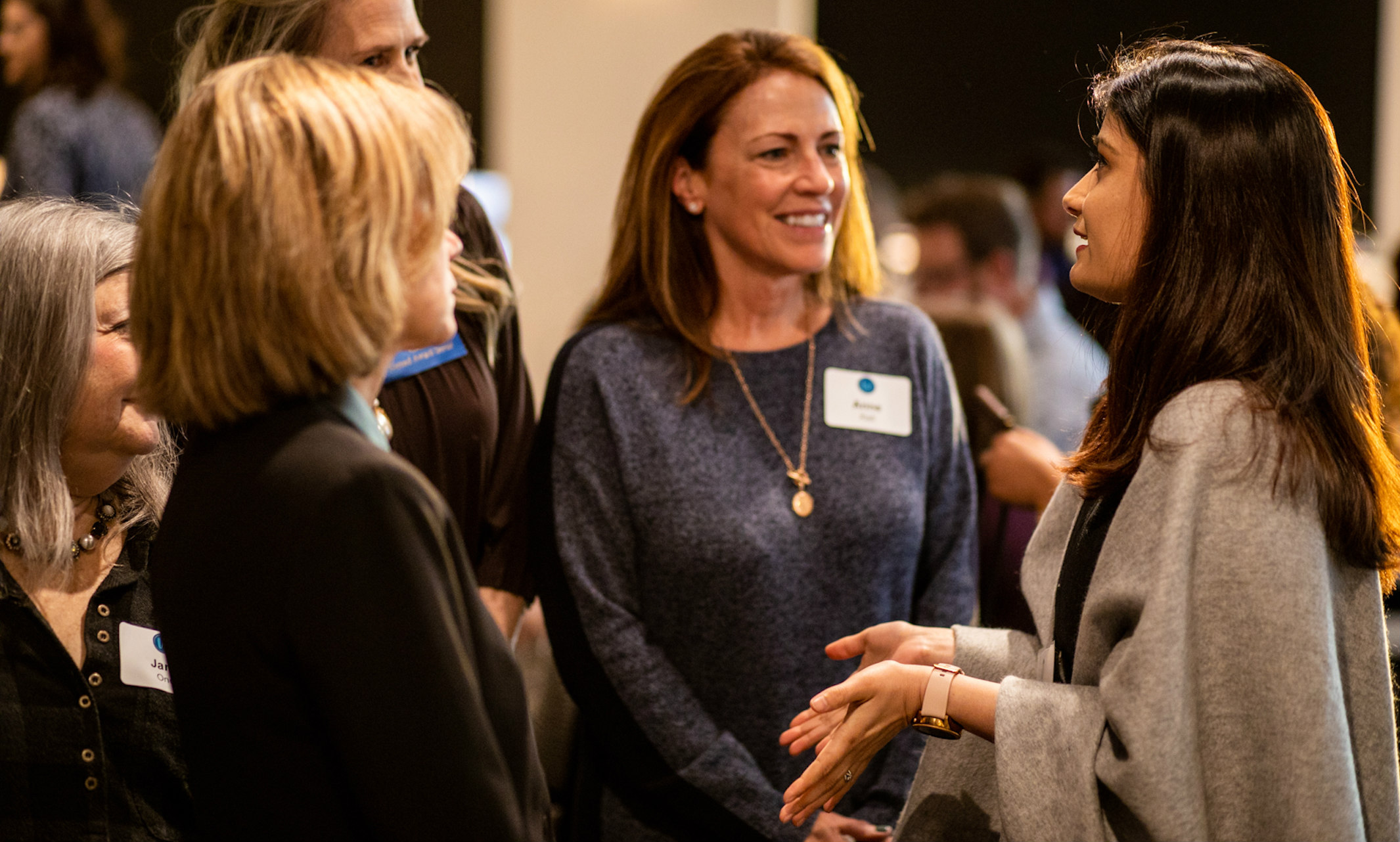
More than 2,000 women have received fellowships totaling more than $2 million
Amiben Ladhawala has been a teacher for 20 years and is working toward her doctorate degree in education. Funding through the UMKC Women’s Council Graduate Assistance Fund will enable Ladhawala to expand her research on how students’ experiences with trauma affect their behavior and ability to learn and the impact it has on teachers.
Lawhawala’s two decades of teaching have given her both experience and insight into the effects of trauma on students.
“When I was working as a special education teacher in an elementary school, I had so many incidents of students who had experienced trauma,” she says. “I worked hard to be a good teacher, but I didn’t know how to help these students.”
Lawhawala wanted to find resources that might help students who experienced trauma and their teachers.
“It was almost secondary trauma,” she says. “I would go home thinking about these students, how to help them, resources that might be available. I talked to other teachers, but I just felt helpless.”
She understands why some teachers may see these students as acting out or indifferent to learning. But she thinks that most teachers want to do a good job and most want to reach those students and help. Lawhawala received an award through the UMKC Women’s Council Graduate Assistance Fund that will allow her to continue her research and potentially improve the classroom experience of children who have experienced trauma and their teachers.
Since its inception in 1971, the UMKC Women’s Council has assisted more than 2,200 women by providing more than $2 million in graduate fellowships. This year, the council awarded more than $95,000 to 70 students.
“The UMKC Women’s Council are women supporting women!” Debbie Brooks (JD ’01), president of the council says. “We are proud of our students who remained undaunted by the Covid-19 pandemic and gracefully used their creativity to advance their research. These women did not allow the global disruption to negatively impact their studies.”
“The UMKC Women’s Council are women supporting women!” - Debbie Brooks, president of the UMKC Women’s Council
Brooks is a former GAF recipient and notes that many of the challenges she faced 20 years ago still exist today.
“We are still a patriarchal society. It can be difficult to complete your dream while you have a family. Many of our women students still have primary responsibility for child care. They are expected to be excellent partners, mothers, employees and students.”
The UMKC Women’s Council will celebrate half a century of supporting women in graduate studies and the 2021 awardees and their academic achievements with a virtual reception on March 11.
Established in 1971, the UMKC Women’s Council Graduate Assistance Fund fellowships support UMKC women working toward post-baccalaureate degrees with up to $2,000 in funds that furthers their completion of graduation requirements and enriches their educational experiences.
Mar 08, 2021
KSHB lists UMKC Pharmacy site for vaccinations
The UMKC School of Pharmacy in Kansas City will receive the vaccine. Read more and watch the newscast.
Mar 06, 2021
Kansas City Star highlights Jannette Berkley-Patton
The Kansas City Star’s special section, On the Vine, will focus on Women’s History Month in March. In the March 4 edition, The Star included a previous story about Jannette Berkley-Patton, a professor in the School of Medicine at the University of Missouri-Kansas City, about her work and research on the role of Black churches in keeping communities healthy. Read more from The Star. (subscription required) The Missouri Independent and The St. Louis American ran similar stories.
Mar 04, 2021
UMKC Forward highlighted in Kansas City Business Journal guest column
This guest column by Ramon Murguia is focused on UMKC Forward. Read the full article. Subscription required.
Mar 04, 2021
Two national media outlets report on research conducted by UMKC professor
Carole McArthur, a professor of oral and craniofacial sciences at the University of Missouri-Kansas City and director of residency research in pathology at the Truman Medical Center, said every new HIV discovery is “another piece in the evolutionary jigsaw puzzle.” Yahoo News and Fox News.
Mar 03, 2021
The Beacon looks at higher education employees and where they rank on states’ vaccine priority schedules
This story is about the goal for universities in Kansas and Missouri professors to offer in-person classes, but higher education employees are low on states’ vaccine priority schedules. The reporter interviewed faculty at multiple universities, including Tom Mardikes, a theater professor at UMKC and chair of the UMKC faculty senate. Mardikes said he thinks UMKC has done a good job of keeping students and teachers safe with protective and sanitizing equipment and distancing measures. In one class, he teaches 25 students in a room designed for 150. Read the full article.
Mar 03, 2021
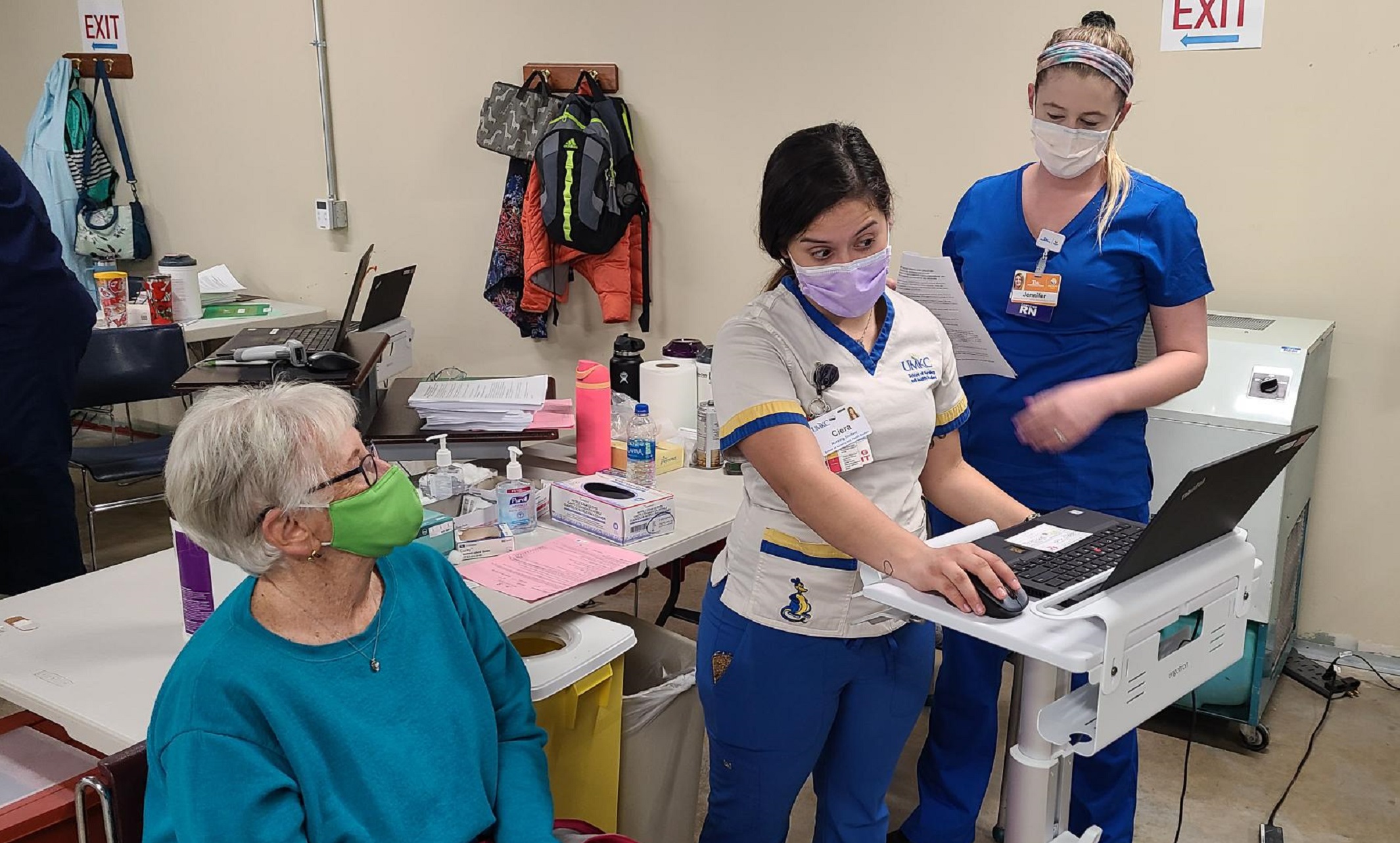
More than 200 are lending much-needed help to efforts around the Kansas City area
When Sally Ellis Fletcher went to get the COVID-19 vaccine, she recognized some of the people administering the shots as students from the UMKC School of Nursing and Health Studies, where Fletcher is the associate dean for students.
And when it was her turn, Ellis Fletcher was happy that a UMKC nursing student was giving her the vaccine.
“This is a powerful point in our history, and these students have a historic role,” Ellis Fletcher said. “Thirty or 50 years from now, when people ask, they will be able to say they were a part of this.”
Ellis Fletcher, who got her vaccine doses at Truman Medical Center in the Health Sciences District, is just one of the hundreds whose inoculations will have been possible in part because of UMKC nursing students.
James Spence, director of the bachelor of science in nursing program, said the school’s roughly 225 BSN students all would contribute to the vaccination efforts at some time.
“Thirty or 50 years from now, when people ask, they will be able to say they were a part of this.”
— Sally Ellis Fletcher, associate dean for students
“Whether it’s with paperwork, parking or actually giving the vaccinations, every one of our students will help,” said Spence. “As the vaccinations ramp up, sites need the extra hands. Our students get course credit and valuable experience in the field, practicing some of the fundamentals. It’s a win for everybody.”
Besides the TMC facility near the school, students help at TMC’s Lakewood location and at North Kansas City Hospital. About 15 students with the volunteer Medical Reserve Corps have worked all over the metropolitan area, Spence said, and a TMC outreach group has had students help at churches, YMCA’s and other Kansas City locations.
Ellis Fletcher added, “This is the first time for these vaccines, and for any vaccines with this type of chemical structure. For our students to be part of such an effort, and during a pandemic, has taken a whole network of faculty and staff, along with the hospitals and other partners. Our students are making a real difference.”
Mar 01, 2021
KCUR interviewed UMKC professor about Kansas City's recent cold snap
Fengpeng Sun, assistant professor in the UMKC Department of Earth and Environmental Sciences, was a guest on Up to Date.
Mar 01, 2021
Kansas City Star features Jannette Berkley-Patton's community work
Jannette Berkley-Patton, a professor in the School of Medicine at the University of Missouri-Kansas City, knew this new virus would pummel a population struggling with persistently high rates of heart disease, diabetes and other chronic illnesses. Read the article. (subscription required)
Feb 28, 2021
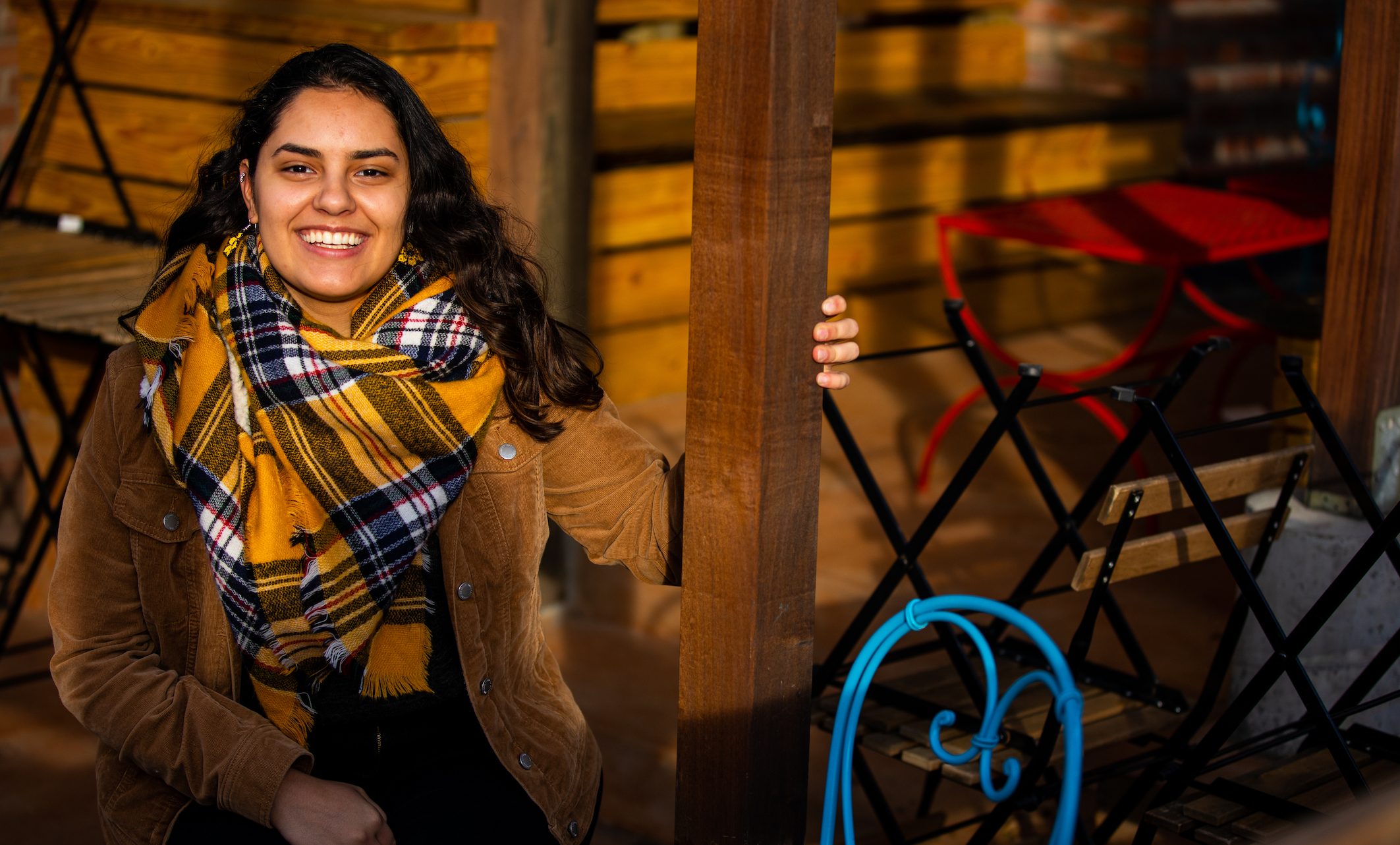
Adriana Suarez says UMKC community is key to success
Our ongoing story starts with people from around the world, converging here at UMKC. Get to know our people and you’ll know what UMKC is all about.
Adriana Suarez
Anticipated graduation: Spring 2023
Academic program: Honors College, Bachelor of Business Administration-Nonprofit Management, minors in Sociology and Latinx and Latin American Studies
Hometown: Kansas City, Kansas
Adriana Suarez started her freshman year living in the dorm, studying, working and hanging out with friends. Soon, the impact of the COVID-19 pandemic began turning everything upside down. Suarez lost her job and moved out of the dorm and in with her sister and was going to school online. Despite the turmoil, she’s focused and committed to finding her way through this challenging time with success.
Why did you choose UMKC?
I grew up in Kansas City, Kansas, and was familiar with UMKC because of the prestige and exposure of the school. It was only when I was awarded a scholarship through KC Scholars that I seriously considered attending the university. One of the main reasons I was attracted to UMKC was the diversity on campus compared to other campuses in the area.
"One of the main reasons I was attracted to UMKC was the diversity on campus compared to other campuses in the area."
Why did you choose your field of study?
Business degrees are very versatile, and I hope I can apply my knowledge of history and the culture of the Latinx community to further develop the Latino voice of the KC metro area.
When I entered college, I joined the Latinx Student Union where I was given the opportunity to listen to speakers present on important topics within the Latinx community. These events led me to discover my own passion for helping others and our growing Latino community.
What are the challenges of the program?
The biggest challenge is finding the intersectionality of each program. I must find ways in which each program can build upon the other to open opportunities to connect with the community not only as a student but also as a community member. The most important part about combining these programs includes adaptability -- I must be able to learn to adapt to changes in the environment that require me to learn skills that aren’t necessarily taught in school.
What are the benefits of the program?
The programs at UMKC are very versatile, and I feel as though I am able to make them my own. I have the chance to explore the business world while also discovering the cultural aspects of my community. The part I am most excited about is studying abroad for the next full academic year. I hope that this experience will challenge me to learn new cultural perspectives in the business world as well as the real world.
How has your college program inspired you?
I feel inspired to do more to help our community. Especially during moments of need like now where we need to lean on our community for support. I feel more inspired than ever to create change that will leave a legacy.
"I have the chance to explore the business world while also discovering cultural aspects of my community."
Since entering college, what have you learned about yourself?
The college experience has definitely built my sense of independence. Realizing what it takes to be an adult, I have discovered a growing sense of responsibility. Every day I aspire to grow as a person.
Attending college has allowed me to grow not only academically, but also creatively. I recently started a small handmade jewelry Instagram account called Xotu Jewelry. A lot of my work is inspired by the Wixárika better known as the Huichol. They are one of the few indigenous tribes in Mexico that have been able to preserve their traditions, while also finding new ways to express their vision of the world through art.
What do you admire most at UMKC?
The thing that I admire most about UMKC is the support system that it has provided me and other students. From faculty and advisors to friends, UMKC does not lack people who want to help. I have had the chance to work with amazing staff and meet people who I know will -- and have already -- made an impact on my life.
What’s the best piece of advice you have ever received from a professor?
Seek advice from only those people who are in the position that you want to be in.
What extracurricular activities are you involved in at UMKC?
I am currently a work-study student at the Multicultural Student Affairs Office on campus. I serve as the project liaison on the Enactus Fundraising Committee and the SAFC Representative on the Bloch School Student Association Committee. I am also a Peer Academic Leader with the UMKC PAL Program where I mentor and support students through their first years at the UMKC.
I am planning on studying abroad in Ireland (Fall 2021) and South Korea (Spring 2022). I participate in various programs on campus such as the Latino Student Union, the Avanzando Mentoring Program as well as the Association of Latino Professionals for America.
Do you have any scholarships?
KC Scholars has provided me the opportunity to attend school at the university level. KC Scholars gave me something set in stone when other parts of my life weren’t going so well. I am forever grateful for the opportunity.
"The thing that I admire most about UMKC is the support system that it has provided me and other students. From faculty and advisors to friends, UMKC does not lack people who want to help."
I am also a Hispanic Development Fund Scholarship recipient. When I was awarded the Hispanic Development Fund Scholarship, I knew that I was entering a “familia” - a family and community of Hispanic community members that cared for the wellbeing of each other and bettering the future.
I was awarded the 2020 Sherman and Irene Dreiseszun Scholarship through UMKC, and the Truman Foundation which will, in the future, contribute to my plans for studying abroad.
What do you hope to take from your experiences at UMKC into your professional career?
I hope that being active on campus through diverse programs will allow me to engage more in the community. I believe these experiences are great for opening doors in the future.
Feb 26, 2021
MSN interviews professor of pediatrics
Panel member Jay Portnoy, professor of pediatrics at the University of Missouri-Kansas City School of Medicine, said the race was on to stop the pandemic before new virus variants cause further disease. Read more.
Feb 26, 2021
She takes over after serving as interim general manager for the last 15 months.
Sarah Morris has been at UMKC since 2004. She takes over as KCUR’s and Classical KC’s general manager after serving as interim general manager for the last 15 months. Read more.
Feb 26, 2021
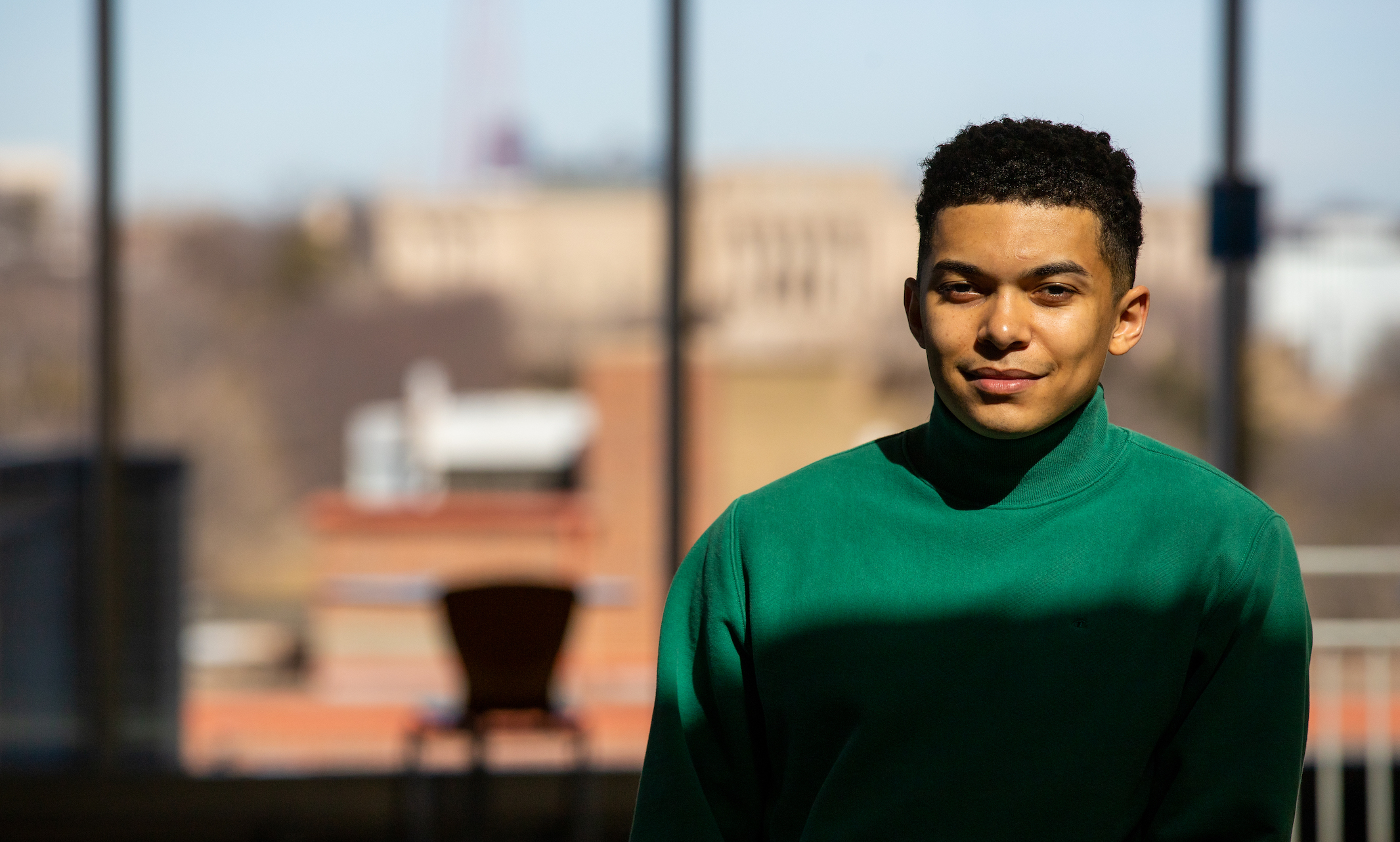
Brandon Henderson chose self-care during stressful period
Our ongoing story starts with people from around the world, converging here at UMKC. Get to know our people and you’ll know what UMKC is all about.
Brandon Henderson Hometown: Kansas City, Missouri High School: North Kansas City High School UMKC degree program: Political Science Anticipated graduation year: December 2021
Brandon Henderson was on a roll. He ran for UMKC Student Government Association (SGA) president last spring because he wanted to serve the student body and help lead through the COVID-19 crisis. In addition, he was interested in politics and wanted to part of the process to help correct issues that have affected society for generations: systemic racism, police brutality, mass incarceration. While he is still devoted to those issues, he decided to take a step back from his position last December. It was not an easy decision, but he’s finding a new definition of success.
"Last Fall I was sprinting. I was trying to do everything and be everything." - Brandon Henderson
“Last fall I was sprinting. I was trying to do everything and be everything,” Henderson says. “For a while it was working. I was doing it. I was going to three different events a week and organizing activities through SGA – like the Critical Conservations event with Mayor Quinton Lucas.”
Henderson was committed to his position.
“I felt as though any minute I wasn’t spending doing something for students was a minute wasted.”
Henderson found he was making less time for personal needs – eating well, sleeping, exercise and school work.
“That's part of the job of being an elected official. You don’t want to disappoint people, and I think I went into it trying to do everything possible not to do that. Then I began to realize that I'm not Superman. I can't fix everything.”
Henderson’s challenge became not being able to say, “No.”
“I kind of rigged the game against myself,” he says. “There was no way I could meet the expectations I’d set for myself, so when I didn’t it just reinforced my negative feelings.”
He found himself thinking that it would be nice to step away from the office, but he didn’t think he could do that. He felt determined to stick it out.
“Then I reminded myself that [former Missouri state legislator and Missouri Secretary of State] Jason Kander, who is someone I look up to, stepped away from his bid for Kansas City mayor because he needed to focus on treatment for post-traumatic stress disorder or PTSD.
And I thought, ‘If he can walk away from that, why can’t walk away from this?’”
Henderson knew that he could have gone through the motions and finished his term.
“But our students deserved somebody in the role who could give 100%.”
“I feel like I’m living my life in the moment. I can be present and appreciate what is happening.”
Mahreen Ansari, (BA ’22) who was the SGA vice president at the time, agreed to assume the role of president.
Calling the SGA officers to tell them each one personally was difficult, but Henderson was relieved once he had spoken to everyone. After resigning, Henderson sought help at the Counseling Center.
“It took a little while to get in, but I met with a counselor and they have so many resources for self-wellness. I would recommend them. I’ve heard from other students that they feel the same stress and anxiety I did. I was worried that I was letting people down, but instead other people saw themselves in me, which is reassuring.”
Henderson is sleeping better, eating better, exercising more and doing better in school. He has two semesters left and is focusing on finishing strong.
“I feel like I’m living my life in the moment. I can be present and appreciate what is happening.”
Feb 25, 2021
NBC News interviews Mary Anne Jackson
Mary Anne Jackson, a pediatric infectious diseases expert and dean of the medical school at the University of Missouri-Kansas City, said state and local officials would need to do more to convince people in several groups that the vaccines are safe and effective. Read the NBC News story, which was picked up by Yahoo News.
Feb 24, 2021
Kansas City Star highlight's Jannette Berkley-Patton’s research
UMKC professor Jannette Berkley-Patton’s research reveals the importance of having Black churches involved in keeping communities healthy. Pastors, she says, are trusted sources of information. Read the full story.
Feb 24, 2021
Bloch School student shares his story with KMBC
Abdurahim Sharif is a VFW scholarship recipient living a life of service. He is a student at the Henry W. Bloch School of Management at UMKC. Read the article and watch the newscast.
Feb 24, 2021
KMBC interviews Beth Vonnahme
“For a lot of folks who join more of these more radical or alternative groups, or believe in conspiracy theories, a lot of it comes back to that notion that, they really want to belong to something that’s bigger than themselves,” said Beth Vonnahme, associate professor, department of political science at University of Missouri-Kansas City. Read the story and watch the newscast.
Feb 23, 2021
The Kansas City Business Journal and Fox4KC talked to Alec Rodgers
Alec Rodgers graduated from UMKC Bloch School last year with a bachelor's of business administration and a double major in finance and entrepreneurship. Read the Kansas City Business Journal article. Read the Fox4KC story and watch the newscast.
Feb 23, 2021
KC Studio features Karen Brown
Karen Brown is an assistant professor of dance at the UMKC Conservatory. Read the article.
Feb 23, 2021
UMKC doctoral student is chosen
Jessica Bassett is currently working to complete her doctorate in education at the University of Missouri-Kansas City. Read the article from the Lawrence Journal-World. (subscription required)
Feb 22, 2021
Sociology professor quoted in MSN article
Michelle Smirnova, an associate professor of sociology at the University of Missouri-Kansas City, told Hill.TV that many Americans still risk becoming homeless during the coronavirus pandemic despite a federal moratorium. Read the full article.
Feb 21, 2021
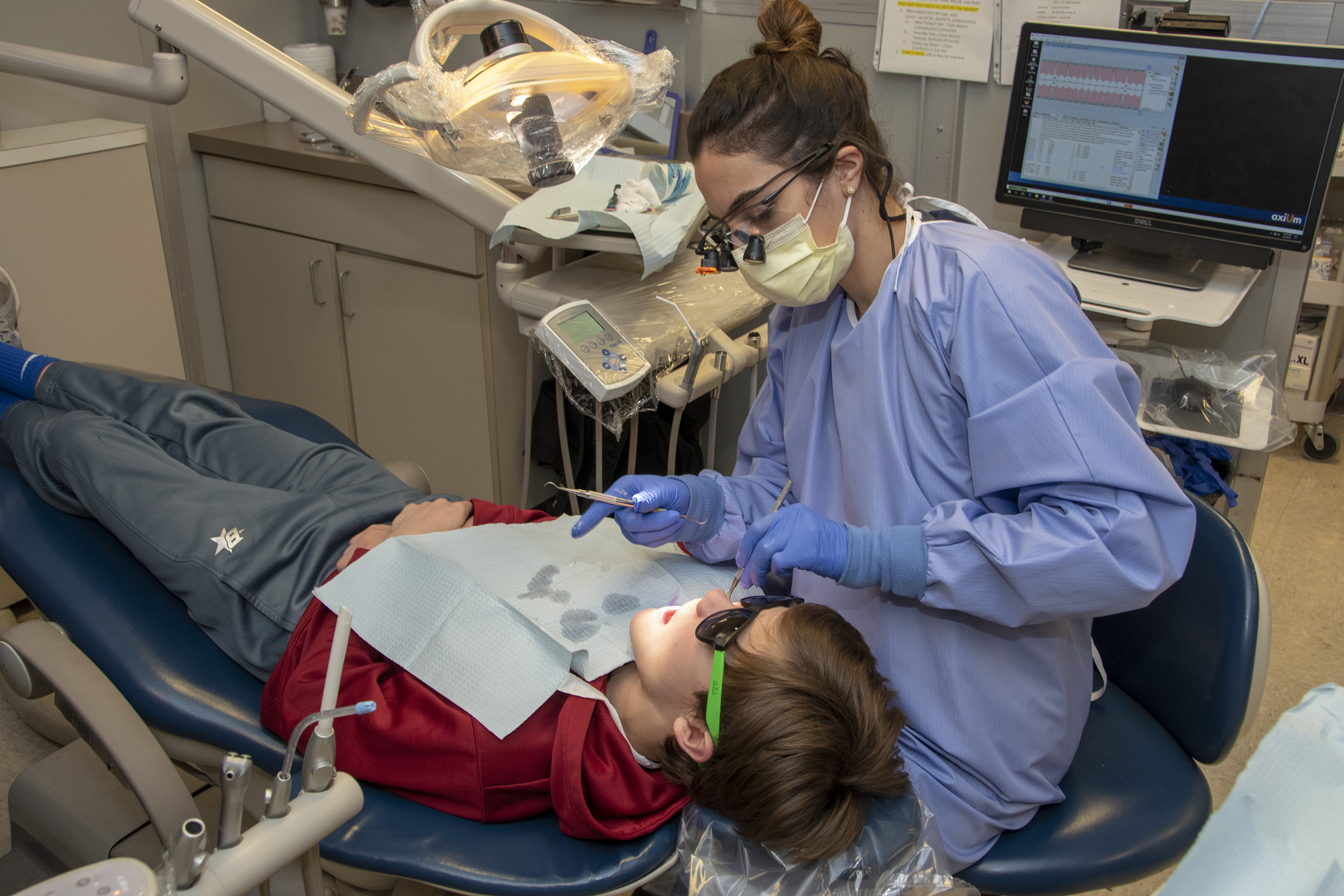
Helping children under 3 receive a healthy start
Taking care of children’s teeth and gums right from the start is a vital part of overall health, so the UMKC School of Dentistry offers a free examination for children under 3 years of age.
The school also for years has participated in Children’s Dental Health Month, an educational effort every February by the American Dental Association.
“We offer the free initial exams year-round in our pediatric clinic,” said Brenda Bohaty, D.D.S., chair of the Department of Pediatric Dentistry. “That exam is recommended by the time a child is 12 months old, or when the first tooth starts appearing.”
The UMKC pediatric clinic gives young patients a bright, welcoming atmosphere and top-notch care supervised by Bohaty and other faculty. And it gives students important experiences that they will need as they train to become general dentists.
“We emphasize the importance of the age 1 visit in training all of our students,” Bohaty said. “The benefits of dental health for overall health can’t be overemphasized.”
Tooth decay is the most prevalent disease of childhood, occurring four times as frequently as asthma, but in almost all cases is preventable. The American Academy of Pediatric Dentistry, in the recent second edition of its State of Little Teeth Report, notes that children’s tooth decay is down in the past four years, but nearly half of children ages 6 to 11 and more than half of children ages 12 to 19 in the U.S. still are affected by tooth decay. And among older children, the decay affects permanent teeth.
Besides starting checkups by age 1, the academy recommends having a parent or other caregiver brush with a child for at least two minutes twice a day, limiting sugary drinks and snacks and paying attention to toothaches at any age.
“We want every child to have a healthy start,” Bohaty said, “and we hope parents take advantage of our free initial checkups for children under 3.”
Call 816-235-2145 for an appointment in the pediatric clinic
Feb 19, 2021
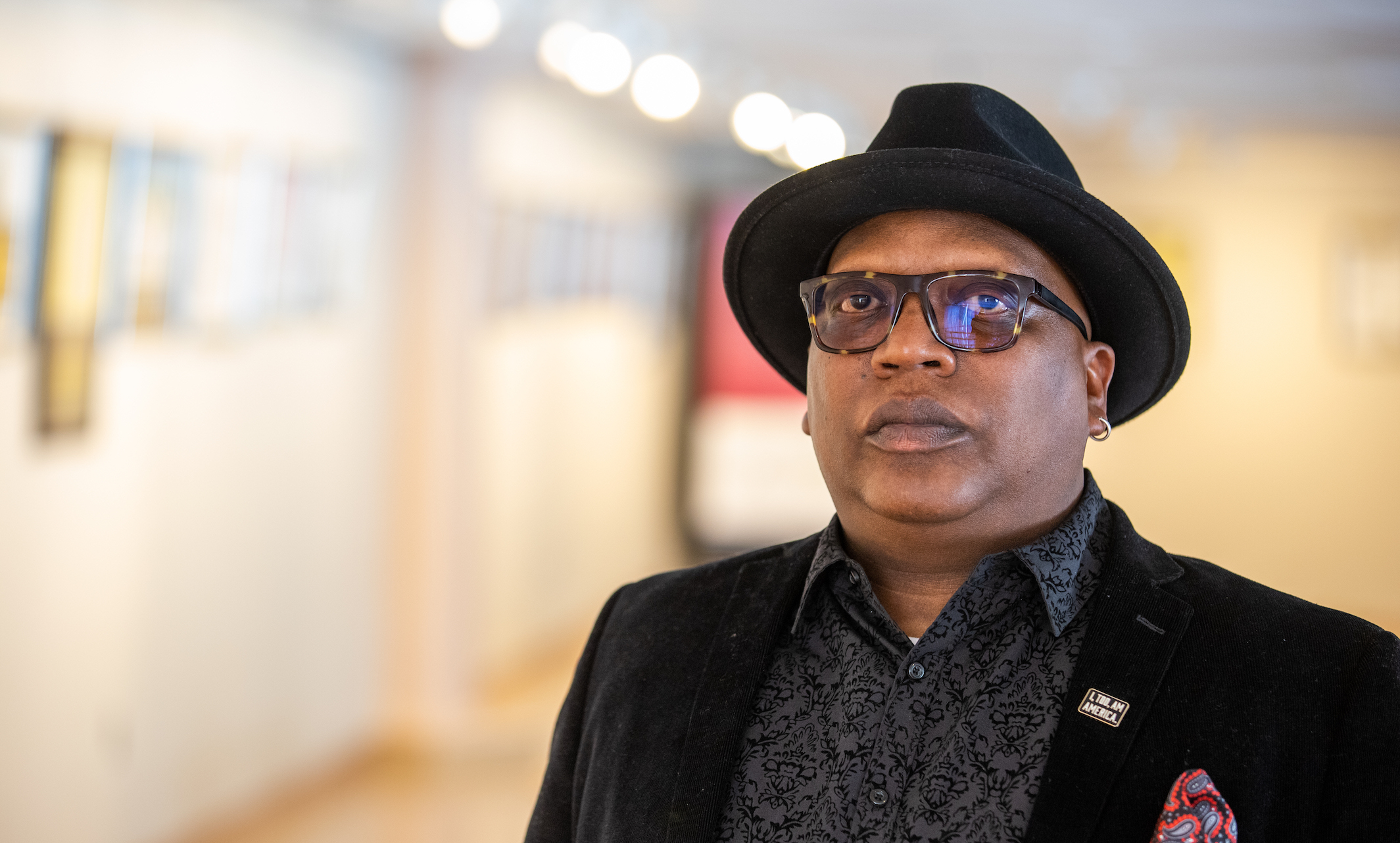
Glenn North is executive director of Bruce R. Watkins Cultural Heritage Center
Glenn North (MFA '20), the first poet laureate of the 18th and Vine district and executive director of the Bruce R. Watkins Cultural Heritage Center, wrote a poem based on Rudyard Kipling’s “If” for his cousin, Don Cheadle, to read in his UMKC commencement speech. While this may have introduced people to his work, he has a long history writing – and reading – his poetry in the community.
“Don and I talked about ideas for his speech,” North says. “He asked me if I had something that fit. I didn’t, but there’s so much wisdom in Kipling’s ‘If.” My grandmother gave me the poem when I was young. I still use it as a beacon.”
Often in his career as a poet, North has responded to images or concepts – some provided from friends as prompts – to create his poems.
The painting, “Lynch Family” by Joseph Hirsch, with its bold, mottled cobalt blue background, features a Black woman holding her baby against her shoulder in one hand – his hand raised and wrapped around a rattle – while her face rests in her other hand. It’s a striking image of innocence and despair.
Glenn North at the Bruce R. Watkins Cultural Center exhibit of "Eight Days in April: the Story of the 1968 Uprising."
North feels empathy is an important component of being a writer.
“I never felt the latitude to write about a daffodil,” North says. “I’ve felt a responsibility to respond to the triumphs and the tragedies of the Black experience.”
Along those lines, while North participated in leading classes and youth poetry workshops and was grateful for the work and experience, he began to feel as if he needed to focus his attention on writing for himself.
“I was frequently writing for hire, and I was fortunate to be able to generate revenue, but it’s a different process. I had to start saying, ‘no.’ At that point I needed to exercise my voice.”
“I never felt the latitude to write about a daffodil,” North says. “I’ve felt a responsibility to respond to the tragedy of the Black experience.” - Glenn North
He found connection with other Black poets through a fellowship with Cave Canem. The organization’s founder, Cornelius Eady and Toi Derricote, created the annual workshop for emerging Black poets and pairs them with veteran writers and provides book-publishing opportunities.
“That’s where I found my writing community,” North says. “’Cave Canem’ is a Latin phrase which translates as ‘Beware the Dog!’ The organization’s mission is to protect the interests of Black poets as fiercely as a dog protects its owner’s property. In so doing, more Black poets will be added to the canon of literature.”
Following the Black Lives Matter demonstrations last year and the revelation that the extent of what some believed was a fringe white supremacy movement was far more prevalent and organized than many people understood.
“I view last year as a cleansing of sorts. If you want clean clothes, you can’t just put them in the washing machine soap and water, you need an agitator. Last summer’s uprising and unrest was necessary for reform. I hate the way it happened, but it brought attention to how Black people are treated by the police.”
“As someone who loves language, I believe some of the terminology we use has helped to change attitudes,” he says. “For instance, if you call a white person racist, they will vehemently resist that label, but if you talk to them about white privilege, they begin to understand that privilege is connected to a racist power structure. At that point, their eyes begin to open. Then we can begin to move toward progress and equity.”
Beyond his poetry, North is engaged in the community through his role as executive director of the Bruce W. Watkins Heritage Center. He’s focused on raising the center’s visibility and expanding its role in the community.
For Black History Month, the center will host an exhibit, Eight Days in April: The Story of the 1968 Uprising in Kansas City, in partnership with the LaBudde Special Collections at the University of Missouri-Kansas City library and the Prospect Business Owners Associaton.
“There’s a lot going on behind the scenes,” North says. “By 2022, we will roll out new programs that will engage the community in a meaningful way.”
North wants the community center to help heal racial trauma.
“A couple of years ago, communities were removing monuments to systemic racism. These monuments say a lot about who we are.
“I view last year as a cleansing of sorts. If you want clean clothes, you can’t just put them in soap and water. You have to agitate.” - Glenn North
In Germany, there are no statues of Nazis statues or flags with swastikas waving around, but there are stumbling stones outside the houses where Jewish people were taken. We need to ask, ‘What do we allow to represent who we are?’ and study that.”
As a member of the Community Remembrance Project, one of North’s current projects is the re-installation of the Levi Harrington Memorial in Case Park in Kansas City. Harrington was a victim of lynching. In 1882, he was falsely accused of shooting a police officer. He was abducted from police custody and hung from the Bluff Street Bridge. He was one of at least 60 victims of racial terror lynching in Missouri.
“The same brand of hate that led to the lynching of Mr. Harrington was on display the night the perpetrators vandalized the marker” North says. “The work I do at the center and the work I do as a poet is an effort to combat racism in all its manifestations.”
Feb 19, 2021

A discussion about how communities of color can gain and deploy influence
Local political and community leaders participated in a virtual panel discussion, “Politics and the State of Black and Brown America.”
The event Feb. 18 was the seventh in the Critical Conversations series of panel discussions addressing systemic racism, sponsored by the UMKC Division of Diversity and Inclusion.
UMKC people are taking thoughtful action on campus and in our community to ensure lasting and comprehensive change through Roos Advocate for Community Change, a campus-wide effort announced in June.
The Critical Conversations are part of that initiative. The goal of each discussion is to enlighten, educate and explore the causes and potential cures for racism.
Panelists for the Politics session included:
Tom Carignan, Overland Park City Council member
Irene Caudillo, president and CEO of El Centro
Kelvin Simmons, co-founder of the Nexus Group, a full-service government affairs firm
Beth Vonnahme, associate professor of political science and associate dean of the College of Arts and Sciences at UMKC
Gary O'Bannon (moderator), executive-in-residence, Henry W. Bloch School of Management
Charisma Sewell (co-moderator), UMKC political science major
Excerpts from the conversation are below. View the recording of the conversation.
Job opportunities for people of color in the private sector
Caudillo: It has been proven that if you have diverse staff, it improves decision-making and enhances growth. In the private sector, the representation isn’t there. Even in the public sector we still don’t see us in leadership positions … What we truly seek are opportunities in companies that are breaking down the barriers leading to those leadership positions.
Simmons: The private sector traditionally has to be pushed into moving. If they’re not pushed, it’s business as usual.
Advocacy for change
Simmons: Decades ago, there was a large grassroots movement to pressure investment funds to divest from investments in South Africa to protest apartheid. We ae seeing something similar today with the MeToo movement and the Black Lives Matter movement. Grassroots movements can be effective as long as they are large enough, have the right message and have the courage to protest.
Carignan: With the technology and communication capabilities we have today, it is easier to organize a movement to push corporations to change.
Are we lacking a central leader like Martin Luther King Jr.?
Carignan: Hispanics come from 20 different countries with all kinds of different political and social structures. Our population is so diverse that it’s difficult to find that central leader.
Simmons: In the African American community, drawing from our biblical culture, Moses was our figure, the one who delivered us. We grew up understanding that there was a deliverer … We’re shifting today to where social media moves people and the voice of people in a very significant way.
“What we truly seek are opportunities in companies that are breaking down the barriers leading to those leadership positions.” - Irene Caudillo
Tax abatements for developers
Simmons: These incentives were created to address blight and to create job opportunities in distressed communities. It has become something vastly different from what it was intended to do.
Government-sanctioned voter suppression
Vonnahme: There are ways that individual voters can work against these initiatives. One is to act through state legislatures. One thing they benefit from is low public attention; it’s easy to pass policies when no one is paying attention. Ballot initiatives can also be used in some states to expand voter access. The courts are able to come in to defend the 15th amendment requirement for fair and equal voting. You also can mobilize grass-roots efforts to help people meet the requirements.
Suffrage is the ultimate right in a democracy. This is something we should all be concerned about. It does give me a little bit of hope that a lot of this has been coming to light ... the best defense is informed, involved community groups.
Caudillo: Community-level activity played a vital role in last election. We have to continue to educate the community, get people registered, get them to the polls.
Strategies that can lead to desired political outcomes
Caudillo: Holding the people who represent us accountable. Civic engagement beyond the vote is really important.
Vonnahme: Policy success comes from electoral success. Recruitment, funding and voter mobilization are all vital. Electoral success comes from good candidates with resources.
Carignan: Build relationships with elected officials. Become a resource for them. Never go alone – you want them to know you have people behind you.
“Suffrage is the ultimate right in a democracy. This is something we should all be concerned about.” - Beth Vonnahme
Police reform
Vonnahme: You can have policy change imposed from above; leadership change is another means. Culture shifts are really important but really hard to impose. They require fundamental shifts in membership, or for the membership to undergo fundamental change. This one is the most effective but the hardest to bring about.
Simmons: The role of police unions is very powerful. Under union contracts, police officers have certain protections the average citizen does not have. It allows cases to be handled differently than if a citizen did the same thing.
Carignan: In Overland Park, a citizen panel signs off on police department promotions and demotions. A separate civilian review board reviews complaints.
The digital divide
Caudillo: The gap continues to widen. The same people who lack digital resources are also more likely to struggle with food insecurity, and to be essential workers exposed to COVID. When virtual learning was introduced at the onset of the pandemic, the resources were not there in communities of color.
Political and civic education
Caudillo: We’ve lost the civics education we used to have. Our organization is stepping in to do those things now, like taking kids to the capitol, letting them see the legislature in action. On college campuses, we have to have mobilization.
Vonnahme: We teach a sanitized form of politics. We don’t explain the nuance behind politics. We have to talk about politics and civics in a more realistic way – talk not just about compromise, but also about conflict.
Building trust in the coronavirus vaccine
Caudillo: Throughout history transparency just wasn’t there, so there is mistrust in the system overall. When it comes to health care, we’ve got to listen to the community, find out what those issues are, what those concerns are, and use the people who have already established trust in the communities of color, like pastors and community organizations.
Feb 19, 2021
Chancellor Mauli Agrawal weighs-in on Health Sciences District development
“The UMKC Health Sciences District is truly a center for patient care, research, teaching and learning in the heart of the Kansas City area,” said UMKC Chancellor Mauli Agrawal. Read more.
Feb 19, 2021
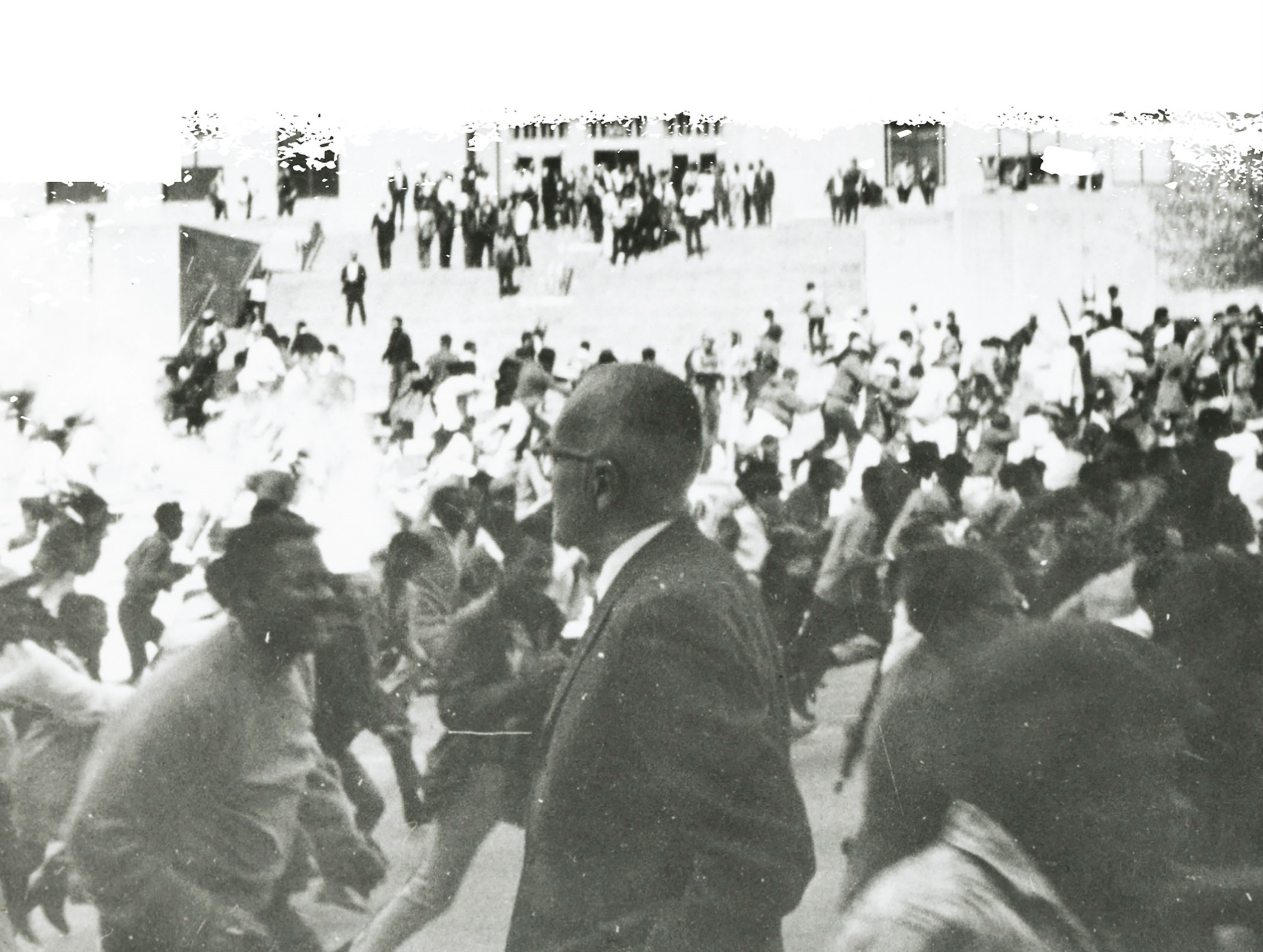
Missouri Humanities Council grant supports opening program
The UMKC Foundation, in partnership with the Bruce R. Watkins Cultural Heritage Center and Museum and Prospect Business Association, has received a $2,020 grant from the Missouri Humanities Council in support of the opening event for the exhibit “Eight Days in April: The Story of the 1968 Kansas City Uprising.” The free, virtual opening is scheduled for 6 p.m., Thursday, Feb. 18. Reservations for the opening can be made online.
The opening event will feature a panel discussion about the eight days surrounding the assassination of Martin Luther King Jr. in April 1968 and how the impact of those days continues to shape Kansas City today.
The discussion will be moderated by Dia Wall, KSHB anchor and reporter; and features panelists Jason Cooley, community initiative officer for the Chief of Police, Kansas City Police Department; Delia Gillis, professor of History and Africana Studies program coordinator, University of Central Missouri; Don Maxwell, Revitalize Prospect; Glenn Rice, journalist, Kansas City Star; and Susan Wilson, recently retired vice chancellor for UMKC Division of Diversity and Inclusion.
The exhibit, “Eight Days in April: The Story of the 1968 Uprising in Kansas City,” draws upon historical materials from the UMKC LaBudde Special Collections and Marr Sound Archives. The exhibit is currently available as a digital exhibit through the UMKC Libraries’ website and will be available to view in person at the Bruce R. Watkins Cultural Heritage Center and Museum, 3700 Blue Parkway, when it is safe to open to the public. The digital exhibit includes an opportunity for community members to participate in a survey about renaming the 1968 Riot Collection.
The Missouri Humanities Council is the only statewide agency in Missouri devoted exclusively to humanities education for citizens of all ages. It has served as a state affiliate of the National Endowment for the Humanities since 1971.
Feb 17, 2021
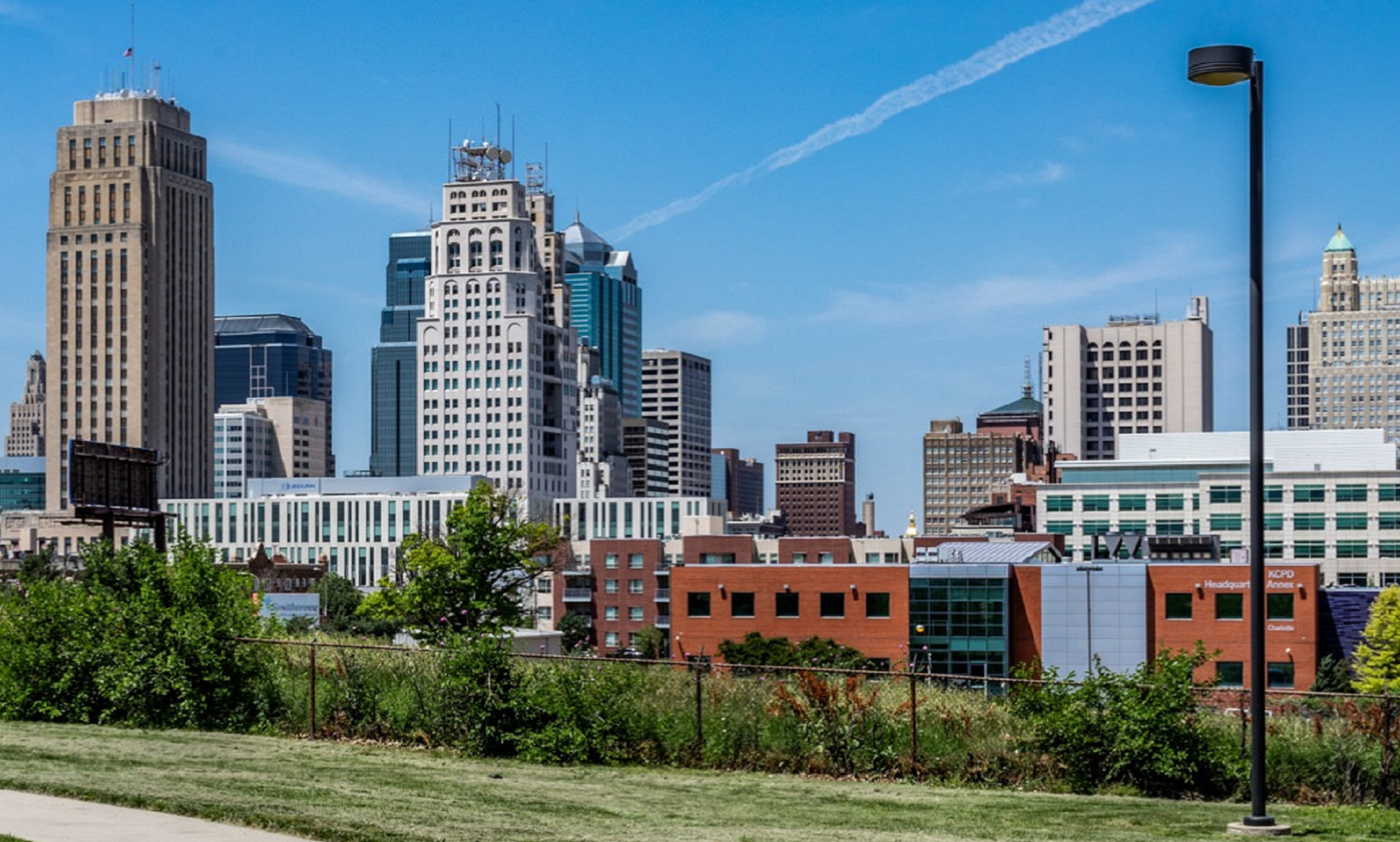
Community groups, UMKC researchers collaborate on public health efforts
The UMKC Health Equity Institute has chosen eight collaborative research projects to benefit from “mini-grants” of $1,700 to $2,200.
Each project pairs a community organization and a UMKC researcher to explore ways to improve health care access for underserved communities. The research topics in this first round of grants include COVID-19 effects on family resilience and easing the trauma of shooting victims. The community partners range from a tenants’ organization and the Kansas City Housing Authority to Children’s Mercy and Truman Medical Centers.
“One goal with these mini-grants is to encourage the kind of research that results in sustainable initiatives, instead of efforts that can fade away after a big grant runs out,” said Jannette Berkley-Patton, Ph.D., a professor in the School of Medicine.
Berkley-Patton, the director of the Health Equity Institute, a UMKC initiative launched by Chancellor C. Mauli Agrawal, added: “We received some great proposals from teams that include strong community partners. We also assigned research mentors to any grant recipients who didn’t already have an expert researcher on board.”
Here are descriptions of the projects receiving the mini-grants, along with their UMKC affiliated partner and community partner.
Refugees Raising Black Boys in the U.S.
To explore parental strategies of Congolese, Sudanese and Somali refugee parents raising sons in a racially hostile climate. The UMKC partner is Johanna Nilsson, Ph.D., professor of psychology. The community partner is Sarah Payton with Jewish Vocational Services.
A Qualitative Analysis of Patient Feedback on Early Mental Health Intervention for Nonfatal Shooting Victims
To conduct interviews with victims and tailor treatment approaches to better serve the needs of predominantly Black patients, whose voices have been historically underrepresented in the development of treatment approaches and care decisionmaking. The UMKC partner is Joah Williams, Ph.D., assistant professor of psychology. The community partner is Rosemary Friend with Truman Medical Centers.
A Pediatric Health and Community Partnership to Improve Family Resilience During the Coronavirus Pandemic and Beyond
To measure the impact of the coronavirus pandemic on trauma exposure and the physical, mental and emotional well-being of children and families from underserved communities in the Kansas City metropolitan area. This study will help inform the development of interventions to increase resilience in families during the COVID pandemic and beyond. The UMKC partner is Andrea Bradley-Ewing, who holds master’s degrees in public administration and psychology and is director of community engaged research at Children’s Mercy. The community partner is Gerald Douglas, director of resident services at the Kansas City Housing Authority.
Pastors’ Spouses Study
To explore the impact of COVID-19 on churches and pastors' spouses and develop strategies and tools to support them as they support their churches and communities. The UMKC partner is LaVerne Berkel, Ph.D., associate professor in the School of Education. The community partner is Nordia Ikner with the Linwood Boulevard SDA Temple.
Increase Health Equity by Improving Neighborhood Routes to Schools and Parks
To increase physical activity by Central Middle School students through built environment improvements to better connect the neighborhood to the school and Central Park. This project will allow students to have a voice in this collaborative process among schools, city services, non-profit organizations and researchers. The UMKC partner is Amanda Grimes, assistant professor of nursing and health studies. The community partner is Laura Steele, education director at BikeWalkKC.
Fruit and Veggie Connect
To explore the feasibility to connect fresh produce from a community garden to families with young children who are enrolled in a home visiting program. The UMKC partner is Laura Plencer, M.D., associate professor of pediatrics. The community partner is Sommer Rose, research program manager at Children’s Mercy Hospital.
What Do We Want? Housing! When Do We Want It? Now!
To analyze how Kansas City Tenants — a grassroots organization with the goal of organizing to ensure that everyone has a safe, healthy, accessible and affordable home in Kansas City, Missouri — was able to rapidly develop a robust membership base and gain traction among city, state and national government officials. To also identify where the organization has yet to make inroads and why, and how it is addressing new challenges brought about by the 2020 pandemic, which is aggravating the housing crisis. The UMKC partner is Michelle Smirnova, Ph.D., an assistant professor in the Department of Sociology and an associate faculty member in Women, Gender and Sexuality Studies. The community partner is Tara Raghuveer, founding director of KC Tenants.
Green Team Toolkit
The Green Team Toolkit brings local youth together with neighborhood residents to improve their parks, trails, and vacant lots. The project seeks to develop a process where neighborhood residents and youth can work together to create a plan to improve the natural and built environment in their community. The UMKC partner is Panayiotis Manolakos with the Department of Economics. The community partner is Brenda Brinkhous-Hatch with the Groundwork Northeast Revitalization Group (Groundwork NRG).
Feb 17, 2021
Jason Martin was renowned for commitment to students
Jason Martin was an associate professor in the Department of Communications Studies, known for his dedication to helping students succeed.
Martin (1977-2021) joined UMKC in 2011, earning promotion to associate professor with tenure in 2020. He taught courses in interpersonal and public communication. His research on intercultural and cross-cultural communication appeared in peer-reviewed journals and books, and he shared his work at regional, national and international conferences.
“Jason spoke from the heart when engaging students. He always had time for students and spent long hours in his office mentoring, motivating and inspiring,” said colleague Peter Morello, associate professor of journalism. “Whenever I stopped by Jason’s office to ask if he wanted to grab lunch or coffee, he was either with a student or he’d say, ‘No man, I am waiting for a student.’ His commitment to students was resolute and his contributions promise to be long-lasting.”
Communications Studies is a department of the College of Arts and Sciences. Interim Dean Kati Toivanen said Martin’s death is “a tremendous loss for our entire UMKC community, as his presence and work embodied a spirit of kindness and generosity that touched many of us.”
Martin chaired the Academic Review Subcommittee for UMKC’s Intercollegiate Athletics Committee, was a member of the IAC Executive Council, served on UMKC’s Access to Success Delivery Team and was a member of the 2014-2015 University of Missouri Faculty Scholars Program. He was also active in the community, including his devoted service to Big Brothers/Big Sisters of Kansas City. He earned two undergraduate degrees and a Ph.D. from the University of Kentucky.
"Jason and I both started at UMKC during the Fall 2011 semester. Over nearly a decade I came to know him as a dedicated scholar, caring instructor and good friend,” said colleague Steven Melling, assistant teaching professor of communications studies. “He had an impact on everyone he met, and inspired many students to do their best in the classroom and beyond."
Donations for a campus memorial for Martin can be made at this link.
Feb 17, 2021
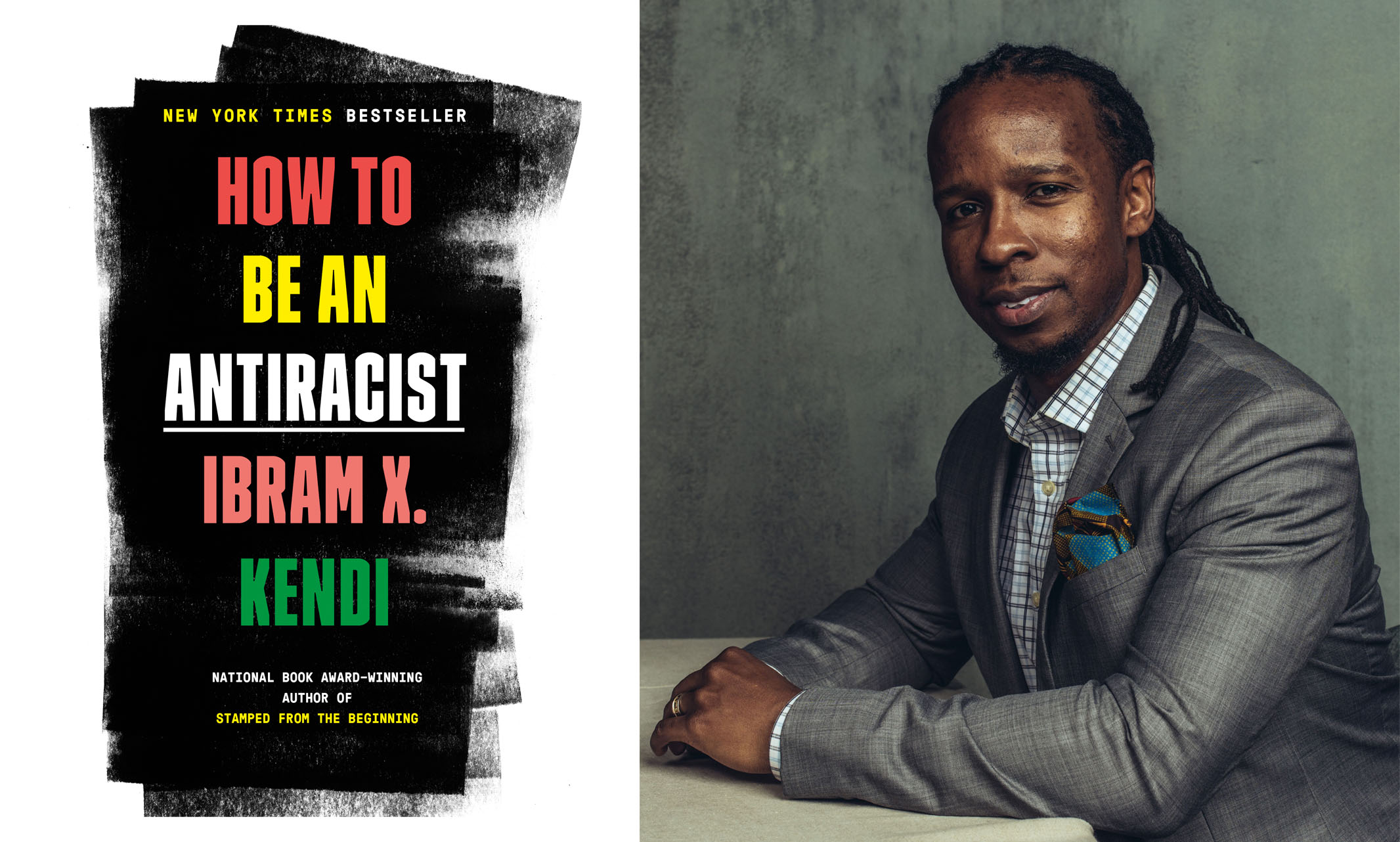
Ibram X. Kendi delivers 2021 Martin Luther King Lecture
Imagine a doctor sitting down with you and telling you that you have cancer. Because that information makes you feel bad, is it an attack? Or is it the first step in a journey toward healing?
Now, replace the word “cancer” with “racist,” and try to think about it the same way. That was the complex and nuanced message shared by author Ibram X. Kendi in the 2021 Martin Luther King Lecture, sponsored by the Division of Diversity and Inclusion at the University of Missouri-Kansas City.
Kendi, the author of numerous books including “How to Be an Antiracist,” said that “racist” and “antiracist” are not fixed categories; people move in and out of the categories based on their thoughts and actions. “To be antiracist is to actually admit to times when you are being racist,” Kendi said.
When people are confronted with knowledge that their statements or actions are racist, he said, they should view that message as a diagnosis, not an attack – a message from someone who wants them to get treatment and help.
“They should realize that to be antiracist is to accept that diagnosis, to accept that when you supported a policy that specifically repressed Black wealth, that is a racist policy,” he said.
The 2021 lecture was delivered in a question-and-answer format, in a dialogue between Kendi and Mikah Thompson, J.D., associate professor in the UMKC School of Law. The wide-ranging discussion covered topics ranging from antiracism to the coronavirus pandemic and the Jan. 6 insurrection at the U.S. Capitol.
Kendi also said it is important to differentiate between the terms “racist” and “racism.” While individual thoughts, statements and actions can be racist, “racism is fundamentally institutional, fundamentally systemic, fundamentally structural. Individuals do not practice racism. Institutions do.”
Whether an individual is behaving in a racist manner is a question of whether those actions are upholding the structure of racism, Kendi said. “As individuals, we are either upholding, or challenging, the system of white supremacy and racism. Are we as individuals resisting this system, or are we upholding it?”
An example of racist thinking that went largely unnoticed, Kendi said, was the reaction by many to statistics showing that infections and deaths from the coronavirus were significantly higher among people of color.
“The immediate response was, ‘what are those people doing wrong?’ The antiracial response is, ‘what policies and practices, historic and current, are leading to those disparities?’ Blacks are dying at higher rates, not because of having more preexisting conditions or not taking the pandemic seriously enough. It was less access to health insurance; it was that Blacks are more likely to be working in situations where they are not able to work from home,” he said. “Even middle-income Black folks are more likely to live in neighborhoods with higher levels of air and water pollution.”
Kendi said denial of racism was widespread as people reacted to the Jan. 6 insurrection.
“Americans say, ‘This is not who we are. There are not attempted coups in the United States of America.’ People who say that have not read American history, in which there was coup attempt after coup attempt after coup attempt during Reconstruction. They deny this country was founded on both racism and freedom. They want to say it was just founded on freedom.”
Americans need to recognize the racist roots that drove the insurrection, Kendi said.
“If you do not acknowledge that white supremacists are the greatest domestic terrorist threat of our time, will elected officials have the will and the resources to respond to the threat?” he asked. “People can’t accept that the most dangerous faces in America are white.”
Kendi is the Andrew W. Mellon Professor in the Humanities at Boston University and the founding director of the B.U. Center for Antiracist Research. He is the author of many books including “Stamped from the Beginning: The Definitive History of Racist Ideas in America,” which won the National Book Award for Nonfiction, making him the youngest-ever winner of that award. In 2020, Time magazine named Kendi one of the 100 most influential people in the world.
Beginning with the Rosa Parks Lecture on Social Justice and Activism in 2007 and annually since 2009 with the Martin Luther King Lecture Series, the Division of Diversity and Inclusion honors these individuals’ tremendous contributions to furthering civil rights by bringing national thought leaders to campus, who provide insight and advocacy to current civil rights issues of education, economic and justice system inequalities.
Feb 16, 2021
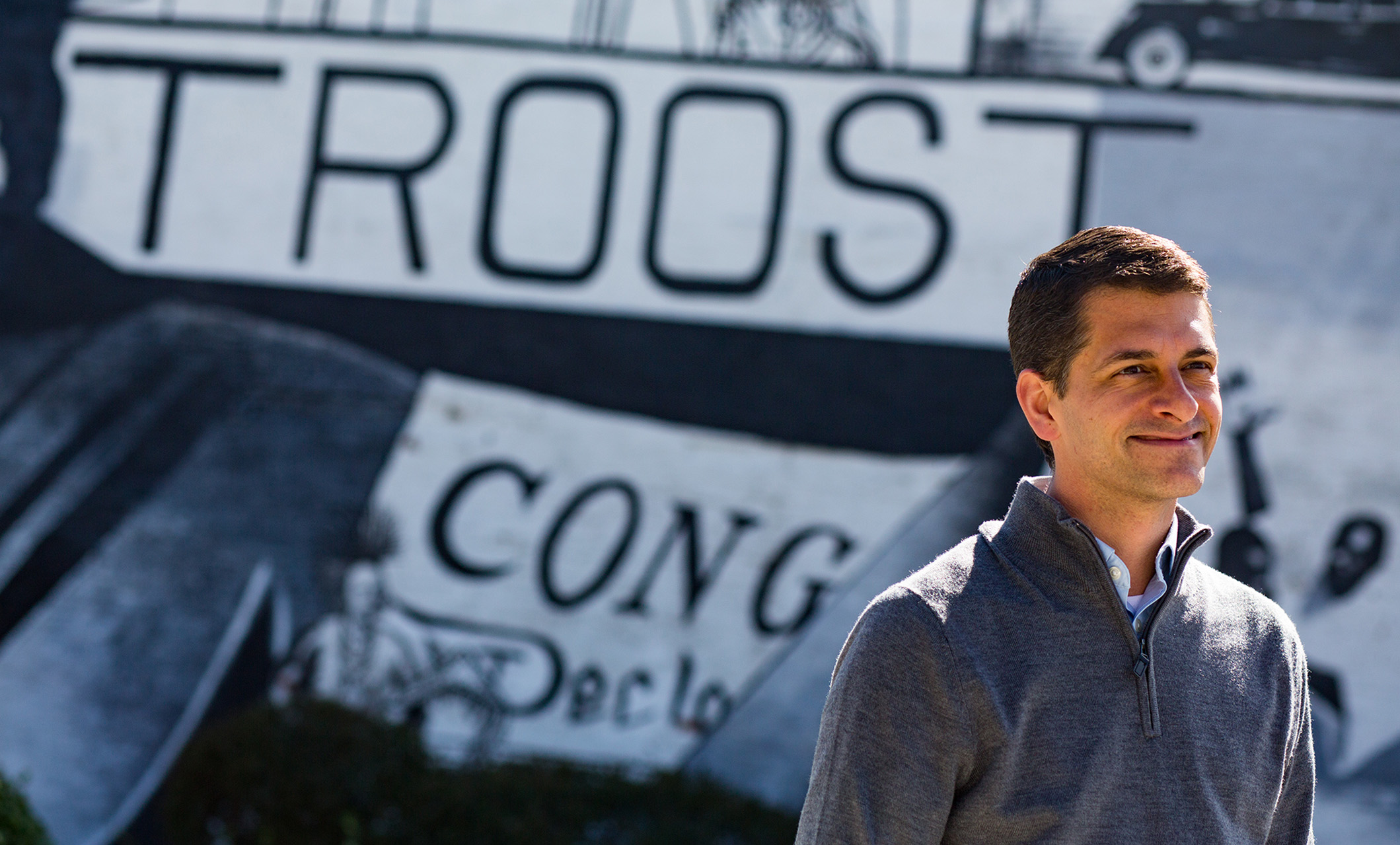
The UniverCities Exchange panel discussion is a continuing collaborative of UMKC and UMSL
The large numbers of urban real estate left vacant or abandoned is a problem facing the Kansas City and St. Louis metropolitan areas. Academic and community leaders from the two cities gathered on Feb. 10 to tackle the matter in the latest segment of UniverCities Exchange, a collaborative between the University of Missouri-Kansas City and the University of Missouri-St. Louis.
In the 90-minute program, the panel outlined the issue of vacant and abandoned properties and discussed cutting-edge prevention and mitigation strategies to address the problem.
Sarah Fenske, host of St. Louis on the Air, served as moderator. The session’s panelists included:
Brent Never, UMKC associate professor of Public Affairs and coordinator of the UMKC Institute of Data Education, Analytics and Science (IDEAS)
Peter Hoffman (J.D. ’12), managing attorney, Neighborhood Vacancy Initiative, Legal Services of Eastern Missouri
Nailah R. M’Biti (M.P.A. '15), chief real estate development officer, Ivanhoe Neighborhood Council, Kansas City
Sundy Whiteside, board president, Saint Louis Association of Community Organizations
Geoff Jolley, executive director, LISC (Local Initiatives Support Coporation) Greater Kansas City
Ruben Alonso III, president, AltCap, Kansas City
Neal Richardson, president, Dream Builders for Equity, St. Louis
Here are some highlights of the panel’s conversation regarding these problems facing Kansas City and St. Louis and how communities are addressing them.
“When you live on a block with several vacant houses there is a sense of insecurity, because of the fact that there are not eyes on the street, so it can be perceived as being very unsafe. The other thing that happens is neighborhoods with a lot of vacant homes also become very disconnected in terms of the residents with one another, especially if you're on a block where there may only be three houses that actually have people who live in the house”. ‑ Nailah R. M’Biti
“Land Bank houses are one way that we have tried to move properties from being vacant into being filled with families, adding to neighborhoods. One major issue is what's called a clouded title. A very quick example. Your family sells a house but maybe the transfer with the family members wasn't so clear and you have a clouded title, meaning is not so clear who owns that house, who is in custody. A large percentage of our houses that are vacant and abandoned are because of this clouded title problem.” - Brent Never
“As we've had this historical disinvestment, particularly in our communities of color, we have pulled that wealth and those assets out of the Black entity. We must be intentional and keep reinvesting and being sure that we're providing opportunities in the same communities for people to then build that wealth.” - Geoff Jolley
“It's not just providing the capital, but it is really a question of how do you engage the community, the neighborhood, and empower that neighborhood and build that capacity so that they can really be very involved and engaged in the process of rebuilding and bringing cohesion back to their community”. - Ruben Alonso III
“The same neighborhoods that suffer from disinvestment and high vacancy rates are also the same neighborhoods with the highest poverty rates, the highest crime rates. We're looking at 12,000 vacant properties that are privately owned in the city of St. Louis. It's an enormous problem that has gone on for way too long. Just the sheer volume, I think, is probably the biggest challenge we face, and being able to bring in enough resources to meet that challenge.” - Peter Hoffman
“The city of St. Louis has the third highest vacant property rate in the country. About 65 percent of the African American population lives in high concentrations of vacancies versus only 19 percent of Caucasians. And there's a greater impact on these high concentrations of vacancies. They created lower property values, higher rates of drug and gun crimes and illegal dumping, poorer environmental health, lower quality of life and really a lost sense of community pride.” - Sundy Whiteside
“We engage with the neighborhood associations and work to identify (nuisance) properties and build them with the youth that live there. Ultimately, this creates the inventory for homebuyers to have a safe place that they feel confident was constructed for them and created for them to be engaged. As we bring these vacant properties that have been sitting vacant for generations back onto the market, it is going to be creating housing stock that is safe and affordable for the communities to begin to start to rebuild and transform.” - Neal Richardson
UniverCities Exchange began in fall 2020 during the UM System Extension and Engagement Month with a discussion of health disparities faced during the COVID-19 pandemic. The goal of these conversations is to foster a connection for future collaboration across Missouri.
View the full UniverCities Exchange discussion below:
Feb 12, 2021
KSHB interviews UMKC dental student
Shonte’ Reed, is a first-year dental student at the University of Missouri-Kansas City; and Anne Lambert Johnson, a dentist, mentor, philanthropist and pioneer in Kansas City, is Reed’s mentor. Johnson is the first African American dentist in Kansas City and has been practicing for 47 years. Read the article and watch the newscast.
Feb 12, 2021
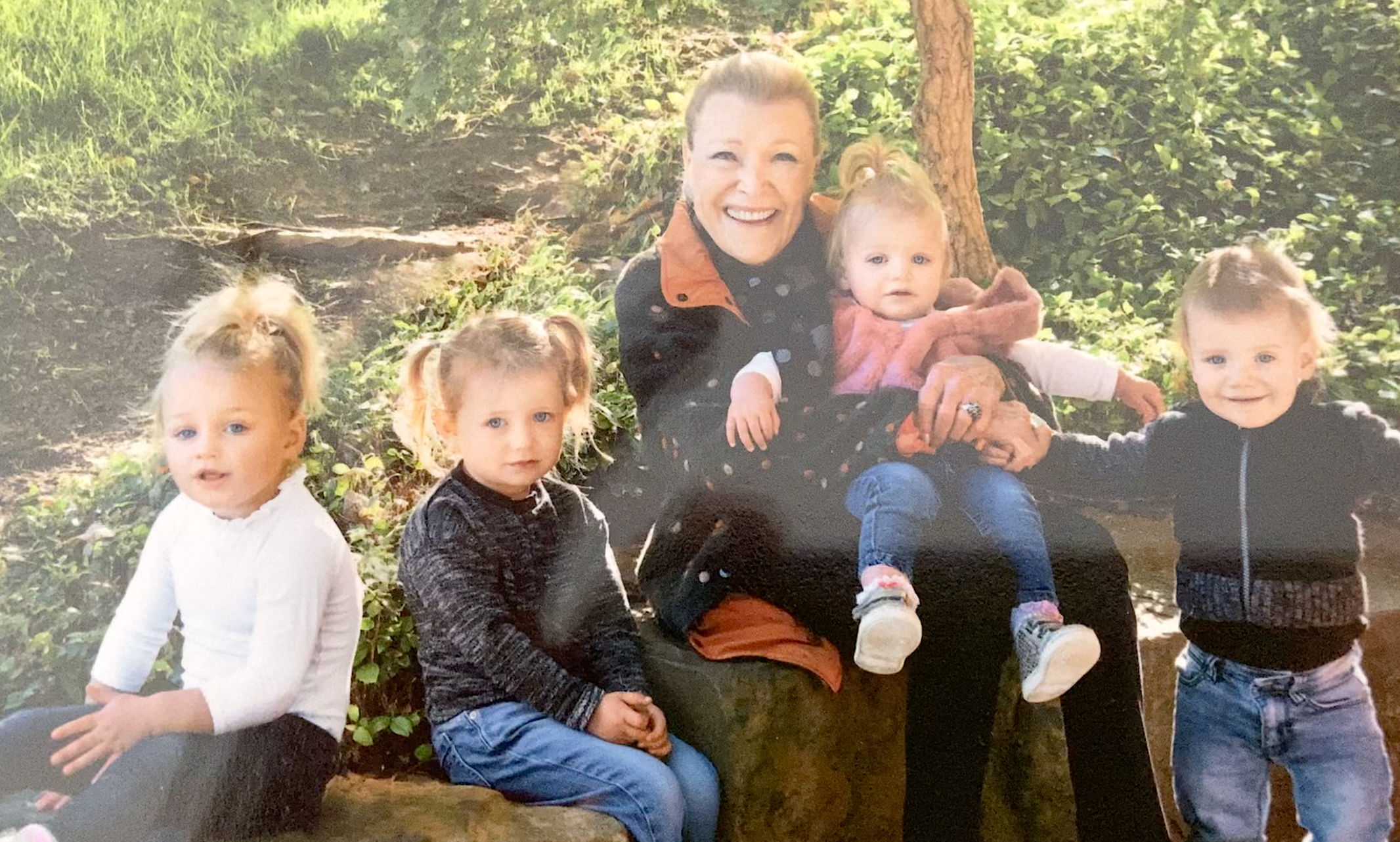
Introducing the SPARK Flossie Pack Center for Lifelong Learning
Flossie Pack’s children wanted to surprise her for her 93rd birthday. She did not expect them to donate $600,000 to support the lifelong learning center that she loves, which will bear her name.
“Our family started talking in early September about what my mom’s passions were and how we could honor her for her 93rd birthday,” Jay Pack says. “Our daughters – her granddaughters – reminded us how much she loved SPARK.”
SPARK is the Senior Peers Actively Renewing Knowledge program that operates on the University of Missouri-Kansas City campus. The organization offers regular classes, book groups and tours for retirees who have a passion for learning.
Flossie Pack, front left, at SPARK pre-COVID-19
“When I heard my mom was taking classes through SPARK I thought, ‘how cool!’” says Dee Pack, Flossie’s other son. “She has always been so articulate, well-read and interested in the arts. When I went to college and majored in music, she started piano lessons.”
One of the first classes that Flossie took at SPARK was basic computer skills.
“I didn’t know anything about computers, so I just signed up,” Flossie says.
“Now my mom Facetimes with her granddaughters all the time, which is what led to the idea,” Jay Pack says.
"Our family started talking in early September about what my mom’s passions were and how we could honor her for her 93rd birthday.” - Jay Pack
Pack contacted a lifelong friend and UMKC supporter, Ann Baum, for her advice. She recommended that Pack contact Lisa Baronio, president of the UMKC Foundation, to find out how they could help grow the organization.
“The Pack family’s devotion to honoring their mother and their vision and commitment to enhance lifelong learning is inspiring,” Baronio says. “We were excited to work together to envision a broader scope of program content and delivery in order to reach more seniors in the community.”
Last March, as SPARK was scheduled to begin its spring quarter, the COVID-19 pandemic transformed its programming in a dramatic way.
“Clearly we are a vulnerable population,” says SPARK Coordinator Bill Webb. “We wondered about going online, but had no idea how or even if we could. Some members said there was no way they would try.”
It was not an easy transition for some of SPARK’s 200 members. Ultimately, the members’ enduring commitment and curiosity led to a solution.
“We heard about holding classes on Zoom,” Webb says. “One of our instructors volunteered to give a class on classical music in May, and that worked!”
A recent SPARK outting
This unexpected challenge and the resulting solution paved the way for SPARK members to embrace new technology and envision the advantages of the updates that the Pack gift will provide.
“UMKC values lifelong learning and is proud to partner with programs offering lifelong learning opportunities to seniors in our community,” says Diane Filion, vice provost for faculty affairs. “The Emeritus College, the Cockefair Chair and SPARK are all part of that commitment. SPARK currently provides a lot of programming on a tiny budget generated by membership and course fees.They are a volunteer-based organization with a part-time office manager and a small classroom in a university-owned building on Troost. They have worried about their future financial security.”
The Pack family not only wanted to foster financial security for SPARK, they wanted to provide resources to expand the program.
“There’s a real bond between the students and the instructors,” Jay Pack says. “We wanted to provide funding to take the program to the next level through outreach and upgrading the technology and physical space.”
“When I heard my mom was taking classes through SPARK I thought, “How cool!” - Dee Pack
The gift provides funding for marketing and operational support, advertising, printing and mailing of catalogs, website development, as well as office and technology support to enhance SPARK’s ability to offer its courses via Zoom or other technologies that will allow participation by members unable to attend in person.
On her birthday, SPARK prepared a plaque with the new name of the center – The SPARK Flossie Pack Center for Lifelong Learning – and shared it with Flossie on Zoom. Her whole family, including her seven granddaughters, were present.
“She didn’t want credit or for the center to be named for her,” Jay Pack says. “But we are a close family. Everyone looks up to her, and it was great to see how much it meant to her.”
Flossie says after her first class about computers, she began to explore many different subjects including the Middle East and Western Civilization.
“The classes are so informational and I absorb so much,” she says. “And there’s no exam! A lot of us are repeat students.”
Dee Pack says the gift is a good fit because it honors his mother’s passion for learning.
“She was, and remains, so excited about her experiences at SPARK,” he says. “I hope I’m still passionate about learning at her age. We’re lucky to have a program that keeps people engaged, active, curious and informed.”
Flossie says she had no idea the gift was in the works.
“I was very pleased when they told me,” she says. “I mean, how many robes and scarves does one need?”
Feb 10, 2021
Kansas City Star's Toriano Porter writes about Mahomes wig
“Our bodies are not costumes,” University of Missouri-Kansas City law professor Jamila Jefferson-Jones said. Read the full article. (subscription required)
Feb 10, 2021
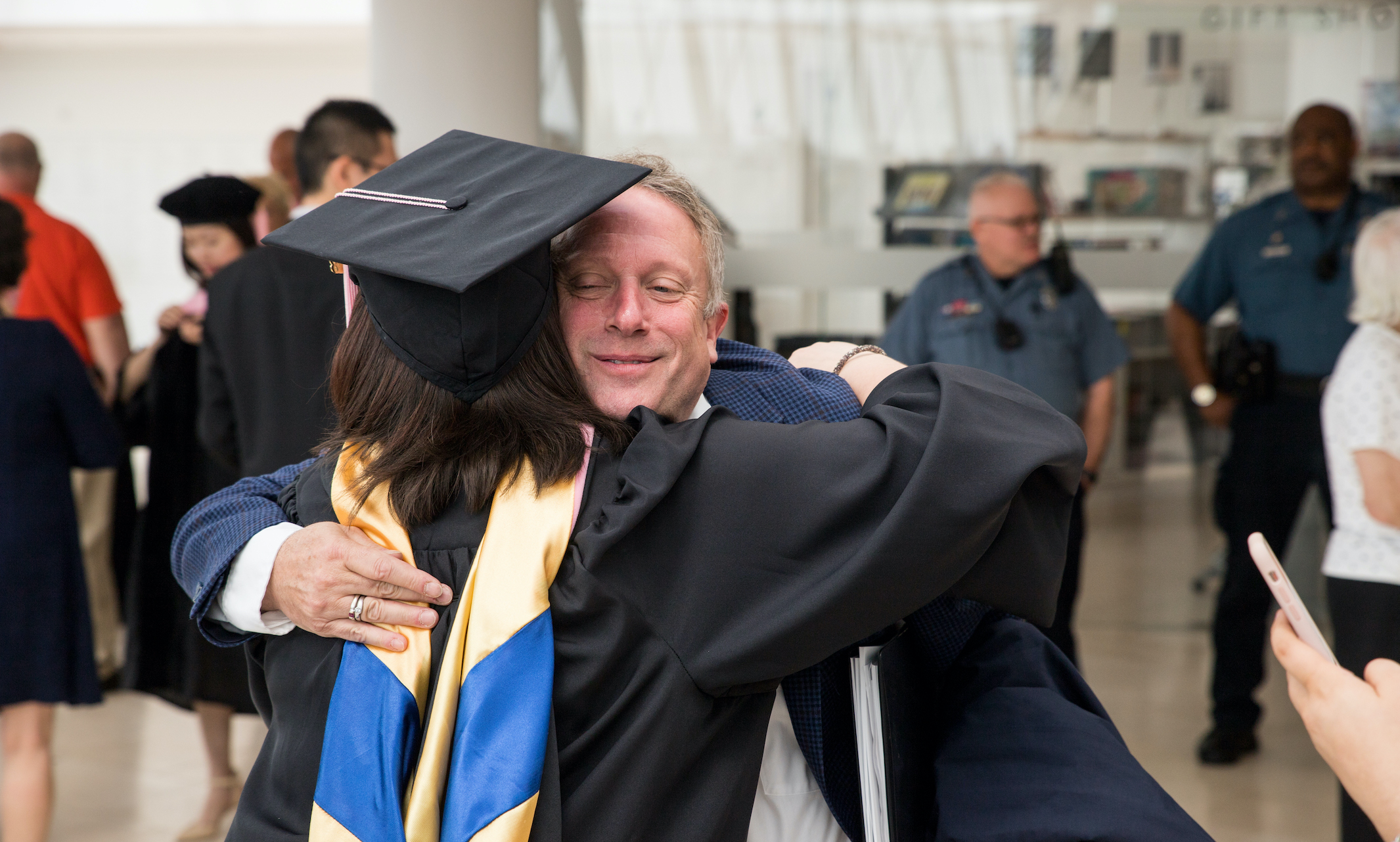
Volunteer-led 20 / 20 campaign exceeds goals
The UMKC Conservatory is celebrating the creation of 27 new endowed scholarships. Thanks to a volunteer committee which triumphed during challenging times, students who may not have been able to join the ranks of Conservatory students and alumni will now have their chance.
The Friends of the Conservatory initiated the concept of the 20 / 20 campaign in July of 2018. Their plan – to create 20 new endowed scholarships, each of which required a commitment of $25,000 or more, by the end of 2020 -- was ambitious. Long-time supporter Don Dagenais agreed to be the committee’s chair.
“I agreed to chair the campaign because I believe in what the Conservatory is doing and how critical scholarships are. I volunteered out of love for the organization and what it does for the future of music.”
“I thought we’d exceed the goal, but to exceed the goal by as much as we did was significant and it’s thanks to the donors, the committee and the staff.” - Don Dagenais
From the beginning, Dagenais thought creating 20 new scholarships in 18 months was reasonable.
“I thought we might actually do better. Once we met and put together a plan that allowed groups of people to contribute to a scholarship, I was very optimistic.”
Michael Henry, a longtime Conservatory supporter and Friends of the Conservatory board member, was one of the first volunteers to recruit friends and colleagues to create a scholarship in choral conducting in honor of Kansas City-based Grammy award winner Charles Bruffy, MM’88, artistic director of the Kansas City Chorale and chorus director of the Kansas City Symphony.
“We wanted the campaign to support new students, but also to tell a story of alumni,” Henry says. “I’m uncomfortable asking friends for money, but for this – because we support the arts and because the campaign focused on stories of people – it was personal. It was a gift of joy.”
Marylou Turner and Michael Henry
Henry and long-time Conservatory supporter and volunteer, Marylou Turner, who were the 2018 Crescendo co-chairs, announced the scholarship at the 2018 patrons’ party for the event.
“I’ll never forget it,” Bruffy says. “I was overwhelmed – stunned, grateful and shocked – by the generosity of my friends. But more importantly, I understand the importance of scholarships. Everyone deserves the opportunity to realize their personal worth and aptitude. In our world, scholarships make that happen.”
“I understand the importance of scholarships. Everyone deserves the opportunity to realize their personal worth and aptitude. In our world, scholarships make that happen.” - Charles Bruffy
Even with the challenges of the COVID-19 pandemic, the 20 / 20 campaign committee, in conjunction with the Friends of the Conservatory, Jazz Friends and the Women’s Committee for the Conservatory surpassed its goal. Their efforts resulted in individual, group, honorary, memorial and estate gifts that established 27 new scholarships. These gifts, totaling more than $1.2 million, support students in music performance, music therapy, music education, jazz, theatre and dance.
“I hoped we’d be successful,” Dagenais says. “I thought we’d exceed the goal, but to exceed by as much as we did was significant and we extend our thanks to the donors, the committee and the staff.”
Feb 10, 2021
98.8 The River interviews UMKC Ph.D. student
Jordan Ayala, an eviction researcher and Ph.D. candidate at the University of Missouri-Kansas City, was interviewed. Ayala analyzed the court filings. Read more.
Feb 07, 2021
Tampa Bay Times interviews Mary Anne Jackson
In Kansas City, cases are the lowest they’ve been since October, said Dr. Mary Anne Jackson, an infectious disease expert and dean of the University of Missouri-Kansas City School of Medicine. Read the full article.
Feb 05, 2021
Yahoo Entertainment writes about UMKC student
Jackson Mahomes is a UMKC student. Read the article.
Feb 05, 2021
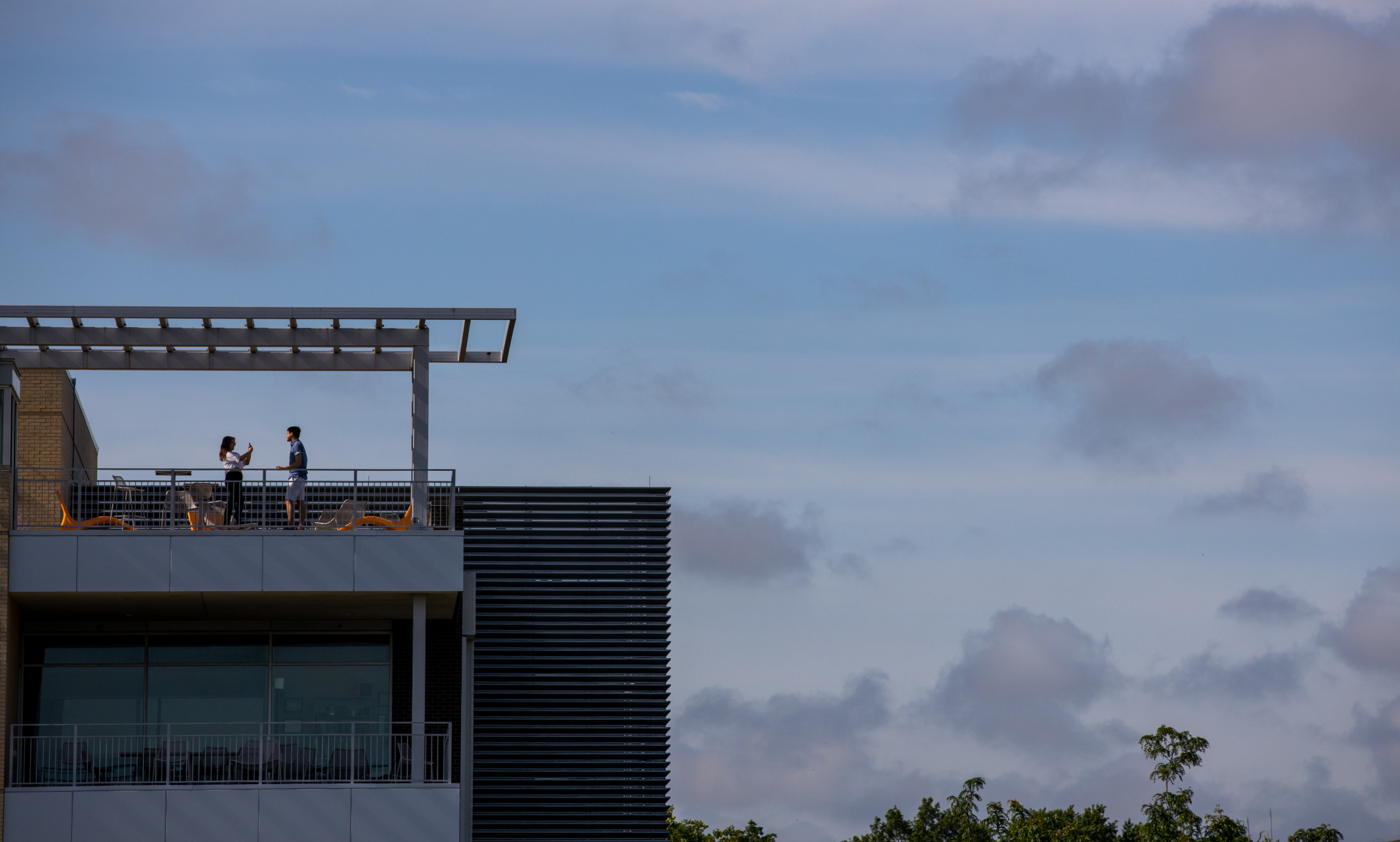
Kauffman Foundation donates $400,000 to stimulate on-campus innovation
Students, faculty and staff from all UMKC academic units, centers, institutes and other programs are eligible to apply for grants to fund projects designed to expand entrepreneurial activities at UMKC.
Thanks to support from the Ewing Marion Kauffman Foundation, UMKC has launched a new Entrepreneurship Innovation Grant (EIG) program. A total pool of $400,000 is available for grants over the next two years to support a broad variety of initiatives in entrepreneurship including curriculum development, technology commercialization, school and department initiatives, community service, engagement and ecosystem building. Collaboration among groups is highly recommended.
The first application period for the Entrepreneurship Innovation Grant is now open. Proposals must be submitted no later than 11:59 p.m. Sunday, February 28. The program, and the Kauffman grant that funds it, are the product of a joint effort by the UMKC Innovation Center, the Regnier Institute at the UMKC Bloch School of Management and the UMKC School of Law to help increase entrepreneurial activities and opportunities across UMKC.
“UMKC hosts an impressive array of entrepreneurial programs and services that reach deep into the university and the community to develop new ideas and talent that respond to the challenges of our region and help to shape its future. With this grant program, we are now providing direct incentives to stimulate even more collaboration and growth,” said Maria Meyers, executive director of the UMKC Innovation Center. “Converting UMKC skills, ideas and innovations into real-world applications and markets will drive better, more inclusive futures that will help us address and solve today's and tomorrow's challenges.”
Feb 04, 2021
Flatland KC interviews Jacob Wagner
Jacob Wagner, associate professor of urban studies at the University of Missouri-Kansas City, said evictions are a poorly understood factor in neighborhood decline. Read more.
Feb 04, 2021
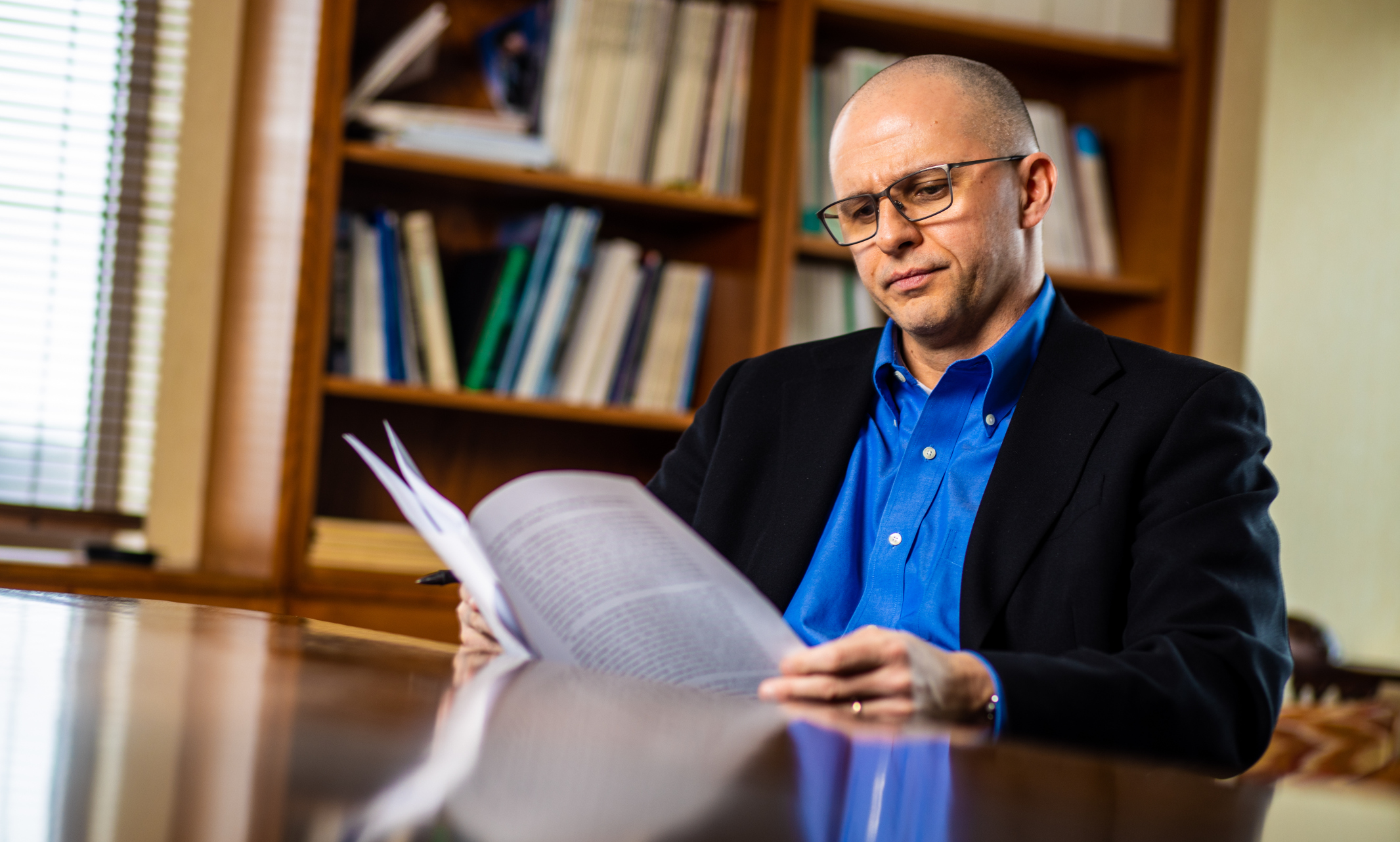
Christopher Garmon of the Bloch School is a nationally recognized expert
Christopher Garmon, assistant professor of health administration in the Bloch School of Management, has done extensive research on medical billing, with a focus on how insured patients often are shocked by huge bills from out-of-network providers.
The issue was partially addressed by federal legislation passed in late December. Once this surprise medical bill legislation goes into effect in 2022, most out-of-network providers will no longer bill patients directly. Instead, providers and insurers must negotiate how much the insurer will cover. If they can’t agree, an independent arbitrator would step in.
This was the kind of federal-level legislation Garmon and other experts have been advocating for years. He sat down with UMKC Today to share eye-popping examples of the kinds of situations the new legislation will affect.
How do you define “surprise medical bills” in the context of your research?
My research (and recent federal and state legislative efforts) have focused on surprise medical bills from an out-of-network provider that the patient did not expect and could not reasonably avoid. For example, if you go to an emergency room of a hospital in your health plan’s network, the expectation is that all of the care received at that hospital will be in-network. However, the emergency room physicians may be out-of-network even though the hospital itself is in-network. Because there is no contract between the out-of-network physician and your health plan, there is no agreed-upon price for the physician’s services. The physician can charge whatever amount she thinks is reasonable and the insurance company can reimburse whatever amount it thinks is fair. These two amounts are often far apart and the physician may bill the patient directly for the balance. It is this “balance bill” from the out-of-network doctor, often for hundreds or thousands of dollars, that places a devastating burden on the patient.
What are the health-care situations in which surprise bills are most likely?
Most of the research suggests that roughly 20 percent of emergency room cases lead to surprise out-of-network bills, although some recent research indicates that it may be even higher. Roughly 10 percent of newborn deliveries may involve a surprise medical bill (for example, when the hospital and obstetrician are both in-network, but the anesthesiologist administering the epidural is out-of-network). One area where surprise out-of-network medical bills are common is ambulance service. Roughly 50 percent of ambulance cases involve an out-of-network ambulance. In other words, if you have an emergency and call 911 needing an ambulance, it’s basically a flip of a coin whether that ambulance is in your health plan’s network or not. It is important to note that the federal legislation passed in December will not protect patients from out-of-network ground ambulance bills. In general, the more severe the injury or complexity of treatment, the more likely a patient is to receive care from an out-of-network provider.
Can you share one of the worst examples of exorbitant surprise medical billing that you’ve come across?
One of the most egregious cases was documented by Elisabeth Rosenthal for the New York Times who described the experience of a man who underwent an elective neck surgery. He made sure the hospital and surgeon were both in his health plan’s network when scheduling the surgery. He even made sure the anesthesiologist on call the day of his surgery would be in-network. However, during the surgery, another surgeon was called in to assist. This assistant surgeon was out-of-network and he received a bill from this surgeon for more than $110,000. This extreme case highlights that, without legal protections, there is no way to guarantee that a patient can avoid a surprise out-of-network medical bill even in elective situations and even when the patient takes every precaution to avoid them.
What can people do to protect themselves from surprise medical bills?
First, it is important to point out that those covered by Medicare (including Medicare Advantage plans), Medicaid and Tricare are legally protected from surprise out-of-network medical bills. For those with private insurance, it depends on where you live and the type of health plan you have. Unfortunately, until the new legislation goes into effect, there are many patients who are vulnerable to surprise out-of-network bills regardless of what they do to prevent it.
Some states have protections against surprise out-of-network billing. Missouri recently implemented a law protecting patients from surprise out-of-network medical bills, but only for emergency services. In addition, state protections from surprise billing only apply to patients covered by health plans that are regulated by the state. Many people who receive their health insurance through their employer have health plans that are regulated by the federal Department of Labor. State protections against surprise billing do not apply to them.
What needs to happen next?
Given the lack of protections for patients with federally regulated health plans, there was a strong consensus that a federal solution was needed. Still, the recent federal legislation does not offer complete protection for patients. While it protects patients from air ambulance bills, ground ambulances are excluded, so patients are still vulnerable to bills from out-of-network ground ambulances. Future federal legislation should protect patients from ambulance surprise bills.
Feb 03, 2021
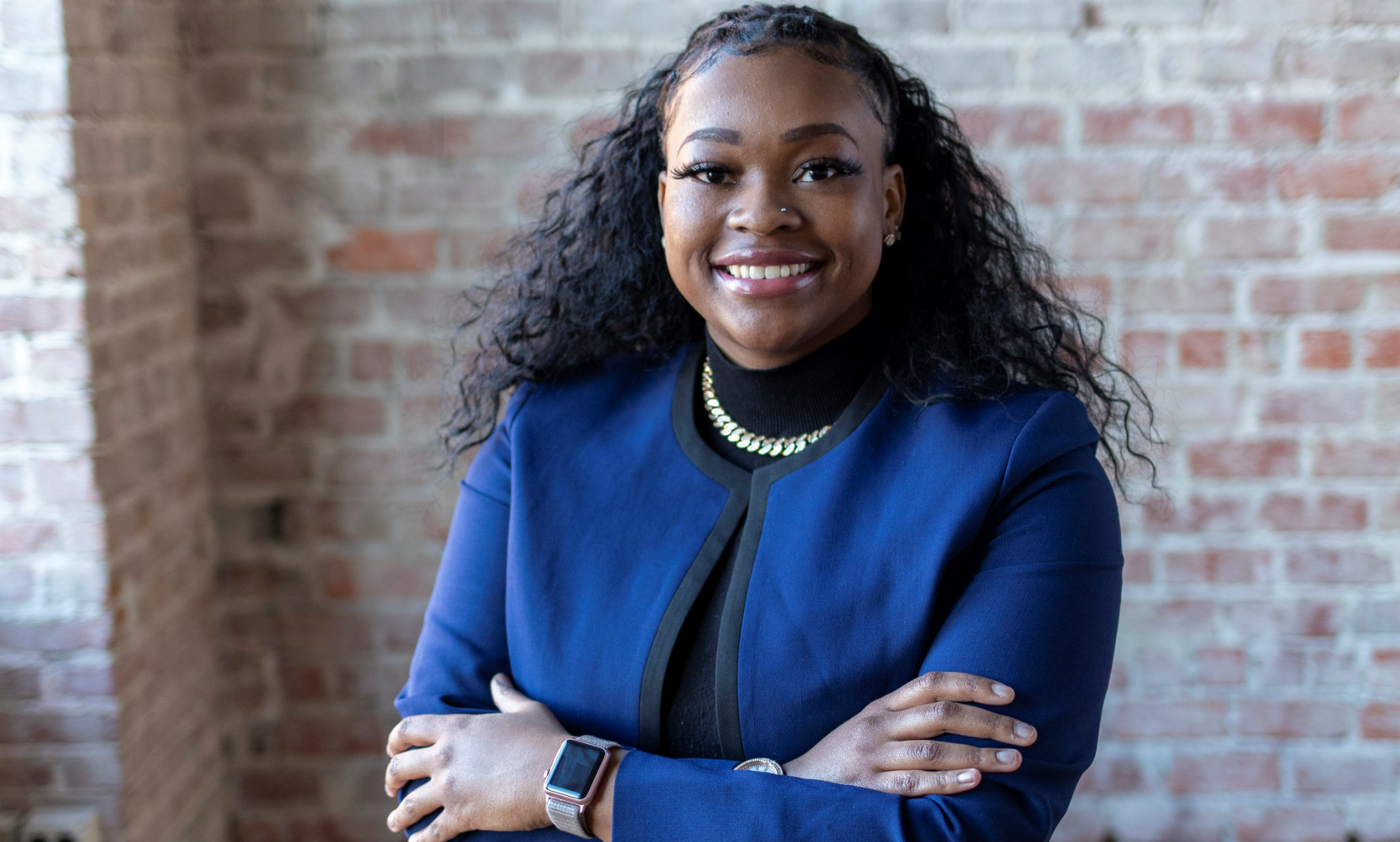
Shae Perry, B.A ’19, is carving out her own career path as a community engagement and media mogul
When Shae Perry makes it big, we can say “we knew her when…” The recent graduate, known by many as ShaeFromTheLou – her entertainment moniker – established a love for media early in her collegiate career and credits her faculty and staff mentors for helping to cultivate her potential.
As she uses her entrepreneurial experiences to carve out her own path as a media mogul and community advocate, her impact and influence span across highway 70 between Kansas City and her St. Louis, Missouri, hometown. We sat down with Shae to find out how things are going for the recent Communications Studies graduate.
Name: Shae PerryUMKC degree program: Communications Studies, emphasis in film and mediaGraduation year: December 2019Hometown: Saint Louis
"I learned that with a plan and execution, I could accomplish almost anything."
Tell us about your current position.
I'm currently a brand ambassador for Big Brothers Big Sisters KC. My role consists of connecting with leaders in our surrounding communities and finding ways to make beneficial collaborations. On weeknights and weekends, I'm an on-air radio personality on KPRS Hot 103 Jamz – FM station 103.3. My entertainment name is Deona HuSTLe. KPRS is the oldest, continually Black family-owned radio station in the United States. Both of my roles put me in more spaces to engage with the community. I’ve had the opportunity to do interviews and spread the word about our mission. It’s dual beneficial.
The competition is tough in entertainment. How’d you stand out and land the role at KPRS?
I had been consistently reaching out to KPRS for years trying to get my foot in the door. Every chance I got, I went to visit the station and make sure they knew my face. Angela Elam, one of my Communications Studies professors and the producer and host of New Letters On Air, encouraged me to attend a Missouri Broadcast Association Radio Camp where I received certification in radio marketing. I believe attending the camp to learn more about radio helped better equip me for my job at KPRS. After the growth experienced in Kansas City during college, I was determined to start my professional career here. St. Louis will always be home, though.
What brought you to UMKC?
A college recruiter visited my high school during my senior year. When I toured UMKC for orientation, I found out one of my group leaders was from my hometown, graduated from my high school and played basketball there under the same coach I did. Our similarities were a coincidence, but it helped me feel at home. Not to mention, my parents enjoyed the visit and my mother was really in love; so that was an easy “yes!”
What was your favorite thing about UMKC?
The UMKC campus was a perfect size for me to immerse myself in a variety of campus activities and in the classroom without feeling unheard. The student-to-faculty ratio was great for comprehending coursework and receiving extra help. The university also had various resources and groups to connect with, including the MSA Village, where I spent much of my time meeting peers and other leaders.
"The saying, 'it's not what you know, it’s who you know' rings true in my life, both in school and in my career."
Who was the most influential faculty or staff member at UMKC?
This is tough because there were so many, but there are two people I must mention who were influential in my younger years.
During new student orientation, I selected all the courses I’d take for my freshmen year, one of which was radio production. My advisor informed me that the professor typically only allowed upperclassmen and I’d probably be rejected. Luckily, Professor Angela Elam accepted my enrollment in the course and I really enjoyed learning about radio. Angela was also the advisor for K-Roo, the student radio station, and helped me get more involved to eventually become president my junior and senior years.
While I was learning radio, I took a couple of video production classes taught by Professor Kevin Mullin. I found a real love for creating and editing in that class and Kevin always went above and beyond in answering my many questions. Both Angela and Kevin were, and still are, great mentors to me and I appreciate them.
How did you choose your field of study?
I stayed open-minded throughout my four years. I took a variety of courses and hosted many campus events and parties. In 2017, I started my own videography and entertainment company, SFTL Entertainment. In 2018, Roo Athletics and the Office of Student Involvement asked me to emcee some of the men’s and women’s sports games. I had the opportunity in 2019 to write and direct my first short film and cast other UMKC students. Through all of this, I was still active as president of K-Roo. All of these activities helped me find my path in communications.
What’s the influence behind SFTL?
I started going by ShaeFromTheLou my senior year of high school. My school was very close to Ferguson, and when the unfortunate death of Michael Brown occurred, we halted classes for a few days due to protests. I and three other seniors banded together to help the Black-owned businesses in our community. When MSNBC wanted to do a story on us, I didn’t think my name on social media worked well. I wanted something catchy that still paid homage to my city, so ShaeFromTheLou. Any creative content I produce, I use SFTL. When I’m on the radio it’s Deona HuSTLe. Deona is my middle name and I believe the word hustle is one of the words that best describe me.
Wow! You have a lot going on. How do manage your time?
I haven’t had a break yet since I started working. I enjoy both of my jobs, so it doesn’t technically feel like work because it’s fun and I’m helping other people. However, I do want to make sure that I’m leveling up in both my business and personal lives, so I try to implement self-care and remind myself to take a day off if I’m stressed out.
What are the challenges of your field?
Communication, in general, is a broad field, there’s so much you can do in the industry. The most difficult part of that, for me, can be finding your niche. Even today I continue to find different things that interest me.
What are the benefits?
It’s such a fun field, especially for film and media, which is what my degree is in. I’ve had the opportunity to interview celebrities and get behind the scenes access at events; it’s definitely a timeless industry. The other benefit of communications is the ability to be creative, there’s nothing like seeing your vision come to life.
What did you learn about yourself while you were here?
I learned that I not only had an interest in being in front of the camera, I also had an interest in being behind it. I’ve organized community events and lead the student radio station and they both pushed me to become a better person. I learned that with a plan and execution, I could accomplish almost anything.
"The student-to-faculty ratio was great for comprehending coursework and receiving extra help."
How did UMKC help you reach your current position?
Connections and experience. The saying, “it's not what you know, it’s who you know” rings true in my life both in school and in my career. Many of the opportunities I’ve been given are due to faculty and staff members mentioning my name in important rooms. Carla Wilson was one of those staff members who always supported my aspiration by connecting me with other leaders and her positive reference went a long way. UMKC also gave me a lot of experience. Whenever I saw an opportunity, I took it. I hosted the Union Programming Board’s annual talent show, the K-Roo weekly radio show, organized campus events and more. I even had a chance to emcee KC Roos basketball games. All of those opportunities gave me a different perspective and most importantly experience.
What are your goals for the future?
My list of goals is lengthy, but I have a few key areas I want to focus on these next couple of years. I am interested in doing more public speaking engagements. I want to do public speaking to help young people know the work involved in achieving success. I'll be speaking at a workshop for teen girls in March about career planning.
I premiered my first short film last year titled “Court-side Reality,” and I enjoyed it so much that I want to write more YouTube series and films. I also enjoyed my time as the emcee for KC Roos basketball games and hope to emcee for more college or professional sports events. Finally, one of my long-term goals is to own a television and radio network and give others like myself a platform to be creative and be heard! I love bringing people together and all these goals help me do that in a creative way.
What is your advice for a student entering UMKC?
Stay open-minded and engage with your peers and faculty and staff members. Many of my connections came from being at events and networking. College is what you make it; be intentional about applying yourself and ask questions. Also, you won’t know you're skilled in something if you don’t at least try. I have tried things and failed, but I can at least say that I tried and learned how to do them correctly next time. Don’t shy away from opportunities because you are afraid to fail or afraid of what others will say. It’s all a part of learning yourself. Go for it, ask a lot of questions. It shows that you’re assertive.
Feb 03, 2021
Kansas City media cover School of Medicine panel discussion
Bridgette Jones from Children’s Mercy, an associate professor of pediatrics at the University of Missouri-Kansas City School of Medicine, moderated a panel of several local experts on Feb. 4. Jannette Berkley-Patton with the University of Missouri-Kansas City School of Medicine also was on the panel. Read the Kansas City Star story. (subscription may be required). Read the KSHB story and watch the newscast.
Feb 03, 2021
College of Arts & Sciences student discusses fellowship with Arrowhead Art Collection
“There’s a wide range of media, which is something that should be applauded. That’s kind of hard to do in a stadium,” says Meghan Dohogne, a Ph.D. student at the University of Missouri-Kansas City, who has been working with the collection on a fellowship basis for about a year and a half. Read more from KCUR.
Feb 03, 2021
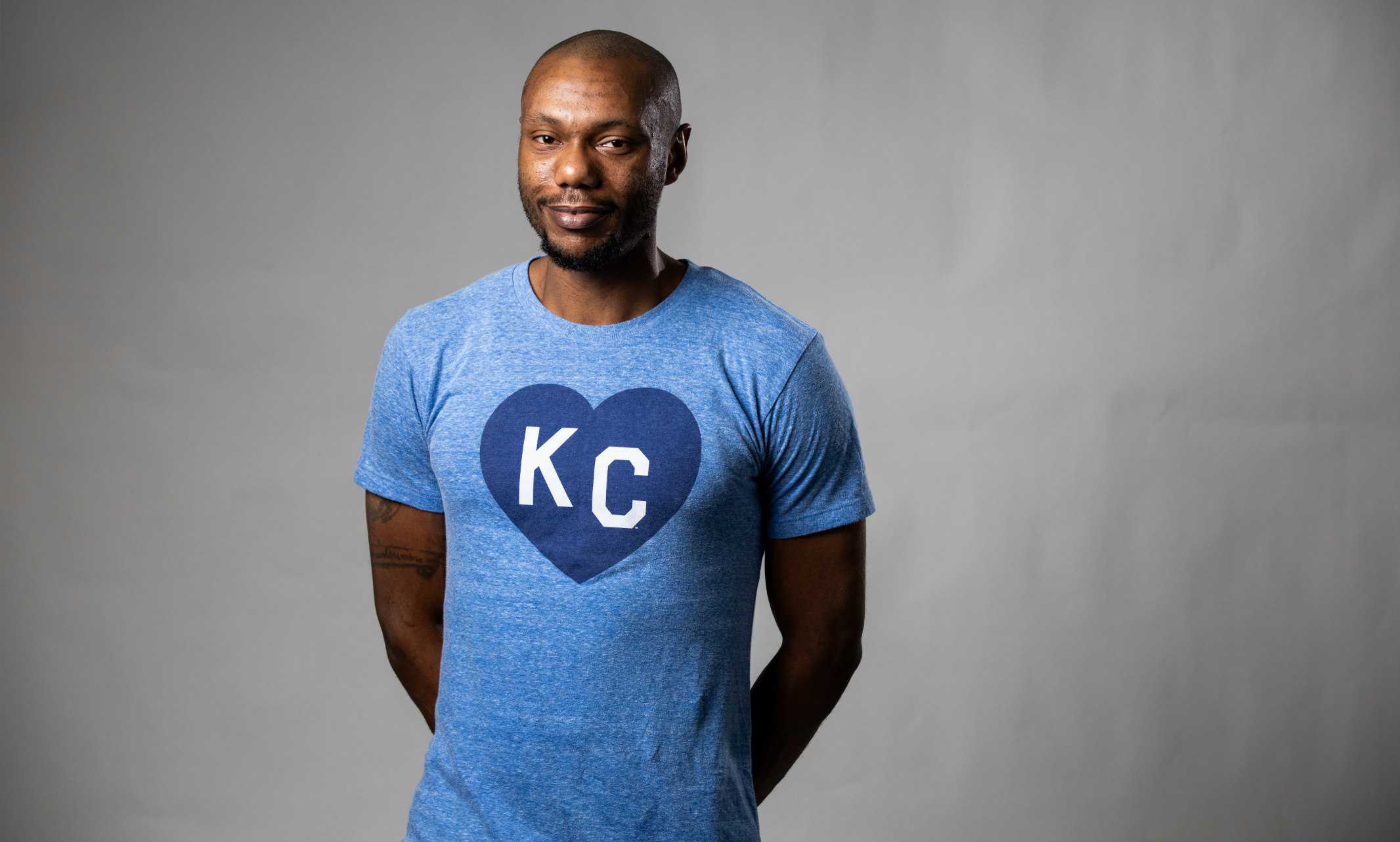
Matthew Ramsey finds success in education
Our ongoing story starts with people from around the world, converging here at UMKC. Get to know our people and you’ll know what UMKC is all about.
Matthew RamseyAnticipated graduation: Spring 2021Academic program: Bachelor of Liberal Arts, School of Education and College of Arts and SciencesHometown: Kansas City, Missouri
Matthew Ramsey is married with two young children. He has a job, coaches youth basketball and is pursuing his teaching certificate. With his quiet and easy-going nature, he makes it look easy – even when it’s not.
Ramsey has had to take breaks from his education, but he has always been determined to finish. He enjoys working with kids, so teaching and coaching seem like a perfect fit.
“I’ve always worked with younger students,” Ramsey says. “I helped take care of my younger family members and this is my fourteenth season coaching high school basketball.”
Ramsey attended programs at other schools, and there were times when he didn’t know if he would be able to graduate.
“With a family of my own to provide for and work obligations, I had almost given up hope of completing my degree,” Ramsay says.
When Ramsey visited UMKC he realized it was a good fit.
"With a family of my own to provide for and work obligations, I had almost given up hope of completing my degree." – Matthew Ramsey
“The campus is beautiful and they have a wide variety of class schedules which favored me as a non-traditional student,” he says. “It works for me because it is centrally located in the Kansas City area and is easily accessible and the proximity to my home made it an easy commute.”
Ramsey enrolled in UMKC determined to graduate.
“I’ve found the program to be great in preparing future teachers. I have always felt welcome and accepted, which is something I cannot say for other institutions I attended.
All of the staff are kind and helpful. And the advisors’ office is one of my favorite spots on campus. They have been great.”
“Raising a family, working and going to school – it’s a lot. But this program inspired me to go after my dreams.”
Ramsey is a Hazel Browne Williams Scholarship recipient. Williams earned her master’s degree in 1929 and became an associate professor of the UMKC School of Education in 1958. She was the first full-time Black professor at UMKC and the first Black professor given emeritus status at the university in 1976.
While Ramsey’s tenaciousness matches Williams’s, he says getting closer to graduation would have been much harder without the scholarship.
Ramsey says he has learned a lot about himself while he’s been in the program.
“Raising a family, working and going to school – it’s a lot. But this program inspired me to go after my dreams.”
“It’s forced me to reexamine my perspectives and reflect on my own background and bias,” he says. “But I’ve learned that no matter how many setbacks I have suffered – or no matter how many challenges are placed in my path – as long as I work hard and believe, anything is possible.”
Feb 02, 2021
KC Studio highlights manuscript stored in UMKC LaBudde Special Collections
For every performance of “Porgy and Bess,” an unknowable quantity of Black operas languishes in manuscript form, like John Duncan’s “Gideon and Eliza,” stored in the UMKC LaBudde Special Collections. Read the full article.
Feb 02, 2021
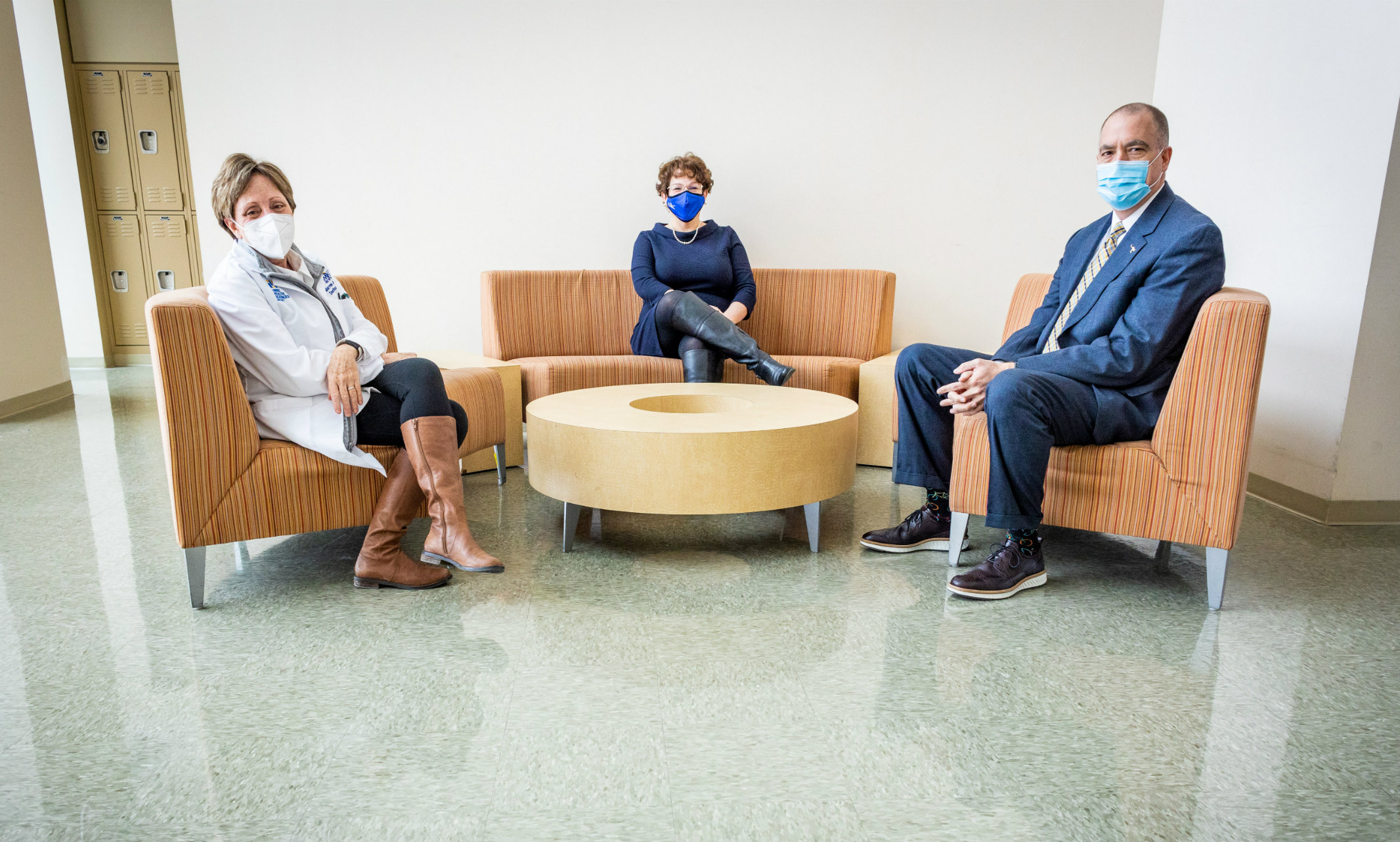
Updates on developments and distribution
UMKC is one of the fortunate few universities in the U.S. to have its health professions schools clustered on one campus, and its medical, nursing, pharmacy and dental faculty and students have been on the front lines fighting this pandemic since the beginning.
This Q & A round table with the UMKC Health Sciences Campus deans will be updated often with the latest information about the COVID-19 vaccine, its effects, distribution and developments.
Mary Anne Jackson, dean of the School of Medicine; Russ Melchert, dean of the School of Pharmacy and interim dean of the School of Dentistry; and Joy Roberts, interim dean of the School of Nursing and Health Studies, are involved in leading vaccination efforts for our campus and Kansas City area communities.
Need a vaccine?
We continue to offer vaccinations to members of our campus community through our partners at Truman Medical Centers/University Health. Register online or call (816) 404-CARE (2273) and press option 1.
After you get the vaccine, should you still follow social distancing guidelines? Should you still quarantine if you’re exposed to someone who’s tested positive for COVID-19?
Jackson: Yes, you should still mask and socially distance. The CDC just came out with new guidelines on quarantining. You do not need to if it's been two weeks or longer after your second dose.
Currently, there are two companies that have two-dose vaccines, Moderna and Pfizer. How are they being distributed?
Jackson: States are distributing, and there is no clarity on how many doses each site is given. It is in a tiered system, with frontline workers receiving in the first tier. (Here are the tiered vaccination distribution plans for Missouri and Kansas).
Roberts: Distribution of the vaccine from the federal government to the states has been a tremendous challenge. Once the supply is large enough and is rapidly distributed to the states, the benefit to Americans will be clearly visible.
Melchert: We are preparing and beginning to plan how we might more broadly impact our communities and especially those in Phase 1A, Phase 1B Tier 1 and Tier 2 who are currently eligible. Teaming with our regional and state partners to leverage our assets with theirs is essential to efficiently reach those who are eligible to receive the vaccine. To that end, we need to get vaccine and we are trying. It is really difficult right now with the short supply and high demand. However, I suppose the high demand is a good thing because the more folks who get vaccinated, the more likely we are to achieve “community immunity.”
Tell us about the Johnson & Johnson vaccine.
Jackson: The Johnson & Johnson vaccine has a good safety and effectiveness profile, a single dosage and no cold chain issues (they don’t require the ultra-cold storage like the current vaccines do), which makes this vaccine a potential game changer if we can get a large supply.
Why is it important for seniors to get vaccinated?
Jackson: Compared to a 30 year old, anyone 65 and older has a 100 times increased risk of dying from COVID, anyone 75 and older has a 1,000 times greater risk of dying and anyone 85 or older has a 10,000 greater risk of dying.
The vaccine supply is likely going to increase in the coming weeks: Pfizer has promised 200 million doses by end of March, Moderna 100 million doses and Johnson & Johnson an initial 20 million and then 60 million by end of April. All good news.
With the Johnson & Johnson vaccine access at pharmacies, seniors know how to navigate - this is where they get their flu shot - and should increase access and uptake.
How should people sign up for the vaccine?
Jackson: The best strategy is to register in multiple places, with your county, and with your primary-care physician on their websites (In Missouri, here are the Jackson, Clay and Platte county sites; in Kansas, here are the Johnson and Wyandotte county sites).
What is getting the vaccine like?
Roberts: The vaccine injection was done by the very skilled registered nurses at Truman Medical Center. The injection was not any more painful than any other shot, however the muscle was later sore for about 8 hours. After that, there were no issues. Our partners at TMC are operating a very well organized vaccination clinic providing expert nursing care and safety measures.
How effective is the vaccine?
Jackson: Both the Moderna and Pfizer have high rates of effectiveness, including against the UK B117 variant (a newer mutation believed to be more infectious) and has some coverage against the more mutated South African strain. It cannot give the infection, none of the vaccines contain live virus. It won’t change your DNA – it uses small amounts of messenger RNA that guides your body to make the antibodies, then breaks down; it cannot enter your DNA. It won’t cause infertility; there is no link to miscarriages or infertility. Still, those who are pregnant should consult with their physician.
How has UMKC helped the community with the vaccine?
Melchert: The School of Pharmacy has an army of student pharmacists and faculty pharmacists who are certified and very experienced with providing vaccinations, including the wonderful work they do every year to provide influenza vaccines for the UMKC community. Many of our students and faculty are also participating with many of our partner organizations in Kansas City, Columbia, Springfield and around the state. Dr. Cameron Lindsey and her team are partnering with the Medical Research Corp of Kansas City, the Greater Kansas City Dental Society, the Missouri Dental Association, KC CARE Health Center and others to offer a clinic in February for local area health practitioners, especially dental practitioners, pharmacists, nurses and emergency medical technicians and others in Phase 1A who have not otherwise had an opportunity to get vaccinated. Keeping our health care providers protected will increase capacity to serve those needing services.
Roberts: The School of Nursing and Health Studies has students and faculty who are educated and skilled vaccinators, ready to assist in the immunization effort as soon as mass vaccination sites have enough vaccine available. Our students have had the option to volunteer as COVID testers and as vaccinators at various sites in the metro area, including at the UMKC Student Health Center.
Jackson: Besides being vaccinators, we provide information about the vaccine at forums. The School of Medicine hosted “COVID Vaccine: Fact or Fiction,” a virtual community-wide forum with school faculty and alumni physicians on Feb. 4.
Give us your final thoughts about the vaccine.
Roberts: The COVID 19 pandemic has been a colossal challenge to the United States. The rapid creation of a safe, effective vaccine is nothing short of miraculous. This vaccine needs to be distributed as quickly as possible to all Americans, utilizing every trained vaccinator from registered nurses to pharmacists to physicians, while at the same time being shared globally. It will take immunizing the global population to end this pandemic.
Jackson: There are no restrictions on who can receive. The oldest and those with immune-compromising conditions may not have immune response that is as good as those who are younger and healthier, but there is no downside to the vaccine.
Melchert: The vaccine is a huge step for us to combat COVID. The more informed we can be about the safety of the vaccine, the more people can benefit from the protection it provides. However, keeping each other safe, even with the vaccine, includes continuing to be vigilant with wearing masks, washing hands, social distancing and remaining at home when you have symptoms.
Jan 28, 2021
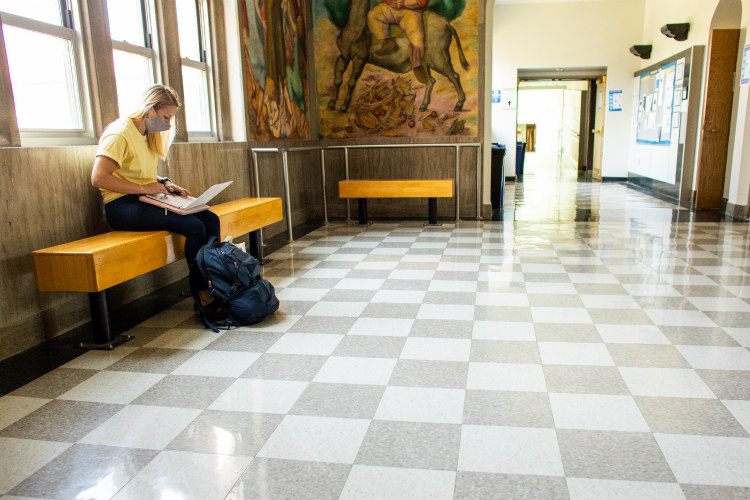
Students and alumni share their stories
Students face many challenges when making college decisions. For many, one of the biggest is deciding on a program of study. They want and need a program that is affordable and flexible and will prepare them for a great job after graduation.
The Bachelor of Liberal Arts degree at the University of Missouri-Kansas City College of Arts and Sciences is designed for those who seek scientific literacy, an understanding of social sciences and an appreciation of the humanities but do not wish to commit themselves to a specialty.
UMKC B.L.A. students gain maximum course flexibility and a tailor-made program providing an alternative to a traditional Bachelor of Arts or Bachelor of Sciences degree program. The B.L.A. program also is a good option for individuals who want to return to college and finish their degrees.
“The B.L.A. is a popular and great choice for these students as it is the most flexible program we offer in terms of transfer credits and ease of course scheduling,” said Emma Casey, UMKC College of Arts and Sciences manager of Recruitment and Outreach. “With our current world situation, I am seeing an influx in non-traditional, adult and transfer students applying to return to finish their degrees.”
A liberal arts program helps students become well-rounded in a variety of subjects and helps students acquire knowledge and skills about a variety of subjects and careers. Students learn a wide range of skills that prepare them for a variety of professions that can include account executive, analyst, business development manager, copywriter, communication specialist, physician, health care professional, entrepreneur, human relations specialist, journalist, lawyer, legislative assistant, nonprofit director, policy analyst, professor or public relations manager.
The UMKC degree is particularly beneficial to students who matriculate into the six-year medical program and pursue the combined B.L.A./M.D. degrees and those applying to UMKC School of Law through the early-entry law program.
A dedicated B.L.A. advisor is provided in the professional advising office. Students also can work with the specific departmental advisor in a chosen minor and can seek out any of the college’s advisors as they determine the focal points of their studies.
Meet some students and a graduate.
Vickie Goods
Vickie Goods
When you enrolled at UMKC, were you new to college or were you returning to finish a degree?
I returned as an adult learner. I took a 3-year hiatus from my academic journey. I've been pursuing my bachelor's degree since I was 19. I enrolled at UMKC in 2018.
Why did you decide to finish the degree?
I continue my academic pursuit to be a role model for my two adult children, Ashley 28 and Jordan 21. I wanted to show them you never give up on your dreams. It's never too late to start over and create a new beginning. My initial goal was to graduate with a business administration degree, but life took me on a different path.
Why did you choose UMKC?
I submitted applications to several universities in the local KC metro area. I wanted to have the full college campus experience that I experienced when I first began my journey. I felt more connected with UMKC. I like the diversity and I knew this is where I should attend.
Why did you choose a Bachelor of Liberal Arts degree?
I didn't choose a Bachelor of Liberal Arts degree, it chose me. I had earned college credits from previous universities.The accumulation of those credits happily aligned me in the Liberal Arts department.
What are your career/job plans?
When I close this chapter of personal achievement, I plan to enroll in a graduate program to obtain a degree in social work, counseling or Christian leadership. I plan to spend the first few years after graduation working as a school counselor or entry-level nonprofit position. I look forward to a future where I can use my tools and resources to serve others.
When will you graduate?
May 2021
"I wanted to show them you never give up on your dreams."
What do you want people to know about getting or finishing a college degree?
Be patient. Embrace the journey. Seek assistance and utilize resources that's available to you. It's okay not to be okay at times, just don't give up on yourself!
What do you want people to know about UMKC?
The faculty, staff, instructors and advisors want you to succeed. Speak up and tap into the resources.
What do you want people to know about you and any challenges you have had?
I endured many detours and realignments upon my journey. I graciously accepted each challenge of womanhood. Once I gathered all my broken pieces, I created a mosaic of self-love, strength and joy. Remember to take time for yourself as you set goals. Focus on the progress and never be anxious about the accomplishments. Don't be afraid or ashamed to hit the reset button whenever necessary. Trust yourself, enjoy and embrace the journey; you will arrive at your destination at the right time.
Rebecca Overbey
Rebecca Overbey
When you enrolled at UMKC, were you new to college or were you returning to finish a degree?
I returned to UMKC to finish my degree. With the B.L.A. program, I am able to continue my career path and achieve my goal of completing a degree. The program I previously studied was different than the one I am pursuing now.
Why did you choose UMKC?
I did look at other schools; however, UMKC provided a program that other schools did not, which would allow me to complete my degree faster than the other schools.
Why did you choose a Bachelor of Liberal Arts degree?
The B.L.A. program accepted all of my credits from other schools I have attended.
What are your career/job plans?
I currently have a job that I enjoy and getting a bachelor’s degree will provide me the opportunity to further my career with my company.
When will you graduate?
Aiming for fall 2021
"UMKC provided a program that other schools did not, which would allow me to complete my degreefaster than the other schools."
What do you want people to know about getting or finishing a college degree?
It was certainly a challenge getting back into the swing of school, but I feel that I have more motivation to earn my degree than I have in the past. I would tell others that not every person’s college path looks the same and it’s the end result that matters the most. Your timeline is your own.
What do you want people to know about UMKC?
I have attended a few schools and what makes UMKC different are the professors. All of my professors have cared about me as an individual, which is something I was missing at the other schools I attended.
What do you want people to know about you and any challenges you have had?
While completing my degree in my early 20s, I went through an entire semester of classes with a case of mono that went undiagnosed until the semester was over. Not only did this ruin my motivation to continue with school, but it made me feel as though earning a degree was unattainable. My confidence in my intelligence was broken. I decided at that time to focus on my career and I have worked hard to get to where I am within my company today. I have always said that I would consider finishing my bachelor’s degree if it was required for future career advancement. So, to give myself potentially more opportunities, I started taking classes, just one at a time, to rebuild the self-confidence I had once lost. Not only have I gained that confidence back, but I feel more confident in my job as well. My college career has been anything but traditional and I don’t think I would change the direction it has taken me.
Jessica Keith
Jessica Keith
When you enrolled at UMKC, were you new to college or were you returning to finish a degree?
I transferred to UMKC as a sophomore, still unsure of what I truly wanted to major in. I entered as a criminal justice and criminology major before switching to English, then sociology and finally to the B.L.A.
Why did you choose UMKC?
I initially chose K-State for the scholarships they offered. When I decided to move back to my hometown of Kansas City, UMKC was my first choice. I had visited UMKC in junior high for a writing program, and remembered loving the campus. The urban environment was a welcome change from the rural campus I was used to.
Why did you choose a Bachelor of Liberal Arts degree?
The Bachelor of Liberal Arts degree was perfect for someone as intellectually curious and indecisive as me. I changed my major a whopping seven times between both schools I attended, which left me with many credits across the liberal arts but few toward any specific degree. I loved that I could combine coursework in my many areas of interest to build the B.L.A. degree.
What are your career/job plans?
The breadth of the B.L.A. and the many skills I learned in my courses enabled me to work as a test prep tutor for two years, which I absolutely loved. From there, I began working in education administration, which led me back to UMKC, where I now serve as the senior executive assistant in the College of Arts and Science dean’s office.
When did you graduate?
December of 2016
"The Bachelor of Liberal Arts degree was perfect for someone as intellectually curious and indecisiveas me."
What do you want people to know about getting or finishing a college degree?
While future job prospects are an important consideration, a college degree has so much more to offer. The skills you gain, people you meet, perspectives you learn and experiences you find and create will bring fulfillment and growth to your life no matter what you end up doing with your degree. And it probably won’t be what you planned!
What do you want people to know about UMKC?
UMKC is a place where people care about you as a person, not a number. There are so many unique opportunities on campus and in the local community, so you can really explore and find your passion.
What do you want people to know about you and any challenges you have had?
Life will get in the way of education. Whether it’s work, or family, or health, or a global pandemic, the important thing to remember is why you are working so hard toward your degree. As a first-generation college graduate and the oldest of six siblings, I was motivated to prove to myself and my family that success is possible when we stretch. But a degree isn’t the end. Keep learning and stretching and pushing past the growing pains, and opportunities will come your way.
Jan 27, 2021
Bloch associate professor weighs in for KMBC
“Just the speed at which it happened and the magnitude at which it happened certainly would make me nervous that it’s not here to last,” said UMKC associate professor of finance Nathan Mauck. Read the full story and watch the newscast.
Jan 27, 2021

HUD funding for UMKC in partnership with Children’s Mercy and city
The U.S. Department of Housing and Urban Development has awarded $700,000 to the University of Missouri-Kansas City to explore and evaluate best practices for identifying and removing lead paint hazards from Kansas City homes.
The grant is in partnership with the Kansas City, Missouri Health Department's Childhood Lead Poisoning Prevention Program and Lead Safe KC Project, which helps remove lead paint hazards in homes of families with young children; and Children’s Mercy Environmental Health Program, which has assessed more than 1,400 homes for environmental risks and supports allergen research.
Homes that were built before 1978 might contain lead paint, which could put residents, especially young children and pregnant women, at risk for lead poisoning. Lead poisoning can cause speech delays, brain damage and other health effects.
Using Kansas City and Children’s Mercy data, the UMKC Center for Economic Information will perform a comparative impact analysis of the specific lead hazard control treatments used in the intervention in terms of blood-lead levels and social costs.
“The goal will be to develop a data-driven quality improvement evaluation model that HUD-sponsored lead-hazard control programs will be able to use in the management and performance evaluation of their own programs,” said Doug Bowles, Ph.D., director of the UMKC Center for Economic Information, co-principal investigator on the grant.
“An additional goal will be to develop a data-driven, housing-based index that lead-hazard control programs can use to select the homes most in need of lead-based hazard remediation,” said Steve Simon, Ph.D., of the School of Medicine and co-principal investigator on the grant.
The study will examine data from the Kansas City Health Department, comparing lead poisoning information with home repair strategies to determine the most effective, sustainable and cost-efficient methods of protecting families.
Jan 27, 2021
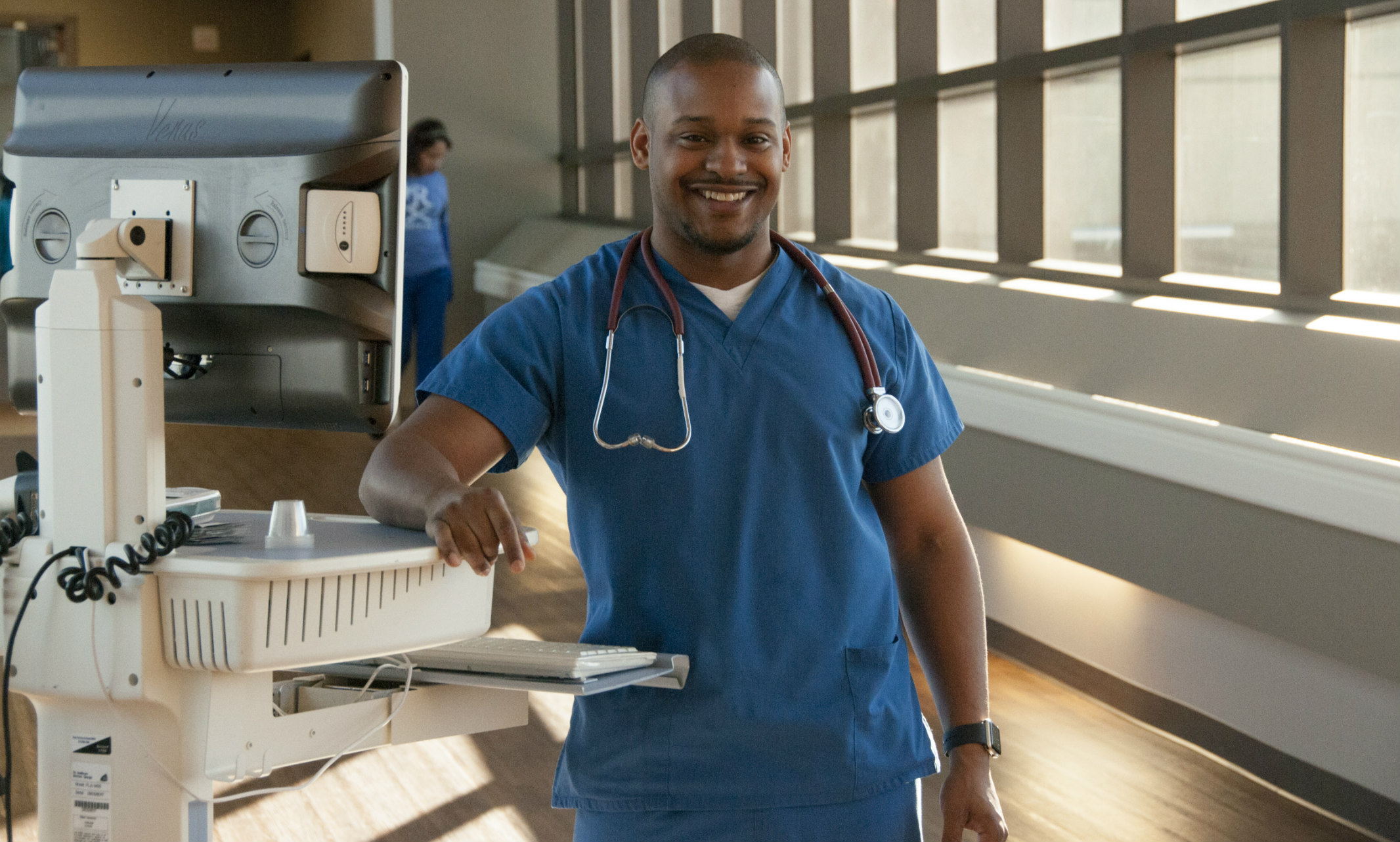
U.S. News & World Report evaluates online graduate programs
The University of Missouri-Kansas City School of Nursing and Health Studies ranked No. 23 among the nation’s best online graduate nursing programs of 2021 by U.S. News & World Report, giving it at least a Top 30 ranking for the ninth year in a row.
The UMKC ranking, released Jan. 26, is the highest of any university in Missouri or Kansas. UMKC climbed three spots from last year’s No. 26 ranking.
The UMKC School of Health Studies takes pride in the continuing recognition of its online Master of Science in Nursing (MSN) program as one of the best in the nation, said Joy Roberts, interim dean. This past year, it has meant more than ever.
“The pandemic has demonstrated the value and the need for high-quality online nursing education,” Roberts said. “Our May and December 2020 online MSN graduates went right to work on the front lines of the battle against COVID-19 in hospitals locally, regionally and nationally.”
The UMKC School of Nursing and Health Studies is a pioneer in distance-learning programs, offering online advanced degree programs since 2002. The programs offer busy professionals a high-quality but convenient way to further their careers and meet the needs of an evolving health care system.
Online students are expected to participate in online discussions as if they are present in the classroom. Technology offers two-way communication in real time via multiple modes. Students also experience on-site learning through summer institutes where they are required to attend clinical training or dissertation work sessions, and deliver presentations to classmates and faculty.
UMKC offers a variety of online graduate nursing tracks, including Master of Science in Nursing (MSN) and other options:
Adult-Gerontology Primary Care Nurse Practitioner (AGNP)
Family Nurse Practitioner (FNP)
Neonatal Nurse Practitioner (NNP)
Nurse Educator (NE)
Pediatric Nurse Practitioner (PNP) Primary Care and Acute-Care (AC PNP)
Psychiatric Mental Health Nurse Practitioner (PMHNP)
Women’s Health Nurse Practitioner (WHNP)
Ph.D.
Doctor of Nursing Practice (DNP)
U.S. News began ranking online education in 2012. The categories include faculty credentials and training; student engagement; admissions selectivity; peer reputation; and student services and technology. U.S. News began their data comparisons with more than 550 institutions that had accredited graduate degree programs in nursing. Among the ones that replied, more than 194 said they offered online graduate nursing programs. The number of online nursing programs is continually growing nationwide.
Jan 26, 2021
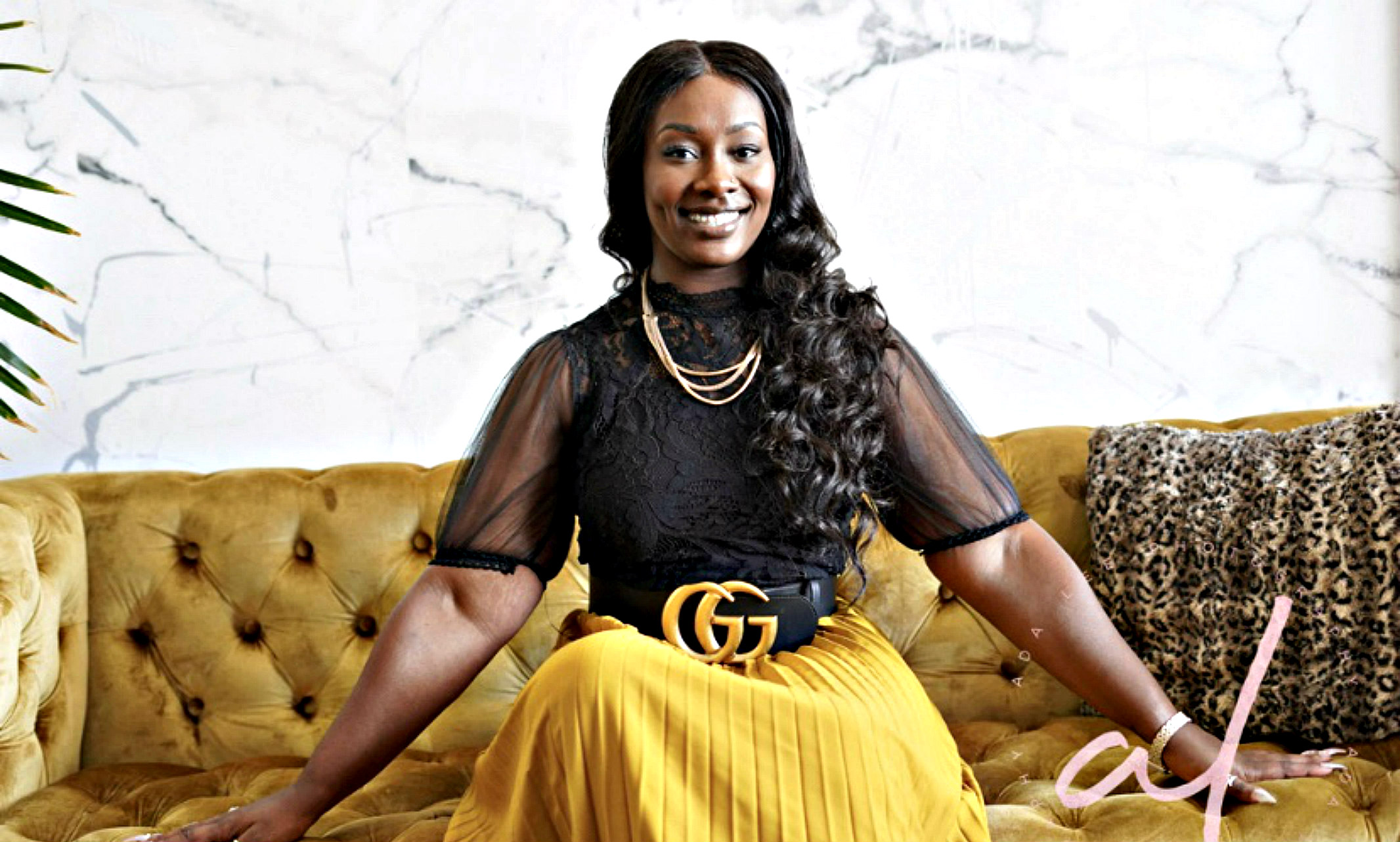
Bloch grad and former basketball player is a Dallas Black Chamber of Commerce vice president
Our ongoing story starts with people from around the world, converging here at UMKC. Get to know our people and you’ll know what UMKC is all about.
Jade Tinner ‘12 Academic program: Business Administration -- Marketing, Henry W. Bloch School of ManagementHometown: Canyon, Texas
Jade Tinner runs her public relations firm, JTBE INK, while serving as vice president of community investment for the Dallas Black Chamber of Commerce.
Tell us about your current position.
I’m currently the vice president of community investment for the Dallas Black Chamber of Commerce. In my position, I develop and implement strategic plans to ensure that communications, programming and corporate relations are effective and support the mission and goals of the DBCC and deepen the organization’s impact in the community.
Was it solely basketball that brought you to UMKC? What else appealed to you about campus or the experience?
Basketball introduced me to UMKC, but the campus and coaching staff is what influenced my decision to commit to UMKC. I also loved the fact that It was far away from my hometown. I was ready to experience something new.
What was your favorite thing about UMKC?
The opportunity to be involved in other activities outside of sports. During my time I served as the treasurer of The African American Student Union, won the Miss Black & Gold pageant and am a member of Delta Sigma Pi.
How did you choose your field of study?
I always knew I was going to own something, and I needed to learn all I could about business and all of its functions. Marketing seemed to make the most sense for me as a creative.
What are the challenges of your field?
The main challenge in the marketing field is the broad overgeneralized definition of “marketing.” With technology changing daily, new marketing trends emerge as soon as you learn the last one. But the challenge of competing with yourself daily to be better than the day before is exciting.
What are the benefits?
Marketing at this time is the era of digital everything. For a creative like myself, this gives us the opportunity to really step outside of the norm, (because what is normal now?), think outside the box and explore, test and improve new and existing marketing efforts.
Has the discipline of being an athlete helped you in any way as far as digging in and getting through this challenging time?
Absolutely. I always say that basketball was my first love and my first teacher. It taught me to really buckle down and work hard on myself to be in the best shape possible or – in the best headspace possible – to accomplish everything going on. Off the court, I still have to make sure that I'm taking care of myself and I'm taking care of business.
Tell me a little bit about the business. What are you working on, how did it evolve and how is it working out?
It’s a lot like college. I always say I was so used to being busy, especially playing basketball and being involved in other organizations on campus. I was always going. That's the still the space I operate in. I want to be busy. I want to be doing something. I want to be helping people.
"The main challenge in the marketing field is the broad overgeneralized definition of 'marketing.'" — Jade Tinner
As the vice president of community investment for the Dallas Black Chamber of Commerce, we advocate for the creation, growth and general welfare of Black-owned businesses in the North Texas region. I was on the board of directors before taking the full-time role as marketing director.
I started the One Unified Resource Foundation – or OUR Foundation. The biggest initiative is mentorship for young men ages 12 to 18. We're actually getting ready to implement the program in a local high school here in Texas.
It seems that the combination of philanthropy and business is part of your mission. Has giving back always been something that you've been interested in doing even before you were working?
I think it just comes naturally and I feel like it’s what we're supposed to do -- or at least what I'm supposed to do.
Did you see that in your family or your community growing up?
Some of the giving back was a learned behavior. And then some of it is just seeing how hard my mother worked, my grandmother worked and my great grandparents worked. They instilled that in me.
Also, my grandpa always said “Never, never let someone go hungry.”
So, I love feeding people whether I’m cooking at home or it's going out to eat. I love to provide an experience, whether it's through one of our organizations’ events helping these young boys, or it's an event or program through the chamber.
In your opinion what are the most important areas a business owner should be focused on right now. And is it different for Black owned business than it is for business in general?
There aren’t differences on what the focus needs to be, but there are differences in the way we have access to capital.
I think the main focus for 2021 is obtaining enough financial capital to sustain the business. How are you going to obtain that? Are you applying for government relief funding? What is your relationship with your financial institution?
One of the major differences for Black-owned businesses or minority-owned business is the lack of relationships with their financial institutions. A lot of people in the United States discovered that when the first round of relief funding happened.
"I want to be busy. I want to be doing something. I want to be helping people." — Jade Tinner
Another really big takeaway from 2020 is that business owners should focus on being virtually and digitally present. And we need to plan long-term. There is no timeframe of when this could be over. So, how is your business going to sustain?
And then once this is “over,” business is going to look totally different. So, you need to know how your business is going to be able to stay up with the new technologies and how services are provided.
Do you have predictions on how it's going to look different?
The pandemic has changed so many things. For example, we know there's money that can be saved because now we know that people can work from home effectively.
In addition, a lot of new businesses have been created within the year because people lost their jobs and they had to figure out ways to stay alive. They may have turned their side hustles into their full-time means of income. We've seen a lot of new businesses like this coming to the chamber.
You have posted on social media about the focus on women creating wealth. Why is that a priority for you?
Specifically for me and in the chamber, I've worked in male-dominated industries. Most of us do, and, being an athlete, I always dealt with assumptions like the idea of boys being better at handling the ball than girls. I want that kind of mindset to change. I’m responsible for corporate partnerships and external communication at the chamber. I wanted to see what our history was in these areas and women’s names are very, very scarce. It’s been one of my focal points as a part of the staff to recognize that Black women are making contributions to our community and our business community.
"I always dealt with assumptions like the idea of boys being better at handling the ball than girls. I want that kind of mindset to change." — Jade Tinner
Right now, Black women are the number one leading demographic in the state of Texas for new startups. So, it's amazing that there is a need to bring this to people’s attention. Still, the average revenue for these businesses is around $40,000. Imagine $40,000 being your sole means of income and the capital to fund your business.
So, it's very important to feed financial capital into these businesses as well as social capital, because networking with like-minded people – like-minded business owners – that you can partner with and collaborate with is part of our focus.
What are your goals for the future?
To change the world! Within that there are some milestones to accomplish all for the betterment of our communities.
Learn more about Jade
What is one word that best describes you?
Blessed
Do you have a motto you live by?
Let’s get LIT (Live Intentional Today)!
Treat others how you want to be treated!
Were you a first person in your family to attend college?
I am not the first to attend college, but am the first to graduate from college. I’m the manifestation of all of the hard work my mom, grandmother, and great grandparents put in.
What did you learn about yourself while you were here?
I learned that I am definitely a city girl! Being in Kansas City opened my mind to all of the possibilities that are out there in the U.S. and across the world. I also learned how to be an adult, overcome obstacles and persevere through hard times.
What’s your favorite place in Kansas City?
My favorite place in Kansas City is the Jazz District. So much history and culture in one concentrated area.
What is your advice for a student entering UMKC?
Find a mentor, find your group of friends, get involved, save your money and enjoy your entire experience.
Jan 25, 2021
Mary Anne Jackson, School of Medicine dean, was a guest on KBIA.
Like most of its area counterparts, the Unified Government Public Health Department is struggling to navigate the distribution of the COVID-19 vaccine. Until we all have been inoculated, the dean of the UMKC School of Medicine says now is "not the time for us to let down our guard." As a new coronavirus strain gains traction in the U.S., it's important to continue following guidelines to prevent spreading the disease. Listen to the podcast.
Jan 25, 2021
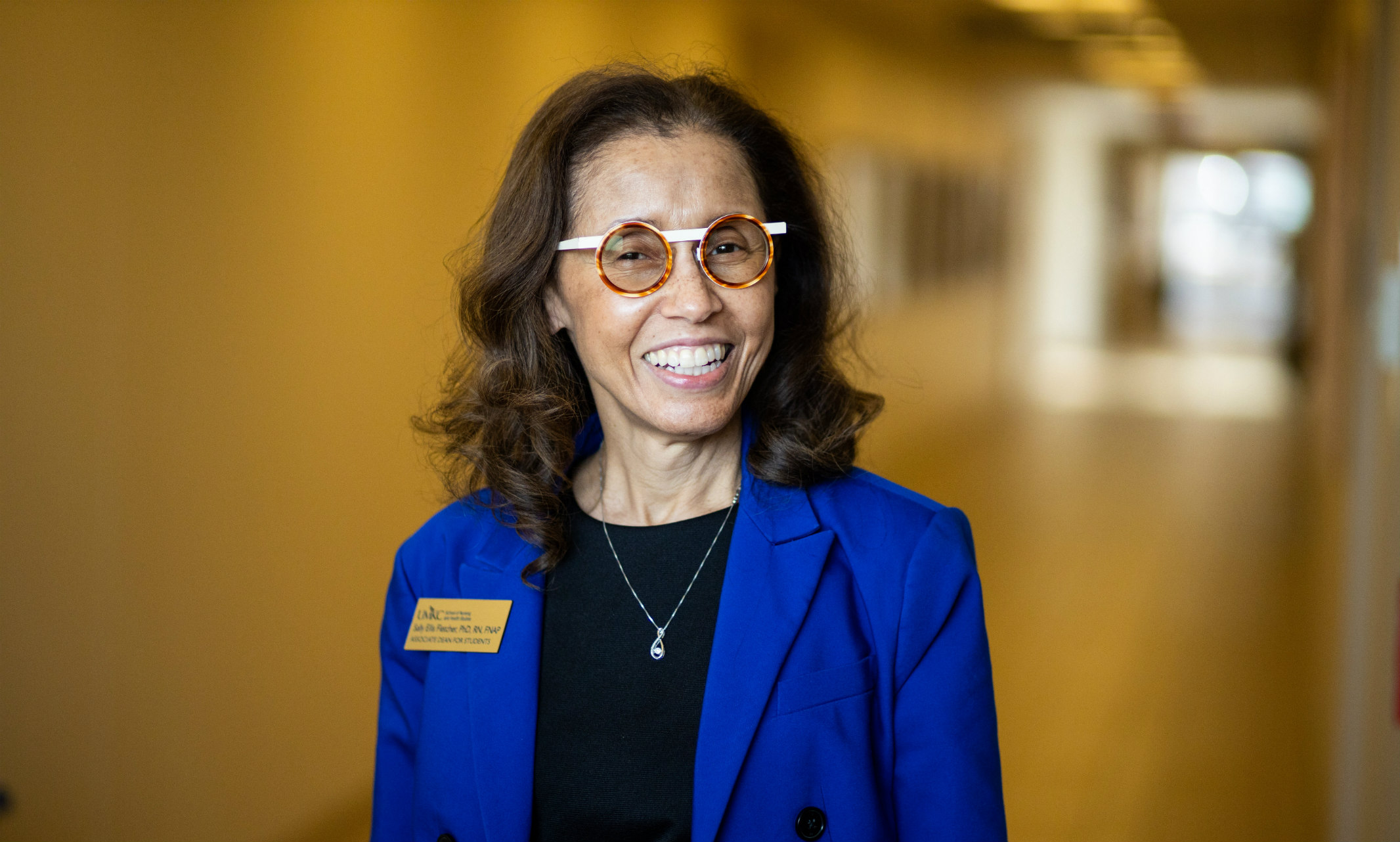
Sally Ellis Fletcher shares her passion for nursing, education and social justice
The Black Excellence At UMKC series helps to increase awareness of the representation of diversity and equity on campus and show a visible commitment to the inclusion and recognition of Black faculty and staff. This series celebrates and highlights Black and Roo faculty and staff working behind the scenes and on the frontlines to help our university achieve its mission to promote learning and discovery for all people at UMKC and the greater Kansas City community.
Sally Ellis Fletcher developed her passion for education, nursing and social justice when she was just a child. She’d dissect grasshoppers and demonstrate to her toys what she was doing. As a teenager, she worked in an infirmary and enjoyed caring for the students. Having grown up in a family that was active in social justice, she was leading her first workshop by the age of 14. So, her current role as associate dean for students at the School of Nursing and Health Studies is a natural blend of the causes she cares most about. In our newest Black Excellence At UMKC feature, Ellis Fletcher shares how she combines her servant leadership and career experiences to help inspire future care providers.
"While I’m not working directly in health care, the principles of patient care are still at the core of what I do."
Name: Sally Ellis Fletcher Job Function: School of Nursing and Health Studies, associate dean for studentsTenure: 2015Hometown: Kansas City, MissouriUndergraduate University: Avila University (College)Graduate University:UMKC Master of Science, Nursing, Women’s Health CareUMKC Post-Master, Nurse Practitioner, Women’s Health CareUniversity of Rochester, Rochester, New York, Ph.D., Dissertation - Entrepreneurship in Nursing
Why did you choose UMKC as the place to grow your career?
The mission and vision of UMKC align with my personal values, especially the six core values of the School of Nursing and Health Studies: respect, inclusion and diversity, integrity, excellence, innovation and health. These values give each member of the School of Nursing and Health Studies community an equal foundation, or starting point, to learn, grow, develop and launch their dreams into the world.
What do you enjoy most about working at UMKC?
The students that come to UMKC trust us to guide them toward achieving their dreams. Students come through our doors with a dream for their lives and we have a big part in helping them get there. Everyone’s role is important in helping launch students into the next phase of their lives.
As a nurse, you’re educated and prepared to work with everybody in the health-care system. You’re not isolated; you have to be a spiderweb. You have to think about public health, rehab, critical care, etc. So, while I’m not working directly in health care, the principles of patient care are still at the core of what I do. I transfer my nursing skills into academia. Nurses think globally, and about resources, patients/consumers will need to achieve their optimal health. When I’m helping students, I think globally about the resources available, and what needs to happen for them to succeed. I’m still functioning as a nurse, but now I’m an academic administrator in nursing education.
"There’s a saying, 'nobody cares what you know, until they know that you care.' I try to always care."
What are the challenges of your career field?
There are never enough student scholarships.
I have a vision that every student entering the School of Nursing and Health Studies would be part of a “pay it forward program.” Each student would receive 50 to 70 percent of their tuition in scholarships, with the stipulation they participate in paying it forward through recruitment, community service and post-graduation financial investment in future students. Don’t laugh, but I think about how I’d pitch this idea to Dolly Parton, Oprah and Stedman, Malinda and Bill Gates, Beyoncé and Jay-Z, or anyone else who would listen.
What are the benefits of your career field?
I see the future of healthcare through the potential of every student. It is truly exciting!
How do you connect and establish relationships with Black faculty and staff in other units and departments?
My position keeps me very busy and, like most of us, our schedules are frequently double, or triple booked. So, I’m not always able to attend certain functions or group gatherings.
Yet, humans have this magnetic power to bond together through common experiences. When serving on committees or sitting in meetings, you’re drawn to someone, friendships are created and you support one another long term.
I serve on various committees and I always try to speak on behalf of diversity, equity and inclusion (DEI). I’m frequently asking, “have we considered the student perspective? Have we considered DEI?”
What is your primary research focus?
Cultural sensibility in health care. I published a book about this at a time when people were discussing “cultural competence.” I didn’t feel that was a good term. The book explores how nurses and healthcare workers can provide proactive culturally sensible care to patients/consumers. The vignettes in the book come from some of my own experiences and experiences that others have shared with me; hopefully, they can help people see and work through their biases, prejudices and stereotypes.
"I see the future of healthcare through the potential of every student. It is truly exciting!"
How are you involved in the Kansas City community?
I’m honored to serve on the board of Newhouse, a Kansas City shelter for individuals experiencing domestic violence. Our doors are open to women and their children, as well as men and their children. We have a new CEO that is innovatively leading the shelter to break the cycle of domestic violence.
Describe your mentoring relationships with students.
I always tell students that “I’m here.” I try to tear down the walls and just be real. If something happens with a student, I try to get to the root of the issue by asking more questions and listening to them and their life experiences. There’s a saying, “nobody cares what you know until they know that you care.” I try to always care.
What is one word that best describes you?
A “realistic optimist.” I know, that’s two words. I see life as a glass half full, and I choose to believe the best is possible. Yet, I am very realistic.
What is one piece of advice you’d give a student wanting to follow in your footsteps?
Don’t follow my footsteps, create your own path. You have talents and life experiences that make you wonderfully special to do greater things than what I do.
Jan 22, 2021
Arts publications promote UMKC Theatre production
The Coterie and UMKC Theatre present BRAINSTORM: The Inside Life of the Teenage Mind, a virtual co-production that combines theatre, scientific research, and the true personal experiences of local teens to create a fun and thought-provoking performance offering a unique look at why the teen mind works the way it does. Read the article by KC Applauds. A story about this performance also appeared in The Pitch, KC Live Theater and KC Studio.
Jan 21, 2021
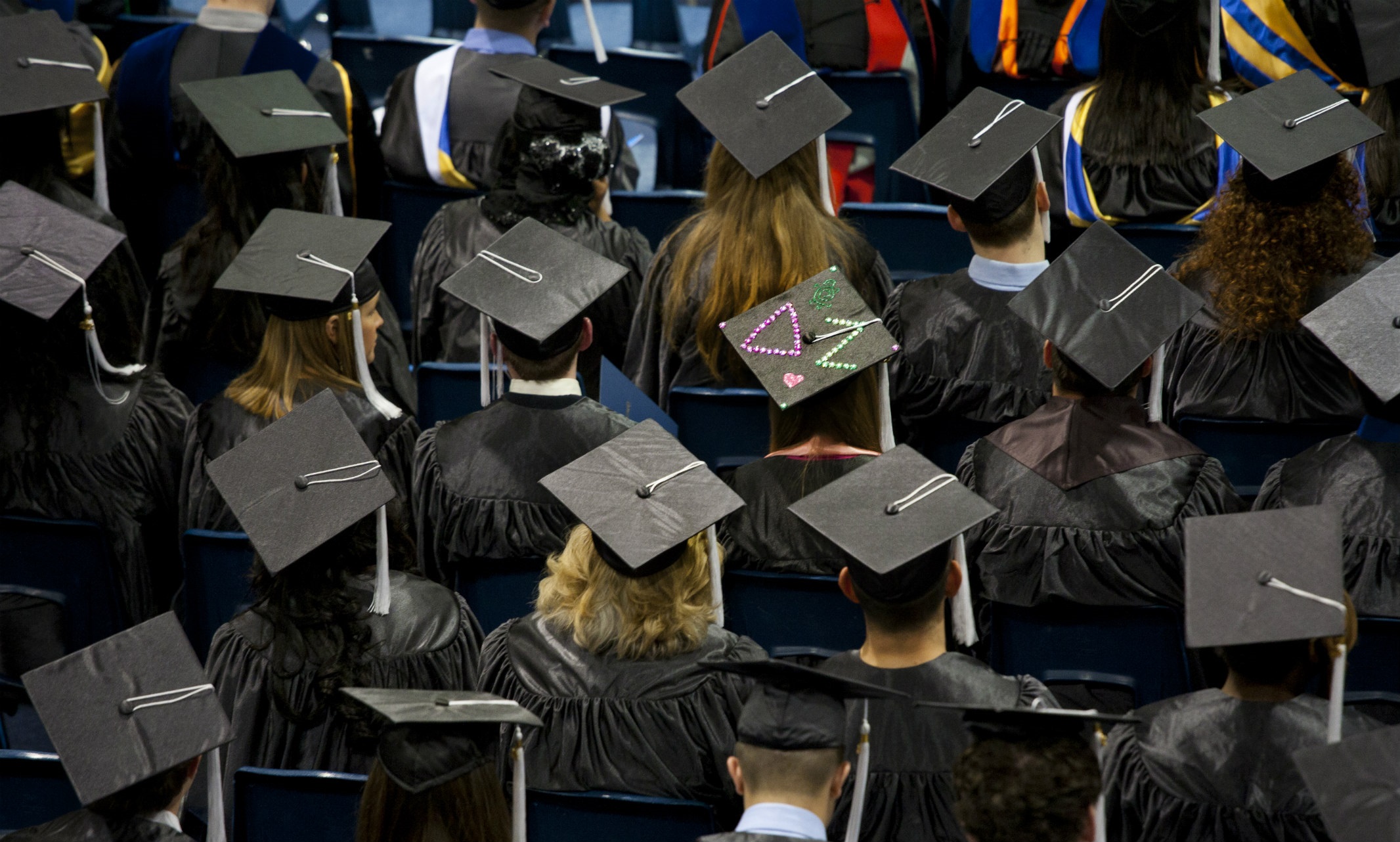
Crankstart Scholarships are designed for nontraditional students
Not all students take a direct path from college initiation to graduation. Sometimes circumstances intercede that require degree-seekers to take a break, but that does not mean they do not have a viable path to graduation.
Vickie Goods is currently pursuing a liberal arts degree and is planning on graduating in May. It wasn’t long ago that she did not think a college degree was within her grasp.
“I’d gone to college in Louisiana briefly and when I moved to Kansas City, I wanted to finish my degree.”
Goods was recently divorced and a single mother. She attended a private university and exhausted her Pell Grants, but despite her efforts wasn’t able to finish.
“Nothing seemed to be working out, but I was determined,” Goods says. “I was working with a woman at the Full Employment Council, and I broke down. I just felt I couldn’t get over this hump in my life, and that I really wanted to finish college.”
The woman helping her told her she had options.
“She said, ‘I know someone who can help.’”
Goods contacted KC Degrees and received information about KC Scholars and the Crankstart Foundation Reentry Scholarships at UMKC. She was able to enroll and is planning on graduating in May 2021.
“I’m so excited. Everything has been so up and down, and so many people are struggling. I’m so grateful.”
“We want people to know that there are resources designed specifically for returning students.” – Katie Anton
Goods is not alone in her struggle or her relief. Jessica Mason, B.A. philosophy ’20, graduated in December. Like Goods, Mason had gaps in her academic career because of economic issues and family obligations.
“Katie Anton told me about the Crankstart Scholarships.”
Anton is director of scholarships for the UMKC College of Arts and Sciences.
“We see so many students who have worked extremely hard and feel as if graduation is out of reach because of the expense,” Anton says. “We want people to know that there are resources designed specifically for returning students. There’s always a path to graduation.”
With Anton’s advice, Mason made the decision to finish her degree.
“The advice I give is that you should keep an open mind and do not be intimidated by having classmates younger than you.” – Jessica Mason
“The scholarship helped tremendously, especially in these times,” Mason says. “It allowed me to help pay for daycare for my youngest as well as provide little amenities that I had not foreseen such as parking passes and other fees that I encountered.”
Mason has encouraged several people who were considering returning to school that they should.
“The advice I give is that you should keep an open mind, and do not be intimidated by having classmates younger than you,” Mason says. “Also, try and involve yourself in groups, lectures and the experience as whole because it goes very fast.”
For more information on the Crankstart Scholarships and other paths to graduation, please contact UMKC Financial Aid and Scholarships.
Jan 20, 2021
Conservatory grad featured by Shawnee Mission Post
Kevin Cerovich grew up in the Kansas City area and attended UMKC, earning a Bachelor of Music in Jazz Trombone. Read more.
Jan 20, 2021
KCUR taps School of Education consultant
“Districts are clamping down on some of the political rhetoric,” said Brett Coffman, who taught social studies for 17 years in Raytown and Liberty schools and now works as a consultant for the University of Missouri-Kansas City School of Education. “I think that’s going to continue. There will be teachers that push back on that. I know that they are already.” Read more from KCUR.
Jan 20, 2021
KCUR taps Chi-Ming Huang to talk about concussions
Chi-Ming Huang, professor, UMKC School of Biological and Chemical Sciences, was a guest on Up to Date.
Jan 20, 2021

Public health course combines underlying science and the challenges of pandemic response.
Designing a course from scratch is no easy task. And when the subject matter is changing constantly, you have a real challenge on your hands.
But that’s what two assistant professors at the School of Nursing and Health Studies, Joseph Lightner and Sharon White-Lewis, did for the fall 2020 semester.
“When we realized this was a pandemic and something the world knew little about, those of us in public health said, ‘Someone should teach a course about this.’ And then we realized ‘someone’ was us,” said Lightner, who holds a master’s in public health and a doctorate in kinesiology and leads the nursing school’s bachelor of public health degree program. So he and White-Lewis, whose expertise includes disaster preparedness and response, designed a comprehensive course on the COVID-19 pandemic. It covered a lot of ground, from the history of the 1918 flu pandemic to what the coronavirus is, how it spreads and how it acts in a body, to COVID-19 treatments and vaccines, contact tracing and the country’s emergency preparedness and response in the first nine months of the pandemic.
Teaching about an unfolding pandemic also was a new challenge. White-Lewis said they frequently reacted to developments, quickly gathering reliable information and incorporating it into lectures and exercises.
From left, Assistant Professors Joseph Lightner and Sharon White-Lewis taught the course to 37 students including Lejla Skender and Denise Dean.
Everyone in the class took an online Johns Hopkins University course to become certified contract tracers. They also worked in teams to try to determine who brought COVID to the White House reception for Supreme Court nominee Amy Barrett Cohen.
“That was a fascinating exercise,” said Denise Dean, a senior working on a health sciences degree with a concentration in public health. “We worked in teams with data on everyone in attendance: when they showed symptoms, when they tested positive and had tested negative, and other activities they had engaged in. We had numbered photos, too, to show which people were close to each other.”
Dean, who has done research projects of her own and is an undergraduate research assistant, added, “We had learned in lectures when people are most contagious in relation to when they show symptoms, which helped us narrow the possible carriers.”
Lightner said the teams were able to determine three people in attendance who were the most likely to have brought the virus to that group of key government officials, though with this virus it could have been someone else who showed no symptoms. “That’s another thing the students learned: Public health can be messy and complicated,” Lightner said.
Your final: What do you do when a pandemic strikes?
The final exam was a drill on responding to a pandemic, said White-Lewis, who advised those who drew up the Kansas City area’s vaccine distribution plan and leads the area’s nine-county Medical Reserve Corps, a network of medical and public health volunteers.
Lejle Skender, a senior biology major considering medical school, said, “It was great to learn how all the parts of the medical system need to work together — who’s doing what behind the scenes to make sure people and materials are available in the right places.”
Dean added: “And we learned what happens when there’s an emergency and a good plan isn’t in place.”
The course had wide appeal, drawing 37 students, including nursing graduate students and undergraduates from majors including nursing, pre-pharmacy, public health, health sciences and biology. That student mix provided some challenges, Lightener said, “because we had to make sure the undergrads had enough of the basic sciences to understand when we got into the etiology, epidemiology and pathology of the virus and the disease.”
It also gave students access to dozens of other perspectives, especially on discussion boards that White-Lewis posted.
“The class was a big jumble of backgrounds and majors, but we all had the goal of learning about this virus and how that knowledge could benefit us in our careers,” Skender said. “We all learned from each other because, for example, some of us started with more science knowledge to share, and the graduate student nurses gave us a lot of information from their perspective as nurses.”
She added, “If the course is taught again, I would recommend it to anyone interested in a health care career.”
“That’s another thing the students learned: Public health can be messy and complicated.”
— Assistant Professor Joseph Lightner
White-Lewis, who earned her doctorate in nursing from UMKC in 2018, said the student discussions were valuable and enriching but often difficult.
“In the module on vaccines we did a discussion where they had to take 10 of their family and friends and decide who gets the five vaccine doses available and who could die,” White-Lewis said. “For me, it was really hard hearing from students who had family members who have died of COVID, and how they wished that everyone would take the virus much more seriously.”
Lightner said that it would be great to offer the course again, but that that did not seem possible without more resources dedicated to it. “It was great to develop the course and fit it in somehow last fall,” he said. “But Dr. White-Lewis and I both are research faculty who have to do our own research. I’m director of our public health degree program, and she teaches graduate research and has her emergency response and other duties.”
Whether the course can be taught again, Lightner said, “I think it’s clear this information is vital. However well the vaccines do, the evidence is mounting that practitioners are going to be dealing with COVID and its long-term effects for years to come.”
Jan 19, 2021
Columbia Missourian wrote about the music programs at UM System schools
UMKC has the most degrees awarded annually among three UM System campuses that have music major programs, with about 500. Over the past decade, Black students have represented 4% of the graduates, and that number was no better in 2019. But its white population earning degrees is down to 65% in 2019, the lowest during the past 10 years. Read the full article.
Jan 17, 2021
Fox4KC interviews Margaret Gibson
“You can kind of see that when he came up that he definitely wasn’t jumping back and ready to go,” Margaret Gibson, associate professor at UMKC School of Medicine, said. “He was a little bit wobbly and had to have some assistance.” Read the article and watch the newscast.
Jan 17, 2021
Media tap UMKC professors when covering KC businesses' political spending on Josh Hawley
“It’s not insignificant,” Greg Vonnahme, chairman of the political science department at the University of Missouri-Kansas City, said of company donations. “But a majority of their money is going to come from individual donors.” - Kansas City Star (subscription required)
Jan 17, 2021
The Pitch reports on ways Kansas City arts organizations are partnering with others, including UMKC, during the pandemic
Kansas City Lyric Opera created a series focused on local partnerships called New Visions. It includes an eight-part digital history of opera, presented by musicologists from UMKC and KU and featuring art from the Nelson-Atkins Museum. Read more.
Jan 15, 2021
Local media report on the survey, which KCSourceLink helped conduct
“By nature, entrepreneurs and small business owners are problem solvers — they rise to a challenge — and 2020 certainly doled out more than its fair share,” said Maria Meyers, executive director of the UMKC Innovation Center and founder of KCSourceLink, which helped lead the survey. - Startland News
Maria Meyers, executive director of the UMKC Innovation Center and Founder of SourceLink, said entrepreneurs and small business owners are naturals at solving problems and quickly did so when faced with all the challenges 2020 had to offer. - Kansas City Pitch
Jan 15, 2021
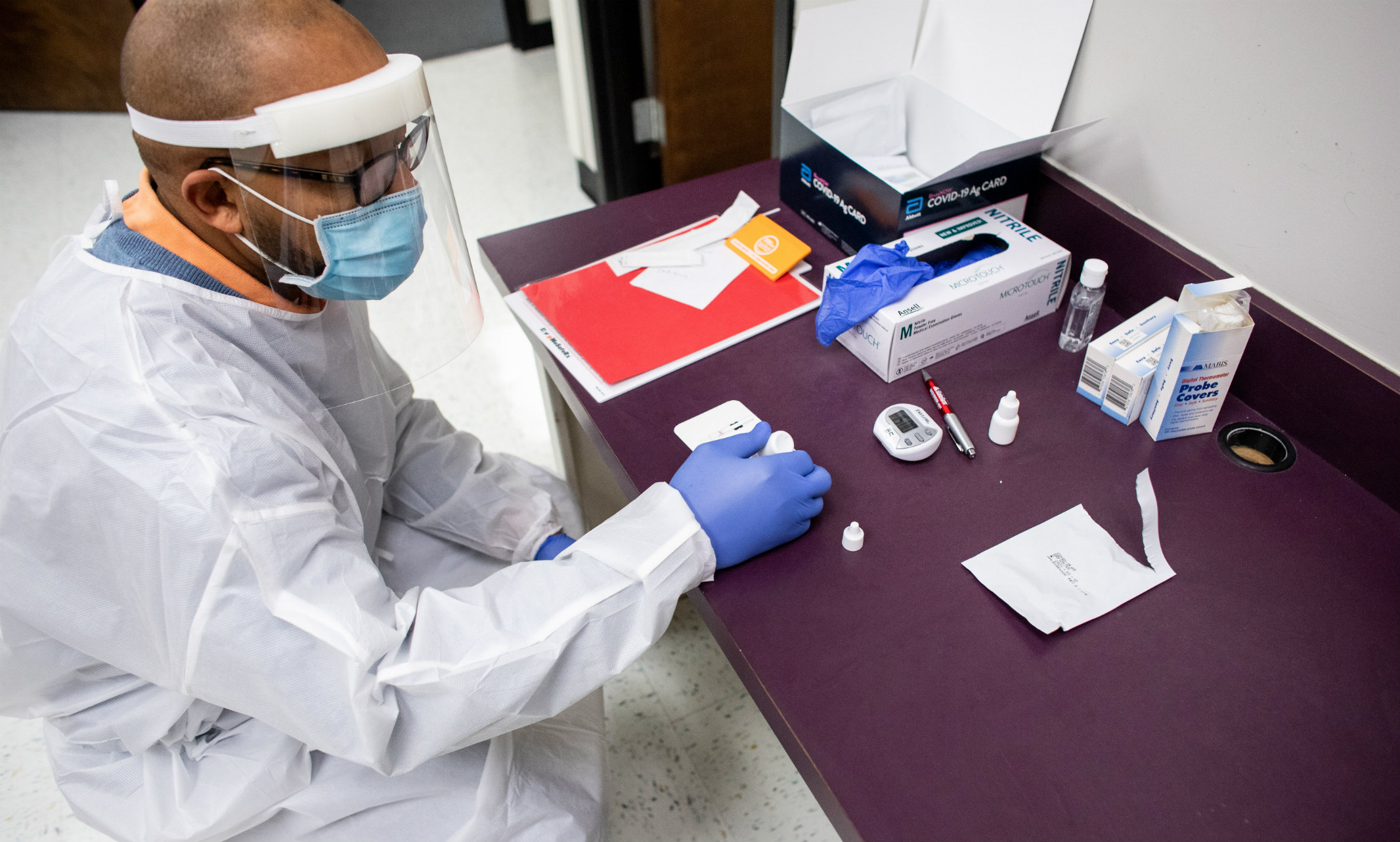
COVID tests available by appointment
Free COVID testing is available to faculty, staff, students and community members Monday - Saturday from 8 a.m. to 4:00 p.m. at 5050 Oak Street. The last appointment each day will be 3:30 p.m.
The testing site offers rapid PCR and lab PCR tests.
Location
A mobile testing unit is set up in the parking lot at 5050 Oak Street.
Appointments
You can book an appointment online by clicking here.
Contact
Student Health and Wellness, studenthealth@umkc.edu or 816-235-6124.
Jan 14, 2021
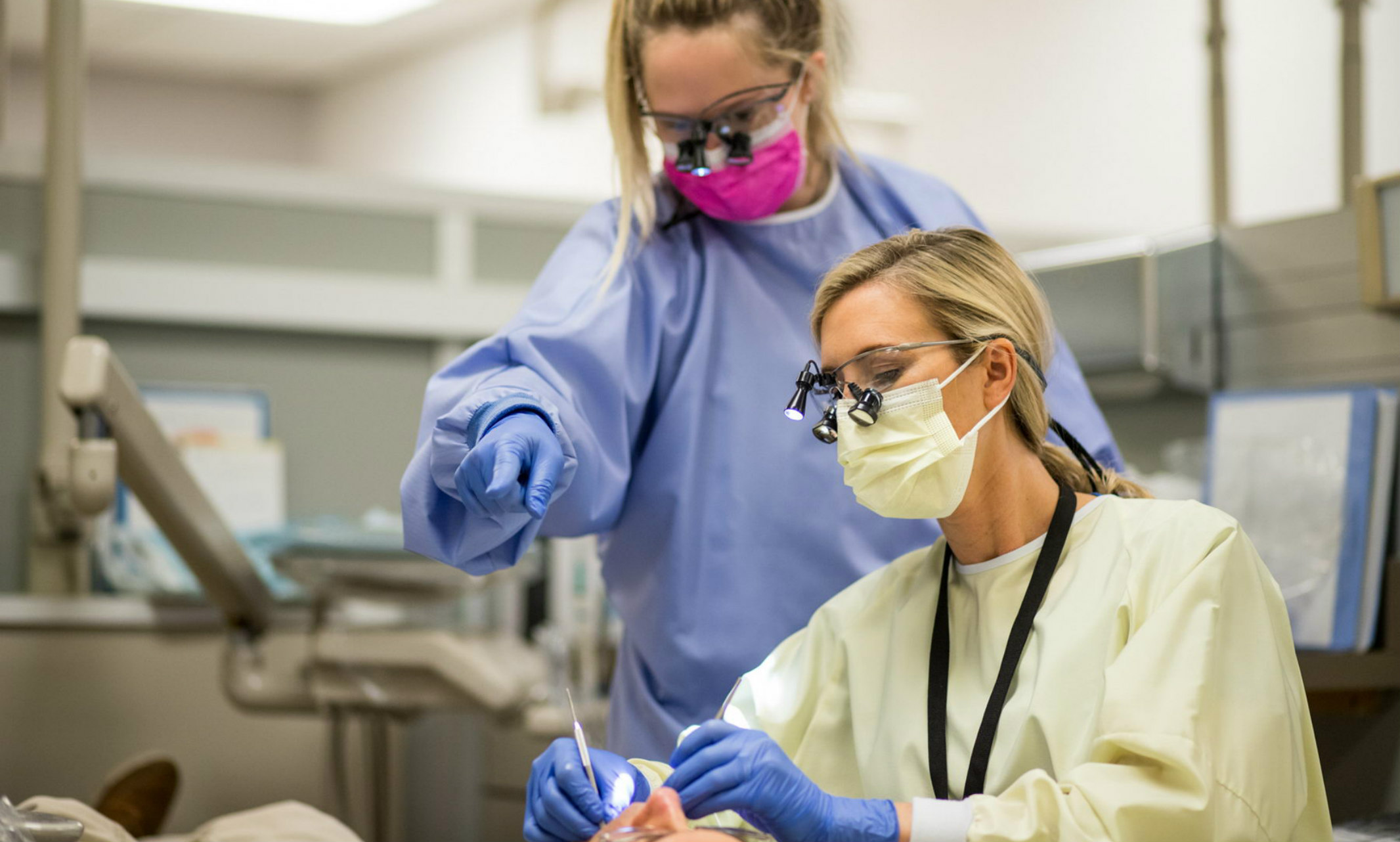
Help yourself by helping dental hygiene students with their exams
Haven’t had a dental cleaning in a few years? The University of Missouri-Kansas City School of Dentistry dental hygiene students are screening patients for their clinical licensing exam, which includes a free dental cleaning.
Qualifications: You must have
No braces.
Most teeth present.
No dental cleanings in the past two to four years.
No need for immediate dental services such as extraction.
All day available April 30.
Sign up: Call 816-508-5858 and leave a voicemail, or email umkcdhboards2021@gmail.com and include full name, phone number with area code and date of birth. Scheduling an appointment is required before coming in.
When/where: Screenings will be held Tuesday through Friday starting Jan. 19 through the end of April at the UMKC School of Dentistry, 650 E. 25th St., Kansas City.
COVID-19 precautions: To ensure safety, the UMKC School of Dentistry is following current guidelines from the CDC, the Occupational Safety and Health Administration, the American Dental Association and the American Dental Hygienists’ Association.
The UMKC School of Dentistry delivers clinical care to more than 60,000 patients each year in the Kansas City area.
Jan 13, 2021
UMKC Theatre's virtual co-production is featured
“Brainstorm: The Inside Life of the Teenage Mind,” a virtual co-production of the Coterie Theatre and UMKC Theatre, will be available Jan. 19 through Feb. 7. Get more information from the Kansas City Star. This story was picked up by MSN Entertainment.
Jan 13, 2021
Comprehensive, long-range vision for university’s physical environment
The University of Missouri-Kansas City is embarking on a campus master planning process.
A master plan is a long-range vision for the physical environment of the university’s two campuses. The plan will be designed to support the university’s goals, the role it plays in Kansas City’s future and the needs and desires of the university’s valued neighbors.
Elements to be studied and refined in the process include student housing, green space, classroom and laboratory design, space utilization and support for the student life experience.
The plan will take into account the realities of the university’s financial situation, and focus initially on maximizing the efficient use of existing buildings and spaces. The plan will also look to the future and chart a course for expansion into key growth areas such as student housing as resources become available.
The existing UMKC Master Plan, created in 2014, needs to be updated to reflect new conditions. First and foremost, the master plan must be guided by, and serve the goals of, the 2018-2028 UMKC Strategic Plan. It will take into account that the streetcar will extend to our campus, further connecting us to the city. In addition, factors such as the UMKC Forward process and our short- and long-term needs for student services, academic programming and community engagement, must be taken into account.
UMKC is working with the firm Ayers Saint Gross to create a collaborative process designed to build consensus. A working group representing a wide array of UMKC stakeholders has been assembled and began working with ASG professionals in November 2020 to assess existing conditions.
The entire campus community will have opportunities to participate and be heard. UMKC has developed a Master Plan website where we will to share updates and alert the campus community to future opportunities for participation and input. The goal is to produce a recommended plan for consideration by the Board of Curators at the board meeting in June.
“Our mission of teaching, research and service is constant, but the means we employ to deliver on that mission must adapt to changing conditions,” Agrawal said in a letter to campus. “This master plan process is an opportunity for our community to come together to decide how our physical environment and footprint must adapt to provide maximum support for that mission.”
Jan 12, 2021
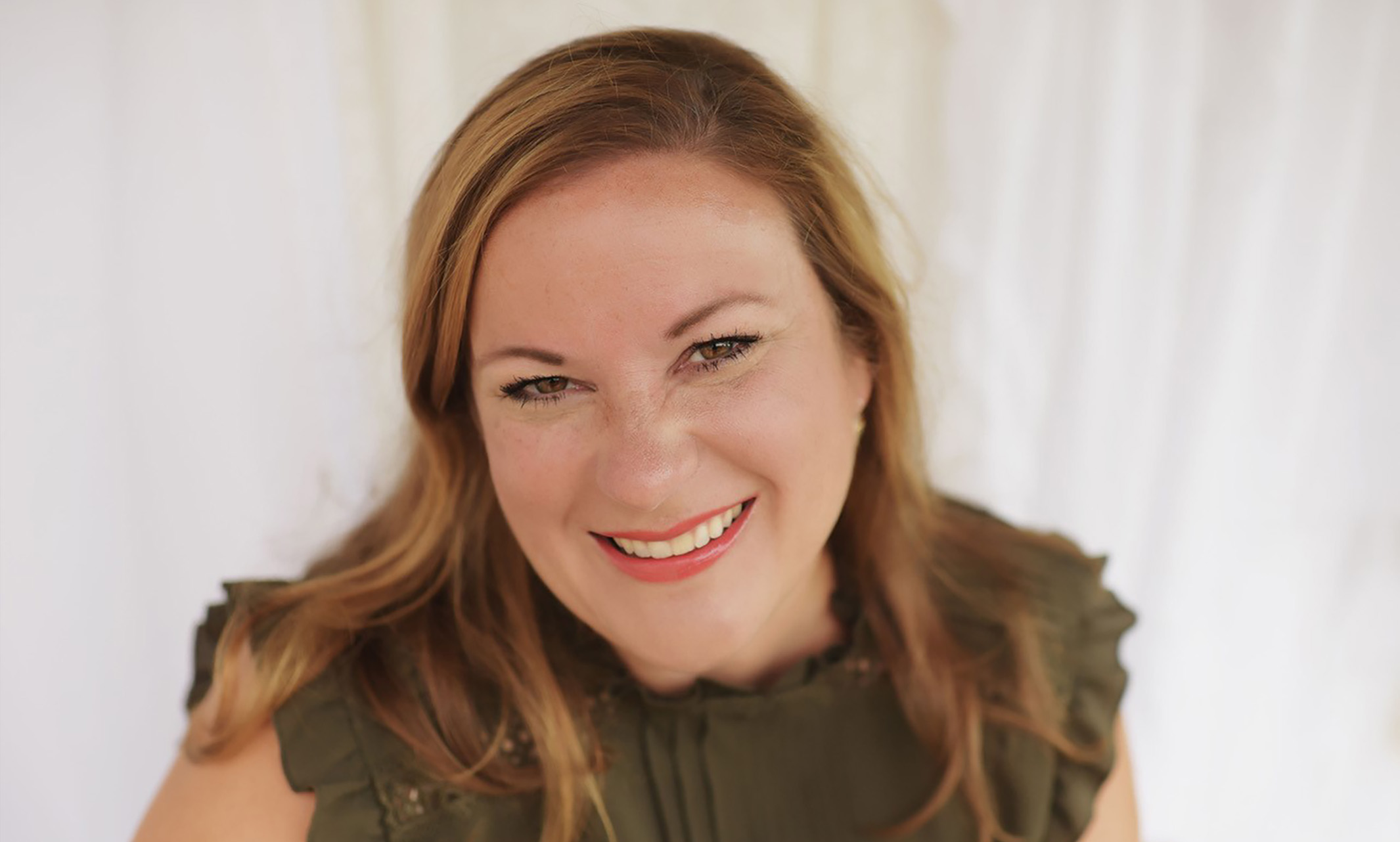
As the world becomes more aware of the growing skill sets of today’s pharmacists, the roles they play in health care will continue to evolve and ex...
Janelle Sabo, Pharm.D., R.Ph., M.B.A., is a 2000 graduate of the UMKC School of Pharmacy. An executive leader in clinical research design, development and delivery, she serves as the global head of clinical innovation, system and clinical supply chain at Eli Lilly and Company. She has accountability for the overall development, registration and launch of anti-COVID-19 therapeutics across the globe.
What do you most enjoy about your job?
In my role, I leverage virtually every aspect of my education, including physics, calculus and the full pharmacy curriculum. The key difference is that I am not evaluating known information and data, but helping design and deliver critical information to inform health care professionals how a new treatment may be useful and practically utilized in a given disease state.
What does a typical day look like in your role?
My typical day involves four key focus areas: Portfolio and clinical research design and delivery, development and scaling of critical capabilities to enable clinical research, developing people, and external engagement with industry groups, vendors, regulators and other key partners.
Why did you decide on pharmacy as a career choice?
I have loved science since I was young and wanted to help people. While I considered being a doctor, I was quickly drawn to the way medications can fundamentally improve and/or cure those who need help the most. I wanted there to be more options, especially in unmet medical therapeutic areas and pediatrics.
How do you see the role of pharmacists evolving in the future?
There is a world of roles beyond the traditional pharmacy that is growing. I have pharmacists in virtually every aspect of my organization – from data to clinical investigational pharmacy, from mobile and decentralized research to investigator training, from clinical trial design to clinical trial development and delivery. The pharmacy curriculum combined with in-clinic experience is invaluable in drug development. It opens many opportunities.
What do you do outside of work for fun?
I enjoy time with my family and friends, traveling both domestically and internationally, hiking, and time by the pool in the summers.
What is your best advice for someone thinking about a career in pharmacy?
Pharmacy is not just what you see today behind the counter or in the hospital. There are many opportunities in industry, academia, research, consulting and related industries. These broader opportunities require a solid foundation academically and exploration early in your schooling as internships, externships and exposure will increase your ability to pursue them post residency or fellowship.
Why would you encourage someone to pick the UMKC School of Pharmacy?
UMKC has been well-ranked for more than 30 years, with a strong history of producing excellent graduates that have gone on to be leaders in their field. UMKC graduates have been successful in a variety of pharmacy settings and blazed new career paths. The masters and Ph.D. programs are solid with excellent scientist who care deeply about their areas of research.
How did your time at the UMKC School of Pharmacy prepare you for your current role?
UMKC School of Pharmacy provided me organizational leadership opportunities, and supported and recommended me for critical internships in the summers. It also provided me an excellent academic and clinical foundation to build from as I launched into my career in clinical research and drug development.
Jan 12, 2021
Kansas City Magazine features three UMKC faculty
Barbara Pahud, M.D.; Steve Waldman, M.D.; and Mary Anne Jackson, M.D.; were featured in this article.
Jan 12, 2021
History Department Chair weighs-in with KCTV5
Chester Owens Jr. said when he saw the image of the man holding a confederate flag inside the U.S. Capitol building, he immediately thought of his grandfather who was born into slavery. Other historians also took note of the historical irony on social media. Diane Mutti Burke, professor and chair of the Department of History at the University of Missouri-Kansas City, said she caught wind of the photograph online. Read the full article and watch the newscast.
Jan 12, 2021
National media cover research by UMKC School of Medicine faculty
At least two national publications, US News & World Report and MDalert, wrote about a study by UMKC School of Medicine faculty John Spertus, senior author; and Suveen Angraal, study author. The research looked at the role of fundraising sites such as GoFundMe has played in crowdsourcing funds for medical costs over the past several years.
Jan 12, 2021
CNBC interviews Bill Black
“Presumably he’ll do what he’s done at least five times in his career, which is strategic bankruptcy,” said William Black, associate professor of economics and law at the University of Missouri-Kansas City. Read more.
Jan 12, 2021
Two UMKC students were guests on KCUR
Brandon Henderson, a senior at UMKC and former Student Government Association president; and Gracie Wrinkle, a senior at UMKC and former sorority president of Alpha Delta Pi, were guests on Up to Date. Listen to the podcast on the KCUR website.
Jan 12, 2021
Northeast News consults with Ivan Ramirez
Ivan Ramirez, coordinator of the Avanzando Mentoring Program, a mentoring program for Latinx students at the University of Missouri-Kansas City, said that for students thinking about joining the education field, being a part of LEC is a must. Read more.
Jan 12, 2021
Bdnews24 talked to public health researchers including Jenifer Allsworth at UMKC
Cities also tend to offer a larger variety of social support services, said Jenifer Allsworth, a public health researcher at the University of Missouri-Kansas City, including various child care and public transportation options. Read the full article.
Jan 09, 2021
Medscape quotes Laurie L. Hornberger
In a separate interview with Pediatric News, Laurie L. Hornberger, MD, MPH, associate professor of pediatrics, University of Missouri-Kansas City, explained that eating disorders occur across the spectrum of races, ethnicities, sexes and socioeconomic statuses, so “getting caught up in that stereotype can cause you to overlook kids with significant problems.” Hornberger is lead author of a new clinical report on eating disorders in children and adolescents prepared by the American Academy of Pediatrics Committee on Adolescence. Read the Medscape article.
Jan 08, 2021

Computer science professor Yusuf Sarwar Uddin worked on this award-winning data analysis project
While we know that human mobility is among the leading causes of COVID-19 spread, the extent of the relationship remains unclear. School of Computing and Engineering Assistant Professor Yusuf Sarwar Uddin and two teammates from the Institute of Transportation Studies (ITS) at the University of California, Irvine – including his wife Dr. Rezwana Rafiq – say that information is important to know if policymakers want to make informed decisions on how to limit the spread.
The team was one of seven novel data science projects that received cash awards from leading enterprise artificial intelligence software provider, C3.ai. The C3.ai COVID-19 Grand Challenge represents an opportunity to inform decision makers at the local, state and federal levels and transform the way the world confronts this pandemic. A total of $200,000 in cash prizes was awarded to these research teams. The UMKC/UC Irvine team received $12,500 as one of the four third-place winners.
About the research
While we know measures like physical distance and mask wearing are already ongoing mandates recommended by the Center for Disease Control and Prevention, the extent of the relationship between human mobility and the virus spread remain unclear, at least in quantitative sense. Using U.S. county-level data from multiple sources during the first pandemic wave in May 2020, Uddin and team built a latent structural regression model to identify the causal relationships between human mobility indicators (trips, distance traveled, staying at home and social distancing) and COVID-19 spread to inform how policymakers should act. Though the team did not provide an official recommendation, they are continuing to develop the model in meaningful ways using data analysis and artificial intelligence to make informed decisions.
View the presentation
Jan 07, 2021
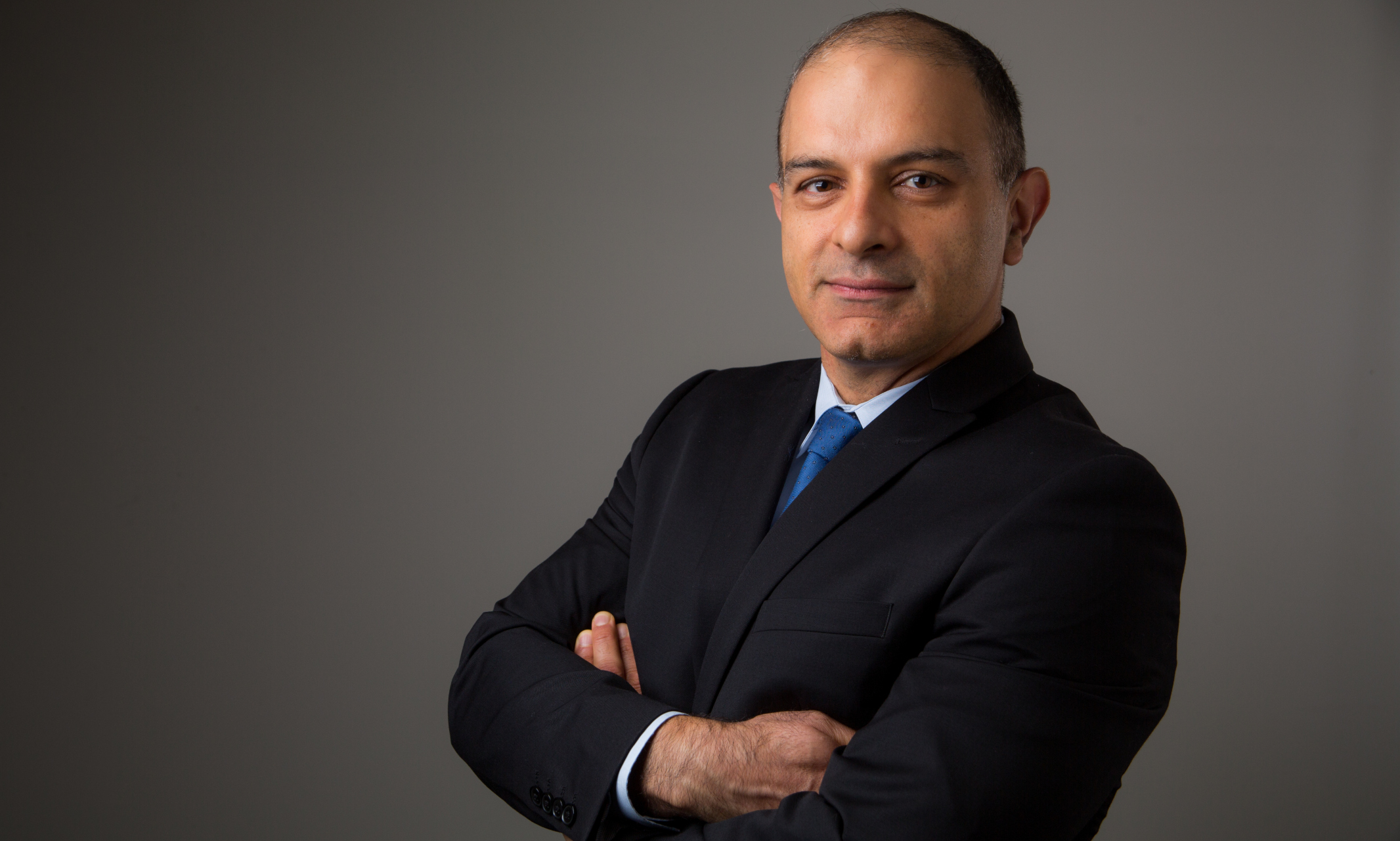
Reza Derakhshani developed EyeVerify technology
Reza Derakhshani, professor in the UMKC School of Computing and Engineering, has been named a fellow of the National Academy of Inventors.
Derakhshani is best known for leading the development of a biometric technology that makes the eye the only password needed to secure smartphones and mobile devices. The product is known as Eyeprint and was commercialized by the Kansas City-based startup EyeVerify. EyeVerify was acquired by Ant Financial Services Group in 2016 for a reported $100 million. The company is maintaining its headquarters in Kansas City and has been doing business as ZOLOZ since 2017. Derakhshani continues consulting as EyeVerify’s chief scientist while maintaining his faculty position at UMKC.
At UMKC, Derakhshani heads the Computational Intelligence and Bio-Identification Technologies Laboratory (CIBIT). The lab’s research focus is ocular and vascular biometrics, mobile security, anti-spoofing and machine learning. CIBIT is also engaged in developing related novel hardware platforms for computational imaging schemes as related to biometrics, in addition to human-computer interaction.
The 2020 Class of Fellows of the National Academy of Inventors will be inducted at the NAI 10th annual meeting in June 2021. UMKC Chancellor Mauli Agrawal nominated Derakhshani as an NAI Fellow. The National Academy of Inventors is a member organization comprising U.S. and international universities, and governmental and nonprofit research institutes, with more than 4,000 individual inventor members and fellows spanning more than 250 institutions worldwide.
Jan 06, 2021
Professor Theodore H. Seligson was respected throughout the region
Theodore “Ted” Seligson (1930-2021) was a professor of architecture at UMKC for 30 years.
A Fellow of the American Institute of Architects, Seligson was a true Renaissance man: architect, urban and interior designer, professor, fine art consultant and curator. In his spare time, he was a semi-professional violin player, reader of hieroglyphics, historic preservation activist, antiquarian, lover of comics, compulsive teacher and raconteur, according to his obituary in the Kansas City Star.
Friends, colleagues, students and former students shared memories of him.
“Ted Seligson was a unique and thoughtful professor who truly cared about his students and their success,” said Jacob A. Wagner, associate professor, director of UMKC Urban Studies. “He taught in Architecture and Urban Design, but he could have easily taught Art History and Archaeology. As a professional architect he worked for Kivett and Myers before starting his own firm. The buildings he designed and worked to save as a preservationist still shape the city today.”
Seligson graduated from Shawnee Mission North High School and Washington University, where he also worked as a visiting professor for 30 years. His work received many local and national awards and is highlighted by such projects as Temple B’nai Jehudah, Bartle Hall Convention Center, Missouri Public Service building, Fire Station No. 30, several UMB bank buildings, Maple Woods Community College, Seaboard Corporation offices and many striking residences.
“Ted Seligson was a kind and thoughtful educator, committed to developing students and their individual visions,” said Kati Toivanen, interim dean, UMKC College of Arts and Sciences. “He generously shared his wide range of professional experiences and benefited generations of our students. He will be greatly missed.”
Students left tributes on Linkedin:
“I was lucky enough to have him as a professor for my studio's class. His observations and teachings in the AUPD department at UMKC were incredibly valued and his insight will be deeply missed.”
“Ted touched so many lives, he was truly the best teacher I ever had.”
“He influenced so many and was a great teacher. I loved listening to all his stories and lessons. ‘Did you know it can rain up?’”
“The passing of a Titan. So many good memories.”
Counseling services are available for students, faculty and staff through UMKC Counseling Services.
Seligson is survived by a legion of friends, peers, clients and students who admired him. He was a member of Temple B’nai Jehudah. A private ceremony was conducted at Rose Hill Cemetery. Memorials may be sent to the Seligson Fund c/o UMKC Foundation at 5115 Oak, AC202 Kansas City, Mo, 64112. Seligson held a fundamental belief that every person has the ability to make our community and country a better place to live. The Seligson Fund will continue to foster his legacy through public lectures and scholarships for architects and urban planning students at UMKC.
Jan 06, 2021
Marc Hill mentioned the UMKC Forward initiative in his Kansas City Star opinion piece
This op-ed column from the Kansas City Star mentions the UMKC Forward program, which seeks to focus the university on its strengths that tomorrow’s workforce will require. (subscription required)
Jan 06, 2021
Economics professor's study on loan forgiveness provides insight
“You’re not getting it paid off now, and you probably never will,” says Scott Fullwiler, an economics professor at the University of Missouri-Kansas City and co-author of a landmark 2018 study on loan forgiveness. Read the full article from Bloomberg Business.
Jan 06, 2021
Political Science and School of Law professors weigh in on Electoral College, Capitol riots, impeachment, 25th Amendment
Local media outlets have interviewed UMKC Department of Political Science and UMKC School of Law professors this week about the Electoral College and riots at the U.S. Capitol. We've gathered those headlines:
UMKC professor calls storming of US Capitol unprecedented - KMBC - Beth Vonnahme
U.S. Capitol riots 'almost entirely unprecedented,' UMKC professor says - KSHB and picked up by Yahoo News - Rebecca Best
U.S. Capitol has never seen chaos quite like this - Fox4KC - Rebecca Best
What's next following the assault on the Capitol? - KCTV5 - Greg Vonnahme
Few consequences for angry white men — what if Black rioters attempted a Capitol coup? - Kansas City Star - Jamila Jefferson-Jones
Impeachment, 25th Amendment: Explained by UMKC constitutional law scholar - KCTV5 - Allen Rostron
UMKC professor explains 25th Amendment as calls grow for Trump’s removal - KSHB - Greg Vonnahme
Jan 06, 2021
Kansas City Star reports celebration of life
This was from the Kansas City Star Opinion Page: “He was devoted to improving Kansas City and a big advocate for urbanism in Kansas City,” said Michael Frisch, department chair for architecture, urban planning and design at UMKC. (subscription required)
Jan 06, 2021
KSHB interviews Beth Vonnahme
Beth Vonnahme, associate professor of American politics at UMKC, said Wednesday’s ceremony will be unusual. Read the story and watch the newscast on KSHB. This story was picked up by Yahoo News.
Jan 05, 2021
KCUR taps Edward Cantu
Edward Cantu, associate professor at the University of Missouri-Kansas City School of Law, was a guest on Up to Date.
As this story unfolds, more UMKC faculty are interviewed about Josh Hawley and blowback from his objections and the Capitol riots. Debra Leiter on KSHB, Allen Rostron on Fox4KC.
Jan 05, 2021

UMKC School of Pharmacy alumna, Janelle Sabo, shares insight on the ever-changing field of health care and pharmaceuticals with a look inside her p...
As the world becomes more aware of the growing skill sets of today’s pharmacists, the roles they play in health care will continue to evolve and expand. Our UMKC School of Pharmacy graduates are working in a vast array of health care fields.
Janelle Sabo, Pharm.D., R.Ph., M.B.A., is a 2000 graduate of the UMKC School of Pharmacy. An executive leader in clinical research design, development and delivery, she serves as the global head of clinical innovation, system and clinical supply chain at Eli Lilly and Company. She is accountability for the overall development, registration and launch of anti-COVID-19 therapeutics across the globe.
What do you most enjoy about your job?
In my role, I leverage virtually every aspect of my education, including physics, calculus and the full pharmacy curriculum. The key difference is that I am not evaluating known information and data, but helping design and deliver critical information to inform health care professionals how a new treatment may be useful and practically utilized in a given disease state.
What does a typical day look like in your role?
My typical day involves four key focus areas: Portfolio and clinical research design and delivery, development and scaling of critical capabilities to enable clinical research, developing people, and external engagement with industry groups, vendors, regulators and other key partners.
Why did you decide on pharmacy as a career choice?
I have loved science since I was young and wanted to help people. While I considered being a doctor, I was quickly drawn to the way medications can fundamentally improve and/or cure those who need help the most. I wanted there to be more options, especially in unmet medical therapeutic areas and pediatrics.
How do you see the role of pharmacists evolving in the future?
There is a world of roles beyond the traditional pharmacy that is growing. I have pharmacists in virtually every aspect of my organization – from data to clinical investigational pharmacy, from mobile and decentralized research to investigator training, from clinical trial design to clinical trial development and delivery. The pharmacy curriculum combined with in-clinic experience is invaluable in drug development. It opens many opportunities.
What do you do outside of work for fun?
I enjoy time with my family and friends, traveling both domestically and internationally, hiking, and time by the pool in the summers.
What is your best advice for someone thinking about a career in pharmacy?
Pharmacy is not just what you see today behind the counter or in the hospital. There are many opportunities in industry, academia, research, consulting and related industries. These broader opportunities require a solid foundation academically and exploration early in your schooling as internships, externships and exposure will increase your ability to pursue them post residency or fellowship.
Why would you encourage someone to pick the UMKC School of Pharmacy?
UMKC has been well-ranked for more than 30 years, with a strong history of producing excellent graduates that have gone on to be leaders in their field. UMKC graduates have been successful in a variety of pharmacy settings and blazed new career paths. The masters and Ph.D. programs are solid with excellent scientist who care deeply about their areas of research.
How did your time at the UMKC School of Pharmacy prepare you for your current role?
UMKC School of Pharmacy provided me organizational leadership opportunities, and supported and recommended me for critical internships in the summers. It also provided me an excellent academic and clinical foundation to build from as I launched into my career in clinical research and drug development.
Dec 17, 2020
